Things Come Along in Life to Knock You Down but the Goal to Stand Back Back
09.13.21

A Minute to Think
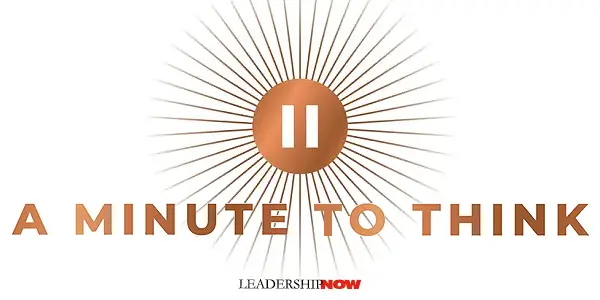
WE ALL NEED white space – open, unassigned time. We need it for better relationships, mental health, and better productivity. Juliet Funt writes in A Minute to Think, "without space, we can't sustain ourselves." It is the missing element in our lives, and we need to get it back.
Funt suggests that first, we need to take strategic pauses to recuperate, reduce, reflect, and construct. They help us to separate. When you can't take long stretched of pen thinking time, Funt uses what she calls the Wedge . "The Wedge is a small portion of white space inserted between two activities. It's used specifically to pry apart actions or events that without it would have been connected."
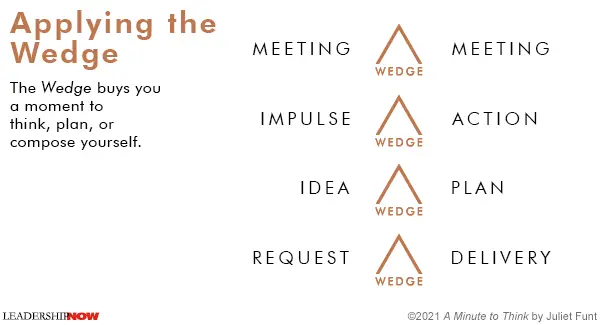
What keeps us from doing this are the Thieves of Time. "Four key drivers propel companies, teams, and human beings at work: Drive, Excellence, Information, and Activity. Despite being positive and helpful to us in their basic nature, these forces are also the biggest reason white space withers." When taken to extremes, they reduce our effectiveness. They look like this:
We mindlessly accept a meeting invite because we are driven. (Associated with burnout and overdrive)We overtweak a presentation because we want to be excellent. (Associated with perfectionism)
We go too deep into dashboards and data because we want to be informed. (Associated with overload)
We impulsively grab the next to-do on our list because we feel we should always be active. (associated with frenzy)
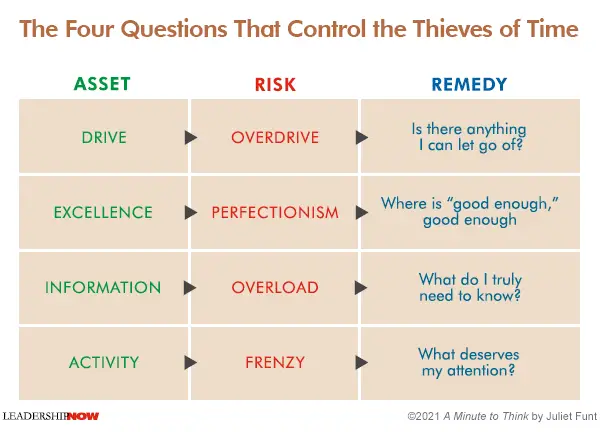
You deal with these excess use of these strengths by asking the following Simplification Questions :
Drive – when it turns into overdrive – needs to hear: Is there anything I can let go of?Excellence – when it turns into perfectionism – needs to hear: Where is "good enough," good enough?
Information – when it turns into overload – needs to hear: What do I truly need to know?
Activity – when it turns into frenzy – needs to quiet its flailing long enough to hear: What deserves my attention?
She also goes into using the Wedge to deal with the mirage of hallucinated urgency. The kind of urgency that we manufacture and causes us to "constantly and thoughtlessly interrupt our colleagues" and the kind of urgency that others place on us. Start to deal with it by putting a Wedge between what comes to mind and anything we do about it.
Funt reveals to us in A Minute to Think the core issues that invite the busyness into our lives and then provides us with practical applications to defeat them. It is geared to working professionals, but people young and old, working or not, deal with these same issues that diminish the quality of their lives. The busyness mindset that we have unintentionally adopted leads to shallow thinking, the acceptance of other people's thinking, and the knee-jerk reactions that are so prevalent today.
The answer to our collective busyness is to reclaim our days by freeing up time to think, process, and create. With the Busyness Test , you can take a closer look at your day-to-day activities and habits to help you learn how to uncover more of this crucial space for creativity and strategic thinking.
![]()
![]() Follow us on Instagram and Twitter for additional leadership and personal development ideas.
Follow us on Instagram and Twitter for additional leadership and personal development ideas.

![]()
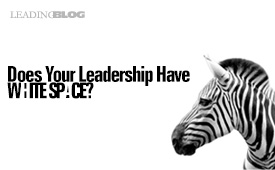
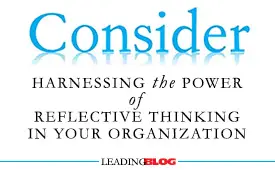
Posted by Michael McKinney at 07:44 PM
Permalink | Comments (0) | Personal Development
09.06.21

The Power of Pressure
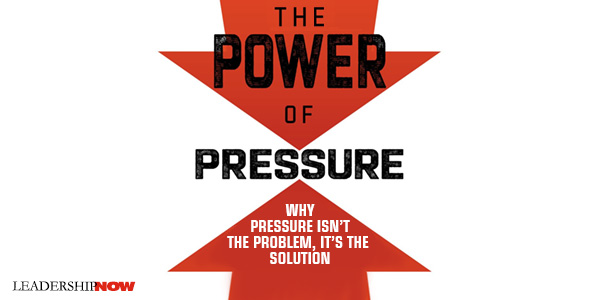
SCOTTISH philosopher Thomas Carlyle is said to have written, "No pressure, no diamonds." And it's true. We need to rethink how we think of pressure and how we manage it. In The Power of Pressure, Dane Jensen says, "Pressure isn't just a nasty by-product of life, it's an essential input into high performance. A life well-lived requires pressure." If we can link pressure to growth, we have a great foundation to work from.
So, while most of us try to eliminate or avoid pressure, maybe we need to see it as an ally. Jensen provides the understanding to do just that. He says, "pressure has patterns, and those patterns repeat." What creates pressure is the need to do something, and that distinguishes it from other states like stress, fear, or grief. Unfortunately, just when we feel the need to do something , "our body's default response to pressure robs us of the very abilities that can most help us manage our response to pressure." That's the paradox of pressure. We can become so narrowly focused under pressure that our ability to process information shrinks, and our ability to absorb helpful information diminishes. Over the long haul, if we stay in this high-pressure state, this narrow focus can become our brain's default. So, we need a strategy.
Two Kinds of Pressure
Broadly speaking, there are peak pressure moments — "short, violent bursts of extreme importance and uncertainty" — and there is pressure over the long haul — "periods of grinding volume mixed with importance and uncertainty along the way." To manage them well, we need to respond differently to each.
Peak pressure moments are those that have a beginning and an end and "with a clear range of outcomes" like a race, a test, or a speech. When the moment is over, so is the pressure. "In peak pressure moments, the goal is simple: perform." It is about "performing to the peak of your abilities instead of shrinking from the moment."
Long haul pressure is different. It can be pressure leading to a peak pressure moment, or, more often, it can simply exist. "This type of long haul can come on gradually, as additional sources of pressure are slowly layered on, one by one, until you realize you are no longer sleeping well at night or are feeling emotionally overwhelmed, unable to focus."
Jensen has identified three factors common to all pressure that exist in some combination: high importance, high uncertainty, and high volume. Together they form the Pressure Equation :
PRESSURE = IMPORTANCE x UNCERTAINTY x VOLUME
Importance has to do with the importance of the outcome. If you see the outcome of a situation as important, it will create some kind of pressure. But combined with uncertainty , it becomes intense pressure. Volume is what makes pressure relentless — the volume of importance. And we can all relate (well, most of us) to this from an example in the book:
No team of people, no matter how capable or well-meaning, can truly attend to 189 things — which means that inevitably some of these important, uncertain items will migrate to the periphery, creating pressure each time you think of them and feel the sting of guilt over there neglect.
With this in mind, we need to become what Jensen calls Pressure Ambidextrous . That is to say, learning to be "better at both performing in peak pressure moments and approaching the long haul with a sense of challenge, commitment, and motivation." This is where his Power of Pressure Model is helpful.
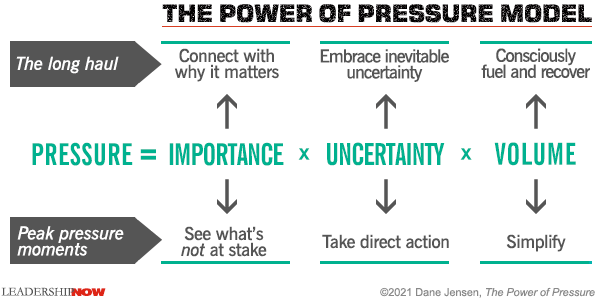
Jensen takes six chapters to explain the strategy for each type of pressure and how we can best use it to our advantage. Each chapter has fresh, well-thought-out perspectives, behaviors, and insightful questions to guide us through the model. He gives this overview of each strategy as it relates to the two pressure types:
Long Haul Importance: Connect with why it matters. Over the long haul, navigating importance is about creating a clear line of sight from the day-to-day grind to what matters most to you. It's about keeping importance front and center in the midst of all the ups and downs that accompany any busy life. When our daily decisions become disconnected from what matters to us for too long, it is hard to sustain a sense of commitment to the journey.Long Haul Uncertainty: Embrace inevitable uncertainty. High performers adopt a mindset over the long haul that embraces the uncertainty inherent in our lives. This mindset consists of an often challenging combination of accepting that there are things we cannot control (and that therefore may not go our way) while at the same time holding a sense of optimism about the future. It is a belief that if we focus on our own actions, everything will work out as it should. Optimism is the difference between simply accepting uncertainty and actually embracing it.
Long Haul Volume: Consciously fuel and recover. Navigating the volume of the long haul is impossible if your body isn't given what it needs to keep up. The long haul requires sufficient sleep and an approach to food and movement that supports your ability to show up energized, with an even emotional keel, to tackle another high-pressure day, week, or month.
Peak Pressure Moments Importance: See what's not at stake. In peak pressure moments, we often give the stakes too much weight. Consciously or unconsciously, we focus everything we have to win or lose, and lose sight of what won't change regardless of the outcome. Learning to see the entire picture — both what's at stake and what isn't at stake — is vital to regulating emotion and performing well in peak pressure moments.
Peak Pressure Moments Uncertainty: Take direct action. Direct action is our biggest ally when it comes to taming uncertainty. Identifying what we can control and then focusing on making progress (however small) is the surest antidote to uncertainty under pressure. This requires first separating out what you can control (your behavior and mindset) from what you can't (other people and outcomes). In many ways, direct action is the central skill in navigating peak pressure.
Peak Pressure Moments Volume: Simplify. One of the greatest derailers of performance is distraction. When it comes to volume in our peak pressure moments, the imperative is quite straightforward: eliminate it. Put aside anything that isn't directly related to performance so that your focus can be complete and total. Of course, that is easier said than done.
Jensen says that much of this boils down to attention control. "The ultimate solution to the pressure equation is being able to consciously and deliberately direct the spotlight of our attention to focus on the thoughts, beliefs, and habits that support us rather than undermine us."
The Power of Pressure is an outstanding book, and you can find whitepapers to support these ideas on his website.
![]()
![]() Follow us on Instagram and Twitter for additional leadership and personal development ideas.
Follow us on Instagram and Twitter for additional leadership and personal development ideas.

![]()

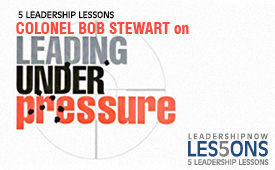
Posted by Michael McKinney at 03:20 PM
Permalink | Comments (0) | Personal Development
08.13.21

The Courage to Lead with Character and Resiliency
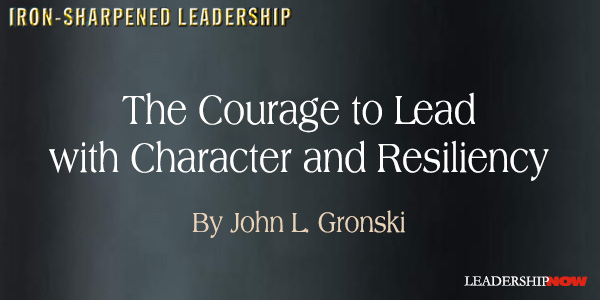
TAKING ON A POSITION of leadership comes with assuming risk, encountering organizational challenges, and being a moral role model for an organization. I believe a person who is not willing to make the sacrifice to take on such a role should step aside and let someone else do it. Three attributes that are critical to taking on the mantle of leadership are decision-making, resiliency, and character.
Leaders must have the courage to make decisions with well less than perfect information. Jack Welch, who led General Electric as its CEO from 1981 to 2001observed that mid-level leaders at GE struggled with having the courage to make a decision. Rarely does a leader have the luxury of making a decision with 100% of the information available. Still, a leader must decide. If a leader waits while trying to gain perfect information, he or she will lose an opportunity.
Leaders who have led organizations for almost any period of time all have one thing in common. They have had to face adversity at some point and guide the organization through challenging waters. This takes resiliency on the part of a leader, and it takes a leadership approach that helps build resiliency among the team and the organization itself.
Character is the foundation of leadership. Although toxic leaders might achieve some success over the short term, it is character-based, servant leaders with strong values who gain sustained success and results.
Escape To Freedom
A soldier I met at a Vietnam War commemoration ceremony several years ago has a story that exemplifies decision-making, resiliency, and character in spades. As I mingled with members of the crowd at the ceremony, I happened upon a man that was wearing a U.S. Army dress uniform. He wore the rank of Chief Warrant Officer 3 and had pilot wings on his chest. I asked if he had served in Vietnam and he gave me a curious answer.
He said he served in Vietnam but not as a U.S. Soldier. He explained that as a soldier in the South Vietnamese Army he fought alongside the U.S. Army, flying UH-1 helicopters. The UH-1 helicopter is also known more affectionately as the Huey.
CW3 Chieu Le then went on to tell me the rest of his story. He was in Saigon on April 30, 1975, the day the U.S. Embassy in Saigon fell. Since he fought alongside U.S. Forces, he knew that if he were captured by North Vietnamese soldiers entering the city he would be put to death or severely tortured.
He made a decision. He fired up a Huey helicopter. By the time he began to lift off the ground about 20 others were clinging to the helicopter as it sputtered into the air. Le had no flight plan and really no idea where to fly to. This was not a pre-planned mission, and no one designated a route or objective. His intent was to succeed, not to fail, even though this was an extremely risky venture. As he applied power to the engine of the chopper, he whispered a prayer to his higher power to mitigate the risk.
He began flying east over the South China Sea. He could not hide his anxiety as he talked into the radio handset, he held in the palm of his sweating hand. He began to transmit over the radio as he watched the South China Sea pass below him. He used the distress call that first originated at Croydon Airport in London in 1921 and that is still used today. Le called out, "Mayday, mayday!" He followed by letting whoever he hoped was listening know that he was the flight of freedom. He called out over and over, "Mayday, mayday, this is the flight of freedom."
He could see the needle on his fuel gauge point closer to empty as he flew over the endless sea below. Finally, he received a reply. It was the USS Midway, conducting operations in the northern area of the South China Sea. The Midway vectored Le and the passengers he carried toward the ship and Le hit the carrier deck harder than he expected with his chopper literally flying on fumes. As he exited his helicopter Le wanted to hug every crew member on that ship. The ship's crew escorted Le to a bunk so he could get some rest. As he drifted off to sleep, Le made sure he thanked that same higher power he prayed to as he began his flight of freedom.
Le made his way from the Midway to a refugee camp in Austria, then to a refugee camp in Arizona, and finally, he made his way to a refugee camp at Ft. Indiantown Gap, Pennsylvania. It was in Pennsylvania that he put roots down. He joined the Pennsylvania Army National Guard and was proud to wear the uniform of the country he had fought alongside in southeast Asia. He became qualified to fly the Huey again and rose to the rank of Chief Warrant 3 before he retired from the military with well over 20 years of faithful service.
Le is a leader who made a courageous decision when the outcome was uncertain. He proved to be resilient, not only during his flight of freedom, but afterward as he made his way from one refugee camp to another. He continuing to show the positive energy, fitness, and spirit of vulnerability that allowed him to overcome challenges that probably would have been too much for many others to bear. Finally, he demonstrated strong character and values. He cared about others as evidenced by the risk he took to fly over 20 other people to safety on that fateful day in April 1975.
But there is another element to this story and that is the necessity of "team." Although it might appear that Le accomplished a great feat alone, he will be the first to tell you that is not the case. He will tell you the back story about the maintenance crew that had prepared his Huey, so it was able to make the audacious flight. The crew on the Midway answered his distress call and then calmly guided him in and assisted with his landing on the deck of the carrier as the fuel tank on his helicopter ran dry. There were teams at the refugee camps who provided for his basic needs. Finally, he was able to join one of the finest team of teams in the Pennsylvania Army National Guard.
Ultimate success is never about one person, but it is about a team working together to bring a vision to a successful conclusion. The story of Le's escape toward freedom and his accomplishments afterward is a story of courage, resiliency, and character that all leaders would do well to learn from. Le had the courage to lead.

Major General John Gronski (USA, Ret) is the CEO of Leader Grove, and is an inspirational speaker, leadership consultant, executive coach, and author. John retired from the Army after forty years of service on active duty and in the Pennsylvania National Guard. He is a decorated combat veteran. In the civilian sector John has led diverse teams implementing large, complex projects. His book, Iron-Sharpened Leadership: Transforming Hard-Fought Lessons into Action, takes a values-based approach to leadership effectiveness and the book is oriented along the lines of his leadership philosophy which includes character, competence, and resilience.
![]()
![]() Like us on Instagram and Facebook for additional leadership and personal development ideas.
Like us on Instagram and Facebook for additional leadership and personal development ideas.

![]()


Posted by Michael McKinney at 08:33 AM
Permalink | Comments (0) | Personal Development
06.28.21

Be Where Your Feet Are
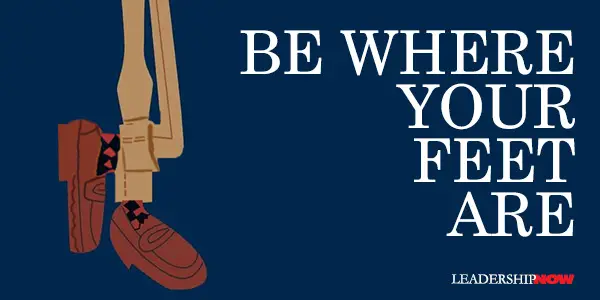
TOO OFTEN we are busy looking for the next thing. The problem is our experiences tend to be shallow. We miss out on the richness of being in the moment. To counteract this, we try to find balance. But balance doesn't create greatness.
The solution is not balance, says sports executive Scott O'Neil in Be Where Your Feet Are. The answer is to make "the most of each moment and ridding ourselves of the toxic habit of constantly looking forward to the next thing." Finding balance is "like aspiring to be in the middle." On the other hand, "being present, focused, committed, and hardworking at home and at work is the path to finding success and fulfillment."
To that end, O'Neil offers, through the use of stories both personal and from scores of others, seven principles to keep you present, grounded and thriving. The stories and the grounding principle he draws from them really make each of these seven principles come to life. I offer one of the insights from each.
#1 Be Where Your Feet Are
With so many distractions, it is harder today than ever to be where your feet are. It has also never been more important.I don't believe the good life is about finding balance between work and home. It's about living the moments we have where and when we have them.
To be more present, O'Neil offers a four-part process:
- Find Perspective "Perspective is the foundation on which we build a life where we can be where our feet are."
- Seek Authentic Feedback "How you live is truly a choice. What you're going to do and who you are going to do it with, those are choices only you can make."
- Cultivate Reflective Strength "Our ability to have more meaning is right here in front of us, but so are the distractions, and too often the distractions rule the day."
- Live Your Leadership Constitution "Committing in writing to life and a way of living matters. Whether we have family rules or values, whether we have a morning mantra or a Leadership Constitution, we need guideposts in our lives. We need reinforcement in terms of what we stand for, what matters, and what we prioritize, and through those things we can be where our feet are when it counts."
#2 Change The Race
In those times when we feel stuck, unable to get out of the funk we are in, we need to change the race:
- Recognize That You Have a Choice to Change Your Situation
- Run Toward the Storm Instead of Away from It "I've already spent too much time in the gray. I choose to throw all of my emotion and soul into everything I do because it should all matter. It should matter because the alternative is that you have no life or hope or joy or future."
- Find Your Center with The Help of People You Care About and Who Care About You
The most critical things to keep in mind include knowing when you need to change the race you are running and not shutting down—remember that isolation is your kryptonite when things are going badly. Engage people in your life and do not let ego or pride get it the way of good decision-making or getting help.
#3 WMI – What's Most Important
The world is filled with universe moments , which is when things happen for a reason and people, places, and events seemingly drop into your life with purpose.Today the world moves faster and there seems to be more chaos than calm, it's likely worth exploring your own centering force—whether that's faith, church, prayer, meditation, running, yoga, or anything else that helps enhance your level of peace, increase your level of calm and provide a more centered life.
#4 Fail Forward
Failure is a better teacher than success. Failure is a more effective teacher than success. It's rarely enjoyable, but it is critically important to be a student of life.Stop competing, stop pressing so hard, and start opening yourself up to people and learning. Stop trying to prove what you know and begin to express that you're intellectually curious. Be interested versus interesting.
#5 Be The Purple Water Buffalo
Be an extraordinary teammate. Hold the team above self.The purple water buffalo attitude can also be summarized in this expression: if there is a piece of paper on the ground, bend over and pick it up.
We have to solve problems when we see them. Don't wait. If something goes south, fix it. Now.
#6 Assume Positive Intent
What if you assumed positive intent from those with whom you connect, no matter how many alternative and less generous assumptions were possible?Why? Because we often have preconceived notions about what other people are thinking and what their intentions are, and typically these preconceived notions are negative. More importantly, they are at best clouded and at worst wrong, and they always impact your ability to be effective.
#7 Trust The Process
In a world dominated by instant gratification and obsessed by the spotlight of now, Trust the Process is the commitment that you will keep the long-term view at the forefront of your planning and decision-making. Trust the Process is about understanding the mistakes and taking the time to revisit what went wrong and why, and then leverage that information to get smarter and make better decisions in the future.
![]()
![]() Like us on Instagram and Facebook for additional leadership and personal development ideas.
Like us on Instagram and Facebook for additional leadership and personal development ideas.

![]()
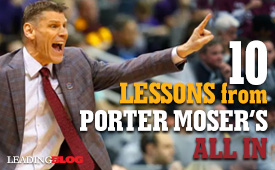
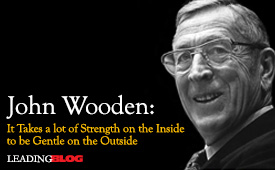
Posted by Michael McKinney at 06:37 AM
Permalink | Comments (0) | Personal Development
06.18.21

Wellbeing at Work
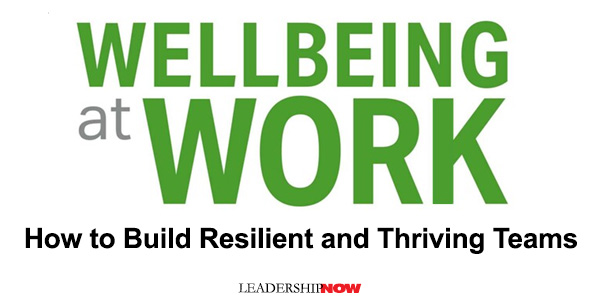
WHAT DOES it take to thrive? It seems to be an elusive goal. Gallup research has found that about seven in 10 people are struggling or suffering in their lives.
In Wellbeing at Work, Jim Clifton and Jim Harter report that beginning in the late 1950s, Gallup sought to discover and quantify the difference between the best possible life and the worst possible life. Currently (2021), "Gallup has found that 17% of the world's population is suffering (worst life), 59% is struggling, and 25% is thriving (best Life)."
So, what does this mean to leaders? People bring the whole person to work. "Work should be a stabilizing force in people's lives. And employers play a central role in shaping the whole person." People who are not "thriving in their lives are much more vulnerable and add risk to your organization."
61% higher likelihood of burnout often or always
48% higher likelihood of daily stress
66% higher likelihood of worry
Double the rate of daily sadness and anger
If you follow this blog, it is obvious to you that this impacts relationship, creativity and innovation, energy, and trust.
From the Gallup global surveys of wellbeing, there emerged five essential elements of wellbeing that differentiate a thriving life from a suffering or struggling life. These are all aspects of your life that you can do something about. Interestingly, Gallup found that the most important element is career wellbeing.
Thriving is having a positive view of your life in each of these five areas.
Career Wellbeing: You Like What You Do Every Day
"My job and my manager are the two strongest links to net thriving." Many find spending time with their manager to be the worst time of their day. We can fix that by improving employee experiences and teaching managers to be better coaches.
What can leaders do?
- Make sure everyone in the organization knows their strengths to help design a better employee experience.
- Remove abusive managers.
- Upskill managers to move from boss to coach.
- Make wellbeing part of career development conversations.
Social Wellbeing: You Have Meaningful Friendships in Your Life
Social time builds friendships. Friendships mitigate division, bias, gossip, and office politics. Gallup found that "almost all forms of social time boost mood, but technological remote forms such as texting and social media have thresholds—mood drops after moderate amounts. While both remote and in-person socializing is beneficial, in-person interaction has the greatest impact on mood. But that doesn't mean you have to overdo it or that social connections have to drain time to be effective. Create regular opportunities for people to get to know one another through work."
Financial Wellbeing: You Manage Your Money Well
Almost half of Americans live paycheck to paycheck. Money may not buy happiness but properly managed, it creates more opportunities and freedom. Raises in income affect happiness to a point. "Above an annual income of 90,000 on average, daily emotions do not improve with increases in income."
Leaders can help by providing financial planning, investing, and savings resources and tools.
Physical Wellbeing: You Have Energy to Get Things Done
"Your organization's ability to bounce back from a public health crisis, or any crisis, depends on how resilient your employees are." So, encouraging healthy choices is a win/win. We have the most control over sleep, exercise, and diet. All three can improve our immunity and mood.
Community Wellbeing: You Like Where You Live
Communities help people know that their lives matter outside of work too. "No matter how digital society has become, people still live in physical places that form the foundation of their social lives." Not just being a part of something but caring for others fights against stress and negative emotions.
Like the other four wellbeing elements, community wellbeing feeds, and is fed by, the other elements of wellbeing. Those with high community wellbeing have active lives, are more likely to be engaged at work, and have more frequent social interactions. In the same way, physical health and financial security make giving and volunteering possible.
While career wellbeing is foundational to the other four elements, it is important that they are all in balance. "All things being equal, thriving in what you do every day makes for stronger relationships, a more secure financial life, good health, and greater community involvement." If you are on the low end of the scale on any one or more of the elements, then that's where you need to start to move toward thriving. The elements are all interrelated, so focusing on just one area will cause you to fail overall. "Those who had an imbalance in points across the elements had the lowest wellbeing—in particular when they gave an overabundance to financial wellbeing."
If you want to build a thriving culture, you need to avoid the four risks:
- Employee Mental Health—The Quality of the Workplace
- Lack Of Clarity and Purpose—"Employees who trust their leadership, are twice as likely to report clarity in what their organization stands for and to believe in the organizational values."
- Overreliance On Policies and Perks—"If it were possible to legislate culture through policies, programs, and perks, most organizations wouldn't have any culture problems."
- Poorly Skilled Managers—This is the most significant risk. "Designing an engaging workplace that is the foundation for thriving wellbeing and overall mental health is led by the manager."
People need, especially in a crisis, four leadership traits as a signal that their life will be OK: Hope (Is there a clear plan for the future?), Stability (Am I well-prepared to do my work?), Trust (Does my manager keep me informed?), and Compassion (Does my organization care about my wellbeing?). These help to build a net thriving and resilient culture.
The authors dig deeper into implementing wellbeing practices. As knowing your employee strengths "is the first step to having the most individualized, positive and effective wellbeing conversation with them," they have included an appendix that ties in with the CliftonStrengths profiles. A very useful tool, along with the condensed action guide you will also find in the appendix.
![]()
![]() Like us on Instagram and Facebook for additional leadership and personal development ideas.
Like us on Instagram and Facebook for additional leadership and personal development ideas.

![]()
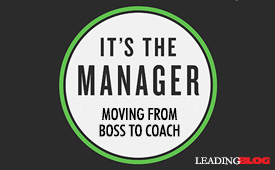

Posted by Michael McKinney at 08:24 AM
Permalink | Comments (0) | Personal Development
06.14.21

The Lost Art of Connecting
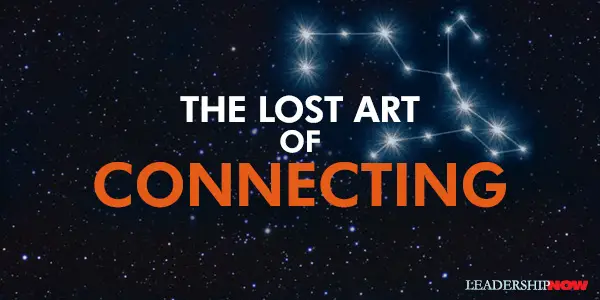
WHO are the stars in your constellation? What kind of constellation do you want to create?
Connection is a superpower. Susan McPherson says that connection comes down to one simple question: How can I help? Business relationships often come across as transactional—what can that person do for me? But they can and should be meaningful. Business connections are a chance to thread "people together to create something bigger and unknown"—to build a constellation of people that share not only "your values and your vision but also those who challenge you, expose your blind spots, and broaden the diversity and breadth of your network."
In her book, The Lost Art of Connecting, McPherson explains how we can make every relationship meaningful and rewarding. To begin to build your constellation, you have to be yourself and ask yourself the following questions:
Who do you need to be around you to be your best?
What are your unique values and strengths?
What unique contributions can you make?
The answers to these questions will point you toward who you want to be connected with to best fulfill your career and life's purpose. And when you find that—magic can transpire.Once you are good at building meaningful connections, you can facilitate them for others as well, amplifying the effect. The truth is that whether or not a connection is meaningful honestly has very little to do with the other person. Feeling lonely, isolated, or disconnected is an inside job. How connected you feel is determined by the meaning that you ascribe to that relationship.
The difference between feeling alone and happy versus alone and lonely comes down to expectations.
We rely too heavily on technology when it comes to connecting. "We have succumbed to this culture of transactional networking via social media. We have these massive networks of people online, but it becomes more about quantity and less about quality."
To build a meaningful constellation of connections, McPherson has created the Gather Ask Do Method .
Gather
Gather begins with an assessment of where you are and who you currently know. "Every single person you know—regardless of their experience or background—can help you in some way."
How do you create the conditions for relationships to flourish in your office—whether it's physical or virtual—and among potential partners? Refocus the goals of traditional networking by prioritizing what in front of you: who you know, your current skills, and existing contacts. Do not underestimate the power of connections unrelated to your business plan. Reach out to your current network and zoom in on the challenges they face: How can you help or support? By doing so, you will make yourself an invaluable asset, a trusted resource for others that will outlast the gains from a quick LinkedIn follow.
She has sections on invite to get invited, how to be where others are, getting uncomfortable, making virtual more personal, and connecting with fountains and not with drains.
Ask
Ask is where you begin to connect the dots (stars) that you have gathered together for your constellation. Connecting starts with asking: How can I help? "This changes the dynamic immediately. It alters your view and fuels learning too. This approach can dissolve the fear of failure, too, as when you're helping others, it's less about 'success' or what you 'get' and instead points you toward the expertise or experience you have to offer."
When I think of the Ask part of my constellation approach, It's really also about getting to know this person who may become a meaningful part of your life. Listen to them, take in their advice and what they say, follow up on their advice and what they recommend, and close the loop with them, building trust and transparency.
The Ask phase of a relationship never ends. You are constantly tending to these relationships and building on them. If it ends after one ask, it's a transaction, not a connection.
Good advice: "Engage a curious mindset: What does this person in front of you know that you don't? It doesn't matter who they are—they know something (likely, a lot of things) that you don't."
Do
The Do phase is following up—quickly and effectively. Make a daily practice of following up on the meaningful relationships in your life.
Regardless of where or how you met someone, follow up, deepen the relationship—right after you meet them. You can simply write to say, "Let's stay in touch." Or "I'd like to follow up on the work you're doing and get to know you better."If you can find people's uniqueness or "secret sauce," what I call their "chief differentiating factor," and show it to them, they'll never forget it.
![]()
![]() Like us on Instagram and Facebook for additional leadership and personal development ideas.
Like us on Instagram and Facebook for additional leadership and personal development ideas.

![]()
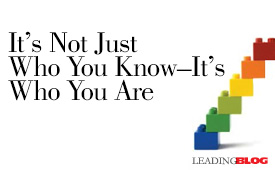
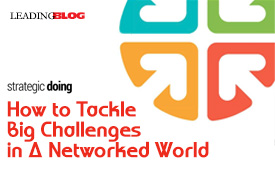
Posted by Michael McKinney at 07:28 AM
Permalink | Comments (0) | Personal Development
01.29.21

How to Reclaim Your Time and Live A Happier Life

TECHNOLOGY was supposed to give us more leisure time, but instead, it distracts us. We are pulled out of the present and into lists of things we feel we should be doing. Instead of getting time away from work, we take our work with us. It's a trap to make us feel time poor.
Time Smart by Ashley Whillans helps us to move from time poverty to time affluence. The key is how we think about time and money.
Would you rather have less money and more time or work more for more money and have less time? We tend to overvalue money and undervalue time. Because we tend to spend as little money as possible, we rarely think of trading money for time. We make trade-offs between time and money all of the time. "All of these decisions powerfully shape the happiness we derive from moments, from days, from our entire lives."
Whillans identifies six traps that make us time poor . That is too many things to do and not enough time to do them. To become time smart , we need to recognize these time traps in our lives: technology (constant interruptions that fragment our time), a money/work focus (I'll work hard now so I can afford more leisure time for a later that never comes), undervaluing time, busyness as status, aversion to idleness, and saying yes believing we'll have more time later than we do now.
How do we begin to turn this around? Whillans says to start with determining whether you are more money focused—willing to sacrifice time to have more money—or time focused—willing to sacrifice money to have more time. One is not better than the other but, "people who value money, and are in a position to be happier that way, still benefit from making time-related choices." Our focus can change over time. The older we get, the more time becomes a major focus.
We should make leisure time, but it should be the right kind. "Free time devoted to active leisure—activities like volunteering, socializing, and exercising—promote happiness far more than spending time engaged in passive leisure activities like watching TV, napping, or online shipping."
Fund time by outsourcing tasks or parts of tasks that you don't like. Do less comparison shopping (we spend hours of time to save just a few dollars), or driving two miles out of your way to save ten cents on a gallon of gas. Account for your time.
Even though research shows that "people who value time are happier, healthier, and more productive than those who value money over time, turning all of this into time-affluent habits is not easy to do let alone wrap our minds around it.
Whillans offers eight strategies to become better at prioritizing time:
1. Address Your Why
Ask why you are doing what you are doing. If it is just to kill time or for no reason, then stop doing it. One exercise that she had that stood out to me in this regard was the substitution list . Add activities that are a better use of your time. Like this:
Phone games before meetings / INSTEAD: Chat with colleagueWebsite surfing before and after lunch / INSTEAD: Walk for 15 minutes before lunch, do nothing after.
Looking through, choosing Spotify playlists in the morning / INSTEAD: Get on the road, let Spotify choose playlist.
2. Allow (or schedule) Slack Time
While you want to substitute in time-affluent activities, you don't want to pack your schedule with them. Slack time allows for spontaneity. "Prioritizing efficiency makes us more likely to miss opportunities to connect with weak ties: people who are likely to bring us creative ideas and new opportunities."
3. Know Your Calendar Mindset
Whillans is referring here to two calendar mindsets: Clock-Time People and Event-Time People. Clock-time people don't move to a new activity because it feels right, they do it because it is time to do it. On the other hand, Event-time people allow events to shape their schedule. There is a time for both. Know your basic approach and follow through on your plans accordingly.
4. Create Intentions
Be intentional about how you spend your time with specific action statements. If you want to read more books, say, "I will use my commute to listen to books on tape."
5. Implement Rewards and Punishments
If your time goals are going well, reward yourself. If not, you need to implement a cost. Apps like Beeminder "takes $5 from your credit card for every goal you don't meet."
6. Engineer Defaults
Turn off your notifications. Check less often. There are also apps—Freedom and Ransomly—to help you do this. Just say no. "Several of my colleagues already do his by engineering an auto-response in email to say, 'Thank you for your message; as a rule, I check email once a day at 8:30 a.m.'"
7. Recognize and Fight Mere Urgency
When faced with important tasks, we sometimes procrastinate and work on simpler, less important activities as an avoidance mechanism. If it is not urgent and important, schedule it for later or delegate it to someone else.
8. Make Leisure Leisurely
Are you actually enjoying the leisure time you have created? Separate the value of the activity from the cost. "Do not think about how much the vacation cost or whether the house cleaner was worth the financial investment. Instead, think about how nice it is to spend extra time with your friends and family."
We need to take the long view of our lives. Whillans says, "You need to look ahead five to ten years and think about how big life choices will influence your time choices." In a study of graduating college students, they found that "students who prioritized time were happier than those who prioritized money."
Time is not money. Money is time. And we all have only so much of it. It's time to make time a priority before we run out of it.
It's night before it's afternoon.
December is here before it's June.
My goodness how time has flewn.
How did it get so late so soon?
— Dr. Seuss
![]()
![]() Like us on Instagram and Facebook for additional leadership and personal development ideas.
Like us on Instagram and Facebook for additional leadership and personal development ideas.

![]()
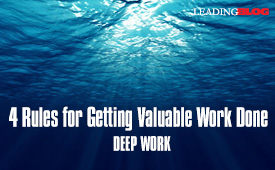
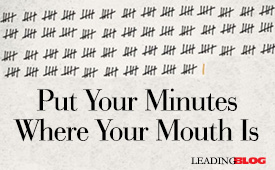
Posted by Michael McKinney at 12:03 AM
Permalink | Comments (0) | Personal Development
01.22.21

Embrace the Suck
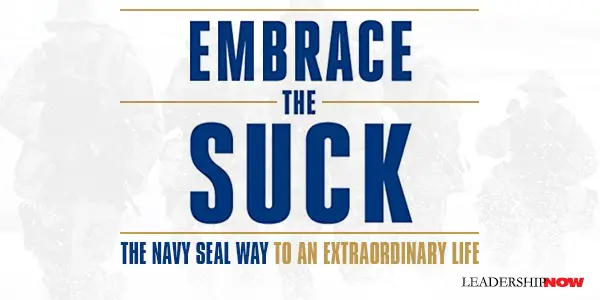
RESILIENCE is what carries us through life to reach our goals. Pain will always be with us, but if we can learn to lean into it and get comfortable with being uncomfortable, we can live a more fulfilling life.
Resilience is what Brent Gleeson's book, Embrace the Suck: The Navy SEAL Way to an Extraordinary Life is all about. He writes, "To avoid pain is to basically deny our potential. We can't develop psychological resilience without experiencing emotional pain and suffering." Resilience is about perspective and embracing reality.
The most mentally and physically tough people I know constantly practice the fine art of building resilience—deliberately pounding away at the boundaries of their comfort zone in pursuit of their passions and causes greater than themselves. Simply put, they choose adversity over mediocrity and continue pushing forward despite the odds stacked against them.
By strengthening our minds, we can overcome obstacles and pave the way to an intentional life. Gleeson provides us with several mental models to help us navigate misfortune, pain, and uncertainty. One simple but effective model Gleeson offers for this is the Five-Step Root Cause Analysis. When we understand cause and effect—the consequences of our behavior—we can grow and move forward. Observe, learn, and grow.
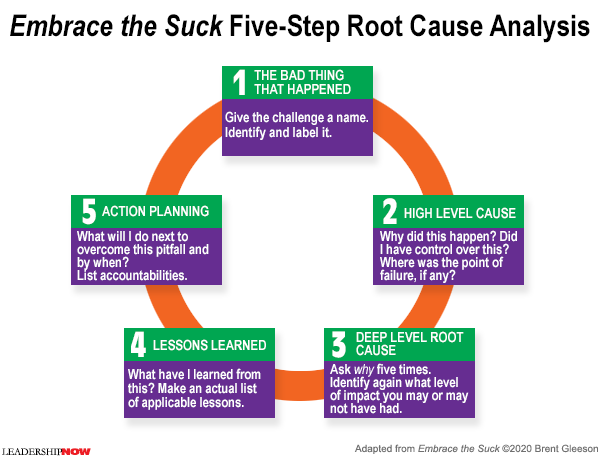
Gleeson uses the example of being laid off—the bad thing that happened to you. The High-Level Cause is at they had to downsize, keeping only the top performers. But as you dig deeper, focusing only on those issues you can control, like your actual or perceived underperformance, you can discover something actionable. Then ask what you did well and what you could work on and list them in step four. Then in step five, make specific goals that are concise, realistic, and time-bound, starting with an objective statement like "I will never lose another job for underperformance."
A useful tool for learning to identify and then control what you can control. This personal feedback loop will "place you in a constant state of course correction and improvement."
Of course, we need to be clear about our values. Your values help you know what winning looks like. "Essentially, any action or choice should clearly fit within your value lane markers. Deviation outside those markers typically ends in tragedy. You need to ask yourself what you are willing to do to live by those values and, even more importantly, what you are unwilling to do to avoid deviation." Like removing temptations.
When working towards our new goal, we have to remove anything that stands in the way of it. "Remove every opportunity for temptation and distraction—any obstacle or competing priority. Maintain total mission focus." Develop self-control.
Temptation is just a reality of life. Without it, there would be no such thing as willpower. Life will test you on a regular basis. So be prepared to ace the test!"Only focus on what's in your immediate control. Ignore everything else.
Maintaining focus on what is in our control and ignoring (or at least deprioritizing) everything else is a core tenant of the growth mindset and applies equally in achieving goals and overcoming obstacles in our personal and professional lives.
And as Gleeson points out in chapter 7, chose wisely what you suffer for. "Life is a series of choices." Successful Seals training students make it through because they "accept it as a means to a better end."
And he encourages, "If you stumble, find the root cause and move on. Don't let yourself get wrapped up in guilt, anger, or frustration, because these emotions will only drag you further down and impede future progress."
Throughout the book, you will find many mental models with practical steps to move you forward. Models like Eight Failure Realities, Five Steps for Taming Temptation, Practicing the Things That Suck, Mastering Self-Discipline, and a model for Violent Execution, among others.
How willing are you to embrace the suck? Go to war with yourself.
![]()
![]() Like us on Instagram and Facebook for additional leadership and personal development ideas.
Like us on Instagram and Facebook for additional leadership and personal development ideas.

![]()

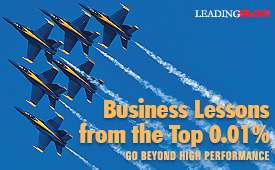
Posted by Michael McKinney at 08:05 AM
Permalink | Comments (0) | Personal Development , Problem Solving
01.11.21

It's Time to Focus on Projects, Not Ideas
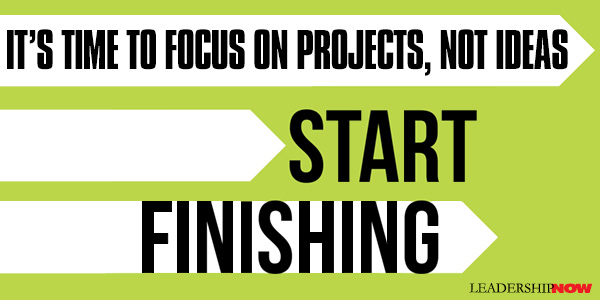
WE get distracted from what matters to us by our personal projects. Charlie Gilkey says in Start Finishing that a project is "anything that takes time, energy, and attention to complete." There are projects that keep us busy, and then there are projects that help us thrive—get us to the next level.
To get to the place where our soul longs to be, we're going to have to convert our ideas into doable projects at the same time that we're going have to get real about all the projects we are doing. The problem isn't that we're lazy or incapable—it's just that we're not doing the work that's going to enable us to thrive.Luckily, you already know the doing you need to do to move you toward thriving. Yes, it's tied to the idea that's nagging you.
To get moving, we will need to find a place in our schedule for our best projects—the ones that make us thrive. The reality of finite time means we have to choose what is most important to us here and now. To make that happen, we need intention, awareness of ourselves in relation to our work, boundaries, the courage to move forward, and discipline. (IABCD if you are into that) "Our innate talent, creativity, and drive combined with discipline are what make us forces of nature."
There are consequences to not doing our best work. We wither, and we begin to suffer from creative constipation .
Creative constipation is exactly what it sounds like. We take in ideas and inspiration that get converted into aspirations, goals, and projects, and at a certain point, if we're not pushing them out in the form of finished projects, they start to back up on us.And like physical constipation, at a certain point, we get toxic. We don't want to take in any more ideas. We don't want to do any more projects. We don't want to set any more goals or plans. We're full and fed up.
That inner toxicity becomes the broth that flavors all our stories about ourselves and the world; your head trash gets more pronounced and intense, and what we see in the world goes from bright to dark. Creative constipation leads o behaviors in which we lash out at the world—and sometimes even more intensely at ourselves. We become resentful of other—even people we love—who are doing their best work.
Gilkey covers how to make space for your project and the obstacles that get in the way of that and how to work your plan.
Start finishing today.
![]()
![]() Like us on Instagram and Facebook for additional leadership and personal development ideas.
Like us on Instagram and Facebook for additional leadership and personal development ideas.

![]()

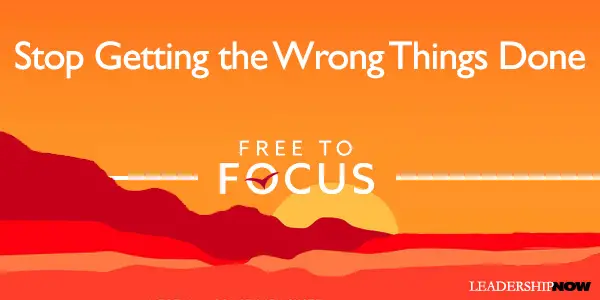
Posted by Michael McKinney at 08:16 AM
Permalink | Comments (0) | Personal Development
12.28.20

8 Steps to High Performance
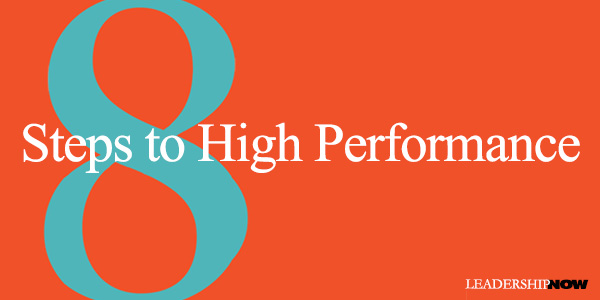
MARC EFFRON believes anyone can be a high performer. That is a person "who consistently delivers better results and behaviors, on an absolute and relative basis, than 75 percent of their peers." In 8 Steps to High Performance, he identifies eight proven performance drivers that we have the ability to implement.
Effron theorizes that each of us has factors that are the fixed 50 percent that affect our performance. They are things like our intelligence, core personality, and socioeconomic background. Some of these are genetic, and others are part of our environment growing up. (Which we can change if necessary as we grow older.) So it makes sense that we focus on practicing the things we can control that have the most impact on our performance.
The other half, he calls the flexible 50 percent . These are things in your control, like how you set goals, behave, develop, network, present yourself, and manage your sleep. Most of these boil down to getting out of your own way.
The 8 steps to high performance are:
Step One: Set Big Goals.
This step is, not surprisingly, critical. You can't deliver big results if you don't have big goals. And those goals should align with what matters most to the organization. "Bigger goals, focused on the right things, allow you to demonstrate higher performance. Bigger goals also test your capabilities and build self-confidence in your ability to deliver great results in the future. Since bigger goals are also more challenging to achieve, you're forced to build new skills and capabilities to achieve them."
Step Two: Behave to Perform.
You can control your behavior. Your behavior is what sets you apart, and it is what your boss and others you work with pay attention to. Effron shares some baseline behaviors that can help your performance—ability to connect, innovate, inspire, and model—and eleven behaviors that can derail your effectiveness like being excitable, skeptical, leisurely, bold, eccentric, a perfectionist. "High performers work hard to identify the most productive behaviors, learn new behaviors where needed, and stop showing the less helpful ones."
Step Three: Grow Yourself Faster.
The more you grow, the better you can perform, and the more opportunities you will earn. Create a Personal Experience Map by asking experts in your field to identify the most meaningful experience for you to gain. "As working professionals, we grow our capabilities about 70 percent through our experiences, about 20 percent through others, and about 10 percent through formal learning."
Step Four: Connect.
Build networks both inside and outside of work. "Those who connect more effectively have higher performance because they're able to get more insights, favors, and answers from more people. And it's almost entirely controllable by you."
Step Five: Maximize Your Fit.
Continue to grow into the needs of your organization. "You'll only stay a high performer if you adapt your capabilities and approach to what your company needs at the moment." What does your company need for you to deliver?
Step Six: Fake It.
We manage impressions all the time. "As your career evolves, your continued high performance will require you to show new behaviors. How fast you adapt to these behaviors will help differentiate you as a high performer. Some of these behaviors won't come naturally to you, and you may not be fully convinced they're the right way to manage or to work." Guess what? Growth is uncomfortable at first. Fake it until you get it right.
Step Seven: Commit Your Body.
"Your body plays a critical role in your performance; it's important to eat right, exercise, and get enough sleep." When it comes to sleep, quality is more important than quantity. Six and a half to seven hours is the sleep sweet spot. While studies seem to indicate that exercise matters a little and diet has no measurable effect on high performance, I think that may be short-sighted. And the two certainly play into long-term performance. It's a package.
Step Eight: Avoid Distractions.
Effron dismisses many of today's management ideas. And we do have to careful of the latest fads enlisting them as some sort of solution to all of our problems. He picks apart the strengths movement, emotional intelligence, 10,000 hours of practice, and growth mindset, among others. In the limited perspective he describes for each of them, he is right, but a thorough understanding of these concepts provides valuable insights for being a high performer. For example, emotional intelligence has very little to do with personality and is more about understanding your effect on others. Weaknesses need to be managed and often improved on, and a growth mindset is not about individual intelligence. Al of these ideas will help you increase your performance.
When looking over the 8 steps, evaluate yourself on which ones you have mastered and which ones you need to work on. You might not be able to hit all of the steps but take those you need to work on, one at a time, and you will be headed in the right direction.
8 Steps to High Performance is quite valuable in showing you how to get out of your comfort zone to begin to contribute to your potential. Each chapter ends with a section called "What Can Get in the Way" that highlights some of the rationalizations and obstacles one might encounter in taking the next step in their development.
![]()
![]() Like us on Instagram and Facebook for additional leadership and personal development ideas.
Like us on Instagram and Facebook for additional leadership and personal development ideas.

![]()
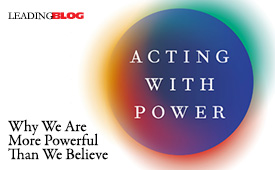

Posted by Michael McKinney at 01:27 PM
Permalink | Comments (0) | Personal Development
12.18.20

What Do You Do When Life Ambushes You?

WE are conditioned to believe that to be happy, for life to be good, everything should be going our way. Life is supposed to be comfortable when done right. Most self-help books are based on this line of reasoning.
But when you think about it, a constant state of comfort is numbing to the human spirit. It takes us nowhere. What really makes us feel alive are those times when we are challenged, pushed, distressed. In those moments, opportunities arise, our mind expands, and we grow—we learn.
What do you do when life ambushes you? When you are disabused of the status quo. Times like this can either shut you down or open you up. Ambushes create a question.
Former Navy Seal Jason Redman says when a life ambush— "a catastrophic series of events that knock the wind out of you, pin you to the pain, and forever alter your reality" —hits you, you must overcome. You must get off the X.
The X is the event that hit you. And we can get stuck there—sometimes for years. He says people respond to life ambushes in three ways. They are destroyed by it and can't stop rehashing it. Or, like most people, they get through to the other side, but it is always a struggle for them. Or the third group turns the ambush into a launching point.
In Overcome: Crush Adversity with the Leadership Techniques of America's Toughest Warriors, he shares the story of he was caught in an ambush that left him severely wounded, almost losing an arm and half of his face shot off. He was caught on the X—the "kill zone, the point of attack" –bleeding out, sure he was going to die. He had to stay awake to stay alive. He had to overcome.
What would you do? "How you handle a life ambush, how you handle any crisis, is dictated by how well you lead yourself, and how well you lead others." After an ambush, you have to take back control of your life and move from defense to offense or what he calls the Overcome Mind-Set. "Self-discipline is the best way to take control of your life again after an ambush."
Your first move is to get off the X. Identify the issue and find a new direction. You have to REACT: Recognize your reality, Evaluate your position, Assess possible exit routes, Choose a direction and communicate it, and Take action . Moving is the key to getting off and staying off the X.
Once you've been through a life ambush, it's so easy to look back at where you were in the past and think, "Getting back there is my goal." It isn't. It can't be. You have to figure out what your new 100 percent is and build on it.If there is an advantage to experiencing a life ambush, it's the clarity it can bring about what is truly important in your life. Crisis crystalizes your thinking, and you become clear about where you stand—often for the first time.
Redman believes there are five areas of your life that when maximized will help you to face any ambush when it comes. The key self-leadership areas are physical, mental, emotional, spiritual, and social.
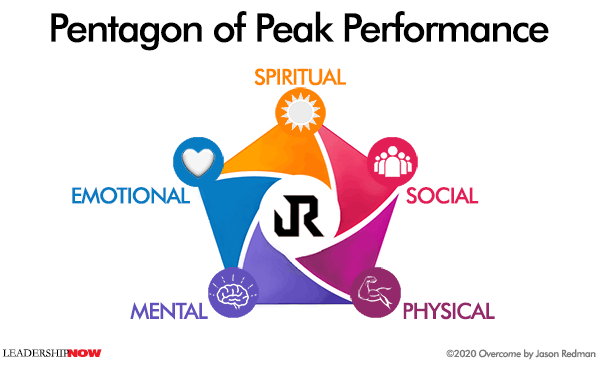
Physical Leadership: "If you are ignoring your physical health, you're in denial about the risks you are unnecessarily taking. Physical fitness is not just about being ripped or strong; it is about having the energy needed to lead. Physical fitness is the base. Everything is supported by this base."
Mental Leadership: "You build mental leadership through broadening your perspective, increasing your knowledge, and getting outside of your comfort zone. An interesting recommendation from the Brain Center was to find a sport that requires balance, like paddle boarding, surfing, or even cycling. These exercises are great for mental training because you are using the muscles on both sides of your body, causing your brain to use both hemispheres."
Emotional Leadership: "What we do with our emotions is a choice. We choose to allow ourselves to get angry and explode. We choose to verbally express our negative thoughts and frustration. Controlling our emotions begins by understanding the scope of our emotions and what patterns we typically fall into when we react."
Social Leadership: "Often in those hardest moments you only have your close friends and family, and if you did not take the time to nourish those relationships, you will be trying to overcome the near impossible, climbing out of a deep hole without a rope or assistance."
Spiritual Leadership: "Spiritual leadership means recognizing that you are a unique part of a much larger world and picture, and investing time and resources to make your community and world better. If you struggle with spiritual leadership, try a simple practice: gratitude. Gratitude forces you to look outside of yourself, to focus on something beyond your problems."
If you are not maintaining each of these five areas, you will undermine your ability to lead others.
A Crisis Is a Launchpad
Overcome offers an approach to get you off of your X with a never-quit attitude. It's about breaking down the barriers in your mind and keep moving forward despite your fears. It's about perspective and gratitude.
A life ambush is miserable when we go through it. Maybe we don't fully recover from it, but it creates a whole new path. So many people get stuck on what they lost or what they no longer have. They want the past so much that they're not willing to turn around and look forward at what is in front of them. They fail to even consider, "Okay, what are my new opportunities, and could something better come of it."
Choose to overcome—very good advice from someone who walks the talk.
![]()
![]() Like us on Instagram and Facebook for additional leadership and personal development ideas.
Like us on Instagram and Facebook for additional leadership and personal development ideas.

![]()
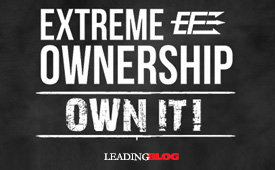
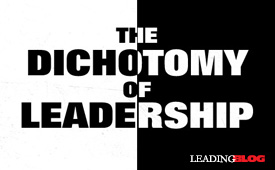
Posted by Michael McKinney at 04:32 PM
Permalink | Comments (0) | Personal Development , Teamwork
11.25.20

How You Become Optimistic
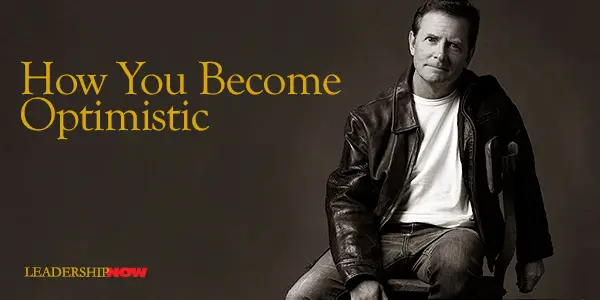
MICHAEL J. FOX has lived with Parkinson's disease since 1991. He says he has developed a sort of détente with the disease that requires adaptability and resilience—and a lot of his characteristic optimism. But recently, on top of that, he had a spinal cord injury that required surgery and months of rehabilitation, going from wheelchair to walker to cane to finally walking. And then he fell.
In his book No Time Like the Future: An Optimist Considers Mortality, he writes that the fall brought him "down in more ways than one. It isn't that I am hurt; I've been hurt many times. I've been through a lot, suffered the slings and arrows. But for some reason, this just feels personal." He says, "Make lemons into lemonade? Screw it—I'm out of the lemonade business."
The accident created doubt. How could he put a positive spin on this? How could he encourage others if he didn't have what it took? He told Kate Coyne at People magazine:
"I went on to think, 'Who am I to put out hope? Like optimism is a panacea? Just commodify hope and say it's something you can use to make your life better?'"
"Parkinson's, my back, my arm … it still didn't add up to moving the needle on the misery index compared to what some people go through," he continues. "I thought, How can I tell these people, 'Chin up. Look at the bright side. Things are going to be great?'"
But through it all, he reclaimed his optimism and found the foundation of optimism.
"Optimism is really rooted in gratitude. Optimism is sustainable when you keep coming back to gratitude, and what follows from that is acceptance. Accepting that this thing has happened, and you accept it for what it is. It doesn't mean that you can't endeavor to change. It doesn't mean you have to accept it as a punishment or a penance, but just put it in its proper place. Then see how much the rest of your life you have to thrive in, and then you can move on."
No matter what our situation is, gratitude brings joy into our life. Life will always present us with difficulties, but gratefulness helps us push through. Gratitude is what turns a bad year into a good one—a challenge into an opportunity.
See how others have found something to be grateful for this year—2020.
Robert Frost told a reporter in 1954: "In three words, I can sum up everything I've learned about life. It goes on. In all the confusions of today, with all our troubles . . . with politicians and people slinging the word fear around, all of us become discouraged . . . tempted to say this is the end, the finish. But life — it goes on. It always has. It always will. Don't forget that."
Be grateful.
![]()
![]() Like us on Instagram and Facebook for additional leadership and personal development ideas.
Like us on Instagram and Facebook for additional leadership and personal development ideas.

![]()

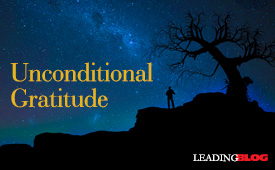
Posted by Michael McKinney at 01:01 PM
Permalink | Comments (0) | Personal Development
11.11.20

The Myth of Experience
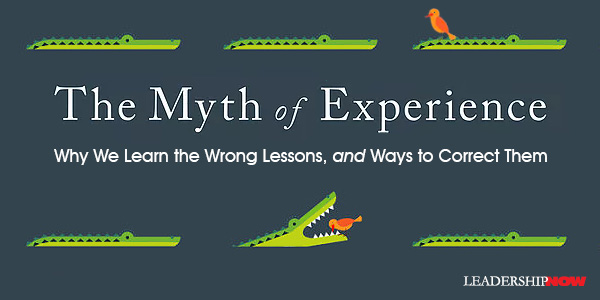
WE LEARN from experience. We'd be silly not to. But the question becomes, what are we learning? Experience is a powerful teacher, and therein lies the problem. We may think we are gaining wisdom, when in fact we are just reinforcing the wrong lesson just as powerfully.
In The Myth of Experience, Emre Soyer and Robin Hogarth write that "while experience still leads to learning, there is no guarantee that its lessons accurately represent the reality of a situation." We naturally assume that what we see is all there is.
Experience rarely gives us a complete picture of the situations we face. What we think is reality is just what we can see. And this is true in certain circumstances—in learning environments that are kind. In kind learning environments like cycling and tennis, "decision makers receive abundant, immediate, and accurate feedback on their actions and the rules of the game remain largely constant." If everything we did was like tennis or cycling, then the lessons we gain from experience would be fairly reliable. But many/most experiences in life are not like that.
Much of the time, our circumstances are not that reliable. Our activities fall into the category of wicked learning environments , "where experience is constantly subject to a variety of filters and distortions." That means what we think we are experiencing does not correspond with reality. These circumstances "may not only fail to represent a given situation accurately but also constantly feed us a convincing illusion. The rules can change suddenly and dramatically, rendering our institutions obsolete."
So, what do we do? Rejecting what we think we know can be very difficult.
Two Crucial Questions You Need to Ask
Recognizing that what we are experiencing may not be connected to reality is the first step. Next, ask two questions about what you are experiencing:
What's missing?
Is there something important missing from my experience that I need to uncover is I hope to fully understand what is happening?
And What's irrelevant?
What irrelevant details are present in my experience that I need to ignore to avoid being distracted from what is happening?
How We Learn from Experience
Our experiences quickly become part of a story we tell ourselves. And these stories become the basis for the judgments and predictions we make. They help us to form cause-and-effect relationships. While these stories can be beneficial to us, they can also be too simple to adequately capture the reality of the situation. And we can see stories where none exist—no cause-and-effect. When we tell this story enough, it can be hard to accept anything else.
If not handled with care, our experience can make us believe in the wrong causes, expect unrealistic consequences, evaluate performances inadequately, make bad investments, reward or punish the wrong people, and fail to prepare us for future risks. Worse, we may not even notice that we are acting upon faulty stories and fail to revise them in a timely and appropriate way. As a result, we may end up solving the wrong problems, using inadequate methods, and failing to achieve our objectives.
And we need to be careful about learning from the experiences of others. We've all seen and read them: The 8 Things Billionaires Do Every Day. What the Most Productive Do Before Breakfast. 10 Common Traits of Effective Leaders.
These lists can be helpful in that they get us to think about our habits and give us insight into what's possible, but how accurate are they. I mean, did all of the people interviewed diligently do everything on the list? Are these things they do the result of their success or the cause of their success. Are they predictive? What about people who did these things and failed?
As with virtually all complex problems in life, the value of any strategy for success depends on context and circumstances.
The road to success for some people and organizations may involve unfairness, deceptions, or other unethical behaviors. These costs are also often overlooked when people experience, analyze, aspire to, and glorify the resulting achievements. Yet we may find that successful ends can't be justified by immoral means.
For all these reasons, even if they sound convincing and commanding, lessons of experience based exclusively on others' success are unreliable. They're likely to leave us with a belief that success is more objective and predictable than it really is.
If we are to learn the right lessons from experience we need to ask ourselves, what's missing and what's irrelevant from our situation. And The Myth of Experience illuminates the way.
![]()
![]() Like us on Instagram and Facebook for additional leadership and personal development ideas.
Like us on Instagram and Facebook for additional leadership and personal development ideas.

![]()
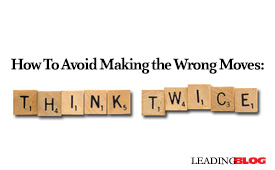

Posted by Michael McKinney at 05:43 PM
Permalink | Comments (0) | Personal Development , Thinking
08.14.20

The Fear of Looking Stupid
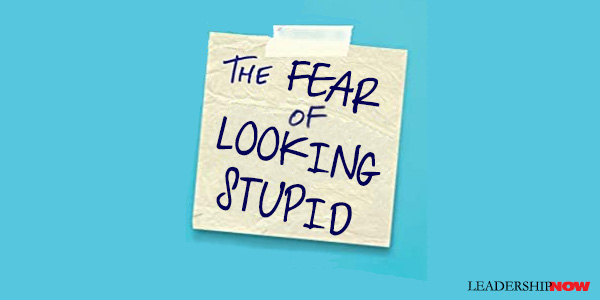
NO ONE likes to look stupid. And it keeps us from trying new things or exploring those crazy ideas and dreams that we have been carrying around. The trick, of course, is getting to the place where you don't care what other people think of you. And that's easier said than done.
It's not as simple as telling yourself to just do it. Comedian, entrepreneur, and author of The Art of Making Sh!t Up, Norm Laviolette says the way to get to that place is to slowly step into it as you would train for a marathon. You wouldn't just run a marathon. You would start with short runs and gradually build up.
Maybe you don't immediately hit the open mic stage, but rather you sign up for an improv class. That's all, just sign up. You don't even have to commit in your mind to go, just execute the simplest first step, which is signing up. You don't even need to tell anyone! Then once you do that, force yourself to go to the first class. No commitments after that.What you will find is that you now have put yourself in a situation where "looking stupid" isn't perceived as stupid at all, and what you are doing is actually the new normal. Sure, you are taking a risk by being in an improv class. But ultimately it is a very mitigated risk, because the entire environment is set up in such a way that everyone is facing that risk together.
Since everybody is facing the prospect of potentially looking stupid, ultimately no one does. As this new normal starts to feel more and more comfortable, you start to rewire your brain and how it perceives what is considered "stupid looking."
You can apply this to anything. And it is infinitely easier when we realize that other people are not thinking about us as much as we think they are. What are they thinking about? Themselves. Feel liberated yet? We are the ones that give people permission to hold us back from being creative and trying new things.
And then there are those who cast doubt when we tell them what we are up to. Laviolette says you need to take control of the conversation.
I have found that making a strong declarative statement along the lines of "So, I'm doing X now," tends to stop other people from offering overly negative judgments about what it is I'm doing. It is easy for people to point out why you shouldn't begin something, but it is much more difficult for people to tell you why you should stop doing something, especially if you follow up with the reason why you like doing it. Even the biggest blowhard tends to not want to crush someone else's good vibes.The declarative statement takes the power of judgment away from the responder. Once you state what it is you are doing, most people tend to shrug their shoulders and think to themselves, "I guess she is doing that now." They may approve or disapprove, but ultimately if they see that you are already committed, they tend to move on to other subjects.
The fear of looking stupid is all in our heads. When we step out, we grow.
![]()
![]() Like us on Instagram and Facebook for additional leadership and personal development ideas.
Like us on Instagram and Facebook for additional leadership and personal development ideas.

![]()
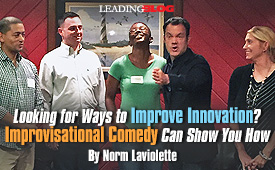
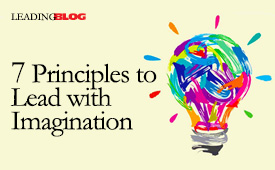
Posted by Michael McKinney at 06:10 PM
Permalink | Comments (0) | Creativity & Innovation , Personal Development
07.29.20

The 9 Strategies of Emotionally Intelligent Leadership
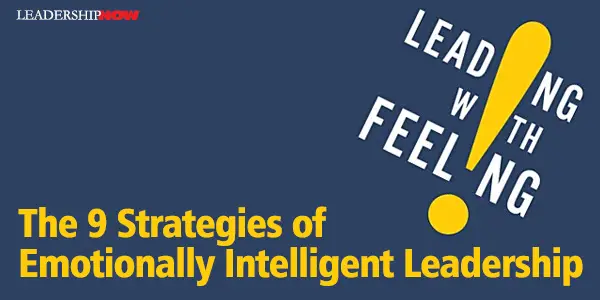
EMOTIONAL INTELLIGENCE is a prerequisite to good leadership. To attempt to lead without it is self-serving. It may get the job done, but it's all about you. It's not the kind of leadership that brings others along.
Emotional intelligence (EI) is an awareness of not only our own but other's emotions and the ability to manage those emotions in ways that help people move ahead in dealing with difficult situations.
In Leading with Feeling, Cary Cherniss and Cornelia Roche worked with 25 leaders to analyze how they actually used their EI to deal with challenges and build relationships with others. They observed abilities and competencies common to leaders who have EI. Breaking that down from a practical perspective, they were able to outline nine practical strategies for understanding and developing EI.
The first two strategies provide the foundation that the other practices build on. One must first acknowledge the emotional climate they are dealing with. And this not really a once and done step. It is ongoing as emotions change over time.
1. Monitor the Emotional Climate
Most of the outstanding leaders were not just aware of their emotions or skillful in identifying what emotions other people were experiencing. They actively looked for subtle signs of emotion in order to influence the course of events. It was an active, purposeful process, and when they detected a potential problem, such as discouragement among the top management team spilling over and infecting the rest of the employees, they took action.
This is not to say a leader succumbs to the same emotions, but awareness allows them to deal with the situation more effectively.
2. Express Your Feelings to Motivate Others
Knowing your own feelings allows you to manage them and present them constructively so that you set the right tone. In my view, wearing your emotions on your sleeve is not appropriate for a leader.
Leaders ideally should maintain an even keel in order to help others manage their own emotions. In short, it is usually better for leaders to express emotion but maintain control.
In one example, "Yolanda did not try to minimize the emotions stirred up by this situation. She actively engaged with those emotions and with those who were feeling them. She allowed herself to feel the emotions and then used the emotions to guide her own actions."
3. Consider How Your Own Behavior Influences Others' Emotions
This is a critical component of self-awareness and emotional intelligence. It is not a manipulation to understand that our words and actions can dramatically impact the emotions of our team for better or worse. For instance, "when leaders become angry, they tend to discourage their subordinates from sharing valuable information with them" to their own ruin. It behooves any leader to take measures and a thoughtful approach in anticipating what their team needs.
4. Put Yourself in Others' Shoes
Emotionally intelligent leaders try to gain the perspective of others to get a fuller take on the situation. It leads to better decisions. Doing this is best done face-to-face.
All people like to be respected and understood. An awareness of their experiences is a show of respect and gets to not just the how but the why of people's feelings. This strategy helps to increase empathy "which contributed to better relationships, but it also contributed to better analysis and action."
5. Use Your Understanding of Emotion to Figure Out the Underlying Dynamics of a Situation
What are their feelings telling us? There is often more to a person's emotions than what we see on the surface or the emotional dynamics of the situation. This is important to decipher organizationally before implementing a change program.
6. Reframe How You Think About the Situation
It is critical to remember that "the way in which one thinks about people and situations affects the way in which one manages emotions."
We found that the leaders in our study reframed the way they thought about emotions in five different ways:
- They expected the world to be complicated and messy
- Rather than playing the blame game, they looked at factors in the situation that might be causing, triggering, exacerbating, or maintaining a problem
- They adapted an inquiring mindset
- They managed their emotions and those of others by focusing on the task at hand
- They tried to adopt a more positive mindset when faced with challenges
Adopting an inquiring mindset also can help us to use other reframes. It helps us to appreciate just how complicated and messy the world is, and switching from a "judging" mindset to an inquiring one can help us avoid the blame game.
7. Create Optimal Interpersonal Boundaries
Consider managing emotions by modifying the situation by creating more rigid or more flexible boundaries around the topics people discuss or the boundaries between you and others. Leaders in the study "often established, maintained, or tightened boundaries in order to mitigate disruptive emotions. However, they also loosened boundaries, which encouraged the expression of positive emotions, to facilitate the development of better relationships with peers, employees, bosses, or clients."
8. Seek Out Others for Help in Managing Emotions
When it comes to managing emotions, the nest leaders value the help of others in the form of advice or simply sharing the emotional burden. "It turns out that seeking out and using the help of others is often the most emotionally intelligent thing that a leader can do in critical situations."
9. Help Others Develop Their Emotional Intelligence Abilities
Emotionally intelligent leaders also coach others in the management of emotions. Most often, this is done one-on-one to raise awareness with a colleague. Coaching others in this way requires control over your own emotions, sensitivity, and the ability to create an atmosphere of trust.
These nine strategies are not linear. We tend to use some strategies more than the others. You will return to strategies 1 and 3 over and over again. It is not a science but an art.
![]()
![]() Like us on Instagram and Facebook for additional leadership and personal development ideas.
Like us on Instagram and Facebook for additional leadership and personal development ideas.

![]()
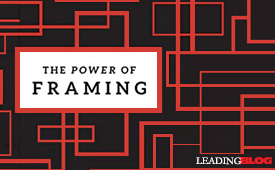

Posted by Michael McKinney at 06:10 PM
Permalink | Comments (0) | Personal Development
07.15.20

Personality Isn't Permanent: Personality Myths That Hold You Back
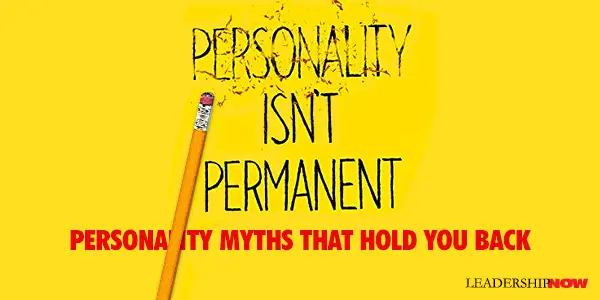
WE tend to think that we are who we are and there's not much we can do about that. But the fact is, we choose our personality and who we are. Your personality is shaped by the choices you make over time.
Benjamin Hardy takes to task the idea that we were born hardwired as he person we are, and we cannot change that in Personality Isn't Permanent.
Personality tests are part of the problem. I like to think of them as a snapshot and not a life sentence. They are like a frame in a movie—just a part of the story of your life. They tell you where you are and, in that way, they are very valuable.
Personality tests are self-reported. Our view of ourselves is constantly changing based on our current focus, context, and emotions.Anyone who's ever done something great with their life had to transform themselves from who they are to who they became. They had to act accordingly beyond their current personality and circumstances to eventually do what they did and become who they became.
The following myths limit your growth and potential. Freeing yourself of these myths will help you to take charge of the person you want to become.
Myth #1: Personality Can Be Categorized into "Types"
There are no personality types that lock us into a way of being. These labels we take on tend to excuse us from taking personal responsibility for the behavioral outcomes we experience. We are not as limited in our responses as a personality test would make us believe. We are not stuck.
Under this paradigm, the way you react to life is just "who you are," and you shouldn't be ashamed of it. You shouldn't try to change who you are, and you couldn't if you tried. Even if those traits are limitations, there is nothing you can do about it. Just live with the constraints God or your DNA has given you.
We can shape our personalities to serve our goals. "Your personality should come from your goals. Your goals shouldn't come from your personality."
Myth #2: Personality Is Innate and Fixed
Our personalities change over time. Who do you want your future self to be? Based on where you want to go, what kind of person do you need to be?
Who you want to be in the future is more important than who you are now, and should actually inform who you are now. Your intended future self should direct your current identity and personality far more than your former self does.
We should use our future self as the filter for developing our personality now. "Your future self should be evolved and different from your current self. Successful people start with a vision of their future self and use it as the filter for everything they do."
Myth #3: Personality Comes from Your Past
The idea that you are defined by your past or that the past is the best predictor of your future is true, but not because you can't change. You simply haven't for another reason. Hardy lists four reasons that keep people stuck in their past:
- They continue to be defined by past traumas that haven't been reframed.
- They have an identity narrative based on the past, not the future.
- Their subconscious keeps them consistent with their former self and emotions.
- They have an environment supporting their current rather than their future identity.
Past events should inform and change our present and future because we are learning from them. If not, we shortchange our futures. "How we describe, interpret, and identify with our past has far more to do with where we are, here and now, than it has to do with our actual past." British philosopher Alain de Botton once wrote, "Anyone who isn't embarrassed by who they were twelve months ago isn't learning enough."
Myth #4: Personality Must Be Discovered
Our personality, like our passion(s), is created by us. It's not discovered. It's designed. We need to be intentional about it. It is a by-product of the decisions we make. Hardy's friend Kary is trying to find herself and her passion without success. Hardy comments:
What Kary fails to understand is that inspiration follows action, not the other way around. Lightning isn't going to strike for her. Unless and until she takes action, her confidence and imagination will remain low. She needs to decide what she wants and begin moving forward. With progress—even minuscule progress—her clarity and confidence will increase, opening the door for greater flexibility and change.
Myth #5: Personality Is Your True and "Authentic" Self
Your "authentic self" is a moving target, especially if you are one to explore possibilities and are growing. To define yourself with a fixed, authentic self is self-limiting and rigid. It lacks imagination and a growth mindset.
Your authentic self is what you most believe in and who you aspire to be. Moreover, your authentic self is going to change. Being authentic is about being honest, and being honest is about facing the truth, not justifying your limitations because you don't want to be uncomfortable having hard conversations.
The Gap and the Gain
Hardy devotes the rest of the book to showing us how to deal with and move on from each of these prevailing myths of personality. He deals with important issues like transforming your trauma and shifting your story by living in the gain rather than the gap and focusing on what is missing.
When you're in the gap, you can't enjoy or comprehend the benefits in your life. All you're focused on is why something wasn't how you thought it should have been. For instance, you might live in a great house. But if you're in the gap, then all you might see is what's wrong with your house. You may have an amazing partner but only see what you believe to be wrong or missing in them.
As we get older, we tend not to put ourselves into new contexts, so our personality become predictable. Stanford psychologist Lee Ross says, "We see consistency in everyday life because of the power of the situation." Hardy adds, "Putting yourself in new environments, around new people, and taking on new roles in one of the quickest ways to change your personality, for better or worse."
Your personality is your choice.
![]()
![]() Like us on Instagram and Facebook for additional leadership and personal development ideas.
Like us on Instagram and Facebook for additional leadership and personal development ideas.

![]()


Posted by Michael McKinney at 02:58 PM
Permalink | Comments (0) | Personal Development
06.26.20

The Coffee Bean

HOW we react to our circumstances makes all the difference. Whether we are defeated by them, hardened by them, or whether we transform them depends on our mindset.
Jon Gordon and Damon West present the story of The Coffee Bean. The story follows high school student Abe who is weighed down by worries about football, criticisms, negativity, and his parent's relationship issues. His science teacher Mr. Jackson helps him to shift his perspective through a metaphor on life.
Life is often like a pot of very hot water. It can be a harsh, stressful, and difficult place. You'll find yourself in environments and facing conditions that test who you really are, and can change, weaken, or harden you if you let them.
Mr. Jackson asks him to consider what happen to a carrot, an egg, and a coffee bean when they are boiled. The carrot is weakened. The egg becomes hardened. But the coffee bean transforms its environment—the boiling water. Mr. Jackson tells him:
No matter how hard things get, or how hopeless things look, don't give up. Realize that we don't create our world from the outside in. We create it and transform it from the inside out.
If you think you are a carrot, you will believe the power and forces outside you are more powerful than who you are on the inside, and you will become weaker.
If you think you are an egg, you will believe the negativity in thew world has the power to harden your heart and cause you to become negative like the world.
But is you know you are a coffee bean, you will not allow the outside world to impact you. You will know the power inside you is greater than the forces outside you, and with this insight, you will transform your environment and the world from the inside out.
This is a powerful lesson for life. And as the story continues, we also learn that it is easy to forget when the pressures and circumstances around us become great. Fear and worry are powerful emotions that easily sidetrack our best intentions and critical thinking skills. In these times, remember, we can be the coffee bean.
The story is well told and worth getting into the hands of people you know and care about.

![]()
![]() Like us on Instagram and Facebook for additional leadership and personal development ideas.
Like us on Instagram and Facebook for additional leadership and personal development ideas.

![]()


Posted by Michael McKinney at 09:54 AM
Permalink | Comments (0) | Personal Development
05.11.20

4 Tips For Giving Great Feedback
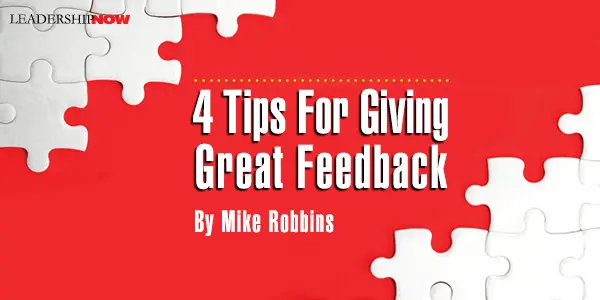
A S CHALLENGING and vulnerable as receiving feedback can be, giving it can also be quite difficult. And for us to be successful leaders, teammates, parents, friends, spouses, and human beings, it's important to give feedback effectively to those around us.
According to a study conducted by psychologist Tessa West of NYU for the NeuroLeadership Institute, we have an automatic fight-or-flight threat response in our nervous system when we're receiving feedback, which exists just as significantly when we're giving it. So, it's essential to have some compassion for ourselves when we're in situations where we have to give feedback to others. And it's also important that we enhance our capacity—emotionally and practically—for giving feedback.
There are four key things to remember when giving feedback to others. Keeping them in mind can help us get past the defensiveness and self-criticism that is often triggered by feedback so that it can be well-received and have the positive impact we're intending.
1. Intention
It's critical to check in with ourselves about the intention behind our feedback. In other words, why are we giving it in the first place? Do we genuinely want the other person to be more successful? Are we annoyed with this person and want to let them know why? Do we have any conscious or unconscious bias? Are we trying to prove something or defend ourselves? Do we want to control them or the situation?
There are all kinds of reasons why we give feedback to others, and sometimes there is more than one. But being real with ourselves about our motivation can help us determine whether it's even going to be helpful. Assuming we decide that it is, making sure our intention is genuine and positive will make it more likely that the person will be receptive to it. And by giving feedback to others on our team with positive intention, we set the tone for our culture in this regard.
2. Permission
Unsolicited feedback, even if it's spot-on and valuable, can be hard to take and even disrespectful. Asking someone if they're open to our feedback, while sometimes stressful, is important to do and much better than just launching into it. This is true even if we're their boss, parent, or mentor, or in any other type of relationship where permission for our feedback may seem implied. Making sure that we have explicit permission to give feedback shows that we respect and value the person to whom we're giving it. It also usually makes feedback feel less like judgment and more like help, allowing the person to be more receptive to what we have to say. Creating a team standard that we have permission to give each other feedback is also important. And, even if we do that, asking someone for specific permission in the moment before giving it is essential.
3. Skill
Giving feedback effectively takes skill. And even though it can be challenging, it's definitely something we can improve upon the more we practice and dedicate ourselves to doing it. Because giving and receiving feedback can be a vulnerable experience for everyone involved, it requires attention, commitment, awareness, and courage to do it well. It's often the hardest type of sweaty-palmed conversation. The more willing we are to do it, the more we can develop our skill of giving feedback successfully. And there are, of course, different ways to give feedback effectively. Oftentimes, we may give it directly and explicitly as part of a review, development conversation, or team debrief. Other times it may be subtler and not even seem like feedback at all, but more of a question, suggestion, or conversation.
4. Relationship
The most important aspect of giving effective feedback is the relationship we have with the person or people we're giving it to. We can have the most positive intention, explicit permission, and a lot of skill in how we deliver it—but if our relationship isn't strong or it's actively strained, it'll be very difficult for us to give feedback to someone and have them receive it well. I could get the same exact feedback from two different people but react to it quite differently depending on my relationship with each of them. Let's say, in one case, I know the person cares about me, appreciates me, and believes in me. I'm much more likely to be open to their feedback and to take it positively. Therefore, making sure the relationships we have are strong and authentic helps us ensure that we can give feedback effectively when we need to do so. If the person giving feedback is someone I don't know as well or may have some unresolved issues with, it's less likely that I'll be open and take their feedback well. If we find ourselves in a situation where we have to give feedback to someone with whom we don't have a strong relationship, it's important to know that this will definitely have an impact. Anything we can do to acknowledge this in an authentic way and work to enhance or improve the relationship will bene t our ability to provide feedback to them in the present moment and in the future.
All four of these things—intention, permission, skill, and relationship—are important to remember when giving feedback. And they're also important to think about from a growth mindset perspective when receiving feedback. We want to be sure to check in with and pay attention to what the other person's intention might be with their feedback for us, to explicitly grant others permission to give us feedback, to communicate about how we like feedback to be given and to proactively work to strengthen our relationships with the people around us.
Giving and receiving feedback isn't easy, but it's so important for our growth and development, as well as that of our team. Being able to embrace and even enjoy the sweaty-palmed nature of feedback is something that can allow us and our team to perform our absolute best.

Mike Robbins is the author of five books including his latest, We're All in This Together: Creating a Team Culture of High Performance, Trust, and Belonging. He's a thought leader and sought-after speaker who teaches people, leaders, and teams to infuse their lives and businesses with authenticity and appreciation. As a leadership expert, he partners with some of the top organizations in the world helping enhance performance, trust, and belonging including Google, Wells Fargo, Microsoft, Schwab, eBay, Genentech, the Oakland A's, and many others.
![]()
![]() Like us on Instagram and Facebook for additional leadership and personal development ideas.
Like us on Instagram and Facebook for additional leadership and personal development ideas.

![]()
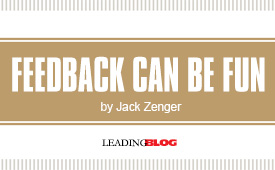

Posted by Michael McKinney at 03:00 AM
Permalink | Comments (0) | Personal Development
05.08.20

The #1 Leadership Skill for the "Covid19 War" – Inner Peace
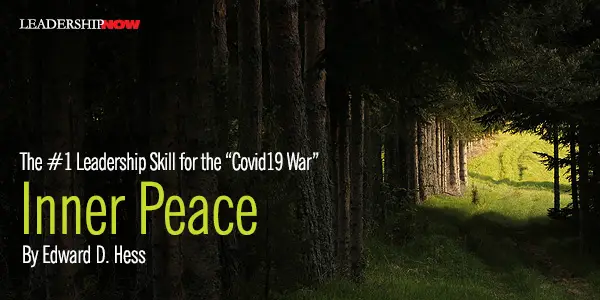
COVID19 is a health crisis; an economic crisis; a social crisis; a political crisis; and a geopolitical crisis. It is a crisis dominated by unknowns and huge downsides. It is an existential crisis — life or death. It generates personal fears, insecurities, and stress, all of which can inhibit high-quality thinking, decision making, and effective collaboration, which is mission-critical in such times.
How does one lead on a daily basis in an environment which is volatile, uncertain, and constantly changing?
How does one lead in an environment where the trade-offs could be stark: human life or human financial survival versus organizational financial losses?
How does a leader keep his or her emotional balance in order to role model the desired behaviors needed to enable the highest levels of organizational — human cognitive, emotional, and behavioral performance?
Such an environment requires leaders to be the best thinker they can be, the best compassionate listener they can be, and the best collaborator that they can be. That requires leaders to manage their fears, insecurities, and ego in a way that enables Hyper-Learning — the continuous ability to learn, unlearn and relearn by adapting to the reality of the world as it evolves overcoming the natural human reflexive way of being that values efficiency, speed, confirmation of what one believes, the affirmation of one's ego and cohesiveness of one's mental models.
Leaders will need to bring their "Best Self" to work every day — to bring your Best Self into every meeting and into every conversation. Being your Best Self requires you to be more "selfless'' and more "other" oriented. That requires "Inner Peace, which is having a Quiet Ego, a Quiet Mind, a Quiet (calm) Body, and a Positive Emotional State.
How well one leads, thinks, and engages with others depends on how well one manages and optimizes what's going on in one's mind, brain, and body. Inner Peace is based on science and ancient philosophies and is a state of inner stillness and calmness that enables you to embrace the world with your most open, non-judgmental, fearless mind with a lack of self-absorption. Inner Peace helps you reduce internal noise and distraction and helps you align your mind, body, brain, and heart — so you can better engage with the outer world.
Inner Peace enables heightened awareness, reflective listening, and high emotional engagement with others and the highest levels of critical, innovative, and emergent thinking, all of which are needed to lead in disruptive times.
Inner Peace does not come easily. It requires the daily use of practices. It requires rigor and self-discipline and acceptance of the science which clearly states that we are suboptimal learners and thinkers who are "wired" for speedy efficient processing; seeking confirmation of what we believe; affirmation of our egos; and maintaining cohesiveness of our mental models — none of which enables the highest performance in volatile and uncertain situations which require Leaders to "be good at not knowing" and at enabling the highest levels of collective intelligence within their teams.
Personal Daily "Inner Peace" Practices
Achieving Inner Peace takes deliberate daily practice. Here are some practices that have worked well for leaders that I know well and for myself.
Start each day with a 3-5 minute Mindfulness Meditation Practice building up over months to 20 -30 minutes each morning. Then do a 5-7 minute Deep Breathing Practice (such as Coherent Breathing); then review your list of Daily Intentions (a short list which you need to create of how you intend to behave each day in each human engagement) and visualize yourself behaving in those ways.
For example, here are some of the behaviors in my Daily Intentions List: "Be Kind; Be Caring; Be a Positive Life Force, not a Negative One; Smile; Maintain Inner Calm via Deep Breathing; Be Really Present; Really Listen; Don't Rush to Judge; "Yes, and" not "Yes, but"; "My hypothesis is"; Listen to learn not to confirm and "Slow Down" to be totally present. Mentally visualize yourself behaving in your desired ways. Visualize, for example, how you would behave to be kind.
During your day, be very aware of your heart rate, your body- feeling hurried or rushed or stressed so that you can take a couple of minutes to "Slow Down" via deep breathing to become calm before each meeting. Be disciplined and schedule four 10-minute breaks in your day to be alone and just to calm your mind and body — to re-center yourself. Get yourself into a positive emotional state where you can enable others appropriately. Do not go into a meeting carrying emotions or thinking leftover from your last meeting. Take 2-3 minutes and regain your calmness — your inner stillness — your Inner Peace before you start each meeting.
At the end of your day, reflect on your performance using a Journal. Where did you lose your Inner Peace? What triggered that? How can you prevent that happening again? What could you have done differently? Where did your behavior hinder the highest levels of team performance? How could you have behaved differently to enable others? Is there someone you need to make amends with?
And before you go to sleep every night, do a 3-5 minute Gratitude Meditation where you visualize people in your life that helped you along the way to become who you are, including your closest loved ones.
The Inner Peace Invitation
I invite you to embrace Inner Peace — the daily foundational Journey to becoming your Best Self. The Journey is not linear. The Journey is not one of perfection. The Journey is both hard and joyous. You will be amazed at the impact that it can have on you, your organization, and your home life.

Edward D. Hess is Professor of Business Administration, Batten Fellow, and Batten Executive-in-Residence at the Darden Graduate School of Business and is a top authority on organizational and human high performance. His studies focus on growth, innovation and learning cultures, systems and processes, and servant leadership. He is the author of Hyper-Learning: How to Adapt to the Speed of Change," which will be published by Berrett-Koehler in August 2020.
![]()
![]() Like us on Instagram and Facebook for additional leadership and personal development ideas.
Like us on Instagram and Facebook for additional leadership and personal development ideas.

![]()
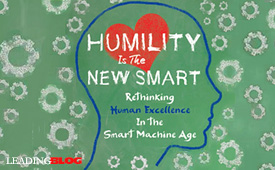
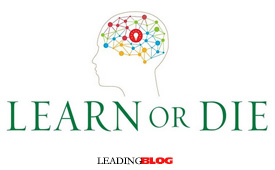
Posted by Michael McKinney at 06:57 AM
Permalink | Comments (0) | Personal Development
05.06.20

Is Your Thinking the Best Way to Think?
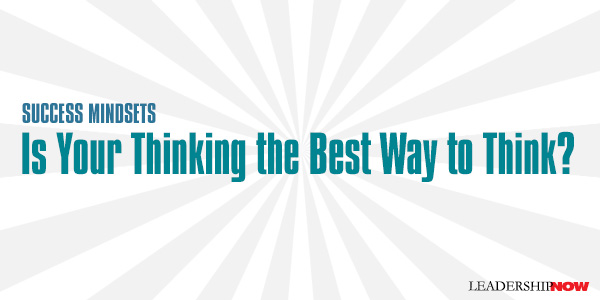
RYAN GOTTFREDSON begins his book Success Mindsets, with the question, "Is your thinking the best way to think?" It is an extremely important question to ask and one that rarely gets asked. It's easy to overlook this question because if I thought something was wrong in the way I thought, I would change it—maybe. After all, we're pretty comfortable with our own thoughts. We all think we are right.
While you may be reluctant to see to admit it, the thing that stands between where you currently are and the greater success in your life, work, and leadership is yourself—in particular, your thinking that your thinking is the best way to think. But the reality is that if you want to go from your current state to a more successful state, you must think about and see the world in new, different, and better ways.
How we show up in the world, how we experience the world, and how we respond to it is a reflection of our thinking. When we think differently, we behave differently. Behind our behaviors is our mindset. It comes down to our mindset. Our mindset is the filter through which we view our environment and, subsequently, what is going on inside of us—our thinking and emotions.
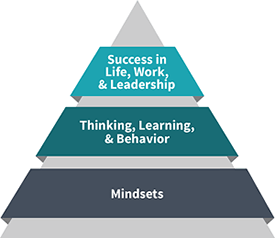 As the pyramid at the right suggests, "if our current thinking, learning, and behaviors are not generating the success we want, we need to shift our focus from 'fixing' or changing our thinking, learning, and behaviors to the level below: our mindsets." We have to get behind what drives everything we think and do.
As the pyramid at the right suggests, "if our current thinking, learning, and behaviors are not generating the success we want, we need to shift our focus from 'fixing' or changing our thinking, learning, and behaviors to the level below: our mindsets." We have to get behind what drives everything we think and do.
So, if mindsets are so powerful, Gottfredson asks, "What mindsets do I need to have to be more successful?" He relates an example of dissatisfaction in his own life and concludes with an understanding that his mindset was largely negative. He began to realize that his general "funk and perceived lack of success was not because of the organizations that I worked for and the people within. Rather, I had negative mindsets that were driving me to operate in ways that limited myself."
Gottfredson provides a framework for us to begin thinking about our own mindsets. By bringing together research on mindsets from various sources, he has assembled four sets of mindsets that we need to be aware of and evaluate our place along the continuum of each. They are fixed/growth mindsets, open/closed mindsets, prevention/promotion mindsets, and inward/outward mindsets. (Each are describe in more detail here.)
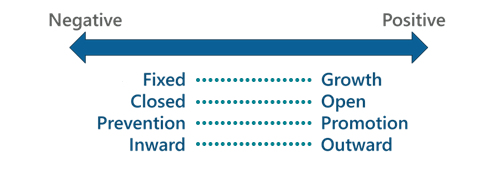
Success Mindsets covers each of these in detail and explores ways to improve in each area. In addition, he has developed an assessment to help you better understand each of these mindsets, find out where you stand on each, and ways to improve.
An unhealthy mindset is at the core of most of our issues. If we are "blind to our mindsets, we will misdiagnose our problems, treat them only at the surface level, and continue to be frustrated."
Think of some of the most common organizational problems:• Poor leadership and management
• Inability to effectively initiate and navigate change
• Lack of inclusion
• Low employee morale and effectivenessAt the root of each of these issues lies negative mindsets.
For most of us—of the thousands of people that have taken Gottfredson's assessment, that's about 95%—we tend to function on the negative side of at least some of the four sets of mindsets. But we can improve—change our mindset—with some conscious effort.
We come by our mindsets for the most part unconsciously. From our experiences, our mind automatically forms conclusions about the world and how we should react to it. Those conclusions are not often logical or as informed as they should be. Over time we develop a mindset—a way of looking at the world—that is based on those assumptions repeated over time. Depending on our environment those habitual ways of thinking become our mindsets that either do or don't serve us well. It is in our best interest to look at our mindsets and ask if they reflect the kind of person we wish to be going forward. Success Mindsets helps us to do just that.
![]()
![]() Like us on Instagram and Facebook for additional leadership and personal development ideas.
Like us on Instagram and Facebook for additional leadership and personal development ideas.

![]()
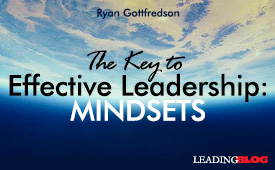
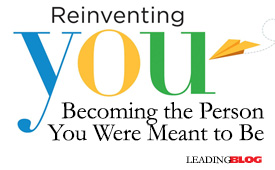
Posted by Michael McKinney at 12:02 AM
Permalink | Comments (0) | Personal Development
04.20.20

We Live in A Downstream World

You and a friend are having a picnic by the side of a river. Suddenly you hear a shout from the direction of the water—a child is drowning. Without thinking, you both dive in, grab the child, and swim to shore. Before you can recover, you hear another child cry for help. You and your friend jump back in the river to rescue her as well. Then another struggling child drifts into sight … and another … and another. The two of you can barely keep up. Suddenly, you see your friend wading out of the water, seeming to leave you alone. "Where are you going?" you demand. Your friend answers, "I'm going upstream to tackle the guy who's throwing all these kids in the water."
THIS metaphor sets the premise for Dan Heath's book Upstream: The Quest to Solve Problems Before They Happen.
We live in a downstream world. We have a bias for downstream action. We spend most of our time reacting to problems downstream rather than dealing with the source of the problem that is found upstream.
Heath argues that "we should shift more of our energies upstream: personally, organizationally, nationally, and globally. We can—and we should—stop dealing with the symptoms of problems, again and again, and start fixing them." That seems pretty obvious. So why don't we? Time after time, we find ourselves reacting over and over again.
Heath identifies three barriers to upstream thinking:
Problem Blindness
Problem blindness assumes that the problem is natural or inevitable, and there's nothing you can do about it. And we shrug it off. "That's just the way it is," we conclude. So, we don't try. "When we don't see a problem, we can't solve it. And that blindness can create passivity even in the face of enormous harm."
A Lack of Ownership
Complacency. What problems do we see around us that we could fix, but don't? Moving upstream requires that we take ownership of the issues personally. "I choose to fix this problem, not because it's demanded of me, but because I can, and because it's worth fixing."
Tunneling
Tunneling is a condition where you find that "when people are juggling a lot of problems, they give up trying to solve them all. They adopt tunnel vision. There's no long-term planning; there's no strategic prioritization of issues." When we are in a negative or scarcity mindset, we become "less insightful, less forward-thinking, less controlled."
Here are listed seven fundamental questions that upstream leaders must answer:
- How will you unite the right people?
- How will you change the system?
- Where can you find a point of leverage?
- How will you get early warning of the problem?
- How will you know you are succeeding?
- How will you avoid doing harm?
- Who will pay for what does not happen?
In clarifying these questions, Heath reveals some of the big issues through a wide variety of case studies that keep us from moving upstream.
Part of what makes downstream efforts so popular is that the results are quite tangible. "Downstream efforts restore the previous state." If my relationship is broken, and I fix it, the intervention was a success. If I do take preventative measures, I'm fixing what may or may not have happened. The issue arises, too, that I'm putting effort into something that is not broken. Is that necessary?
We pay to fix problems, but we are not as keen to put money into preventing problems. "We can pay to fix problems once they happen, or we can pay in advance to prevent them. What we need are more businesses and social entrepreneurs who can figure out how to flip payment models to support the preventive approach."
There is uncertainty in fixing upstream problems, especially when they are not reoccurring. When preparing for a distant threat, it's often difficult to tell if we are avoiding a disaster or preparing for something that will never happen. Is it worth the effort? "Organizations are constantly dealing with urgent short-term problems. Planning for speculative future ones is, by definition, not urgent. As a result, it's hard to convene people. It's hard to get funds authorized. It's hard to convince people to collaborate when hardship hasn't forced them to."
Heath asks, "How can you personally move upstream?"
He recommends that we "be impatient for action but patient for outcomes." We need to get moving, but often the change we seek takes time. Also, "macro starts with micro." Break the action down. Get specific. And finally, "favor scoreboards over pills." Think in terms of continuous improvement. "Data for learning" rather than "data for inspection." Test and learn and test again.
Upstream is a direction, not a destination. Any movement upstream is a step in the right direction. You can get a little ahead of the problem by or you can go further upstream and look for the more systemic issues.
"When there's a recurring problem in your life, go upstream." When we don't deal with problems upstream, we are destined to deal with them over and over again.
![]()
![]() Like us on Instagram and Facebook for additional leadership and personal development ideas.
Like us on Instagram and Facebook for additional leadership and personal development ideas.

![]()


Posted by Michael McKinney at 11:07 PM
Permalink | Comments (0) | Personal Development , Problem Solving
03.20.20

Life's Great Question
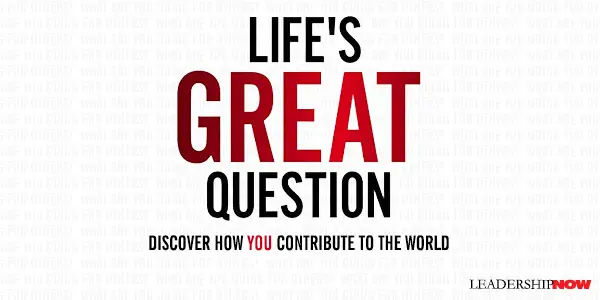
WE ALL want to leave a legacy. We all crave meaning in our lives. It's not just a millennial thing.
Meaning in life comes from the contributions we make beyond the self. Those contributions become your legacy.
All of this leads to life's greatest question: What are you doing for others? Tom Rath addresses this question head-on and presents a path for contribution—a map for creating meaning—in Life's Greatest Question.
While your talents are nature's best building blocks, they serve the world best when your efforts are directed outward—not inward. Being "anything you want" or "more of who you already are" doesn't add value to society unless it provides something others need. Simply put, your strengths and efforts must be focused on specific contributions you can make to other people's lives.
Work can be fun and improve our health if we can reframe what we do to how do I help. Reorient your thinking about what you do to how am I serving others—the "humanity of what we do." But rather than relying on your company to determine your contribution, "figuring out how you can make a greater contribution through your work has to be driven by you." In other words, "Great jobs are made, not found."
![]()
To that end, Rath introduces the Contribify inventory. It is "designed to help you gain a better understanding of who you are—for the sake of doing more for other people." Upon taking the inventory, you will come away with the top three areas that have the most potential for your contribution from a list of 12 primary Contributions: Initiating, Challenging, Teaching, Visioning, Connecting, Energizing, Perceiving, Influencing, Organizing, Achieving, Adapting, and Scaling.
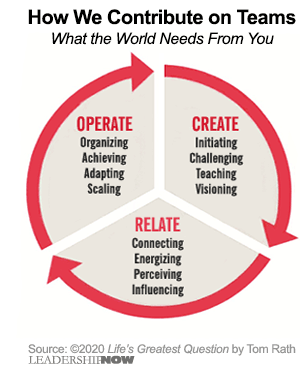 Each of these 12 primary Contributions is categorized within the three basic needs of all teams: Create, Operate, and Relate. "If a team is lacking in any one of these three major functions, it is almost impossible for the group to be effective, let alone thrive." Each of us has definite contributions we can make to the teams we serve. Understanding group contributions in this way helps us in at least three ways. First, it allows you to more effectively match who you are with what your team needs. Second, it helps to map out how diverse the team is an what the needs are who might need to be brought into fill in gaps. And third, individually we can see where we better see how we might maximize our efforts as we contribute to the team.
Each of these 12 primary Contributions is categorized within the three basic needs of all teams: Create, Operate, and Relate. "If a team is lacking in any one of these three major functions, it is almost impossible for the group to be effective, let alone thrive." Each of us has definite contributions we can make to the teams we serve. Understanding group contributions in this way helps us in at least three ways. First, it allows you to more effectively match who you are with what your team needs. Second, it helps to map out how diverse the team is an what the needs are who might need to be brought into fill in gaps. And third, individually we can see where we better see how we might maximize our efforts as we contribute to the team.
Rath makes a very good point regarding the obsession with passion. "Instead of following your passion, find your greatest contribution."
This is one of the critiques of the "follow your passion" advice—that it presumes you are the center of the world, and pursuing your own joy (not service of others) is he objective. I have found that those who leave a lasting mark on the world, in contrast, are always asking what they can give.
Life's Great Question leaves you with a lot to think about and a structured way to go about it. It provides language to what is often a very nebulous exercise.
![]()
![]() Like us on Instagram and Facebook for additional leadership and personal development ideas.
Like us on Instagram and Facebook for additional leadership and personal development ideas.

![]()

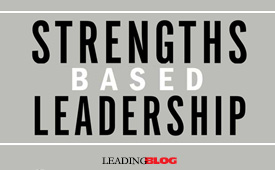
Posted by Michael McKinney at 03:33 PM
Permalink | Comments (0) | Personal Development
03.13.20

How to Find Your Edge

WE'VE HEARD that hard work is the secret to success. But all too often we see that hard work is not enough. What then?
We need an edge.
Laura Huang explains just how to gain that advantage in her insightful and encouraging book, Edge: Turning Adversity into Advantage. "Certain people seem to be endowed with a unique advantage in which they can execute faster and better and get the things they need, because they are positioned in such a way that others help them move forward. You can create your own edge and open doors—wide-open doors—for yourself."
Having an edge makes hard work go further. Those that have an edge, Enrich, Delight, and Guide to make their Effort go further.
We must put in the work, but "when you create an edge, you create tailwinds that help you capitalize on your hard work more effectively." We all face biases, prejudice, and harmful (to us) perceptions and attributions. But these can be the key to overcoming the adversity and roadblocks we face. "For most of you," she writes, "it will be about positioning yourselves as an antidote to stereotypes, which will allow you to guide the perceptions of others, delight others, and ultimately will result in others seeing the unique value you can provide."
Enrich
Huang begins with Enrich because it is the foundation of our edge. To do this, we begin by finding our "basic goods." Those basic things that make you, you. "Creating an edge starts with pinpointing your basic goods and defining your circle of competence, and operating inside that perimeter." It's how you enrich.
Your history and your story are part of your basic goods. Don't underestimate where you've been planted—grow there.
Our constraints provide us with a unique way to enrich when we own them—when we use them to see differently. "Don't let the constraints that others create prevent you from identifying the problem for you, and hence the solution for you."
Delight
Getting the door to enrich is made possible by our ability to Delight. Delight opens the door, so we can enrich. It's how we deliver our value.
What is delight? It is the unexpected. "When we delight, we violate perceptions, but in a benign way. Delight unsettles and challenges beliefs about your context, grabbing the attention of gatekeepers and making way for you to show how you enrich."
There is value in planning to delight, but it is important that you stay flexible and be looking for opportunities to delight. "Authentically delighting in situ requires you to be constantly fine-tuning, as well as constantly attuned to how you can shape situations to present the opportunity for your talents and core competencies to become apparent."
Delighting requires you to have an opinion or point of view—being authentic while having the audacity, or the stomach, you might say, to take a bold, surprising stance.
We all have the capacity to enrich. But when you are able to also delight, that is where the real magic happens. That is how you allow them to let you in, and how you build your edge.
(As an associate professor at the Harvard Business School, Huang offers a great section on the advice she gives the students and entrepreneurs she coaches on the high-concept pitch, the two-sentence pitch, and the extended pitch. She states that "no pitch should be longer than one minute—after that, you should be in full conversation mode.")
Guide
Once in, we Guide how others perceive our work and our worth. "It is inevitable that we will be affected by how other people view us and how they perceive us when we are merely trying to 'be ourselves.'" We should keep in mind too that other's perceptions of us are to a large extent about them.
Huang says we should look for patterns in our life—what rhymes. "Don't go for absolutes go for directionality." This is very helpful. Rather than adopt labels, we should identify directions for three reasons:
Going for directionality, rather than absolutes, helps you manage the impressions of others and guide their perceptions. You can be more fluid and adaptive.
If you go for general directionality, you'll be more likely to avoid striving for goals that don't leverage your strengths and that make it harder for you to create advantages. Self-awareness, in and of itself, is an elusive goal. We never really know ourselves, the best we can do is to find general directionality.
And finally, going for directionality allows you to simply move toward something that feels right, while already finding ways to cultivate an edge.
Self-awareness is knowing what we put out there and how it will be perceived by others. "Guiding entails being purposeful in helping others frame the attribution that they make about us."
Don't let them make assumptions. Give them the data points so that they can draw the trend line that you want them to see. Tell them, rather than allowing them to guess, about your future potential.
By providing directionality, you determine what is meaningful for them to know.
Effort
Effort works with the edge you are creating to inform you of the things you should be putting your effort into—things that you can enrich, delight, and guide. It's in this combination that your effort then works harder for you. "Effort reinforces your edge."
The optimal conditions for creating an edge are those in which bitterness and regret do not restrain you; they embolden you. Even if you are perfect, the world isn't. Acknowledge and accept this, and you have already begun to create your edge. The secret is to know that the deck is stacked, and that life is not fair. But you put in hard work plus, regardless. Don't let success define you, but don't let failure define you either. Play the long game, not the short one.
![]()
![]() Like us on Instagram and Facebook for additional leadership and personal development ideas.
Like us on Instagram and Facebook for additional leadership and personal development ideas.

![]()
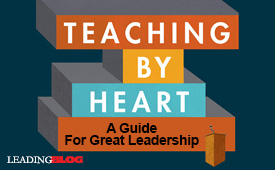

Posted by Michael McKinney at 06:22 PM
Permalink | Comments (0) | Personal Development
02.21.20

All You Have to Do Is Ask

IF WE ARE HONEST with ourselves, we know there are times we need help. We just don't want to ask for it. We're confident we can figure it out. In time.
But here's the thing. There's nothing we are going through or trying to figure out that others haven't blazed a trail for us already. We just need to ask.
Wayne Baker says, "you never know what people know—or who they know—until you ask. Asking for help can mean the difference between success and failure." In All You Have to Do Is Ask he identifies eight reasons why we don't or won't ask. As a result, we leave a lot of answers, solutions and resources on the table for no good reason. And here are eight no good reasons:
- We underestimate other people's willingness and ability to help
- We over-rely on self-reliance
- We perceive there to be social costs of seeking help
- Our work culture lacks psychological safety
- The systems, procedures, or structure of our organization get in our way
- We don't know what to request or how to request it
- We worry we haven't earned the privilege of asking for help
- We fear seeming selfish
That last reason—the fear of seeming selfish—relates to the proverb that it's better to give than receive. That's true. We want to be givers, but that doesn't make receiving a bad thing. "There's no giving without receiving, and there is no receiving without giving. And it's the request that starts the wheel turning."
Baker offers a quick scientific assessment in the book (or online) to determine what style of asking/giving you tend to choose. And it is a choice. Are you an overgenerous giver, a selfish taker, a lone wolf, or a giver-requester? These types all represent "choices you can make about how you want to operate in the world."
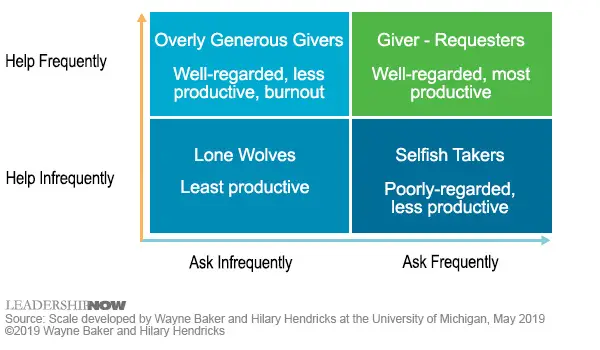
The place to begin is to understand and articulate your needs. Know what you are trying to accomplish and when. With that in mind, formulate a SMART request. That is a Specific ("a specific request yields more help than a vague one"), Meaningful ("Why is the request important to you?"), Action-oriented (What action do you want to be taken?), Realistic (it may be a serious long-shot, but within the realm of possibility), and Time-bound ("every request should have a due date") request.
After you have formulated your request, you need to figure out who to ask. Who knows what you need to know or who you need to talk to? Go outside your usual circle of contacts. Then ASK. And a good piece of advice: "Rejection is just an opinion. And opinions change. In other words, you can find ways to turn a no into a yes."
Baker offers much more specific advice and examples throughout but let me mention two tools that have proven effective that Wayne Baker and Adam Grant have developed. The first is Reciprocity Rings.
Reciprocity Rings
A Reciprocity Ring is a group activity consisting of 20 or so people that gather together and share a request with the group one by one. "Other members of the group pause to consider how they could help: Do I have the resource the person needs? Of not, do I know someone in my network who might be able to help? Because it's much easier for people to make a request when they know that everyone must make one, every participant is required to make a request; asking is the 'ticket of admission' to the Reciprocity Ring."
Reciprocity Rings have been implemented successfully at Google, General Motors, IBM, Citigroup, UPS, and others.
Givitas
Givitas is a collaborative technology platform that provides a safe platform for requesting, giving, and receiving help across boundaries across a vast scale. It helps you share widely beyond the usual suspects.
Platforms like Givitas allow people to get what they need without having to repeatedly tap all the same experts or all the usual go-to people because requests are decentralized and broadcast across the vast network.
Thanks For Asking
We've all asked for help only to be rebuffed or made to look stupid. Of course, we recognize and reward people for giving help, but we don't typically reward people for asking for help. "How our request is received, how we are treated, and how the help is granted determines whether we get discouraged, or encouraged to make asking a personal practice."
With both organizational and individual success at stake, we need to rethink our responses to asking. "Recognizing, appreciating, and rewarding those who ask is as critical as doing the same for those who answer."
Baker shares informal and formal ways we can as individuals and organizations recognize, reward, and encourage asking. Asking improves individual performance and effectiveness.
All You Have to Do Is Ask will change your appreciation of asking. It certainly changed my view.
![]()
![]() Like us on Instagram and Facebook for additional leadership and personal development ideas.
Like us on Instagram and Facebook for additional leadership and personal development ideas.

![]()
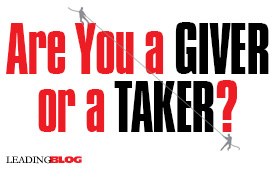
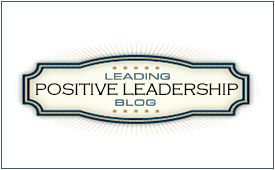
Posted by Michael McKinney at 05:34 PM
Permalink | Comments (0) | Human Resources , Personal Development , Positive Leadership , Problem Solving
01.24.20

Teaching By Heart: A Guide For Great Leadership
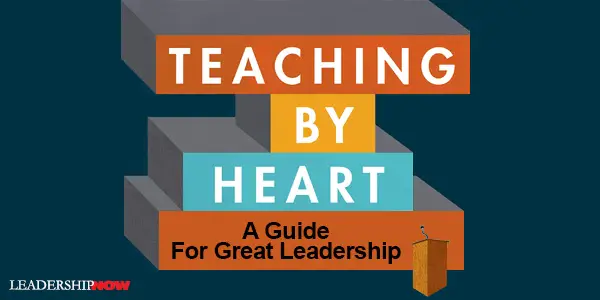
DESPITE what the title Teaching By Heart might imply, it is really a book about servant leadership. It is a journey into self-awareness so that you can serve those you lead or seek to influence in spite of your self-doubt, anxieties, and insecurities. It is a remarkable book and a perfect means to refocus your leadership development this year.
Professor of management and organizational behavior at Harvard University, Thomas DeLong, writes, "I've found that the best teachers are also leaders, and the best leaders are also teachers." I completely agree, and it is easy to see the parallels.
Using himself as a case study, DeLong generously shares what goes on in his head and heart as a teacher. He shares what he has observed how in a teacher's "best moments, they can life people up, and in their worst, let them down."
You will learn what it takes to teach and lead better. You will gain a better understanding of yourself. Through his introspection, you will come away with a better grasp of your own patterns of behavior. You will understand the need to ask yourself: "What is it that I do consistently that assists me living and teaching, that leverages my talents in unique ways? Just as important, you need to understand those emotional or behavioral patterns that sabotage your efforts to make a difference."
As teachers [and leaders], we focus more on our inadequacies and failures than on our strengths and accomplishments. I'll deconstruct why this is so. I will walk you through the heaven and hell of teaching by dissecting and analyzing what I've experienced in the Harvard Business School classroom.
After thirty-five years of teaching, DeLong still has anxiety about teaching. To counteract the doubt and anxiety on the days he teaches he must get into the classroom early. "Rather than listen to irrational thoughts and feelings, I need to engage with the 'enemy.' I need to look students in the eyes and engage. I need to get out of my head and be interested in something other than my thoughts and feelings and insecurities. The pattern that surfaces is he either/or syndrome. Will I leave the classroom with a feeling of either success or failure? So even if you aren't a teacher who is wrapped up in your own doubt and insecurities, you should know what your patterns are—the tendencies and habits that either serve or disrupt your effectiveness."
"As the instructor, you need to increase the probability that your students will see and experience and feel what you want them to experience." This doesn't just happen. This is a challenge for teachers and leaders.
Self-Awareness and Growth
This self-awareness is a negative and a positive—a negative because it caused me to beat myself up continuously over my real and imagined shortcomings, a positive because it helped me become cognizant of my patterns.By remonstrating with myself over my actions, I hope I decrease the chances that I'll repeat this bad behavior. I still might. But I trust that I will do it less.
On Knowing Students
I am freer as a teacher if I feel I know the students on some level, better able to adjust and adapt o their requirements. My hope is to turn their mindset from one of certainty to curiosity where their assumptions can be tested, confirmed, or revealed to be false."
The Power of Covenant versus Contractual Relationships
As leaders, we create a covenant with those we lead. A covenant is a good way to think about a leader's relationship with others. Three elements make up the covenant leaders make with their people. "I promise to set direction with you, to secure your commitment, and help you execute. If I do these things, you'll succeed and so will the company. This is the covenant leaders establish with their employees, and it drives performance far better than salary and perks."
Teachers create this covenant with students in much the same way leaders do with employees.
First, students must know that they are in safe, competent, understanding hands. The first dimension is built on faith.Second, students need to know that teachers care about them and their work. They learn this through feedback, interactions in the classroom, and observing them interact with their peers.
Third, students must feel like they are learning and growing and developing. They need to know that they are being stretched and pushed and challenged with new knowledge, that their assumptions are being tested, and they must gain new knowledge about themselves.
Contractual relationships are transactional. It's all cognitive. "Contractual leaders and teachers worry about their image, how they are perceived by their boss—a manager or department head. They possess little empathy for others because their goal is to survive where they perceive themselves to be unwelcome."
Reflections
The ideas expressed here are valuable to leaders in many roles—parents, teachers, pastors.
One of my goals for the students is to have them stand back and face their own life path. An underlying assumption is that the students will do less harm if they are aware of why they do what they do. They will hurt themselves and others less if they understand the purpose and path they are on. I don't pretend that they should have an answer, but I would like them to be asking questions about their journey before, during, and after the experience at HBS.As I gaze out the window and reflect, I question whether I'm helping students become more adaptive. Will they make it through their next crucible with greater resilience? Can they maintain a clear head in times of crisis? Do they become paralyzed with fear? Do they wait for someone else to save the day? Are they unable to be the people they were before they experienced the hardship? I want them to be able to keep tough feedback in perspective. I want them to be able to be direct when a tough conversation is necessary?
We need to have "road miles" so that we, through the process of elimination, understand the intersection between our values, motivations, and needs.
I try to highlight that we need not only to focus on the integration of work and play, of home and work but to be more aware of the quality of life we create with those who are near and dear to us.
Avoid Focusing on the Negative
If we use external criteria to define success or happiness, we will come up short, given the powerful influence of our negative-remembering reflex. Everything gets distilled and reduced to one reflection or observation. The technical term for this cognitive process is asymmetric effect with a negative bias . It holds us captive in everyday life.I find myself returning to the internal dialogue that reminds me of my negative or self-doubting narrative than my self-affirming story. I find that my negative voices are louder than my positive ones, and so I lose confidence and my classroom persona is diminished—I am unwilling to push myself as a teacher, failing to try something new or push boundaries, since these classroom behaviors all carry risks.
The goal, then, is to remind ourselves that we possess a positive story, not just a negative one.
Three Guiding Questions
DeLong offers three guiding questions that will help guide our efforts to be authentic and genuine:
1. How do I experience others? What do we believe about others? The answer will inform how we interact with others.
2. How do others experience me? How do I portray myself to others?
3. How do others experience themselves when they are in your presence?
Teaching By Heart is a very relatable book that all leaders should read. Leadership comes in many forms, but we all deal with the same issues. DeLong's journey will help.
![]()
![]() Like us on Instagram and Facebook for additional leadership and personal development ideas.
Like us on Instagram and Facebook for additional leadership and personal development ideas.

![]()
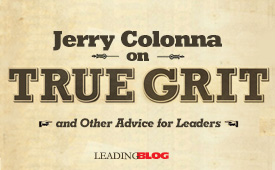
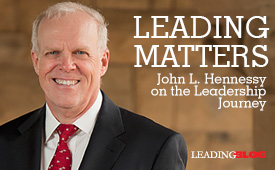
Posted by Michael McKinney at 06:56 AM
Permalink | Comments (0) | Personal Development
01.17.20

The Power of Bad
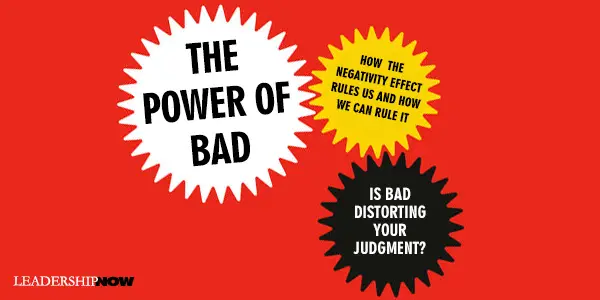
BAD gets into our head and it stays there leaving very little room for the good in our lives. We tend to focus on the bad, even in the face of a lot of positive things. Our brains are wired that way. It's the negativity effect : the universal tendency for negative emotions and events to affect us more strongly than positive ones.
John Tierney and Roy Baumeister (the first researcher to identify the negativity effect) describe the phenomenon well in The Power of Bad:
We're devastated by a word of criticism but unmoved by a shower of praise. We see the hostile face in the crowd and miss all the friendly smiles. The negativity effect sounds depressing—and it often is—but it doesn't have to be the end of the story. Bad is stronger, but good can prevail if we know what we're up against.
Because of this, we have learned that it takes about four good things to overcome just one bad experience. It's a rule of thumb, but it is useful to keep in mind when dealing with others and to understand our impact on those around us. "Being able to hold your tongue rather than say something nasty or spiteful will do much more for your relationship than a good word or deed." Good relationships are more about what you don't do. "Avoiding bad is far more important than doing good." You don't get much credit for going the extra mile, but you pay a big penalty for doing something bad.
So how do we eliminate or a least minimize the bad? The negative?
Not surprisingly, the more insecure you are, the more likely you are to act and think negatively. And our negative thoughts become a self-fulfilling prophecy dragging us deeper into the cynicism and doubt that undermines us. Negative thinking makes us small.
Positive people "literally see a bigger picture. Their eyes sweep a wider field of vision instead of just focusing on what's straight ahead, as they do when prompted with negative stimuli. Positive emotions broaden your perspective and enable you to build skills that help you flourish both personally and professionally."
We look for bad things. "Even when things are going your way, the amygdala keeps looking for the cloud behind the silver lining." We create fears. They can become runaway trains that cripple us. When we do discover a fear, we need to put it in perspective. How important is it really? Rationally override the feeling by talking about it. How would you advise someone else in the same situation? Know what triggers your fear and calm yourself with coping statements. And breath. "A deep breath is a signal to the body that we're safe."
Depressed people suffer from extreme negativity bias in the way they see themselves, the world, and the future. Depressed people focus relentlessly on their weaknesses and failures, ignoring their strengths and diminishing their successes as flukes. They interpret one setback as a fatal mistake and imagine it, leading to the worst possible outcome.
Researcher Bethany Teachman says, "People with phobias want to avoid panic attacks, but that's not the right goal to start with. The first goal is to stop caring whether or not you have a panic attack. A panic attack is uncomfortable but not dangerous. It's a false alarm—a fear of fear. Once you make the decision to tolerate it, you get a sense of mastery, and eventually, the fear loses its power over you, and the panic attacks don't come anymore."
What should we do when delivering bad news? Many think that the best thing to do is to deliver it gradually or after some good news, but research says most people would rather have the bad news first and straight. The criticism sandwich doesn't really do what we hope it would because the "brain doesn't logically process threatening information."
For praise or other good news to make a lasting impact, the brain must transfer it from the short-term working memory into long-term memory. This process gets disrupted when good news is followed by something negative. The brain uses so much energy to focus on the new threat that the previous pleasantness gets lost because of an effect called retroactive interference.
If you have to deliver bad news or criticism, the authors recommend that first, consider your objective. Are you simply delivering bad news, or are you trying to get someone to change?
When people heard first about their bad traits and then their good ones, they ended the experiments in a better mood, but they were also less inclined to do work to correct their bad qualities. The ones who heard the bad traits last were more worried but also eager for self-improvement. It's not easy to motivate without demoralizing, but you can compromise by concentrating on the good feedback toward the end while also finishing up with a clear reminder of what's wrong and how to fix it.
From there, the authors advise us, among other things, to ask questions, and then once we've gotten the criticism across, use the power of bad to your advantage. (Good insights on delivering criticism begin on page 99.)
Hell motivates us more than heaven. Penalties for mistakes make us learn much more quickly than rewards. The fear of looking fat motivates us more to lose weight than the hope of looking slim. The advantage of penalties is that they are "so powerful that you often don't have to use them. Rewards have to be doled out continually, but the mere threat of a penalty can make a lasting impact."
When bad things do happen to us, our response becomes the key issue. While many people experience a traumatic event in their lives, most—four out of five—trauma victims did not suffer from post-traumatic stress disorder (PTSD) afterward. "Instead of being permanently scarred, they underwent post-traumatic growth (PTG). Studies have found that more than 60 percent (sometimes 90 percent) of trauma victims undergo post-traumatic growth, including ones who initially showed symptoms of PTSD.
Our response to life is everything. "The growth comes not from the trauma but from the way that people respond to it to become kinder, stronger, and more mindful of the joys in life." When things do go wrong—and they will—force yourself to see it from another perspective. "People of all ages can counter the power of bad by consciously rewriting their narratives, focusing on their blessings, and savoring the good moments of their lives."
In 1841 Scottish journalist Charles Mackay published Extraordinary Popular Delusions and the Madness of Crowds. In it, he writes, "Men, it has been well said, think in herds. It will be seen that they go mad in herds, while they only recover their senses slowly, and one by one." It's up to each of us to see that good prevails.
![]()
![]() Like us on Instagram and Facebook for additional leadership and personal development ideas.
Like us on Instagram and Facebook for additional leadership and personal development ideas.

![]()


Posted by Michael McKinney at 07:34 AM
Permalink | Comments (0) | Personal Development , Positive Leadership
12.02.19

Contagious You
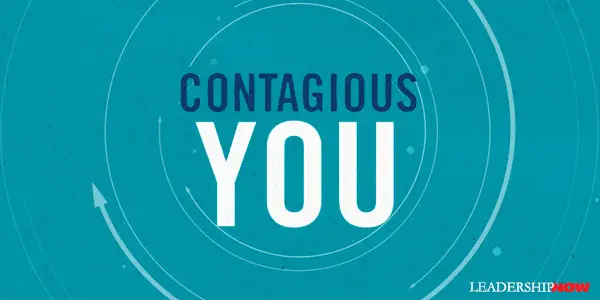
HOW WE SHOW UP in life matters. Our intentions, energy, and presence matter. The impact we have on others depends on how we show up. We create the culture by who we are. As a leader, this is critical to our mission.
Anese Cavanaugh invites us in Contagious You to be the leader we want to be—the culture we want to lead. We're contagious for better or for worse.
It all begins with awareness, and she provides a self-assessment for that. "Awareness is about 70 percent of the battle with the other 30 percent being what we choose to do with it." With that done, contagious you becomes a matter of adopting a mindset of personal responsibility and be clear about what you want to accomplish. To make that practical she offers the Five Steps to Intentional Impact Framework:
Outcome. What is the outcome you want to create? This should be tangible and something you can see or touch. You would not have created this outcome without the meeting, conversation, project, and soon.Impact. What is the emotional impact you want to have? How do you want people to feel? How do you want to feel? You will create an emotional and energetic experience with your presence and actions either way.
Show up. How will you have to show up to create the outcome(s) and emotional impact you desire? What will your presence be? Your quality of listening? Your body language? Your attire? Anything that impacts how you show up here.
Believe. What will you want and need to believe in order to show up that way? Make this authentic. If you're having a hard time finding something useful and real to believe, go deeper. What's the truest thing you can believe to help you show up well and congruent?
Actions. What actions will you need to take to make it all so? What will you actually have to do? Before, during, after?
All steps are important and should be taken in order. You can use this framework for a particular meeting or event, or you can use it to craft a vision for yourself in everything you do. What is the you, you want others to see? It becomes a state of mind that you bring to everything you do. It brings the energy and sets the tone to any interaction or situation we encounter. When things are going well, it's easy to imagine making this happen—managing our energy. But when things go wrong—when someone insists on sucking the energy out of you—then what do you do? Again, this is where awareness plays a big part.
There is an "inner game" and an "outer game" of leadership playing at all times. The inner game being the intentions, energy, beliefs, mindset, well-being, presence, and who we are. The outer game being what we actually do in our communication, skills, and interactions with others. The inner game drives the outer game. And no one can play your game but you.
As leaders, we need to strengthen what Cavanaugh calls our Intentional Energetic Presence or IEP. "The more we tend to this proactively, the stronger it becomes, and the easier it is to command our energetic presence at will. This ultimately allows us to respond and lead in the most appropriate, helpful, and effective ways possible"—no matter what kind of situation we find ourselves in.
The bulk of the book explains how to strengthen our IEP. Once you begin to strengthen your IEP, you will be better able to reboot your presence in the moment apart from what is going on in your life or in the room you walk into. Another goal is to create a presence strong and energetic enough to allow others you come in contact with to step into it as well. This makes it easier too, to deal with "the people who may be more challenging to work with, you can better serve, navigate, and lead them with clarity, grace, and effect—without burning yourself out, getting sucked into their stuff, or giving yourself away." In this way, we are able to create intentional impact. The key is knowing what we are, what we want to be, and what we actually do.
Our energy is generated from the inside out, as is the experience we're creating for ourselves, which can be felt by those around us. Whatever we're feeling internally is generating an experience externally, and whatever is happening externally influences our experience internally. We proact and react. We project and receive.The stronger, more present, and more intentional we are, the easier it is to create our experience, to decide what we'll take on, to know when we're projecting our energy on others, and to be more intentional about it all. Which means we have great influence on creating a positive and productive experience and on being positively or negatively contagious. When we own this and support it with our well-being, we can more effectively partner with and influence whatever is happening versus be reactive or victim to it.
That said, most of us know this intellectually, but in practice, it's another thing. We tend to be guided by our emotions and the emotions of those around us. Which, as I've mentioned is great when all is positive, but when things turn negative, it is too easy to get caught up in a negative, downward spiral. Knowing this, Cavanaugh provides very practical methods and frameworks to turn this around to become the leader we intend on being. There are no silver bullets here. There's a lot of self-work, but then that's what the best leaders do.
![]()
![]() Like us on Instagram and Facebook for additional leadership and personal development ideas.
Like us on Instagram and Facebook for additional leadership and personal development ideas.

![]()


Posted by Michael McKinney at 08:09 AM
Permalink | Comments (0) | Personal Development
11.15.19

The Relationship Economy
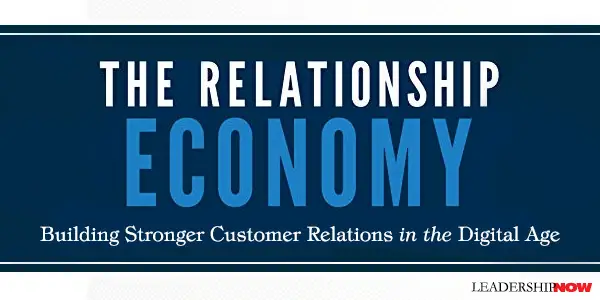
THE ONE SKILL that matters more than any other in leadership and life is the ability to connect with others. We generally learn this through example, but if those we emulated didn't know how to do it (or its importance), we are at a disadvantage. It is, unfortunately, one skill that is rarely taught in any formal way.
While technology has made connecting easier and more convenient it has also "changed the way we communicate, behave, and think," writes John DiJulius in The Relationship Economy. This has led us to a "dramatic decline in our people skills. The pendulum has swung over to high tech and low touch."
A study by the Relational Capital Group revealed that 89 percent of senior leaders believe that relationships are the most important factor in their success year over year. However, the study also revealed that only 24 percent of those leaders actually do anything intentionally to promote building those relationships. Finally, the study further indicated that less than 5 percent of organizations actually have any specific strategies for helping the professionals develop and strengthen the relationships required to achieve their goals.
That's where DiJulius and The Relationship Economy come in. "The Relationship Economy is about building a culture that recognizes the importance of each individual and making everyone a part of a community that is working toward something bigger—a community that makes them feel cared for."
Hospitality entrepreneur Chip Conley said in a TED talk that "Almost 40 percent of us in the U.S. workforce have a boss that is younger than us and that number is growing quickly. Power is cascading to the young like never before because of our increasing reliance on digital intelligence. We are seeing young founders of companies in their early 20s scaling them up to global giants by the time they get to 30. And yet we expect these young digital leaders to somehow miraculously embody the relationship wisdom we older workers have had decades to learn. It's hard to microwave your emotional intelligence."
We need a plan, and this is an easy place to start. After we meet someone, we can begin by learning at least two facts about their FORD —that is, their Family, their Occupation, their Recreation, or their Dreams. It's not about grilling your customers and coworkers, but genuinely showing interest in them as part of the natural flow of conversation. Listening is a skill we need to develop. (Common and often unintentional mistake: "Never steal someone's thunder. Suspend your own ego and let them enjoy their own story. This is a tough one for many because when someone brings up something that you have in common, you can get excited to share your experience.)
DiJulius offers seven traits for effective communications and explores them throughout this book. You will also find ways to track interactions in your organization.
1. Compassion and Empathy — "Highly empathic people have an insatiable curiosity about strangers."
2. Engagement and Warmth — Employees who love what they do put customers at ease. Smile.
3. A Drive to Serve — Focus on the customer and the experience they are having. How do they feel after their encounter with you?
4. Ownership — Acting with the same care as the owner of the company would. Do what it takes to ensure a happy customer.
5. Charitable Assumption — Always assume the best in people.
6. Presence — Be in the moment. Do not allow distractions. DiJulius says, " Carpe Momento: seize the moment. There is no better motto for reminding us that any connection with others—especially building relationships—depends on being fully engaged with them."
7. The Desire to Exceed Expectations — Like a drive to serve, always be looking for ways to go above and beyond other people's expectations.
It's always about building relationships. "Strangers are where your greatest opportunities lie—they're future connections, friendships, resources, experiences, laughs, and good times." No one succeeds alone.
![]()
![]() Like us on Instagram and Facebook for additional leadership and personal development ideas.
Like us on Instagram and Facebook for additional leadership and personal development ideas.

![]()
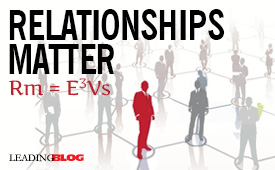
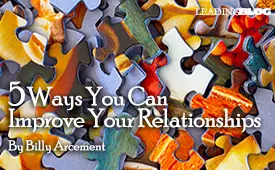
Posted by Michael McKinney at 08:07 AM
Permalink | Comments (0) | Personal Development
11.04.19

Sailing True North and the Voyage of Character
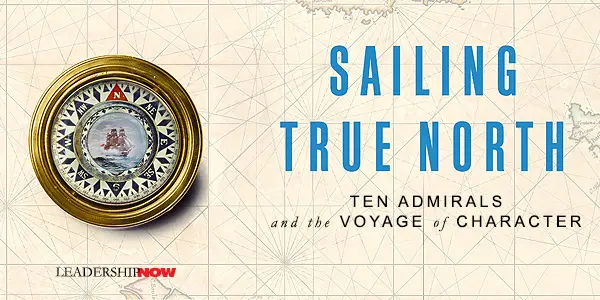
THERE IS NO SUBSTITUTE for character. Better systems, better laws can't make up for it. Without good character, leaders can go south fast. The problem is that there is very little attention paid to how to develop good character. We learn best by example, but it is wise to look into the lives of others and understand the outcomes of their lives as a result of their character or lack of it.
Four-star U.S. Navy Admiral and former Supreme Allied Commander of NATO James Stavridis gives us a comprehensive look at ten admirals in Sailing True North. He looks at their differing character traits and personalities and the effect it had not only on their careers but on those they lead.
He begins 25oo years ago with the Greek Themistocles and moves forward to the lives of 14th-century Chinese admiral Zheng He, Sir Francis Drake, Horatio Nelson, Alfred Thayer Mahan, John Fisher, Chester Nimitz, Hyman Rickover, Bud Zumwalt Jr., and finally, Grace Hopper. While each of their voyages on the open sea was demanding, it was "vastly easier than the inner voyage we all must sail every day of our lives. That voyage of character is the most important journey each of us ever makes."
Stavridis writes this out of a growing sense that "in this postmodern era that we are witnessing the slow death of character, driven by a global culture that has turned increasingly away from classic values—honesty, commitment, resilience, accountability, moderation—to a world that moves at breakneck speed and refuses to slow down and consider what is right and just." Sadly, he notes too that "we have lost the ability to hone our character in private, and our lives are on display seemingly from the moment we are born. We overshare publicly and under-reflect privately on what our individual voyages mean."
It is good for us to slow down and look at these lives and use what we learn to adjust the course of our lives to be the best we can be. There is much we can learn from others. Biographies provide us with feedback on our own lives in a most palatable way if we take the time to apply what we learn.
None of these admirals was perfect, but we can learn from them all. "The nature of any human is not what they do when the choices are easy, and the metaphorical sun is shining, but rather what they do when the options are morally ambiguous, and the seas are rough."
Some of the navigational advice we can learn from the lives of these admirals is:
A leader should avoid getting into a position where the only way to persuade an audience is by an almost magical feat of rhetoric.Great leaders learn how to balance inherent uncertainty with a firm-enough grasp of context to enable decisive action.
Finding the balance between determination and an open mind is one of the ongoing tests of character for us all.
The most defining issue of character is curiosity.
That combination of relentless perseverance and an unbounded desire to "seize the new" is very, very rare in leaders.
You need the deepest reserves of character—strategic patience especially—to implement vision. Rickover was a curious combination of someone who was supremely tactically impatient, to the point of real anger, but had deep reserves of strategic patience to implement a long-term vision—a very rare combination in terms of character, and it served him well.
A little innovation today is often the best insurance against epochal change tomorrow. I often ask—and especially encourage young leaders to ask—what any organization I lead is doing right now that is going to look really wrong fifty years in the future.
Stavridis shares ten character traits that he has learned from the admirals he showcases and from his own experience as an admiral.
At the top of his list is creativity —"a willingness to embrace the new, despite the difficulties and challenges of doing so." You must find a way to bring along the nonbelievers. Second is resilience . Learn from your experiences and set new goals and keep moving. Third, he lists humility . Arrogance is toxic to a leader. "It is a lot easier to be resilient when you are humble to begin with."
The fourth quality is the need to find balance in our lives. Most of the admirals he lists in the book failed this test. After all, ambition often drives the lack of balance in our lives. Fifth is honesty —"being truthful no matter the cost." Make truth a habit. Sixth is empathy . "Most of us are terribly self-centered." See outside yourself. "A virtuous person begins every encounter with the world not from their own perspective alone, but rather by trying to understand the situation, mindset, and challenges that others are facing."
Seventh is believing a sense of justice matters. Self-control is at work here. Eighth is decisiveness . Ninth is determination . Never give up, as Churchill said, "except in convictions of honor and good sense." The final character trait he lists is perspective . We can't take ourselves too seriously. "We need to understand that in the end we are but sailing in a tiny ship on the boundless sea." A good sense of humor goes a long way toward maintaining a proper perspective.
![]()
![]() Like us on Instagram and Facebook for additional leadership and personal development ideas.
Like us on Instagram and Facebook for additional leadership and personal development ideas.

![]()
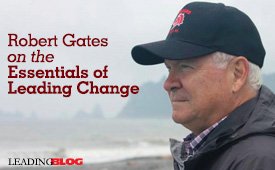

Posted by Michael McKinney at 12:01 AM
Permalink | Comments (0) | Leadership Development , Personal Development
10.25.19

4 Simple Habits for Turning Down the Noise
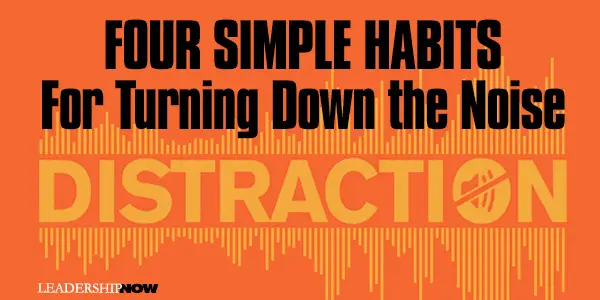
WE ARE ALL DISTRACTED, and we are faced with more and more reasons to be distracted. And while some distractions seem to be adding to our life, they are actually undermining our growth. Distractions take us away from what we should be doing and kills our momentum.
But the problem with distractions goes deeper than that. It's an emotional issue. Clay Scroggins deals with the root problem and the impact it has on our leadership in How to Lead in a World of Distraction and offers some solid advice.
Sometimes we use distractions to distract us from what we don't like going on inside of us.
When something we don't like screaming inside us, we always find something outside—and external distraction—and turn it up. And it works. That outside noise distracts us for a time. In mutes the inner turmoil, the uncomfortable emotions, the pain, the inadequacy, the discomfort, the memories. It hides whatever we don't want to feel or experience.
We allow our emotions to control our lives instead of taking control of them, and it puts a lid on our growth. "If we think the answer to our emotions is to cancel class, run to social media, or use masking tools to avoid what's inside, it's no wonder we're getting the results we're seeing."
As leaders, we need to be aware of the distractions that affect us and deal with what is going on inside of us. "A leader that doesn't know themselves is a dangerous guide."
Scroggins offers four noise-canceling habits that will allow you to turn down the noise low enough and long enough to tune into the emotions going on inside you. "The only way to combat the old habit of distraction," says Scroggins, "is to develop new habits to create space for emotional curiosity."
1. Simplicity
Know your why. "Find that one sentence that defines why you do the things you do, and it can have massive repercussions on your life moving forward. When you clarify your why—and by that, I mean the answer to every 'why do you do what you do' question—you can start to live and lead effectively."
He suggests we ask four questions of ourselves: What are the things I no longer need? What can I afford to get rid of? What are the things keeping me from what matters most? And how can I organize my life so that I know exactly what I'm looking for and I can easily see what matters right away?
Your why becomes the filter through which you can decide what you spend your time on.
2. Speaking to Yourself
Yeah. That voice inside our heads. That voice that tells us who we are and what choices we should make. The point is, it's our voice so we can control what it says.
Distractions, like social media, create insecurities. And that insecurity takes us in all kinds of unhealthy directions. "That's how the voice inside your head works. It snowballs the negative things you hear and say throughout your day in powerful ways. But here's the good news: the reverse is true as well."
The antidote is reminding ourselves of "specific truths that counter the lies perpetuated by our negative self-talk." We have to regulate what goes in our heads. "Self-talk is the means through which you regulate what's going in and out of your brain. It's the way you control the narration, so the voice speaking to you adds value and makes you better." He adds, "filter out the noises that aren't adding value."
Your self-talk should be about the kind of person—the kind of leader—you want to be. Scroggins offers two good questions: "What would a great leader do here?" and "What advice would I give someone else who was in this situation?" They give you some objectivity in your particular situation.
3. Silence
It is important to get away to a quiet place. It can be anywhere you can find some solitude. "Solitude means being alone with yourself long enough to learn who you are."
4. Pressing Pause
You have to plan for a time-out. Create a "sabbath" your life. Taking a fast from social media is a good way to slow down and create some space in your life. But not just social media. "What keeps you from finding rest?"
"When you turn down the noise, you give yourself the gift of evaluation." It also helps you find your rhythm. It helps you to re-center your life and realign with your why. You can step back from all of the noise and see the bigger picture.
One of his most important and insightful chapters is the last chapter, Master Control. Growing as a leader means taking control—mastering control. And specifically, what is going on inside of us. To begin, there are two questions we should think about:
What are you going to allow to control you?
Who are you going to allow to control you?
Positive emotions release dopamine and serotonin, and we keep coming back for more, and they can take control. So far, so good. But negative emotions will produce the same effect, and so we keep them around as well, returning to them again and again. In their own way, they also make us feel better. "Negative emotions can be intoxicating. And as with an addictive substance, the more you take the bait on them, the more your tolerance of them grows. And the more your tolerance grows, the more you create the patterns that keep you coming back for more."
Scroggins observes:
The busier my life gets, the louder the nose. The louder the noise, the cloudier my future feels. The less clarity I feel about my future, the more I'm tempted to take the bait on negative emotions.
Clarity doesn't equal certainty, but it is vital to your leadership. "You can lead others better when you feel like you know where you're going in your own life." So, raise the volume of your influence by turning down the noise.
![]()
![]() Like us on Instagram and Facebook for additional leadership and personal development ideas.
Like us on Instagram and Facebook for additional leadership and personal development ideas.

![]()

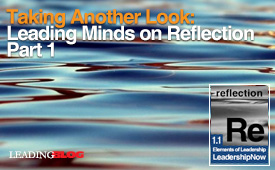
Posted by Michael McKinney at 04:58 PM
Permalink | Comments (0) | Personal Development
09.09.19

Learning to Lead with Ron Williams
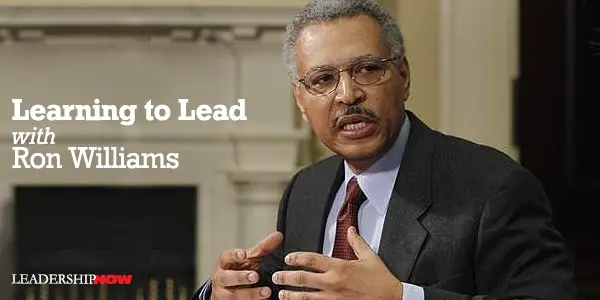
WHO IS looking out for you?
"No boss or mentor drove my success—although they did open doors for me. My success came about through a combination of hard work, continual learning, fortunate career choices, and a bit of luck—by being in the right place at the right time," writes Ron Williams. Williams is best known for his tenure as CEO and Chairman of Aetna, where he transformed a $292 million operating loss into $2 billion in annual earnings.
In Learning to Lead, Williams shows how anyone can grow and succeed as leaders. He grew up in a working-class family in one of the poorest neighborhoods of Chicago in the 1960s. The book is exceptional. He weaves the experiences of his career with the lessons we can all learn from them. Well told and insightful.
He begins by asserting that the single most important asset you have is you. As a result, you need to focus on getting better. "Two things are essential: a deep personal commitment to excellence in everything you do and a commitment to continual improvement." He encourages us to strive to become 15% better each year in concrete and actionable ways. To do that you need to really think about what you are going to do differently. If you want to be extraordinary, you need to stretch yourself above the average person.
Exceed your job description. Do it for you and build a reputation. "By sticking to tasks listed in your job description, you are refusing to demonstrate your ability to perform at a higher level. Why should anyone think of you as a potential leader when you've provided them with no evidence to suggest it?"
For him, his underprivileged background represented an opportunity. "The world and its people were a puzzle for me to solve." He reframed his world. It is our mindset that often makes it impossible to escape the box we find ourselves in. "Reframing is about creating a new mental landscape with a larger scope of freedom, a greater degree of flexibility, and a set of alternative ways of approaching any problem—which can often lead to new and unexpected solutions."
You know you need to reframe when what you hear around you is, "Everybody knows" and "It's obvious that." "It's a sign that you and your colleagues may be trapped in a box of your own making—one in desperate need of reframing."
On the topic of mentors, Williams believes that they are helpful, but you shouldn't spend your time looking for one. "Mentors come along without planning. Mentorship must arise naturally out of the situation rather than being forced." However, and his is key, "that doesn't mean you can't make a conscious effort to learn from the people around you. As you work on learning to lead yourself, you should also seek out others whose examples, experiences, and insights can be of value to you."
When people do (or seem to) get in your way, rather than finding blame, assume positive intent . You can choose how you respond to negative events. We don't need to take it personally. "If there's something that will make you feel really good to say—something you are itching to say— don't say it . Blowing up in the face of provocation is a way of losing power, not of claiming it." Assuming positive intent has been one of William's secret weapons throughout his career. It is an "empowering strategy that disarms defensiveness and turns potential enemies into allies."
When leading others and you are faced with opposition to a project or deadline, Williams says that the leader's job is to ask a lot of pointed questions. "When people protested that a particular deadline I suggested was 'impossible,' I would ask, 'Can you help me understand how you determined that?' or 'What are the factors that led you to conclude it's impossible?' I avoided starting my questions with the word why, having long ago discovered that 'why' questions tend to make people feel defensive—and respond accordingly. By contrast, the more oblique wordings I used directed attention away from the blame game and exactly where I wanted it—toward uncovering the root causes behind their objections."
A leader also needs to ask questions that lead people to think about the problems they face in a new way; to overcome their mental barriers—"those unquestioned assumptions, unexplored options, or unchallenged rules of thumb that keep people stuck at a low level of achievement." These mental barriers cause us to reinforce them with information that supports them and ignore the evidence that should alert and enlighten us. We hurt ourselves and our organizations when we act on our untruths.
Williams includes a chapter on managing up and down and presents his Two-Up/Two-Down System. "Paying close attention to the ideas, information, and concerns of the people around you—especially those operating from a different perspective or from a different location in the organizational hierarchy—is key to leadership success. Learning to correctly grasp what I call strategic intent of those in important positions above you and below you in the organizational hierarchy is a vital leadership practice, one that you should try to make into a daily habit."
Williams provides lessons in communication, creating a positive culture, defining reality, and many more. Putting in practice what he presents here does not require extraordinary gifts. "Your own abilities can suffice to make you an effective leader—provided you focus on the daily challenges around you and then work doggedly, thoughtfully, and positively with the people around you to overcome them."
There is a lot of emotional intelligence contained in this book. Reading it is a good way to develop your own EQ and check your self-awareness. Use Learning to Lead to prepare yourself answer the call to lead when it comes.
![]()
![]() Like us on Instagram and Facebook for additional leadership and personal development ideas.
Like us on Instagram and Facebook for additional leadership and personal development ideas.

![]()

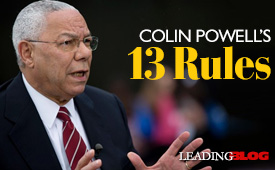
Posted by Michael McKinney at 12:10 PM
Permalink | Comments (0) | Leaders , Leadership Development , Personal Development
08.28.19

The Best Mentor You Can Find is Up to You!
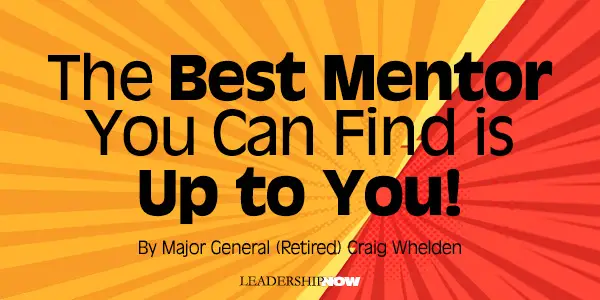
"The greatest good you can do for another is not just to share your riches but to reveal to him his own."— Benjamin Disraeli
WHEN I WAS a young Army lieutenant, I met with my Assignment (Personnel) Officer, Major Tom Montgomery in Washington D.C. on my way to Germany in the summer of 1977. I never expected that he would become my first true mentor.
There was no contractual agreement or even a discussion about such a relationship, and through all these years, I've never mentioned the word "mentor" to him. But, throughout our relationship, our conversations have given me volumes of knowledge about leadership and a host of other topics.
I saw in him a leadership style similar to my own, just more seasoned. I wanted to learn as much as I could from him and use similar techniques as my own leadership responsibilities grew. He helped me get certain jobs and I worked directly for him once. We remain great friends to this day.
Receiving mentorship is a vital element in learning about leadership… and being a mentor is a responsibility of all great leaders.
I believe there are four types of mentors: assigned, self-appointed, sought-after, and what I call "virtual." I have experienced all four. The first three are rather self-evident in terms of what they mean. What I've found the most valuable, however, is this last one, virtual .
What do I mean?
Virtual mentorship is something you do on your own. You simply pay attention to all of the people around you and learn from them. This can apply to both your professional and personal life. Pay attention to what others do or say that is particularly smart or good, then adopt it as your own habit. Notice also when a leader does something incredibly dumb or harmful to others, then put that in your leadership reservoir as well, so that you will never do the same. We've all seen good and bad behavior and said to ourselves: "If I ever get into that position, I hope I behave—or do not behave—like that."
Think of your life as a journey carrying a backpack, and observed behaviors are rocks you find along the path. Pick up both the good and bad—the good for future use and the bad to remind you not to repeat what those rocks represent. I've got plenty of rocks in my backpack—of both kinds—that I've picked up along my life's journey. All great leaders learn something from those they encounter along their journey.
It's also a good practice to acknowledge those who provided meaningful lessons. I regularly cite those who taught me something that I now use myself. I also store away lessons that I want to avoid from leaders who I don't want to emulate, though I generally refrain from naming them.
Perhaps one of the greatest periods during which I learned from others was my time in the Pentagon in the late 1990s. My 23 years of service to that point had been exclusively within Army ranks, with no duty served in another military branch. But in 1996, when I became a new brigadier general, I was assigned to the Joint Staff in the Pentagon.
I served during this time with a number of great military leaders who influenced me. Lieutenant General Pete Pace (later Chairman of the Joint Chiefs of Staff) was the J3 of the Joint Staff. I had to brief him each morning. My immediate supervisor was first Major General John Van Alstyne, then later Rear Admiral Tim Keating (who eventually became the Pacific Command Commander and Northern Command Commander as a 4-star admiral). Brigadier General Jim Conway (later Commandant of the Marine Corps) was a fellow 1-star and Colonel David Petraeus was the Executive Officer for the Chairman of the Joint Chiefs of Staff, General Hugh Shelton.
Lieutenant Colonel Terry "Guts" Robling served there as well and would later become my boss as a three-star general when he commanded Marine Corps Forces Pacific and I was his civilian Executive Director. That was a particularly interesting relationship, as he was a lieutenant colonel when I was a brigadier general in 1996. While he didn't report to me, we knew each other and occasionally worked together. Seventeen years later, I reported to him.
I remember our first discussion in his office in 2013, where I made clear that while we had a different relationship in the Pentagon, I was perfectly fine working for him. I remember him saying he was, as well. He was very comfortable in his own skin. We got along great in the two years of his command tenure and remain good friends to this day.
Good leaders don't patent their behaviors; they willingly pass them on. I have borrowed many leadership techniques—perhaps most of them—from others who freely gave them up, and from some who didn't even know I took them. Let your greatest legacy be that you pass on the best-of-breed leadership traits you've learned from others.
I freely pass on mine. Many are in my new book, Leadership: The Art of Inspiring People to Be Their Best.

Major General (Retired) Craig Whelden is the author of the international best selling book, Leadership: The Art of Inspiring People to Be Their Best. This is an extract from Chapter Three: "Are You My Mentor?" Learn more about Craig, his book, and speaking opportunities at www.craigwhelden.com
![]()
![]() Like us on Instagram and Facebook for additional leadership and personal development ideas.
Like us on Instagram and Facebook for additional leadership and personal development ideas.

![]()


Posted by Michael McKinney at 10:13 PM
Permalink | Comments (0) | Leadership Development , Leading Forum , Personal Development
07.29.19

Feedback (and Other Dirty Words)

FEEDBACK HAS A LOT OF BAGGAGE associated with it. Feedback is not always well-intentioned and is used to punish, demean, or manipulate. When well-intentioned we don't always do it right. We dump on people, we're biased, we miss the overall issues, and present it in a way that doesn't sound helpful. And we, of course, wanting to be right and accepted don't see it as the gift that it is.
As a result, you will find people avoiding it altogether—whether on the giving or receiving end of it. Or you will find people trying to take it to a higher lever and state that what we need and really want is attention. Positive attention is the way to go. Build on strengths. But sometimes we need to tame our strengths for our own good, and sometimes we need to manage our weaknesses. And frequently we have no idea unless we are told. We need feedback.
In contrast to the desire of some to dumb down or avoid feedback, authors Tamra Chandler and Laura Grealish have decided to deal with feedback head-on in Feedback (and other dirty words): Why We Fear It, How to Fix It. Done right, feedback is not only a good thing, it is essential to growth and performance. They say we need to do more than tweak our feedback practices, we need to completely rethink the what, how, and why.
They begin by defining feedback as "Clear and specific information that's sought or extended for the sole intention of helping individuals or groups improve, grow, or advance." This forms the basis for their Feedback-Fixing Movement.
"Every great feedback experience," they write, "is anchored in fairness, focus, and frequency." Fairness is about trust. "When trust and fairness are absent, because either the feedback itself or the Extender [of feedback] seems unfair or biased, the Receiver retreats into protection mode." We generally associate feedback with criticism because that's sadly the only time most people speak up.
Focus is about making the feedback specific, targeted, and brief." When we dump on people, they shut down and the feedback moment is gone. "Dishing out bite-sized portions of off-the-cuff gratitude, recognition, direction, or coaching can move the performance needle much more effectively than hours of training sessions, development seminars, or dismal laundry lists of your rights and wrongs from the past year."
Frequency is the accelerator. "Connecting frequently speaks volumes. It says, 'I'm paying attention, what you do is important and notable, and you are a priority.'" Informal and spontaneous is the secret to frequency.
To revolutionize feedback, the best thing you can do right now—especially as a leader—is to become a Seeker of feedback. That is, become a person who proactively requests feedback from others with the intention of self-development or growth. It helps you in a couple of ways. First, you are the example you need to be, and second, to be a seeker lowers the fear associated with feedback because you choose the time and place, the issue and the extender of feedback.
The authors offer the Seeker several tips to effective feedback seeking. First, ask in advance, giving the Extender(s) time to think. (Asking more than one person provides you with a better picture of what is actually happening.) Give them permission to be candid with you. They are most likely as uncomfortable with it as you are. Third, ask them to start noticing based on the nature of the feedback you are requesting. And finally, make the choice to do something with what you have learned.
I found the chart below helpful in wrapping your mind around the proper way to deliver feedback. The considerations are many but going through the chart will help you not only form the conversation but get a handle on your intention for giving feedback in the first place.
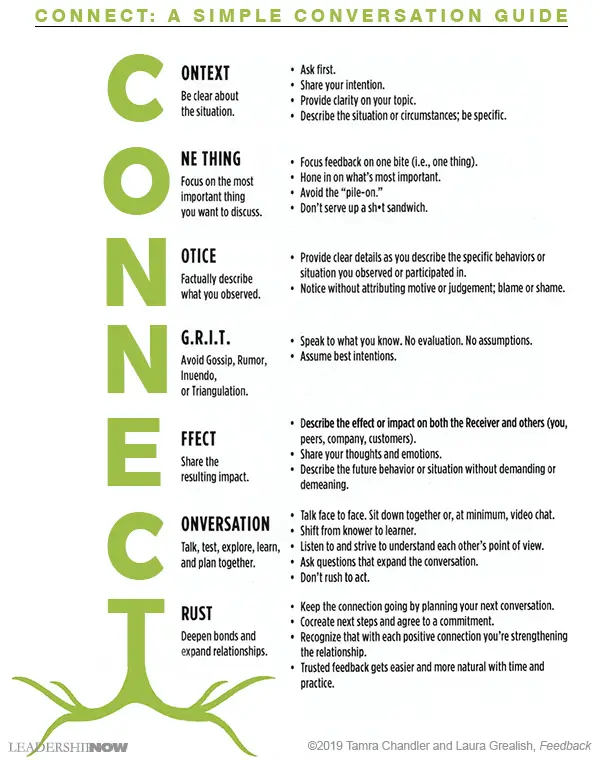
Feedback (and other dirty words) is full of helpful insights and constructive interpretations of the scientific studies and data regarding the issue of feedback. It is a comprehensive look at feedback and well worth reviewing in terms of both delivering and receiving feedback.
![]()
![]() Like us on Instagram and Facebook for additional leadership and personal development ideas.
Like us on Instagram and Facebook for additional leadership and personal development ideas.

![]()


Posted by Michael McKinney at 02:16 PM
Permalink | Comments (0) | Human Resources , Personal Development
07.23.19

The Gift of Struggle
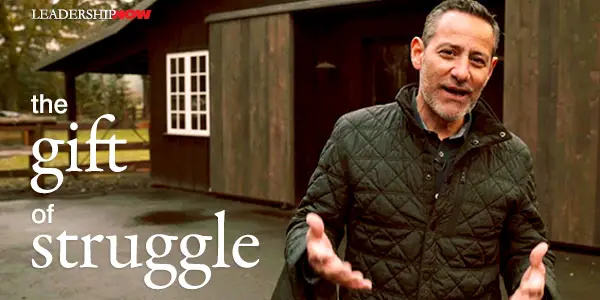
BOBBY HERRERA has a message and the message is "We all struggle. Inside every struggle is a gift. Leaders share their gifts with others."
We tend to not share our struggles or the lessons we learn from them. They are painful and very personal. But Herrera—CEO and cofounder of the HR service company Populus Group—say that's exactly what leaders do. And that's why he is sharing his stories and lessons in The Gift of Struggle.
One of the core principles at the Populus Group is that "everyone deserves the opportunity to succeed." It makes sense, and it drove Herrera, but he felt like the people working with him didn't share his passion and didn't understand why he did what he did. But once he shared his story—his struggles—they connected, and it gave them meaning. It not only changed the employees but more importantly, it changed him. He understood them better and became a more compassionate leader.
If you don't step up and tell the story that gives you identity and purpose, your people will be left on their own, trying to guess what matters to you and why. Without fulfilling work, they will make assumptions about your mission—or lack thereof—and leave when they find a competitor who offers what you've withheld. Until then, they'll give you just enough to check the box and get through the day.
His journey to founding and building the Populus Group is full of ups and downs. But every struggle left him with a gift he used to grow and overcome. The stories he shares are relatable and illuminate the gifts that will help you become a better leader.
Here are overviews of some of the gifts you will learn:
Share What You Imagine—Build Together:
These organizations don't allow "ROE" ("return on ego") to compromise the integrity of the culture. Enduring cultures are never enforced by a top-down hierarchy. Everyone lives in a culture, and therefor everyone must use their voice to contribute to it.Own Your Part:
Leadership amounts to wanting more for your people than we want from them.Always be a Student:
If you want to be a wise leader someday, you must fiercely apply what you learn. You must also be selective when choosing who you will study.Not Everyone Will Summit:
The guide said, "I can't recall a climb when everyone made it to the top. It's possible, I guess, but it seems like something always happens."
There is no actual summit in business. There are peaks and valleys—the business cycles we endure, the victories and pain points within an organization—that we experience as highs and lows. And yet as long as our doors remain open, there is no final endpoint, only new challenges, problems, innovations, and solutions.
And applying this gift to people, I thought this was eloquently put:
It's is important to realize we are all climbing our own mountains. Everyone you hire started their career climb before you met them, and they will continue climbing for a long time after their tenure with your company is over. All of us are working within our own set of constraints, goals, and unexpected life events that shape our journey.We all climb for different reasons, so it's important to honor people's dreams. Your job as a leader is to encourage the growth of your people and to appreciate their particular contributions to the ongoing climb of the company. Regardless of when a person chooses to strike out on a different course, celebrate your time together. Life is a sequence of intersections, shared efforts, and differing goals.
Herrera says, "struggle is the currency of progress." We need to become students of struggle. Welcome it into our lives as a tool for growth and increased meaning. Strength comes from our struggles. When you view your struggles as a gift, you will become a stronger, more resilient, and more compassionate leader.
![]()
![]() Like us on Instagram and Facebook for additional leadership and personal development ideas.
Like us on Instagram and Facebook for additional leadership and personal development ideas.

![]()
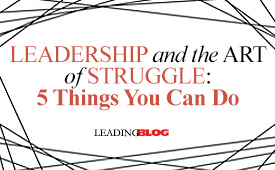

Posted by Michael McKinney at 11:47 AM
Permalink | Comments (0) | Personal Development
07.17.19

10 Guiding Principles That Will Lead You to Future Happiness and Success
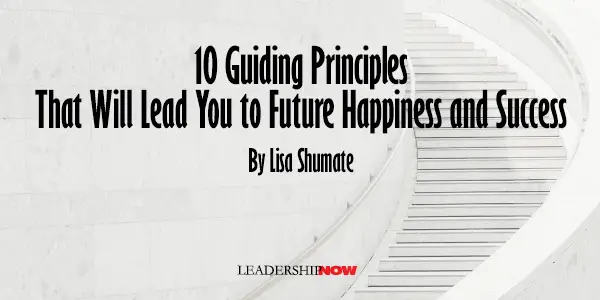
WE SPEND SO MUCH TIME focusing on credentials, experience, intelligence, and presentation. And yet, what is crystal clear to me after 20 years in leadership roles is that those ingredients, while important to success, aren't enough if you've forgotten the fundamentals of being positive, learning from others, being honest and the kind of person people want to work with.
I wrote the book Always and Never: 20 Truths for a Happy Heart, to help center readers on guardrails for living and leading at your best. When you step outside of these boundaries, your professional and personal life are likely to suffer, holding you back on both fronts. Read, reflect, and recommit to these Always and Nevers, and realize the kind of future you've been planning for.
#1
ALWAYS be in charge of your thoughts
What you say and how you feel starts with the way you think. The way you think about everything is in your control. Thoughts are like seeds that need to be watered and nurtured with real knowledge, by real experts and real friends. A curious, open mind lets in the necessary sunshine.
Never forget that you are in charge of the way you think and a healthy mind requires ongoing fertilization.
#2
ALWAYS listen before speaking
And then listen some more. Listen to understand, to demonstrate empathy, and to give the gift of your time and attention. Listen with your eyes as well as your ears. This requires slowing down long enough to truly see the person in front of you. When people want to talk, especially loved ones, they're rarely seeking answers from you. They want a sounding board, reassurance, and to connect with someone close to them.
Never dominate the conversation; you have two ears and one mouth for a reason.
#3
ALWAYS follow the Golden Rule
Buddhism, Judaism, Hinduism, Confucianism, Christianity, and Islam all subscribe to a version of the Golden Rule in their religious teachings. It's a simple notion that has endured through the ages. Treat other's the way you'd like to be treated. Kindness, patience, being first to say I'm sorry are the hallmarks of the Golden Rule, and the rewards to you are long-lasting: inner peace and a life of no regret.
Never let the mean acts of others cause you to break the Golden Rule.
#4
ALWAYS tell the truth
The truth has everything to do with intent. When intentions are pure and not mixed with anything else, there is the capacity for truth. In your daily consumption of information and interactions be aware of sources involved and their potential motives. People who spread rumors and half-truths are always recruiting new members.
Never gossip or waste time with those who do.
#5
ALWAYS do as you say you will
Make your commitments a priority, and you'll earn something invaluable-- trust. The ability to build and keep trust is worth more than anything else you can bring to the table. There is no skill, degree, or talent that can replace it. Trust is the connective tissue between you and every important relationship in your life: your parents, spouse, boss, coworkers, and friends.
Never undermine trust placed in you by others by not keeping your word.
#6
ALWAYS place a high value on you
The most important relationship you will ever have is the one you have with yourself. Take care of your health and finances on a daily basis. Make your voice the loudest you hear, and the first one you listen to about your hopes and dreams. The compelling force for happiness and success in your life is you and only you.
Never allow others to determine your ability and potential.
#7
ALWAYS be a student
G. Bernard Shaw is credited with the adage "Youth is wasted on the young." Wouldn't it be great to preserve all the wonders of youth as we gain the wisdom and knowledge that comes long after high school and college? There is something you can do to maintain your youthful outlook on life—always be a student. Seek out opportunities where you aren't the smartest person in the room and learn. Read books and magazines that broaden your horizons. Continuing your education in formal and informal ways will keep you young and interesting.
Never think you're too smart or too old to learn something new.
#8
ALWAYS separate opinion from fact
Opinions are just that, one person's view. They can be wrapped in fear or prejudice. Opinions can make people as impervious as steel preventing the passage to clear thinking or new possibilities. Keep your mind free of opinions and focus on acquiring real knowledge. Be selective about people who hold themselves out as experts. The best knowledge possible is that which comes from your first-hand research and experiences. Get the facts before you make big purchases, cast your vote, or try to influence others.
Never mistake opinion for fact.
#9
ALWAYS see the beauty in mistakes
Allow yourself to see mistakes in a whole new light. Learn from them, and one day, your mistakes will provide material for the stories you tell, your heartfelt advice to others and your expanding book of self-confidence. Always forgive yourself and others for making mistakes. Make decisions based on the best information you have and be confident you will be able to handle the outcome.
Never allow mistakes to cause shame or prevent you from trying again.
#10
ALWAYS share credit for success
If you want to be known as a team player, to be included in big projects and considered for promotion, look for ways to acknowledge others and their contributions. In fact, the group is always smarter than any one person, so why not embrace it and say so. When you make co-workers feel a part of something, they are inspired to do their best. People who inspire are literally pushed up the ladder by their peers.
Never allow your desire for praise overrule recognition for the group.
These principles come to you as a loving reminder, moment of reassurance, and reaffirmation of all that is important today and will be for the rest of your life. It comes from someone who has learned through experience these change-proof concepts the hard way.
I hope you'll share them with those you love. I hope it brings you comfort, joy and all the blessings of a life well-lived.

Lisa Shumate is General Manager of Houston Public Media, Associate Vice President at the University of Houston, and also Executive Director of the Houston Public Media Foundation.She is a mentor in the University of Houston PropPel Leadership Development Program for high potential staff. She serves as Advisor to Public Media Women in Leadership and also is a mentor to the group's founder. She is the author of Always and Never: 20 Truths for a Happy Heart.
![]()
![]() Like us on Instagram and Facebook for additional leadership and personal development ideas.
Like us on Instagram and Facebook for additional leadership and personal development ideas.

![]()
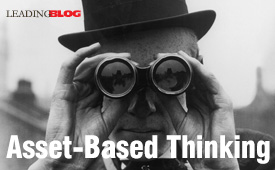
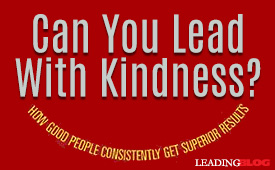
Posted by Michael McKinney at 09:45 AM
Permalink | Comments (0) | Personal Development
07.15.19

Jerry Colonna on True Grit and Other Advice for Leaders
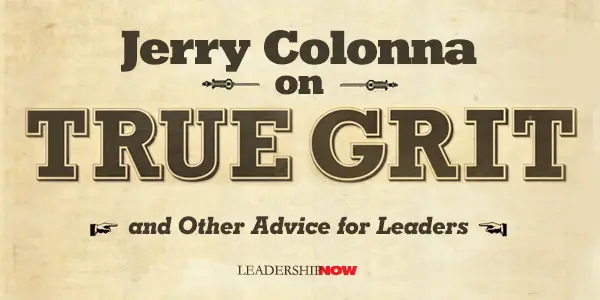
JERRY COLONNA helps start-up CEOs make peace with their demons, the psychological habits and behavioral patterns that have helped them to succeed—molding them into highly accomplished individuals—yet have been detrimental to their relationships and ultimate well-being. In Reboot: Leadership and the Art of Growing Up, he does just that.
He states that much of what he has learned about growing up came from learning to lead. Reboot is a peak into his life and the lives of leaders as they come to terms with who they are and what is holding them back. It's like listening to a coaching session.
Who we are shows up in our leadership. Sometimes we use the organizations we lead to make ourselves feel better about our unresolved issues. When we don't like what we see, we have to be honest and ask ourselves, how have I been complicit in creating the conditions I say I don't want?
In Reboot, he says things like:
The back of the warrior is strengthened by knowledge of knowing the right thing to do. The soft, open heart is made resilient by remembering who you are, what you have come through, and how those things combine to make you unique as a leader.
On learning to lead yourself he says:
Learning to leader yourself is hard because it requires us to look at the reality of all that we are—not to fix blame on ourselves but to understand with clarity what is really happening in our lives. Learning to lead yourself is hard because it is painful. Growth is painful; that's why so few chose to do it.
A client tells him, "It's like this—if I'm not panting, I feel like I'm not working." He responds with:
There it is. That same old haunting belief system. Run faster and faster, telling oneself that the way to be is to do; do more, faster, and just maybe you'll outrun war, cancer, and the other demons that cause you to doubt your worth, your lovability, and your own voice.
Colonna challenges leaders to show up as you are.
When we stop the bullshitting, the pretending that we're crushing it, that we've got it all figured out, we run the risk of being overwhelmed by the realities of all that we carry—the burdens we've convinced must remain secret to keep us and those we love safe, warm, and happy. But the spinning prevents us from being who we really are. You might as well tell me who you are, because if you don't, I'm going to invent things, and those things will stand between us, keeping us from being close.
His thoughts on grit are illuminating. He begins by telling us what grit is not:
False grit is brittle. It's the sense that we are nothing if we can't take a punch. In fact, we define "taking a punch" as the ability to not feel pain when we are pinched. False grit is dangerous. It feeds a stubbornness that, in turn, can feed delusion. We mistake the tendency to delude ourselves that our relationship will improve, our companies will succeed, if only we double down on our old patterns, grip the steering wheel until our knuckles whiten, and bear down. Stubbornness is not the hallmark of the warrior. Leaders who persist out of stubbornness, believing themselves to be gritty, are at best delusional and, at worst, reckless.
On the other hand, true grit is kind.
True grit is persistent. Ture grit persists not in holding on to false beliefs against all evidence but in believing in one's inherent lovability and worthiness. Ture grit is the leader believing in the team's purpose, its capacity to overcome obstacles, and the relevancy of the cause. True grit acknowledges the potential of failure, embraces the fear of disappointment, and rallies the team to reach and try, regardless of the potential of loss.True grit, the capacity to stick with something to the end, stems from knowing oneself well enough to be able to forgive oneself. To have inquired deeply and steadily enough to find the deep sense of purpose that is beyond a personal mission statement. In that knowing of oneself, one is then able to stand as a single, warrior amid a community of brokenhearted fellow leaders.
![]()
![]() Like us on Instagram and Facebook for additional leadership and personal development ideas.
Like us on Instagram and Facebook for additional leadership and personal development ideas.

![]()

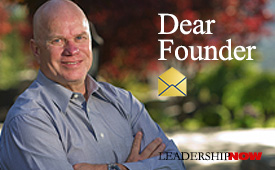
Posted by Michael McKinney at 01:05 AM
Permalink | Comments (0) | Entrepreneurship , Personal Development
07.05.19

Grace: A Leader's Guide to a Better Us
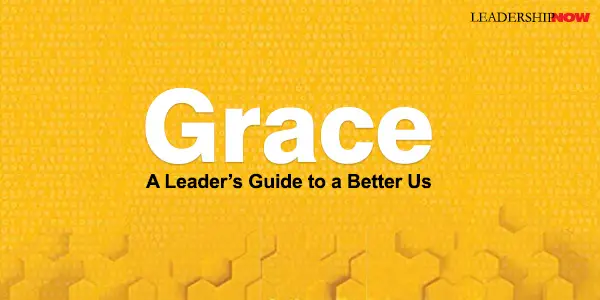
GRACE, a concept present in all of the world's major religions, has a divine meaning. Grace, in a secular sense—that is on a human level—is about perspective. A perspective larger than ourselves. A perspective that reaches to a purpose beyond who we are alone. In short, our connectedness.
Grace is a critical part of who great leaders should be. To that end, John Baldoni has tackled for us in Grace: A Leader's Guide to a Better Us, an attribute that is in short supply today. Grace is something all leaders should model for the benefit of those around them so that it spreads to society in general.
Grace is foundational to service. Baldoni writes:
Love, sacrifice, truth, and courage are virtues made actionable by grace. We may be disposed to do what is right; grace gives us the impetus to act upon doing it. Grace then becomes the inspiration for treating individuals with generosity, respect, and compassion. It manifests itself as action in the name of others, and it energizes us to act upon our beliefs.
To help us better understand grace and to help us intentionally apply it in our leadership, Baldoni explores grace from five perspectives with this acronym:
G is for Generosity: the will to do something for others.
R is for Respect: the dignity of life and work.
A is for Action: the mechanism for change.
C is for Compassion: the concern for others.
E is for Energy: the spirit that catalyzes us.
Generosity
Gracious people give of themselves. Gracious people leverage who they are and what they have for the benefit of others. Baldoni shares a great quote from British Prime Minister Benjamin Disraeli, "The greatest good you can do for another is not just to share your riches but to reveal to him his own."
Gracious leaders share time, knowledge, and power. They cultivate a selfless approach to life. Generosity emanates from an abundance mindset. A selfless person, even in the midst of personal adversity, can find something to share with others. That attitude is contagious.
Respect
Self-awareness opens the door to respect for others. A fully self-aware person knows her faults as well as her strengths. Such awareness compels the self to acknowledge the dignity of others." Humility plays a big part here. Respect and self-respect fuel each other. They grow together.
Action
Grace is intentional. A reactive mind rarely manifests grace. While grace that has been shown to us comes freely, it requires effort for us to generate it ourselves. Grace means rising above a perceived slight.
Grace is often manifested in clarity of purpose and civility. Civility is a decision we make. "No matter what leaders may feel inside, they think before they speak. They focus not on themselves, but on the needs of others—on healing." Instilling civility in the workplace is the job of leaders.
Compassion
Gracious people have the capacity to forgive and show mercy. "Grace enables us to take the higher road, to think more clearly." It meets rage with love and civility.
Gratitude enables compassion—both gratitude expressed and felt. "Gratitude is that capacity to care. We need to reframe our lives with a constant awareness of just how important feeling gratitude within ourselves is because it actually helps our overall well-being."
Energy
Grace requires energy. "It renews itself through practice as well as by taking in life, doing one's best, enjoying the highlights, mourning the losses, and do so in the full spirit of life. In forgiveness, mercy, joy, and humor." Grace draws energy from a positive outlook and an abundance mindset.
When we demonstrate grace in our leadership, it spills into other areas of our life as well because it is an approach to life. Our example encourages others to begin to think that way as well. Grace—in all of the dimensions Baldoni explores in this book—is a value that has fallen on hard times. It is time to revive it in our personal lives, in the workplace, social media, and in public discourse.
Grace celebrates grace as well as advocates for it. Baldoni shares many examples of people from all walks of life who demonstrate grace in their lives. They are an inspiration to us all.
Grace reduces the space between us. Our environment often pushes us into negativity; into the differences between us. Grace intentionally overlooks the negative and leverages the positive. It finds the connection and promotes it.
Baldoni breaks the often intangible idea of grace into down-to-earth actionable behaviors that we can all intentionally implement into our lives. You will find a self-assessment tool of 20 questions to help you take an honest look at how much you have allowed grace to fill your thoughts and behaviors.
![]()
![]() Like us on Instagram and Facebook for additional leadership and personal development ideas.
Like us on Instagram and Facebook for additional leadership and personal development ideas.

![]()
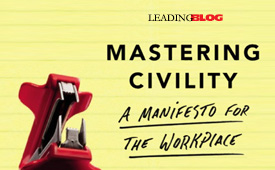
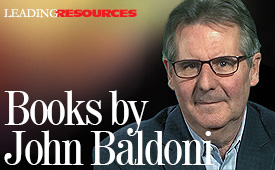
Posted by Michael McKinney at 01:08 PM
Permalink | Comments (0) | Leadership Development , Personal Development
07.03.19

The 24 Hour Rule: Is Your Current Pace Sustainable?
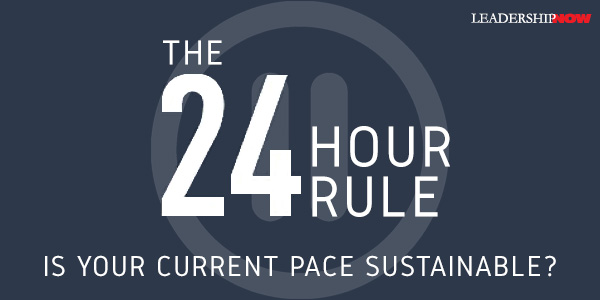
AS LEADERS, we can and do introduce stress into the workplace. Charles Fred initiated a study of over 4000 post-startup business to find out why, after they had experienced early growth, had stagnated.
What the researchers found is a problem in the way employees approached their roles, solved problems, and interacted with each other; poor-performing firms showed working environments of intense stress." The responsibility for that rests on those that influence how others work and interact within the workplace—the leaders.
Our culture baits us into a non-stop frantic pace with the inevitable unintentional behaviors. Many leaders believe that they are just setting the bar for high performance. Our bodies react by producing cortisol and adrenaline to help us keep up, but over time it becomes unproductive stunting the "very tool we need to prosper in today's environment: our cognition. So, when we require mental acuity, we experience diminished recall. When we need sharp thinking and problem-solving, our minds are full."
Into this environment, Charles Fred introduces a leadership discipline that inserts pause and calls it The 24 Hour Rule. "The discipline of pause focuses on the simple notion of creating a space between you and the persistent and perilous stimulus from a frenetic world." It is the role of the leader.
Pause is not a delay but a discipline. It's not a waste of time; rather, it affords us the time to deliberate before we act. It allows us to control how we respond and react to others, whether it takes five seconds or 24 hours. Most importantly, it does not delay our ambitions or dampen the need to hustle.Unfortunately, leaders don't have a contained workspace or a controlled set of procedures to give us the method to pause. Instead, we begin each day with unknown situations, variables well beyond our ability to plan and prepare. For these reasons, a leader must use self-discipline—the ability to mentally call a time-out, to get rest, to run through a checklist—despite overwhelming temptations to quickly react or respond without doing so.
It is the one thing we have complete control over. Fred writes, "I've learned that I can truly only regulate one thing: the way in which I respond and react to another human."
When we look at the highlight reel of successful people, it gives us the impression that they are always on—always producing. As we watch from the sidelines, we create for ourselves a false set of expectations. We introduce unnecessary stress into our lives and work as we try to keep up. The thing is, it's not real. Top producers insert pause into their work. We need the self-discipline to do the same by letting go of a false ideal.
The 24 Hour Rule is a well thought out and well-executed booklet. Fred provides three steps for building self-discipline around pause. It is a quick read but one that is worth spending some time thinking about.
How will you introduce pause into your leadership?
![]()
![]() Like us on Instagram and Facebook for additional leadership and personal development ideas.
Like us on Instagram and Facebook for additional leadership and personal development ideas.

![]()


Posted by Michael McKinney at 06:48 AM
Permalink | Comments (0) | Personal Development
05.27.19

Stop Getting the Wrong Things Done

THERE IS a counterintuitive mindset behind Michael Hyatt's productivity system. Productivity is not about doing more faster. Rather it's about achieving more by doing less as a result of focusing on getting the right things done. It's about what you are not doing.
We undermine our potential when we try to do everything. The goal of productivity and the foundation of the Free to Focus system is to free you to pursue what's most important to you. It's about freedom. Freedom to focus, Freedom to be present. Freedom to be spontaneous. Freedom to do nothing.
To that end, Michael Hyatt presents in Free to Focus, 9 actions grouped into 3 steps.
STOP
To start, you must stop. Step back and ask yourself, "Should I be doing this at all?" Reflect on your objectives and why they matter.
Formulate: What do you want your life to look like? What matters to you most. "Productivity should ultimately give you back more time, not require more of you." Freedom is the goal. What does that look like for you?
Evaluate: Where are you now? What should you be doing? It's time to separate the valuable activities from your busy work. Evaluate what you do and could do based on two key criteria: passion and proficiency. You're happiest doing things that you are good at, and you love doing. There are four zones of productivity that we typically operate in: the Drudgery Zone , Disinterest Zone , Distraction Zone , and the Desire Zone .
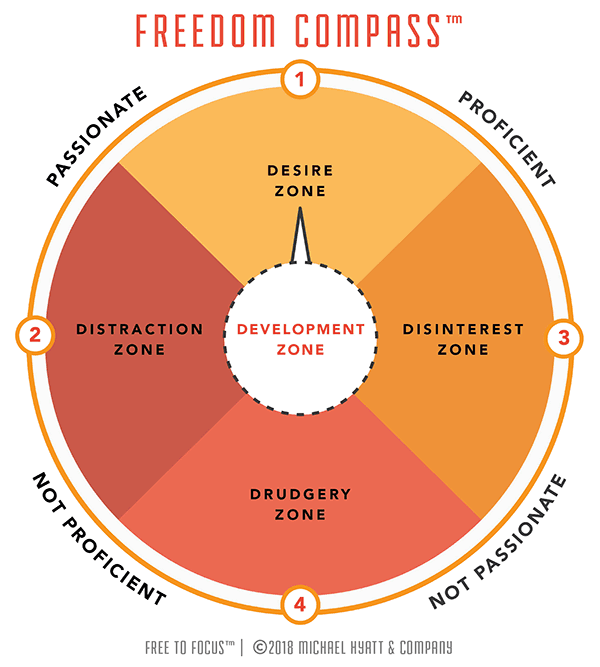
The desire zone is where your passion and proficiency intersect and where you can make the greatest contribution. Obviously, this is where you want to be functioning most of the time. Hyatt adds a fifth zone called the Development Zone . This is an area where you are passionate about and developing a proficiency, or passionate about but not yet proficient. We need to evaluate all of our tasks and place them in the appropriate zone.
Rejuvenate: Make time to rejuvenate. We can increase the energy we direct at our why when we sleep, eat right, move, connect, play, reflect, and unplug.
CUT
Eliminate: Every yes contains a no. Time is a zero-sum game. Ask yourself, "What will I have to give up in order to say yes to this opportunity? or Will saying no to this allow me to say yes to something better?" "By cutting away the nonessentials, you create space, for the things that really matter to flourish."
Automate: This step is not just about using technology more effectively; it's about creating routines that you don't need to think about, creating templates and processes. "If you ever find yourself thinking, There has got to be an easier way to do this, you should always assume there is. Then go find it."
Delegate: Should I be doing this job at all? Tasks in your Drudgery and Disinterest Zones should be delegated. The items in your Distraction Zone may be harder to let loose of since you enjoy them even though you are not the most proficient at them. Better to give them over to someone who can do them much better. If you have more than you can handle in your Desire Zone, you should look at delegating some of those too. Sometimes it is faster just to do it yourself, but "most tasks are not one-time occasions. So, while delegation does, in fact, take more time on the front end, it will save you an enormous amount of time every instance after that."
ACT
Consolidate: Harness the power of MegaBatching. "MegaBatching enables me to focus for an extended period on a single project or type of activity, churning out a ton of work quickly and with much higher quality because I'm less distracted. In those dedicated blocks of time, I truly am free to focus on the thing that matters most at that moment."
Designate: Decide what needs to be done now and what can be done later. It's a matter of designing your week, and Hyatt outlines six steps to make that happen. Plan your ideal week. Designate the what and when of your week and day.
Activate: Anything that takes our attention away "subtracts value from us and gives it to someone else—e.g., a coworker or an advertiser. Limit instant communications by turning off your notifications. Set boundaries by letting people know in advance that you are going offline for a period of time to focus. Use technology to block technology. Listen to the right background music. Take charge of your day.
Free to Focus is one of the best books you will read in order to take control of your life. You will find downloadable tools for each step of the process.
![]()
![]() Like us on Instagram and Facebook for additional leadership and personal development ideas.
Like us on Instagram and Facebook for additional leadership and personal development ideas.

![]()

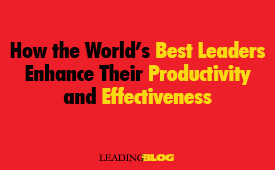
Posted by Michael McKinney at 05:59 PM
Permalink | Comments (0) | Personal Development
05.17.19

Do You Need an Attitude Adjustment?

HAVING A POSITIVE ATTITUDE is a critical element of leadership. To some, this comes naturally. Others must constantly work on it. Since my earliest memory, I have had the sense that anything worth doing… worth pursuing… must be passionately pursued. A positive attitude naturally follows.
I found myself first assuming leadership responsibilities at age 14 when I became an Eagle Scout. Perhaps I was naïve, but the leadership aspect of this achievement was unexpected. For me, getting there was just a mountain to climb. It was the culmination of 21 merit badges and a large community project. It was the excitement of the journey, the arrival at a destination, and the achievement of the reward.
For me, at 14 years old, it was like reaching the top of Mount Everest but with no real thought (or plan) on how I was going to get back down… the part of the climb where most people die. Once there, I didn't quite know what to do with these newfound responsibilities when people started turning to me to lead. But it did help jump-start a lifelong journey to develop and sharpen my leadership skills—a journey that really never ends.
Great leaders constantly deal with the struggle between achieving personal goals, while doing so with humility. Ask yourself, "Do you want to achieve lofty goals in order to 'climb the mountain' or do you want to get on top of the mountain so that you can help others climb their own mountain?" How can you do both?
In high school, I held leadership roles in school government and on the sports field. In my senior year, I was voted "Best All-Around" and "Most Dependable"—the latter accolade drawing raised eyebrows from my parents! At Purdue University, I was President of the Freshman Council at the largest school dormitory, President of my Fraternity Pledge Class, and Vice President of Purdue's Interfraternity Council. (I ran for President, but was asked by the Council whether I would take the VP spot if not selected to be President. My agreement sealed my fate).
All these experiences helped shape my thinking about, and commitment to, leadership because people started to turn to me to lead. I had the right attitude throughout these early years. However, there came a period in college when I lost my way.
My attendance at Purdue was facilitated by an Army ROTC scholarship, at a time when the Vietnam War was stoking nationwide protests across nearly every college campus. Compared to other campuses, Purdue was a fairly conservative school, but we had a chapter of the Students for Democratic Society (SDS), and they regularly protested the war on the mall or at the Armory.
I had mixed feelings about the war when I arrived at Purdue in 1969, having spent most of my high school years in Europe—insulated from the anti-war movement. But since I had an ROTC scholarship and my dad was retiring from the Air Force and starting law school about the same time I entered college, I felt an obligation to stay in a program that was paying my way. I also worked 4 hours each evening (Monday - Friday) as a janitor, cleaning the second floor of the university library to help make ends meet.
Then an unfortunate event happened.
Because of my student government activities, my leadership role in the fraternity, and my work schedule (combined with ambivalence about the war), I didn't participate in any ROTC activities outside the classroom. Just walking across campus in uniform to attend military drills drew unwanted attention. So, when the annual Army ROTC awards ceremony occurred in the spring of my freshman year (1970), and knowing that I was not an award recipient, I decided to skip the ceremony and attend the SDS rally in the mall instead.
Not my brightest moment…
That day, after chanting "1-2-3-4, we don't want your F*#king War!" over and over again, a growing crowd of about 1,000 decided to march on the Armory, where the ROTC awards ceremony had been moved to insulate it from the protests.
I followed the crowd.
Upon arriving at the armory, they broke open the large truck-sized doors and entered, chanting loud and strong. State troopers in riot gear soon arrived to keep the protesters away from the formation of cadets.
I was not an active protest participant, and naively thought of myself as being in some kind of "intellectual exercise," but one of my instructors saw me, that day. He called me in the following morning and told me that my scholarship was being put on probation.
This was a wakeup call for me, and it began the reshaping of my attitude. I had to decide which side to be on. I came to realize that I wanted to be a leader more than a protestor. Like some other Americans, I may have thought that the Vietnam War was ill-advised, but I also realized that there were alternative ways to make my mark on the world.
When ROTC summer camp training rolled around between my junior and senior year, I spent nine weeks at Fort Riley and did well enough to become the third-ranking cadet at Purdue during my senior year. Upon graduation from Purdue in 1973, I was one of six cadets designated a Distinguished Military Graduate.
So, what should you take from this ROTC experience? In a nutshell: attitude counts. A lot.
There's something to be said about the oft-repeated mantra that "you can be whatever you want to be." That said, all aspects of character: ambition, perseverance, self-awareness, empathy, humility, integrity, and always taking seriously the responsibility of being a leader—often while sacrificing personal welfare or gain—are required if you're to be the best you can be. You need building blocks to realize that dream. During those early years at Purdue—at least as it applied to an Army career—I lacked ambition, a good self-awareness, and perseverance. I lacked "grit."
I simply knew that I owed four years to the Army after graduation because of my scholarship, but after that, I thought I could move on to something else.
Once I finally decided to "get on board," my ambition, perseverance, and self-awareness kicked into high gear.
I then adjusted my attitude, and a 4-year commitment turned into a 30-year career.

Major General (Retired) Craig Whelden is the author of Leadership: The Art of Inspiring People to Be Their Best. This is an extract from chapter one, "Character: Leadership's Building Block." Learn more about Craig, his book, and speaking opportunities at www.craigwhelden.com
![]()
![]() Like us on Instagram and Facebook for additional leadership and personal development ideas.
Like us on Instagram and Facebook for additional leadership and personal development ideas.

![]()
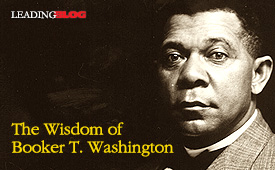
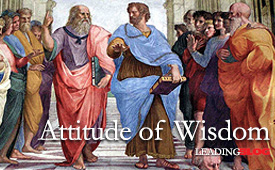
Posted by Michael McKinney at 12:01 AM
Permalink | Comments (0) | Leading Forum , Personal Development
05.15.19

The Three Types of Workplace Courage

COURAGE IS THE FIRST VIRTUE of organizational performance. Consider, for example, all the other concepts that courage connects to in workplace settings. Leadership takes courage because it requires making bold decisions that some people won't agree with or support. Innovation takes courage because it requires creating ideas that are ground-breaking and tradition-defying; great ideas always start out as blasphemy! And sales always take courage because it requires knocking on the doors of prospects over and over in the face of rejection. These aspects of work simply can't exist in the absence of courage.
That's why it's crucial to instill courage in those you lead, both in their development and training programs, but also by leading by example. There's a lot you can do as a leader toward this end: rewarding jumping first, creating safety nets to make trying and failing a palatable option, teaching to harness fear, and modulating comfort levels are all management tools for setting a foundation that supports and encourages courageous behavior. But while courage in the abstract is an easy thing to get behind, in practice it's more useful to break it down into different types of courage. Having a way of categorizing courageous behavior allows you to pinpoint the exact type of courage that each individual worker may be most in need of building.
I think of courage as falling into three distinct buckets: TRY, TRUST, and TELL Courage. Let's talk about each.
TRY Courage
The first bucket of courage is TRY Courage. TRY Courage is the courage of action. It is the courage of initiative. TRY Courage requires you to exert energy in order to overcome inertia. Certainly, it is easier not to do something than to do it, which is one reason why many people prefer to stay in their "comfort zones." It takes courage to TRY something, particularly when you've not done it before. This is the kind of courage that's demonstrated when someone "steps up to the plate," for example, taking on a project on which others have failed. You experience your TRY Courage whenever you must attempt something for the very first time, as when you cross over a threshold that other people may have already crossed over.
The courage of try is associated with:
- "Stepping up to the plate," such as volunteering for a leadership role.
- First attempts; for example, the first time you lead an important strategic initiative for the company.
- Pioneering efforts, such as leading an initiative that your organization has never done before.
- Taking action.
All courage buckets come with a risk, and the risk is what causes people to avoid behaving with courage. The risk associated with TRY Courage is that your courageous actions may harm you, and, perhaps more importantly, other people. If you act on the risk and wipe out, not only are you likely to be hurt, but you could also potentially harm those around you. It is the risk of harming yourself or others that most commonly causes people to avoid exercising their TRY Courage.
TRUST Courage
TRUST Courage involves resisting the temptation to control other people. Unlike TRY Courage, TRUST Courage is not about action. Instead it often involves inaction, or "letting go" of the need to control. With TRUST Courage, you step back and follow the lead of others. A common example of TRUST Courage is delegation. TRUST Courage is very hard for people who tend to be controlling and those who have been burned by trusting people in the past. TRUST Courage, though, is a crucial element in building strong bonds between people.
The courage of trust is associated with:
- Releasing control, such as delegating a task without hovering over the person to whom you've delegated.
- Following the lead of others, such as letting a direct report facilitate your meeting.
- Presuming positive intentions and giving team members the benefit of the doubt.
TRUST Courage, of course, comes with a risk. The risk associated with TRUST Courage isn't that you will harm other people, but that by trusting them, they might harm you. By trusting others, you open yourself up to the possibility of your trust being misused. Thus, many people, especially those who have been betrayed in the past, find offering people trust very difficult. For them, entrusting others is an act of courage.
TELL Courage
The third bucket of courage is TELL Courage, which is the courage of voice. TELL Courage is what is needed to tell the truth, regardless of how difficult that truth may be for others to hear. It is the courage to not bite your tongue when you feel strongly about something. Brown-nosing and people pleasing are symptoms of low TELL Courage. TELL Courage requires independence of thought. We also use our TELL Courage when we take responsibility for a mistake or offer an apology. Whenever we speak up and say what's hard to say, whether it be speaking truth to power, admitting a mistake, or saying "I'm sorry," we are using TELL Courage.
The courage of TELL is associated with:
- Speaking up and asserting yourself when you feel strongly about an issue.
- Telling the truth, regardless of where the person to whom you are telling the truth resides in the organizational hierarchy, such as presenting an idea to your boss's boss.
- Using constructive confrontation, such as providing difficult feedback to a peer, direct report, or boss.
- Admitting mistakes and saying, "I am sorry."
TELL Courage can be scary and comes with risks too. We avoid using TELL Courage because we don't want to offend others and fear being cast out of the group. The need for affiliation with those we work with is very strong, and the risk of TELL Courage is that, by speaking up and asserting ourselves, we will be cast out of the group and won't "belong" anymore.
Courage is Contagious
Understanding (and influencing) courageous behavior requires that you be well versed in the different ways that people behave when their courage is activated. By acting in a way that demonstrates these different types of courage, and by fostering an environment that encourages them, you can make your company culture a courageous one where employees innovate and grow both personally and professionally. Here's a handy diagram to remind you of these types of courage and what they require:
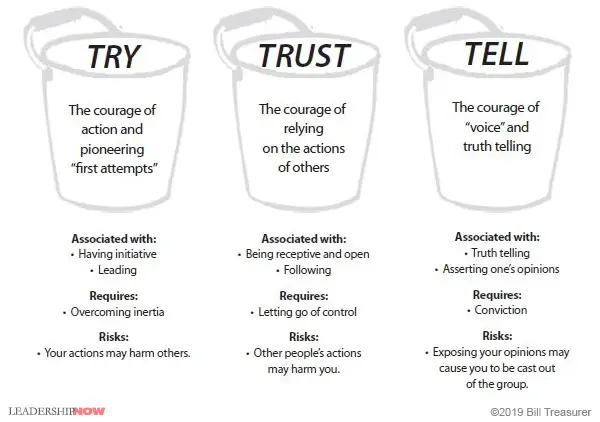

Bill Treasurer is the Founder & Chief Encouragement Officer at Giant Leap Consulting, a courage-building company that exists to help people and organizations live more courageously, and the author of Courage Goes to Work: How to Build Backbones, Boost Performance, and Get Results, which was recently rereleased in a 10th Anniversary edition. A former member of the U.S. High Diving Team, Bill is considered the originator of the new organizational development practice of courage-building. For over two decades, he has designed and delivered leadership and succession planning programs for experienced and emerging leaders for clients such as NASA, Accenture, CNN, Saks Fifth Avenue, Hugo Boss, UBS Bank, Walsh Construction, the Pittsburgh Pirates, the Centers for Disease Control, the National Science Foundation, and the U.S. Department of Veterans Affairs.
![]()
![]() Like us on Instagram and Facebook for additional leadership and personal development ideas.
Like us on Instagram and Facebook for additional leadership and personal development ideas.

![]()
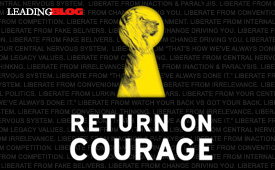
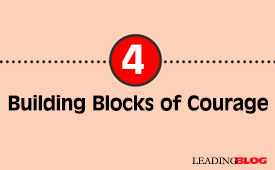
Posted by Michael McKinney at 11:37 AM
Permalink | Comments (0) | Personal Development
03.27.19

Fail More
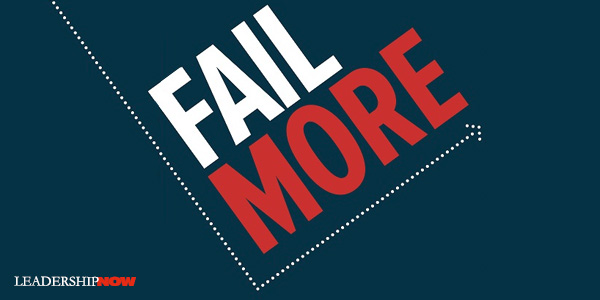
EVERYTHING YOU DO involves risk. The only questions are what and how much. Poor choices lead you into failure, and good choices take you out of failure.
"Success and failure both leave room for improvement. Inside every success, there are remnants of failure, and in every failure, there are pockets of success" writes Bill Wooditch in Fail More. He wrote the book not to encourage irresponsibility or to give license to "intentionally flunk life one mistake at a time," but rather to continually improving through intentional practice, with the willingness to embrace the process, and the ability to learn from the result.
Nobody likes failure. We are lead to believe that failure means that there is something wrong with us. Failure simply represents a challenge; not something to avoid. "If you try to evade the things that are fundamentally important to your growth, you'll pay the price of your neglect at a later date."
Perfect isn't part of the human condition. Many people wait for "perfect" before they begin, but perfect isn't just going to show up out of nowhere. We all have to do the gritty and unglamorous work if we're going to push the envelope. You have to put your toes on the edge of "comfortable" and step into the pain of change and the cloud of uncertainty to make a real difference in your life.
We crave certainty, and that feeds our fears. When it gets uncomfortable, when fear sets in, "you can't get emotional; you have to stay centered in logic and break things down to small wins every day." That's how you overcome obstacles. "When you move from emotion (fear) to logic (obstacle management), you can then visualize an outcome by walking through the imaginary steps it takes to achieve it."
The lesson of Fail More is to keep going. "Rejection will slap you in the face, not once, not twice, but so many times that you'll lose count. But your purpose will compel you to keep going, adapt, and grow."
There is a lot of material out there reminding us to embrace failure and clever memes that point you forward, but Wooditch makes one of the best presentations of the subject I've ever read. There are the stories of Jack Ma, Mark Cuban, Steve Harvey, Sara Blakely, J.K. Rowling, David Neeleman, and other well-known and not so well-known individuals, but he includes his own experiences that give it depth and credibility.
Fail More will help you to work past your fears, the obstacles, set realistic goals, and learn from every result. Success is a process, and failure is part of that process. Failure gives you the critical feedback you need to make the necessary adjustments to bring you closer to your goal.
Keep in mind:
- Don't be a victim.
- Life serves adversity as a barrier to entry in the pursuit of happiness..
- Don't measure your self-esteem based on an external event..
- Look within as you work to create value for people by first becoming of value to yourself..
- Enjoy the fruits of your labor while you are engaged in their pursuit.
Here are several more takeaways:
There is an expected range of failure that is the price of "good." Learn to be okay with it.
Failing more is trying more.
The greatest point of growth occurs right below your limit.
Be one of those people that works right up to their edge of comfort.
We all start at a place where we need to improve if we are going to succeed on a more significant scale.
When you seek out uncertainty, you are opening your mind to possibility.
Procrastination, lack of prioritization, and the absence of goals all have their origins in fear.
In order to get what you want, you have to do those things that give you the confidence to do just a little bit more the next day.
![]()
![]() Like us on Instagram and Facebook for additional leadership and personal development ideas.
Like us on Instagram and Facebook for additional leadership and personal development ideas.

![]()
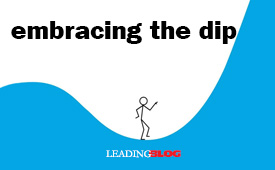
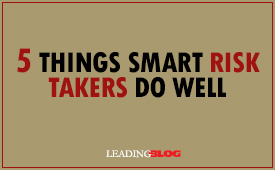
Posted by Michael McKinney at 05:54 PM
Permalink | Comments (0) | Personal Development
02.17.19

Thomas Jefferson's Ten Rules to Live By
Thomas Jefferson was skilled in many fields. In December 1962, John F. Kennedy entertained a group of Nobel prize winners in the White House and welcomed them as the most distinguished gathering of intellects to dine in the Executive Mansion "with the possible exception of when Mr. Jefferson dined here alone." Jefferson cared for people and always offered advice when asked. A year before his death, he was asked by a father to give some counsel to his young son, Thomas Jefferson Smith. He responded with a letter that began: This letter will, to you be as one from the dead, the writer will be in the grave before you can weigh it's counsels. your affectionate and excellent father has requested that I would address to you something which might possibly have a favorable influence on the course of life you have to run, and I too, as a namesake, feel an interest in that course. few words will be necessary with good dispositions on your part. adore God. reverence and cherish your parents. love your neighbor as yourself, and your country more than yourself. be just. be true. murmur not at the ways of Providence. so shall the life into which you have entered be the Portal to one of eternal and ineffable bliss. and if to the dead it is permitted to care for the things of this world, every action of your life will be under my regard. farewell. The letter concluded with ten rules to live by Jefferson titled A Decalogue of Canons for observation in practical life: Monticello Feb. 21. 1825.
Th: Jefferson to Th: Jefferson Smith.

The complete letter can be found on the National Archives website.
![]()
![]() Like us on Instagram and Facebook for additional leadership and personal development ideas.
Like us on Instagram and Facebook for additional leadership and personal development ideas.
Posted by Michael McKinney at 04:40 PM
Permalink | Comments (0) | Leaders , Personal Development , Weekend Supplement
01.21.19

The 9 Dimensions of Conscious Success
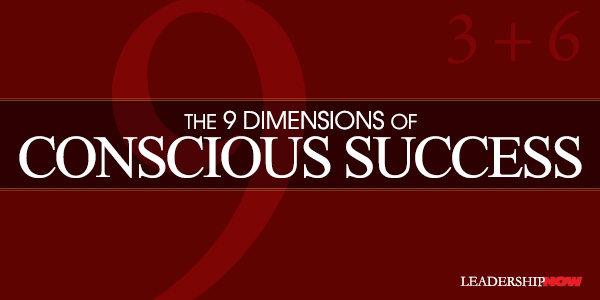
HOW DO YOU stand out in your chosen occupation to get the respect, recognition, and opportunities you want and deserve, to achieve the success you want?
Leadership and life are built on relationships. Despite any talent or education you may have, your ability to work with and influence others is what will set you apart. But that doesn't just happen. You need a plan.
The 9 Dimensions of Conscious Success: It's All About You! by David Nielson was written to give you a framework to consciously bring about your success.
The foundation of the Conscious Success Model contains three critical elements: Your Purpose, Self-Awareness, and Social Awareness.
Your Purpose
Why am I here? Your reason for being is built around "an anticipated outcome that is intended or that guides your planned actions." Having a stated purpose for your life helps to give you inner strength—an internal sense of control. You are not a victim. A specific purpose helps you also to align your actions to the purpose of others and your organization.
Self-Awareness
Self-awareness allows you to separate yourself from what's happening around you to identify your thoughts, feelings, physical state, and belief systems. "Awareness precedes meaningful choice. It is nearly impossible to make good life choices with no self-awareness." When you are aware of your inner state—where you are at—it makes it easier to act on purpose. A good place to get self-awareness is to watch the behavior of others. Often the behaviors that irritate you are mirrors of your own life.
Social-Awareness
How do you impact others? Before you interact with others, begin by asking what is the desired result based on who I am, my purpose, and who I want to be? We have an impact on everyone we meet. How do others perceive us? Is that our intent? Does it align with our purpose?
The other part of the Conscious Success Model is how we differentiate ourselves. 3 Elements + 6 Differentiators = 9 Dimensions of Success. We cannot rely "on fate to be noticed. We have to be more proactive, more deliberate and consciously aware. This is conscious success." Each of the differentiators is connected to and must be aligned with the three core elements.
As we move to the differentiators, Nielson begins by asking, "How am I really showing up? How am I presenting myself to others? Am I having the impact I really want to make?" What value do I bring? This, of course, speaks to having a healthy self-awareness.
Each of these differentiators as negative and a positive side. Either side will get you noticed. Avoid the side that will get you noticed for the wrong reasons.
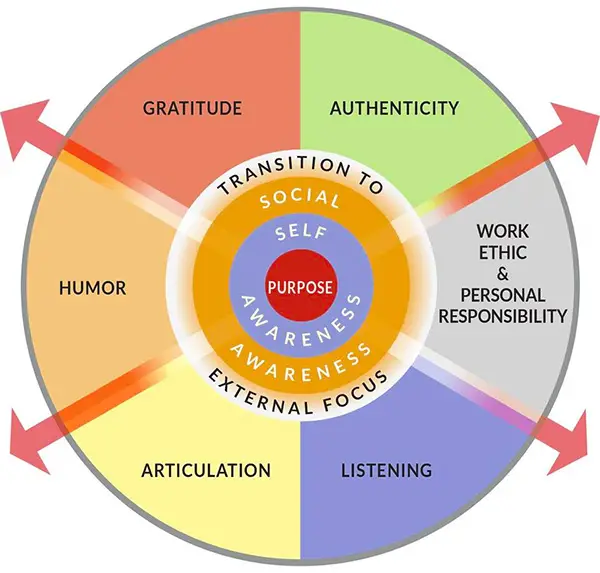
Differentiator 1: Authenticity
Authenticity is "never deceiving yourself or others in how you show up." It might go without saying but to be true to yourself you need to know who you are and what you stand for. We mostly lack authenticity because we are trying to be what people want us to be in order to be accepted or popular. We are inauthentic to cover up for our insecurities. Authenticity leads to trust. Consistency matters.
Differentiator 2: Work Ethic and Personal Responsibility
"Work with conviction to produce the results you desire and take responsibility for the results produced—even when they fail to meet the desired result." A good work ethic is based not on time put in but on results achieved. If you want to differentiate yourself, "show up early for work, do more than you're asked to do, do everything to the best of your ability, and if you finish your work, offer to help others."
Decide that you are 100 percent responsible for what happens in your life and everyone else is 0 percent responsible. It might seem unrealistic to do this but deciding to be 100 percent responsible forces you to move forward. "The reason the ratio must be 100 percent to 0 percent is that as long as the zero spot is occupied by any value, I can blame and justify the non-result. Blaming and justifying limits options and 100 percent to zero percent responsibility expands options."
Differentiator 3: Listening for Results and Connections
"Concentrate intently on the words of others in such a way you could understand and repeat accurately what is said." Listening shows respect for others and builds others trust in you. Ask questions with the intent of clarifying your understanding.
Differentiator 4: Articulate for Impact
Closely related to differentiator 3 on listening is articulation. "Provide information in a clear, concise way which produces the desired impact." To be always talking doesn't make you look smarter. Have a good vocabulary. Before you speak, consider your emotional state. Also, think about what your purpose is and what you are trying to convey.
Differentiator 5: Humor
Humor is "looking for and appreciating the humor all around us and even being able to laugh at one's self." Humor can provide perspective. Smile. "Facial expressions do not merely signal what someone feels but actually contribute to that feeling. If we smile even when we don't feel like it, our mood will elevate despite ourselves." Use humor appropriately. "Be sure the style and content of your humor is consistent with your purpose and brand. You can have a sense of humor, but it must be consistent with your image and what it is you want to accomplish."
Differentiator 6: Gratitude
"Make the choice to be thankful for what you have and consciously demonstrate gratitude when others do something for you." I believe that a lack of gratitude can undo all of the other differentiators. Gratitude is a choice we make each and every day. Having an attitude of gratitude gives you a positive outlook which makes you more attractive to others.
Conscious Success as the label implies doesn't happen by accident. It takes commitment, focus, and a force of will. The Conscious Success Model provides a useful framework for not only differentiating yourself but creating a life that matters.
The 9 Dimensions of Conscious Success is a great tool to put into the hands of anyone starting out in life.
![]()
![]() Like us on Instagram and Facebook for additional leadership and personal development ideas.
Like us on Instagram and Facebook for additional leadership and personal development ideas.

![]()
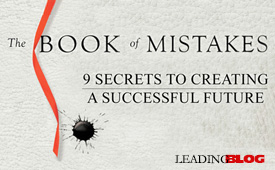

Posted by Michael McKinney at 11:06 PM
Permalink | Comments (0) | Personal Development
01.03.19

Newton's First Law and Your Life
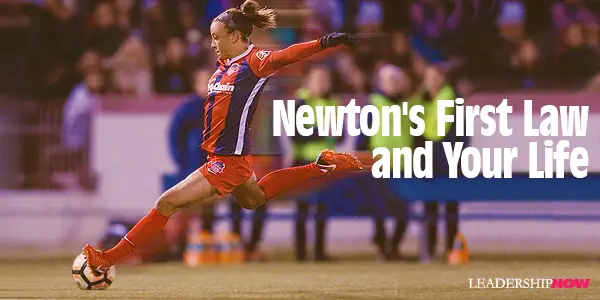
IN 1686, Sir Isaac Newton presented three laws of motion. The first law is often referred to as the Law of Inertia. The law states that every object will remain at rest or continue in a straight line unless compelled to change its state by the action of an external force. In other words, things stay the way they are unless something comes along to disrupt them. This law has the power to make us or break us. And it is at work in our lives all day, every day whether we are conscious of it or not.
When we kick a soccer ball, it heads in a specific direction until it is acted upon by a force greater than the force that is currently propelling it downfield. Like that soccer ball, our life is moving along a path that is taking us to a particular future intentionally or not. And we will continue along that path to its destination until we do something different. It's not about what we want. It's about what we are doing. Our intentions mean nothing. It's a law, and as such, it is objective and indifferent to our intentions.
In other words, our 2019 will be just like our 2018 unless we exert a force to change our direction that is greater than comfort we enjoy by continuing to do what we have always done producing the same results again and again. No force, no change. 2019 will be 2018 all over again.
If you're not where you want to be, change your direction. Get on a new path. New actions will produce different results.
We can use Newton's law to our advantage. For every cause, there is an effect. Today is connected to tomorrow. Every action we take and everything we say is taking us somewhere. We just need to be sure we are on the path that is taking us where we want to go; a path that is taking us to the person we want to become.
If we work harder than we did last year, then we will do better.
If we sacrifice now, then we are investing in our future.
If we reflect, then we will grow.
If we improve our leadership, then people will follow us.
If we are courageous, then we will inspire.
If we are curious, then we will learn.
If we avoid the trappings of power, then we will stay connected with those we serve.
If we surround ourselves with the right people, then we will be enriched and will lift others up.
If we are authentic and humble, then we will build trust.
If we work this law to our advantage, then we will eradicate regret.
If we don't improve, then our circumstances won't improve either. We can't tell ourselves that it's not going to be alright if we are headed in the wrong direction. Life naturally pushes us off-course and takes us on tangents. Anything meaningful in life is produced by moving upstream – against the current. When we find ourselves where we don't want to be, we must acknowledge the fact that we have drifted; we have gone with the flow. We need to make some course corrections. We all do from time to time.
Of course, this implies getting uncomfortable. It's helpful to have a mentor, a coach, or a program that will keep us accountable, because we tend to say, "I pushed hard enough" when we've barely touched our potential.
As we look at our life, we all have directions that need to be changed. It helps to begin this process by asking ourselves questions and giving serious and honest thought to the answers.
The big general questions are: What worked for me last year and what didn't? What habits are holding me back? What three things do I want to accomplish by 2020? What is that one thing I need to accomplish in 2019—your BHAG—my Big, Hairy, Audacious Goal? What does a good day look like? What routines keep me on track? Why do I do what I do?
And most importantly, what am I grateful for? Then drill down into specific areas of your life:
Do I make time to study and grow spiritually?
What habits are draining my time and attention?
What activities replenish me?
Am I taking time to relax and grow in other areas of interest?
Am I sleep deprived?
Am I eating healthy and avoiding processed foods?
What do I need to change in my diet in 2019?
Am I exercising regularly?
Am I drinking enough water? Is my morning and evening routine setting me up for my best day?
Am I living within my means?
How much do I want to make in 2019?
What do I have to do to reach that amount?
What weaknesses do I need to minimize?
Am I where I would like to be in my work or career?
How can I increase the value I bring to work?
What relationships are building me up?
Are any relationships taking me off-track?
Who do I take for granted?
Do I support those around me?
Do I support and encourage others?
Do I focus on building others up?
Do I make time for others?
Where do I need to grow?
What strengths do I need to improve on?
What do I need to learn?
What books do I need to read?
What seminars do I need to attend?
What can I learn from the mistakes I made in 2018?
The key to moving forward is the first step. Every destination needs to be broken down into incremental markers or indicators on the way to the destination. What is the first thing you need to do to get you moving in the right direction? As you begin, focus on the actions required and not the end result. A small step is easier than a leap. Once the first step is made, it is easier to continue down the right path to your desired destination.
![]()
![]() Like us on Instagram and Facebook for additional leadership and personal development ideas.
Like us on Instagram and Facebook for additional leadership and personal development ideas.
![]()


Posted by Michael McKinney at 12:34 AM
Permalink | Comments (0) | Personal Development
11.26.18

Leading Matters: John L. Hennessy on the Leadership Journey
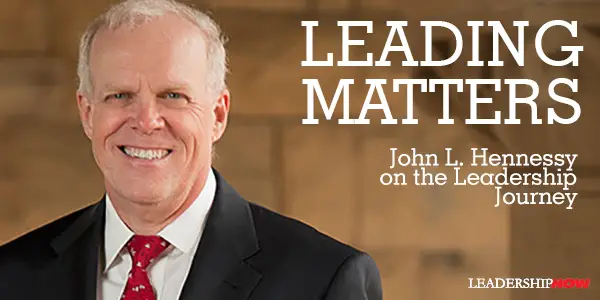
A
S A PROFESSOR, an entrepreneur, the president of Stanford University, and now the Chairman of the Board of Alphabet (Google's Parent company) and Director of Knight-Hennessy Scholars, John Hennessy has had a lot of leadership experience. In Leading Matters, he shares the stories of what worked and what didn't work.
Leading Matters is about the journey. The stories he tells here are revolve around the ten elements that shaped his journey and how he relied on these traits in pivotal moments. The elements are relevant to any leader at any level. As he observes, the higher up you go the crises just get bigger and come faster.
He begins by discussing the foundational elements: humility, authenticity, service, and empathy. He then links them together with courage. Finally, he shows how collaboration, innovation, intellectual curiosity, storytelling, and creating change that lasts, helped him reach his goals.
Here are some of his thoughts on each element extracted from his stories:
Humility
A true sense of one's own skills and character—arises not from ego, but from humility. Arrogance sees only strengths, ignores our weaknesses, and overlooks the strengths of others, therefore leaving us vulnerable to catastrophic mistakes.
Leading with humility means letting others announce your accomplishments because you don't need to, it means realizing and openly admitting that your understanding might not be right, it means taking the opportunity to learn from mistakes, and it means stepping up to the moments that challenge and grow you.
Authenticity and Trust
Authenticity is essential to building trust. Consider the wisdom popularly attributed to Socrates: "The way to a good reputation is to endeavor to be what you desire to appear." It's a start down the path to a deeper practice of authenticity—you must identify those good and true characteristics you admire, and then you must work to embody them.
So this is part of the practice: identify the virtue you admire, strive to embody them, and be humble about the journey—you probably aren't there yet. In fact, just when you think you've arrived, life has a way of returning you back to the beginning.
Leadership as Service
The larger one's leadership role becomes, the bigger the role of service in that leadership.
If you take a leadership role as a step toward a personal goal of gathering ever-greater titles, awards, and salaries, you will never see true success in that role.
Recognize the service of others. As a leader it is easy to get wrapped up in big projects and ambitious initiatives, and, in the process, to forget the smaller, but no less important, individual acts of service taking place all around you. Much of that service supports and enables the widely celebrated success of others.
Empathy
Empathy should always be a factor in making decisions and setting goals. Empathy represents a crucial check on action—placing a deep understanding of and concern for the human condition next to data can lead to decisions that support the wellbeing of all.
Empathy usually implies compassion and perhaps charity, but we are looking for more than that: we are looking for the kind of empathy that changes people as a result of their interactions with each other, the kind of empathy that arises when one sees the world anew through someone else's eyes.
Courage
Humility, authenticity, empathy, service-mindedness—these characteristics shape a leader's vision and chart a course toward right action. Courage, on the other hand, compels a leader to take that right action. While many people can discern what is right and true, acting on that discernment is more difficult.
Even if risk-taking is against your nature, for the good of your organization, you must find the courage to practice it.
Collaboration and Teamwork
Most significant endeavors will be accomplished by a team.
Certain ground rules circumvented interteam rivalries. First of all, I reminded everyone of our shared goal: we wanted to achieve something great. Further, to support innovative, cross-disciplinary thinking, I set a second ground rule: at the start, we don't criticize ideas. To this, I added a third ground rule: tough questions aren't only allowed, they are necessary. This led to my final ground rule: team members must be treated with the utmost respect.
Innovation
I can't tell you how many times I've had this conversation with students: the student opens with, "I want to create a start-up." I ask them to tell me about their technology, and they answer, "Well, I don't have it yet, but I want to do a start-up." I remind these students that great start-ups begin with great technology discoveries. Innovation presents great opportunities for smart entrepreneurs, not the other way around.
Intellectual Curiosity
Beyond personal enjoyment, though, this lifelong curiosity has served me well in my career. It has enabled me to engage in meaningful dialog about the world and its future.
Literature, biographies, and histories—they're like laboratories in which we can examine and learn critical lessons without having to live the difficulties ourselves.
In challenging moments, great leaders show their true character. …Their stories taught me if you can't take the blame for failure, you shouldn't take the job.
Storytelling
If you really want to inspire a team to action, best to engage them with a story. Once they become receptive—once they can imagine themselves as part of your vision—you can back your story up with facts and figures.
When you turn that dream into a vivid story, you make it so attractive and so real that people will want to share it with you by joining your team.
When it came time to respond to change, these companies moved quickly and efficiently, because every employee already understood the company identity and therefore knew how to respond without direct coaching.
In every profession and career, as we climb to higher leadership positions, the role of facts and data decreases.
Legacy
Instead of worrying about my legacy too much or too early, I'm choosing now—as I always have—to follow the path of making meaningful contributions.
Legacy means the institution serves people more effectively now than it did when you arrived.
![]()
![]() Like us on Instagram and Facebook for additional leadership and personal development ideas.
Like us on Instagram and Facebook for additional leadership and personal development ideas.

![]()

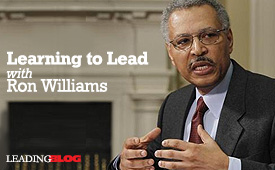
Posted by Michael McKinney at 02:08 PM
Permalink | Comments (0) | Leadership Development , Personal Development , Teamwork
09.07.18

Didn't See It Coming
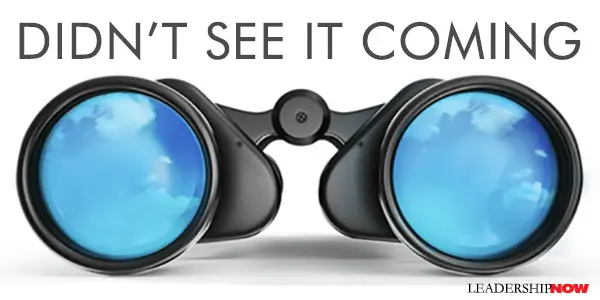
T
HERE ARE SEVEN key life challenges that every leader will face to one degree or another. Any one of them has the potential to derail even the best of leaders. But here's the thing. While they may creep up on us, we can see them coming and apply the proper antidote.
Carey Nieuwhof is the author of Didn't See It Coming. He wrote this book because too often we don't. And even though these seven challenges never really go away, we can create some life habits that keep them at bay.
Nieuwhof writes from a been-there-done-that Christian perspective about the issues as they manifest themselves in our lives and follows up each one with a chapter on how to combat it. It's not really just for leaders. These issues affect everyone and some you'll find hit close to home.
The seven challenges are:
Cynicism
Disappointment and frustration often end in cynicism. "Most cynics are former optimists." He reminds us that cynicism is a choice that benefits no one. "Cynics never change the world. They just tell us why you can't change the world. Ask them and they know all about it." The antidote is curiosity. "Curious people are never cynical, and cynical people are never curious." Simple but profound.
Compromise
The little compromises we make every day—the half-truths, the rationalizations, the excuses— "create a gap between who we are and who we want to be." We often look to competency to carry us to success. It may get us in the door, but character is what determines how far we go. "If you don't nurture your character daily, you can be most admired by the people who you know the least, while the people who know you best struggle with you the most." Our character gets challenged every day. The antidote to compromise is to "work twice as hard on your character as you do on your competency."
Disconnection
Nieuwhof notes that technology doesn't create disconnection, it just reveals what is already going on inside of us. "Disconnection is a human problem. Technology just makes it worse." So the solution is to deal with what is going on inside of us. "When you search for an explanation as to why you have a hard time trusting or opening your heart to people, you can make progress. You're using the past as a stepping stone into the future, not as a barricade against it." Engage in life-giving conversation. Eliminate hurry from your life. And this comment could pull any of us up short:
For me, the sense that a conversation is going nowhere always carries with it an underpinning of judgment and even arrogance on my part. I just assume I'm better, smarter, or wiser or that I have greater emotional intelligence than others. Which, of course, should drive me right back to my knees in confession. After all, we're encouraged to think of others as better than ourselves. That's a cornerstone habit of the humble.
Irrelevance
Irrelevance happens when what you do no longer connects to the culture and the people around you. That gap is a factor of how fast things change relative to you. You defeat it by continuously "changing, learning, and evolving. Change staves off irrelevance." A key idea here is you need to "love the mission more than the methods." An easy trap to fall into. Get radical about change. Surround yourself with younger people. Seek change to transform you.
Pride
Pride manifests itself in many different and subtle ways so it's hard to spot—in ourselves. "Pride will snuff out your empathy, stifle your compassion, create division, suffocate love, foster jealousy, deaden your soul, and make you think all this is normal." The only way to deal with pride is to cultivate humility. "Learn the ways of the humble and make it your principal way of operating." Nieuwhof offers practical ways to begin to make this happen in your life.
Burnout
Burnout saps the meaning and wonder out of life. Signs of burnout include among other things: your passion fades, you no longer feel your highs and lows, little things make you disproportionately emotional, everybody drains you, nothing satisfies you, and your productivity drops. Getting out of this state begins by admitting it and then figuring out how to live today so you will thrive tomorrow. What does that look like? "Maintaining health in all five major areas of life (spiritual, emotional, relational, physical, and financial)" must become a priority. Nieuwhof recommends some concrete steps you can take to bring you back from burnout. Go deep enough and take enough time to recover so that you begin to feel gratitude for the process.
Emptiness
Ironically, success often makes you feel empty. Once you have arrived, "you find there's still something inside you that says there has to be more." The antidote: "find a mission that's bigger than you." He continues, "Selfishness looks good only to the selfish in the same way that pride is attractive only to the proud. Humility will win you what pride never will: the affection of others. And that's exactly what selflessness will do. Other people naturally gravitate toward people who live for a cause beyond themselves."
Didn't See It Coming is full of understanding and insight. The practical advice found here will benefit anyone on their leadership journey.
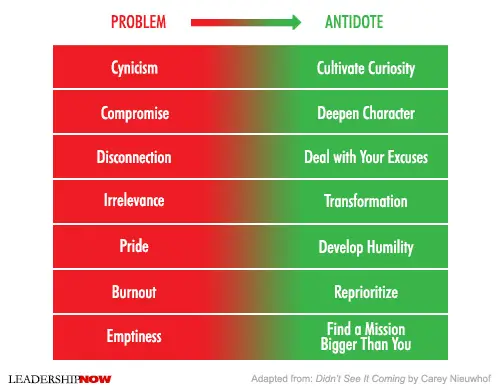

![]()
![]() Like us on Instagram and Facebook for additional leadership and personal development ideas.
Like us on Instagram and Facebook for additional leadership and personal development ideas.

![]()


Posted by Michael McKinney at 08:01 AM
Permalink | Comments (0) | Leadership Development , Personal Development
09.03.18

Business Chemistry: What Type Are You?

T
HE BETTER YOU UNDERSTAND yourself and those around you, the easier it is to work with other and as a leader, to give them what they need to excel.
Business Chemistry is a tool for self-understanding and empathy—a way to identify meaningful differences between people's working styles and perspectives.
Kim Christfort and Suzanne Vickberg of Deloitte helped to develop Business Chemistry. It does not invalidate everything else of its type, rather it is designed to be simpler and thereby memorable and actionable on issues that really matter for people in the work environment. And it is quite straightforward for both accessing yourself and others you work with.
Using the key sticking points between people, they identify 4 Working Styles:
 Pioneers value possibilities and they spark energy and imagination. They're outgoing, spontaneous, and adaptable. They're creative thinkers who believe big risks can bring great things.
Pioneers value possibilities and they spark energy and imagination. They're outgoing, spontaneous, and adaptable. They're creative thinkers who believe big risks can bring great things.
 Drivers value challenge and they generate momentum. They're technical, quantitative, and logical. They're direct in their approach to people and problems.
Drivers value challenge and they generate momentum. They're technical, quantitative, and logical. They're direct in their approach to people and problems.
 Integrators value connection and they draw teams together. They're empathic, diplomatic, and relationship oriented. They're attuned to nuance, seeing shades of grey rather than black and white.
Integrators value connection and they draw teams together. They're empathic, diplomatic, and relationship oriented. They're attuned to nuance, seeing shades of grey rather than black and white.
 Guardians value stability and they bring order and rigor. They're practical, detail-oriented, and reserved. They're deliberate decision-makers apt to stick with the status quo.
Guardians value stability and they bring order and rigor. They're practical, detail-oriented, and reserved. They're deliberate decision-makers apt to stick with the status quo.
The authors naturally go into detail on each of these types and give an example of a well-known person that fits that type. They also delve into difference between the types as they relate to stress (Pioneers are the least stressed.), career aspirations, environments they thrive in, and where each type if found organizationally and generationally.
The trick of course, is to use this knowledge to modify you own behavior. Otherwise it's just a game. "By learning about your own type and developing a hunch about the types of those you work with, you can see right away where some of your key differences and similarities are. Then you can determine how you might flex your own style to better match the preferences of those around you."
For example, too many constraints can completely shut a Pioneer down, while a Guardian may withdraw in an environment that feels too chaotic. A Driver may become very frustrated in an organization that lacks decisiveness, while an Integrator may wither on a team that doesn't value broad-based input. Knowing these trigger points can help you as a leader to give people more of what they need to excel and less of what will turn them off.
To understand your own style and develop your hunch about others you know, they've developed a test which you can take here.
If you're going to try it out for yourself, you might think about what you are naturally inclined to do and what you have learned to do. I might want to be direct with others but I have learned that I am more productive when I am diplomatic. But being that that is my natural tendency, I probably prefer when people are direct and concise with me. That fact would affect my working style profile.
Interestingly, 32% of Millennials are most likely Guardians. They prefer having all of the answers and enjoy zooming into every detail. 29% of Baby Boomers are most likely to be Pioneers or Integrators. They grew up in a different time and may have adopted a more novelty-seeking and relationship–focused orientation.
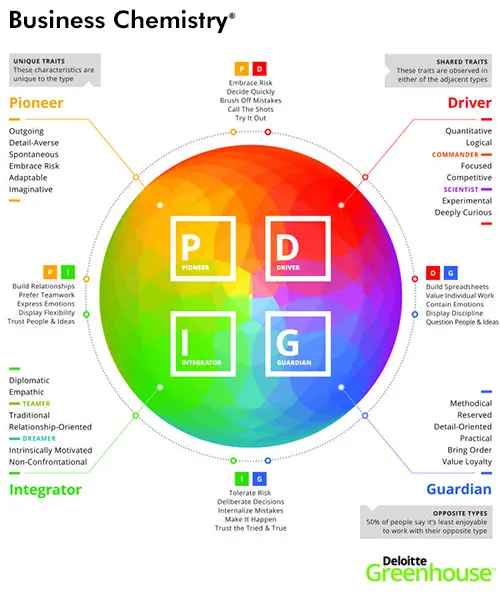
![]()
![]() Like us on Instagram and Facebook for additional leadership and personal development ideas.
Like us on Instagram and Facebook for additional leadership and personal development ideas.

Posted by Michael McKinney at 08:21 AM
Permalink | Comments (0) | Personal Development , Teamwork
08.27.18

Is a Lack of Awareness Holding You Back?
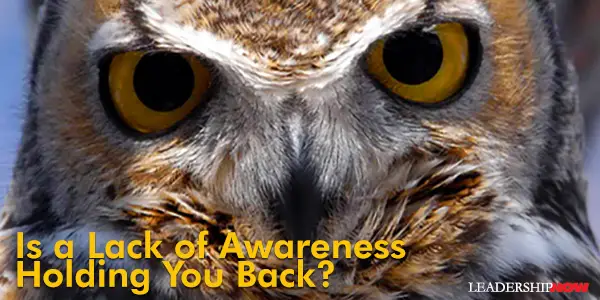
A
WARENESS is the ability to have knowledge of or are conscious of yourself and your surroundings in real time. Without it we tend to be reactive, disengaged, an unimaginative. The more conscious we are, the faster we adapt, and the higher performing we become.
Bob Rosen and Emma-Kate Swann wrote Conscious: The Power of Awareness in Business and Life, because they believe that becoming more conscious is critical in our increasingly disruptive and accelerating world. "Most of us believe they are self-aware, but research shows that only 10 to 15% of us truly have this capability."
"The real power of awareness is found when we master action and introspection together" or what they refer to as conscious. "Lifting your gaze outside yourself while looking inward to remove the roots of resistance is how you become more conscious." Being the smartest person in the room is not the advantage it might have been because it gets in the way of adapting to the change happening all around us. "Conscious is the new smart."
Driven by the need to be right, those obsessed with being smart tend to hoard knowledge, externalize blame, and mismanage relationships and risks. This sabotages our ability to thrive in a constantly changing world.
There are four reasons why we are not aware as we need to be:
1. Too Shallow: "We spend little time self-reflecting and stay stuck in negative emotions, shackled by old baggage, resulting in little understanding of ourselves." We just don't dig deep enough.
2. Too Narrow: "We don't challenge our outdated assumptions, which limits the power of our expansive minds." With limited perspectives we miss opportunities and react irrationally.
3. Too Safe: "We are afraid of change and prefer to avoid the uncertainty around us. As a result, we stay stuck, biased, and reactive."
4. Too Small: "If your view of yourself and the world is too small, you won't see connections, possibilities, or solutions. Staying small and never stepping up is sure to lead to regrets and will undermine your highest potential."
The antidote to our lack of self-awareness is:
Go Deep
Harness the power of introspection by getting to know who you are, where you come from, and why you act the way you do.
Think Big
Get curious and adaptive: deal with complexity and paradox by learning how to expand your mind, leverage your relationships and networks, and overcome unconscious biases.
Get Real
Become more honest and intentional in leadership and life, overcoming the pitfalls of being too safe and cautious while embracing reality.
Step Up
Act boldly and responsibly to reach your highest potential: how to champion your higher purpose, stretch people in constructive ways, and be generous in your relationships.
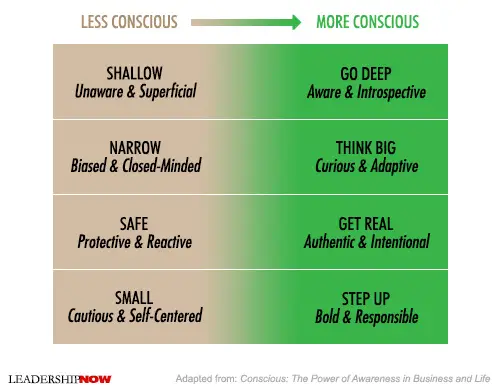
To address the realities of our time, we need people who will Go Deep, Think Big, Get Real, and Step Up. To lead change you need a conscious mindset. "Regardless of the context or the reason for change, leaders at all levels must lead people into the unknown and into the future."
If we are going to create change, we have to begin with ourselves. That requires that we become more conscious of what pushes us forward—our Accelerators —and what holds us back—our Hijackers . Accelerators like courage, drive or determination, deliberate practice, resilience, and vulnerability, drive us forward. Hijackers like self-criticism, cynicism, controlling behavior, aloofness or disengagement, and hyper-competitiveness, hold us back. It is important to know how these things impact your performance and constructively use them or deal with them.
There are many things that conspire to throw us off-course. Knowing who you want to be in the world and remembering your purpose, will help you to manage these issues and keep you on course. The more conscious we are the less drama we will experience in our lives.
Another consequence of being conscious is to be civil. People and events will push our buttons, but the mature, conscious person will know when to "reprioritize personal needs and self-interests" for the good of all. "Conscious people realize there is a human being on the other end of every connection. Acts of civility are the small sacrifices we make for the good of all and the sake of harmoniously living and working together." A good example of that kind of self-control and consciousness is John McCain's comment to a woman at a town hall meeting that said she didn't trust then-Sen. Barack Obama because "he's an Arab." McCain responded, "No, ma'am. He's a decent, family man, citizen that I just happen to have disagreements with on fundamental issues."
Conscious people see the big picture and know what is important. Consciousness is a choice.
Conscious unleashes our full potential as human beings. By expanding our minds, enriching our experiences, and shaping our destinies, we discover our purpose in life. Being conscious enables us to approach life as a journey. Equipped with everything we need—an open mind and heart, confidence and resilience, and our capacity for greater consciousness—we embrace the uncertainty of life. Conscious is the accelerator for effective change. The more conscious we are, the faster we adapt, and the higher performing we become.
![]()
![]() Like us on Instagram and Facebook for additional leadership and personal development ideas.
Like us on Instagram and Facebook for additional leadership and personal development ideas.

![]()
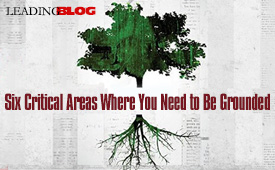

Posted by Michael McKinney at 07:32 AM
Permalink | Comments (0) | Personal Development
08.22.18

7 Tips for Overcoming Imposter Syndrome

I
F YOU WANT TO GROW your career, Wharton Lecturer and EMBA Career Director Dawn Graham recommends in her book Switchers, that you "continually put yourself in situations where you're the least qualified person in the room." That is, "put yourself into professional situations where you have some foundational knowledge, but are still a novice."
Not only do you grow from the experience but you'll have a roomful of experts to learn from. At first you may feel inadequate—feel like an imposter—but with enough grit you'll succeed and move forward.
When you feel like you don't belong—like you are not up to par—know that it is a side effect of growth that everyone experiences at one time—or many times—throughout a career. If you are a high-performer, it comes with the territory. Graham offers 7 tips for overcoming Imposer Syndrome:
1. If You Aren't Struggling a Bit, You Aren't Growing Much
"When you're taking on a new venture like a job switch, it's normal to feel behind the curve. This doesn't mean you're a fraud or not cut out for the work. Don't compare your start to someone else's peak."
2. Quite that Inner Voice
"We are often our own worst critic and hardest on ourselves. If you're new at something, have realistic expectations and give yourself the latitude to learn."
3. Perfection is Slow Death
"Perfectionists have an all-or-nothing view. Even as a seasoned expert, you're human and not immune to bad days or learning curves. Mistakes can indicate that you need to prioritize, delegate, or take a break. Or they could just be mistakes. Don't make them into more than they are."
4. Honor Your Accomplishments
"Life isn't about keeping a scorecard. Reminisce about past successes, and then engage strategies that worked before to tackle the problems you're facing."
5. Drop the "Yes, but…."
"Do you deflect or write off compliments? Perhaps you attribute your success to luck. We are masters at believing negative feedback while shrugging off the positive. Take time to listen to praise from others and own it."
6. Plan for the Worst-Case Scenario
"The worst-case scenario rarely happens, but if you have an action plan should it become a reality, you can be confident you'll handle the lesser obstacles that do arise."
7. Fake It 'til You Make It
"When you come across as self-assured, other sense that it creates a positive spiral. Self-assurance doesn't mean you have all of the answers, rather that you're confident you can use resources to find solutions as problems arise."
And here's a fact of life. The more you learn about something the more you'll realize how little you know about the topic in terms of all there is to know. Stay humble and curious. It will give you unprecedented depth in this day and age.
Beyond what I'm sharing here, Switchers is an invaluable resource for those looking to make a career switch. "If you're like most Americans, you'll spend around five years of your life engaged in some type of job search activity." Today though, people aren't just changing jobs, they're changing professions. And this requires a different approach than the typical job search.
Graham writes from a recruiter's point of view sharing not only what they think but also the psychological principles that underlie the Switcher's journey. She covers the five job search killers, networking and the 2nd Level Contact Strategy, rebranding your social media profile, and crafting your professional identity.
Bias is a reality in the hiring process, and can be an especially difficult hurdle for Switchers. Learn to identify it and engage strategies to overcome it such as using your network to become an insider.Your career story is what will convince the hiring manager to pull the trigger and make the offer. It should be logical, compelling, attention-getting, and genuine.
You need to network to make a career switch. Second- (and third) level connections are where the action is! Most people in your immediate circle have the same information you do, so the goal is to get their network, because that is where your next opportunity lies.
![]()
![]() Like us on Instagram and Facebook for additional leadership and personal development ideas.
Like us on Instagram and Facebook for additional leadership and personal development ideas.

Posted by Michael McKinney at 08:32 AM
Permalink | Comments (0) | Personal Development
06.08.18

Reinforcements: How to Get People to Help You
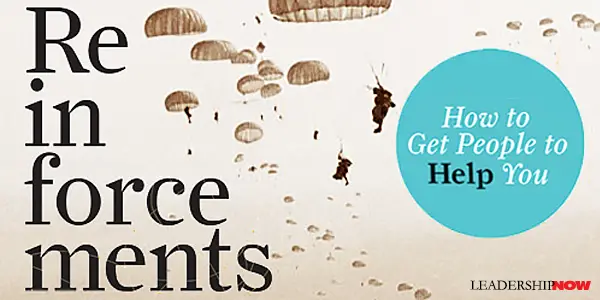
"I actually felt as if I was going to perish," said psychologist Stanley Milgram upon asking a subway rider for their seat.
Asking for help makes most of us uncomfortable and we often go to great lengths to avoid doing it. We fear rejection. We fear that people we think less of us. We believe people don't really want to help. But the truth is we need the help and support of others to succeed. To be sure, leadership is fundamentally about asking people for help. "Reaching your fullest potential—professionally or personally—requires you to understand how to enlist reinforcements when you need them. For many of us, 'when you need them' is literally every day," writes Heidi Grant in Reinforcements.
Yet our reluctance to ask for help means we often don't get the support or the resource we need. Making matters worse, our intuitions about what should make others more likely to help are often dead wrong; our fumbling, apologetic ways of asking for assistance generally make people feel far less likely to want to help. We hate imposing on people and then inadvertently, we make them feel imposed upon.
We underestimate our chances of getting help, especially from those that have said "no" once already. We don't like saying "no." We don't think less of people when they ask us for help. But for some reason, we forget that when it is our turn to ask for help.
Research shows that people actually like us more when they have been able to help us. It makes them feel good too—unless they feel compelled to help. Asking someone, "Can you do me a favor?" increase the likelihood that they'll say yes, but usually because they now feel trapped.
So what are the subtle cues that motivate people to work for us?
Grant says, first of all, don't make it weird by overdoing it on empathy (i.e., ASPCA commercials), apologizing profusely (just ask), using disclaimers ("I normally wouldn't…"), emphasizing how much the other person will love helping ("This will be fun!"), and reminding people that they owe you one, among other tactics.
Instead try these three ways of asking others for help:
In-Group Reinforcement
Those members of our group are the most likely to help us. To create a sense of in-group among people, use the word "together," create or highlight shared goals, identify a common enemy, share common emotions, experiences, and feelings.
The Positive Identity Reinforcement
Most people like to think of themselves as helpful because it is part of what it means to be a good person. We reinforce that with gratitude and appealing to the things that matter to them. "To maximize positive identity reinforcement, know your audience and emphasize what matters to them, not to you."
Gratitude is a glue that binds you and your benefactor together, allowing you to hit the same well over and over again when you need support, know that it won't run dry.
Also, "the more unique the help, the more closely tied it is to who they are." If people feel that anyone could help you, it is more likely that they will pass thinking that someone else will help. They need not bother. "To activate the positive identity reinforcement, find ways to convey that the helper is in a unique position to help you." "You're my only hope."
The Effectiveness Reinforcement
People want what they do to make an impact—to have meaning. If we feel we are not making an impact, we are likely to lose motivation. People need to clearly understand the impact of their helping.
Research shows that when people are unable to get any kind of feedback about how well they are doing on a task, they quickly become disengaged from it.
The question is, "How do I know what I am doing is important?" "How do I know that my time, money, or effort wouldn't be better spent some other way?"
Be clear up-front about what you want done and the impact it will have. And be sure to follow-up. Let them know how things turned out. As a leader, "helping people see the impact of their work—their help—is one of the most important motivators you can wield."
Reinforcements is written in an engaging way and is full of solid research to support the approach needed to get the help we need to succeed. It is practical advice for anyone asking for help in a way that will leave both parties feeling good about the relationship.
![]()
![]() Like us on Instagram and Facebook for additional leadership and personal development ideas.
Like us on Instagram and Facebook for additional leadership and personal development ideas.

Posted by Michael McKinney at 07:41 AM
Permalink | Comments (0) | Motivation , Personal Development
06.06.18

Beyond the Drama Triangle

Y
OU'VE HEARD of the Bermuda Triangle, where ships and aircraft disappear without explanation. There's a workplace equivalent, a triangle where goodwill and productivity vanish. How many working hours of the average day do you and your team spend in the Drama Triangle?
This triangle was developed as a social model years ago by Stephen Karpman, a student of Dr. Eric Berne, the father of Transactional Analysis. It maps out a type of dysfunctional interaction that is common in the workplace and in our homes as well. The word "dysfunctional" is nothing to be afraid of – it just means "not working very well." Effective leaders notice when their relationships are working and when they aren't … and as a result, they learn to stay out of the Drama Triangle.
Karpman used this triangle to define three points that arise predictably in any dysfunctional real-life drama: the Persecutor, the Victim, and the Rescuer. Notice that all three of these are roles we can choose to play, or choose to step back from, at any time.
So for instance, let's assume that one of your team members promised you an update about an important project by Tuesday afternoon. It's Wednesday morning. You don't have the report yet. Here are three ways you could choose to respond:
- "I said that report was due Tuesday and I meant it!" (Persecutor. This role sends the message "It's all your fault," typically in the voice of a critical parent.)
- "There are three important meetings today that depended on me seeing that report from you … and now I'm going to crash and burn at all three." (Victim. This role is all about "Poor me.")
- "Look -- send me the data you have and I'll finish that report for you." (Rescuer. The classic enabler.)
Every time you see one of these roles emerge, or find yourself tempted to play one of them, you can be certain that the Drama Triangle is beckoning … and you're about to get sucked into it. One classic pattern is: boss attacks (Persecutor), people defend themselves (Victim), other people come to their aid (Rescuer). Be honest. How often do you really want to do that? Here's what's important to notice: The Drama Triangle is a game. If you choose to play, you'll be asking for an exchange that's high on conflict and denial, and low on resourcefulness, self-awareness, and win/win outcomes.
The problem is, it's easy to play this game without even realizing that you're playing and easy to become addicted to drama without realizing you're addicted to it. A lot of the leaders we work with are shocked to learn that most of their workplace interactions fall within this dysfunctional triangle! The leader's title typically means he or she is given the responsibility of judging or dictating … and that can be a slippery slope toward the Persecutor role. If you're not careful, you can spend the majority of their working hours playing this game. It doesn't have to be that way.
The very first step to overcoming a drama addiction is simply to learn to recognize what's happening. Start noticing that the Drama Triangle game typically begins with one person – it could be you – taking up the Persecutor or Victim role. If you sense a piece of communication coming from your side that is some variation on "It's all your fault" or "Poor me," step back, take a deep breath, and ask yourself if that's really the only way you can express yourself. It's possible you'll come up with a better way of approaching the situation – one that doesn't simply invite the other person to intensify the drama. For instance:
- "I know you've been really busy with a lot of different projects lately, but is there any way you could get me that report we talked about by one o'clock today? If not, could you think of anyone else we can get to help you out with it?"
- Or, even better, give the person a chance not to fall into the trap at all. Send a note well ahead of time reminding them about the project and when it's due. Leave people enough time to readjust before the deadline.
No blame. No drama. Just good communication!
Your responsibility as a leader is to support your people, start good conversations, and make good outcomes possible. The Drama Triangle goes in the exact opposite direction of all three of those goals: it disempowers your team, starts lousy conversations, and makes terrible outcomes much more likely. If you spend even one minute a day in the Drama Triangle, that's one minute too much.
The only way to win this particular game to resolve not to play – and then stick with that decision!

This post is by David Mattson. He is CEO and President of Sandler Training, and author of The Road To Excellence: 6 Leadership Strategies to Build a Bulletproof Business. He oversees the corporate direction and strategy for the company's global operations including sales, marketing, consulting, alliances, and support. Under Mattson's leadership, the Sandler organization expanded domestically and internationally to over 250 offices in 32 countries. For more information, please visit the Road to Excellence website.
 Editor's Note: The Road To Excellence asks the question, "What, exactly, stands between my company and organizational excellence—and what do I do about it?" David Mattson identifies 14 blind spots that have the potential to kill a business. The problem, of course, is seeing what you don't know. The Excellence Process consists of six steps that when taken in order and made part of your culture will turn excellence into a process and help to get rid of your blind spots.
Editor's Note: The Road To Excellence asks the question, "What, exactly, stands between my company and organizational excellence—and what do I do about it?" David Mattson identifies 14 blind spots that have the potential to kill a business. The problem, of course, is seeing what you don't know. The Excellence Process consists of six steps that when taken in order and made part of your culture will turn excellence into a process and help to get rid of your blind spots.
![]()
![]() Like us on Instagram and Facebook for additional leadership and personal development ideas.
Like us on Instagram and Facebook for additional leadership and personal development ideas.

Posted by Michael McKinney at 09:03 AM
Permalink | Comments (0) | Leading Forum , Personal Development
04.20.18

The GuruBook

J
ONATHAN LØW created The GuruBook to change, refine, and enhance your thinking. He has curated ideas from 45 internationally–known doers and thinkers on the topics of entrepreneurship, innovation, and authentic leadership.
You'll find great insights here from the likes of Sonia Arrison, Edgar H. Schein, Henry Mintzberg, Tom Peters, Pascal Finette, Andreas Ehn, Murray Newlands, Brian Chesky, Hampus Jakobsson, Craig Newmark, Alf Rehn, Paul Nunes, Nathan Furr, Mette Lykke and others. But here are several that I found interesting my first time through the book:
Steve Blank: Startups Are Not a Smaller Version of a Large Company
We know that a startup is a temporary organization designed to search for a repeatable and scalable business model. The corollary for an enterprise is as follows:
A company is a permanent organization designed to execute a repeatable and scalable business model.
Once you understand that existing companies are designed to execute, then you can see why they have a hard time with continuous and disruptive innovation.
Danny Lange: Becoming Truly Data Driven
We're seeing a development where you will be in trouble 24-36 months from now if you don't start taking machine learning seriously. It will happen especially in industries such as transportation, shipping, finance, and retail, but all kinds of companies and leaders should look into this much deeper.
Of course, the big companies have an advantage due to the amount of data they often how. The startups lack this, and data is increasingly becoming king.
For example, you may be able to build a better app with a better backend than Uber, and pay a crew of drivers more money, but if you don't have the data to deliver a consistently better pickup experience, all of that might not matter at all.
Christian Ørsted: Authentic Leadership is Narcissism
The leader's most important task is not being authentic but focusing on serving. The leader's own idea of the world or of him- or herself is completely without interest with regard to how he or she can serve the organization and the world in the best way possible.
That's why there's a risk that the whole concept of authentic leadership can easily give leaders an excuse for being narcissistic and focusing on themselves and their own values as leaders rather than how they create the best possible culture for their employees.
Daniel Burrus: How to Anticipate the Future
There are an amazing number of things we can accurately predict when we learn how to distinguish between what I call hard trends, trends that will happen, and soft trends, trends that might happen. Think of it as a two-sided coin. Agility is on one side, allowing you to react fast to unforeseen change, and the other side is anticipatory, allowing you to see what is coming and take action before the change occurs.
Agility is basically reacting quickly to change. Therefore, it's important to understand that agile innovation is reactive innovation. Agile innovation will keep you reacting to disruptive innovation created by others.
![]()
![]() Like us on Instagram and Facebook for additional leadership and personal development ideas.
Like us on Instagram and Facebook for additional leadership and personal development ideas.

Posted by Michael McKinney at 01:34 PM
Permalink | Comments (0) | Personal Development
03.14.18

Timeless: 10 Enduring Practices of Apex Leaders
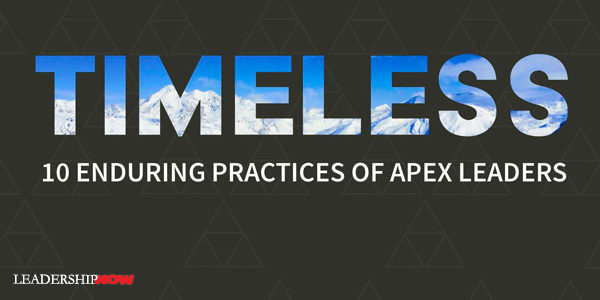
T
HE FOUNDATIONAL PRINCIPLES of leadership don't change over time. They are indeed timeless. Brian Dodd examines in Timeless (Kindle) what it takes to reach the top of your profession. How do you become the best at what you do? How do you become an Apex Leader?
Dodd has selected the 10 key practices that Apex Leaders have in common. While character, patience and empathy are important for a leader to sustain their leadership, they are not necessarily the behaviors and practices needed to get to the top of their chosen profession. To be sure, Dodd writes, "there are times when a leader's talent can take them to places where their character cannot sustain them." But that's another story. Here, Dodd focuses on the achievement side of the equation. What is required to be the best at what you do?
Brian Dodd is the Director of New Ministry Relationships for Injoy Stewardship Solutions an organization founded by John Maxwell. While Timeless will resonate with Christian leaders, the principles apply across all organizations and contexts.
As readers of his blog have come to expect, Dodd draws on many examples from the world of sports. All of these principles are found in scripture and are being successfully applied by Apex Leaders in organizations of all types.
Here are 10 things Apex Leaders have done and will always do to achieve great success with Dodd's insights:
Apex Leaders Build Great Teams
Apex Leaders are part of selfless, humble teams who are committed to each other's success. Your team is your primary difference maker. Apex Leaders look for skill, work ethic and passion when building a team.
Apex Leaders Are Humble
Humble leaders do not deny their talents but are thankful for them. Humble leaders acknowledge that no matter how good they are, they are in constant need of support. All successful leaders must be servant-leaders first. They acknowledge they have been granted opportunities not for personal gain, but for the betterment of others. Humble leaders know they have not arrived. The mission and vision of what they are trying to accomplish is too important to remain the same.
Apex Leaders Continually Improve
Are you willing to be rebuilt? Pride and arrogance are enemies of continual improvement. An Apex Leader never asks, "Am I part of this organization's past?" but, "Am I going to be a part of the future?" Continual improvement assures sustainability and continual options.
Apex Leaders Work Hard – Very Hard
Many leaders think their talent and competence alone will get them where they need to go, but hard work will always beat talent and competence when talent and competence don't work hard. Proverbs 6:10-11: "A little sleep, a little slumber, a little folding of the hands to rest—and poverty will come on you like a thief." No one is there to applaud the lonely work, but everyone applauds its results.
Apex Leaders Form Strong Relationships
One of the most impressive things about the leadership of Jesus was his continual focus on relationships. There is only one thing in your business which appreciates—your people. The most important relationship a leader needs to cultivate and protect is the relationship with their family. If you want to accomplish anything great as a leader, you must surround yourself with competent staff.
Worth thinking about: Almost all important decisions made about you and your career take place when you are not in the room. So, always leave a trail of kindness and respect behind you.
Apex Leaders Make Others Better
No matter how talented you are, you need someone who can make yourself better. Ralph Waldo Emerson said, "It is one of the most beautiful compensations of this life that no man can sincerely try to help another without helping himself."
Apex Leaders Show Consistency
Organizations and their people suffer because of a lack of appreciation for consistent excellence. No athlete ever demonstrated consistent excellence better than the legendary Hank Aaron. We over-celebrate big results and under-appreciate consistent excellence. Aaron reminds us greatness is not always achieved through short-term spectacular results but sometimes through long-term consistency.
Apex Leaders Give Generously
The model of a generous life is investing in spiritual truth, intellectual capital, money, praise, encouragement, influence, and joy in other people's lives.
Apex Leaders Lead by Example
You cannot lead by example if you do not effectively lead yourself first. Leading by example means putting the mission of your organization above your personal aspirations. Leaders who lead by example fight for unity.
Apex Leaders Deliver Results
Achieving results is one of the primary things separating Apex Leaders from all others. Delivering results requires preparation, decisiveness, talent, limiting unnecessary mistakes, energy, continual improvement, confidence, good health, and passion. Five-time Super Bowl champion Tom Brady said, "Every year has its challenges in different ways … you've always got to work on something." They also deliver under pressure. Brady said, "To me, what separates really good players from great players—execute well under pressure. The biggest game. The biggest stage. That's what playing quarterback is all about."
A leaders character and people skills make someone want to follow them. The ability to deliver results determines if someone actually will follow them.
![]()
![]() Like us on Instagram and Facebook for additional leadership and personal development ideas.
Like us on Instagram and Facebook for additional leadership and personal development ideas.

Posted by Michael McKinney at 11:18 AM
Permalink | Comments (0) | Personal Development
03.07.18

9 Secrets to Creating a Successful Future
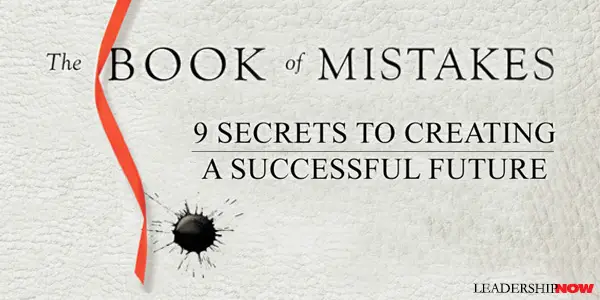
I
F SOMEONE IS WILLING to share the wisdom of their experience, it's worth taking the time to absorb their message. By seeking out the experiences of others, we can grow faster with less drama.
In The Book of Mistakes, Skip Prichard has created for us an absorbing fable of a young man and a young woman who are both part of a mysterious journey to learn the nine mistakes that tend to trip us up. While they make sense, they are not always intuitive. The truths presented here often stand between us and success.
The main story follows David whose life of promise has become ordinary. Through a life-altering event, he has a chance meeting with an Old Man who sets him on a journey that will take him to meet nine unique people who will share the nine mistakes and the impact these mistakes have had on their own lives.
The nine mistakes are framed by three universal laws that are found in an ancient book of wisdom. The parallel story is about Aria and how she comes to be the keeper of the book of wisdom and how she learns of the three laws.
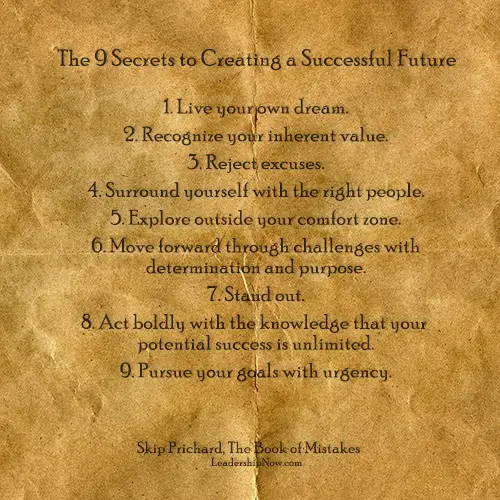
Printable Graphic
The three universal laws enable the nine secrets to creating a successful future. To avoid the nine mistakes, you need to:
1. Live your own dream. "A life choreographed by someone else is not our finest performance."
2. Recognize your inherent value. "Don't accept the limitations others put on you." "Others are so quick to define us. They set expectations. They don't realize when we've changed."
3. Reject excuses. "Behind every excuse is a door to greatness." "If you want to take your life back, take your thoughts back."
4. Surround yourself with the right people. "Your friends determine your fate." "Replace naysayers, doubters, and energy drainers with encouragers, winners, and motivators."
5. Explore outside your comfort zone. "Mediocrity is the end result of too much comfort."
6. More forward through challenges with determination and purpose. "Don't let current circumstances define your destiny." There will be setbacks but "It doesn't mean you have to be good at everything or do everything, but if you think it's a skill that you need to fulfill your purpose, you need to find a way through it."
7. Stand out. "Standing out is as simple as consistently outperforming expectations."
8. Act boldly with the knowledge that your potential success is unlimited. "The only limitations you need to worry about are the ones in your mind." "Helping others magnetizes people to your cause and enhances your success."
9. Pursue your goals with urgency. Live each day as if it's your last and your first. "Your last keeps you focused on what really matters. You think about people, about loving those around you. Your first is important because you also must have a longer view, or you will never accomplish the goals that are hard and take longer."
Each mentor David encounters has their own story that illuminates the mistake they share with us. Their experiences help to identify and relate to the mistake and help us to take action to avoid the mistake in the future. Prichard brings a lot of wisdom to each of these common life issues.
The story is engaging for young and old. Share this book widely because these are the kinds of mistakes that create regret down the road. At the end of your life these are the things that you look back on and wonder why no one ever told you about these pitfalls. We are never too old to learn them and some are more difficult to deal with because of the baggage that often accompanies them. Now is the time to set your course.
![]()
![]() Like us on Instagram and Facebook for additional leadership and personal development ideas.
Like us on Instagram and Facebook for additional leadership and personal development ideas.

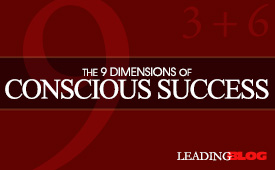

Posted by Michael McKinney at 10:45 AM
Permalink | Comments (0) | Personal Development
02.07.18

What You Don't Know About Doing Great Work
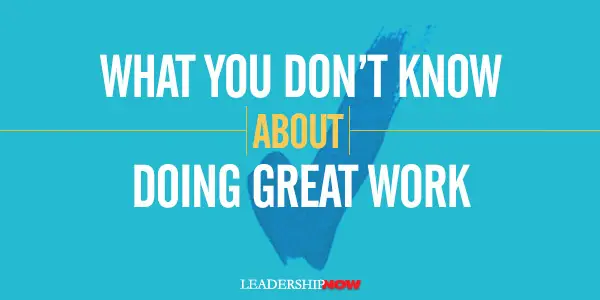
W
HY DO SOME people outperform others? It's not what you might think—talent, effort, organizational skills, time, or luck. We work under the assumption that more is better . But more time doesn't necessarily lead to better performance.
Morten Hansen thinks the way we work is broken. Not only that but how we manage and reward work, and how our culture recognizes hard work. What we call hard work may not be our best work.
In Great at Work, Hansen reports on a five-year survey of 5,000 managers and employees, including sales reps, lawyers, actuaries, brokers, medical doctors, software programmers, engineers, store managers, plant foremen, nurses and even a Las Vegas casino dealer. They discovered seven work smart practices. The first four involves mastering your own work, and the last three encompasses mastering working with others.
Do Less, Then Obsess
The common practice he found among the highest-ranked performers in the study was that they carefully selected which priorities, tasks, meetings, customers, ideas or steps to undertake and which to let go. They then applied intense, targeted effort on those few priorities in order to excel. He found that there were just a few key work practices related to this selectivity that accounted for two-thirds of the variation in performance among our subjects.
So working smarter boils down to "maximizing the value of your work by selecting a few activities and applying intense targeted effort." If we wish to perform better, we should examine our own selectivity process. But that's only half of it. Not only do we pick a few priorities, but then we must "obsess over your chosen area of focus to excel." "As few as you can, as many as you must."
Redesign Your Work
Redesigning work is about creating more value for the same amount of work done. That requires an outside-in view "because it directs attention to the benefits our work brings to others. The typical inside-out view, by contrast, measures work according to whether we have completed our tasks and goals, regardless of whether they produce any benefits." Hunt for value. Opportunities exist at "pain points." Ways to create value include: eliminating existing activities of little value, increasing existing activities of high value, creating new activities of high value, improving quality, and doing existing activities more efficiently.
Don't Just Learn, Loop
The Learning Loop means you learn while you work. Doing great work requires that you are getting feedback every day. In his study, 74 percent of the top performers reviewed their work in an effort to learn and improve. On 17 percent in the underperforming category did.
Aim for Passion and Purpose
You can have one without the other, but we should aim for both. "Purpose and passion are not the same. Passion is 'do what you love,' while purpose is 'do what contributes.' Purpose asks, 'What can I give the world?' Passion asks, 'What can the world give me?'" With passion and purpose working for you, you bring more energy per hour of work. Passion alone doesn't guarantee success or happiness. You may need to take a wider view of what ignites you. "Passion can also come from: success, creativity, social interactions, learning, and competence. Expand your circle of passion by tapping into these dimensions."
Become a Forceful Champion
Getting our work done often hinges on our ability to gain the support of others. Getting other people on board takes more than just explaining the merits of your project. You've got to inspire them. The best advocates in their study master two skills in this regard. "They inspired others by evoking emotions, and they circumvented resistance by deploying smart grit ." Beyond just appealing to people's emotions, they persevere taking into the account the perspective of the people they're trying to influence and devising tactics that will win them over. Not just grit, but smart grit. Enlist others to help move your project forward. "Too many people try to get others to change by doing all the convincing themselves. They become lone crusaders for their efforts—and they exhaust themselves in the process."
Fight and Unite
The ability to lead teams is crucial to great work. As a matter of necessity, much of this work takes place in meetings. The trick is to encourage constructive fights in meetings with cognitive diversity. Team members need to "debate the issues, consider alternatives, challenge one another, listen to minority views, scrutinize assumptions, and enable every participant to speak up without fear of retribution." But after that is done, the team needs to come to a decision quickly and commit to a decision. You must unite. "That means people on a team have to commit to a decision—to agree to it and exert effort to implement it."
Adopt Disciplined Collaboration
Hansen has identified two sins of collaboration: undercollaboration and overcollaboration. Some people talk too little, and some people talk too much across teams and departments. The goal isn't collaboration, but better performance. He recommends disciplined collaboration. That is, "they carefully select which collaboration activities to participate in (and reject others), and follow five specific rules to make the chosen activities a success: establish a compelling reason for the collaboration, craft a unifying goal that excites, reward people for results, commit full resources or kill it, and tailor trust boosters to solve any trust issues quickly.
Hansen's research has statistically linked superior performance to the daily practice of the above seven principles. Fresh and compelling examples are used throughout to fully illustrate the seven smart work practices.
![]()
![]() Like us on Instagram and Facebook for additional leadership and personal development ideas.
Like us on Instagram and Facebook for additional leadership and personal development ideas.

![]()


Posted by Michael McKinney at 09:06 PM
Permalink | Comments (0) | Personal Development
12.27.17

The Future Happens in the #NOW
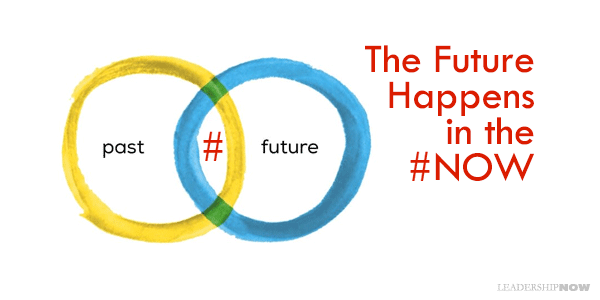
N
OW is where the future happens. In this moment we will take action that will affect our future or we will not. All we have is now.
In #NOW, Max McKeown asks us the think about our now. He says that "for most people, most of the time, it is better to lean towards action than inaction." People who grab opportunities that are available now, who don't waste time looking back, and are regret-minimizers, are what McKeown calls Nowists . It is a flexible mindset so we can all learn to become a little more Nowist in our approach.
Using Your Past
Nowists don't ignore the past, but they are good at bringing what they want or need from the past to serve them now for the future. They bring "lessons from their previous experiences and good memories" rather than living in the past. One of the reasons that Nowists can see opportunities is that they are not stuck trying to protect their past; spending time and energy on something that no longer makes sense.
Functional Impulsivity
Nowists don't act without thinking. That's dysfunctional. But they do possess a certain kind highly impulsive functional thinking. In a study performed at the University of Michigan on impulsivity, researchers found that there were two impulsive traits. There was the "kind that pushes people to decide quickly in a way that is likely to lead to bad consequences. And the kind that allows people to decide quickly with good results." Successful Nowists benefit from functional impulsivity. They are good at deciding quickly under pressure and are willing to choose an option even at the cost of making a mistake that they can and are willing to correct as they go forward.
Procrastination
Nowists take control of their time. Nowists are good "at sequencing their own actions and the actions of others to get to the future on time." Because they plan, seeing the future as a stream of connected sequences made up of actions and decisions, they can keep their momentum. And because each decision is connected to many actions, they don't have to make as many decisions. "They can enjoy the pleasure of seeing progress in the past, present, and future, rather than discrete tasks that seem to add up to very little."
You can avoid procrastination by changing your learning to see your future in your present. "Moving the priorities of your future-self into the present can become such a natural perspective that you are more likely to start something as early as possible than waiting too long."
A Nowist leans towards the future from an "active, practical, let's-make-this-work view of the world." They only review the past for insights that will help them move forward. They understand cause and effect. "Not everyone sees clear connections between how actions in the past have created the situation in the present, or how actions in the present will shape, or create, the future." I we can't make these connections we are "isolated, disconnected and therefore cut off from the power of the #Now."
We all exist in the #Now. It is only in the #Now that we can think, do, or change anything in the future. A Nowist is an active optimist. They believe they can make good things happen and take action to create a better future.
Now is a good time to think about your #Now. How will you use your #NOW?
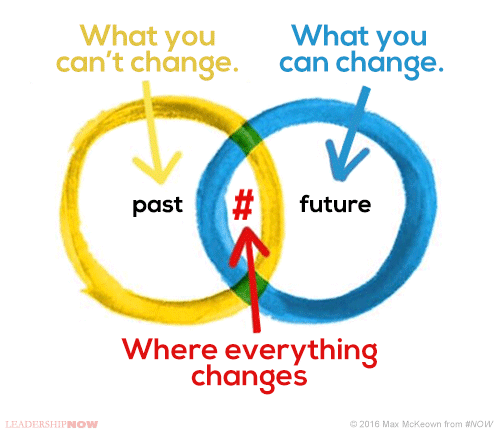
![]()
![]() Like us on Instagram and Facebook for additional leadership and personal development ideas.
Like us on Instagram and Facebook for additional leadership and personal development ideas.
Posted by Michael McKinney at 02:19 PM
Permalink | Comments (0) | Personal Development
12.11.17

There's a Password for Every Door
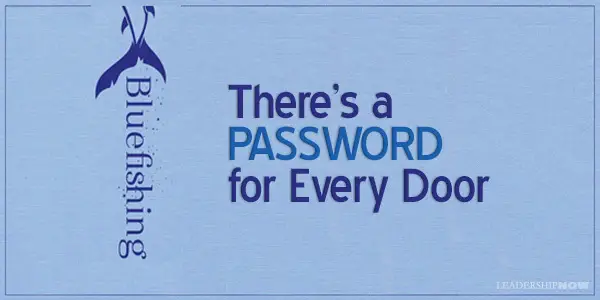
H
OW DO YOU make things happen?
How does it feel to not be afraid?
Steve Sims, the founder of Bluefish, has built a company that gets things done. Bluefish makes seemingly out-of-reach, change-your-life, experiences happen. Experiences like training with the Navy Seals, singing with your favorite band, watching Formula 1 in Monaco with royalty, having a private dinner at the feet of Michelangelo's David while being sung to by Andrea Bocelli, and being James Bond for the weekend. He calls it bluefishing .
Bluefishing is about changing your mindset. It's about looking at life differently. "You can't cower your way through life and hope to succeed; you're going to have to stick your neck out a little." We usually sell ourselves short.
"Anything I wasn't achieving in life, any doors that were closed to me, I could figure out the password for." It's about understanding what someone wants and finding the right key for each door. Bluefishers look for connections. What are people passionate about and how can I find a win-win for their passions?
Passion is something you have to discover—your own and others too. Bluefishers question everything. They don't doubt, they question. Read between the lines; get behind the façade. Drill down for it. Ask why at least three times. "The first why is what they think they think, the second why is what they think you want to hear, the third why is why they feel."
If you go in there with the idea that it's going to fail, or that you're asking too much, or you're giving something the person doesn't really want, you might as well not even go. You've gotta go in there knowing that this is really going to happen, but understanding that it's not going to happen if it benefits only you.
It's not about how much you know. "I don't need to know how to do the whole event," says Sims. "The first thing I need to know is which things I can't do. The next thing is to find those people who can do what I can't. I just find the ones who are good enough at doing what I can't to make me look brilliant."
Entrepreneurs should take note: You shouldn't try to do everything, just "be able to magnificently orchestrate those who can." You grow by giving others responsibility. "There's a difference between being able to do everything and doing everything."
Lead the orchestra. "All you want is to find a whole bunch of people with unique abilities, all with their own 5 percent traits or skill that no one else can do. That's how you build up an irreplaceable team. A dream team." Don't spend time on things that slow you down.
Don't overthink everything. Try something and fail at it over and over until you find out how to do it properly—to see if it is worth pursuing—while everyone else is still trying to work out the demographics. Sims Dad told him, "No one drowned from falling in the water. They drowned from staying there." Don't stand still.
When you don't succeed, it isn't a failure. It is discovery. Failure is final. Discovery is just the beginning. "You didn't fail. You learned what to do on your next attempt." It's an education. "If you build up obstacles in your head, you're looking for a reason to end it." That's failure.
To build your brand, first, do a self-audit. What do you stand for? How do you want people to feel when they are around you? Discover your strengths and manage your weaknesses. "Focus on the smallest element that can bring you down. Focus on your own weak links, the things that foul up your life or your work again and again and again."
Forget about counting likes. If you tell people how good you are, that's just selling. Get others to talk about you—recommend you. "What brands need to do—both personal and business brands—is ask other people to validate the truth." Focus on the community you're building around you.
Invest in your growth. Get better for your clients—your followers. And let them know. Sims told a friend, "Mate, the only difference between you and me is that I was willing to get into uncomfortable situations. I was willing to look dumb, to be among people that I knew were far more intelligent than me, so that I could learn. There's no reason to get into a room with people stupider than you." When you expose yourself to something new, you never go back. Be a sponge.
Sims shares techniques to support the thinking but the tactics change over time. The thinking never does. Bluefishing is a mentality first, then a stack of tools and behaviors. Learn the password and the doors will open.
![]()
![]() Like us on Instagram and Facebook for additional leadership and personal development ideas.
Like us on Instagram and Facebook for additional leadership and personal development ideas.

Posted by Michael McKinney at 07:44 AM
Permalink | Comments (0) | Personal Development
11.23.17

Unconditional Gratitude
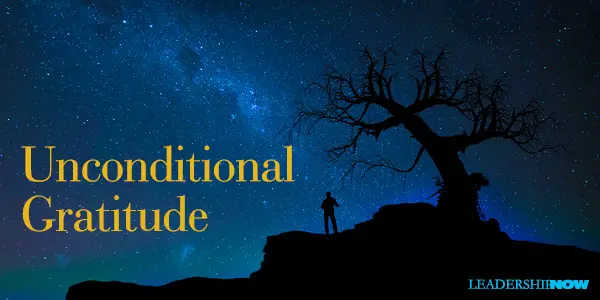
W
E ARE NOT AUTONOMOUS.
Autonomy is simply looking at life as though we are a world unto ourselves. As though we did it all by ourselves. It's pride. But the reality is, we are connected.
The opposite of autonomy is gratitude. Gratitude isn't dead, but it is in trouble. Society does not see gratitude as a moral or a character issue, which it certainly is. Although it is has been scientifically proven to be a key to happiness, it is something much more profound than that.
Most of our problems—especially relational issues—can be traced back to a lack of gratitude. In dealing with any of our problems, you will find that there is a lack of gratitude over something or someone.
The Roman statesman Cicero wrote, "Gratitude is not only the greatest of virtues, but the parent of all others."
Even Adam Smith, the economist that believed that the market should be driven by self-interest, expressed in The Theory of Moral Sentiments, his belief that feelings of gratitude are crucial for maintaining a society that is based on goodwill. He considered gratitude to be a crucial source of social civility and stability.
Like all character traits, gratitude is expressed in action. It is returning a favor, giving thanks, showing appreciation or simply giving someone your time and attention. Cicero said, "There is no duty more indispensable than that of returning a kindness."
Ingratitude has been called the "essence of vileness" and "the most horrible and unnatural crime that a person is capable of committing." It is a moral issue that impacts our lives and thinking in significant ways. When we are full of pride, angry, frustrated, depressed, defensive, stressed, irritated or anxious, we would do well take a time-out and uncover our ungratefulness.
Gratitude is most often expressed by simply thanking others, but it is more than just giving thanks. It is a way of looking at life; a way of seeing other people. It is more than a strategy or a technique to influence others. It is a way of being.
We shouldn't think of gratitude as something that happens at certain moments throughout our life. Real gratitude doesn't appear at moments in our life, but it is a disposition we have towards life. Real gratitude is unconditional.
Gratitude endures through everything. It is not a fleeting response to our circumstances. You may remember Blanch Dubois's classic statement in Tennessee Williams play A Streetcar Named Desire, where she said that she always depended on "the kindness of strangers"—people she didn't know and may never see again. It was not about individual episodes in her life, but rather it speaks to a perspective on life. It's not just gratefulness to a person but a gratefulness for your existence and how far you've come. It's being aware of your whole life. An awareness of how much we owe to others throughout our life.
Gratitude creates perspective. Gratitude says, "I'm part of something bigger. I am not alone." It connects us with each other. It strengthens our relationships while moderating our behavior.
The autonomous person rejects gratitude precisely because they must recognize and submit to others in this way. They think, "If I can find something wrong with that person I don't have to recognize their kindness. I can invalidate them." The autonomous don't want to recognize others so that they can justify treating them any way they want. This kind of thinking is not based in reality. Eventually, it leads to self-destruction.
Gratefulness changes us. It strips away our indifference. It puts us in touch with reality because it acknowledges our connections—our networked existence.
It is this gratitude effect—the way it grounds us in reality—that benefits us and those around us the most. Gratitude moderates and even inhibits toxic emotions but more than that, it gives birth to positive emotions. It's why Cicero said that it was the parent of all of the other virtues. Gratitude gives birth to and nurtures patience, a sense of humor, curiosity, creativity, insight, kindness, respect, courage, generosity, empathy, and positivity to name a few.
Gratitude creates the space for positive emotions to grow and flourish. Anger, irritation, defensiveness, worry, and impatience, are choices. These emotions don't happen to us; we choose them. Have you ever been in the middle of an angry rant when the phone rings? When you answer the call you are all "sugar and spice and everything nice." When it's over you go right back into your angry rant. It's a choice. The point is, we can choose gratitude to drive these toxic emotions out of our lives. Negative emotions cannot coexist with gratitude.
Gratitude has the power to pull teams together. When things don't go our way, or when people don't do what we think they should, we tend to pull away—withdraw. We want to take our ball and go home—disengage. If we can develop a mindset of gratitude, that will not happen. We will stay engaged. We will work together.
Gratitude has the power to slow us down and reflect and refocus our attention on what matters. Sometimes we have to step back to see our life in perspective; to be able to connect the dots. I like the way American writer Ursula Le Guin put it: "If you can see a thing whole—it seems that it's always beautiful. Planets, lives. …But close up a world's all dirt and rocks. And day to day, life's a hard job, you get tired, you lose the pattern."
It's easy for any of us to lose the pattern, to lose the narrative, to forget what we are doing this all for if we never step back and see the bigger picture with gratitude.
How do we get to the point where gratitude defines who we are?
Humility, of course, makes all of this work. Humility is the ability to silence the self. Humility is valuing other people; appreciating them. Humility allows us to be open to recognizing the good in all of our circumstances.
Gratitude is humility in action.
Not surprisingly, the mechanism behind gratitude is remembering. Developing a mindset of gratitude is about remembering.
We don't come by gratitude naturally. It's not common sense. It's something we have to cultivate. And remembering takes effort.
Of course, we can find the differences; we can find the negative. We can dwell on it. It's the core trait of a toxic individual. But we can combat that by seeking out anything that is excellent or praiseworthy—seeking out the good in any situation. Drawing upon positive memories gives us hope for the future. Unconditional gratitude heals and creates understanding and builds relationships.
Gratitude acknowledges that we are connected. Allow unconditional gratitude to define you as a leader.
![]()
![]() Like us on Instagram and Facebook for additional leadership and personal development ideas.
Like us on Instagram and Facebook for additional leadership and personal development ideas.
![]()

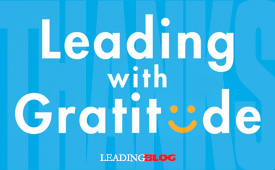
Posted by Michael McKinney at 07:40 AM
Permalink | Comments (0) | Personal Development
11.15.17

What Are Good People?
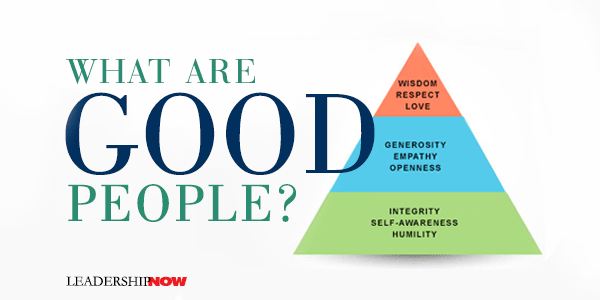
W
HAT DO WE MEAN when we say someone is good? Good is often confused with competency. But it is really a character issue. You can be good at your job but doing good is a character issue. Doing good is not just no being bad but intentionally creating more good in the workplace and especially in others.
Anthony Tjan, author of Good People says, "Pursuing goodness in yourself while surrounding yourself with good people is the only leadership decision that really, truly, matters."
Tjan begins a discussion by trying to define good and to build a framework and language to talk about what good is. He defines good people as "those committed to continuously cultivating the values that help them and others become the fullest possible versions of who they are."
He discusses in detail a concept of goodness based on three cornerstone values:
Truth: A mindset of humility that makes you teachable. Self-awareness and integrity between your thoughts and actions based on that self-awareness
Compassion: An open mind that without bias allows you to understand the actions of others. To practice empathy and act on that empathy with a generous spirit that gives people what they need.
Wholeness: Involves gratitude for the people around you that leads to an outgoing concern for others. Caring and nurturing the growth of others. Having the respect to fulfil your obligations to yourself and others and acting with a degree of wisdom. Knowing what is important.
As leaders this is easier said than done. Daily we face tensions that have to managed as we try to implement our ideals real. Tjan lists five core tensions:
- Pragmatism versus Idealism
Our ambitious goals versus reality. Neither one is good or bad. They are a productive tension. "Purpose and vision should be grounded in a set of enduring and relatable values, or immutable truths, that can guide us through dilemmas and difficulties." - Short-termism versus Long-termism
We have a great ability to think long term but we are biased to act short term. Character is a long-term investment. - Vulnerability versus Conviction
"If we are strong enough to take on our vulnerability, it can fuel the conviction of our purpose." - Idiosyncrasy versus Connectedness
Just weird enough but still connected. - Grit versus Acceptance
"Resolving the tension between grit and acceptance requires a strong and clear sense of purpose, and a strategic philosophy that embraces a willing ness to sense and respond to new information."
What can we do?
Good people do five things:
Good people put people first in their decision making. What does this do to my people?
Good people grow by continually seeking to improve themselves and help others to become fuller versions of themselves.
While good people value competency, they place a premium on character and values. They commit beyond competency to character and values of truth, compassion, and wholeness.
Good people are realists and find the balance between competing priorities and tensions. Learn to balance the tensions that exist in leadership.
Good people aren't situational but seek to do good at all times. Don't just practice goodness to avoid badness.
These five things are the Good People Mantra . They are five promises. As leaders we need to break from our role as leader to follower and relate to others human to human. Goodness come from building it in yourself and inspiring it in others.
![]()
![]() Like us on Instagram and Facebook for additional leadership and personal development ideas.
Like us on Instagram and Facebook for additional leadership and personal development ideas.

![]()
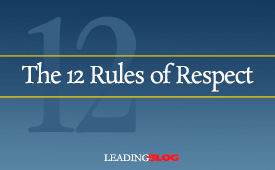
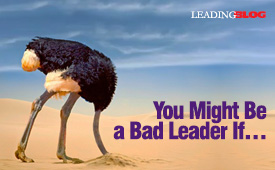
Posted by Michael McKinney at 11:10 PM
Permalink | Comments (0) | Personal Development
11.06.17

Shake it Off

I
T'S EASY FOR LITTLE THINGS to hang you up at work. A customer tells you they are unhappy with a job, your boss gives you that dreaded look of displeasure or a coworker mocks your new haircut. Negative memories can linger for a long time.
Well you're about to get a leadership lesson from a dog. This is not a typo. Dogs are naturals at exhibiting the leadership they need to be the leader of the pack. And they are the masters at shaking things off.
Ever watch a dripping wet dog as it gets out of a pool or a lake? Once it's on dry land it just shakes it off. No towel or hairdryer needed, just a hypnotic back and forth motion that sprays unwanted water in every direction. And when it's done the dog just moves on as if nothing ever happened.
At work, we need to learn how to do the same. Many of us make mountains out of molehills. Instead, we need to practice how to shake things off. After all, that little jab about your new mullet hairdo was meant as a good-natured joke. Heck, they're probably jealous of your smokin' hot new Billy Ray Cyrus look.
So how do you shake off these little things at work? Pivot from what you don't want to what you do want.
Trust in others' positive intentions. It is overwhelmingly more likely that your co-worker is not out to undermine you. So if they jab you for the way you did a project, take it as a learning experience. Pivot to how you can do better the next time.
If you're on the receiving end of a mean-spirited joke, talk privately with the perpetrator. Pivot to what you want—a good relationship—and let them know how their comments made you feel. Leaders speak truth to power, but in a way that helps everyone come out a winner.
If you're the leader of a team or office you also need to create an environment where everyone feels happy at work. If you see someone who is not able to shake things off, step in and make things right. Don't allow the inmates to run the asylum.
Great leaders set the right tone. They show their team how they pivot from the negative—"we lost a good customer"—to the positive—"let's redouble our efforts to learn from that and win a new customer." Leaders don't allow the little things to get under their skin.
There are, of course, some things that we should not shrug off. Constructive criticism, safety concerns and feedback on company policy can be critical to our success within the organization. These big issues are valid and require our buy-in.
It's easy to wallow in misery. If you find the right compatriots you can wail and moan for weeks or years. But it won't do you any good. Take a leadership lesson from a dog. Pivot from what you don't want to what you do want. And shake it off.

This post is by Krissi Barr, CEO of Barr Corporate Success and co-author of The Fido Factor, a leadership book on the lessons learned from dogs. It isn't a cute little book about puppies and it won't teach you how to beg. The Fido Factor is a fresh take on leadership that's as powerful and practical as it is approachable and relatable. A quick read that's sprinkled with humor, The Fido Factor is the perfect tool to help you — and your entire team — get a leg up at work.
![]()
![]() Like us on Instagram and Facebook for additional leadership and personal development ideas.
Like us on Instagram and Facebook for additional leadership and personal development ideas.

Posted by Michael McKinney at 07:28 AM
Permalink | Comments (0) | Personal Development
09.06.17

The Potential Principle: How Good Could You Be?
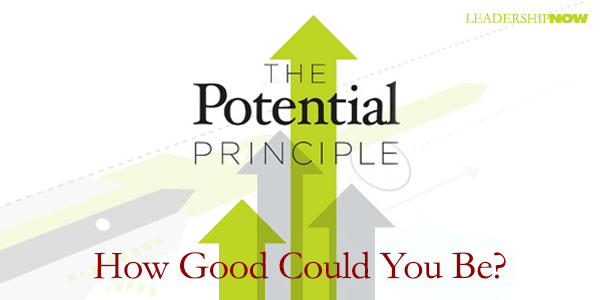
Y
OU KNOW HOW GOOD you are, but do you know how good you could be?
This is a case where it's easy to think that good is good enough and get comfortable. Most of us live below our potential. As a result, we miss out on opportunities and therefore live below our true potential and hinder our ability to contribute to others.
The Potential Principle by Mark Sanborn is about how we can become better – even better than our best selves. It's not about perfect. It's about better.
So you might ask, "Better at what?" Sanborn presents a program to get you on the road to better. First, you need to figure out just what you want to improve.
What Do You Want to Improve?
Your journey toward better can be organized into four areas: Performing, Learning, Reflecting, and Thinking.
Improvement happens by not only things you initiate like interactive, collaborative activities but also by responding to what you hear, observe, learn as represented by the vertical line. Improvement also takes place in both our inner (things going on inside us) and our outer (things going with others) worlds as represented by the horizontal line. It's about the inner world of being versus the outer world of performing.
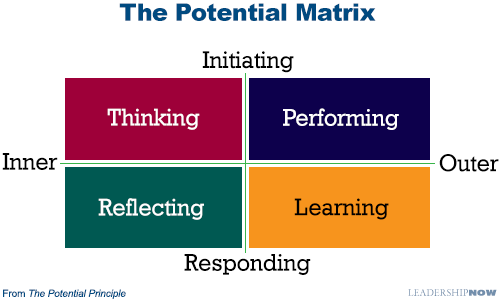
Performing
The top right quadrant is the most familiar to us. "It's where most of us consciously spend each day doing things: the observable world of initiating, acting, and producing." It's what people expect of us when we show up – results. It takes deliberate practice. Performance improvement is not a straight line. There are plateaus. Also, keep in mind the FIT model : Frequency, Intensity, and Technique. How often you practice, the intensity you bring to it and the techniques you use, make all the difference.
Learning
Learning involves the acquisition of new ideas that we put into practice. If we approach life humbly, we will be enriched by what we do not know. Intentional curiosity keeps us growing. "Develop a learning agenda." Identify what you must or need to learn and then make the time and find the resources to do it.
Reflecting
Reflecting is the inner world of responding. This is an underappreciated value in our instant, tech driven world. It's about waiting and listening. "Epiphanies—that is, clarity and deeper understanding about yourself and how to improve your life—happen through introspection." It's easy to think that we have no time for this and focus on the outer world of doing, but, says Sanborn, "the inner world informs the outer world, and that for the majority of us, going within to understand motivations, hopes fears, and dreams offers some of the greatest leverage to improving every area of our lives."
Thinking
Think about thinking. "Thinking is about proactively contemplating the world around you. It's the source of vision, dreams, plans, and strategies. It uses external input and creates connections and directions." Make the time to think about what you need to learn and unlearn. Focus your thinking and write it down. "Some of the biggest payoffs from thinking will occur when you review notes of previous thinking sessions and add to or modify what you came up with."
Sanborn explains each of these areas in more detail to help you develop the right mindset. Improvement in these four areas are key to improving consistently.
To be sure, each of us is more comfortable on one or two of these areas. If you are not spending enough time in an area, that will signal an area where you could improve. "Each area complements the others. If you are headed toward better, you'll want to use each of the four areas identified. Doing so will help you reach your destination sooner and, perhaps more important, enrich the trip."
Four Tools for Breakthrough Improvement
These four tools will help you "prevent complacency, create improvement, and bust through barriers" on your improvement journey.
- Disrupt Yourself (before someone else does)
"Unwillingness to confront assumptions, challenge your thinking, and try new things is a roadblock to improvement." It's proactive rather than reactive. Ask disruptive questions like: "What is the most important lesson I've learned this past year? What am I doing out of habit that doesn't serve me well? - (re)Focus
"Distraction impedes getting better." - Engage Others
"Self-responsibility is the primary step toward a successful life. But engaging others and building mutually beneficial relationships will leverage everything you do." Solicit advice, ideas, and counsel. - Expand Your Capacity
There's room for more. Time x Effort = Capacity. "What one or two skills, if fully developed and consistently deployed, would make the biggest difference in your personal and professional improvement?"
The ideas you will find in The Potential Principle are not all new, but they are organized in such a way as to make them actionable. Sanborn has done a great job of laying the foundation and providing a blueprint for continuous improvement. All you need to do now is to put it into practice.
 | It seems like common sense: Become the best, and then hit cruise control. Right? Nope. When you reach the top, it's time to hit the accelerator because you're just getting started. |
![]()
![]() Like us on Instagram and Facebook for additional leadership and personal development ideas.
Like us on Instagram and Facebook for additional leadership and personal development ideas.

Posted by Michael McKinney at 06:28 PM
Permalink | Comments (0) | Leadership , Personal Development
08.28.17

The Mood Elevator
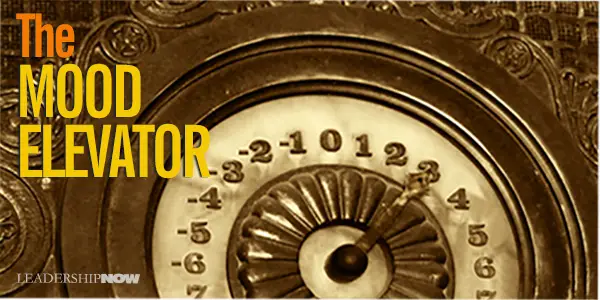
W
E ALL have mood swings.
But once we accept the fact that moods aren't something that happens to us, but are the result of our thinking, we can do something to control them—or at least manage them better.
Senn Delaney, Chairman and founder of Senn Delaney, wrote The Mood Elevator to help us take charge of our emotions and control our rides on the Mood Elevator.
Step one is understanding that the way we respond to outside events depends on what is happening inside our heads. "There may be events that stimulate our thoughts, but it is the thoughts that determine our moods." Reality is reality; it's what we make of it that makes a difference in our lives.
You will never let go of your moods completely, but knowing that your thoughts are the source of those moods can provide a little added distance and help you remain in control. It's a powerful first step to learning to ride up the Mood Elevator rather than feeling like a helpless victim of emotional forces you can't control.
Why Does It Matter?
When we are down the Mood Elevator our thinking is closed. When we travel up the Mood Elevator our thinking improves and opens up. We can reconnect with our best self.
We all come into this world with the potential for mental and emotional health. Our natural state is to be loving, creative, trusting, forgiving, curious, happy, and desirous of warm, close relationships with others. Unfortunately, as we grow up most of us develop thought habits or beliefs that can mask or obscure our innate health. At some point, we are hurt by someone, and we may become guarded and defensive. We are criticized for a mistake, and we may learn to make excuses and blame others, seeking to become less accountable so we don't look bad.
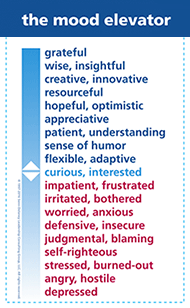 When we are up the Mood Elevator it is easier to maintain our sense of perspective and keep our cool in times of difficulty, stress, or conflict. Traveling up the Mood Elevator we are more ready to access the sources of original ideas.
When we are up the Mood Elevator it is easier to maintain our sense of perspective and keep our cool in times of difficulty, stress, or conflict. Traveling up the Mood Elevator we are more ready to access the sources of original ideas.
Unfortunately, we can become stuck so long on the lower floors of the Mood Elevator that we can begin to think that it's normal. Recognize when you are staying on the lower-floor emotions. Although it doesn't make us happy, we can actually grow comfortable with self-destructive patterns of thought, negative thinking, and victimization. So we feed these thinking patterns and reinforce them with stories told to validate our perspective on life. Other people are often motivated by the same things we are. It's just that their perspective is different than ours. It's best for us if we let it go.
How to Move Up the Mood Elevator
The dividing line is curiosity because when something happens that threatens to pull you down to the lower floors, you can stop yourself and ask, "I wonder why they did that? It would be interesting to find out." We tend to rush to the judgmental/blaming floor but with a curious perspective, you can begin to move up to the higher floors.
Learn to interrupt your own mood patterns and typical responses. A good night's sleep, exercise, deep breathing, positive self-talk, and even listen to your favorite music can all help in this regard.
Adapt an attitude of mild preference . Senn explains:
Living in mild preference doesn't mean adopting a Pollyanna attitude. It does mean looking for positive steps you can take to solve problems when they arise—and refusing to wallow in the emotions of frustration and anger that problems can so easily generate. Living in mild preference does not mean having no standards or principles. It does mean being selective about how and when to apply your standards and principles—choosing your battels carefully, as the saying goes.
Naturally a sense of humor and humility help here. But at the top of the Mood Elevator, you will find gratefulness. Senn calls it the overriding emotion. "It's almost impossible to be grateful and at the same time be angry, depressed, irritated, or self-righteous." Gratitude is a good way to maintain a healthy perspective on what's happening in your life. "Focus on activities that will nourish your sense of gratitude and your appreciation for the blessings you've already been granted.".
A few other important thoughts to help us manage our moods:
Recognize and honor separate realties we all live in. Be quick to understand other's perspectives and slow to blame or criticize.Remember that your thinking is unreliable in the lower mood states, so delay important conversations and decisions; don't act on your unreliable thinking, and don't take your lower mood state out on other people.
Have faith when you are down on the Mood Elevator, that this too shall pass.
![]()
![]() Like us on Instagram and Facebook for additional leadership and personal development ideas.
Like us on Instagram and Facebook for additional leadership and personal development ideas.

Posted by Michael McKinney at 07:30 PM
Permalink | Comments (0) | Personal Development
08.18.17

4 Things Solitude Will Do for You

W
E LIVE in an age of noise. Getting some time for yourself is a challenge. But if we are going to lead effectively, we need white space. We need solitude.
I know none of us have any extra time, but there is overwhelming evidence that taking a time-out to simply think is foundational to your success.
Raymond Kethledge and Michael Erwin explore some solid reasons why you must make the time to think in Lead Yourself First.
When we say solitude we mean a "subjective state of mind, in which the mind, isolated from input from other minds, works through a problem on its own." There is no particular structure to it—place, time, or length—but it must focus the mind. It's scheduled white space—a commitment you make to yourself simply because your leadership begins with who you are—not what you do.
So let's look at four things solitude will do for you.
Clarity
Clarity is about what is true. What is signal and what is noise? Solitude facilitates that distillation process. It helps you to eliminate or deliberately deemphasize all distractions. That alone will help you to make the time to think. Clarity and focus go hand-in-hand. That kind of focused attention is often best done alone.
Intuition complements analytical thought. When we get stuck, "intuition can provide clarity when analytical thinking cannot." The challenge is accessing it. Accessing intuition requires "a deeper form of solitude: an absence of inputs not only from other minds, but also from one's own."
Clarity is important for decision-making but it is also critical for understanding who you are—strengths and weaknesses. It helps to connect you with your core values and understand your place from that perspective.
Creativity
Solitude opens the path to creativity. Solitude isn't always the shortest distance to the goal. Joey Reiman, CEO of the consulting firm BrightHouse, credits their success to their "longer, incubation pace." On one project he says, "If we had moved at a faster, business pace, we never would have excavated that original brand identity and then generalized it into a new ethos."
Dena Braeger, mother of six in El Paso, offered this insight into information overload:
People make such an effort to copy what other people do, because we have so much access to information. I'm surrounded by people on Pinterest. I'll be dammed if I make something on Pinterest. You'll see things like these cupcakes that look amazing. And people copy them. But on the inside their phony, because the person didn't create it themselves. We're getting more of everything, but less of what is authentically ourselves. If we spent more time alone, creating something that might not look as amazing but is more authentic, we'd value ourselves more.
Creativity is doing something differently than the norm. Solitude allows us to get away from the inertia of our environment and connect to new possibilities.
Emotional Balance
Emotional balance requires you to respond rather than react. General James Mattis finds a lack of reflection the single biggest problem facing leaders. "The leader who neglects to step out of the sweep of events, to contemplate from whence they come and where they might go. Finds himself merely blown from one thing to another. But the leader who steps outside events is a leader who can change them."
Solitude allows you to reflect on what is making you emotional and provide clarity on the issue. Often what you are emotional about is more of a distraction than an issue. Again Dena Braeger, the West Point graduate and mother of six in El Paso, said, "When I'm practicing solitude regularly, I self-correct so much better. I'm more focused on what's important, and I let things go that aren't important."
Instead of allowing our emotions to adversely affect our leadership, it is wise to move away and deal with them in private. Our emotions will find an outlet somewhere. And that is best alone than in decisions made through unfiltered emotions that affect those around us.
Moral Courage
We've all seen them: leaders who take themselves too seriously—who believe their own press release. And it's all too easy for any of us to fall prey to self-admiration. "Honest reflation can deflate these pretentions." Reflection can pave the way to humility.
Solitude allows you to slow down and be clear and firmly convicted of your values and beliefs. "Leaders who are well anchored in what they believe are going to be more effective," says Doug Conant, the former CEO and president of the Campbell Soup Company. When those criticisms come along that are design to enforce conformity, it is easier to weather the storm when you know that what you are doing is the right thing to do for the right reasons. It is the power to rise above.
Reclaiming Solitude
Brené Brown, author of Daring Greatly, says that "The biggest mistake I've made in my career to date is believing that solitude is a luxury. I could chart the ups and downs of my quality of life personally and professionally and the amount of time I spend in solitude." As important as it is, it is easy to let it slip away without even realizing it. We are continuously bombarded by pressures—both personal and social—not to stop and reflect but if we lose our solitude, we will lose who we are.
You don't have to go off to a mountaintop or sit at the seashore. It can be a closed room, the library, a park bench, and even a waiting room.
We have a responsibility to seek out periods of solitude. We owe it to ourselves and those we lead.
Of Related Interest:
![]() Taking Another Look: Leading Minds on Reflection Part 4
Taking Another Look: Leading Minds on Reflection Part 4
![]() Taking Another Look: Leading Minds on Reflection Part 3
Taking Another Look: Leading Minds on Reflection Part 3
![]() Taking Another Look: Leading Minds on Reflection Part 2
Taking Another Look: Leading Minds on Reflection Part 2
![]() Taking Another Look: Leading Minds on Reflection Part 1
Taking Another Look: Leading Minds on Reflection Part 1
![]() Does Your Leadership Have "White Space?"
Does Your Leadership Have "White Space?"
![]()
![]() Like us on Instagram and Facebook for additional leadership and personal development ideas.
Like us on Instagram and Facebook for additional leadership and personal development ideas.

Posted by Michael McKinney at 04:05 PM
Permalink | Comments (0) | Leadership , Personal Development
08.16.17

5 Ways You Can Improve Your Relationships
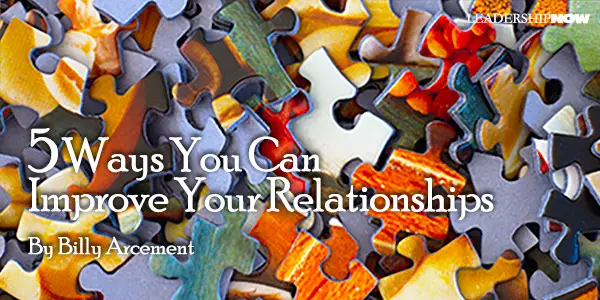
K
NOWING how to work with and relate to people is an imperative. Relationship building is critical for anyone wishing to rise to any position of leadership. The guidelines for achievement are many. Here are five ideas you might be able to start using today:
- Avoid becoming an antagonist. Antagonism doesn't build friends. It is acceptable to disagree on an issue. But reaching the level of adversary builds resistance to you and your ideas. Learn to disagree in a professional manner. You can have strong support for your belief without antagonizing. (A little patience goes a long way here). It may be surprising to you that the strategy works more often than not. And, in the long term, it enhances your ability to influence.
- Always thank anyone who helps, even in the slightest way. Even small events deserve a sincere round of thanks. People appreciate appreciation and "thank you" does exactly that. This is especially important for the people that work under your leadership. Never miss an opportunity to express sincere thanks for a job well done. Go the extra mile and send a handwritten note expressing your appreciation. Doing so separates you from others who are not as considerate and appreciative for the help of others. Stand Out! Write!
- Treat everyone you meet well. What I'm saying here is have a genuine respect for those you meet. Starting from that position moves the relationship in a positive direction. Business owners (leaders) need to greet customers in this manner. Doing so is the first step to creating an atmosphere for long-term customer relations. Showing respect builds trust of the leader. Couple that with a genuine desire to serve and you make leadership a successful practice.
- Build your speaking skills and you will build your people skills. Words are powerful tools. Become masters of conversation and you enhance your ability to lead. Delivering messages with great clarity and understanding builds followers, a necessary component of leadership. Delivering words with passion and believability can influence, another important quality of a leader. But, let's not forget another important part of communication, listening. Learn how to speak well and give equal importance to learning how to listen well.
- Conflict is more likely to get resolved with calmness than with any other method. Staying calm disarms conflict. Echoing their emotions is a catalyst for a fight. It's difficult to argue with or fight calmness.
A manager once approached me in an agitated manner. I had scheduled a safety training for his department. I assumed, as a new safety manager, that I just scheduled training and people attended. My mistake was not checking with him to verify if my proposed schedule worked for his employees. Instead of arguing or disagreeing, I realized I had made a mistake and apologized. He stopped in his tracks. And, with a confused look on his face, lost his hostility and words. I told him I would work with him to reschedule this training. In the future, I would work with him when offering other training. This calm approach disarmed him and he walked away without a word.
This post is by Billy Arcement, MEd—The Leadership Strategist. He is a professional speaker, consultant, executive coach, and author of three books and over 300 published articles. He provides leadership solutions that improve performance. See SearchingForSuccess.com to learn about his services and contact information.
![]()
![]() Like us on Instagram and Facebook for additional leadership and personal development ideas.
Like us on Instagram and Facebook for additional leadership and personal development ideas.
![]()
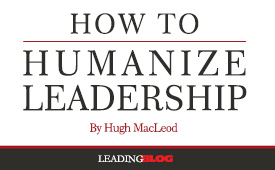

Posted by Michael McKinney at 08:14 AM
Permalink | Comments (0) | Personal Development
06.20.17

Humility is the New Smart: Are You Ready?
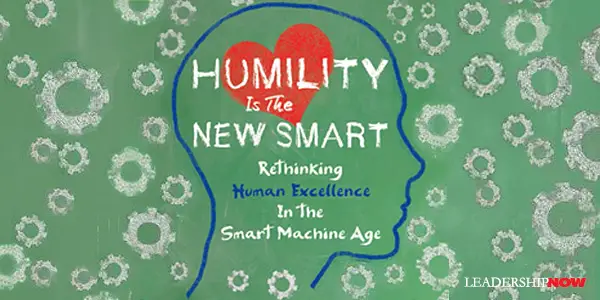
S
MART used to be a quantity game. "I know more than you. I get more things right." But Ed Hess and Katherine Ludwig say that in the new Smart Machine Age, that's a losing game. The new smart is about quality . Specifically, the quality of your thinking, your listening, and your relating and collaborative skills.
Are you ready?
The Smart Machine Age (SMA) will revolutionize how most of us live and work. In Humility is the New Smart, the authors state that "smart technologies will become ubiquitous, invading and changing many aspects of our professional and personal lives and in many ways challenging our fundamental beliefs about success, opportunity, and the American Dream." This means that the "number and types of available jobs and required skills will turn our lives and our children's lives upside down."
New skills will be needed. Uniquely human skills. Those skills, while uniquely human, are not what we are typically trained to do and require a deal of messy personal development. We will need to become better thinkers, listeners, relators, and collaborators while working to overcome our culture of obsessive individualism in order to thrive in the SMA. Humility is the mindset that will make all of this possible.
Most of today's adults have had no formal training in how to think, how to listen, how to learn and experiment through inquiry, how to emotionally engage, how to manage emotions, how to collaborate, or how to embrace mistakes as learning opportunities.
In short, say the authors, we need to acquire and continually develop four fundamental NewSmart behaviors:
Quieting Ego
Quieting Ego has always been the challenge for us humans. As they observe, "Even if we don't consider ourselves part of the 'big me' cultural phenomenon, for many of us to feel good about ourselves we have to constantly be 'right,' self-enhance, self-promote, and conceal our weaknesses, all of which drive ego defensiveness and failure intolerance that impedes higher-level thinking and relating." This tendency negatively affects our behavior, thinking, and ability to relate to and engage with others.
Managing Self—Thinking and Emotions
We need to get above ourselves to see ourselves impartially. We all struggle "to self-regulate our basic humanity—our biases, fears, insecurities, and natural fight-flee-or-freeze response to stress and anxiety." We need to be willing to treat all of our "beliefs (not values) as hypotheses subject to stress tests and modification by better data."
Negative emotions cause narrow-mindedness. Positive emotions, on the other hand, have been scientifically linked to "broader attention, open-mindedness, deeper focus, and more flexible thinking, all of which underlie creativity and innovative thinking."
Reflective Listening
Because we are limited by our own thinking, we need to listen to others to "open our minds and, push past our biases and mental models, and mitigate self-absorption in order to collaborate and build better relationships." The problem is "we're just too wired to confirm what we already believe, and we feel too comfortable having a cohesive simple story of how our world works." Listening to others helps to quiet our ego.
Otherness
To create these new behaviors and mindsets, it should become obvious that we need to enlist the help of others. "We can't think, innovate, or relate at our best alone." As Barbara Fredrickson observed, "nobody reaches his or her full potential in isolation." Jane Dutton out it this way: "It seems to be another fact that no man can come to know himself except as the outcome of disclosing himself to another."
The NewSmart Organization
Optimal human performance in the SMA will require an emphasis on the emotional aspects of critical thinking, creativity, innovation and engaging with others. "The work environment must be designed to reduce fears, insecurities, and other negative emotions."
To do this it means "providing people a feeling of being respected, held in positive regard, and listened to. It means creating opportunities for people to connect and build trust. "It means allocating time and designing work environments that bring people together to relate about nonwork matters." Finally, it means getting to know employees and helping them to get the "right training or opportunities to develop and provide feedback."
The NewSmart organization needs to be a safe place to learn. "Feeling safe means that you feel that your boss your employer, and your colleagues will do you no harm as you try to learn."
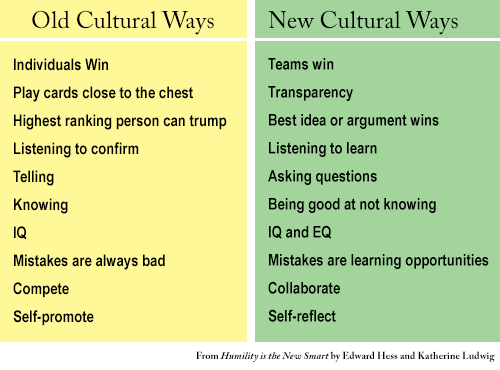
![]()
![]() Like us on Instagram and Facebook for additional leadership and personal development ideas.
Like us on Instagram and Facebook for additional leadership and personal development ideas.

![]()


Posted by Michael McKinney at 05:28 PM
Permalink | Comments (0) | General Business , Human Resources , Leadership Development , Personal Development , Positive Leadership
06.05.17

How to Avoid Your Leadership Gap
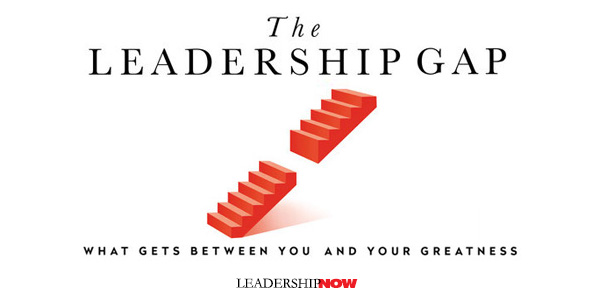
T
HE GAP IN OUR LEADERSHIP arises as a result of the disconnect between how we think people are experiencing our leadership and how they are actually experiencing our leadership. And where we find that disconnect we limit or even derail our leadership potential.
In The Leadership Gap, Lolly Daskal addresses this gap—what it is, why it happens, and what we can do about it. The gap is always there but at some point, it comes the surface to sabotage us. What if we don't know what we think we know?
The problem is that one day, suddenly, what once worked so well to propel their rise stops working. And the very same traits that had worked for them actually start working against them.
It is at this point that we need to begin asking ourselves some questions. "What is the gap between who I am and who I want to be, and do I know what it is I still need to learn?" In short, "Who am I being?" We need to rethink how our behaviors are perceived by those around us. And when there is that gap between how we want to be perceived and how we are actually being perceived, we need to take action. "Learning to recognize your leadership gap is the factor that determines your greatness as a leader." Sometimes we overuse a strength and sometimes we drift into the shadow side of our strengths. Either way, an understanding of what drives can give us the insight we need to avoid our leadership gaps.
Daskal invites us to look at who we are being and the instincts that drive our behaviors. The "shadow" you. She has developed seven leadership archetypes to help us gain some clarity as to what drives our beliefs and therefore our behaviors. We aren't necessarily one type as we tend to shift from one to another depending on the circumstances but "we tend to lean repeatedly toward the same archetype persona."
The Seven Archetypes
 The Rebel who is driven by confidence. "How can I push the envelope?" The gap is self-doubt. The gap archetype is The Imposter who is so insecure they play havoc with their mind because they have self-doubt. The key to the Rebel's success is confidence, but self-doubt that often accompanies great success, undermines their confidence and they act out of the imposter syndrome. They undermine their leadership thus keeping them from achieving greatness.
The Rebel who is driven by confidence. "How can I push the envelope?" The gap is self-doubt. The gap archetype is The Imposter who is so insecure they play havoc with their mind because they have self-doubt. The key to the Rebel's success is confidence, but self-doubt that often accompanies great success, undermines their confidence and they act out of the imposter syndrome. They undermine their leadership thus keeping them from achieving greatness.
 The Explorer who is fueled by intuition. "What can I discover?" The gap is manipulation. The gap archetype is The Exploiter who manipulates every chance they get just so you will not know how powerless they really feel. The tendency for the Explorer is to use their intuition to manipulate others to gain control. Daskal notes, "Whereas intuition makes things better for others, manipulation is always about making things better for you."
The Explorer who is fueled by intuition. "What can I discover?" The gap is manipulation. The gap archetype is The Exploiter who manipulates every chance they get just so you will not know how powerless they really feel. The tendency for the Explorer is to use their intuition to manipulate others to gain control. Daskal notes, "Whereas intuition makes things better for others, manipulation is always about making things better for you."
 The Truth Teller who embraces candor. "Where should I speak up?" The gap is suspicion. The gap archetype is The Deceiver who is suspicious about everyone because they cannot trust themselves to speak the truth. Discovering the truth and then speaking up for what is right is never easy but when we find we have been deceived, we can become paranoid and suspicious of others undermining our influence. We can become a kind of victim that will not speak up when we need to because of our paranoia.
The Truth Teller who embraces candor. "Where should I speak up?" The gap is suspicion. The gap archetype is The Deceiver who is suspicious about everyone because they cannot trust themselves to speak the truth. Discovering the truth and then speaking up for what is right is never easy but when we find we have been deceived, we can become paranoid and suspicious of others undermining our influence. We can become a kind of victim that will not speak up when we need to because of our paranoia.
 The Hero who embodies courage. "Where is courage needed?" The gap is fear. The gap archetype is The Bystander who is too fearful to be brave, too conservative to take a risk, and too cautious to take a stand. Once enabled by courage, they are now sidelined by fear. "Most of us not really afraid of being brave—we are afraid of what it takes to be brave. We are not really afraid of losing everything—we are afraid of what will happen when we have nothing."
The Hero who embodies courage. "Where is courage needed?" The gap is fear. The gap archetype is The Bystander who is too fearful to be brave, too conservative to take a risk, and too cautious to take a stand. Once enabled by courage, they are now sidelined by fear. "Most of us not really afraid of being brave—we are afraid of what it takes to be brave. We are not really afraid of losing everything—we are afraid of what will happen when we have nothing."
 The Inventor who is brimming with integrity. "How can we make this better?" No matter what you do you will be "held accountable and responsible as people. Everything in business, leadership, and success is founded on the virtue of integrity—it is the force that leads the way." The gap is corruption. The gap archetype is The Destroyer who is morally corrupt. While an Inventor puts their personal values into practice, if those values become corrupted, usually by forces such as ego, personal gain, or anger, they destroy the organization from within. The Destroyer advocates cutting corners, quick fixes and compromising quality and standards. "The Inventor maintains his or her integrity while thinking outside the box."
The Inventor who is brimming with integrity. "How can we make this better?" No matter what you do you will be "held accountable and responsible as people. Everything in business, leadership, and success is founded on the virtue of integrity—it is the force that leads the way." The gap is corruption. The gap archetype is The Destroyer who is morally corrupt. While an Inventor puts their personal values into practice, if those values become corrupted, usually by forces such as ego, personal gain, or anger, they destroy the organization from within. The Destroyer advocates cutting corners, quick fixes and compromising quality and standards. "The Inventor maintains his or her integrity while thinking outside the box."
 The Navigator who trusts and is trusted as they guide people to where they need to go. "How can we get to where we need to go?" The gap is arrogance. The gap archetype is The Fixer who a chronic rescuer no one trusts They want to help too much, fix too much and rescue too much. "Navigators have a way of making the complicated simple, and the simple understandable. They inspire trust. But their ability and confidence to know where to go and become an arrogance that attempts to control others—to do for others what they need to be doing themselves.
The Navigator who trusts and is trusted as they guide people to where they need to go. "How can we get to where we need to go?" The gap is arrogance. The gap archetype is The Fixer who a chronic rescuer no one trusts They want to help too much, fix too much and rescue too much. "Navigators have a way of making the complicated simple, and the simple understandable. They inspire trust. But their ability and confidence to know where to go and become an arrogance that attempts to control others—to do for others what they need to be doing themselves.
 The Knight for whom loyalty is everything and will stand beside you and will serve you before they serve themselves. "How can I serve you?" The gap is self-serving. The gap archetype is The Mercenary who is self -serving and put their own needs before those of the team, the business or the organization. Often the transition from serving to self-serving is subtle. "Loyal employees become disloyal one infraction at a time. Only after unfaithfulness shapes itself does the self-serving attitude emerge in a way it can be detected and deciphered."
The Knight for whom loyalty is everything and will stand beside you and will serve you before they serve themselves. "How can I serve you?" The gap is self-serving. The gap archetype is The Mercenary who is self -serving and put their own needs before those of the team, the business or the organization. Often the transition from serving to self-serving is subtle. "Loyal employees become disloyal one infraction at a time. Only after unfaithfulness shapes itself does the self-serving attitude emerge in a way it can be detected and deciphered."
Daskal reminds us that understanding our weaknesses is our greatest strength. From these seven archetypes, we can see how each has powerful abilities and hidden impediments. By knowing the gaps we can get into we can better use our strengths to achieve our own leadership greatness.
Daskal explains each of these archetypes in detail and importantly how we avoid these gaps. She describes what the positive looks like and what the negative looks like with examples for each.
The Leadership Gap provides the antidote for leading on autopilot. Daskal provides insight into our behaviors and beliefs that can if not managed properly can derail even the most talented and successful leaders. Confronting and avoiding our leadership gaps is the key to attaining long-term leadership success.
![]()
![]() Like us on Instagram and Facebook for additional leadership and personal development ideas.
Like us on Instagram and Facebook for additional leadership and personal development ideas.

![]()

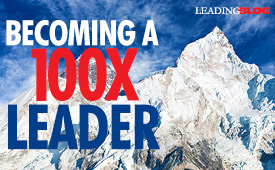
Posted by Michael McKinney at 03:03 PM
Permalink | Comments (0) | Leadership Development , Personal Development
05.26.17

Lifestorming: Creating the Life You Want
T
WO OF THE TOP top coaches of our time, Alan Weiss and Marshall Goldsmith, have come together to write a book about how to grow into possibility—your unique possibility.
Lifestorming: Creating Meaning and Achievement in Your Career and Life presents life as a journey without a "there." An evolutionary journey through life. The goal for each of us is to take on life and enjoy it immensely by developing the required character and engaging in it enormously.
As we go through life, "people skills are usually the key differentiators of success." It is imperative that we work on ourselves. We begin by understanding where we are and then where we want to be. "The fundamental work of changing our behavior for the better is ultimately our own responsibility."
Going it alone is not easy and not the most effective way to implement major changes. We need a coach—or someone in our life that can act as a coach—because we need accountability and frankly, all too often, we don't know what it is we really need to change.
Replace Poor Behaviors
When thinking about change, our strategy needs to be not to change poor behavior but to replace it. We cling to poor behaviors because we get something from it. Even in the midst of painful consequences, we can find some comfort in reproducing old ways of thinking. So, we need to find a positive, constructive behavior to replace the negative behavior that is currently generating the reward we seek without all of the collateral damage. "We often engage in behavior for no other reason than that we've never examined alternatives."
Challenge Your Beliefs
If we can get to the beliefs behind our actions we can better regulate our behaviors. It's important to remember too, that "we aren't in a snapshot; we're part of a film. We deal with what is today, knowing that it shouldn't necessarily be what is tomorrow."
Beliefs form attitudes which in turn create behaviors. "Attitudes are the connectors—the synapses—between beliefs and behavior, a self-comforting way of thinking or feeling about someone or something, typically reflected in a person's behavior." Everything we do comes from how we look at life—our personal reality.
Remaining Faithful to Your Growth Plan
We need to create a support system and we are responsible for creating our own support system. As a journey, we need to understand that behavior is more important than victories. "If you engage in consistently correct behavior, you'll be successful." Seek excellence, not perfection. "Once you're content with excellence, you'll improve daily and will act daily with alacrity and intent." And learn when to fold and when to hold. "There is a time when you cannot change things, they will not get better on their own, and you need to take a sharp right turn to escape your predicament." They caution: "If we don't accept the things we can't change, we'll forever be stressed and unhealthy."
A growth journey is not always easy and there will be obstacles. "Achieving success does not immediately or automatically make life easier. Instead, it usually creates new challenges—often ones we didn't anticipate."
"We know that whatever fate delivers, we have some agency—even if it's only in how we react." We need to stay in control of ourselves and only take prudent risks. For example, don't gamble with finances, time, health, or relationships.
As we grow, a spirit of generosity will help us to keep from backsliding. A scarcity mindset weakens and limits us. We must expand our view. "We have to think differently and think bigger. Instead of extrapolating from where we are today and looking at arithmetic growth, we must paint a picture of the future and decide how to achieve it through geometric growth. Our journey is a moving target."
Lifestorming addresses the pitfalls of growth and the traps we fall into—like the need to be right. You will find a complete and effective plan to guide you on your own growth journey. The authors also share their own personal stories for encouragement. Lifestorming pack years of experience into one book.
![]()
![]() Like us on Instagram and Facebook for additional leadership and personal development ideas.
Like us on Instagram and Facebook for additional leadership and personal development ideas.
![]()
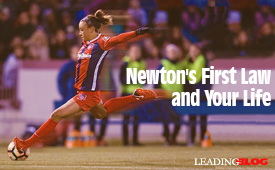

Posted by Michael McKinney at 10:25 AM
Permalink | Comments (0) | Personal Development
04.28.17

4 Ways to Avoid False Humility

H
UMILITY IS A CHOICE. When you meet a humble person you know you will be accepted, respected and listened to. They won't try to manipulate you, control you, criticize you or try to impress you. They are safe.
When we haven't conquered our pride putting on false humility might seem like the shortcut to the benefits of being a truly humble person. We've all met these kinds of people. False humility is nothing but arrogance.
In Humility: The Secret Ingredient of Success, Pat Williams, author and senior vice president of the NBA's Orlando Magic, suggests four ways we can avoid the mask of false humility.
1. Take time to reflect on the person you are—and the person you want to be.
If we are genuinely humble, we are keenly aware of the disparity between who we are and who we aspire to be. We recognize that we have not already arrived, in terms of our character, integrity, and accomplishments. We are works in progress.
We need to remember that it's easy over time to become someone we really don't want to be. Williams cites Stanford professor Roderick Kramer:
When I ask respondents to explain why they think the process of experiencing great success will not change them in any fundamental way, they typically say something along the lines of, "Because I know what kind of person I am"….It is as if in finding success they will become merely bigger and better versions of what they are now. They can't even imagine that they could ever fall from grace. And that, of course, guarantees that some of them will.
2. Ask a few trusted friends to be brutally honest with you.
We all need people in our lives who will hold up a mirror and show us who we truly are so we won't be walking around with the moral equivalent of spinach in our teeth. Truth is a powerful antidote to self-deception and false humility. If you always have people in your life who will tell you the truth for your own good, and if you humbly need their wise counsel, they will save you from a multitude of self-inflicted wounds.
3. Immediately and humbly admit your faults and failures.
In other words, apologize without delay. Anyone who tries to achieve anything is bound to make mistakes. The greater your goals, the bigger your potential blunders. Our natural tendency is to deny our failings and shortcomings. We don't like to admit that we've messed up. We prefer to protect our pride and our egos.
If you want to recover from a moral failure or a lapse in judgment, the key is o apologize fully, specifically, and humbly. Don't try to get away with a non-apology apology. Be sincere. Take your lumps. Learn your lessons.
4. Be honestly humble and humbly honest.
Don't inflate your resume—but don't deflate it either. It's perfectly wise and acceptable to own yur achievements and state your qualifications. Just don't brag or take more credit than you've earned.
There's never any need for false modesty. False modesty tends to break down authentic humility because it becomes hard to know where your real humility leaves off and your phony humility begins. Yu become so accustomed to devaluing your own talent, accomplishments, and self-worth that you actually lose confidence in yourself. Yu stop speaking up, stop advocating for what you believe, stop pursuing your own goals. In short, you start believing your own self-deprecating falsehoods.
Genuine humility is the best policy. False modesty comes from ego and pride. As Canadian humorist Eric Nicol observed, "I am keenly aware of the need to avoid false modesty. Which, like false teeth, can make you talk funny."
Adapted from Humility: The Secret Ingredient of Success by Pat Williams with Jim Denney
![]()
![]() Like us on Instagram and Facebook for additional leadership and personal development ideas.
Like us on Instagram and Facebook for additional leadership and personal development ideas.

![]()


Posted by Michael McKinney at 09:16 AM
Permalink | Comments (0) | Personal Development
04.26.17

Stretch: Unlock the Power of Less
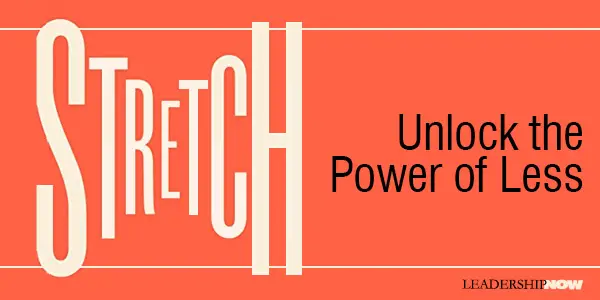
I
N HIS BOOK Stretch, Scott Sonenshein dispels the notion that having more resources = getting better results and replaces it with the conviction that a better use of resources = getting better results.
We are under more pressure than ever to do more. The idea that we can stretch and do more with what we already have begins to remove us from the dehumanizing rat race for resources that is impossible to win. Chasing limits us. Stretch liberates.
Especially in uncertain times, "stretching equips us with the abilities to adapt and change when facing a less predictable set of circumstances."
One of the reasons we chase instead of stretch is because fail to see how we might see a resource beyond its traditional use. It's also easy to assume that if we just had more money we could spend our way out of our problems. It's often easier to acquire things than to think about how to use those same resources in more productive ways. "The problem is that chasers become so fixated on acquiring resources that they lose sight of what those resources will do for them" so we end up squandering them.
We need to place more focus on what we already have. "Stretchers find beauty and richness in places where others struggle to see anything of value. Too often, we understand, interact with, and use things at face value, locking ourselves into conventions that limit possibilities." Our creativity is sparked by constraints. Filmmaker Robert Rodrigues comments:
The creative person with limitless imagination and no money can make a better film than the talentless mogul with the limitless checkbook every time. Take advantage of your disadvantages, feature the few assets you may have, and work harder than anyone else around you.
Outsiders can often stretch by seeing possibilities that we can't because we are the expert or just too close to the issue. "Breadth of experiences helps people stretch." The well rounded often outperform those who are deeply focused on a single thing especially when trying to solve complex problems. It makes a case for a liberal arts education.
We need to repeatedly go outside ourselves. "Temporary departures from our small worlds can come from short bursts of new activities such as reading about another field, finding a hobby, or having conversations with people from different backgrounds."
Stretching is not about being a cheapskate. There is a difference between frugal and cheap.
A Stretching Roadmap
In summary, here are a dozen ways Sonenshein suggests to help get us into the stretching habit.
Just Say No 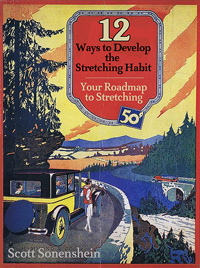
Just say no to more resources. Ask: "If I only didn't have these resources, I could…" "By saying no to more resources, we're saying yes to an entirely new outlook on working and living."
Find a Sleeping Beauty
It's easy to miss what is right before us. Again an outsider can help here. "In the world beyond fairy tales, a lot of resources lie dormant. If we look hard enough, we'll find resources all around us waiting to be activated. We just need to awaken them to benefit from more than we thought we had, allowing us to solve different problems and pursue promising opportunities that otherwise might be impossible."
Go Explore
Dedicate time every week to reading something different, educate yourself outside of your industry, take lunch with someone new, or spend time with outsiders. Leave your comfort zone.
Take a Break (and Pay Less Attention)
Consider rotating between difficult work and mindless work. "Mindless work recharges our batteries, readies us to do more down the road, and lets our mind wander to find new connections among our resources." Take a walk to find new connections. Consider putting yourself on the clock to provide a mandatory beginning and ending to your work.
Pick New Neighbors
"Whom we spend time with shapes a lot of our behavior." You don't need to change zip codes. "Instead, identify one stretcher you admire and already know. Commit to spending at least one hour with him or her once a month."
Appreciate
"When people are grateful, they expand how they think about resources, often in ways that try to help others." Also, by appreciating what we have, it makes it easier to say no to tempting things we lack but really don't need.
Shop Your Closet
Use what you have. "Many of the best-known inventions came from existing products. Play-Doh started as a wallpaper cleaning compound that became obsolete with the rise of vinyl wallpaper in the 1950s; the corkscrew came from a military tool to remove bullets; and Pyrex came from material from train lantern glass the wife of a scientist at Corning Glass Work experimented with to bake a cake."
Plan Backward
Think improvisation. Without a plan is often difficult to get started. But "jazz music replaces a plan with improvisation, teaching us to act and respond more spontaneously. Once we get moving, we free ourselves from worrying about plotting and following a plan and focus on observing and learning from our actions."
Scramble the Back Row
To remove chess players from entrenched thinking, Bobby Fischer suggested randomly scrambling the back row. "If we find ourselves too regularly on autopilot, it might be time to scramble our back rows. There's comfort in habits, but it's critical to avoid being complacent with how things are, closing off the possibility of imagining how things might be better."
Make Midyear Resolutions
"Why wait until the beginning of the year to make a pledge. The midyear resolutions also allow us to take stock of how we did with our New Year's resolutions and set additional goals from a presumably clearer headspace."
Break it Down
If we can break down our resources to their smallest components, then it becomes easier to see the hidden potential.
Turn Treasure into Trash
Keep a benefits diary to records unexpected benefits from you key events, activities, or experiences. "Once we find a hidden benefit in something, we can turn it into a treasure.
Stretch is a very well done book. Good and relevant examples give power to the points he is making. By chasing resources we really limit our potential. Stretching brings out our best.

 | In Stretch: Unlock the Power of Less - and Achieve More Than You Ever Imagined, you will learn to rethink what you need to succeed, and do more with what you already have. Scott Sonenshein examines why some people and organizations succeed with so little while others fail with so much. |
![]()
![]() Like us on Instagram and Facebook for additional leadership and personal development ideas.
Like us on Instagram and Facebook for additional leadership and personal development ideas.

![]()


Posted by Michael McKinney at 05:55 PM
Permalink | Comments (0) | Management , Personal Development , Problem Solving
04.19.17

Ego Free Leadership
E
GO IS A CONSTANT preoccupation with our self-worth.
Each of us has beliefs and fears about our value, and they cause defensive and/or self-promotional behaviors when under stress. Whether in a meeting, a presentation, or a relationship, part of our attention—sometimes all of it—is preoccupied by our view of our self. Are we competent? Respected? Intelligent? Liked? Attractive? Included? Each of us has a set of criteria we unconsciously judge ourselves against. When we measure up, we feel pride, even superiority. When we don't, we feel uncomfortable, stressed, often afraid.
Ego Free Leadership is co-written by executive coach Shayne Hughes, president of Learning as Leadership and Brandon Black the retired CEO of Encore Capital Group. The book tracks Black's journey from acknowledging to changing the destructive elements of his ego. Once he committed to change, the transformation began in his team and throughout the culture of the Encore organization. Quite effectively, Hughes and Black go back and forth sharing their perspectives on the unfolding transformation. Naturally, it's not a step-by-step prescription, but it is instructive to see the process because we all share similar issues and thinking.
They begin by debunking the "ego is good" myth. Our egos limit us as we try to protect it in various ways. "Our ego can't stand failure, incompetence, or weakness, so it avoids what is truly challenging us.
When we feel at the mercy of what is happening around us we react often distorting reality. "We read criticism, abandonment, judgment, competitiveness, and aggression into a situation where it may not exist." We seek to fix what we believe is causing our distress resorting to learned behaviors that really don't serve us well.
"Anytime we know intellectually what to do, but our actual behavior is inconsistent or in contradiction, it is a sign we are being short-circuited by our egosystem. These behavioral derailers come in many forms: conflict avoidance, procrastination, defensiveness, people pleasing, shutting down, being argumentative, just to name a few. Upon examination, these ingrained knee-jerk reactions invariably prove to be predictable and recurrent." It's not just the way we are, it's the way we have learned to be. In order to defuse our reactive behaviors, we need to identify the underlying triggers that created our behaviors in the first place.
Here are some insights from Ego Free Leadership:
Intellectually it's easy to decide that learning, growing, or creating authentic relationships is more important than not appearing incompetent, failing, or being hurt. Unfortunately, this is not how we feel at a visceral level, or we wouldn't be continuously repeating these dysfunctional behaviors. Transformation comes when we consciously connect with goals not tied to our self-worth and use this emotional clarity to inspire action in the present moment.The theoretical importance of having authentic, transparent conversations isn't in question: it's rather the practical difficulty of doing so when there isn't emotional safety in the relationship.
For our ego, the sensation of being right is like electricity to a lightbulb. It fuels us with energy and vigor. We sit straighter, our voice sharpens, and our language hardens. We face an issue or a conflict, and we see the answer clearly. With this certainty comes a feeling of power and righteousness, as captivating as a drug rush. This is the way it is. Being right sweeps us so automatically into an aggressive mental stance that any collateral damage seems just a necessary evil.
Our egosystem and brain can convince us of anything, regardless of its veracity. We can make—I myself have done it countless times—any number of important decisions with profound conviction, only to realize later it wasn't really what we wanted or was based on incorrect perceptions. ("…clearly distinguishing between the facts I had collected and my conclusions about them.")
In each case, people experienced their frustration as true, when in fact they were unconsciously focusing on the negative in others. Worse when we do this, our mindset and behaviors actually influence others to be less than their best selves, either because they don't feel safe or because we simply don't allow them to participate. We limit their potential.
As the authors admit no organization (or individual) can be completely ego-free, but we can manage it better. In every situation we have a choice. We can either give in to our ego or break free of the limits it imposes on us. They recommend:
- Notice the moments in your life when you experience a pinch. It might be an event or something someone says or does.
- Instead of reacting, search for what is triggered in you. What is that visceral discomfort you're trying to numb or you're blaming others for? How is your sense of self-worth threatened?
- Look outward and consider what vulnerabilities other might be feeling behind the veneer of strength or indifference. Empathize with how they feel in danger.
- Take the risk of disclosing how you feel vulnerable. Share your ego threat, not your mind chatter. Model a context of safety.
The lessons and insights shared in Ego Free Leadership could have a profound effect on any reader.
![]()
![]() Like us on Instagram and Facebook for additional leadership and personal development ideas.
Like us on Instagram and Facebook for additional leadership and personal development ideas.
![]()


Posted by Michael McKinney at 11:16 PM
Permalink | Comments (0) | Human Resources , Personal Development
04.14.17

Conflict without Casualties
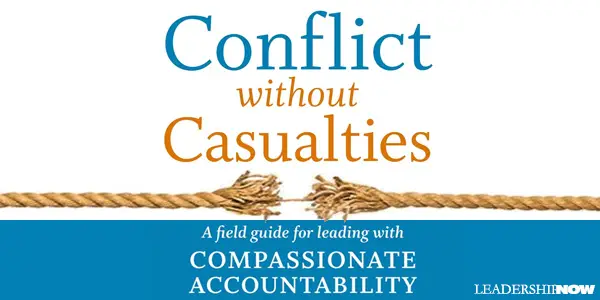
C
ONFLICT is everywhere. Conflict at the most basic level is simply a gap between what we want and what we are experiencing at any given point in time.
Conflict is energy, and can be used in positive or negative ways. Negative conflict becomes drama, and it is costly to companies, teams and relationships at all levels. In fact, according to a Gallup Poll, negative conflict drains the U.S. economy by about $350 billion a year in lost productivity and wasted energy.
In Conflict without Casualties, author Nate Regier believes that the misuse of conflict energy is the biggest crisis facing our world, and that we haven't even begun to harness the creative potential of conflict. When people embrace the fullest meaning of compassion as a process of "struggling with" others in creative conflict, they can transform lives, companies, and the world.
It is understandable that we try to avoid conflict considering all of the drama and negative fallout that always seems to accompany it. But Regier says if we use conflict correctly, we can use it to create. "Eliminating the casualties of conflict cannot happen by repressing the conflict and just 'being nice.' It happens by stewarding the energy inherent in conflict to make something positive, even amazing." That seems like a tall order, but it makes sense.
Compassionate Accountability
The way forward is to practice Compassionate Accountability . Compassionate Accountability is a method for resisting the negative pull of drama—"I gotta win." Negative conflict becomes drama. "Drama is the mismanaging of the energy of conflict. It diverts energy towards the pursuit of self-justification, one of the strongest human urges and the one that almost always gets us into trouble." (Chapter 2 on drama is one of the clearest discussions of drama I've read.)
To be compassionate is to struggle alongside with others; to struggle with instead of against. "Compassion is the result of people taking ownership of their feelings, thoughts and behaviors, and choosing to spend the energy of conflict pursuing effective solutions that preserve the dignity of all involved. Compassion is more than care and concern for others. It's about the willingness to get in the trenches and struggle together as an equal with others."
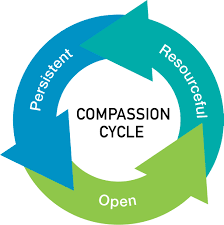 Compassionate Accountability is based on three skills:
Compassionate Accountability is based on three skills:
Openness
Openness is a state of non-judgmental receptivity to your own and others' experiences. Openness is the healthy alternative to the Victim response that is a part of most drama. It also involves transparency, courage with self and others, self-awareness, empathy, confidence in one's own adequacy, and a willingness to own and disclose emotions. Openness involves empathy (understanding others), validation (affirming others), and disclosure (sharing with others).
Resourcefulness
If Openness reveals the real issues, motives, and emotions in our lives, then resourcefulness is the ability to problem-solve to satisfy those motives and address the issues. When there's conflict, Openness is where we discover and affirm how the gap between what we want and what we're experiencing is affecting us. Resourcefulness is the ability to understand the gap and figure out what to do about it. It requires the abandonment of the ego in order to gather ideas and opinions, analyze what has worked in the past, and leverage personal strengths.
Persistence
Persistence is all about seeing things through with integrity, humility, and respect. It's accountability. It means setting boundaries, reinforcing non-negotiables, and accepting responsibility for your own behaviors. "Compassion without accountability gets you nowhere. Accountability without compassion gets you alienated. Blending the two is the essence of leadership."
These three skills are a process that starts at Open, moves to Resourceful, and finally to Persistence. They are three interdependent ways of feeling, thinking, and acting that work productively together.
When Regier's model is placed inside the Drama Triangle (developed by Steven Karpman), the author creates a useful visual for understanding where we often end up if we don't intentionally stay the Compassionate Accountability course.
Regier writes: "Drama inevitably pushes us into corners, where we cling to distorted worldviews that compel us to do the same thing over and over, expecting different results. Compassion, on the other hand, keeps us moving, searching, nimble, effective, and capable of adapting to change." It also keep us from being mired inside our own head and thus limiting our responses and our ability to reframe the conflict. We get stuck.
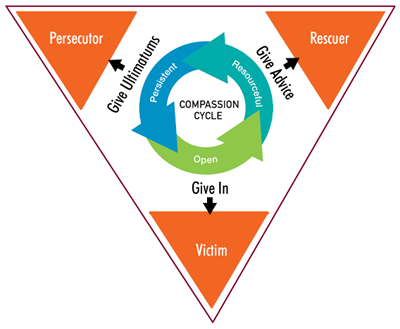
It would seem that if you stop at Persistence then you become stagnant and eventually irrelevant. A state of non-judgmental receptivity would seem to go hand-in-hand with progress, the inevitability of change, and the understanding of others. "As a species, human beings seem to have a very difficult time returning to Openness in order to keep the cycle going. We take up residence at Persistence, which inevitably morphs into Persecutor as we fight to protect what we've built and save ourselves from the consequences of our own creation."
He adds, "Each point on the Compassion Cycle has a purpose. When that purpose is fulfilled, it's time to move. Lingering after the purpose has been achieved is a recipe for stagnation and drama."
If you want to end the drama in your life or organization then you have to replace it with something else. Compassionate Accountability is the cure. Regier concludes the book with a section devoted to implementing this concept into everything you do. A very useful user's manual.
![]()
![]() Like us on Instagram and Facebook for additional leadership and personal development ideas.
Like us on Instagram and Facebook for additional leadership and personal development ideas.

![]()


Posted by Michael McKinney at 06:01 PM
Permalink | Comments (0) | Change , Communication , Personal Development
04.03.17

Are You Living an Adult Story?
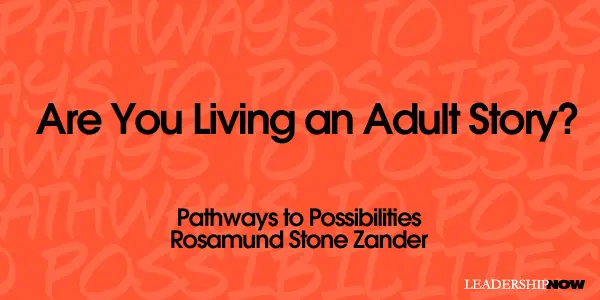
I
N The Leadership Gap, Lolly Daskal makes clear to us that "if we want to continue to have a positive impact on the world and make a difference, we must constantly rethink the instincts that drive us." Leaders need to question "who they are being while they are leading."
This need for leaders to rethink who they are gets to the heart of what Rosamund Stone Zander describes in Pathways to Possibility. Often, our growth requires that we live a new story. We are not "trained to think of ourselves as governed by stories made up by younger iterations of ourselves, frozen in time."
We need to rewrite the stories to reflect life as it is now. "I believe that when we become aware of patterns in our behavior, when we learn to identify and rewrite the stories that give us our identities, we will gain passage, at any age, into a new phase of adulthood. In this territory of maturity, where old fear-based pattern no longer hold us back, we will, I wager, do what we now think of as remarkable, even magical, things."
We all have a point of view about how life should go and they are often illogical. But when they are we produce reasons for why we do and think like we do even if it has no basis on our current reality. They hold us back. What children's stories have in common is survival anxiety. We are living a story made up by a child when we are frightened about the future, are ready to run, feel the need to control others, act out of insecurity, and are unable to take criticism of any kind.
The stores we tell ourselves are generally adopted unknowingly from the environment in which we grew up and are not under the control of the reasoning mind. To move forward, we have to uncover the story and tell a new one. Zander repeatedly states that new habits are formed in an environment of love.
How do you know if you are living in a story crafted by the mind of a child?
![]() You are being captured by the child in you if you are certain that your views are true, and you make no attempt to question them.
You are being captured by the child in you if you are certain that your views are true, and you make no attempt to question them.
![]() When you are frequently anxious that things will go wrong, or are living your life cautiously. Fear and anxiety are the underlying emotions in the child's view of the world because for a child it is all about survival.
When you are frequently anxious that things will go wrong, or are living your life cautiously. Fear and anxiety are the underlying emotions in the child's view of the world because for a child it is all about survival.
![]() You are living in a child apart if you are regularly concerned with what others think of you.
You are living in a child apart if you are regularly concerned with what others think of you.
![]() When you assume that things will repeat. It makes you approach the future with resistance, be overly cautious, and close down to life.
When you assume that things will repeat. It makes you approach the future with resistance, be overly cautious, and close down to life.
![]() You are expressing a child part when you are convinced that you have absolute needs and you are further convinced that your needs and desire will never change.
You are expressing a child part when you are convinced that you have absolute needs and you are further convinced that your needs and desire will never change.
In short, a child's stories are I-centered, concrete, fear-based, scarcity-minded, identity-bound, personal through and through, and indisputable—self-centered—my way.
When we are operating from the adult narrative:
![]() We know we survived childhood and staying alive is no longer a present issue.
We know we survived childhood and staying alive is no longer a present issue.
![]() The mature mind is curious and devotes attention to what is not known.
The mature mind is curious and devotes attention to what is not known.
![]() The adult mind is open and flexible: willing to entertain new thoughts and feelings without the need to protect itself.
The adult mind is open and flexible: willing to entertain new thoughts and feelings without the need to protect itself.
![]() The adult mind is creative: on the lookout for opportunity and able to invent stories and move into contexts that will further our alignment with one another.
The adult mind is creative: on the lookout for opportunity and able to invent stories and move into contexts that will further our alignment with one another.
![]() The adult mind is loving and compassionate. Defined by love, joy, appreciation, gratitude and wonder. Nothing appears as personal.
The adult mind is loving and compassionate. Defined by love, joy, appreciation, gratitude and wonder. Nothing appears as personal.
Zander relates three rules that coach Pete Carroll gave his players. Zander says that these three rule will help support the adoption of an adult story. "These three rules," she writes, "almost guarantee that the person who follows them is saved from the distraction of survival instincts, such as possessiveness, entitlement, and winning over others, and feelings of helplessness, fear and rage when things don't turn out the way he planned. Here are the three rules with Zander's comments:
Rule 1: Protect the Team: A perfect instruction to remind a player that he is not, in fact, the center of the universe, and to encourage him in all matters related to the game to adopt and live into a story of collaboration.
Rule 2: No Negative Talk. No Whining and Complaining: This rule establishes that the game is played in a mode of possibility and not one of survival where players are out for themselves and can be weakened by a victim story. It requires that people be responsible for the effect of their words and their moods, which ensures that the team maintains energy.
Rule 3: Be Early: What powerful little words! What an amazing third rule! The player who lives by "be early" puts himself in charge of his life. If you decide to be early, you are always in charge; you will show up as a considerate person as well as a paragon of responsibility.
![]()
![]() Like us on Instagram and Facebook for additional leadership and personal development ideas.
Like us on Instagram and Facebook for additional leadership and personal development ideas.

Posted by Michael McKinney at 10:11 PM
Permalink | Comments (0) | Personal Development
03.27.17

The Outward Mindset: Seeing Beyond Ourselves
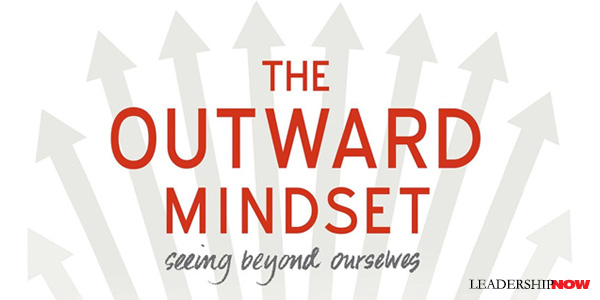
A
N OUTWARD MINDSET will greatly impact how we negotiate our world and the impact we will have. An outward mindset helps us to see the world as it is and not how we imagine it to be. Our age increasingly requires us to collaborate more and more with others. An outward mindset is essential.
An outward mindset doesn't come naturally. We have to consciously change how we think about others.
In The Outward Mindset, the Arbinger Institute reports that "the biggest lever for change is not a change in self-belief but a fundamental change in the way one sees and regards one's connections with and obligations to others."
People and organizations get stuck when they have an inward mindset because when we are focused on ourselves and our needs, our reality becomes distorted. An inward mindset limits our possibilities and negatively affects our behavior and thus our relationships.
Arbinger reminds us that an inward mindset and introspection are not the same thing. "One can introspect in a self-centered way, which would indicate an inward mindset. However, a person also can introspect about one's connections with others, which is the very essence of what we are calling outwardness. Sometimes it is helpful to look inside to see how one is connected with what is outside."
Moving from an inward mindset to an outward mindset is more than a surface adjustment or behavioral change alone. It requires a change in how we see and think about others. How we see and respond to others is not so much about them as it is a reflection of what is going on inside of us. We often fixate on other's shortcomings so we don't have to deal with our own.
Inward-mindset people and organizations do things. Outward-mindset people and organizations help others to be able to do things." It is possible to be an inward-mindset person or organization masquerading as an outward-mindset person or organization if you aren't paying attention to the needs, objectives, and challenges of those you are supposedly doing the work for. Whose needs are your primary focus?
Arbinger has discovered that those who consistently work with an outward mindset follow a pattern. They:
- See the needs, objectives, and challenges of others (Create opportunities for people to see each other so they can begin to talk.)
- Adjust their efforts to be more helpful to others ("Real helpfulness can't be made into a formula. To be outward doesn't mean that people should adopt this or that prescribed behavior. Rather, it means that when people see the needs, challenges, desire, and humanity of others, the most effective ways to adjust their efforts occur to them in the moment. When they see others as people, they respond in human and helpful ways.")
- Measure and hold themselves accountable for the impact of their work on others ("Measuring one's impact requires nothing but a willingness to stay in regular conversations with others about whether they feel one's efforts are helping them or not.")
An outward-mindset begins with you. "While the goal in shifting mindsets is to get everyone turned toward each other, accomplishing this goal is possible only if people are prepared to turn their mindsets toward others with no expectation that others will change their mindsets in return. This capability—to change the way I see and work with others regardless of whether they change—overcomes the biggest impediment to mindset change: the natural, inward-mindset inclination to wait for others to change before doing anything different oneself." This, of course, is true leadership.
To begin:
- Start with mindset. Apply the outward-mindset pattern: see others, adjust efforts, and measure impact
- Don't wait for others to change. The most important move is to turn your mindset regardless of whether others change theirs.
- Mobilize yourself and your team or organization to achieve a collective goal. Each person is part of a larger whole.
- Allow people (beginning with yourself) to be fully responsible. Own your work—your plans, your actions, and your impact—and position others to own theirs.
- Eliminate the unnecessary distinctions that create distance between yourself and others.
- To the extent that you have the authority to do so, rethink systems and processes to turn them outward; create an organizational ecosystem that energizes people rather than manage objects.
Take the Mindset Audit online.
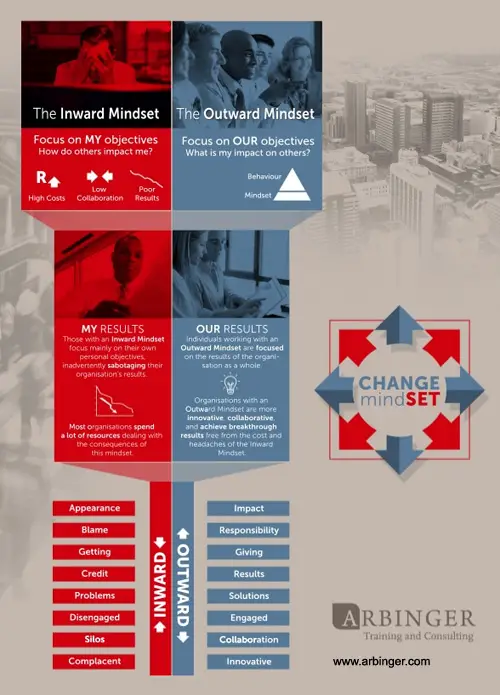
![]()
![]() Like us on Instagram and Facebook for additional leadership and personal development ideas.
Like us on Instagram and Facebook for additional leadership and personal development ideas.

Posted by Michael McKinney at 03:21 PM
Permalink | Comments (0) | Personal Development
03.22.17

5 Critical Skills You Will Need to Hit the Ground Running After College

J
OURNALIST AND FORMER EDITOR of the Chronicle of Higher Education, Jeff Selingo has written an insightful and essential guide as to why some people prosper after college and some fail or find themselves underemployed. You need more than a degree.
There is Life After College is a book that every student should read—twice. Frankly, it would hurt those already in the workplace to read it as the ground is shifting under our feet as well.
Employers are looking for T-shaped individuals. The vertical bar represents depth of knowledge and the horizontal bar represents the ability to work across a variety of complex subject areas with ease and confidence. Something a liberal arts education is designed to do.
Selingo notes that too many undergraduates want to be spoon-fed. "They sit back and wait for professors to deliver lessons in the classroom. They participate in campus life but too often from the sidelines, so they lack and deep engagement in activities that provide much-needed skills for the job market. They fail to cultivate relationships with professors or staff on campus who might lend advice or act as mentors. And they are reluctant to chase after experiences—whether undergraduate research, study abroad, or internships—that help them discover their passions and arm them with the interpersonal skills so in demand by employers today."
Selingo has distilled a lot of wisdom into five often overlapping skills needed to succeed in your career and life. (You see these concepts are appearing more and more in leadership development studies as well.) I've listed them here with brief outtakes for each from the chapter. The book provides much more detail and practical career and life advice that is well worth taking the time to consider.
1. Be Curious, Ask Questions, and Be a Learner for Life
The recent graduates who succeed in their careers are flexible about how they learn. "They have ideas and act on them," said Tim Brown, CEO of IDEO. "Being able to get stuff done is a capacity that is rather important." Most of all he's looking for a mind-set with creativity, passion, and empathy at its root. "I want diversity of experiences in college that have exercised their brain," Brown said.On executive said, "Our industry is changing so fast that we can't depend on what students already know. We need people who are creative, curious, whose brains are wired to constantly ask what's next. What we need are learning animals."
2. Build an Expertise, Take Risks, and Learn the Meaning of Grit
"We see a lot of transferable skills in athletes," Marie Artim, vice president of talent acquisition at Enterprise, told me. Enterprise is not alone. As employers search for signals that someone is ready for a job beyond achieving the baseline bachelor's degree, participation in collegiate athletics is seen by many as one clear indicator of commitment and drive in a generation of college graduates often lacking both.The qualities prized in athletes obviously apply to other college activities. Employers told me they value musicians, game designers, and writers in much the same way.
"We want to see that they have a passion, and they show proficiency and go deep in it." The more time students spend trying to master a skill or a job, the more likely they are to encounter failure. "Our best employees are problem solvers and are able to weave everything they know together—customer service, empathy, persuasive skills, leadership skills, flexibility, and work ethic," Marie Artim of Enterprise told me. "They can think on their feet."
Selingo adds, "What is unfortunate is that our desire to protect our kids and fill every waking moment of their schedules with organized activities seems to only worsen as they get older." So they never find opportunities to take risks and perhaps fail.
Recruiters are looking for applicants who have overcome challenges and learned from their disappointments.
3. Every Job is a Tech Job
Understanding the programming language behind the apps on your iPhone or the basics of artificial intelligence is now seen as basic foundational skills by many employers. Learning to program is much like learning a second language was in the twentieth century: You might not become proficient enough to move overseas, but you could get by if you traveled to a particular country."It's more about giving people the skills and tools they learn in the act of coding," Carol Smith, who oversees Google's Summer of Code program, told Wired magazine. "It gives them the critical thinking skills that are important whether or not they go into computer science as a profession."
The generation entering college and the workforce now are often referred to as "digital natives" because they were raised on technology from a very young age. But their relationship has been largely passive: switch on the device and use it. Being digitally aware isn't about turning more people into computer geeks. It's about moving from a passive relationship with technology to a more active one—especially in understanding the how and why behind machines, not just the what.
4. Learn to Deal with Ambiguity
"Excelling at any job is about doing the things you weren't asked to do," said Mary Egan, founder of Gatheredtable, a Seattle-based start-up, and former senior vice president for strategy and corporate development at Starbucks. "This generation is not as comfortable with figuring out what to do."The ability to negotiate ambiguity on the job requires people to think contextually, to provide what I call the "connective tissue" that occupies the space in between ideas. It is the "killer app" of today' workplaces. People who make these connections do so by following their curiosity and exploring and learning from peers. Knowledge is not only what is in our brains, but also what is distributed through our networks. Learning happens by building and navigating those networks.
5. Be Humble and Learn from Your Peers and Mentors
People who manage recent college graduates all had the same complaint about their new hires: they're too impatient about their careers and unrealistic about their roles within a company. A friend who is my age and a manager at a major media company told me about new graduates who applied for senior roles after less than a year on the job and who were flabbergasted when they didn't get the promotion, which went to someone with ten or twenty years more experience.Being socially aware goes beyond knowing your role within the organization. It includes important skill sets like written and verbal communication as well as the ability to deal with negative feedback, speak in public, and, most of all, interact on a basic human level with coworkers and clients that doesn't involve texting them.
eBay offers classes on managing your personal brand (because graduates usually can't set goals for themselves), giving an elevator pitch (they often can't get to their point fast enough), managing your calendar (once again, time management), and performance reviews.
Selingo emphasizes that what you do in college (and therefore what you become—who you are ) is typically more important than where you go.
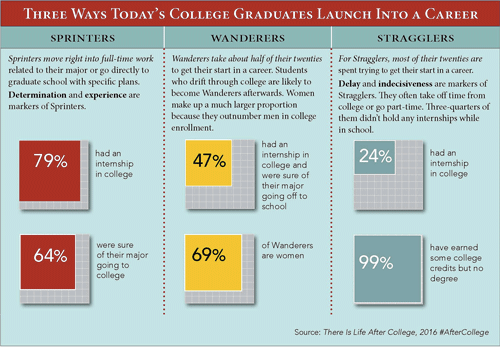
![]()
![]() Like us on Instagram and Facebook for additional leadership and personal development ideas.
Like us on Instagram and Facebook for additional leadership and personal development ideas.

Posted by Michael McKinney at 12:27 AM
Permalink | Comments (0) | Personal Development
03.08.17

Humility Casts a Wide Net
HUMILITY casts a wide net and makes possible the work of leadership. Nothing facilitates community, collaboration, and innovation like humility.
In Humility is the New Smart, Ed Hess and Katherine Ludwig define humility as "a mindset about oneself that is open-minded, self-accurate, and not all about me, and that enables one to embrace the world as it is in the pursuit of human excellence."
Their definition encompasses the mind of a leader that will be able to lead in a changing and uncertain world. Humility is inclusive. It is inclusive of others ideas, others needs, others strengths, other contributions, and the realities that exist outside of our own head. A humble leader asks more questions and is open to more answers thus deepening the pool of resources they have to draw upon. But it requires a strength of character. As senior vice president of the NBA's Orlando Magic, Pat Williams writes in Humility: The Secret Ingredient of Success:
- Humble leaders are strong enough to listen to other points of view.
- Humble leaders are strong enough to admit their mistakes and learn from them.
- Humble leaders are strong enough to celebrate their achievements of others.
- Humble leaders are strong enough to surround themselves with talented people without feeling threatened or diminished.
Additionally,
- Humble people treat others as equals.
- Humble people don't claim to know everything.
- Humble people are better team players.
- Humble people are willing to set aside their egos.
Humility is the antidote to insecurity that often plagues us. A lack of humility actually drives insecurity. Humility makes your strengths productive and multiplies the strengths of others. Humility acknowledges a world beyond our own thinking and minimizes our own limitations. A good leader knows this and acts accordingly to produce the best results.
Do you have the strength to be humble?
![]()
![]() Like us on Instagram and Facebook for additional leadership and personal development ideas.
Like us on Instagram and Facebook for additional leadership and personal development ideas.
![]()

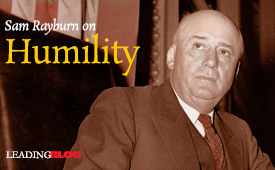
Posted by Michael McKinney at 10:50 PM
Permalink | Comments (0) | Leadership , Personal Development
03.06.17

How Do We Get Outside Our Comfort Zone?

YOU'VE NO DOUBT HEARD that it is outside our comfort zone where the magic happens. But how do we get outside our comfort zone? It's not always easy in some cases too stressful to consider.
Andy Molinsky gives us some practical first steps in Reach: A New Strategy to Help You Step Outside Your Comfort Zone, Rise to the Challenge and Build Confidence.
We often fail to get outside our comfort zone because of the feeling that it's too big a reach (which is why they're outside your comfort zone): "It's not me," "People won't like this version of me," "It's embarrassing because I'm clearly not good at this," "Why should I have to do this," and/or "Maybe this isn't something I should be doing." So commonly, we do nothing. We avoid it altogether. Or we only do it half-heartedly. All of these things sabotage our efforts.
So the question to ask yourself is, "If I could erase the anxiety and distress, is it something I'd like to be able to do?"
Molinsky has interviewed and also observed people in many different professions and walks of life. And the stories he includes from managers, executives, priests, baristas, stay-at-home-moms, singers, actors and performers, are helpful and relatable. And although these people are very different, there is a common theme. He has found that those most successful at getting outside of their comfort zones have three things going for them:
Conviction—Making Sure the Gain is Worth the Discomfort
It's a deep sense of purpose that it's actually worth it to endure the strain or stress entailed in stepping outside your comfort zone. This is the "why am I doing this?" And that can come from anywhere.
Customization—Designing a Personalized Baby-Step Plan
This is the ability to tweak or adjust in often very slight ways how you perform a task to make it feel more comfortable and natural. When facing difficult situations we often feel powerless, but we can alter situations to play to our strengths. For example, we can change the words we use or the topics we talk about, change our body language, or change the timing or location.
Clarity—Getting Some Perspective on Your Fears
Clarity is the ability to develop an even-handed, reasonable perspective on the challenges you face. "It is an attempt to be as true as possible with ourselves about the situations we're currently working on, taking a careful inventory of our true feelings—even if we're embarrassed by them—as well as an inventory of our avoidance strategies." In other words, to not succumb to the distorted and exaggerated thinking so many of us do in very stressful situations. It may not really be as far outside of our comfort zones as we imagine.
Here are Five Comfort Zone Myths to consider:
Myth #1: All it takes to step outside your comfort zone is taking a leap.
Reality: Very few people spontaneously "leap" outside their comfort zones; rather, that leap is the result of considerable thinking and deliberation.
Myth #2: The "magic" only happens outside your comfort zone.
Reality: The "magic" can happen both inside and outside your comfort zone.
Myth #3: I'm the only one who struggles with situations outside my comfort zone.
Reality: Nearly everyone struggles with situations outside their comfort zones.
Myth #4: Getting out of your comfort zone is just about "sucking it up."
Reality: "Sucking it up" is important, but so too are other strategies which, in fact, can ultimately make 'sucking it up' less necessary.
Myth #5: With enough inspiration, anyone can stretch outside their comfort zone.
Reality: Anyone can do it, but it takes more than inspiration; it takes effort, persistence, strategy, and a keen understanding of the challenges.
![]()
![]() Like us on Instagram and Facebook for additional leadership and personal development ideas.
Like us on Instagram and Facebook for additional leadership and personal development ideas.

Posted by Michael McKinney at 08:06 AM
Permalink | Comments (0) | Personal Development
03.03.17

Thank You for Being Late
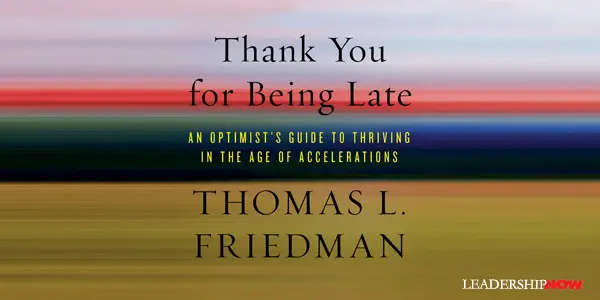
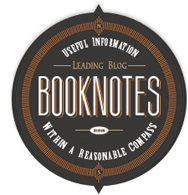 IN Thank You for Being Late, journalist Thomas Friedman affirms that we are living in one of the greatest inflection points in history. "The three largest forces on the planet—technology, globalization, and climate change—are all accelerating at once. As a result, so many aspects of our societies, workplaces, and geopolitics are being reshaped and need to be remained."
IN Thank You for Being Late, journalist Thomas Friedman affirms that we are living in one of the greatest inflection points in history. "The three largest forces on the planet—technology, globalization, and climate change—are all accelerating at once. As a result, so many aspects of our societies, workplaces, and geopolitics are being reshaped and need to be remained."
As he notes, it more than just change it is reshaping that is taking place. It's hard for any of us to keep up. "In such a time, opting to pause and reflect, rather than panic or withdraw, is a necessity. It is not a luxury or a distraction—it is a way to increase the odds that you'll better understand, and engage productively with, the world around you."
Friedman's title, Thank You for Being Late, comes from realizing that a guest's tardiness to a meeting gave him time to just sit and think. And he was better for it. So, "Thank you for being late."
Thank You for Being Late succeeds in presenting a better understanding of why the world is the way it is. What follows is a small selection of thoughts and analysis of and prescriptions for the world we live in:
☙ As the world becomes more interdependent and complex, it becomes more vital than ever to widen your aperture and to synthesize more perspectives.
☙ Creativity becomes, in part, about asking the best questions.
☙ You can't just show up. You need a plan to succeed. You have to know more, you have to update what you know more often, and you have to do more creative things with it. Self-motivation is now so much more important.
☙ It is so easy to forget that many, many people in America don't have a professional network, an alumni network, two parents, or in some cases anyone around them with a job, to consult about how to get one.
☙ In a world of so many choices, it's hard to know what to do.
☙ Social media is good for collective sharing, but not always so great for collective building; good for collective destruction, but maybe not so good for collective construction; fantastic for generating a flash mob, but not so good at generating a flash consensus on a party platform or a constitution.
☙ Quoting Jeffrey Garten, the former dean of the Yale School of Management: Maybe this is overly romantic, but I think leadership is going to require the ability to come to grips with values and ethics. The more technological we get, the more we need people who have a much broader framework. You'll be able to hire the technologist to make systems work, but in terms of the goals, that takes a different kind of leader.
☙ A number of technological forces came together to create an exponential step in change in the power of men and machines—much faster than we have been able to reshape our institutions, our laws, and our modes of leadership. Quoting Dov Seidman: Technology creates possibilities for new behaviors and experiences and connection, but it takes human beings to make the behaviors principled, the experiences meaningful and the connections deeper and rooted in shared values and aspirations.
☙ No better source of restraint then a strong community.
☙ It is only when people relax their hearts and their minds that they are open to hear and engage with others, and healthy communities create a context for that.
![]()
![]() Like us on Instagram and Facebook for additional leadership and personal development ideas.
Like us on Instagram and Facebook for additional leadership and personal development ideas.

Posted by Michael McKinney at 11:07 AM
Permalink | Comments (0) | Personal Development
02.27.17

Mastering Civility
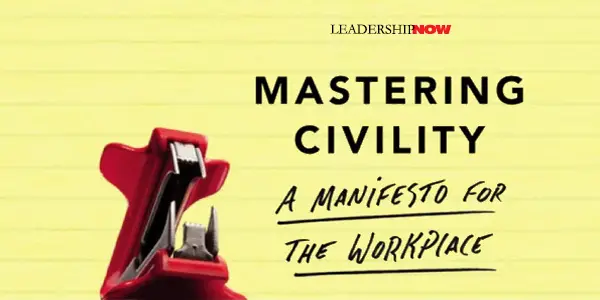
Civility costs nothing, and buys everything.— M. W. Montagu
CIVILITY has a way of winning people over and garnering influence.
Civility isn't just the absence of incivility. In Mastering Civility, Christine Porath explains that "Civility in the fullest sense requires something more: positive gestures of respect, dignity, courtesy, or kindness that lift people up."
Incivility impacts our health and performance. It depletes our "immune system, causing cardiovascular disease, cancer, diabetes, and ulcers." It also robs us of our "cognitive resources, hijacks our performance and creativity, and sidelines us from our work. Even if we want to perform at our best, we can't, because we're bothered and preoccupied by the rudeness."
Incivility is contagious. "When you're exposed to hostility or aggression, you behave differently. Incivility sneaks into your subconscious. It's easy to see how plagues of incivility can take shape and spread." But you don't have to succumb to incivility. "When you follow a rude experience with a polite one, the polite one 'overwrites' the rude one, loosening the hold it has on your mind."
Civility starts with a few basic behaviors and it grows from there. Simple things like saying please and thank you make a difference in how we are perceived by others and the influence we have on them. "Most of us are in a hurry to prove our competence, but warmth contributes significantly more to others' evaluations. Warmth is the pathway to influence."
Other basic behaviors include acknowledging people and listening. They signal caring, commitment and connection. Show respect for others by sharing resources, the limelight, and positive feedback. "The highest performers offer more positive feedback with their peers; in fact, high-performing teams share six times more positive feedback than average teams. Meanwhile, low-performing teams share twice as much negative feedback than average teams."
What if you are the victim of incivility?
When someone is being uncivil to you it's easy to let your emotions take over. It's easy to get sucked in to their incivility. Porath advises you to avoid the temptation to get even. It's not a win for you.
The best advice has nothing to do with them and everything to do with you. How will you choose to interpret it? Here are a few of her thoughts:
When you experience incivility, your sense of thriving comes into play in a particular way: by making it easier for you to reframe the negativity of the event so that it isn't nearly as destructive.What are you going to make this mean? How you interpret the situation is crucial. How much are you going to let someone pull you down? What useful lessons might there be for you in the situation?
Science reveals that about 50m percent of our happiness is based on brain wiring; 40 percent is owed to how we interpret and respond to what happens to us, and 10 percent is driven by our circumstances.
In large part, you really do get to decide how you interpret incivility, the meaning you assign to it, and the stories you tell yourself. You also get to control whether it makes you feel bad or not. It may not be realistic for you to "toughen up," but you can choose not to worry about what was said or done to you."
Everyone would agree that we should be civil and we recoil when we see others engaged in it, yet incivility has become more commonplace. Somehow we feel justified being uncivil when things don't go our way. And it costs us all.
Uncivil behavior does not generate greater influence no matter how loud you are. Most leadership failures can be attributed to abrasive or arrogant approaches to others. Uncivil leaders eventually undermine their own potential.
Are you civil? Porath offers a quick civility assessment online.
![]()
![]() Like us on Instagram and Facebook for additional leadership and personal development ideas.
Like us on Instagram and Facebook for additional leadership and personal development ideas.

![]()
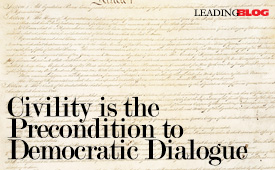
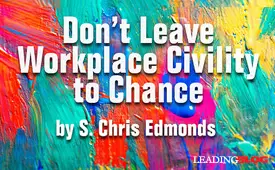
Posted by Michael McKinney at 08:44 AM
Permalink | Comments (0) | Human Resources , Personal Development
02.17.17

Freeing Yourself from Yourself
TOM ASACKER always makes you think.
Life is not scripted but we live it as though it were. In doing so, we create boxes that we operate within without ever really seeing the possibilities. "We're confined in mental prisons of our own creation."
We make these scripts up or others make them up for us and eventually we come to believe them. And the problem is we think that is reality. It's that story inside our head that keeps us from flourishing as we should—a life that moves us. We are sabotaging ourselves.
We act more like Coleridge and less like Keats. In I Am Keats, Asacker develops a metaphor for two worldviews as expressed through the poetry of two 19th century poets: Coleridge and Keats.
Keats was passionate. He was moved by his senses and imagination. Capable of being in uncertainties, mysteries and doubts, he was uninhibited, open, and without judgment.
We are conditioned – perhaps predisposed – to live in Coleridge's worldview. Coleridge wants to predict an unknowable future. He is logic, order, control and progress. Coleridge wants you to live a productive and mistake-free life. "He is an expert craftsman, skilled in the rights and wrongs of the world, and turned on by the desire for risk aversion, accumulation and conformity."
Neither is right or wrong but we need to be aware of the dynamic between the two or we never really live. We never see the possibilities. Knowing is safe. Being is frightening – "a dynamic dance with reality."
But we are held captive by our beliefs—what we believe to be reality. "Here's the thing about our beliefs. We don't want them pointed out to us. We don't want to have our soothing stories interrupted. We don't want to be woken up from our script, from our reassuring routines. Otherwise, we'll have to think. And then, heaven forbid, we may have to change.
Asacker writes, "Let go of your incessant desire to know, to predict and influence, and instead be willing to experience the mystery of the present without corrupting it with questions."
When you allow yourself to become more like Keats, "you find yourself being pulled deeper and deeper into a process that creates serendipitous connections and refines your perceptions. Your old eyes adjust to a new world, and you become more creative and discerning."
Experience the moment. "Your present creates the meaning of your past."
I Am Keats is a book for our times. It is a philosophy says Asacker. "Magic, then logic. Heart, then head." Try it.
More at: IAmKeats.com
![]()
![]() Like us on Instagram and Facebook for additional leadership and personal development ideas.
Like us on Instagram and Facebook for additional leadership and personal development ideas.

Posted by Michael McKinney at 08:33 AM
Permalink | Comments (0) | Personal Development
01.04.17

Ditch Lofty Outcome Goals and "Hit the Glove!"

WHEN IT COMES TO KEEPING New Year's Resolutions, the stats aren't good. Surveys show that while some 40 percent of us make them, only 8 percent of us keep them. We may feel exhilarated when we set a big goal, but that soon gives way to anxiety. While we all want to get better, lofty goals don't always help.
There is a way to set goals and achieve them. It comes from Rick Peterson, the former Major League Baseball pitching coach (of Moneyball fame), who guided the New York Mets and the Oakland A's to great success. He did it by getting his pitchers to scale back their goals from lofty to bite-sized, from outcome to process. His mantra, "Hit the glove," was not only powerful and effective, it translates well beyond professional baseball.
At the beginning of spring training, Rick would ask his pitchers, "What's your goal?" Most had the kind of long-term, outcome goals you find on the back of a baseball card — winning a certain number of games or pitching a certain number of innings.
The problem with focusing on great big goals is that you're distracted into focusing on factors outside your control. Winning a ball game involves more than just the pitcher's performance — it hinges on how many runs his team scores, how well his team fields, how well the opposing hitters handle good pitches, and even the umpire's calls. When we don't hit that big outcome goal we get demoralized, creating doubt and anxiety can hurt our performance.
Instead, Rick refocused his pitchers on short-term, bite-sized process goals. He told them they were professional glove hitters with one simple goal: Hit the catcher's glove as often as possible — with the right pitch.
If a player focuses on hitting that glove, he can't focus on the pressure of a loftier outcome goal. He has to concentrate on hitting that glove . He's not distracted by things outside his control. Hitting the glove on a high percentage of pitches is also the most probable path to achieving larger, outcome-oriented individual and team goals.
How It Translates
We can all learn to refocus on hitting that glove. I've been in sales for decades. At the start of every year, salespeople's anxieties peak. Whatever numbers they produced last year, they no longer matter. The scoreboard's back to zero. Time to prove yourself all over again.
Many sales organizations try to motivate their sales forces with talk of raising the bar and hitting even bigger numbers. But that lofty-goal approach can trigger fear and worry instead. Just like pitchers, salespeople know there are parts of the sales game beyond our control. And it's easy to lose focus amidst the cornucopia of daily distractions.
After I heard Rick's mantra, "Hit the glove!" I thought of what that meant in terms of my day-to-day sales. I settled on high-quality interactions with customers and prospects, meaning one that advances a sale and/or our relationship. By focusing on having daily, high-quality interactions with customers, I would make great progress toward putting a dent in my quota.
Thinking about how many high-quality interactions I should have each day, I set the initial target at two. Before you laugh and ask what I was going to do after lunch, consider the math. Two high-quality interactions per day are 10 per week, and 40 per month. Assuming one month of vacation, that's 440 per year — far more than I was averaging.
As soon as I started focusing on my new simple, short-term, bite-sized process goal — two high-quality interactions with customers each day — I began thinking about my day differently. I began prioritizing those two high-quality interactions with customers above everything else. As I considered how to invest my time, I regularly asked myself, " Is this helping me hit the glove? "
As a result, my focus improved remarkably. I wasted less time. I didn't give my quota a second thought. My numbers took off, and I finished the year more than 25 percent ahead of my previous year's performance. Focusing on that one small change brought about big results. So ask yourself: What's your version of hitting the glove?
This post is by Judd Hoekstra. He is a leadership and human performance author, consultant, and speaker. He serves as a Vice President at The Ken Blanchard Companies, a premier leadership training and coaching company. He is also a coauthor of the bestselling Leading at a Higher Level as well as Who Killed Change? He received his bachelor's from Cornell University, where he played hockey and baseball. He also graduated from the Advanced Business Management Program at Kellogg School of Management. For more information, go to www.juddhoekstra.com.
Rick Peterson has coached some of baseball's best pitchers in the past twenty years, including Cy Young Award winners and Hall of Famers.
He was the Oakland Athletics' pitching coach during the famed Moneyball era and has served as a coach with the New York Mets, Chicago White Sox, Pittsburgh Pirates, and Milwaukee Brewers. He is currently director of pitching development with the Baltimore Orioles. He holds a combined degree in psychology and art. He and Judd Hoekstra are the authors of Crunch Time: How To Be Your Best When It Matters Most. For more information, go to www.rickpetersoncoaching.com.
![]()
![]() Like us on Instagram and Facebook for additional leadership and personal development ideas.
Like us on Instagram and Facebook for additional leadership and personal development ideas.
![]()


Posted by Michael McKinney at 09:24 AM
Permalink | Comments (0) | Personal Development
11.24.16

Gratitude is Good for You Too

WE KNOW GRATITUDE makes relationships thrive and makes trust possible. Gratitude encourages, clarifies, motivates, includes, and unifies.
When we show gratitude, people feel valued, they know what's important, they want to do more, and they feel part of something bigger than themselves.
But gratitude is good for you too.
Gratitude puts you in the right mindset to lead. Gratitude and humility are interconnected. They reinforce each other. Gratitude says, "I didn't do this alone." French philosopher Andre Comte-Sponville wrote, The narcissistic leader or "the egoist is ungrateful because he doesn't like to acknowledge his debt to others and gratitude is this acknowledgement." A lack of gratitude is at the core of narcissism. We alone are not responsible for who we are and what we do and that is the essence of leadership. We are never truly self-sufficient.
In a practical way, gratitude provides guardrails in our life. Gratitude helps us to protect from ourselves. It is amazing how much gratitude plays into avoiding poor behavior and wrong thinking. Gratitude sets a boundary on our thoughts by making us mindful of others. It helps us to avoid going where we should not go because we are more self-aware.
Gratitude requires that we slow down and reflect. Gratitude is the basis of emotional intelligence. It puts other people first. It says you know and you care. While empathy has been found to be essential to leadership, empathy is not empathy if it is silent. It must be expressed.
Gratefulness helps to curb unproductive emotions such as frustration, resentment, and revenge. Studies have shown that it is an antidote to depression. It has the power to heal and move us forward.
It improves relationships and is a remedy to envy and greed. Instead of trying to strive with others we are thankful for what they do. It eliminates a leader's tendency towards entitlement. Grateful people find more meaning in life and feel more connected to others.
In these changing and uncertain times, gratitude is a leaders ally. Gratitude looks at the long term and doesn't focus on the present situation. Life is a continuum. Gratitude allows a leader to appreciate where they are and the resources they have at their disposal to face what life throws at them. A habit of gratitude gives us perspective. It doesn't blind us to the negative but it facilitates a solution.
Gratitude can't just be something we do is has to be who we are as a leader. More than a behavior it must come from the heart. It must be the mindset we lead from, manage from, and make decisions from. Gratefulness is grounded in reality because ultimately we must realize that everything good in our life is a gift.
Leadership begins and ends with gratefulness.
![]()
![]() Like us on Instagram and Facebook for additional leadership and personal development ideas.
Like us on Instagram and Facebook for additional leadership and personal development ideas.
![]()


Posted by Michael McKinney at 11:34 AM
Permalink | Comments (0) | Leadership Development , Personal Development
02.24.16

10 Ways You Earn Respect


ONE of the critical lessons I've learned in life - and it extends beyond the workplace - is the importance of respect. This may seem old-fashioned or trite in the days of, "I got mine, go get yours," but if you treat people right, you will get the results you want. This is especially true in business. Respect still matters!
Great leaders appreciate every job that is done well; it doesn't matter whether it's in the C-suite or the mailroom. Great leaders also understand that respect isn't an entitlement linked to a particular job title. They need to respect others before others will respect them.
So, how do you earn respect in business? Here are 10 ways:
- Lead by example. Embody the qualities and traits you expect from the people you lead and people you deal with. You want your workers and peers to be honest, so be honest yourself in all your business dealings. If you want your employees to be hardworking, set that example and quit taking long lunches or leaving the office early all the time. Model the traits you want others to show, such as integrity, kindness, creativity, inventiveness and industriousness.
- Be humble. Don't expect anyone to care about where you went to college or your past successes. Plenty of businesspeople went to top universities and graduated with honors, and plenty more win awards and honors from chambers of commerce all the time. Braggarts are boring and turn people off. Get over yourself and do it quickly. Avoid self-promotion and publicity stunts. They are obvious and obnoxious and can damage your reputation.
- Show your commitment every single day. Work alongside the people you lead. Work longer and harder than they do. Get in the trenches and get your hands dirty once in a while. If you manage a warehouse, manufacturing plant or factory, make it a point on a regular basis to get off the phone, get out of your office and visit the production floor. Talk to the employees, get to know their names so you can address them personally, ask them how things are going, and pitch in if needed. Ask them if there are any glitches that need correcting.
- Help people succeed and advance. Promote your staff. Help your employees gain exposure and give them opportunities for development and advancement. Great leaders let their teams shine and are confident enough not to need the spotlight.
- Be a teacher or mentor. People always have other work or educational opportunities regardless of the economy and will leave your business unless they see an investment is being made in their future. Focus on those people who are bright, hardworking, dedicated, reliable and creative, and have skill sets that you don't, or those who show potential. Mentor them at work or support programs that allow them to earn a new skill certification or degree.
- Strike a balance between delegating and being hands-on. An excessive delegator is opting out of responsibility, but keeping too tight control of everything deflates employees and tells them that you don't value or trust their judgment. Find the middle ground.
- Encourage creativity. Take chances to come up with new ideas. Teach people how to take calculated risks, and then let them test their wings. Don't punish failure. Learn from mistakes. A leader has to create a setting where there is a full vetting of ideas, where everyone is expected to provide suggestions, and where nothing is necessarily wrong.
- Share your expectations of others. People want to know what is expected of them so they can work to meet or exceed expectations. Help your employees succeed by letting them know what's expected of them.
- Reward success. If it's a small business, thank those who do a good job with a personal handwritten note, a lunch out or a small gift card. Large businesses should have an employee reward or recognition program to acknowledge employee successes on a regular basis. People want to be acknowledged for a job well done and will appreciate being called out for respect in front of their peers.
- Build coalitions and maintain civility in all business dealings. The "divide and conquer" approach doesn't work in the private sector or in government. Nothing gets done! Civility and compromise are essential. Lots of people think that if you compromise, you're weak. Nothing could be further from the truth. Leaders who compromise come across as caring leaders who are able to put others before themselves and who go out of their way to spend time understanding a differing point of view, even if they don't act on it. Incivility impedes productivity - and profits.

This post is by Ritch K. Eich. He is the former Chief of Public Affairs for Blue Shield of CA and is a Captain, U.S. Naval Reserve (Ret.). He is the author of three books: "Truth, Trust + Tenacity: How Ordinary People Become Extraordinary Leaders" (2015); "Leadership Requires Extra Innings: Lessons on Leading from a Life in the Trenches" (2013); "Real Leaders Don't Boss: Inspire, Motivate and Earn Respect from Employees and Watch Your Organization Soar" (2012).
![]()
![]() Like us on Instagram and Facebook for additional leadership and personal development ideas.
Like us on Instagram and Facebook for additional leadership and personal development ideas.

![]()
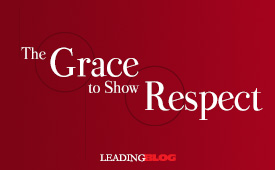

Posted by Michael McKinney at 02:51 PM
Permalink | Comments (0) | Personal Development
01.29.16

4 Rules for Getting Valuable Work Done
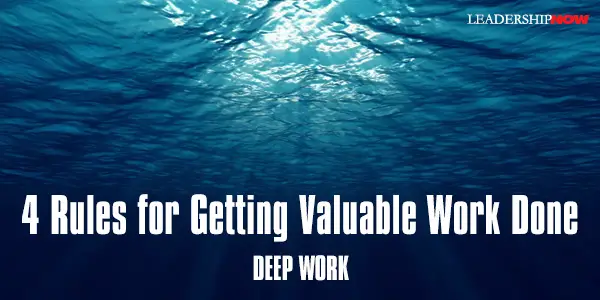
TO THRIVE IN the new economy—the current information economy—you need to master these two core abilities:
- The ability to quickly master hard things. (If you can't learn you can't thrive.)
- The ability to produce at an elite level, in terms of both quality and speed. (To produce tangible results that people value. What Seth Godin calls the ability to "ship.")
These two abilities depend on your ability to perform deep work.
Cal Newport bases his book Deep Work on the Deep Work Hypothesis : The ability to perform deep work is becoming increasingly rare at exactly the same time it is becoming increasingly valuable in our economy. As a consequence, the few who cultivate this skill, and then make it the core of their working life, will thrive.
Learning is an act of deep work. An act of intense focus. "To produce at a peak level you need to work for extended periods with full concentration on a single task free from distraction."
The reason deep work is rare is that we encourage distractions by the way we design our life. "An interruption, even if short, delays the total time required to complete a task by a significant fraction." Deep work is not a priority. We are what we focus on and that is increasingly, the superficial.
Shallow work adds to our sense of meaninglessness. Science writer Winifred Gallagher observed that "when you lose focus, your mind tends to fix on what could be wrong with your life instead of what's right." Newport adds: "A workday driven by the shallow, from a neurological perspective, is likely to be a draining and upsetting day, even if most of the shallow things that capture your attention seem harmless or fun."
To fight the drift into the superficial we need to cultivate some strategies to develop a deep work habit. Here are a few Newport suggests:
Find Your Deep Work Philosophy
Newport describes four approaches to making time for deep work. There is the Monastic approach that eliminates or radically minimizes shallow obligations. The Bimodal approach that suggests binging on deep work for various lengths of time. The Rhythmic approach makes deep work a habit by scheduling a regular chain of deep work in your day. The last approach and the one Newport prefers, is called the Journalistic approach. Using this approach you fit deep work wherever you can into your schedule. This last approach, however, requires a great deal of willpower and practice. The Rhythmic approach may work best to get you started.
Take Breaks from Focus
Make deep work a priority by taking breaks from focus, not from distraction. "The idea motivating this strategy is that use of a distracting service does not, by itself, reduce your brain's ability to focus. It's instead, the constant switching from low-stimuli/high-value activities to high-stimuli/low-value activities, at the slightest hint of boredom or cognitive challenge, that teaches your mind to never tolerate an absence of novelty."
Quit Social Media
Network tools such as Facebook, Twitter, Instagram and infotainment sites like Business Insider and Buzzfeed, "fragment our time and reduce our ability to concentrate." The overuse of social media unwittingly cripples our ability to succeed in the world of knowledge work. "To master the art of deep work, therefore, you must take back control of your time and attention from the many diversions that attempt to steal them." Newport recommends that we only use a tool if its positive impact on the core factors that determine our success and happiness, substantially outweigh it negative impacts.
If you give your mind something meaningful to do throughout all your waking hours, you'll end the day more fulfilled, and begin the next one more relaxed, than if you instead allow your mind to bathe for hours in semiconscious and unstructured Web surfing.
Be Intentional with Your Time
Have a plan for your day. Confine the shallow work you must do, don't eliminate it. If you start your day with blocks of deep work scheduled in, you stand a much better chance of actually getting some deep work done. "Your goal is not to stick to a given schedule at all costs; it's instead to maintain, at all times, a thoughtful say in what you're doing with your time going forward—even if those decisions are reworked again and again as the day unfolds."
"To succeed," writes Newport, "you have to produce the absolute best stuff you're capable of producing—a task that requires depth. A deep life is a good life."
![]()
![]() Like us on Instagram and Facebook for additional leadership and personal development ideas.
Like us on Instagram and Facebook for additional leadership and personal development ideas.

Posted by Michael McKinney at 08:54 AM
Permalink | Comments (0) | Personal Development
01.18.16

Now is the Time to Find Your Sweet Spot
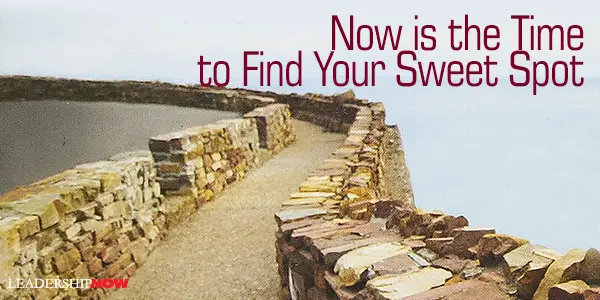
AS A TWENTY-SOMETHING, Paul Sohn said his life looked so good on paper. But a growing feeling of disappointment overwhelmed him. He wondered, "Is this all there is?"
He was experiencing a quarter-life crisis.

It can happen at any age especially when you get caught up in these five approaches that he identifies in Quarter-Life Calling: How to Find Your Sweet Spot in Your Twenties:
Fear and Anxiety: Instead of enjoying where you are at you allow the uncertainty of the world around you to overwhelm you with stress and a sense of trepidation.
The Choice Overload: We allow the choice we have to paralyze us. This is brought on "by a recent phenomenon called FOMO (Fear of Missing Out). Twentysomethings live in a 24/7 plugged-in culture. We live in an era where we are accosted by the incessant meals, vacations, parties, and sheer awesomeness people are experiencing—thanks to Facebook, Twitter, and Instagram. According to a new study by Eventbrite, 69 percent of millennials experience FOMO when they can't attend something that their family or friends are going to."
Too Busy to Slow Down: Are we doing the things we really should be doing? We are overscheduled, overworked and overcommitted.
The Obsessive Comparison Disorder: We can always find people who are doing better than us and we want what everyone else has. 'Millennial expert Paul Angone calls this Obsessive Comparison Disorder (OCD). He says, "OCD is the smallpox of our generation." This is an epidemic that is producing unwanted thoughts and feelings, driving us into depression, consumption, anxiety, and all-around discontent. The grass is not always greener on the other side.
The YOLO/FOMO Generation: You only live once. It's easy to get stuck in the moment. Social media encourages this thinking and the resulting drift into instant gratification and self-absorption.
Paul Sohn is talking to twenty-somethings but we all can learn from his experience. The context changes but the principles are the same.
The answer is to find your sweet spot—that place where you are living out your calling. Sohn says it is found at the intersection of your personality (who you are wired to be), gifts (that which you are naturally gifted in), passions (that which ignites a fire in your soul), and life story (what doors have opened and closed in your life). It is here that you will find your purpose that will lead you to a meaningful life.
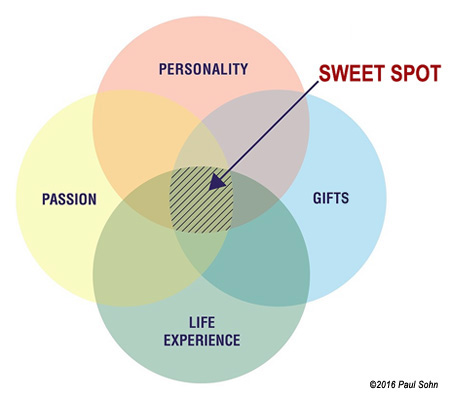
In a noisy world it is hard to slow down enough to know yourself. Finding your sweet-spot begins with getting outside of yourself—seeing yourself from another perspective. A meaningful life comes from something outside yourself. Sohn found that in the Bible. It allowed him to integrate his life around a concept outside of his present. It makes all the difference.
For twenty-somethings, Sohn says the key is to start well. Start early.
As a clinical psychologist who specializes in twentysomethings, Meg Jay [author of Defining Decade] has observed how twentysomethings have considered this time as a throwaway decade, paying the price, professionally, personally, spiritually, and economically later in life. This is the biggest myth out there. No more procrastination. No more wasting away your time, talent, and treasure believing you can make it up later in life.
Keep learning. Find mentors. Life isn't meant to be a rat-race. You were meant to flourish. Begin today.
![]()
![]() Like us on Instagram and Facebook for additional leadership and personal development ideas.
Like us on Instagram and Facebook for additional leadership and personal development ideas.

Posted by Michael McKinney at 10:33 PM
Permalink | Comments (0) | Personal Development
01.15.16

Finding Your 30-Second Anchoring Technique
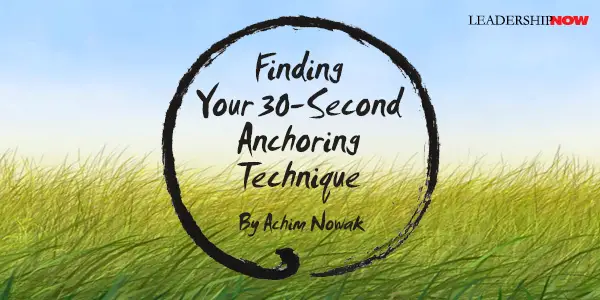
WE LIVE IN a hugely distracted world. Rush from one meeting to the next, have too many emails to answer on any given day. There are moments when it seems all we do is fly by the seat of our pants. Yes, every aspect of our work rhythms conspires to throw us off-center! Staying grounded feels like the impossible dream.
I used to train actors. Have you ever wondered how an actor manages to be in the right frame of mind when the camera says "action?" How she accomplishes this amidst the relentless hustle and bustle of a movie set? Actors study the art of being in the optimal state of mind. Well, you are the actor in your own life, and your life will unfold with more grace the moment you master some of the same skills. We tend to call them anchoring techniques.
Here are a few of my favorites. Beware – what works well for one person will not work as well for another. Part of your homework is to experiment and discover the technique that "does it" for you!
- Self-Talk:
Affirmations have become the stuff of satire. I just watched an episode of the TV show "Two Broke Girls" in which the heroines hurl affirmations at each other with a sarcastic sense of glee. Too bad. To the cynic, an affirmation may seem too good to be true. Truth is, when you find an affirmation that works for you, the result DOES feel too good to be true!
Here's a phrase I use when I'm about to enter a meeting and feel anxious (and being anxious is not helpful). When I feel tired (and showing up tired is not an option): I am a vibrant vehicle of light and love.
The three keywords – vibrant, light, love – are high energy words for me. They resonate deeply. If you haven't worked with self-talk before, this is what I want you to get:
This little phrase works for me, every time. It shifts my energy, every time. I repeat it to myself, quietly, for about 30 seconds. Combined with a few deep breaths, it activates the cellular energy within me and around me that I am seeking to access.
Do not use MY affirmation. Find the words that affirm YOUR highest good within you. Repeat them quietly. Instantly anchored!
- Sensory Reprogramming:
Mental worry tends to get us unhinged, and classic anchoring techniques shift us away from the mind, back into our optimal states of being.
If you're a highly visual person, see yourself in a physical place where you feel serene. Visualize the sensory details of this place. Calm will return quickly. If you're a highly auditory person, listen to a piece of music that soothes you or fires you up.
If you're a highly kinesthetic person, take a few conscious breaths and adjust your posture. If you're a spiritual person, saying a prayer or repeating a mantra will quickly reconnect you with your energy source.
This is common-sense stuff, but here's the conundrum. An anchoring technique, applied with quiet commitment, invokes a powerful inner shift within 30 seconds. When we're under pressure, the last thing we tend to think about is our anchoring technique. I urge you to discover the one or two techniques that "do it" for you, every time. Make them a daily habit.
And reap your anchoring rewards.

This post is by Achim Nowak. He is the author of The Moment: A Practical Guide to Creating a Mindful Life in a Distracted World. He is the president of Influens and an international authority on presence and interpersonal connection. Achim's work integrates a wealth of experience in the personal transformation field, actor training, conflict resolution, and spiritual practice. He has been featured on 60 Minutes, NPR, Fox News, and in the Miami Herald. His weekly Energy Boost message offers practical tools for creating an energized life and has a devoted following across the globe.
![]()
![]() Like us on Instagram and Facebook for additional leadership and personal development ideas.
Like us on Instagram and Facebook for additional leadership and personal development ideas.
Posted by Michael McKinney at 05:22 PM
Permalink | Comments (0) | Personal Development
11.05.15

What Gear Are You In Right Now?

"Wherever you are, be all there!" Jim Elliot's advice offers a difficult challenge. "You're here but your mind is somewhere else" is a common refrain.

Jeremie Kubicek and Steve Cockram, authors of 5 Gears: How to Be Present and Productive When There Is Never Enough Time, write "Every day, millions of people are negatively impacted by the inability of a person to connect appropriately and to be present." So much drama is created when we don't know how to shift gears and become present.
5 Gears offers an extremely valuable metaphor for identifying which gear you are in and finding the right gear at the right time in order to connect fully with others. The model is a relationship-driven approach. It is values-driven and helps to counteract self-absorption.
The majority of people are not aware of their social awkwardness and give little time to thinking about what gear the other person is in while they are talking.When a person's agenda is the driving force of their life, then they are going to run over people most of the time unless they learn to use their brakes and downshift.
What I like most about the 5 Gears model is first, it gives you language to communicate which gear you are in to yourself and others, and to understand where others are at so that you can be more fully present. Second, it helps you plan what gear you need to be in as you move through your day. And third, it helps to be more self-aware and other-aware.
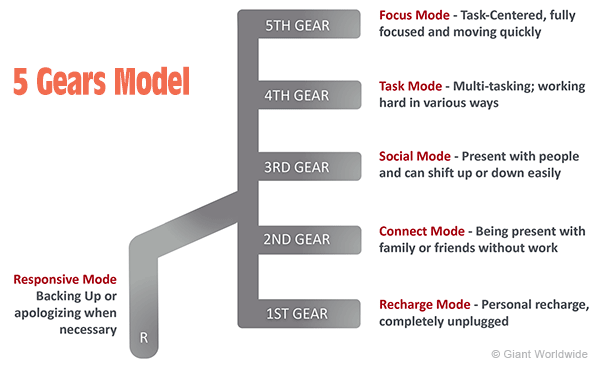
Like shifting gears in a car, there is a right order and a right time for each gear. Life goes more smoothly when you are shifting through the gears at the right time—and avoiding getting stuck in any one gear.
Here are the 5 Gears:

5th Gear: Learn to Get "In the Zone"
5th Gear is focus mode that allows us to "get in the zone" without interruption. It takes discipline to shut the door, turn off your email, and let people know that you are shifting into 5th gear, but it makes it possible to cruise at a sustained speed for a period of time. The caution is that when you get stuck in 5th gear you miss out on relationships, opportunities to add value, and events in life that matter in the long term.

4th Gear: Leading in a Task World
4th Gear is the task gear that allows us to work hard while also multitasking. Most of the time we operate in 4th Gear so we need to learn to use it well. Waking up in 4th Gear is not the best strategy for your life. Our tasks can begin to control our lives. (Do you normally check your e-mail when you first wake up?) We need to learn how to shift into it and how to shift out of it. They relate the observation of Elizabeth Paul as an example. How many of us are like this:
The personal story for me was realizing that as a woman I have "work" 4th and 5th gear and "domestic" 4th and 5th gear. I thought that because I was being disciplined about putting my devices away during the golden family window of 5 to 8 P.M. I wasn't in 4th or 5th gear, when in reality I was just putting on a different task hat. When my eyes were opened to that, I realized that I actually have little to no 3rd or 1st gear in my life at all. That was shocking.
In other words, the other gears are not just another 4th Gear task. Each Gear requires a different mindset or approach to your time. If we learn to implement the other gears in our life we will find that our everyday, multitasking 4th gear will become more productive.

3rd Gear: Why Being Social Matters
3rd Gear is the social gear. 3rd gear is a mindset. It is the space between task-driven, hyper focused work and the no-work, relational connection of being with your family, spouse, or close friend. Type-As need to remember that business happens in 3rd gear—in relationships. If you are too important for small talk, you might want to study the chapter on 3rd Gear. Of course you can get stuck in 3rd gear and overdo it. At the same time if you try to control social space it actually becomes a 4th Gear activity for you.

2nd Gear: Connecting Deeply
2nd Gear represents connecting with family, friends, or colleagues. Whether work colleagues, family, or friends, it is time geared toward relationship building without an agenda or pressure to be productive. Some of us have never really learned how to connect. It can't be forced. It requires making time and learning to truly give of yourself to others.
2nd Gear is a difficult gear to be in because we live in a 4th Gear world. Kubicek writes that while writing this book consumed a lot of time, energy and mental thought, "it is still my responsibility to be the leader worth following in my home. Even with the pressure of a deadline, I still have to practice shifting." He has found that being present in 2nd Gear leads to healthy relationships that bring peace to your mind and heart, fruitful growth between people, better conversations, likeability and trust, reestablished priorities, less drama and more security, social awareness and emotional intelligence.

1st Gear: Learn How To Recharge
1st Gear represents being fully recharged. Do you know how to recharge? "If you figure out what 1st Gear feels like for you and discipline yourself to spend more time there, more power will flow through you. If you live and lead out of 20 percent battery life then you will never experience what you hope to experience." The recharging gear if different for all of us. What works for one may not work for another. But we need to find what works for us. Think about this statement: "Working from your rest, not rest from your work, is the goal." Note to self: "Crashing is not resting; it is actually just crashing." It is simply stalling out. Truly healthy rest restores you.

Reverse: Learn How to Apologize
Reverse is the responsive gear. It is used when we need to back up and start again or apologize. Unfortunately, too many people operate without a reverse gear.
There are two types of people—responsive and resistant. You hire responsive ones and fire the resistant. Responsive people are self-aware and have a consciousness that is not steeped in victim mentality, but rather responsibility. They understand that they are responsible for their actions and will make amends when they have clearly overstepped their bounds. Responsive people are the best employees, and spouses, and children.Resistant people, on the other hand, are exhausting. Resistance is basically pride. Resistance will fight rather than resolve, blame rather than admit, and run away rather than run toward reconciliation.
Are there any relationships you need to restore?
Making the 5 Gears Work For You
After explaining the 5 gears, Kubicek and Cockram ask us to find our go-to gear. Where do we like to spend most of our time and what gear is the hardest for us to be in? Learning how to improve on your hardest gears hold the keys to improving your influence in the lives of others.
Next you need to find the right time for each gear as you go through your day. There is a natural time for gears. Your mornings should not start in 4th Gear. Really! When we are in the wrong gear at the wrong time we create disconnects. Shifting well is both an art and a science. 5 Gears offers some practical examples of leading your life intentionally and in the right gear at the right time.
I know this post is getting long, but let me leave you with an example of integrating the 5 Gears into your daily schedule:
6A.M.—Wake Time: 1st Gear
7A.M.—Drive Time: 1st or 4th Gear
8A.M.—Work Time: 4th or 5th Gear
12 Noon—Lunchtime: 3rd or 1st Gear
1P.M.—Work Time: 4th or 5th Gear
5P.M.—Drive Time: 4th or 1st Gear
6P.M.—Dinner Time: 2nd or 3rd Gear
8P.M.—Social Time: 3rd or 2nd or 1st Gear
10P.M.—Bedtime: 1st Gear
![]()
![]() Like us on Instagram and Facebook for additional leadership and personal development ideas.
Like us on Instagram and Facebook for additional leadership and personal development ideas.
Posted by Michael McKinney at 11:28 AM
Permalink | Comments (0) | Human Resources , Personal Development
10.28.15

Triggers: Do You Underestimate the World You Live In?
NO MATTER HOW HARD WE TRY, our environment affects us in powerful, insidious, and mysterious ways. Our environment triggers behaviors or responses in us.
Marshall Goldsmith explains in Triggers the kinds of things in our environment that derail us from becoming the kind of leader, co-worker, parent, or spouse that we want to be. He illuminates an aspect of self-awareness that is so vital to a leader's success.
We can't control our environment, but we can control our responses. We always have a choice.
When it comes to interpersonal behavior we can't rely on habits to help us. "We must be adaptable, not habitual—because the stakes are so much higher." We need something more to help us deal with the uncertainty of our day.
When it comes to triggers, it's not the big triggers that usually do us in, it is the little moments in life that trigger our most outsized and unproductive responses. They trigger some of our basest impulses. Especially with the people we know and love the most. "We can say and do anything with these folks. They know us. They'll forgive us. We don't have to edit ourselves. We can be true to our impulses. That's how our closes relationships often become trigger festivals with consequences that we rarely see in any other part of our lives—the fuming and shouting, the fights and slammed doors, the angry departures and refusals to talk to each other for months, years, decades."
So where the problem is most vivid is in the small, minor moments of the day, when we are not thinking about our environment or our behavior. That's when we need to be most vigilant.
Sometimes the best strategy is to avoid the trigger altogether. Stop flirting with those things that tempt you. Goldsmith says that one of the most common behavioral issues among leaders is "succumbing to the temptation to exercise power when they would be better off showing restraint." And that behavior is very hard to eliminate because those who engage in it because they no doubt enjoy doing it.
But we can't always walk away.
SOLUTION
The solution then isn't trying to fix the environment or the behavior of others, the solution is to change our behavior. When we are triggered we need to adjust.
Goldsmith has found that asking yourself some active questions works magic. Active questions get to personal responsibility—something you have control over. Goldsmith suggests six engaging questions anyone should be asking themselves each day to build engagement:
Did I do my best to set clear goals today?
Did I do my best to make progress toward my goals today?
Did I do my best to find meaning today?
Did I do my best to be happy today?
Did I do my best to build positive relationships today?
Did I do my best to be fully engaged today?
In addition, Goldsmith has a number of other Daily Questions he asks himself to gauge whether he had taken responsibility for his own life. Our own questions would reflect those things that we want to work on—will success on these items help me become the person I want to be?
Did I do my best to have a healthy diet?
Did I do my best to be a good spouse?
Did I do my best to add value to ______?
Did I do my best to learn something new?
Did I do my best to get a good night's sleep?
Did I do my best to not prove how right I am when it's not really worth it?
You score yourself on a scale from 1 to 10 to track your progress or the lack of it. "One of the underappreciated benefits of the Daily Questions is that they force us to quantify an unfamiliar data point: Our level of trying. We rarely do that."
Daily Questions remind us that success is the result of small efforts repeated consistently over time. Daily Questions can be a game changer because they reinforce our commitment, they ignite our motivation where we need it and not where we don't, and they shrink our goals into manageable increments.
OUR NEED FOR STRUCTURE
The Daily Questions provide structure in our lives. Simply put, Goldsmith says: "We do not get better without structure." Like rules, structure pushes us in the right direction when our first impulse is to go the other way.
Goldsmith has work with Alan Mulally and finds that "no idea looms bigger in Alan's mind than the importance of structure in turning around and organization and its people." Goldsmith explains how Mulally integrated the Daily Questions process in his weekly Business Plan Review meetings with his sixteen top executives. And repetition was key. "In the same way that Daily Questions drive us to measure our effort every day and then face the reality of our own behavior, the executives would be announcing how they graded themselves every Thursday—without deviation." And in the group setting the idea was: How can we help one another more?
Structure "limits our options so that we're not thrown off course by externalities….Imposing structure on parts of our day is how we seize control of our otherwise unruly environment."
Goldsmith points out that after a hard, decision-filled day we become depleted . Our discipline and decisiveness fade at the end of the day to the point where we want to do nothing or fill our time with mindless activities.
Deletion isn't something that we are always aware of but we should anticipate it and create structure where we can. "If we provide ourselves with enough structure, we don't need discipline. The structure provides it for us. We can't structure everything obviously—no environment is that cooperative." But the more structure we have the less we have to worry about.
ANTICIPATE
When you know you are headed into a pointless meeting, imagine that you are going to be tested on your behavior:
Did I do my best to be happy?
Did I do my best to find meaning?
Did I do my best to build positive relationships?
Did I do my best to be fully engaged?
Sometimes we think we have to show everyone how we feel but that's ego talking. "Why waste that hour being disengaged and cynical?" asks Goldsmith.
It's in the moment that we shape ourselves into a better person. Sometimes hourly questions might help. When we face an event were not up for or a person that usually throws us off our game, why not try setting our Smartphone to ask us a question like, "Am I doing my best to…?"
THE BEST PART
What I like best about Triggers is that by creating an awareness of our environment and identifying our own triggers we can be a force for adding value in other people's lives by triggering something good in others. It requires our imagination and clarity about what we want to become.
When we dive all the way into adult behavioral change—with 100 percent focus and energy—we become an irresistible force rather than the proverbial immovable object. We begin to change our environment rather than be hanged by it. The people around us sense this. We have become the trigger.
Like us on Facebook for additional leadership and personal development ideas.
Of Related Interest:
Goldsmith's Gold: You Are Under the Microscope
Posted by Michael McKinney at 12:19 AM
Permalink | Comments (0) | Personal Development
10.26.15

When to Cooperate and When to Compete
As we navigate through life, we must be able to cooperate and compete. Knowing what to do when is very important to getting where you want to go and to where you want to go next time.
In Friend and Foe, authors Adam Galinsky and Maurice Schweitzer, state that all of our relationships are both cooperative and competitive and we get more out of life when we learn to find the right balance between acting as a friend and acting as a foe.
Drawing on interdisciplinary studies, they show how to manage social comparisons (We crave comparisons because we like to know how we're doing compared to the people around us.), get and keep power, how to get others to put their trust in you and what to do when you lose it, the art of seeking another perspective, negotiating, when it's best to go last and when it's best to go first, and finishing every interaction well.
When it comes to power, it's not so much how powerful we are, but how powerful we feel that determines how think and act. Whether you have it or feel it, power makes us more focused on our own vantage point and oblivious to the perspective of others. The key to keeping our power is being able to see the world through the perspectives of others.
There is an acceptable range of power that you can display relative to your actual power. Exceed it and you will be ostracized. You also need to find the right balance between being confident and deferential. It's usually a lack of deference rather than excess of confidence that get powerful people into trouble.
Interestingly, they say we crave hierarchy because it helps to manage the tension between cooperation and in competition.
Hierarchy provides a means for solving the question of how we distribute scarce resources. It also facilitates coordination. Studies demonstrate that co-leadership usually doesn't work. "Co-leadership can kill both ideas and people, because it creates uncertainty over who is really in charge. Of course, co-led teams are not always ineffective and dangerous. But when there is not clear division of labor among these leaders, coordination becomes difficult, patterns of deference can disappear, and conflict can erupt."
Hierarchy is less useful the more human the task or the more cognitively complex—more thought than any one person can attend to. Why? "Because to make the best complex decisions, we need to tap ideas from all the rungs of the hierarchical ladder and learn from everyone who has relevant knowledge to share." Steve Jobs said, "You have to run by ideas, not hierarchy."
But here is an interesting find. When over 30,000 Himalayan mountain climbers were analyzed, they found that members of expeditions from more hierarchical countries were more likely to die on the expedition because in countries and cultures that are hierarchical, decision-making tends to be a top-down process. These expedition members are less likely to speak up and less likely to alert leaders to changing conditions and impending problems.
They say that asking for advice does more than turn adversaries into advocates. "It can also help you supercharge your advocates and lead them to help you climb up the corporate ladder." And when you don't take their advice you need to explain that even though you didn't take their advice it gave you a unique perspective and insight that lead to your success. Always follow up with your advice givers.
Friend and Foe is a very interesting read and full of useful advice and insights to help you get along and get ahead. It will go a long way to developing the awareness that is essential to leadership.
No matter what happens, it your interaction ends well people will tend to remember it well. More importantly, it sets the stage for anything that comes next.
Like us on Facebook for additional leadership and personal development ideas.
Posted by Michael McKinney at 07:42 AM
Permalink | Comments (0) | Personal Development
08.26.15

What Are Your Hidden Strengths?
Your strengths will get you in the door, but to make progress you are going to have to become more of who you are and draw on your hidden strengths.
Hidden strengths are not weaknesses. They are capacities you have that have yet to be recognized, developed and utilized. They become your Learned Strengths.
Your strengths and weaknesses need to be managed. Strengths need to be managed so that they are not overused or overbearing. Weaknesses need to be managed so that they don't derail you. Often they can be delegated. But the area between the two—your hidden strengths—not only provide a deep pool of strengths to draw on but they will help you to smooth out your rough edges and bring into balance your natural strengths.
Hidden Strengths, authors Thuy and Milo Sindell have identified 28 skills in four categories and made available a free Hidden Strengths Assessment at HiddenStrengths.com. The four categories are: Leading Self, Leading Others, Leading the Organization, and Leading Implementation.
Once you have identified your hidden strengths you can identify areas to focus on developing that would nullify a weakness or contribute to your success without directly attacking areas where you struggle. For example, Barry lacked emotional control and it was hurting his leadership capacity. He did have hidden strengths in the areas of resilience and flexibility. So instead of attacking his weakness, he developed his resilience and flexibility. In doing so he did not get so fired up that he lost control of his emotions. The authors note that "if he prepared ahead of time for meetings by formulating his ideas and alternatives, it make him more flexible when he listened to others' ideas, and everyone would feel heard and understood."
You are more than what naturally comes to you. There is much more that can be developed. "With awareness and dedication, you can leverage these Hidden Strengths to continually reach new levels of performance and success."
Like us on Facebook for additional leadership and personal development ideas.
Posted by Michael McKinney at 10:54 PM
Permalink | Comments (0) | Personal Development
07.24.15

You Can't Lead If You're in the Weeds
Leaders work on a spectrum of effectiveness and the continuum varies with the ups and downs of your work's natural rhythms. When you are in a good place, with available margin to deal with your load, you take a balanced approach to meeting your demands, use your strengths wisely, and sustain the capacity to manage well against the challenges of the day. Let's call this the Performance Zone, which is the place you need to be.
As you confront our day-to-day demands from this place, you are more likely to be: response-driven, multidimensional, flexible, proactive, and engaged. However, when your margin runs low and the inverse equation of shrinking resources and increasing demands stresses our capacity to the breaking point, the strain can tilt you away from the Performance Zone and push you out into the weeds toward the Danger Zone. In this overwhelmed place, it's easy to get into a reactionary mode where priorities get blurred by the fatigue of doing more with less.
The bottom line is that you can't lead if you're lost. To know whether your demands are pushing you out of the Performance Zone, consider each of the following questions and answer with either "Yes" or "No" depending on whether the statement is true for you:
- Have the demands on you increased over the past several months?
- Are they likely to stay elevated and/or continue rising?
- If your demands have increased, have you gained enough additional time, energy, resources, and focus to adequately address them?
If you answered "Yes," "Yes," and "No" to these questions then you are tilting toward the Danger Zone and at risk of getting stuck in what I call The Manager's Dilemma. To know if you're already stuck in the dilemma's grip, listen to the way you talk about your own work. The emergence of paradoxical statements like the following is the first sign that the manager's dilemma is settling into your atmosphere:
- "I can't afford to relax because things are too busy right now."
- "With so many deadlines and demands, some priorities will have to be sacrificed."
- "It's too crazy now; I'll focus better once things settle down."
From the outside looking in, you can see how backward statements like these actually are. If a friend said something like this to you, it would be easy to point out the flaw in their logic and show them how the undoubtedly counterproductive behaviors stemming from these attitudes will leave them more deeply entrenched in their dilemma. However, when it comes to our own situations, we're too close to and too tangled up in them to maintain this level of objectivity.
When we are stuck in our own dilemmas, we somehow start believing that this is how work has to be. Over time, the cumulative effect of this way of thinking and working leaves us feeling like there is truly no way out. What was easy is now difficult. What was enjoyable is now unsatisfying. What used to give us a sense of purpose now seems unimportant.
The good news is that you can get yourself out of the weeds and back on track – even when you cannot change the responsibilities you face. It turns out that the dilemma's triggers are swinging doors and within each one there is an alternative path that acts as an escape hatch. To exit the dilemma, you have to go out the way you came in:
- It turns us around and distorts our values and goals, so determine your line of sight to focus on the right priorities.
- It spins our wheels, causing extra effort with less effectiveness, so distinguish your contribution to make a deeper impact.
- It punctures leaks in our already fragile time, energy, resources, and focus, so plug the leaks to restore your capacity.
- It limits our ability to use everyday obstacles for good, so convert your challenges to fuel and turn the tables on the dilemma.
Together, these four drivers and related responses can change the way you work.
Jesse Sostrin is the author of The Manager's Dilemma. He writes and speaks at the intersection of individual and organizational success. Follow him @jessesostrin.
Like us on Facebook for additional leadership and personal development ideas.
Posted by Michael McKinney at 01:57 AM
Permalink | Comments (0) | Personal Development
07.20.15

Is it Time to Disrupt You?
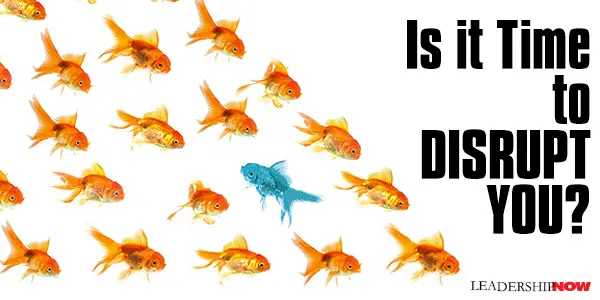
"I was presenting myself to the world as an out-of-shape, intimidated middle-aged man. That needed to change," writes Jay Samit.
Disruption can be a powerful and positive force. If we are to work with and take advantage of the disruptions in the world around us, we must be willing to disrupt ourselves.
All disruption, says Samit in Disrupt You!, begins with introspection. After an early failure, he began a process of self-disruption. "I analyzed all the pieces that came together to form my identity. I began to define what unique experiences and knowledge I had that would set me apart from my peers. I thought about the way I made decisions, how I processed and responded to information, how I approached problems. I thought about the way I presented myself to the world and how I communicated my abilities to potential business partners and clients. And I thought about how I was sending my time and energy. If I was going to find opportunities to make a name for myself in the world, I was going to have to change something in my approach."
This a lot to tackle, but it is a process we all need to face. It can be very difficult to confront our assumptions about ourselves and the world around us to create a reimagined self. It is difficult to upend what we have built—our identity and approach—in exchange for a better future. It's unknown. We are often more comfortable with what we have always done—even if it is not working for us—than we are moving into unchartered territory.
Like any business we also have a value chain—our identities. Any or all of these links may need to be disrupted. You might think of research and development like the way we interpret the world. Where do I thrive? What kind of people do I work with best? What do I believe about myself that might not be true?
Production and design are the ways in which you respond to problems. Do I tackle problems with an open mind, thinking holistically? Your reactions to disruptions in your environment will depend on your mindset.
The next link relates to how you market and sell your potential. Not what you have done, but what you can do. Success says Samit, is about defining your future. About his own marketing and sales links he writes:
We market and sell ourselves in the ways we present ourselves to the world, which are based on what we see as our personal strengths or limitations. We distribute ourselves in the ways we choose to spend our time and where we focus our energies. When viewed from this framework, the process of self-transformation becomes approachable: you need only analyze each link in your internal value chain and find the single link that's holding you back. Then make changes to that link to disrupt yourself.
Finally, distribution is how we spend your time and where we direct our focus. Do I devote my time and energy to achieving my dreams, or am I surfing the Internet every evening? Our time and energy is a valuable resource, we must distribute it wisely.
Self-disruption is about making deliberate choices rather than running on autopilot. It's about making preemptive moves rather than just being a pawn in a game.
Samit provides Disruptor's Map in each of these areas to help you begin disrupting yourself before you are disrupted. Consider where you are and where you want to be. And don't forget to ask yourself what you want to do along the way personally and professionally. Both are critical areas to consider.
Self-disruption can prepare us for the future and the disruptions it will bring.
Every disruption brings about opportunities. By analyzing the value chain you can find new ways to capture value. "The real challenge," says Samit, "is for each of us to determine where we feel we can make the most impact."
![]()
![]() Like us on Instagram and Facebook for additional leadership and personal development ideas.
Like us on Instagram and Facebook for additional leadership and personal development ideas.
![]()
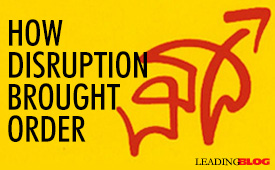
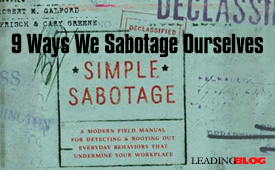
Posted by Michael McKinney at 06:17 AM
Permalink | Comments (0) | Personal Development
07.14.15

Why You're Not Achieving Your Goals
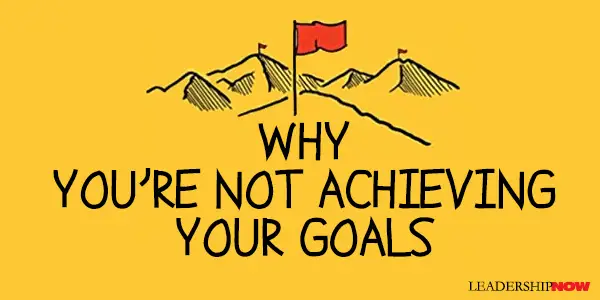
BERNARD ROTH, one of the founders of the multi-disciplinary d.school at Stanford University, has written a book titled, The Achievement Habit. However, it is much more than the title might let on.
It's about how you can achieve your goals more fully and faster by expanding your limited view of reality. It's about design thinking applied to every aspect of your life. It's about assisting us to break through the walls that are mostly of our own making.
You Give Everything Its Meaning
Roth begins by reminding us that nothing has any meaning except for the meaning that we give it. "Stop labeling things in their usual way. Make the familiar into the unfamiliar, and the result can be amazing and delightful, as opposed to dull, nonfunctional, and ordinary." Along these same lines, this applies to our need to be right . "Next time you find yourself playing right and wrong, remember: You give everything in your life its meaning, so you can choose to end the game. It does not matter how right you are or how wrong they are; you lose just by playing." You have the power to change your attitude and therefore, how you will play the game.
Reasons Are Excuses
And then there are all the reasons we have for why something is or isn't happening. They're really just excuses prettied up says Roth. He was chronically late until he decided to stop coming up with reasons and deal with the real issue. Here's the key point: We use reasons "to hide shortcomings from ourselves. When we stop using reasons to justify ourselves, we increase our chances of changing behavior, gaining a realistic self-image, and living a more satisfying and productive life." In other words, we take responsibility for our life.
We often get stuck because we are working on the wrong issue. We have some faulty assumptions. "Experience has shown me that one of the main causes of losing sleep over a problem is that we think we are dealing with a question when in fact we are dealing with an answer (a solution) that turns out not to be a good fit to our actual problem." Letting go of the problem is often the best solution. Roth shows you how to rework your question to find the actual issue.
At the d.school there is a bias toward action. Failure is part of the expected result. In reaching our goals we also need to watch our language because it influences the way we see things (and the way others see us too). The word but creates conflict. Using the word and opens up the conversation. Change "I have to" to "I want to." It clarifies the fact that we have a choice in the matter.
Don't Interrupt
Here's a ego taxing communication tip: Don't interrupt. "Many people interrupt because they have something that they are afraid they might forget or that it will not be relevant later. The best thing to do is to let it go. If it is still appropriate at the end, say it then. If it gets lost and remains unspoken—no matter how brilliant it would have been—the world will not notice."
Flat Organization
Roth describes the flat organization of the d.school over the last forty years. Why and how it works. With a common goal and purpose, I think what Roth describes is possible: "We operated by consensus and negotiation, almost never voting on anything. There was almost no acrimony, and people treated each other with respect, collegiality, and a spirit of shared purpose and commitment." "We were all in charge, and we wanted to make it work." If you can overcome your biases, "you might find a management structure that strongly supports what you want to accomplish."
Many more topics from designing workspaces to self-image are discussed. All of it valuable. Each concept is followed by a "Your Turn" section to give you tools and techniques to apply these ideas to your own situation.
When you hold yourself in high esteem and keep a positive outlook on your future, others will usually follow suit. By choosing the meaning we give to people and things in our environment, ultimately we control our own experiences, no matter what work we are doing.
 | The Achievement Habit is a book about life. How to design your life and leadership through design thinking. Stop wishing, start doing, and take command of your life. |
![]()
![]() Like us on Instagram and Facebook for additional leadership and personal development ideas.
Like us on Instagram and Facebook for additional leadership and personal development ideas.

Posted by Michael McKinney at 09:44 PM
Permalink | Comments (0) | Creativity & Innovation , Personal Development
06.03.15

Five Habits of Top Athletes We Can Take To the Workplace
This is a post by Dr. Greg Wells author of Superbodies: Peak Performance Secrets From the World's Best Athletes Wells is a scientist who specializes in extreme human physiology, draws the parallels between elite athletes and top executives to help business leaders perform at the highest level, even when under the most extreme circumstances.
An athlete steps up to the starting blocks in the Olympic stadium. They stand tall, take a few deep breaths, and shake out their muscles. Thousands of people cheer while they are introduced, but their eyes never waver from the lane they're about to run down. When the gun goes off, they explode into high performance action.
How can we apply this scenario to a business situation? The same techniques that athletes use to perform under pressure allow business leaders to excel in the workplace. Here are five top practices that will improve your health and performance both at the office.
1. The Power Pose. Before competition, athletes often stand tall with their shoulders back and head up. Adopting certain postures improve performance by changing the levels of hormones in your body. Recent research by Dr. Amy Cuddy from the Harvard Business School has shown that adopting a "Power Pose" increases testosterone levels, which is a repair and regenerate hormone, and lowers cortisol, which is a stress hormone.
2. Relaxation Breathing. Stress and tension undermine performance and contribute to the development of chronic, stress-related illnesses. Taking a few deep relaxing breaths and exhaling slowly can dramatically change your psychological state and boost performance. Pause and take a few deep relaxing breaths to regain control of both body and mind.
3. Focus. In sports, it's obvious that staying focused is critical for success. Physiological science tells us that humans simply can't focus on multiple things at the same time. We live in the age of distraction, bombarded by emails, social media and text messages all day long. To perform at your best, it is critical to find time each day to focus exclusively on only the most important projects and tasks.
4. Hydrate properly. Athletes know how fundamental water is to their performance. A dehydrated body and brain are sluggish on the track and in the office. Caffeine is great in moderation – one or two cups of coffee per day, ideally 30 minutes before a mental energy boost is required. Other than that, it's water all the way to maintain focus and stamina. And plenty of it.
5. Be 1% Better. An athlete who delivers an incredible performance in the playoffs is showing the result of thousands of hours of practice. We can do the same thing with our food, sleep, exercise, thinking and work. Strive to be 1% better each day. A 1% change might not seem like much, but those small daily improvements amplify your life. It's like earning compound interest for your body and mind.
We can all learn from elite performers in any discipline, even areas quite different from our own. Do you have any techniques that you use to perform at your absolute best?
Dr. Greg Wells is an assistant professor in kinesiology at the University of Toronto and an associate scientist in physiology and experimental medicine at the Hospital for Sick Children. You can follow him on Twitter at @drgregwells or visit his website at drgregwells.com.
Posted by Michael McKinney at 01:41 PM
Permalink | Comments (0) | Personal Development
05.05.15

Return on Character
We live in an age where wisdom is only wisdom if it is supported by numbers.
There are two obvious problems with this. First, we miss a lot because we are looking for immediate return. And so it puts our focus on the wrong things. And secondly, as a result, we tend to assign value to things in terms of numbers. It is assumed that if it gives us the best numbers, it must be the best choice or behavior. Nevertheless, it is satisfying when the numbers do add up.
In Return on Character, Fred Kiel has put numbers to the notion that good leadership aimed at promoting the common good, not just individual, winner-take-all acquisition can be good business.
In a seven year study of 121 CEOs they found that highly principled CEOs— Virtuoso CEOs —achieved nearly five times the return on assets that leaders whose character scores were the lowest— Self-Focused CEOs —in the study. Also encouraging is the fact that people demonstrate character through habitual behaviors and therefore anyone can learn habits of good character an unlearn habits of poor character.
Character is defined in this study as "an individual's unique combination of internalized beliefs and moral habits that motivate and shape how that individual relates to others." Our character is what we believe. Despite what we say. Our leadership is what we what we do for (or to) others as a result of what we believe.
To assess character traits Kiel defined four keystone characters traits that supported that definition: integrity (telling the truth, acting consistently), responsibility (admitting mistakes, concern for common good), forgiveness (letting go of mistakes of others and ourselves, focusing on what's right) and compassion (empathizing with and empowering others, caring for others, committed to others' development).
Not surprisingly, self-awareness is a key issue in character development. The Virtuoso leaders rated themselves quite accurately. However, the Self-Focused leaders rated themselves as high as the Virtuoso leaders. Clearly, we have issues seeing ourselves as we are.
Perhaps the most important fact revealed by these interviews was whether the leaders knew their life story. Could they provide a coherent narrative about their past, touching on a number of major events, both positive and negative, and including a reasonable description of the effect those events had on their personal development?The Self-focused leaders seem to have had very little opportunity to construct a meaningful platform of beliefs or principles.
As a result, they lack the foundation of supportive relationships, character habits, self-awareness, and mental complexity upon which to build the kind of character-driven leadership that reliably contributes to sound decision making and strong, sustainable business results.
Virtuoso leaders also had the disciplined decision making skills that resulted in clearer organizational vision, more focused strategies, a higher-performing executive team, and a stronger culture of accountability.
The good news is we can all improve our character—even Virtuoso leaders. Kiel outlines six steps in the personal change process. Step one is probably the most difficult and the key to the whole process.
Step 1: Acknowledge Invitations to Change. "Being confronted with an undeniable truth about the way others perceive our behavior and character is a gift."And that usually doesn't come in the form we would want it. (If there is such a way!) "No matter what their source, all invitations to change share one thing in common: they make you aware that your current understanding of the world is inadequate, that you have encountered the limits of your level of personal integration. Your existing worldview, your level of mental complexity, or your ability to act in a way that reflects your core values and principles is no longer working, and you have to find a new way forward."
Step 2: Discover What You Want to Change. Understanding exactly what habit you need to change is not always apparent. It requires some self-examination and quite possibly some outside help for some additional feedback.
Step 3: Find the Fuel for Change. The resolve to make changes is made easier if you connect it to a visionary goal. "I want to be thought of as…" What result do you desire?
Step 4: Identify the Keystone Change. What change will contribute the most to your character development? Often a single new habit will bring about other positive character adjustments.
Step 5: Disarm Your Security System. Any change will make you uncomfortable. You have to be okay with that. Disarming your brain's instinctive resistance to change "requires that you face the assumptions that rigger your unwanted responses and behaviors and the true outcomes they produce for you." Create an action plan. "I will do this when…" This help you to avoid your automatic responses you are trying to change.
Step 6: Rewire Your Brain. As your new patterns of behavior seem secure, celebrate your progress.
It is not easy to become a Virtuoso leader in a world looking for loopholes. But Return on Character demonstrates that the payoff is there.
Like us on Facebook for additional leadership and personal development ideas.
Posted by Michael McKinney at 01:00 PM
Permalink | Comments (0) | Personal Development
03.03.15

The 5 Habits of Mind that Self-Made Billionaires Possess
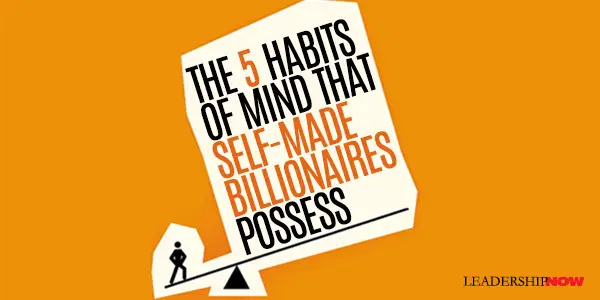
SELF-MADE billionaires think differently than most of us do.
Most of us think like what authors John Sviokla and Mitch Cohen call Performers because their success is tracked through performance. They excel at optimizing within known systems. They strive to excel in well-defined areas, and are important to any organization – in fact, they are important to the self-made billionaire.
Self-made billionaires have what the authors call the Producer mind-set. They thrive in uncertainty. Producers are critical to any company looking to create massive value because they redefine what's possible, rather than simply meeting preexisting goals and standards. Combining sound judgment with imaginative vision, Producers think up entirely new products, services, strategies, and business models.

For The Self-Made Billionaire Effect, they interviewed 120 billionaires and found that they had in common five habits of mind. What is interesting is that most organizations weed out the very people that they need to create massive value. Imagine what Atari might have achieved if Steve Jobs had stayed there to develop the first mass market personal computer.
Self-made billionaires are able to integrate ideas and actions that most individuals and organizations keep separate or even hold in direct tension to one another. Self-made billionaires effectively operate in a world of dualities—they seamlessly hold on to multiple ideas, multiple perspectives, and multiple scales. Here are the five critical dualities that they observed with additional thoughts on each:
Empathetic Imagination
Producers billion-dollar ideas come through the marriage of extreme empathy for the customer's needs and wants, and an imaginative mind-set that allows him or her to come up with and explore new, untested ideas.
Focusing on the competencies of today is exactly what causes companies to get stuck in the markets they serve and the products they deliver now, with little eye for the shifts and innovation they will need for tomorrow. Sometimes it takes a slight twist in perspective to see opportunities through a different lens.Steve Case said that his experience at Williams College—a top liberal arts college—was a kind of laboratory for imaginative thinking. "Liberal arts education is important particularly in a world that's changing rapidly, because there is a lot of fluidity. There's the melding of different perspectives, having a sense of things and having a sense of how to learn about things and to look for connections."
Patient Urgency
Producers urgently prepare to seize an opportunity but patiently wait for that opportunity to fully emerge.
Producers are willing to operate simultaneously at multiple speeds and time frames.Patient time spent waiting for an idea to mature is not the same as idle time. They'll wait for the time to be right, but they will prepare relentlessly so that they are ready to jump on the opportunity when it arrives.
They don't go off track planning for the next stage before they have capitalized on the present.
Inventive Execution
Producers approach execution of their ideas with the same integrative, inventive mind-set they applied to come up with a billion-dollar idea in the first place. Inventive freedom allows them to design aspects of the customer experience that outsiders consider fixed, thus unlocking new value.
Producers frequently operate in markets that require them to rethink the fundamentals of product or business design in order to deliver at scale.
Taking a Relative View of Risk
Self-made billionaires are not huge risk-takers. Their perceptions of risks are relative: they are far less concerned about losing what they have than of not being part of a bigger future.
What Producers are not willing to risk is the chance to capture an opportunity. This dynamic creates a critical duality between the right kind of risk and the resilience needed to do it all over again when the original plan doesn't work out.They invest bog, but they often have a parallel spring of income or safe source of cash they can count on to keep them solvent while they work the more exciting high-stakes opportunities.
Leadership Partnership
Producer overwhelmingly do not go it alone. Creating billions in value requires both a master Producer, who can bring together divergent ideas and resources into a blockbuster product design, and a virtuoso Performer, who can apply his or her creative acumen to optimizing the potential of that design.
Creating billions in value requires both: the Producer's ability to bring together divergent ideas and resources into a blockbuster concept and inventive design, and the Performer's ability to follow through on details needed to make the business work.
Why don't organizations hold on to extraordinarily talented people? These Producers?
Here's the thing: while we can all get behind these attitudes of mind, organizationally we don't generally reward these traits. We recognize and reward Performers. They get the raises and promotions largely because they're easy to recognize. They fit in; they can hit the ground running. Producers on the other hand don't always fit because they think differently from those around them. "The ideas they propose move against the standard approach you are following, and that friction is what you need to achieve breakthrough value." That makes us uncomfortable. As a result, we tend to drive Producers away or cause them to just give up.
We need both types, but when looking for new employees we need to look for more people whose background hints at looking at things differently. People who have started something new. People with the raw imagination to see something new and the fortitude necessary to work through the difficulty of execution.
"The key imperative for management is to differentiate between opportunities that need a Performer and those that need a Producer. Look at areas of achievement for the business and at who did the work. When it is a Producer, recognize that and give that Producer her next Producer-appropriate challenge."
As leaders we need to accept both Producers and Performers and reject neither. We need to find and support positive deviance while promoting for systematic improvement.
![]()
![]() Like us on Instagram and Facebook for additional leadership and personal development ideas.
Like us on Instagram and Facebook for additional leadership and personal development ideas.

Posted by Michael McKinney at 11:30 PM
Permalink | Comments (0) | Human Resources , Management , Personal Development
12.29.14

The 5 Choices to Extraordinary Productivity
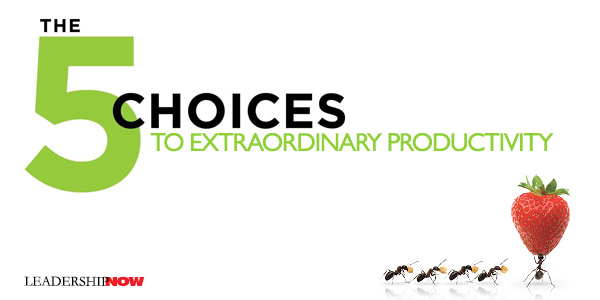
The 5 Choices is a nuts and bolts solution to greater productivity.
Ironically, while we live in a time of unprecedented opportunity, we spend almost half—40%—of our time attention and energy on unimportant or irrelevant activities almost insuring that we miss the possibilities all around us. Not only does that leave us feeling empty, but we end the day uncertain that we've accomplished what we needed to, worry about things left undone, and end up dreading the day ahead.
The authors, Kory Kogon, Adam Merrill, and Leena Rinne, say that the biggest hidden cost in our organizations is people spending their time, attention, and energy on things that don't drive your most important results.
To improve the situation we have five choices to make in three areas: Decision Management, Attention Management, and Energy Management.
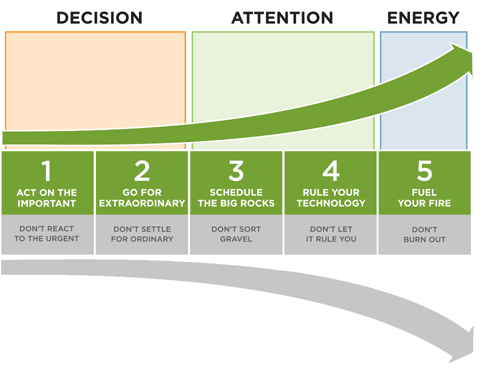
The 5 Choices are:
![]() Choice 1: Act on the Important, Don't React to the Urgent
Choice 1: Act on the Important, Don't React to the Urgent
What is my return on this moment? This is really the foundational choice to make. "In today's world, we can't just go on the 'I have a busy life' autopilot and expect to end up where we want to be." The authors have offered a Time Matrix model to help us make good decisions about where we spend our time, attention, and energy. Too often we get caught up in Quadrant 4 spending time (or too much time) on the trivial things that contribute nothing to our life.
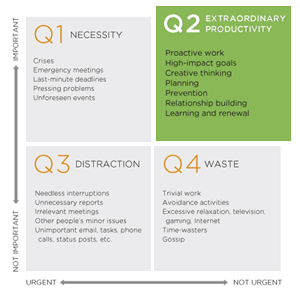 Q1: The Quadrant of Necessity. "These are things that need to be done now and, if not done, could have serious consequences.
Q1: The Quadrant of Necessity. "These are things that need to be done now and, if not done, could have serious consequences.
Q3: The Quadrant of Distraction. These are activities marked as urgent that feel like they need to be done now, but there are no serious consequences if you don't do them. "Many people spend a lot of time in Q3 thinking they're in Q1. However, they're just reacting to everything coming their way. They are confusing motion with progress, action with accomplishment."
Q4: The Quadrant of Waste. These are activities that are neither urgent nor important. When we get burned out we often go here for escape. "When we spend a lot of time in Q4, we feel lethargic and aimless. If we stay too long, we can experience depression and even despair."
Q2: The Quadrant of Extraordinary Productivity. These are that activities that will make a real difference in terms of accomplishment and results like proactive work, achieving high-impact goals, creative thinking, planning, prevention, relationship building, learning, and renewal. But you have to make a conscious choice to operate in this quadrant.
![]() Choice 2: Go for Extraordinary, Don't Settle for Ordinary
Choice 2: Go for Extraordinary, Don't Settle for Ordinary
Most people don't clarify what is important to them so they never spend the time working on those things. Identify your roles. "Roles are where life happens. It's where we build relationships, where all the activities that make us human go on." Craft a role statement for each role.
![]() Choice 3: Schedule the Big Rocks, Don't Sort Gravel
Choice 3: Schedule the Big Rocks, Don't Sort Gravel
"In today's environment, the key to true productivity is not to get more things done, but to get the right things done—the important things—with the highest quality you can achieve. It's not about doing more with less, but doing more about less." Plan and decide when.
![]() Choice 4: Rule Your Technology, Don't let it Rule You
Choice 4: Rule Your Technology, Don't let it Rule You
There are basically four types of information you need to manage: Appointments (Things you need to do at specific times), Tasks (Things you need to do that are not yet scheduled), Contacts (Information about people you interact with), and Notes or Documents (Other information you want to keep track of that does not fall into one of the other three categories). Organize accordingly.
![]() Choice 5: Fuel Your Fire, Don't Burn Out
Choice 5: Fuel Your Fire, Don't Burn Out
Constant stress, poor diet, lack of exercise and sleep lead to burnout. The five energy drivers are adequate movement, proper diet, sleep, relaxation, and positive social connections. Your brain is your number-one asset in a knowledge-work world. Fuel it properly.
![]()
![]() Like us on Instagram and Facebook for additional leadership and personal development ideas.
Like us on Instagram and Facebook for additional leadership and personal development ideas.
![]()


Posted by Michael McKinney at 04:37 PM
Permalink | Comments (0) | Personal Development
12.22.14

Are You Uncomfortable?
No one likes to be uncomfortable.
But, there is a correlation between our growth and success in life and the discomfort we're willing to impose on ourselves. Growth necessarily takes us outside of our comfort zone.
In a world of rapid and continual change, radical personal growth is required. We need to get used to it.
If we are going to stay relevant, we are going to be uncomfortable. If we are going to grow, we're going to be uncomfortable. It's difficult and unsettling. It's just doesn't feel right.
If a behavior or thinking has gotten us by, we just keep repeating it even if it really isn't serving us well. We won't take another look at our underlying assumptions until it lands us in a crisis. Typically, until we are uncomfortable, we don't see the need to do anything different. We just keep repeating what we know until it's too late. Staying within our comfort zone limits us.
And here's the thing, we can put ourselves into an uncomfortable position, or in time, it will be thrust upon us—and not on our terms. Every time we avoid the opportunity to grow, the stakes get higher.
Discomfort motivates us to change, to explore, to seek out new answers. It spurs on creativity. It gives us confidence. We need to learn to systematically reassess what we are doing and look for alternatives to the way we do what we do.
Real growth happens when we go into the unknown knowing that whatever happens, we will come out a different person—even a different organization. We will no longer think and act in the same way we did before. This expands our view. Provides us with new opportunities. Previously unseen solutions.
Richard Branson says, "If your vision is to reach a distant beach where, because of the reefs surrounding it, no one has ever set foot, then the chances are that reading the same old charts as everyone else has used isn't going to get you there either."
When it comes to leadership, we've been reading the same charts for too long. Running over the same old ground. We must develop the discipline to challenge—our beliefs, our assumptions, and our "tried and true" responses.
Like us on Facebook for additional leadership and personal development ideas.
Posted by Michael McKinney at 12:01 AM
Permalink | Comments (0) | Personal Development
11.19.14

The Ten Golden Rules of Leadership
Michael Soupios and Panos Mourdoukoutas have reviewed the writings of the Classical philosophers and selected ten ideas that will positively impact our leadership effectiveness in The Ten Golden Rules of Leadership. Not surprisingly, the philosophies of classic figures remain relevant in today's workplace.
Early on the authors suggest that the raw material of leadership is not latent in just about everyone and rightly discredit the idea that it "just takes a nudge to trigger its unfolding." Further, they say that the "special qualities of genuine leadership are remarkably complex and rare." It is true that good leaders are not as common as they need to be and that we do confuse administration with actual leadership as they suggest, but the potential is there in each one of us. The problem is that it remains latent in many of us. We choose not to do the work necessary and instead assume reading "Leadership Lessons I Learned from My Cat" is enough to unlock our potential.
The authors do expose the real culprit at the end of the book: "Achieving the rank of genuine leader is a daunting task that most will find prohibitively challenging." In short, "leadership requires a special form of courage: the courage to fashion a code of conduct governed by principled conviction."
Genuine leadership is not complex but it is difficult because it requires that we do the inner-work on a continual basis. And that is a lot to commit to. It's lifelong. And what we want to do is to check it off and mark it as good enough. Sustainable leadership requires a radical life-long commitment to rule one of leadership: Know Thyself.
Rule 1: "Know Thyself." –Thales
This is an intimidating task and one that many leaders never really get around to. It never seems as important as the task at hand. The larger issue though is that we all possess a "powerful tendency to obscure, distort, and fictionalize on behalf of a fabricated reality." The authors note that "Knowing Thyself means bringing a fresh transparency to our hidden motives and identities." They suggest that a would-be leader commit to "an agenda of spirited self-indictment."
Rule 2: "Office Shows the Person." –Pittacus
Giving a person power reveals their inner qualities. "Specifically, power discloses whether or not a person has disposed if the psychological deficiencies that negate the possibility of real leadership."
Rule 3: "Nurture Community at the Workplace." –Plato
Plato insisted that "there is no greater evil than discord and faction and no greater good than the bonds of communal sentiment." The idea that if one part of the body suffers, we all suffer. "Foster a culture of cooperation and collaboration by defying the myth of the exceptional individual, and by explaining the corporate gains of working together."
Rule 4: "Do Not Waste Energy on Things You Cannot Change." –Aristophanes
The Athenian playwright Aristophanes wrote in his play titled Peace, "Never will you make the crab to walk straight." Some things we cannot change. "Leaders must assume a posture of flexible response."
Rule 5: "Always Embrace the Truth." –Antisthenes
Antisthenes wrote, "There are only two people who will tell you the truth about yourself—an enemy who has lost his temper and a friend who loves you dearly." "Honest assessment is an essential requirement of effective leadership." The problem is that the higher up the ladder you go, the less likely you will receive complete and accurate information." Seek the truth. Hire a heretic.
Rule 6: "Let Competition Reveal Talent." –Hesiod
Hesiod suggested that competition that releases selfishness is destructive, but competition that releases ingenuity and creativity is a constructive use of competition. Strife than is not the byproduct, but inner excellence and personal development.
Rule 7: "Live Life by a Higher Code." –Aristotle
Aristotle wrote of the "magnanimous man" or the "great-souled" person. He is referring to a person that lives by a higher or more rigorous code than the average person, but not in a vain way. "When it comes to the great-souled individual, personal honor, not ego, is the ultimate priority and concern."
Rule 8: "Always Evaluate Information with a Critical Eye." –The Skeptics
"Leaders should never assume that the information they receive is unsoiled by hidden agendas or political agendas." The problem though is even more personal than that. Socrates reminded us that "we must be vigilant against the conceits of wisdom [and] that we are all strongly inclined to assume we understand things that in truth we fail to genuinely comprehend."
Rule 9: "Never Underestimate the Power of Personal Integrity." –Sophocles
In the play Philoctetes by Sophocles, one of the two central characters believes that the ends justify the means; "one should not allow moral concerns to impede the necessities of practical achievement." In the face of this seductive idea, the other main character, Neoptolemus, responds, "I would prefer even to fail with honor than win by cheating." It's easy to rationalize wrong behavior.
Rule 10: "Character Is Destiny." –Heraclitus
Our character or our moral essence determines the course of our lives. While we can't control the world around us, "Heraclitus was correct to insist that we are, to a very great extent, the authors of both our own blessings and our own burdens." "A well formed character," write the authors, "is the priceless reward paid to those who have done the hard work of coming to know themselves."
Like us on Facebook for additional leadership and personal development ideas.
Posted by Michael McKinney at 04:24 PM
Permalink | Comments (0) | Leadership Development , Personal Development
11.17.14

Do You Have Moxie?
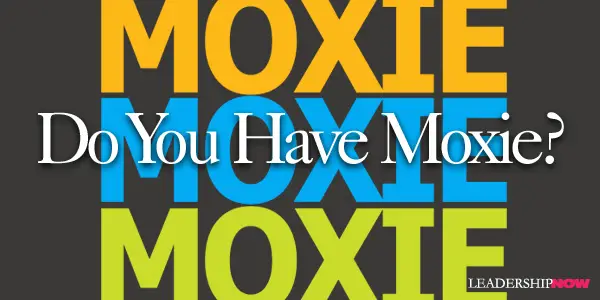
LEADERS WITH MOXIE are leaders that have what it takes to lead others in tough circumstances. They are tough on the outside but soft on the inside. When knocked down they know how to get back up and they can bring others with them because they are likeable.
John Baldoni, author of MOXIE, says that "Leadership post-crash is not really any different from leadership pre-crash, except for one thing: resilience." Leaders with moxie have four key attributes:
Fire. They have a passion for what they do and have a need to make a positive difference in the lives of others.
Drive. They have ambition and want others to share in it.
Resilience. They have known defeat and it doesn't scare them. They know how to pick themselves up after a fall.
Street Smarts. They know how the world works and what makes people tick.
Baldoni breaks moxie down into five characteristics that you can practice and develop to be a leader that demonstrates moxie. Each characteristic is brought to life through the examples of leaders who have demonstrated it in their own life and leadership.
The first is Mindfulness. "A mindful leader knows the situation as well as his capabilities and those of the people around him." aware if his situation but at the same time focused on what could be done to improve it. Mindfulness "prepares leaders to focus on the present as well as prepare for the future"— to be aware of your situation but at the same time focused on what could be done to improve it.
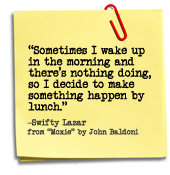 Second is Opportunity. "An opportunistic leader looks for ways to make things better. She is motivated by a desire to make a positive difference." That means a willingness to see beyond the immediate problem and see the possibilities over the horizon.
Second is Opportunity. "An opportunistic leader looks for ways to make things better. She is motivated by a desire to make a positive difference." That means a willingness to see beyond the immediate problem and see the possibilities over the horizon.
Third is X-Factor. "A leader with the X-Factor has what we call 'the right stuff of leadership.' She radiates character and uses her ambition to focus on the right goals. She has the persevering spirit that radiates resolve. Leaders with the X-Factor are humble, and their humility attracts others to them." The X-Factor is those things that allow you to do what you do well: character, beliefs and talent. These can all be examined and improved. In addition, look for opportunities to improve through more training and consider taking on responsibilities that stretch you.
Fourth is Innovation. "An innovative leader knows that life is not lived in a linear fashion. Sometimes you need to take risks. That means thinking differently, doing differently, and rewarding others who do the same." Leaders with moxie aren't content with the status quo. They are tuned to the future. A "forward-themed outlook is not merely one of observation, it is one of application….That gives rise to innovation."
Fifth is Engagement. "Persons with moxie seek to engage with the wider community around them. They are focused on making a positive difference in their teams and in their organizations." Leaders must work through others. "Engagement is an essential part of extending the leadership self in order to make a positive difference."
All of us can demonstrate moxie when the going gets tough. Preparing and developing yourself now sets you up to make better decisions when you do get knocked down.
Moxie is full of great stories and examples making it immediately relatable and practical. It is structured so that you can thoughtfully and tactically look at each of these areas to see where you can better prepare yourself. Baldoni also provides an appendix that works as a handbook to guide you in this. Questions, examples, additional thoughts and action steps help you access where you are at and what you might need to do next.
Moxie is not just about your work life, it also impacts every other aspect of your life and positively influences the lives of those you touch.
Of Related Interest:
The Leader's Pocket Guide
Lead With Purpose
Lead Your Boss
Lead By Example
![]()
![]() Like us on Instagram and Facebook for additional leadership and personal development ideas.
Like us on Instagram and Facebook for additional leadership and personal development ideas.
Posted by Michael McKinney at 06:50 PM
Permalink | Comments (0) | Personal Development
11.07.14

How to Pull Yourself Back from the Brink of Your Caffeine-Driven, Smart Phone-Addicted Life
This is a post by Scott Eblin. Scott is is the co-founder and president of The Eblin Group. He is the author of The Next Level and Overworked and Overwhelmed.
On a summer Sunday night four years ago, I found myself standing in front of a roomful of about 80 corporate managers who probably didn't want to be there. They had just finished the first week of a high-profile leadership development program in one of the world's largest companies and week two was scheduled to start at 7:30 am the next morning. They were polite but understandably restless. I was there as a guest speaker brought in to share some of what I'd learned from working with several hundred other leaders in their company.
Since high-achieving people usually like to compare themselves to their peers, I asked if they'd like to see the summary results of hundreds of leadership behavior self-assessments completed by those other leaders. Of course they said yes. Starting with the highest assessed behaviors, everyone could quickly identify with commitment to behaviors like making timely decisions, being clear about priorities and accepting accountability for results. Then we took a look at the lowest assessed behaviors like pacing myself, taking regular time to step back and giving others my full presence and attention. There were nods and murmurs of recognition. I summed it up for the group with the headline, "Leaders in your company are so busy doing stuff that they probably don't see what needs to be done.
Then the room erupted. Not in anger but in vociferous agreement. "Yeah, that's exactly it!" one person exclaimed. "Yeah, another agreed, they expect us to be corporate warriors, answer e-mails at 2:00 in the morning and get by on four hours of sleep a night." Several people at once said, "We can't keep this up."
The conversation I led that evening was the beginning of work and a thought process that led to my new book, Overworked and Overwhelmed: The Mindfulness Alternative. One of the things I've noticed in my work as an executive coach and speaker over the past four or five years is that most of the executives, managers and professionals I work with are trying to work harder every year. The demands of a "do more with less" culture and a 24/7, smart phone enabled operating environment have left too many people teetering on the brink of a caffeine-addicted, sleep-deprived, stressed-out existence. The impact of all of that on short-term productivity and happiness and long-term health and well being is devastating.
Because of all they're trying to do and pay attention to many of the leaders and professionals I work with are in a chronic state of fight or flight. Their stress hormones and blood pressure are too high and their immune and digestive systems don't operate at healthy levels. In the short run, all of that leads to anxiety, insomnia, poor decision making, lack of focus and generally poor health. In the long run, it leads to broken relationships, premature aging and early death.
The point I'm trying to make in Overworked and Overwhelmed is it doesn't have to be that way. There are simple, relatively easy steps you can take to pull your life from the brink. That's where the mindfulness alternative comes in. Over the past few years, mindfulness has gotten more and more attention in the mainstream media – it's even made the cover of Time magazine. The picture that a lot of people get in their minds when they hear the word mindfulness is of blissed out people sitting cross legged while they meditate and chant. That's one way to do it, but it's not something that most stressed out professionals are going to do.
What I'm presenting in my book is what I've learned about how the basics of mindfulness can be used and applied by just about anyone who needs to get out of chronic fight or flight. We all know what fight or flight is – it's supposed to be the emergency response system controlled by your body's sympathetic nervous system. It's a big problem when the fight or flight response gets stuck in the on position and becomes chronic. That's where another system that all of us have but few of us have heard of comes into play. It's called your rest and digest response and is controlled by your body's parasympathetic nervous system. You can think of it as fight or flight being the gas pedal and rest and digest as the brakes. We need to exercise both throughout the day to be healthy, happy and effective. Fortunately, there are simple, easy to do routines that we can learn from the practice of mindfulness that can help even the most overworked and overwhelmed people activate their rest and digest response. I summarize a lot of those routines in my book and offer a simple one-page framework called the Life GPS® that helps make it easy to follow through on the routines that help you show up at your best.
The Life GPS® asks for your answers to three questions:
- How am I when I'm at my best?
- What are the routines – physical, mental, relational and spiritual – that will help me show up at my best?
- What outcomes do I hope to see in the three big arenas of life – home, work and community – if I regularly show up at my best?
Based on my work with hundreds of leaders, I can tell you that getting clear about your Life GPS® and following through on it can help you step back from the brink and make a huge difference in the quality of your life and for the people you care most about. It doesn't require perfection in either discipline or execution. It just requires the willingness to take some small initial steps and repeating them until they've become healthy habits.
It's never too late to pull yourself back from the brink and reclaim your life. Now is a great time to get started. My goal with Overworked and Overwhelmed is to help you do that.
Like us on Facebook for additional leadership and personal development ideas.
Posted by Michael McKinney at 01:37 PM
Permalink | Comments (0) | Personal Development
07.14.14

Six Critical Areas Where You Need to Be Grounded
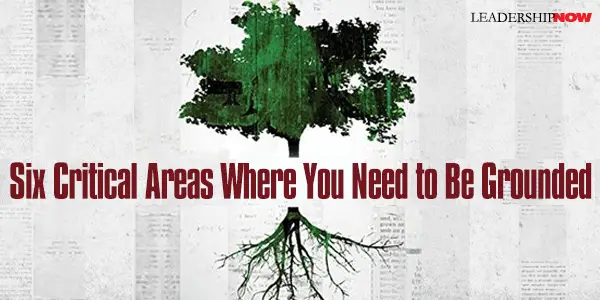
GOOD LEADERS are healthy leaders.

We can't separate our leadership from who we are inside. "Your well-being, success, and organization depend, first and foremost on who you are. You need to examine the internal stuff—what goes on in your mind and heart—before doing anything," writes Bob Rosen in Grounded.
Faced with the speed of change today, staying aligned with who we are is very difficult making us feel stressed and defeated. We can deal with the winds of change in one of three ways: ignore the change, deal with it head on with uninformed short-term fixes, or get ahead of it. Those ignoring the situation often "adapt a rigid attitude toward personal change, avoiding introspection or soul-searching that might threaten long-held values or unexamined results." Those who get ahead of it are not only flexible but are personally grounded.
Rosen says that great leaders are grounded in six areas:
Physical Health / How You Live: Not just the absence of disease but the presence of health. "Strong personal health begins with body-mind awareness, which gives you the personal insights and knowledge to develop a healthy lifestyle specially tailored for you."
Emotional Health / How You Feel: Having good self-awareness. "Emotionally healthy leaders have a nimbleness, evident in their reactions, thinking and behavior."
Intellectual Health / How You Think: Having a good curiosity so that you can break out of your mental comfort zone. "By expanding your mental range, you can broaden your thinking, solve complex problems, and focus on what is truly important."
Social Health / How You Interact: The ability to build mutually rewarding relationships while being true to yourself – transparent and connected. "Leadership follows an inside-outside progression. Social health starts with authenticity, advances to mutually rewarding relationships, and culminates in nourishing teams and communities."
Vocational Health / How You Perform: Meaningful work that reflects who you are. "A company led by an ill-equipped leader soon falls behind in the race for talent and productivity. Now more than ever, people are yearning for leaders to create the conditions that enable others to excel and to reach their full potential."
Spiritual Health / How You View the World: The ability to recognize a higher purpose and something more meaningful than your personal needs. It's connecting at the macro level. "On a personal level, individuals become alienated, rootless, and self-destructive. A business devoid of spiritual health promotes elfish, parochial, and narrow financial interests above humanity and social responsibility."
Rosen says that these six areas are part of a system of health and if one of these subsystems is out of line, the entire system can come undone. "Poor leadership is a failure or breakdown of the whole or of part of the system."
Rosen deals with each of these areas addressing the key issues of each, identifying where you need work, and how to develop and master each of them. The process requires self-awareness, disciple and the conscious choice to take the steps to achieve desired outcomes.
![]()
![]() Like us on Instagram and Facebook for additional leadership and personal development ideas.
Like us on Instagram and Facebook for additional leadership and personal development ideas.

![]()


Posted by Michael McKinney at 10:56 PM
Permalink | Comments (0) | Personal Development
05.13.14

Leadership Impact: Where it Comes From
Why do some leaders make an impact, while others flounder after initial success?
Tim Irwin says "leadership failures rarely reflect a problem with the leader's competence. Most often the fall occurs because of a breach of something inside the leader." This is not surprising because we lead from our core. No matter how polished we become on the outside, eventually what is on the inside comes through.
Great leadership is not a technique. It comes from within. In Impact, Irwin says, "Truly engaging others flows from the essence of who we are—from our core. Management is positional; leadership is personal."
We see this too often: "Unregulated power is one of the chief instigators of a compromised core." Something happened along the way. Successful leadership depends on growing and protecting our core. Of course, self-awareness is key. And we must acknowledge that all is not well. "Our culture's obsession with striving to look perfect makes us reluctant to look at our own duality—that some of our impulses are noble, while others are not so benevolent. It is not that we have yielded to our shadow, but we prefer to deny that we even have a shadow."
Power and our tendency to misuse it, is an area we need to be aware of. "Self-awareness and self regulation must grow in direct proportion to the power we exert."
Irwin discusses identifying and dealing with arrogance, the beliefs that drive our behavior, self-deception. He also stresses the need for accountability We can't regulate our core alone. Unfortunately, too many leaders derail themselves because they think that they are too good to be held accountable by anyone else. We need to have people around us that will speak candidly with us. Accountability must be part of the organization's culture. If it is not, the first place to look for a lack of accountability is at the very top.
Steve Reinemund, former chairman and CEO of PepsiCo told Irwin:
Accountability is being responsible to some other person or organization for the activities and actions we take. it is critical to an individuals performance and an organization's integrity and credibility.A good organization where high-performing people want to work is a place where people have responsibilities and accountabilities for their actions and how they perform in their jobs. High performing organizations do a great job of defining accountability and then measuring it and holding people accountable for results on a real time basis.
Some of the best organizations that I have seen are very clear and very specific about those accountabilities. If people join an organization and don't recognize its culture of accountability, they join at their own peril.
They stay at their own peril too.
Irwin's book is a book to keep handy and to refer to throughout the seasons of your leadership. It will help you to stay on track and lead from a solid and uncompromised core.
Like us on Facebook for additional leadership and personal development ideas.
Posted by Michael McKinney at 08:11 PM
Permalink | Comments (0) | Personal Development
04.23.14

How to Find Leadership Blindspots
Blindspots. Those problems that are right in front of us that we fail to see. We all have them not because we can't find them, but because we don't look very hard.
In Leadership Blindspots, author Robert Shaw make this important observation: "Leadership strengths are often found in close proximity to blindspots. An overpowering strength, in particular, usually has an associated blindspot."
Shaw suggests that not all blindspots are bad. Some may actually protect a leader from doubt. For instance a certain confidence may "push him or her forward in the face of uncertainty and adversity" to "see what is possible beyond what a realistic assessment would suggest is sensible." Yes, but…. I would talk about it differently but eventually arrive at the same place.
To me a blindspot is a blindspot and needs to be uncovered. Once uncovered it can be managed in some way. An uncommon confidence in your approach to uncertainty may serve you well and if recognized and understood it is no longer a blindspot but an approach to life that is managed. Any blindspot puts distance between you and reality. A small deviation may never become an issue but large deviations will eventually trip you up.
An optimal margin of illusion occurs when individuals have a small, positive distortion about themselves. This results in an advantage over those who are more realistic. A positive bias is useful because it increases an individual's motivation to move forward in risky situations and persevere in difficult situations.
"Leaders get into trouble when they don't know what they don't know in areas that matter." There are degrees of blindness:
First is a complete lack of awareness. Leaders are said to be blindsided by these weaknesses or threats.
Second is denial. "In this case, a leader may be aware of a weakness or threat but doesn't analyze it in sufficient depth to understand its causes and potential impact. The vulnerability is seen by the leader as 'not being a big deal' or 'not my problem.'"
And third is the failure to act on a known weakness or threat. "There are cases when a leader knows that trouble lies ahead but fails to take action due to a range of factors including a lack of skill. I refer to this as a type of blindness because the leader fails to fully appreciate the risk he or she is facing and the consequences of not taking action."
Not all blindspots are created equal. "Leaders need to question the relative importance of a weakness or threat once they become aware of it."
Not surprisingly, "the more power and status people have, the less likely they are to pay attention to those below them and the less empathic they will be." So we just don't bother searching for blindspots.
Leadership Blindspots has a Leadership Blindspot Survey in the appendix of the book. It contains self-assessment questions in each of the four potential blindspot areas: self, team, company and markets.
Like us on Facebook for additional leadership and personal development ideas.
Posted by Michael McKinney at 10:34 PM
Permalink | Comments (0) | Personal Development
04.11.14

Why Failing Well Is the Key to Success
Failure is how we learn. The problem is, argues Megan McArdle, we're forgetting that truth. We are becoming too risk-averse and that is bad for our children, for our personal lives, for our companies, and for our country.
While we tend to treat success as finite and failure as disaster, the reality is that in order to be successful, we must learn how to harness the power of failure. In The Up Side Down, McArdle explains why.
Unfortunately, teaching our kids how to fail smartly is one of the most important things we (and our schools) could be doing. Instead, we protect our kids from failure.
Educational software can help kids master new skills by pinpointing where they're going wrong, and letting them practice just that task over and over until they get it. And yet, we don't seem to be carrying that lesson outside the computer lab. Perhaps this is because even as our electronics have become a better and better environment for learning from failure, our educational system has become much worse.
Of course, learning from failure means asking the right questions after a failure and taking responsibility for the answers. "Learning to fail well means overcoming our natural instincts to blame someone—maybe ourselves—whenever something goes wrong." Perhaps we deflect responsibility not just to make ourselves look better, but also to create a sense of control and structure in the world.
Our fear of failure also causes us to stay the course long after we should have quit. The biggest key to understand, says McArdle, is that failure is not the problem. It's our refusal to recognize that we have failed. "If we assume that failure is a catastrophe, we'll often try to delay recognizing it as long as possible. That, of course, gives your failure lots of room to turn into a disaster."
In The Up Side of Down you'll find why making bankruptcy easy relative to the rest of the world means not only are people willing to takes more risks, but they are feed to try again. "We built the biggest, richest country in the world" and we did it mostly because "we were willing to risk more, and forgive more easily, than most other countries. We lend more freely, and let debtors off the hook; we regulate more lightly, and rely on a hit-and-miss liability system instead. These things are often painted as weaknesses, but in fact they are great strengths. They are the sign of a country more invested in the future than the past."
Sharing her own experiences among the unemployed, she explains the psychology of why some unemployed people stay unemployed—and what can be done about it. In a chapter titled "Adopting the Way of the Shark," she explains why you need to keep moving. She notes, "It is very difficult to communicate the progressive corrosion of long-term unemployment to someone who has not endured it." Money is an issue, but the psychological toll is worse—withdrawing from social relationships because it is "increasingly painful to hang out with people who have jobs."
The Up Side Down is persuasive and engaging. It is a rewarding read that will have you looking at the "failures" in your life as opportunities to learn and reinvent yourself.
Like us on Facebook for additional leadership and personal development ideas.
Posted by Michael McKinney at 06:42 PM
Permalink | Comments (0) | Personal Development
12.09.13

The 12 Rules of Respect
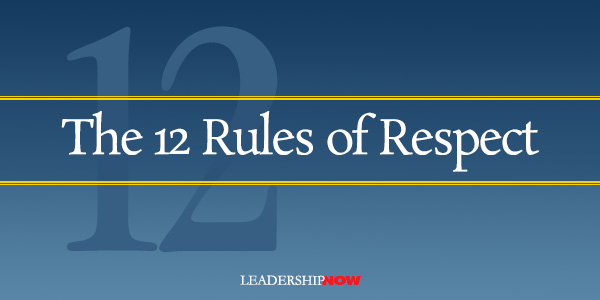

Paul Meshanko has highlighted the importance of demonstrating respect in all of our interactions in The Respect Effect. The desired result is that those we interact with will feel valued in some way. He offers 12 Ways of thinking and behaving around others:
1. Be Aware of Your Nonverbal and Extra-verbal Cues.
What we say is important but how we say it can make or break the communication. "Extra-verbal cues include the speed with which we speak, our volume relative to background noise, our inflection, and our willingness to pause to make space for others to speak."
2. Develop Curiosity About the Perspectives of Others.
"Empathy is demonstrated when it becomes evident to others around us that we are interested in what they think, why they think it, and how they feel about it. When this happens, it becomes easier to communicate respect to others, even if we disagree with them."
3. Assume that Everyone is Smart About Something.
"Because I like to think I'm smart, it is reasonable to assume that other people like to think they are also smart. The only difference is that we are all smart through different histories and life experiences."
4. Become a Better Listener by Shaking Your "But." The word "but" can be used in a way that hinders our ability to show respect. The word "but" negates what came before it. Replacing it with "and" and other words that validate and convey consideration, the entire tone is changed.
5. Look for Opportunities to Connect with and Support Others.
"Even in the heat of conflict, there are ways to connect with people if we want to. When we demonstrate a willingness to move away from our immediate agenda and search for positions of agreement first, it makes working through the actual differences a bit easier."
6. When You Disagree, Explain Why.
"It is disrespectful when we fail to share our observations and opinions in order to avoid conflict. We have an obligation to others to be truthful with our perspectives and points of view. When done with civility, tact, and room for counterarguments, sharing our perspectives leads to the best decisions and optimal results. It also prevents the accumulation of 'baggage' that builds up when we keep things bottled up." And remember, it works both ways.
7. Look for Opportunities to Grow, Stretch, and Change.
"As we develop the desire and the willingness to hold ourselves up to the proverbial 'bright light' for an occasional reality check, two things happen. First, we become infinitely easier to be around because we are less critical of others. Second, we grow in wisdom and perspective. That's because we start considering that, in situations where we might initially view others critically, the problems may be ours to deal with and not theirs.
8. Learn to Be Wrong on Occasion.
"From a neurological perspective, there is absolutely no correlation between our degree of certainty about a subject and the likelihood that we are actually correct in our beliefs. This means that our feeling of certainty about something is nothing more than a strong emotion. The stronger the emotion, the more likely we are to develop blind spots around it." An open mind is a demonstration of respect.
9. Never Hesitate to Say You Are Sorry.
"Unfortunately, it is often when we're at our worst that our actions are most memorable to others. While we don't expect everybody to be perfect, "we do expect people to make it right when their words, actions, or decisions cause damage."
10. Intentionally Engage Others in Ways that Build Their Self-Esteem.
"Building esteem in people we work with or for requires a shift in agendas. It takes a shift in focus away from what we need to what others need." Meshanko colleague Teresa Welborne said, "If you are in a leadership position and you are not a people person, you become a liability to your organization. And if you're not willing to make the effort to become a people person, you should not be in a position of leadership."
11. Be Respectful of Time When Making Comments.
"If we don't become curious or have value for what other people have to say, it is difficult to consistently fake the behaviors that demonstrate interest."
12. Smile!
"Sometimes the most effective strategies are also the simplest. With rare exceptions, when we meet people who greet us with a smile, they are sending us important information about their intentions."
Meshanko concludes with 3 key ingredients to improving your ability to demonstrate respect for others:
Respect is about you and me, not "them," and our commitment to it influences everyone around us. Once we understand the value proposition respect offers, that insight can provide us with patience, courage, and creativity.Patience permits us to maintain our composure and respectful demeanor when others are not acting at their best.
Courage enables us to candidly challenge disrespectful behavior and actions directed toward others.
Creativity allows us to see points of connection, even in the midst of conflict.
When we bring these qualities online and into our work interactions, everyone benefits, including our peers, customers, vendors, and ultimately, our shareholders.
![]()
![]() Like us on Instagram and Facebook for additional leadership and personal development ideas.
Like us on Instagram and Facebook for additional leadership and personal development ideas.

![]()


Posted by Michael McKinney at 11:13 PM
Permalink | Comments (0) | Personal Development
10.24.13

How to Discover Your What
Your WHAT is the "single most crucial element of your life that needs to be identified, defined, and fulfilled," says Steve Olsher in What is Your What? Here's why:
Your unfulfilled WHAT will absolutely affect you in a variety of unexpected ways. It could be the source of your high blood pressure, the reason you don't feel "good enough," the cause of your general sense of loathing when you wake up, or the impetus behind your efforts at self-sabotage.
It should be noted here that finding your what is not a surefire way to fame and riches—or gainful employment for that matter. And while each person is unique, many others possess similar abilities and may fill a need in the marketplace better than you do. It takes work. At the same time, some people chose to work at jobs that do not fulfill or satisfy their what because it fills a purpose or a value that they consider to be greater than their own personal needs. Perhaps that is their what. That said, What is Your What? will help you get to gain control over your life rather than letting it happen haphazardly.
What is Your What? is a self-awareness book to help you connect with who you really are. What you do from there is your choice. Olsher has developed a three-step process to help you uncover and reconnect with your natural strengths, identify the vehicle you'll leverage to share your gifts with the world and the specific audiences who'll benefit most from your gifts.
"As we endure life's hardships, we tend to lose touch with our inner greatness. We start to make distasteful compromises, settle for less, and become people different from our deepest selves." Becoming aware of how you were knocked down is the first step in ascending to your most natural state of being.
Olsher bases his program on seven principles:
1. Recognize YaNo Moments. These are those moments when you are faced with a choice. Some are big; some are small. "Any time you undertake an activity without evaluating the impact your choice will have on your life, you run the risk of compromising your state of mind. The key to regaining control of your life is to make deliberate choices with an understanding of the consequences."
2. Reclaim the Canyon. Establish space between life as it happens and your reaction to those events.
3. The Sufficiency Theory. Attain satisfaction, peace, and contentment by minimizing material desires and the effect of outside influences. Olsher suggests that we stop drawing lines in the sand. "Happiness is not a destination that can be reached by attaining select milestones. Shift your approach from waiting for certain things to happen in order to feel a certain way to feeling and acting that way now. Surprisingly often, this will spur the results you desire to happen."
4. Retrain Your Brain. "Anything from your past that you choose to relive becomes a part of your identity. Be careful about which memories you commit to."
5. Incorporate Jack Welch's successful business practices into your behavior. Specifically, become highly focused on who you are, what you stand for, and what your purpose is; identify the Top 20 Percent, Vital 70 Percent, and Bottom 10 Percent for each area of your life; achieve Six Sigma in all key aspects of your life and strive to accept nothing less than your best.
6. The Not-So-Golden Rule. Eliminate fear or expectation as a motive for your actions. Your motive does matter. Act out of love, without the expectation of anything in return.
7. The Slow Death of Not Being the Star. Shift your focus away from time-consuming distractions and toward the pursuit of your personal goals. Keep track of your activities for a week. "Chances are you'll find that what you've been thinking of as relaxing 'downtime' is actually the dominant force in your life, devouring months and years you can never get back."
Like us on Facebook for additional leadership and personal development ideas.
Posted by Michael McKinney at 09:56 PM
Permalink | Comments (0) | Human Resources , Personal Development
10.13.13

Turning Your Disadvantage Into Your Advantage
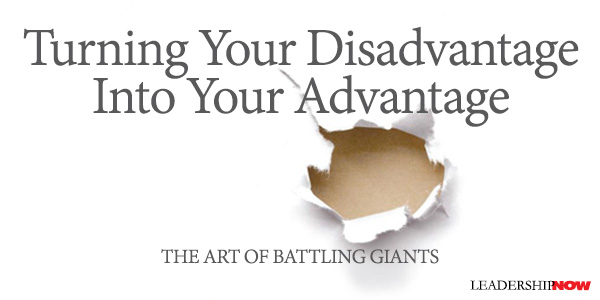
MALCOM GLADWELL wants us to rethink how we think about the giants in our lives whether they be outsized opponents, disabilities, misfortunes, or oppression. We all face or have faced odds that seemed to be stacked against us. Odds that we are forced to deal with.

In David and Goliath, Gladwell shares two ideas. First, "much of what we consider valuable in our world arises out of these kinds of lopsided conflicts, because the act of facing overwhelming odds produces greatness and beauty." The battle makes us better. It develops us and reveals strengths that we didn't know we had.
Second, giants are not always what we think they are. The powerful and strong are not always what they seem. Often their strength can expose their greatest vulnerability. Their size can be their undoing. What we see as their overwhelming advantages can also be the thing that limits their options.
We know but easily forget, that there is a point where more doesn't make a difference and more still becomes a disadvantage. "We all assume," writes Gladwell, "that being bigger and stronger and richer is always in our best interest." A wealthy man told Gladwell about the relationship between wealth and parenting:
My own instinct is that it's much harder than anybody believes to bring kinds up in a wealthy environment. People are ruined by challenged economic lives. But they're ruined by wealth as well because they lose their ambition and they lose their pride and they lose their sense of self-worth. It's difficult at both ends of the spectrum. There's some place in the middle which probably works best of all.
Gladwell is a master storyteller. The stories are compelling and at times provocative. But they all make you think.
Gladwell makes the point that certainly some people triumph over their disabilities in spite of them. They simply won't let them stand in their way. But there are those that succeed because of their disability. "They learned something in their struggle that proved to be of enormous advantage." Challenges can cause us to develop skills we might not otherwise have developed if we choose to respond that way.
Although Gladwell makes the point that there are "desirable disadvantages," in that it is the difficulty that eventually led to a person's success and made them a better person, it is not to suggest that we should wish for more disadvantages or wish them on other people. We all have disadvantages, some are huge and some are not, but the lesson is in how we see them. How we react.
Some of what we perceive as advantages—opportunities or resources that we wish we had—have actually ruined people or diminished their full potential in some way.
The thread that runs through all of Gladwell's examples is how individuals or organizations turned their disadvantages to their advantage—how they defeated giants by reframing their perceived advantage. There is no formula here as to what will work and what won't. The question is as it has always been, how will you respond to what you have been given?
The key lesson is that for the most part, difficulties are what you make of them.
![]()
![]() Like us on Instagram and Facebook for additional leadership and personal development ideas.
Like us on Instagram and Facebook for additional leadership and personal development ideas.

Posted by Michael McKinney at 09:16 PM
Permalink | Comments (0) | Personal Development
09.10.13

What Keeps Leaders Up at Night?
Gaps in what we know can trouble us for a time, but gaps in what we know about ourselves and others can truly keep us up at night. We are unpredictable, messy, complicated, illogical, and fallible. That will never change, "but through a commitment to self-awareness we can all become more highly attuned to the subtle and not-so-subtle red flags that sometimes pull us off course."
What Keeps Leaders Up at Night? by Nicole Lipkin is a treatise on self-awareness and personal responsibility and the damaging effects a lack of those qualities has in our lives.
"You can't change what's already happened, but you can change what you do next.…I've learned that the solutions always begin with raising my self-awareness and helping others raise theirs."
Using research personal examples, Lipkin tackles a number of issues:
I'm a Good Boss. So Why Do I Sometimes Act Like a Bad One? (You usually find three overarching reasons: too busy to win, too proud to see, and too afraid to lose. "Although most of us don't like to admit it, we often get all wrapped up in our own ideas, not because we are idiots but because we are human. It's natural to think our ideas best, especially when we're the boss.")
Why Don't People Heed My Sage Advice? (If you focus on treating your people with kindness and respect, your influence will grow.)
Why Do I Lose My Cool in Hot Situations? ("Leaders who want to solve the problems that keep them up at night would be wise to begin with a through inventory of their stress personality." Learn "how to negotiate your own reactions to the stress that inevitably occurs every day.")
Why Does a Good Fight Sometimes Turn Bad? (The emotions underlying a good fight gone bad in the workplace often occur as a result of a dense of injustice, contention for resources or standing, or [I suspect most likely] feelings of inferiority.")
Why Can Ambition Sabotage Success? ("The Julius Caesars of the world often end up failing because they pursue myopic success, a 'nearsighted' view that defines success in terms of self-interest. The Caesar Augustuses, on the other hand, pursue panoramic success, defining success in terms of the 'big picture' best interests of all.")
Why Do People Resist Change? ("We find it amazingly easy to turn our backs on compelling reasons to change…Beginning in childhood, we tend to shed habits that don't serve us well but hang on tightly to those habits that provide us comfort or safety. These persistent habits are able to endure even the most vicious assaults long past their expiration date.")
Why Do Good Teams Go Bad? ("Few other aspects of organizational life pose greater challenges to a leader than the behavior of people in groups." Groups are inevitable, and once we do join a group, some truly fascinating dynamics kick in as Lipkin explains.)
What Causes a Star to Fade? (The failure to engage people. "Engagement depends more than anything else on the sort of panoramic leadership Augustus practices throughout his tenure as Rome's leader.")
If things do start to go south, here are Three Simple Rules for getting back on track:
1. Seek Self-Awareness
2. Help Other Gain Self-Awareness
3. Remember we're Only Human After All.
Like us on Facebook for additional leadership and personal development ideas.
Posted by Michael McKinney at 10:56 PM
Permalink | Comments (0) | Personal Development
07.03.13

The 5 Reality-Based Rules of the Workplace and What You Can Do About It
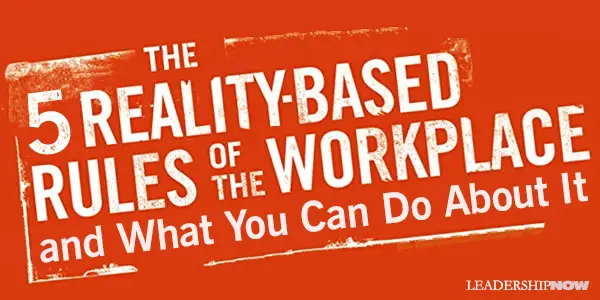
CY WAKEMAN does an excellent job of helping us to peel away the layers of rationalizations and excuses we create to avoid facing reality. First she did it with Reality-Based Leadership and now with Reality-Based Rules of the Workplace.

Too often work seems harder than it should be. We can feel helpless in dealing with the realities of "today's" workplace. That said, every time period seems unparalleled in all of history to those going through it. However, people have always struggled with these issues: doing more with less; reduced hours, benefits, or pay; increased work hours; underappreciated. The problem is, as Wakeman puts it, "no one is born accountable self-reliant, self-mastered, and resilient, yet these are the qualities that count, the ones that will fill you with confidence and afford you the chance to chose your destiny, no matter what your field of endeavor." The trick is learning to see your circumstances differently.
Wakeman has put this book together to help you do just that. If you have been playing the victim for a substantial period of time, her ideas will seem impossible, but they are the only thing that will work.
I am here to tell you: You are not a cog in a machine — far from it. You have more control than you think. That's the good news. The bad news is, you and you alone are causing your own suffering. What most of you have lost touch with is that it isn't your reality that is causing your pain and frustration. It's the worn-out methods, techniques, and mindsets with which you are approaching your reality. I'm here to tell you that your suffering is optional. I can help you get back on track so you can find bliss in your work again while becoming more valuable to your organization than ever before.
She has created some pretty straightforward, brief assessments to determine your current performance and your future potential. Your value, plain and simple is based on "the value you bring to your organization, the market value of your work, and the return on investment that you deliver, both economically and emotionally, now and into the future." You must be clear about the value you bring to your organization. The three factors that make up your value:
YOUR VALUE = Current Performance + Future Potential - (3 x Emotional Expensiveness)
The chapter on Your Emotional Expensiveness is worth reading twice. It's your drama factor. "It is the single most important factor in the New Value Equation, the one that determines whether our Performance and Potential and anything meaningful to the bottom line, and whether others feel that working with us is worth the effort." Wakeman lists 15 clues to your emotional expensiveness factor. Among them are:
You may be Emotionally Expensive if …
- You come to work in a bad mood. Ever.
- You share a lot of personal information with coworkers, and the boundary between your public life and private life is very permeable.
- You complain a lot or judge others.
- You tend to focus in what you need rather than what you have.
- You assume the worst of others' motivations.
- When you perform well, you want a medal for it.
Wakeman presents the Five Reality-Based Rules of the Workplace:
1. Your level of accountability determines your level of happiness. Personally accountable people bring their own motivation and engagement to everything they do. Be one of those people, and you will ensure your job security—or that your résumé goes to the top of the stack.
2. Suffering is optional … so ditch the drama. (Wakeman estimates that the average person spends two hours each day in drama—complaining, creating stories, and arguing with reality.) Your circumstances are what they are, but your reaction to them is up to you.
Even if you don't share your drama with others, there is no such thing as a throwaway thought. Most thoughts lead in some way to an action—or lack of action….Your thinking manifests itself in a way that affects everyone around you and the way they see you.If you remain in your lane, tending to your own responsibilities in the present, you will seldom be stressed. You'll be clear, capable, and effective. Stress enters the picture when you leave your lane to meddle in other people's business, judging or trying to control them.
Learn to see stress as a sign—not that the world is going to hell in a handbasket, but that you are not currently living in reality and need to inquire on your thinking.
3. Buy-in is not optional. To succeed, your buy-in is not optional, and action, not opinion, adds value. The most valuable people say "yes" the most often. If a decision has been made, opinions are no longer welcome.
4. Say "yes" to what's next. Your success will not be dependent on everything staying the same, but on your readiness for what's next.
5. You will always have extenuating circumstances. Succeed anyway. That which is missing from this situation is something I am not giving. When you find something missing (especially—but not limited to—intangibles, like honesty, generosity, humor, sensitivity, or gratitude) don't dwell on what other people "should" be doing or giving.
 | More down-to-earth straight talk from Cy Wakeman about personal responsibility and what it takes to succeed. Cuts through the clutter and gets to the core issues. Reality-Based Rules of the Workplace is a road map for everyone on how to be a valuable member of any organization. |
![]()
![]() Like us on Instagram and Facebook for additional leadership and personal development ideas.
Like us on Instagram and Facebook for additional leadership and personal development ideas.

![]()

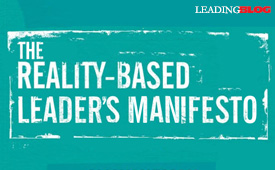
Posted by Michael McKinney at 11:22 PM
Permalink | Comments (0) | Human Resources , Personal Development
06.06.13

Balance: The Business—Life Connection
In Balance, James A. Cusumano reflects on his five careers as the lead singer of a rock band, an Exxon research scientist and executive, a Silicon Valley entrepreneur, a filmmaker and a luxury hotel owner. Through it all he points to people who helped him along the way and pointed him in the right direction. Their perspective helped keep his life in balance.
We can all make a unique contribution with the specific set of skills we came into this world with says Cusumano and "there is no greater personal satisfaction on this planet than being in the thick of doing so."
To find your passion and purpose, you have to answer four questions:
1. What do I love to do so much so that time passes incredibly quickly?
2. What work do I do or have done in the past that I do not consider work?
3. What could I do that would create the greatest value for the world around me, as well as the greatest personal satisfaction for the amount of time spent?
4. What is my unique ability, the skill or skills which, if truly actualized, could provide significant benefits to the organization for which I work and to me?
He believes that 80 percent of his success was based on his early discovery of his fundamental essence—his life purpose—that was fueled by the energy of passion and guided by the "giants" in his life.
Passion fuels your creativity and the process provides a deep sense of gratitude and "gratitude always leads to long-term fulfillment and happiness. The greater your sense of gratitude, the greater your level of happiness."
Cusumano provides eight principles for building a successful business:
- Have a skilled CEO who embraces and is committed to Inspired Leadership* , and has a deep sense of how to create a challenging, far-reaching, yet realistic company vision and mission. The CEO creates the dream; committed employees embrace and embellish it.
- Achieve passionate buy-in of this vision and mission from all key stakeholders—customers, employees, investors, suppliers, and the community.
- Coach employees on developing corporate values to which they are firmly committed.
- Hire the right people for the right positions at the right time—and compassionately and quickly ask those to leave who do not work out.
- Address a growing market, better yet, create one. Don't waste your time on dying markets.
- Focus strictly and passionately on the best opportunities. You can't do everything.
- Plan for an early commercial success—even a modest one. Hit a few singles instead of trying for all home runs.
- Have a strategic plan but stay flexible. For maximum effectiveness, the plan should be understood and embraced by all employees.
*Inspired Leadership is based on the CASTLE Principles, an acronym for Courage, Authenticity, Service, Truthfulness, Love, and Effectiveness developed by Lance Secretan. Inspired Leadership is a serving relationship with others that inspires them to grow and reach their innate human potential and in doing so they not only exhibit outstanding performance and thereby contribute much more to their company, but they also make the world a better place. Inspired Leadership is not a model, or a formula, or a system, or a process. Instead of doing something to someone, Inspired Leadership is a way of being and it comes from within.
Like us on Facebook for additional leadership and personal development ideas.
Posted by Michael McKinney at 11:30 PM
Permalink | Comments (0) | Personal Development
05.13.13

The First Step in Self-Awareness Isn't You - Redux
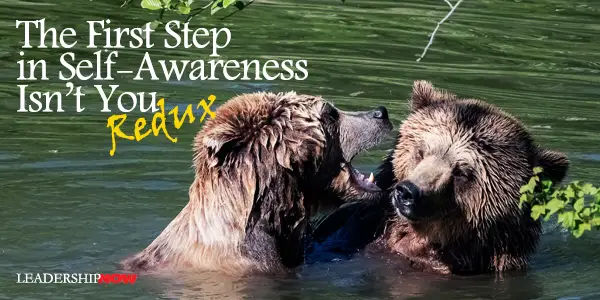
HUMAN BEINGS—and that includes most leaders—are relational.
Self-leadership is fundamental to good leadership, but it is not the end-game.
Self-awareness for self-awareness sake has limited value.
Through introspection and reflection we can get to know a great deal about ourselves—as far as we know. The problem is that we don't know what we don't know. Only when we are able to test our assumptions about ourselves, can we know if we are getting it right. It is when we see ourselves in relation to others and in relation to a higher purpose that we really begin to clarify (and many times even identify) our core values, beliefs and intentions. We can all know who we think we are, but it isn't until we get out and interact with others that we can begin to see where we are right and where we have been fooling ourselves.
Who we are takes on meaning when it is in the context of our relationship with others. Superman's stance on "truth, justice, and the American Way" is pointless if he remains isolated in his Fortress of Solitude. His values only have meaning in relationship to other people. All the self-knowledge in the world counts for very little if it is not put to work in the service of others.
Self-awareness that points to your unique contribution in the world is leadership. Who you are is leveraged when it is placed in the service of other people. Surely we must lead with integrity—in a manner consistent with who we are. However, the only way to know if we are really doing that is by looking at how we impact the lives of others—how our leadership is experienced by others.
Self-awareness provides the opportunity for us to close the gap between who we think we are or want to be and who we actually are at a particular point in time. But that can only be achieved with feedback of some kind. I want to share a lengthy story provided by Scott Weiss in his great book DARE, to illustrate this point. It's a book about trust in leadership and the trust that is generated by knowing who you are and leading as that person.
At thirty-five, I was already an executive vice president with Turner Broadcasting, overseeing two divisions and reporting directly to the second most senior executive who soon would be named the company's CEO. I believed that I was very much at the top of my game, already delivering a lot of high-level presentations, and getting consistently positive feedback. I was more than a little offended by the suggestion that I needed any help at all with my communication skills. But I went.In Atlanta, I participated in Speakeasy's exclusive, invitation-only workshop for C-suite executives. Called "The Leader's Edge," this intense three-day workshop focused on communication style and delivery with respect to leadership. In spite of my initial resistance, I did my best to participate without revealing my conviction that I felt superior to this target audience that needed help with communication and presentation skills. I wasn't the least bit nervous when it came time to watch the video recordings of our individual presentations. I was sure I'd done just fine.
With the others in our group, I watched as the executive persona of Scott Weiss delivered his speech from the screen. The guy up there looked pretty good. Very sure of himself. Very corporate. Very buttoned up. I expected to be told, as I always had been before, that I was a very effective presenter. But after a moment, Sandy Linver, the faculty leader who had directed our session turned to ask me a question.
"So," she said, "as you look at yourself, objectively, how do you perceive this person?"
"Fine," I said. "He seems knowledgeable. Experienced. Very confident."
"Hmm," she said. "That's interesting. If you could separate yourself from this person and experience him objectively, would you want to hang out with a person like that on the weekend?"
It was a strange question. But I looked at that person frozen on the TV monitor and thought about it. Reluctantly, I had to tell the truth.
"No," I said. "Probably not."
"Really?" she asked. "And why not?"
"Well," I said, "because I don't hang out with people like that."
I'm not sure whether there was a collective gasp from the audience or just a stunned silence, but what she said next definitely stunned me.
"You know, don't you, that you're talking about yourself?"
Yes. I was. I had just admitted that the person I was projecting was not someone to whom I could relate. He wasn't even someone I really liked!
And apparently, I wasn't the only one to be put off by Scott Weiss's executive persona. In our remaining time together, other members of the audience began to offer more specific impressions of how they had experienced me as a communicator, and as a person.
Arrogant.
Cocky.
Superior.
Disconnected.
Not real.Those were just some of the terms they used. I had never heard myself described this way before. I felt like the emperor with no clothes.
I had not gone to Speakeasy for a consciousness-raising experience. But I sure had one. In the weeks following that close and uncomfortable encounter with my own executive persona, I did a lot of thinking. I examined what I had learned about how others actually did experience me, and thought about how I wanted people to experience me. There was a gaping abyss between those two extremes, and I realized that I had a lot of work to do to bring them closer together—to become more congruent as an individual and as a leader. I needed to find my authentic self and learn how to bring more of my real personality to my vocation.
I appreciate Scott Weiss sharing this story, for it's not just a process all growth-oriented leaders must go through, but a process we must seek out continuously.
Feedback is a process that, if we allow it, will keep us honest with ourselves. We see things as we are, and we see ourselves through our intentions. Feedback gives us a reality check that we are free to accept or reject, but without it we have no way to combat our own self-deception.
We must be able to experience ourselves in relation to other people if we are to have a genuine understanding of who we are and why we do what we do.
So the place to begin if we truly want to know ourselves is to reflect on the impact that we have on others. Only then can we lead authentically knowing that our inner being is congruent with our outer behavior.
![]()
![]() Like us on Instagram and Facebook for additional leadership and personal development ideas.
Like us on Instagram and Facebook for additional leadership and personal development ideas.
![]()
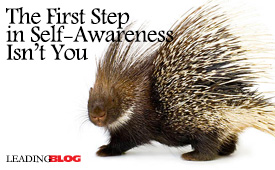

Posted by Michael McKinney at 12:09 AM
Permalink | Comments (0) | Personal Development
05.10.13

The First Step in Self-Awareness Isn't You
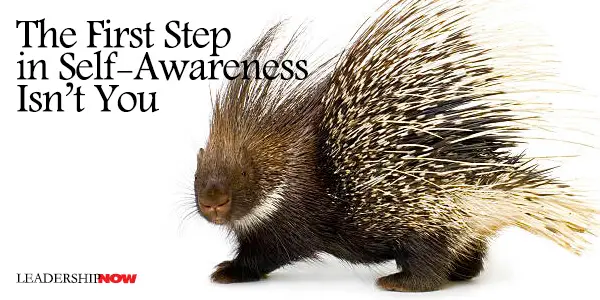
IRONICALLY, the more self absorbed we are, the less self-aware we are.
Self-awareness is vital to the development of a leader. But it's not navel-gazing. It is not an inward focus. It is an outward focus. Its ultimate goal is to improve our connection and effectiveness with others.
The self-absorbed leader struggles with self-awareness and emotional intelligence because self-awareness is about how we are perceived by others. It's about understanding how our behaviors are affecting other people. And we just can't do that by focusing on ourselves.
It is easy for us to focus on ourselves—to think people just don't understand us. And when we do, we tend to rationalize rather than grow. Explain rather than listen. Disconnect rather than lead.
Self-important leaders can't see how they are sabotaging themselves because they focus on their needs and feelings and not those of their followers. Consequently, they don't encourage feedback because it never seems relevant to them. An inward focus dooms us to operate from a place of weakness—never able to see what is holding us back.
It is in the character of great leaders to have a great appetite for feedback. It's a gift and still the best way to gain an awareness of ourselves. You might think of it as a personal scorecard.
To see where we need to grow, we need to see how we affect other people. Only then can we begin the introspection that will lead us to a deeper understanding of ourselves and learn to move past unproductive thinking and develop new behaviors.
![]()
![]() Like us on Instagram and Facebook for additional leadership and personal development ideas.
Like us on Instagram and Facebook for additional leadership and personal development ideas.
![]()
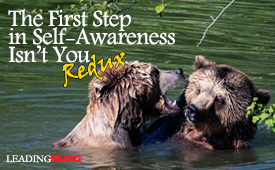

Posted by Michael McKinney at 06:52 PM
Permalink | Comments (0) | TrackBacks (1) | Personal Development
05.03.13

How to Make Better Decisions

"Why do we have such a hard time making good choices?" ask Chip and Dan Heath in Decisive.
"A remarkable aspect of your mental life," says Daniel Kahneman, "is that you are rarely stumped." We have opinions about nearly everything and are quick to jump to conclusions based only on the information that is right in front of us. We often just go with our gut. And that hasn't always served us well.
• An estimated 61,535 tattoos were reversed in the United States in 2009.
• Forty-one percent of first marriages end in divorce.
• Forty-four percent of lawyers would not recommend a career in law to young people.
• Eighty-three percent of corporate mergers and acquisitions fail to create any value for shareholders.
The Heath brothers have identified "four villains" when it comes to making decisions:
- Narrow Framing. We tend to define our choices too narrowly and see them in binary terms. We miss other options.
- Confirmation Bias. We develop a quick belief about a situation and then seek out information that confirms our belief. When we want something to be true, we look for reasons to justify it.
- Short-Term Emotion. Our emotions paralyze our decisions. We think we're working it out, when all we have really done is kick up "so much dust that we can't see the way forward."
- Overconfidence. We think we know more than we actually do. The problem is that we don't know what we don't know. "The future has an uncanny ability to surprise. We can't shine a spotlight on areas when we don't know they exist."
What can we do? We can counteract our tendencies with these four strategies the authors call the WRAP Process from the first letter of each step:
- Widen Our Options. As it turns out, most of the "decisions" we make do not involve any real choice. They are whether-or-not, yes-no decisions. We do not even consider other choices. Like a teenager, we "get stuck thinking about questions like 'Should I go to the party or not?' The party is in their mental spotlight, assessed in isolation, while the other options go unexplored. A more enlightened teen might let the spotlight roam: 'Should I go to the party all night, or go to the movies with a few friends, or attend the basketball game and then drop by the party for a few minutes?'"
We would benefit by even adding one more option to our "decision." Consider opportunity costs. ("If I do this, then I can't do that?") Or the Vanishing Options Test: If you cannot choose any of the current options you're considering, what else could you do? And consider asking others who have "been there done that."
- Reality-Test Our Assumptions. Encourage constructive disagreement. Consider the opposite. Consider the "outside view"—the averages. If possible, run small experiments to test our theories.
- Attain Distance Before Deciding. Try the 10/10/10 analysis: How will you feel about your decision 10 minutes from now? How about 10 months? How about 10 years? Also, identify and stick to your core priorities. Perhaps the most powerful question for resolving a personal decisions is, "What would I tell my best friend to do in this situation?"
- Prepare to Be Wrong. We have to stretch our sense of what the future will bring—both good and bad. Think about the extremes. The future is not a "point"—a single scenario that we must predict. It's a range. Set a tripwire: "We will act when…" a predetermined set point occurs.
Making better decisions is a choice. This process will help us to make better choices.
 | (By the way, if you ever get a chance to see Chip (and Dan) Heath live, do it. The presentation is very well done.) |
![]()
![]() Like us on Instagram and Facebook for additional leadership and personal development ideas.
Like us on Instagram and Facebook for additional leadership and personal development ideas.

![]()
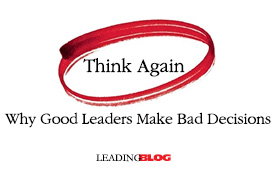
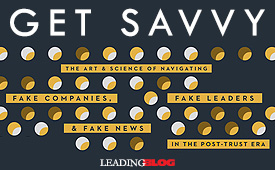
Posted by Michael McKinney at 12:09 AM
Permalink | Comments (0) | Management , Personal Development , Thinking
04.29.13

Are You a Giver or a Taker?
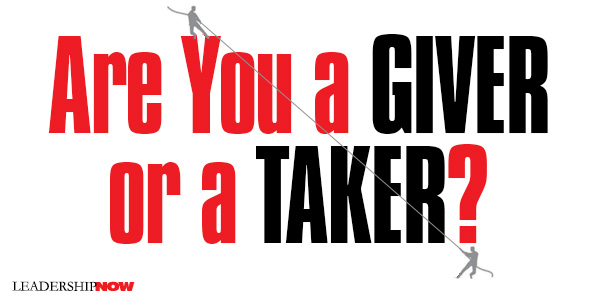
RESEARCH shows that givers sink to the bottom of the success ladder. Givers may make others better off, but they do so at their own expense.

But here's the thing, givers also land at the top of the ladder with takers and matchers in the middle. Adam Grant explores in Give and Take, what separates givers at the bottom and top. And the difference is not competence, but the kinds of strategies givers use and the choices they make.
Grant notes that in "purely zero-sum situations and win-lose interactions, giving rarely pays off…. But most of life isn't zero-sum."
The giver advantage is often hard to see in the short term because the "giver advantage grows over time." Chip Conley, founder of Joie de Vivre Hotels, explains, "Being a giver is not good for a 100-yard dash, but it's valuable in a marathon."
The Strength of Weak Ties
Givers connect with the people they know casually--their acquaintances. Although it is harder to ask them for help, they are the faster route to new leads and ideas. "The dormant ties provided more novel information than the current contacts. Over the past few years, while they were out of touch, they had been exposed to new ideas and perspectives."
The Five-Minute Favor : "You should be willing to do something that will take you five minutes or less for anybody."
Givers create a ripple effect around themselves. "Giving, especially when it's distinctive and consistent, establishes a pattern that shifts other people's reciprocity styles within a group." Givers take on the tasks that are in the best interests of the group.
Developing Others
As leaders, givers don't look for talent first, they focus on motivation. "Because they tend to be trusting and optimistic about other people's intentions, in their roles as leaders, managers, and mentors, givers are inclined to see the potential in everyone."
Takers have a general distrust of others. "Even when takers are impressed by another person's capabilities or motivation, they're more likely to see this person as a threat, which means they're less willing to support and develop him or her." Takers desire to be the smartest person in the room.
"The matcher's mistake lies in waiting for signs of high potential. Since matchers tend to play it safe, they often wait to offer support until they've seen evidence of promise."
Otherish Givers
Givers that end up on top are otherish. "Being otherish means being willing to give more than you receive, but still keeping your own interests in sight, using them as a guide for choosing when, where, how, and to whom you give." Giving energizes and is meaningful when it is done out of choice rather than duty or obligation—and otherish givers give more than totally selfless givers.
To avoid being taken, it is important to distinguish between givers and takers and those that pretend to be givers. Givers become matchers when they are dealing with takers.
Grant provides a lot of fresh examples—people from all walks of life. What he finds most magnetic about successful givers: "they get to the top without cutting others down, finding ways of expanding the pie that benefits themselves and the people around them. Whereas success is zero-sum in a group of takers, in groups of givers, it may be true that the whole is greater than the sum of the parts."
 | Every time we interact with another person at work, we have a choice to make: do we try to claim as much value as we can, or contribute value without worrying about what we receive in return? In the workplace, says Adam Grant, givers are a relatively rare breed. |
![]()
![]() Like us on Instagram and Facebook for additional leadership and personal development ideas.
Like us on Instagram and Facebook for additional leadership and personal development ideas.

Posted by Michael McKinney at 09:10 PM
Permalink | Comments (0) | General Business , Management , Personal Development
04.26.13

Learning the Wrong Lesson
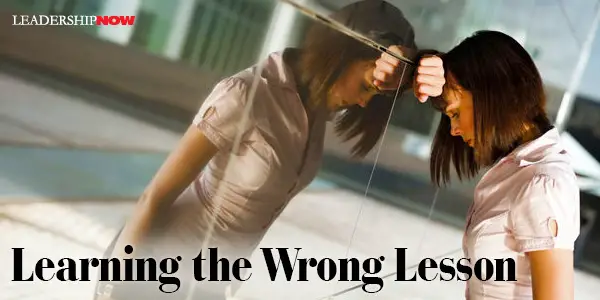
INJUSTICES HAPPEN.
Bad things happen to good people.
And when they do, we need to be sure we are taking away the right lesson. When something bad happens we naturally prefer to process the injustice in a way that makes us come out as the victim; we are right, they are wrong. Sympathy is in our corner.
But, if we are honest with ourselves, rarely do we find ourselves in a situation where we played no part. And if we have the courage to step back, we can see where we contributed to the perceived injustice.
In What You're Really Meant to Do, Robert Kaplan tells the story of a television producer that got passed over for a promotion. Initially, he took the easy way out. He chose to frame it as a "political" issue. "The people who get the jobs are the ones with the connections. All this talk about being a team player and helping others sounds nice, but it's not how people get ahead." This is the wrong lesson. Worse still is the fact that this thinking taints all of your thinking and behavior from this point forward and contributes to further "injustices" down the road. You undermine your "ability to exhibit character and leadership traits" that could help your career, says Kaplan. With this narrative in your head, you fail to do the things you should and when things don't go well for you, you create a self-fulfilling prophecy that further degrades your attitude and performance. At that point, everything you do is operating from a place of weakness and not your strengths.
He adds, the producer "found it easier to stew about the unfairness of it rather than take the more uncomfortable path of figuring out how he needed to improve." We all typically do this but we can't leave it there. Kaplan wisely counsels:
I urge people who have suffered a trauma that they experience as an injustice to take time out to process it. You need to reflect on what just happened, seek advice from others who witnessed it, and figure out whether you played a role in what happened…. Learning the wrong lesson, or failing to learn at all, may doom you to repeat some version of the same experience.
When you have been wronged, slow down long enough to learn the right lesson.
![]()
![]() Like us on Instagram and Facebook for additional leadership and personal development ideas.
Like us on Instagram and Facebook for additional leadership and personal development ideas.

Posted by Michael McKinney at 01:19 PM
Permalink | Comments (0) | Personal Development
04.18.13

Reinventing You – Becoming the Person You Were Meant to Be
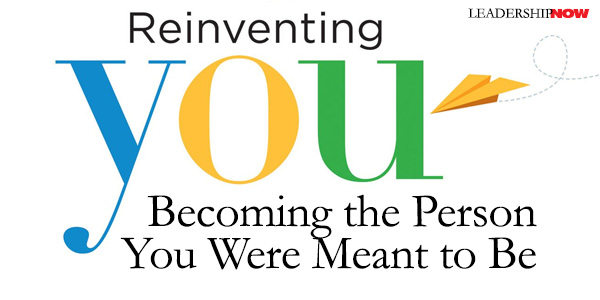
IT'S not uncommon to think of personal reinvention as being somewhat contrived or manipulative. But reinventing you isn't about becoming what you are not, but more of who you are. In Reinventing You, Dorie Clark says "it's about taking control of your life and living strategically. Who do you want to be? And what do you need to get there?" It's about making sure that our personal brands reflect the reality of our lives (Facebook notwithstanding).
KNOW YOURSELF
Clark takes you through the whole process, beginning with, of course, starting where you are. This is a vital step and not to be glossed over because many of us don't know where we are starting. We need you to understand our reputation and why it is what it is. She offers ways to do this, questions to ask, and how to conduct your own 360 interview—determining what those around you think about you. Very valuable material.
Next you need to research your next move or future destination and test drive it. (Did you know that there is a company that allows you to test-drive over 125 new careers to see if they are a fit?)
Once you have determined where you need to be, it is important to develop the skills you need. Clark explains how to do this and when to go back to school and when not to, and finding a mentor (someone who embodies what you'd like to develop and the person you'd like to become).
LEVERAGE YOUR POINTS OF DIFFERENCE
Rebranding yourself publicly means understanding first, what is unique about you. It may not be what you think. Often it's the mindsets and thinking that proved valuable in your current situation may differentiate you in a completely unrelated field. The examples of people that Clark provides, who have done just that, are very helpful in getting you to see your unique contribution.
From that you can build your narrative that pulls together the underlying themes that connect your professional experiences in a way that is obvious to others.
THE GAP
There is a time lag–a gap–between fully inhabiting the "old you" and the "new you." Clark writes that the "hardest part of making a transition can be bridging the gap between how others used to perceive you (and how you perceive yourself) and how you'd like to be seen moving forward." She says the only solution is to fake it till you make it.
I'm sure that we have all experienced this dynamic when making any personal change. When no one readily accepts the nice person you have finally become, it's easy to give it up and resort to the old habits of behavior. The answer is to keep projecting the new behavior until you're comfortable with it and others begin to accept it as the new "normal." Your commitment to the new you will eventually win people over.
Clark adds, "You need to be hyperaware of what you're doing and make sure you're signaling explicitly to the outside world what you're trying to build." This is where doing the homework in step one—know yourself—will help you to have the fortitude to press on.

Clark explains how to get the word out and how to prove your worth. She reminds us that rebranding is a process and not a one-time activity. It is important to "keep monitoring your reputation to ensure you're being perceived by others the way you'd like." This is a well done and thoughtful book that is valuable not just for rebranding yourself but also for managing your reputation in general.
 | Reputation management is not as straight-forward as it once was. The behavior is the same, the tools are different. In addition, says Dorie Clark, it's almost certain that at some point you'll need to reinvent yourself professionally—and ensure that others recognize the powerful contribution you can make. |
![]()
![]() Like us on Instagram and Facebook for additional leadership and personal development ideas.
Like us on Instagram and Facebook for additional leadership and personal development ideas.

Posted by Michael McKinney at 04:28 PM
Permalink | Comments (0) | Human Resources , Personal Development
03.20.13

Tipping Sacred Cows or How We Unwittingly Turn Our Virtues Into Vices
Tipping Sacred Cows by Jake Breeden is one of those bring-you-back-to-reality must-read books. It is about how we undermine ourselves and our organizations and get ourselves into comfortable ruts, by blindly following seemingly virtuous traits. It's often about taking our strengths too far or misapplying them.
Our values give us life and direction on one hand, "and on the other hand can steal our energy, effectiveness, and success. Like rocks in a river channel, these unexamined values can get in our way, impede our efforts, and even capsize us," writes Breeden.
Julian was given the reins of a company and immediately set about cutting waste and inefficiency—his core value. Profits temporarily rose but growth eventually stalled. He took the firm "from growing inefficiently to shrinking efficiently." In an effort to be efficient, he ripped the heart out of the organizational culture. Breeden advises:
Julian Fletcher shouldn't stop being efficient—he needs to start being more sophisticated. He needs to raise his game so he understands how efficiency can harmonize with other complementary leadership traits he needs to nourish.When leaders embrace beliefs without understanding and managing the potential side effects, the beliefs become sacred cows and get in the way. When leaders shut off their brains and blindly follow the bromides of conventional wisdom they set off a string of unintended consequences.
Breeden tackles seven sacred cows:
Balance: "Balance operates through a constant stream of choices." Balance is often thought to mean finding the middle ground. That's not balance, that's compromise. In order to find the middle ground, our choices "can too easily drift toward the middle in a cowardly compromise of nothingness. Balance backfires when it moves from being about bold, sometimes tough, choices to being about bland compromises."
Collaboration: Collaboration should be accountable not automatic. "The default state of working should be alone; leaders should collaborate only when they must. Depending on your role, that may mean a significant part of your job requires collaboration. But ask yourself the question: does this work really need more than me?
Creativity: We all like creativity. It's fun and exciting. But creativity needs to be useful and meet a real need or it's just narcissistic creativity—creativity to serve our legacy. "Creativity should be pragmatic, not prideful."
Excellence: Our pursuit of excellence "backfires when our high standards choke progress." Forcing excellence on the process rather than the outcome.
One point I would add to Breeden's section on excellence: excellence isn't about doing everything perfectly. That's perfectionism. We need to be careful not to confuse the two. Excellence is a way of thinking and includes making excellent mistakes, learning an excellent lesson and perhaps even going on to make a new and different mistake. If excellence is used as an excuse for indecision, avoiding all risk or unreasonable and immovable standards, it's counterproductive. Excellence is a term that we sometimes throw around too loosely. It's an excuse to cover perfectionism and/or controlling and self-centered behavior—my way or the highway.
Fairness: "Fairness backfires when some of our noblest instincts force us to ensure equitable outcomes rather than equitable processes." Keeping score and evening the score to make sure no one gets more than their "fair share" often leads to regrets.
Passion: Bad passion crowds out everything else causing you to ruminate on one thing at the expense of others. Healthy passion is part of a diverse set of traits. Passion backfires when it becomes obsessive.
Preparation: The problem here is with too much backstage preparation. Preparation is critical but sometimes the best work is done in real-time—onstage preparation—learning while you are doing.
To make all of this very practical, Breeden provides in each chapter seven steps to: Make Your Balance Bold, Make Your Collaboration Accountable, Make Your Creativity Useful, Make Your Excellence Meaningful, Train Your Brain to Focus on Process Fairness, Make Your Passion More Harmonious, and seven ideas to Take Your Preparation to Center Stage. Very helpful material.
"Sometimes, without realizing it, we use our most reassured values as an excuse to avoid the discomfort of actually leading." Organizational cultures and personal assumptions promote certain values. If these values are not examined from time to time in light of the overall purpose, then they can cause derailment or stagnation.
We can train ourselves "to avoid the waste that comes from the unintended consequences of unexamined conventional wisdom." We can learn to lead with wisdom.
| | Tipping Sacred Cows is an important book for anyone interested in applying virtues wisely. It provides understanding as to why things sometimes turn out so badly even though we did everything "right." |
Like us on Facebook for additional leadership and personal development ideas.
Posted by Michael McKinney at 07:54 PM
Permalink | Comments (0) | Management , Personal Development
03.18.13

Fred 2.0 – Leadership in Action
You are no doubt familiar with Fred, first introduced to us in The Fred Factor by Mark Sanborn. Fred exemplified an attitude of exceptional service delivered consistently with creativity and passion in a way that values other people.
Now Fred 2.0 brings us fresh insights, deeper understanding and wider application of the Fred Principles—and an update on the life of the real Fred Shea.
Fred 2.0 is about a specific way of approaching life and business. It's an attitude that extends far beyond customer service. It comes from within and says I will do extraordinary things because that's who I am. It's not a feeling—it's who you are. It is not dependent on the performance of anyone else.
Why Would You Live this Way?
Sanborn says it's because being a Fred enriches others, expands you, puts more life into your living, breaks the bonds of self-absorption, makes you more employable, offers you a better way to live, creates a positive influence, and is more fun.
"Creativity is an essential ingredient in delivering extraordinary results," writes Sanborn. Being creative is doing something different that adds value. More often than not, it's the little things we notice that can be done better. This applies not only to the "things" we do, but also to our relationships; how we respond and interact to those around us.
Sanborn shows very specifically how to build better relationships, elevate the experience for those we come into contact with, how to build a team of Freds and how to instill the Fred approach in your kids philosophy of life.
The Fred Philosophy is Good Leadership
The Fred philosophy is ultimately what good leadership is all about. It's a battle against mediocrity says Sanborn.
The first job of leadership is to help people see their significance. Leaders recognize that those who feel insignificant rarely make significant contributions. An effective leader is able to show people that they are significant in ways they may not realize.
The Fred philosophy means:
• Leading by example
• Starting with what's right instead of what's wrong
• Encouraging people to try
• Asking for and sharing good ideas
• Removing barriers and obstacles
• Being a champion of those around you
• Giving people the freedom they need
• Teaching the Fred philosophy consistently
• Recognizing and rewarding
• Make the process enjoyable
"It's our choice whether we'll use our time, effort, and talents to turn ordinary work into something extraordinary." writes Sanborn. It begins as always, with integrity. If you value it, those around you will too.
Fred 2.0 will show you the thinking behind extraordinary leadership and apply it in every area of your life. "When you know what is important to you in your life and work, you should apportion your talents and efforts so you can give the best you have to those things." Love what you do and love the people you do it with.
| | Fred 2.0 makes a significant contribution to focusing our minds on what leadership is all about. By living it and sharing it you can build a team of Freds in your organization, community and family. |
SPECIAL OFFER: Visit Mark Sanborn's Fred 2.0 web site now to learn more and gain instant access to a Fred 2.0 "EXTRAordinary Results" Resource Kit, free with purchase of Fred 2.0.
Like us on Facebook for additional leadership and personal development ideas.
Posted by Michael McKinney at 05:17 PM
Permalink | Comments (0) | General Business , Human Resources , Leadership Development , Personal Development
03.12.13

Leadership and the Art of Struggle: 5 Things You Can Do
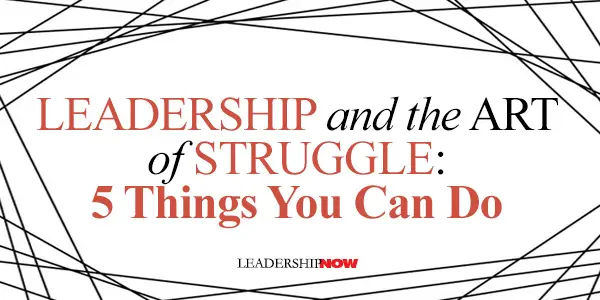
STRUGGLE is a part of any human endeavor and leadership is no different. The problem is we view struggle as a negative. But struggle is how we grow. Without them we can't reach our full potential as leaders.

We like to think of our leaders as flawless. We like to be perceived as flawless—or at least we like people to think we have everything under control. But as Joe Badaracco has pointed out, "leadership is a struggle by flawed human beings to make some important human values real and effective in the world as it is."
It may sound counterintuitive, but considering the benefits illuminated by Stephen Snyder in Leadership and the Art of Struggle, we should welcome it as an important element of the leadership process and our own personal development. Snyder writes that we should face struggle "head on—not hiding from it or feeling shame—because struggle is the gateway to learning and growth." It can also help us to discover our purpose and meaning and develop the adaptive energy necessary to sustain our leadership for a lifetime.
Struggles have three defining characteristics:
Change: Every struggle is triggered by some type of change.
Tensions: Change creates a natural set of tensions.
Being out of Balance: Change and its ensuing tensions throw a leader off balance. This may happen without us even being aware of it, but acknowledgement of it is central to regaining control.
In the world we live in today, this is a common occurrence often leading to burnout unless we learn to see struggle through a different lens. Snyder recommends:
Adopt a growth mindset. The first step in accomplishing this is through reflection—being aware of what is going on around you. Snyder's former colleague at Microsoft, Frank Gaudette, used to say: "I reserve the right to wake up smarter every day." A good mantra to make our own.
Center your mind, body and spirit. We all need some way to anchor ourselves and gain perspective that we practice daily like exercise and diet, prayer, connecting with nature, meditation, and/or journaling.
Build your support community. "Create a community of people whom you can connect and bond with and from whom you can seek advice and feedback."
Overcome your blind spots. Blind spots by their very nature are hard to recognize. And they are frustrating because they blind us from seeing why people may be responding to us in counterproductive ways—leading us to finger pointing rather than personal responsibility. "Blind spots," writes Snyder, "are the product of an overactive automatic mind and an underactive reflective mind."
A fairly common blind spot Snyder calls the Conflict Blind Spot. This blind spot can cause someone to interpret every interaction through a distorted lens. It reinforces the perception that the other person is wrong and we are right.
Recommit, pivot, or leap. When we struggle we have essentially three options. The first is to recommit and stay the course. The second is to pivot and make a course correction. And third is to leap into uncharted territory far beyond our comfort zone. Choosing the right option requires that we examine ourselves and determine which choice is most consistent with our personal values or mission statement.
Every struggle is a chance to learn and to confront who we are and what we are becoming. Seen in that light, they are a gift. And our ability to deal with our own struggles effectively has an impact on those around us. Not only does it create a more positive environment to function in, but it provides a constructive example for others to follow.
Snyder has written an outstanding and practical book to help us to rethink the challenges and problems we face along the way. One of the best you'll ever read on the topic.
(The Adaptive Leader Profile is available from Snyder Leadership Group.)
 | Struggles are an inevitable part of the leadership journey. With every episode of struggle, there is a learning opportunity. Snyder offers insights as how to accept and reconcile the struggles you find in your own leadership journey. |
![]()
![]() Like us on Instagram and Facebook for additional leadership and personal development ideas.
Like us on Instagram and Facebook for additional leadership and personal development ideas.

![]()
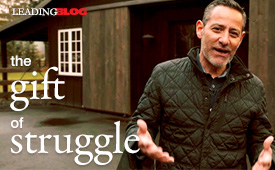

Posted by Michael McKinney at 10:27 PM
Permalink | Comments (0) | Leadership , Leadership Development , Personal Development , Problem Solving
02.13.13

Rebooting Work: How to Make Work— Work for You
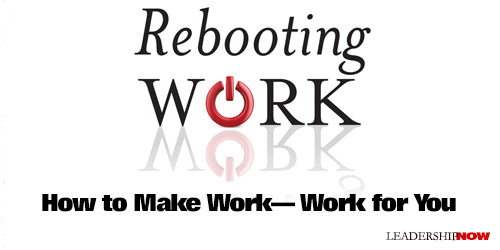
Rebooting Work by Silicon Valley legend Maynard Webb and Carlye Adler is a sensible look at the changing nature of the workplace and how you can use emerging technologies to take charge of your career. To become a CEO of your own destiny .
Less than half of Americans (47 percent) are satisfied with their work. Companies are changing too. They can no longer provide the safety nets that were expected in the last century. Employees must become more self-reliant. That of course means a workplace that rewards people for their performance rather than their time in. An organization that supports entitlement over results, writes Webb, "can limit growth and opportunity."
Giving someone a leg-up is one thing, entitlement has a permanence to it that both hinders employees and harms companies and neither performs up to their maximum potential.
Webb believes that technology presents us with an opportunity. It has the power to enable people to do something about their dissatisfaction with work and move on to careers that can provide both fulfillment and financial security. "Understanding and embracing today's technological trends is the fastest way to travel to the career of your dreams."
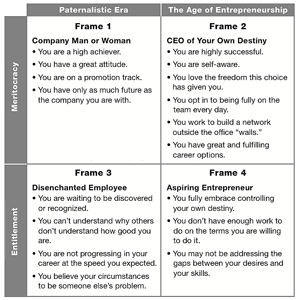 Webb presents us with four ways of looking at work. We may move from frame to frame but we tend to operate in one. They are Company Man or Woman, CEO of Your Own Destiny, Disenchanted Employee, and Aspiring Entrepreneur. Where we should all be headed, states Webb, is to the mindset of the CEO of Your Own Destiny. We are living in the age of the entrepreneur.
Webb presents us with four ways of looking at work. We may move from frame to frame but we tend to operate in one. They are Company Man or Woman, CEO of Your Own Destiny, Disenchanted Employee, and Aspiring Entrepreneur. Where we should all be headed, states Webb, is to the mindset of the CEO of Your Own Destiny. We are living in the age of the entrepreneur.
Prior to the Civil War, most Americans worked in agriculture or as small merchants or tradesmen. Success was the result of self-direction, self-motivation, and self determination. In a way, everyone was self-made.The Industrial Revolution brought opportunities to work outside the home, reversing the entrepreneurial spirit and giving rise to the paternalistic company, but now the Age of Entrepreneurship is bringing it back.
Today personal and professional development is on the employee. It "requires you to be relevant every day and to be voted on to the team you want to play with." But with this freedom come accountability. In an entrepreneurial age it is more important than ever that you think like a leader—no matter where or at what level you work.
As research indicates, many people find themselves in the Disenchanted Employee frame: you are waiting to be discovered or recognized, you don't understand why others don't see how good you really are, your career isn't going as expected, and you believe your circumstances are someone else's fault.
This kind of thinking is not just unproductive, it feeds on itself and keeps you just where you don't want to be. One of the most important things you can do is to get a mentor; someone to help you see the reality of your situation and offer constructive advice to get you moving again. Webb also offers these ideas:
- Make sure you do something every day to show others you deserve to be a part of their team.
- Have a great attitude. You might be brilliant, but if you are hard to manage, it's easy to find someone else.
- Work for a higher purpose. Your job has more impact than just making money.
- Pick your battles. Fight only about things that are really important and that will move the needle.
- Don't be afraid of change.
- Be brutally honest with yourself. Know your strengths and weaknesses. It does you no good to kid yourself here.
- Don't confuse action with traction. Focus on outcomes, not face time.
- Focus on expanding your sphere of influence; it will give you the opportunity to have an impact over more areas.
- Take time to sit back and reflect on where you are and where you want to be. Make time for a "compass check."
- Be brave and be bold. Most things worth doing are hard.
Technology is pushing flexibility in the workplace. Technology doesn't replace the need for human contact but it can make work more efficient and face time more rewarding. It provides the opportunity to create how you do your work in new ways if you are willing to perform. Outcomes become more important than ever. If you give more you will receive more.
Of Related Interest:
![]() Dear Founder
Dear Founder
![]()
![]() Like us on Instagram and Facebook for additional leadership and personal development ideas.
Like us on Instagram and Facebook for additional leadership and personal development ideas.
Posted by Michael McKinney at 01:55 PM
Permalink | Comments (0) | General Business , Human Resources , Marketing , Personal Development
02.12.13

Where Winners Live

Where Winners Live by Dave Porter and Linda Galindo is a book oriented towards sales professionals, but the issue it deals with is important (vital) to us all—personal responsibility.
Winners live in a mindset of 100 percent accountability. Accountability, say the authors is taking responsibility for the "success and failure of everything you do—for your choices, behaviors, and actions— before you know how it will turn out" (even if you're working with someone else).
If you're not living the personal responsibility mindset where winners live then you might be displaying what the authors call loser characteristics:
The Victim: If you live in a world where circumstances beyond your control dictate your success, you have no power.
The Finger-Pointer "owns" only the good. If it is good, I did it; if it is bad, you did it.
The Robbery Victim always blames someone else for undermining him, for getting something he deserved instead, or for scoring a win at her expense.
The Coulda-Woulda tries to take credit for what she didn't earn by saying she easily could have, if only … (take your pick of excuses).
The Guess Man knows that there is no accountability without clarity. The more vague he is with his instructions, the easier it will be to blame someone else when the job doesn't go well.
Where do you live?
![]()
![]() Like us on Instagram and Facebook for additional leadership and personal development ideas.
Like us on Instagram and Facebook for additional leadership and personal development ideas.

Posted by Michael McKinney at 10:06 PM
Permalink | Comments (0) | Personal Development
02.04.13

Put Your Minutes Where Your Mouth Is
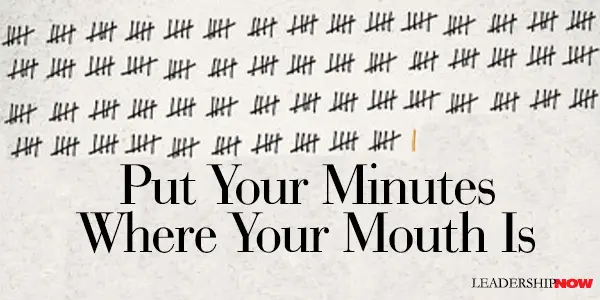
A HUGE difference between the leaders who make things happen and those who do not is how they prioritize their time.
Leaders who make things happen schedule their lives around what needs to get done. Leaders who don't make things happen do the exact opposite, scheduling what needs to get done around their lives.
The difference is priorities.
If meeting your deadline isn't more important than going to the football game or getting eight hours of sleep, then you probably don't have what it takes.
I'm not saying that football is bad. I'm just saying that I simply cannot go. I just can't get it all done in time and still catch a four-hour game. If you want to lead a team of people who are so invested in your vision that they are willing to sacrifice certain things to help you accomplish it, then the sacrifices must first start with you.
Ask yourself this question: What are most people spending time on that I could probably live without?
You must be intense about finishing on a deadline, and that might mean sacrificing a lot of recreational things.
The key is to know thyself.
You know what you need to get done, and you ought to know how long it will take you to finish it. If you're serious about making it happen, you must design days around completing what you know needs to be completed in order to make things MOVE.
Here's another hint: 40 hours a week won't cut it.
If you're spending half the "workday" cleaning out your inbox, maybe it's time to start waking up at five. Leadership is not exclusive to eight-hour windows. You have to set the tone. If you possess a 9-5 mentality, so will the people you are leading.
Every leader I've met who is really killing it puts in an average of around 80 HOURS PER WEEK!
Leaders have to think like entrepreneurs. It's funny to me that I've never seen an entrepreneur just standing around the water cooler with a cup of coffee. The doers don't have time for that; they're too busy grinding away.
The bottom line is that success is built by chunks of time. And a successful leader has that time built in.
If you're truly serious about making it happen, put your minutes where your mouth is.
Of course, if you are that serious, you probably already do. Keep it up!
What techniques do you have for blocking out distractions and getting things done?

Robert D. Smith is the author of 20,000 Days and Counting, a crash course in living each day with maximum purpose and intensity. He also writes about entrepreneurship, personal growth. Most people measure their lives in years. But how would our thought processes change if we measured our lives in days? The average American lifespan is 28,649 days. He asks, "What if you were able to accomplish MORE TODAY than most people accomplish all year?" Decisions you make right now can change your life forever. …We do choose how we will live. May you have a glorious ending by beginning today.
![]()
![]() Like us on Instagram and Facebook for additional leadership and personal development ideas.
Like us on Instagram and Facebook for additional leadership and personal development ideas.

![]()


Posted by Michael McKinney at 10:46 PM
Permalink | Comments (0) | Personal Development
01.28.13

It's Never About the Bike: A Lesson from Lance Armstrong
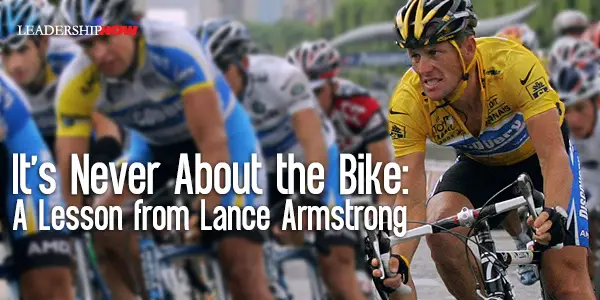
LANCE ARMSTRONG once wrote: "I believed I had a responsibility to be a good person, and that meant fair, honest, hardworking and honorable. If I did that, if I was good to my family, true to my friends, if I gave back to my community or to some cause, if I wasn't a liar, a cheat, or a thief, then I believed that should be enough."
Often we begin the race with solid values. We begin with values that drive our behavior based on intrinsic rewards. But over time, something can happen if we are not careful. Competitive pressures weigh on us. The chance for extrinsic rewards like money and power loom larger. If we have not built the strength of character to resist those temptations, we can easily become the person we don't recognize.

Success also seduces us. It brings with it its own kind of pressure. When we win we get rewards from unexpected places. Strangers think we're amazing. They think we're smarter than we are. They want our opinion about things we really know very little about. It feels good. We're on a roll. We want to keep this going. It now becomes about the win. No longer driven by intrinsic rewards, our focus turns to extrinsic values and rewards like money, power, and fame. Our values become defined by what is going on outside rather than what is going on inside of us. And our choices reflect that shift.
The fact is, success changes nothing. Our legacy is built on the how not the what. It's never about the bike.
Without a strong hold on intrinsic values like humility, respect, truthfulness, patience and honor, we leave the door open for corruption and fraud. Changing what we value, changes everything. More to the point, it changes the choices we make. Choices build the life we lead and the legacy we leave.
When it's all about the win, we lose. Good values and solid character build a firm foundation for wins that can't be taken away.
![]()
![]() Like us on Instagram and Facebook for additional leadership and personal development ideas.
Like us on Instagram and Facebook for additional leadership and personal development ideas.
![]()
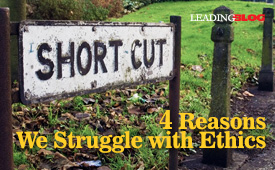

Posted by Michael McKinney at 11:09 PM
Permalink | Comments (0) | Ethics , Motivation , Personal Development
01.14.13

Why We Find it Hard to Change Our Behavior
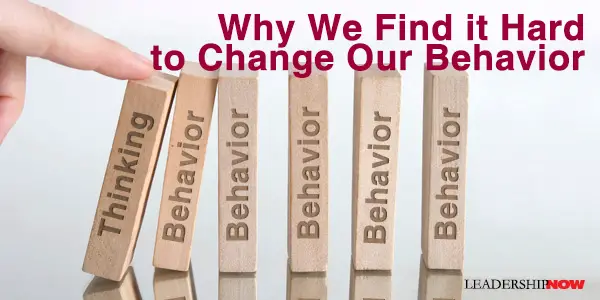
WE KNOW every behavior begins with a thought. So if we want to have lasting change, the beginning point has to be our thinking.
Behavioral change is only surface change if we don't first change the thinking behind those behaviors. And it won't stick. It will keep coming out in so many ways we won't be able to keep up with it because we haven't changed the thinking behind it.
When we look at our behavior we have to understand that there is a thought going on in our heads that is tripping us up. And we have to change that first. Or we're working on the wrong thing.
The question becomes, "What thoughts do I need to change to make my behavior change?" New behavior will automatically follow a change in thinking. One right thought can correct a lot of bad behavior.
What am I thinking that isn't allowing me to see things as I should? As human beings, we latch on to certain ideas and assumptions and they blind us from seeing other options and responses to what life throws at us. We get ideas in our head that can literally block us from seeing other perspectives.
Change doesn't happen in a moment. We've had these patterns of thinking and behavior for a lot of years. We have to unlearn some behaviors and then learn and put into practice the new thinking and resulting behaviors. And it just takes time.
It's right thinking over time that brings about lasting change. It's a process. It's a long history of repeated behaviors in the same direction that builds character.
We have to wake up every day and know that we have a tendency—not just because of our life experiences, but also because of the way that we have chosen to respond to them—to repeat a certain set of behaviors over and over again. We've got to remember that and change the thinking that supports these behaviors.
We've got a lot of set patterns in our heads that we want to return to, that we have become comfortable with, that we can justify, that we can blame on something someone else did.
That's why we have to make a point of reflecting on our behaviors and on the impact we have on the people around us. And learn from it. And then go to work on the thinking behind the behaviors we want to change.
It's not what you do that needs to change, it's what you think that needs to change.
First change your thinking. The behavior will follow. It all starts with a thought.
![]()
![]() Like us on Instagram and Facebook for additional leadership and personal development ideas.
Like us on Instagram and Facebook for additional leadership and personal development ideas.
Posted by Michael McKinney at 06:13 PM
Permalink | Comments (0) | Change , Personal Development , Thinking
11.28.12

How to Avoid the Artificial Maturity Trap
Children today are overexposed to information far earlier than they are ready and underexposed to real-life experiences far later than they are ready producing a kind of artificial maturity. Tim Elmore writes in Artificial Maturity, that "it looks so real because kids know so much, but it's virtual because they have experienced so little." He continues:
Today, because information is so prevalent, our kids assume they have [experiential knowledge] when they only have [informational knowledge]. With an abundance of knowledge, their confidence can soar, but it's based on a virtual foundation. Without experience, it's easier for knowledge to produce judgmental attitudes, bullying, and arrogance.
With all of this information kids think they are mature. And unfortunately, we do too. That's part of the problem. How often have we seen a "smart" child and thought, "They are sure mature for their age." Intelligence and maturity are not the same thing. (Of course, we see this same issue in "adults" too.) Elmore writes, "Except in rare cases, their knowledge has only entertained them. It has not produced anything real."
Elmore provides reasons for why artificial maturity has become so widespread, but his real focus is what we can do about it. To transform artificial maturity into authentic maturity, we must concentrate on four areas says Elmore:
Emotional Intelligence. Mature, healthy people manage their emotions. This means developing self-awareness, self-management, social awareness, and relationship management.
Character and a Sense of Ethics. Mature, healthy people live by a set of values and principles. They don't merely react to what is going on around them. They have self-discipline, emotional security, core values, and a clear sense of identity.
Strength Discovery. Mature, healthy people who become the best versions of themselves are one's who've stopped trying to do everything and focused on what they do very well. This means developing their natural talents and gifts, knowledge base, heartfelt passions, and acquired skills.
Leadership Perspective. Mature, healthy people live lives that don't just revolve around themselves. They invest their lives in something beyond themselves. A leadership perspective involves a personal vision, responsibility, compassion, and initiative.
Developing maturity is centered on four key areas :
- Provide autonomy and responsibility simultaneously
- Provide information and accountability simultaneously
- Provide experiences to accompany teens' technology-savvy lifestyles
- Provide community-service opportunities to balance self-service time
In addition, Elmore believes there are four debts we owe our kids: clarity (fosters focused direction), transparency (fosters validation and vulnerability), consistency (fosters trust and assurance), and boundaries (fosters security).
There is far too much information in this book to cover it here, but here are a few more ideas from Elmore:
• Start inserting age-appropriate responsibility into your children's lives right away. Avoid indulging and overprotecting them and creating hyperinflated egos. We are doing a disservice to young people if we remove their chance to fail.
• Enable them to take control of their lives; to boss their calendars. Hold them accountable and responsible for the choices they've made and don't bail them out. Let them see that failure isn't final and poor judgment is not necessarily poor character.
• Connect them to people (adults) outside their peer group. This generation doesn't need you for information (they can get that without you), but they do need you for interpretation. They need mentors to help them make sense of the information and the world around them.
• Communicate that there is meaning even in the small, mundane tasks. Give them a sense of the big picture and how all the little things they do fit into the big picture of history, or of the organization, or of their community.
Authentic maturity is a leadership issue. Elmore concludes, "Our kids have what it takes inside of them, if we'll just take them seriously and equip them for the future. As they enter adolescence, we must begin to treat them as young adults and train them to be both autonomous and responsible. Then, I dare you to stand back and watch them amaze you."
| | Artificial Maturity is an excellent book to help us understand maturity—what it is and how it is developed. Not only is it helpful for developing it in children but the issues raised are good to reflect on for our own development. |
Of Related Interest:
5 Leadership Lessons: Tim Elmore's Generation iY
Are You Mature?
Cause and Effect
Like us on Facebook for additional leadership and personal development ideas.
Posted by Michael McKinney at 08:10 AM
Permalink | Comments (0) | Personal Development
11.19.12

Does This Doorframe Make My Head Look Big?
Failure is not an option. And we learn a lot if we take the time to learn from our mistakes. But gain much more when we can learn from the mistakes of others before we find ourselves confronted with the same issues.
The Wisdom of Failure by Laurance Weinzimmer and Jim McConoughey, examines the lessons learned by studying thousands of executives in hundreds of companies. They have discovered three areas where aspiring leaders fail:
Unbalanced Orchestration (leadership failures at the organizational level)
- Trying to be all things to all people
- Being in business you have no business being in
- Entrenched in efficiency: forgetting to put effectiveness first
Drama Management (leadership failures at the team level)
- Leaders who rule by bullying
- Problems with dysfunctional harmony—when you want consensus too badly, you miss out on valuable debate
- Distracted purpose
Personality Issues (leadership failures at the individual level)
- Hoarding power and responsibility
- The Destructive path of disengagement
- Problems of Self-absorbed leaders
The authors report that the final lesson, "Does this doorframe make my head look big?" is the most damning mistake a leader can make. The mistake of self-absorption. It's not surprising since it is the antithesis of a good leader.
The goal of the self-absorbed leader "isn't necessarily status, position, or promotion. Rather, their goal is to have things work out the way they think they should work, because, well, they are the greatest." This is an easy mindset to slip into. And unfortunately, it is almost impossible for a self-absorbed leader to recognize that they are just that. They need outside help, but when confronted, they are sure that the observation is of course, wrong.
Underneath is all, self-absorption is "rooted in low self-esteem and a feeling of insecurity, as well as a profound discomfort with or disregard for what others bring to the table." It is marked by "talking big, a sense of entitlement, a sense of infallibility, a lack of empathy for others, an intense desire to win at all costs, one-upmanship, a know-it-all attitude, and an inability to listen."
Michael Bryant, CEO of Centra Health explained it this way: "A good leader is like a coach of a basketball team. It is not important for the leader to score the points. It is important for his team to score the points. It's not rocket science! So the one key to being an egoless leader is to understand the paradox….Self-absorbed leaders never get the paradox."
Like us on Facebook for additional leadership and personal development ideas.
Posted by Michael McKinney at 10:55 PM
Permalink | Comments (0) | Leadership Development , Personal Development
11.05.12

Next Time You're in a Slump, Try Stillpower
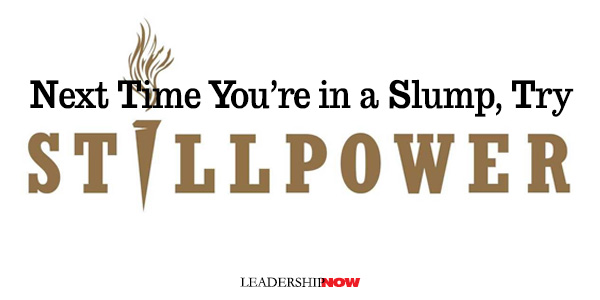

WHEN our performance is in a slump or we get stuck, we tend to become anxious and reach for any quick fix or technique that promises to get us out of it. We apply more effort, focus, and willpower. And when all of that doesn't work, we get even more anxious and our performance heads even further south.
Instead, when we get stuck we need to rely on Stillpower, not willpower says Garret Kramer. Stillpower is the ability to return to a clear mindset after we get into a muddled mental state—a low state of mind. It's knowing that "all sentiments are temporary since they originate from your own thoughts and moods. Stillpower comes from knowing that self-worth has nothing to do with winning, losing, parental approval, money, fame, or anything external to you."
When we get into a low state of mind we need to do nothing. It's when we operate from a low state of mind that we usually make mistakes, poor judgments, miss opportunities and dig ourselves deeper into whatever hole we are digging. "Once you understand," says Kramer, "that as human beings we form our perceptions from the inside out, that the quality of our thinking and level of awareness move up and down independent of our circumstances, you will see that it makes little sense to work yourself through a temporarily low state of mind." But that's often exactly what we do.
When we run into trouble that's a sign to step back—not a call to action. Negativity is a sign to slow down. We can't perform at an elevated level when we are in a low state of mind.
A seemingly unresolved issue of today has nothing to do with erroneous thinking of today. And until an individual comes to this realization, he or she will always fall prey to the conditions of life itself.Here's what many of us ought to consider: All human beings exist, from moment to moment, at varying levels of psychological functioning. When this level of functioning is low, most often for no tangible reason, we view life through a dirty lens and are prone to deviant behavior—if we act. Once this principle is grasped, we see that navigating smoothly through life doesn't have to be so complicated, and unlike the belief of many counselors and coaches in the self-help world, it has nothing to do with personal history.
Awareness is key. When you are aware of your thoughts and feelings in the moment and when necessary, allow your thinking to clear, then you will have the clarity to act; "insights will flow and answers will become obvious." He adds, "Insight is infinitely more powerful than willpower. Actually, insight, or having a new idea and/or a change of heart, erases the need for strength or force of will of any kind."
COACHING
Kramer notes that when you are coaching or counseling, you need to be operating from a higher level of thinking than the person you are talking to. "What comes out of your mouth is much less significant than the level of mental functioning from which the words are spoken." We need to interact with people from a state of mind "brimming with love, compassion, and selflessness….External how-to resources are not all that necessary; love will provide all the direction you seek."
Leadership is an all-in proposition. Done right, it's a lot of hard work. To cut ourselves some slack, we too often rely on external gimmicks and techniques rather than the messy work of a real relationship.
IDEAS TO CONSIDER
• "We perform better when we get caught up in the experience, rather than when we make the experience about us….When we focus on a personal prize, our options narrow; when we relish the process, our options expand."
• "When we act from clarity, it is impossible to get weighed down by judgmental outcomes."
• "When we succumb to our errant thoughts or closed-off moods, judge another person, and then act from this egotistical perspective of insecurity, it is practically impossible to find long-term success."
• "Every failure, every mistake, every loss—occurs to clarify our path, not to obscure it."
• "You will never wrestle with a choice when your level of consciousness is high."
Leaders will find a lot to consider here. Stillpower is one of those books that makes you reconsider your approach on many things. While Kramer might seem to be throwing the baby out with the bathwater at times, he doesn't overturn conventional wisdom as much as he calls us on it when we misapply it. It is the perfect prescription for those that have a need to control their world and the people around them.
It is important to note too, that looking within for answers is fine if you have consciously put something there to draw-on in the first place. Good flashes of insight are only produced when there is something good to draw upon. Choose your sources wisely.
![]()
![]() Like us on Instagram and Facebook for additional leadership and personal development ideas.
Like us on Instagram and Facebook for additional leadership and personal development ideas.

Posted by Michael McKinney at 03:57 PM
Permalink | Comments (0) | Human Resources , Personal Development , Thinking
10.03.12

Feedback Can Be Fun
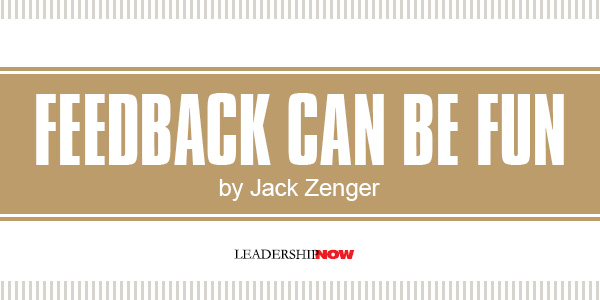
WHY DO PEOPLE all over the world enjoy participating in games and sports? Why have games and sports been going on for not just centuries, but millennia?
One of the theories is that they provide immediate feedback.
The batter in a neighborhood game of softball knows immediately if he hits or misses the ball. If it is hit, it is clear whether it is in bounds or a foul ball. It's clear if it bobbles into the infield or sails over the fence for a home run. The tennis player learns immediately how the angle of the racket and the strength of the swing can cause the ball to be returned too low and hit the net or if it is hit too high and too hard it goes out of bounds. Indeed, a good part of the joy and appeal of every sport is this immediate feedback. It also enables the player to make an infinite number of adjustments necessary to improve performance.
It's important for organizations to become feedback-rich environments in which information flows freely and is accepted and acted upon. It is obviously not enough to simply have feedback given if it is angrily rejected or dismissed because of the source. There is a Swedish proverb that says, "With the eating comes the appetite." We have found that the more that feedback is shared in organizations, the more easily it is digested and acted upon.
Attitudes about feedback in companies that have been doing 360-degree feedback for 25 years are extremely different from those doing it for the first time. Within organizations that routinely provide feedback, there is a much higher degree of eagerness to get data. At the same time, there is a calm and ease about being able to dismiss the occasional outlier number or comment.
Good things come from asking for feedback. Seeking the opinions of others has a host of benefits. It conveys respect. It reduces barriers between the levels. Managers learn valuable information that comes in no other way. Empirically it reduces by 10 percent the number of employees who intend to leave.
Clearly the ideal is for managers to both give and get, but if you had to choose one or the other, our data suggests that it is better to receive than to give.

Jack Zenger is the CEO of Zenger/Folkman, a strengths-based leadership development firm. He is the author and co-author of 13 books including including How To Be Exceptional: Drive Leadership Success by Magnifying Your Strengths, The Extraordinary Leader, Turning Good Managers into Great Leaders and The Inspiring Leader: Unlocking the Secrets of How Extraordinary Leaders Motivate, along with his newest book Speed: How Leaders Accelerate Successful Execution. Connect with Jack at twitter.com/jhzenger.
![]()
![]() Like us on Instagram and Facebook for additional leadership and personal development ideas.
Like us on Instagram and Facebook for additional leadership and personal development ideas.

![]()


Posted by Michael McKinney at 11:01 PM
Permalink | Comments (0) | Personal Development
09.26.12

You According to Them
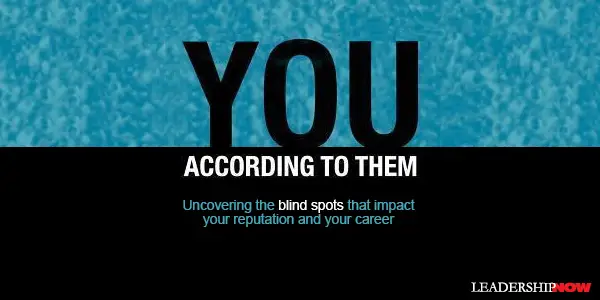

SARA CANADAY addresses a vital issue for leaders in You According to Them: self-awareness. While it is fundamental to our growth, we usually don't make the time to explore it. And too frequently, we dismiss feedback or make excuses for the insights we receive into our own behavior.
How we are perceived matters more to our leadership effectiveness than our intentions. We must not only seek out how we are perceived by others but we must do something with the feedback we get. Canaday calls this applied self-awareness . In other words, using that information to adjust our behavior and close the gaps between our intentions and how others perceive us.
Typically, our blind spots, our perception gaps exist in those areas where we have overemphasized our strengths. "For instance," writes Canaday, "do your colleagues think of you as assertive? Or overbearing? Collaborative or manipulative? Gregarious or obnoxious? There's a fine line between these perceptions, but you can see why the subtle differences can have a huge impact on your career and your future."
Canaday discusses in detail nine common perception gaps and how to begin to deal with them:
- Don't Fence Me In: Highly Productive and innovative? Or rebellious and uncooperative?
- Intellectual Snob: Intelligent and well-qualified? Or condescending and elitist?
- Frozen Compass: Too Direct: Decisive and candid? Or abrupt and insensitive? Or maybe you're Not Direct Enough: Supportive and personable? Or soft and Lenient?
- Dust in my Wind: Extremely energetic and driven? Or relentless and unrealistic?
- No Crying in Baseball: Composed and steady? Or robotic and indifferent?
- Safety Patrol: Methodical and compliant? Or inflexible and overly cautious?
- Faulty Volume Control: Volume Too Low: Understated and humble? Or bland and forgettable? Or perhaps you're Volume Too High: Assertive and enthusiastic? Or self-serving and inappropriate?
- Passion Pistol: Spirited and passionate? Or intense and overzealous?
- Perpetual Doer: Remarkably reliable and high performing? Or one-dimensional and over-functioning?
Self-awareness flourishes in a person that accepts personal responsibility. Without it, we only seek to justify what we do. We never quite get to dealing with those areas where we mean well but are coming across badly.
Whether we like how we are coming across to others or not, it is our reality. It is crucial that we seek out our perception gaps and deal with them if we are to be effective and grow as leaders. "No one is so amazingly self-aware that he or she can clearly see and eliminate every potential perception disconnect before it occurs. Those who are the most successful have just learned how to read the diverse people and situations they encounter and respond appropriately."
You According to Them is a great place to start. Canaday places an emphasis throughout this book on "actively working to understand our reputations and artfully managing the perceptions that directly impact our careers."
![]()
![]() Like us on Instagram and Facebook for additional leadership and personal development ideas.
Like us on Instagram and Facebook for additional leadership and personal development ideas.

![]()


Posted by Michael McKinney at 06:04 PM
Permalink | Comments (0) | Personal Development
09.24.12

Wisdom from The Leader's Climb
The Leader's Climb by Bob Parsanko and Paul Heagen is a business fable about learning to counteract the growing pressure to go too fast, fight too much, and force too many decisions.
There is an alternative to this pressure we all feel. Throughout the story—an exercise in itself to create space, slow down and become more aware—the author's stress three qualities to strengthen your leadership: Awareness (slowing down), Acceptance (embracing reality), and Abundance (considering multiple options).
The Leader's Climb is well written and nearly everyone will recognize patterns of behavior found in the story's main character Adam, in themselves. The authors provide a lot to think over. Here are some excerpts:
It's not hard to see the impact on organizations of leadership that focuses primarily on speed, efficiency, results, and financial return. The same issues come up over and over again. The tyranny of the urgent becomes a substitute for planning and prioritization. Snap decisions with hidden costs replace careful consideration with obvious time requirements. Mindless compliance replaces community and commitment. Activity that looks like momentum disguises chaos. Purpose is sacrificed to performance at any cost.
Removing what does not matter is the first step in figuring out what does.
I'm afraid we often find it easier to fight an obstacle or pretend it's not there, rather than accept it for what it is and use it to accomplish something worthwhile.
Acceptance does not mean quitting.
Activity is not the only sign of progress.
[Personal responsibility and self awareness.] I'd be a little more careful about seeing who is on the way before you throw your words around. Someone might get hurt.
[The challenge.] You're becoming more consciously aware of what's going on around you and what's going on within you. We just need to find where they fit together.
Most of the time, when people think they are at cross-purposes, it is simply that they don't know each other well enough. So they speculate or assume, which almost always goes to the wrong place.
Nothing's authentic when you try too hard and others see right through it.
Like us on Facebook for additional leadership and personal development ideas.
Posted by Michael McKinney at 10:34 PM
Permalink | Comments (0) | Personal Development
09.07.12

Adaptability: The Art of Winning In An Age of Uncertainty
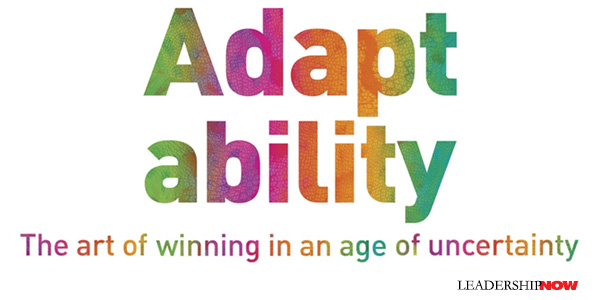
MAX MCKEOWN accurately argues in Unshrink that our beliefs have shrunk us. They have limited our responses. And it profoundly affects our ability to adapt.

Adaptability is a book about how people adapt. It is about how to win more often. "In the future," writes author Max McKeown, "you can try to maintain what you already have, or you can attempt to transcend the constraints of your situation."
Of course, to begin, you have to recognize the need to adapt. That's not always as easy as it sounds mainly because we have to admit that something isn't right. You have to understand what's going on. Enthusiastic ignorance often rules the day. And so as, McKeown points out, "stupid survives until smart succeeds." Knowing the rules and when to break them is essential to successful adaptability.
If you find a system failing, then you have also found a system that is failing to adapt. You need to discover, first, what adaptations are needed for the system to succeed. Second, you should understand what has stopped the system from adapting successfully. And third, you should find out how to free the people in the system to make the necessary adaptations.
Once you recognize the need to adapt, you need to understand what adaptation is required. In times of great uncertainty, we need the knowledge creators, the radical and the rebels. "When times are easy, almost anyone can look effective….When choices seem obvious, unimaginative leaders may be rewarded for making the obvious choices even when they know they're the wrong choices."
Leaders too, need to release its stranglehold on what is considered acceptable and unacceptable thought. Effective adaptation will not happen when there is a dominance of a couple of people over the way everyone else is allowed to think and act.
It is important to not only identify what needs to be done, but to keep on learning until you get it right. Something to think about:
Most people lock on to a particular course of action, they make their minds up early and fail to adapt to evidence that their choices are wrong. As a result, only a small portion of most people's experiences lead to new learning.
Finally, you need to actually make the changes necessary to adapt. "The most successfully adaptive companies are those that never grow up." It is rare to find leaders that are comfortable with "learning what is necessary from the people who do the work and know the answers." McKeown rightly observes that being all knowing is not a human quality.
When attempting to adapt, "it is very tempting to try to remake a new situation to match an old situation." We tend to continue to do what we already know.
"In adaptive terms, if you are still in the game, then it's always the beginning." This is a critical mindset for successful adaptation. "You can imaginatively rethink your actions so that wherever you are becomes the best place to start."
 | Adaptive intelligence is the ability to perceive how well a behavior fits in with a particular circumstance. It's about fit. These ideas also have implications for our relationships as well. Failing relationships may be seen as a failure to adapt to the presence of another person. Sometimes that's called self-centeredness. |
![]()
![]() Like us on Instagram and Facebook for additional leadership and personal development ideas.
Like us on Instagram and Facebook for additional leadership and personal development ideas.

Posted by Michael McKinney at 09:29 AM
Permalink | Comments (0) | Change , General Business , Management , Personal Development
08.16.12

Behaviors and Mindsets that Ruin Careers
Bill Lane was Jack Welch's speechwriter for nearly two decades. In Losing It, he draws on his experiences primarily at GE to highlight the behaviors that are career killers. Naturally, Welch figures into much of this book. Reading the stories you might recognize a few areas where you may need to rethink your approach or behavior.
Most of his insights are the kind of common sense that we easily see overlooked by others but forget to put into practice in our own lives. Here is a selection of ideas to think about:
The best advice I can give anyone in management in business, organizations, politics, the military, or life in general is to fight and strive endlessly to expand your responsibilities and never stop, never coast, never get comfortable, no matter how many people tell you how great you are and how well you are doing.
"Show off" with actions, never words.
"You need to ask yourself every day of your career, 'Am I up to speed? Am I pushing the envelope, or am I stagnating and falling behind?'" Are you still living off the same achievement you had 20 years ago?
The ultimate sustainable advantage in your career is the ability to learn.
Incuriosity leaves you vulnerable to lies and dissembling.
Good leaders put their heads down and do what has to be done, within the inflexible ropes of absolute integrity.
"Superficiality—[managing at too high a level] – leads you to decisions that I think are 'glossy'—made at too high a level, without real understanding of the data—and leads to decisions that do not account for key data, such as risk." Without real diligence, the organization slides into a mindset of slack.
"Uninvolved" emperors or empresses (at any level) usually design elaborate and sometimes clever mechanisms to protect themselves from the vulnerabilities and snickers caused by their feckless or disconnected behavior.
Very few people have ever gotten hurt by keeping their mouths shut.
Of Related Interest:
5 Leadership Lessons: Inside Welch's Communication Revolution at GE
Like us on Facebook for additional leadership and personal development ideas.
Posted by Michael McKinney at 11:59 AM
Permalink | Comments (0) | Personal Development
08.08.12

Leadership by Choice
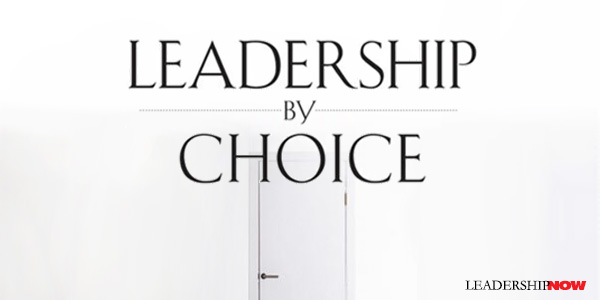

LEADERSHIP is always a choice. In Leadership by Choice, author Eric Papp says it means "making a conscious choice to positively influence those around you by managing yourself and leading others in four areas: communication, leading teams, productivity, and personal development."
Communication — How well do you listen, ask questions, and speak with influence? How many of our problems are caused by a lack of listening?
We listen better to people we like, but we can learn to listen with liking to anyone. What prevents us from doing so is preconceived ideas and ideas that we have about someone. "Sometimes while listening to someone, thoughts flood your mind – "can this person do anything for me?" "I probably won't like this person," or "Who likes them anyway?" – influencing how you listen." Listen with liking.
Leading Teams – How well do you establish trust, healthy conflict, and achieve results with others?
A culture of blame teaches people that they can avert their own responsibility by blaming others. "When you breed and teach a culture of no accountability, it's very hard to reach anything above mediocrity." Without accountability you can't lead. Papp suggests five ways to hold yourself accountable: 1. Don't overextend yourself; 2. Take action before you speak. Actions speak louder than words; 3. Have an accountability partner; 4. Chart your progress. Write down daily or weekly actions that chart your continual growth; 5. Aim for consistency, not perfection.
Productivity – How well do you spend your time and how focused are you?
You are responsible for being productive. Know where your time is going, plan the day before, focus on high-payoff items, and delegate for results and not the process. (Forcing someone to do things your way is not delegating for results. It makes for a very stressful environment and is also counterproductive.)
Personal Development – What are you doing to develop yourself?
Where do leaders find their inspiration? "When we retreat to silence, we tap into the inner calm that allows us to search for answers." Lead with silence.
We must learn to deal with stress. Papp suggests that we enjoy silence, create a gratitude list, get your sleep and take naps, allow for mistakes, help someone (giving is a great stress reducer), and make a decision to enjoy life.
![]()
![]() Like us on Instagram and Facebook for additional leadership and personal development ideas.
Like us on Instagram and Facebook for additional leadership and personal development ideas.

Posted by Michael McKinney at 08:25 AM
Permalink | Comments (0) | Communication , Personal Development , Teamwork
07.30.12

Influencing Up
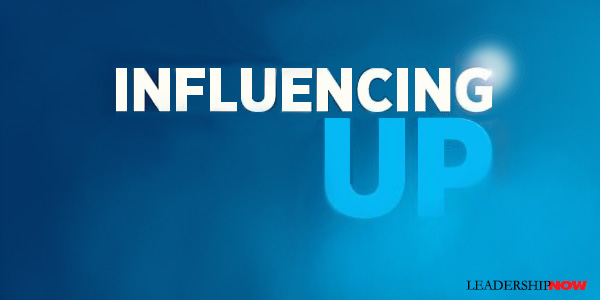
IF you're trying to make a significant contribution you will have to influence people you can't control. In other words, you will need to influence up.
Often we get in our own way when trying to influence. In Influencing Up, authors Allan Cohen and David Bradford we have to overcome these barriers:
- The assumptions you hold about how hard to push
- An unwillingness to raise a tough issue or have a difficult conversation with your boss
- A combative tone that provokes the exact reactions you dislike
- Fear of being turned down
- Inability to let go of your own concerns long enough to remember to give something valuable to get cooperation
- Any problems you might have dealing with authority
Cohn and Bradford deal with all of these issues. Beside any self-examination you will need to do, you will need courage to deal with two influencing up issues:
First, the impact of large power differentials. Obviously, the greater the power differential between you and the powerful person, the more difficult influence becomes.
Unfortunately, this kind of large power gap tends to produce dysfunctional behavior for people on both sides of the equation. Relatively high-power people tend to overvalue their own contributions and undervalue others', whereas those with less authority tend to overestimate higher-level individuals' power and underestimate their own.
Second, becoming a partner with high-powered people. Partner does not necessarily mean equals. It's a matter of "joining with" not just "reporting to" and taking responsibility for developing the partnership. To do that you need a clear understanding of your boss's world.
Characteristics of this partnership are:
- both partners are committed to the organizational goals and the success of the other,
- you must be motivated by the desire to help and not just personal advancement,
- you need to be proactive (a leader in your own right),
- both partners must be honest and transparent, and free to offer honest feedback giving each other the benefit of the doubt,
- and you must accept the differences between you and your partner.
Just as leaders should ask themselves, "Why am I doing that?" so should junior partners ask themselves, "Why aren't I doing that?" Not all bosses of course, are interested in the idea of influencing up and this is one area where the partnering mind-set really helps.
You need to carefully examine the interests, power, knowledge, and agendas of every relevant individual, group, or organizational stakeholder—and determine who influences others. Although you might not be able to sway a powerful person, he or she might respond to someone else's argument. Who has those connections? This complete analysis is critical for selling ideas or proposals, gaining backing for projects, neutralizing resistance, or otherwise making a difference.
Building on the model they first presented in their book Influence Without Authority, Cohen and Bradford deal with challenges of power differentials and partnering and how to overcome them in a step-by-step, straightforward way.
 | As long as you don't inadvertently give away your power, are willing to do your homework, and act with reasonable courage, you can increase your influence with a variety of high-power people. |
![]()
![]() Like us on Instagram and Facebook for additional leadership and personal development ideas.
Like us on Instagram and Facebook for additional leadership and personal development ideas.

Posted by Michael McKinney at 10:42 AM
Permalink | Comments (0) | Followership , Leadership , Personal Development
07.27.12

The Titleless Leader
Leading without a title is about taking personal responsibility. We—the world—is in desperate need of people who will choose to lead whenever and wherever they can. In The Titleless Leader, Nan Russell describes where we are:
Everything isn't alright in our workplaces. People are frustrated, angry, disillusioned, tired, and afraid. Not to mention skeptical, cynical, and distrustful. And those plaques touting people as the most important asset should be taken down. They're a hypocritical reminder of last century's failed promise. Not everywhere, of course, but in far too many organizations.
But we have a choice.
We can continue the de-motivating spiral of self-indulgent, unaligned leaders, or we can decide to create tomorrow's workplaces through a new kind of leadership. It's the kind that doesn't come with a title. It's not determined by rank, responsibilities, or position. No one needs to appoint you, promote you, or nominate you. You decide.
What Russell is talking about here is a different kind of leadership that starts with what all good leadership begins with: self-discipline. It is taking responsibility for the outcomes in your area. It's setting an example of behaviors that are aligned with values.
For Russell, titleless leadership is based on four cornerstones:
Self-Alignment: Behavioral integrity. People remember what you are.
Possibility Seeds: Encourages and nurtures others. Titleless leaders plant possibility seeds "not because there's a mentoring- or succession-planning program, but because they're operating with a better together approach."
Soul Courage: Step-up and offer your best self. Push outside your comfort zone to do the right thing.
and Winning Philosophies: It's only when we're all winning that we truly all win. Focus on group wins and not the politics of individual wins.
The Titleless Leader is a handbook of behaviors and thinking to help you lead from where you are. Certainly, they're not easy and require some change in perspective, but they will create more meaning and value in your workplace and more importantly, in your life.
Like us on Facebook for additional leadership and personal development ideas.
Posted by Michael McKinney at 06:58 PM
Permalink | Comments (0) | Human Resources , Leadership Development , Personal Development
07.06.12

Negativity Loops Destroy Intention
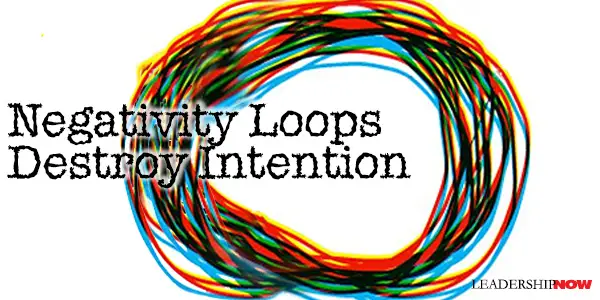
WHEN the stakes are high, negative thinking is a no-brainer; it comes naturally to any of us. Living intentionally is the path to success, but what happens when our intentions are derailed? When things aren't going as planned?
Kristi Hedges is an expert in executive presence. In The Power of Presence she describes presence as "how people move through the world." It is how people perceive you over time. Negativity dramatically affects your ability to lead.
Negativity pulls us down and inward. Positivity pulls us up and outward.
Negative thoughts have two characteristics: they are permanent and universal. As in, "They are…" "It is…" and "I'm not." Hedges says, "People who maintain optimistic thoughts gain resilience. When they have setbacks, they see the issue as temporary and specific, not permanent and pervasive."
You have to learn to dispute your own negativity and turn it into optimism. Most of our pessimistic thoughts are just catastrophizing with little or no root in reality. Negative thoughts "Support inaction, excuse complacency, and take away our options for solutions. They destroy our game."
When you find yourself in a stressful situation and caught in a downward negative spiral, Hedges recommends that you:
- Stay vigilant and recognize when it's purely pessimism and not constructive.
- Learn to challenge your thoughts before, during, and after a stressful situation.
- Find a pregame ritual—a repeatable process to get yourself in the zone of your intention—to get yourself into a positive frame of mind from the outset.
- When you have a physical reaction in a stressful situation, accept that it is a normal response and use helpful strategies to work around it, including taking deep breaths, pausing, and simply acknowledging them. Instead of fighting and resisting a physical reaction, "learn to observe it and acknowledge it as purely a physical effect with no link to your ability to perform effectively."
![]()
![]() Like us on Instagram and Facebook for additional leadership and personal development ideas.
Like us on Instagram and Facebook for additional leadership and personal development ideas.

Posted by Michael McKinney at 10:25 AM
Permalink | Comments (0) | Personal Development
05.23.12

InsideOut Enneagram

THE Enneagram is a method for identifying your personality type and is a valuable system for learning about yourself and others. The Enneagram system defines nine basic personality types of human nature and their complex interrelationships.
Wendy Appel has tackled the Enneagram's subtleties and complexities in InsideOut Enneagram. Her book makes practical the Enneagram system by use of clear explanations of each Type, case studies, and a structured journaling process. There is a section on Type and team interactions that examines predictable points of tension, reactive patterns, and synergies between all of the possible Enneagram Type pairs. Her goal is to help you to see and think differently about your strengths, your weaknesses, and mostly the subterranean habits of mind and motivations that drive you and others. It's a journey of self-mastery.
Appel observes that "most of us focus our attention outward and neglect our inner life. We think that change is out there. Instead of tuning in to the language of our head, heart, and gut, we are busy looking outside, ahead, and down."
Understanding who we are, uncovering our blind spots, and creating a game plan to master our thinking and behavior, is vital to developing our leadership potential and to better understand those we lead.
The subconscious mind, where our habits, patterns, and beliefs reside, directs the course of our lives, and most of us are unaware that this is happening. To transform as leaders and to transform our organizations require that we examine our core beliefs—both individual and collective. If not, we simply make iterative changes, and that won't be enough to succeed in today's globalized economy.The Enneagram gives you the possibility to transform the way you show up as a leader. Inner change leads to outer change—when your inner world transforms, an opening is created for extraordinary shifts to occur in your outer world. When you lead from the InsideOut, you have the ability to be responsive and flexible enough to act in the moment. Your words and actions are aligned. You take responsibility for creating your life and for leading with integrity and passion.
Appel says she often gets asked "about the difference between the MBTI and the Enneagram, or whether MBTI Type preferences neatly fit into the Enneagram Types. The most simplistic way to understand how the systems complement each other is that the MBTI describes preferences for how we do things (get our energy, make decisions, gather information, and so on); the Enneagram describes why and how we behave as we do (beliefs, fears, desires, focus of attention), and how we go about getting our perceived needs met."
InsideOut Enneagram is an opportunity to discover what is working for you, what is not working for you, why, and what you can do about it. You will find descriptions of each type on her website.
![]()
![]() Like us on Instagram and Facebook for additional leadership and personal development ideas.
Like us on Instagram and Facebook for additional leadership and personal development ideas.

Posted by Michael McKinney at 07:08 PM
Permalink | Comments (0) | Human Resources , Personal Development
05.03.12

Stuck? Flip the Script
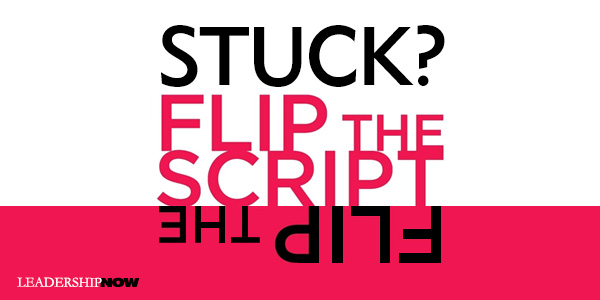
THE premise of Flip the Script is approaching everything in your life with a new mindset: you can't control circumstances but you can manage them.
Author Bill Wackermann says that the first step is to "embrace the notion that turning a situation around and creating new opportunities takes the desire to face yourself as you really are and a willingness to see the potential that could be hiding right in front of you."
Wackermann believes that anything can be flipped—any expectation can be turned upside down. It is a skill that can be learned and developed through practice. The book is divided into three sections: understanding yourself, navigating how to build your flip, and winning, overcoming obstacles and putting it all together. All three steps are important, but the first section is the meat of the book and the one that requires the most attention because this is where we get in our own way most of the time.
Understanding yourself and your situation requires honesty. It doesn't do any good to make excuses here; that only clouds the issues. "Designing your way around obstacles starts with a proper mind-set." Begin by asking, "So what if …?" So what if there isn't enough money? We are short on people? So what if they don't come through? "So what if?" is a "mental tactic that allows you to force yourself to consider alternative viewpoints and plan for the worst."
Taking responsibility for where you are in this moment, is crucial and once done can actually provide us with a great deal of freedom. Blaming others imprisons us. Wackermann suggests asking yourself:
- What can I do right now to fix the situation I want to change? It can be a big or small action, but it has to be something.
- What did I do that contributed to getting me to where I am?
- What could I have done differently?
In conjunction with those questions, you might also ask yourself:
- Do I blame others? Colleagues, clients, or family members? (E.g., "He never told me it was due today?")
- Do I make excuses to avoid responsibility? (E.g., "I couldn't get to that email because I was traveling.")
- Do I ever apologize?
- Do I complain rather than try to make a situation better? (E.g., "They really need to fix that.")
Wackerman says blame is like candy; too much is unhealthful and will make you sick. "What's standing between you and success right now is you. Not your folks, not your history, just you. I'm not suggesting that you deny your past, but I am advising that you refuse to live there because it just might kill your future."
He covers common areas of self-sabotage like Know-It-All-Ism, My Boss Hates Me, Taking Things Personally, Perception is Reality, and Excusing Yourself. Wackermann leaves you with much to think about. Here are a few more ideas to keep in mind:
Flipping means managing all aspects of a situation, including the internal and external…A successful flip requires that we not confuse our motives with what the world sees. To move our goals forward, we have to be mature enough to recognize that perception, unfortunately, is reality. That is business, and our actions and behavior shape how others see us and see our potential for growth. The good news is that we can control in way both big and small how the world sees us.You can borrow the best of what you like in others rather than fixating on their worst traits.
The behaviors you do robotically are the ones that are keeping you stuck in your current situation.
Actions must follow words. If you feel like other people are catching all the breaks, come in early, stay late, and volunteer for assignments that take you out of your job function. It's called taking the initiative: you need to show your boss that side of you.
Flipping the script isn't based on intelligence, rather it's based on our ability to manage ourselves and control our urges.
Doing the right thing is so hard because it usually takes much more work, determination, willpower, and self-control than you'd expect.
To win at politics, don't complain, and take five minutes a day to build alliances and stay focused on your end goals. Use the ROPE method: Have a good Role Model, Open yourself to change, Project confidence, and Express humility.
In the end, you can't make people behave differently; all you can do is manage yourself.
 | Your success in flipping the script will be determined by how hard you are willing to look at yourself and your ability to deconstruct patterns of behavior that you've established over a lifetime. |
![]()
![]() Like us on Instagram and Facebook for additional leadership and personal development ideas.
Like us on Instagram and Facebook for additional leadership and personal development ideas.

Posted by Michael McKinney at 09:41 AM
Permalink | Comments (0) | Personal Development
03.30.12

The Power of Habit
Habits will always be with us. Some good. Some bad. But how do you replace bad habits with good habits? More importantly, how often do we ask ourselves if what we are doing is really just a habit? We are less intentional than we think we are.
Charles Duhigg has written a book for all of us: The Power of Habit. After reading it you will understand how habits are formed and what you can do about it. You will also look at habits in a new way. Habits infiltrate our organizations and become invisible forces to contend with that we never realized were there. Learning to spot them is key to our success. Consider the following story:
As a newspaper reporter in Baghdad, Duhigg heard about an officer conducting an impromptu habit modification program in Kufa, a small city ninety miles south of the capital.
He was an army major who had analyzed videotapes of recent riots and had identified a pattern: Violence was usually preceded by a crowd of Iraqis gathering in a plaza or other open space and, over the course of several hours, growing in size. Food vendors would show up, as well as spectators. Then, someone would throw a rock or bottle and all hell would break loose.When the major met with Kufa's mayor, he made an odd request: Could they keep the food vendors out of the plazas? Sure, the mayor said. A few weeks later, a small crowd gathered near the Masjid al-Kufa, or Great Mosque of Kufa. Throughout the afternoon, it grew in size. Some people started chanting angry slogans….At dusk, the crowd started getting restless and hungry. People looked for the kebab sellers normally filling the plaza, but there were none to be found. The spectators left. The chanters became dispirited. By 8PM, everyone was gone.
In a sense, a community—your organization—is a giant collection of habits. Later, when Duhigg talked to the major, he said, "Understanding habits is the most important thing I've learned in the army." "Once you see everything as a bunch of habits," says Duhigg, "it's like someone gave you a flashlight and a crowbar and you can get to work."
A habit is the brain's way of saving effort. Duhigg has broken the formation of habits into a three-step loop: the cue ("a trigger that tells your brain to go into automatic mode and which habit to use), the routine ("which can be physical, or mental or emotional"), and finally there is the reward (which helps your brain figure out if this particular loop is worth remembering for the future).
The key to remember here says Duhigg is that "When a habit emerges, the brain stops fully participating in decision making. It stops working so hard, or diverts focus to other tasks. So unless you deliberately fight a habit—unless you find new routines—the pattern will unfold automatically."
Breaking habits down in this way makes them easier to deal with. If we can learn to identify the cues and rewards, we can change the routines. We can live life a bit more intentionally.
Duhigg shows how habits played a part in the success of Olympic swimmer Michael Phelps, Starbucks CEO Howard Schultz, and civil-rights hero Martin Luther King, Jr. He goes behind the scenes at Procter & Gamble, Target superstores, Rick Warren's Saddleback Church, and NFL locker rooms. He explains how improving a single habit rippled out to improve an entire organization—Alcoa. Fascinating material to think about on many levels.
How much of what you do is on autopilot?
How much of what your organization does is on autopilot?
Of Related Interest:
Breaking Old Habits
| | Habits are not destiny. They can be changed if we understand how they work. Habits cannot be eliminated, but they can be replaced. |
Like us on Facebook for additional leadership and personal development ideas.
Posted by Michael McKinney at 07:08 PM
Permalink | Comments (0) | General Business , Human Resources , Management , Personal Development
03.14.12

Develop a Relentless Solution Focus
Whatever you are trying to accomplish, Jason Selk, author of Executive Toughness, says a relentless solution focus (RSF) will dramatically increase your chances of achieving it.
The tactic is this: Within 60-seconds, replace all problem focused thought with solution-focused thinking to dramatically improve your health, happiness, and success.
We naturally like to focus on and talk about our problems. "We all have the tendency to take the positive for granted. We allow it to become the faint background for the problems we draw in intricate, larger-than-life detail." A focus on problems only produces more problems. Your mind can only focus on one thing at a time—better to have it focusing on solutions than problems.
"Anytime you catch yourself focusing on a problem, negativity, or self doubt, as yourself this question: What is the one thing I can do differently that could make this situation better?"
Any solution, even a partial one will begin to stop the negative emotions. "To ensure you have the necessary perseverance to continue searching for the viable solution, you must first realize that each and every problem has a solution. There's always a +1 solution that brings you one step closer to a full solution. Most people want a solution that produces complete resolution to the problem….Any improvement, small or large, is a solution: a +1 solution to be precise."
Selk, mental toughness is the ability to focus on and execute solutions, especially in the face of adversity. It is built on three skills: developing accountability (consistently doing what needs to be done), increasing focus, and becoming optimistic (confident in one's abilities).
Selk was inspired by coach John Wooden and his belief in trusting the process; "give me those things that I know you can give me and I will take whatever comes." Executive Toughness explains how to develop mental toughness through the daily practice of ten fundamentals.
Like us on Facebook for additional leadership and personal development ideas.
Posted by Michael McKinney at 11:01 PM
Permalink | Comments (0) | Personal Development
03.07.12

8 Essential Principles of Effective Leadership
Gayle Beebe has written a book on how effective and moral leaders develop and more importantly, how they must continue to develop. Too often leaders think they have made it and stop working on themselves. Eventually they become leaders in title only. He writes in The Shaping of an Effective Leader:
Our understanding of leadership does not come to us all at once. It takes time. In our instant-oriented culture we often want to short-circuit the thinking, reflecting and acting that mark our progressive development as leaders. Understanding how leaders develop and why they matter requires discernment, wisdom and insight.
Leadership development is a process. Seeking instant results and ladder-climbing can leave us little to show for our efforts. Some leaders "penchant for moving on has allowed them to avoid facing the consequences of their decisions" thereby restricting their development. "They have changed responsibility so often that they have failed to undergo the development that comes from facing mistakes." Then too, some leaders are so busy "fixing problems" with personnel changes that they never really face the core issue—themselves.
Beebe draws heavily on Peter Drucker's teachings and writings. The implementation of these eight principles will have a profound impact on your leadership:
The Necessity of Character. "The formation of our character creates predictability to our leadership. Predictability, dependability and consistency: these three qualities ensure that our leadership is reliable and motivates people to place their confidence in us."
The Importance of Competence. "Drucker emphasized the importance of a liberal arts education, which he believed was the best training for learning how to synthesize discrete pieces of information into a meaningful whole….All knowledge must be brought to bear on our challenges."
The Advantage of Team Chemistry. Generosity builds teams. Greed destroys them. "Eventually it leads to a lack of respect for the needs and ambitions of others because our own needs and ambitions overrun all normal boundaries and expectations….It is made manifest by an excessive need for acclaim, attention or compensation. It also is evident in an inability to share the limelight. Malice and thoughtlessness are twin manifestations of this same inner drive."
The Interplay of Culture and Context. Cultures shape people. "An appropriate structure (culture) is the one best suited to maximize the performance of our people." In addition, "culture is also shaped and influenced by the environmental context in which it exists….One of the biggest mistakes a company can make...is when it operates on the basis of what it prefers and how it believes a society should function, rather than how the society actually operates."
The Strength of Compatibility and Coherence. "We have to know ourselves well enough and understand ourselves deeply enough to enter into the kind of human communities that will sustain us."
The Guidance of Convictions. "An individual must balance a strong self-understanding and self-esteem with the necessity of confronting all issues both objectively and subjectively….A self-differentiated leader is one who has a head (intellectual capacity) from which he speaks with conviction while having a heart (empathetic capacity) with which he stays connected to people."
The Significance of Maintaining Our Connections. "Remaining connected to our work associates even when we make hard decisions is only possible if we maintain personal integrity, display competence, create team chemistry, develop a great culture, retain a level of compatibility that motivates, and display a level of conviction and predictability that people trust."
The Opportunity to Make an Ultimate Contribution. The ultimate contribution is in our quest for meaning. "Work, meaningful as it may be, can lose its appeal….Drucker advocated developing a second interest long before we exhaust our first interest. This parallel career becomes not only our lifeblood for meaningful work and service opportunities in the future, but also a source of great support if we were to experience major setbacks in the present."
Beebe writes, "These principles do not operate separately from one another. Indeed, they build on each other, and their effect is cumulative." These eight principles will improve our contribution as leaders if we are mindful of them on a daily basis throughout the rest of our lives. At each level our character is tested and developed. Effective leadership is built on moral authority grounded in character. Leadership is a privilege that we earn every day.
Like us on Facebook for additional leadership and personal development ideas.
Posted by Michael McKinney at 10:36 PM
Permalink | Comments (0) | Leadership Development , Personal Development
02.20.12

5 Leadership Lessons: Where Negative Emotions Come From
Brian Tracy and Christina Stein have written a book—Kiss That Frog—to help you root out the causes of the negative thoughts that are influencing your attitudes and behaviors more than you realize. It's a critical issue for leaders.
"All emotions, especially negative emotions, distort evaluations. A person in the grip of a negative emotion is incapable of thinking clearly or rationally."
Here's the danger: "The more intense the negative emotion, the more the sufferer becomes detached from reality and is incapable of reasoning clearly. The person then talks and acts in a way that is often unexplainable and destructive."
Tracy and Stein have identified five major factors that cause people to create negative emotions and hold on to them:
Justification: You defend your negativity and your right to be angry. Negative emotions cannot exist unless you can justify your right to experience them to yourself and others. The more you justify yourself and convince yourself that the other person involved is bad in some way, that you are pure and innocent and are therefore entitled to feel the way you do, the angrier and more upset you become.
Identification: This means that you take things personally. You interpret what has happened as a personal attack on you. Having healthy emotional boundaries is essential, especially in a work environment. You can be compassionate without identifying with someone else's emotions.
Hypersensitivity: To be extremely sensitive to the thoughts, opinions, or attitudes of others toward you. Peter Ouspensky called it "inward considering." In extreme cases, hypersensitive people become paralyzed in that they cannot make a decision without getting the approval of other people.
Judgmentalism: The tendency of people to make negative assessments about others. When you judge another, you become emotional. And emotions distort evaluations. People often judge others because they want to control their behavior.
Rationalization: What happens when you put a socially acceptable explanation on an otherwise socially unacceptable act. Because of low self-esteem and weak egos, most people cannot admit that they have done or said something that was not thoroughly reasonable and justified.
Rehashing negative situations allows the negative emotions to grow. Keeping an eye on these factors leading to negative emotions can help you to stop the negative emotion the moment it is triggered.
You have a wonderful mind. But it is a two-edged sword. You can use it to make yourself happy, or you can use it to make yourself angry. Your goal should be to use your intelligence to keep yourself calm, in control, and at peace, no matter what is happening around you or to you.
Like us on Facebook for additional leadership and personal development ideas.
Posted by Michael McKinney at 10:14 PM
Permalink | Comments (0) | Five Lessons , Personal Development
01.23.12

The Compound Effect
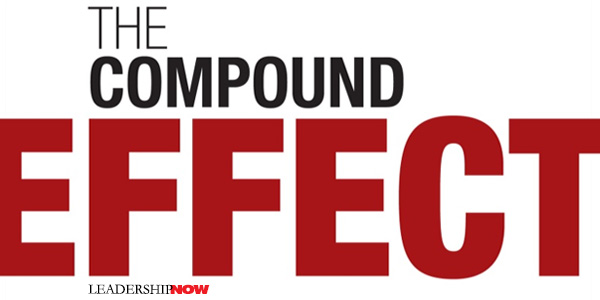
THERE IS NO quick fix—no hack. But the right habits consistently applied in your life will bring you success. It's the compound effect.
The Compound Effect is a reminder of the law of cause and effect. Darren Hardy shares the impact it has had on his life and how you can make yourself accountable for your choices.
The Compound Effect is the ripple effect you get from the choices you make. In life, you not only reap what you sow, you reap more than you sow. The seemingly insignificant choices we make daily, will create major changes in your life for good or bad. These are the things we don't think about because they have no immediate effect. They don't seem to matter. But over time, they can take you places you never intended. Hardy encourages us to make conscious choices—daily.
Given the fact that we have a limited lifespan, the earlier we start consciously making small changes in our behavior, the more powerfully the Compound Effect works in our favor.
Since your outcomes are all a result of your moment-to-moment choices, you have incredible power to change your life by changing your choices. Step-by-step, day by day, your choices will shape you actions until they become habits, where practice makes them permanent.
Creating habits isn't easy. Hardy says you have to begin by thinking your way out of the instant gratification trap. "The problem is that the payoff or instant gratification derived from bad habits often far outweighs what's going on in your rational mind concerning long-term consequences. Indulging in our bad habits doesn't seem to have any negative effects at all in the moment. But it doesn't mean you haven't activated the Compound Effect.
Hardy also recommends that when we try to change a habit we should focus on what we are adding-in rather than what we are taking-out. Instead of thinking about all of the TV you will miss in the evening, think about the experience and fulfillment you will gain by adding-in a hobby instead. Instead of focusing on what you have to sacrifice, focus on what you get to add-in.
It harder to get started than it is to keep going, so you must be consistent to keep your momentum going. "When you start thinking about slacking off on your routines and rhythms, consider the massive cost of inconsistency. It is not the loss of the single action and tiny results it creates; it is the utter collapse and loss of momentum your entire progress will suffer."
In this regard, it is important to look at what is influencing you—what you feed your mind, the people you spend time with, and your environment will all conspire to bring you closer or further from your goals. Stand guard.
Finally, Hardy says to multiply your results by going beyond the expectations; doing the unexpected. Uncommon things deliver uncommon results.
![]()
![]() Like us on Instagram and Facebook for additional leadership and personal development ideas.
Like us on Instagram and Facebook for additional leadership and personal development ideas.

![]()


Posted by Michael McKinney at 11:47 PM
Permalink | Comments (0) | Personal Development
01.11.12

What You Need to Know About Why People Fail
"There are thousands of books on success. But very few on failure," begins Siimon Reynolds in Why People Fail. "Yet mastering failure is surely a vital step in achieving your aims, hopes, and dreams."
He is passionately driven to take the "taboo" out of failure. As Reynolds suggests it is a "forbidden subject. We're not supposed to fail and if we do, we're supposed to hide it from everybody. It gives people the wrong impression about what it takes to be successful."
Failure leads to success—if you see it as a process. "If someone has achieved more than you, it's not usually because they are better than you or smarter than you. It's because they have discovered a better strategy for success."
Reynolds has identified 16 reasons for failure. They are:
1. Unclear purpose
Reynolds claims that the reason average people are average is because they have no clear purpose. "It is not unusual to see people working 12 hours a day and still not getting anything substantial done. Why? At the heart of it, their lack of clarity about the best use of their time leads them to work on what's urgent, not what's important." Foggy purpose leads to mediocre results, says Reynolds. Zig Ziglar remarked, "Most people are a wandering generality rather than a meaningful specific."
2. Destructive thinking
Not surprisingly, destructive thinking has a dramatic impact on both our health and our behavior. Reynolds recommends the SCORE technique created by Jim Fannin. Before you begin a new task, ask yourself: Are you working toward your goals? (Self-Discipline), Are you focused? (Concentration), Are you positive? (Optimism), Are you calm? (Relaxation), and Are you choosing to have fun? (Enjoyment).
3. Low productivity
Getting productive begins with planning before you start. Make a list. Break your work down into blocks of time. Reynolds says that when he's feeling down or lazy, he likes to separate his day into 10-minute blocks. Working in short bursts boosts his momentum and increased his concentration. This technique he learned from Igvar Kamprad, founder of IKEA. Kamprad says, "Divide your life into 10-minute units and sacrifice as few of them as possible in meaningless activity."
4. Fixed mindset
People with a fixed mindset believe that their capabilities are set in stone. They tend to not try hard, give up early, and don't try new things. In contrast, people with a growth mindset believe that with dedication and effort you can get better. They tend to forgive more, see problems as temporary, learn from their mistakes, and have faith in the future. What would happen if you worked a little harder at something you feel you're not good at?
5. Weak energy
Success takes energy. Success requires good sleep, a proper diet, exercise, and a balanced lifestyle.
6. Not asking the right questions
The questions you are create the things you think about and the direction of your life. You should be asking yourself the following questions frequently: What are my values? What would I do if I knew I couldn't fail? What could go wrong? How could I make 10 times more money? What would X do? Should I even be involved with this? How would my competition defeat me? What's the best use of my time right now? When I die, what kind of life would I like to have lived? How could I improve that performance?
7. Poor presentation skills
"Presenting well will increase your confidence and your salary faster than almost any other skill. Your boss will want you to lead more and your clients will trust you more. You'll feel in command and in control, and others will sense that they're dealing with someone highly capable and dynamic."
8. Mistaking IQ for EQ
A priceless ability for leaders, those with a strong EQ (emotional intelligence) are able to perceive emotions, use emotions, understand emotions, and manage emotions. "When it comes to everyday practical living, EQ beats IQ every time."
9. Poor self-image
Self-image is important because it determines what actions you will take and how you will feel each and every day. It's like your "mental operating software…a mental blueprint of what's possible for you." Mostly, you are not your conscious thought. According to Deepak Chopra, about 70% of your thoughts are not new. They are the same thoughts you had yesterday. "The truth is, because of their low self-image most people are selling themselves short." Think about your self-image and focus on building it up. Act-as-if. Consider the people you socialize with. Are they building you up? Visualize who you could be.
10. Not enough thinking
We are obsessed with doing and don't spend enough time thinking. Brainstorm regularly.
11. No daily rituals
Daily rituals enable even average people to become champions of life and ultimately outperform others who seemingly have more talent. "If you can add a structure to your goals, a ritual you do daily, you will increase the chances of achieving them by 1000%." If you're not getting the results you want in any area of your life, Reynolds attributes it to a lack of ritual.
12. Stress
Stress can kill. Relieve stress with deep breathing and the practice of releasing. You might try list making, dividing your stress into things you can do something about and things you can't, cleaning and simplifying your environment, getting outside, eating properly and creating order in your life.
13. Few relationships
You can't get there alone. You must enlist the help of many others along the way. Develop your ability to develop strong personal relationships.
14. Lack of persistence
Giving up too soon is at the heart of many failures for two reasons. The first is a poor self-image. "Deep down they don't have the faith that they are capable of pulling off a great victory, so when they try, they do so in a tentative, half-hearted manner and are ready to give up at the first sign of difficulty." And second, they think there is something wrong with failure. Champions know they are going to fail numerous times, so they get on with it.
15. Money obsession
Professor Tim Kasser remarked, "The more materialistic values are at the center of our lives, the more our quality of life is diminished." Research shows that people who focus on the material things are less satisfied with their lives. There is nothing wrong with money, but we shouldn't build our life around it. Better to focus on relationships, community, serving others, and appreciation.
16. Not focusing on strengths
Know your strengths to maximize you natural strengths. Not everything you need to do can be centered around your strengths, but the more you do, the more successful and enjoyable your life will be.
| | If you are struggling, you can probably identify with at least one of the above reasons. Actually, all of us can identify with some of them and could benefit from designing a ritual to overcome them one by one. It's not always easy but it is doable. Pick one and make a commitment to conquer it. |
Like us on Facebook for additional leadership and personal development ideas.
Posted by Michael McKinney at 06:31 PM
Permalink | Comments (0) | Personal Development
11.24.11

Finding Gratitude in the Common Things
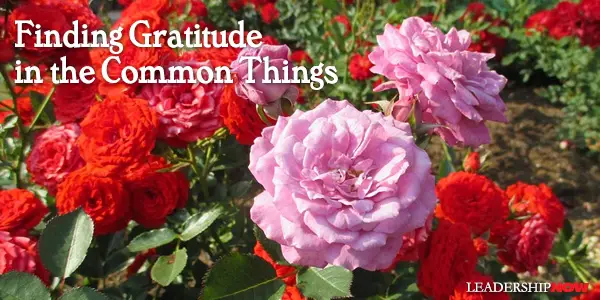
We can only be said to be alive in those moments when our hearts are conscious of our treasures.—Thornton Wilder
Sometimes we have big and uncommon things to be thankful for, but mostly what we have to be thankful for is daily, common and mundane. It's these daily blessings that we take for granted. It's these that we need to be most thankful for and learn to find ways to express our gratitude for—daily.
Gratefulness is a state of mind. Gratitude puts us more in the moment rather than being shackled to the past. Without an attitude of gratitude, we tend to focus on the wrong things. It makes us do things we shouldn't do.
Gratitude assigns meaning to that which we find common, but is, in fact, a gift. At the same time, it gives us meaning.
Often it is not until we are deprived of something that we begin to appreciate that which we take for granted. It is easy to be oblivious to that which we have until we lose it or face the prospect of losing it.
Do we have to suffer a loss to appreciate that which we have?
![]()
![]() Like us on Instagram and Facebook for additional leadership and personal development ideas.
Like us on Instagram and Facebook for additional leadership and personal development ideas.
![]()


Posted by Michael McKinney at 12:01 AM
Permalink | Comments (0) | Personal Development
11.14.11

Do You Have Moral Overconfidence?
In a recent Bloomberg Businessweek article, Harvard Business School Dean, Nitin Nohria stated that because we all suffer from "moral overconfidence," the most important thing business schools could be teaching is humility. He writes:
Many people view "character" as an immutable trait formed during childhood and adolescence. I believe character development is similar to the development of knowledge or wisdom—it's a lifelong process. The world isn't neatly divided into good people and bad people. Most will behave well or poorly, depending on the context….Business leaders need to remember that most of us have too much confidence in our strength of character.
Nohria is exactly correct. Good leadership is humble leadership. Humility is living in truth. The truth about our limitations and an understanding of our proper relationship with others. And do we share with each other a moral overconfidence—a certain naiveté about ourselves that carries with it the seeds of our own destruction.
Humility gives us a better understanding of how we are to treat each other. Without it we operate from only one perspective—our own. This kills influence. As leaders, we are to work with people, not over them. It is far too tempting to think hierarchically and not relationally.
In Leading Without Power, Max De Pree says that "Leaders belong to their followers." Too many leaders try to create a buffer between themselves and their followers, when instead, they need to be leading from among their followers. A humble leader will close the gap between themselves and others.
Humility manifests itself in understanding the need to learn. Authority disciplined by humility is teachable. It is arrogant to think that once we have the position or a title, we've arrived. We never arrive. It is merely an opportunity to learn from another perspective. If you stop learning, you stop leading. It's something we need to stay on top of because if we don't, life has a way of bringing us up short in an effort to get us to wake-up and start learning. Leadership has a way of revealing our weaknesses.
Like us on Facebook for additional leadership and personal development ideas.
Posted by Michael McKinney at 04:07 PM
Permalink | Comments (0) | Human Resources , Leadership Development , Personal Development
11.09.11

Uncertainty Will Freeze You in Place if You Let It

AMBIGUITY is not only certain; it is a necessary state for advancing. Jonathan Fields writes, in Uncertainty: "The more you're able to tolerate ambiguity and lean into the unknown, the more likely you'll be to dance with it long enough to come up with better solutions, ideas, and creations."
The problem is that most of us, to one degree or another, react so strongly to ambiguity or uncertainty, that it becomes a limiting factor in our lives and stops us from acting in the face of it. The issue is not so much failure as it is not wanting to "be judged for taking the less-mainstream path and coming up empty."
But taking the risk in the face of uncertainty is "not about tempting fate, it's about going to that place where magic happens." Living in the question. So how do we push forward when everything seems to be spinning out of control?
Fields suggests we first find our certainty anchors. Certainty anchors are rituals and routines that we build into our lives that help to counter the resistance. On those occasions when you find that it is "Twitter-Time," rituals and routines will help move the process along. "Ritual helps train you to sit down when you most want to stand when you're forced to work on the part of the process that leaves you anywhere from bored to riddled with anxiety."
Get feedback along the way. Build a hive of heroes, mentors, and champions. Consider ways to bring into the process the very people you are creating for.
Train your brain in the art of focused awareness through meditation, mindfulness, visualization, and exercise to stay focused and grounded. Randy Komisar, author of The Monk and the Riddle, told Fields:
It's a process of stripping myself bare of all the pressures, all of the barnacles that accumulate around you every day as you interact in the world—the pressures, the expectations, the ego, the things that ultimately make your vision unclear.
Exercise in the list above wasn't an afterthought. Most of us feel we don't have time to work out. But we really can't afford not to. Fields writes:
Studies now prove that aerobic exercise both increases the size of the prefrontal cortex and facilitates interaction between it and the amygdala. This is vitally important to creators because the prefrontal cortex, as we discussed earlier, is the part of the brain that helps tamp down the amygdala's fear and anxiety signals.For artists, entrepreneurs, and any other driven creators, exercise is a powerful tool in the quest to help transform the persistent uncertainty, fear, and anxiety that accompany the quest to create from a source of suffering into something less toxic, then potentially even into fuel.
I emphasize this a lot on the Leading Blog, but I think it's something we really have to work at. Randy Nelson, Pixar's former head of education said, "The core skill of innovators is not failure avoidance, it's error recovery." Fields adds, "When that's baked into your creative culture on all levels, people become more empowered to lean into the creative abyss—and magic tends to happen."
 | Creating value involves varying degrees of uncertainty. But that uncertainty can lead to fear and paralysis unless we learn how to use it to our advantage. And it's important that we do because that's where the greatest creations and experiences happen. The poet John Keats put it well. He called it "Negative Capability." He referred to it as the quality that people of achievement possess: the capability of being in uncertainties. Fields shows how to be okay working in that space. |
![]()
![]() Like us on Instagram and Facebook for additional leadership and personal development ideas.
Like us on Instagram and Facebook for additional leadership and personal development ideas.

Posted by Michael McKinney at 06:39 PM
Permalink | Comments (0) | Creativity & Innovation , Personal Development , Problem Solving
11.07.11

3 Self-Limiting Mindsets that Will Hold You Back at Work
This is a guest post by Joel Garfinkle, author of Getting Ahead: Three Steps to Take Your Career to the Next Level. Garfinkle asks, "What makes one person more successful than another?" Getting Ahead is a straightforward guide to help you eliminate your blind spots to improve how you are perceived, increase your visibility and exert your influence. Great material.
The workplace has enough challenges and obstacles without us getting in our own way. But too often, we sabotage ourselves. Whether it's internal forces that cause us to sell ourselves short or it's a matter of having been conditioned not to "toot our own horn," people have a marked tendency to avoid the limelight when in truth they belong in it. What's more, if you've always been the 'unsung hero,' management wants to know who you are.
In my executive coaching business, I've worked with scores of clients over the years to help them overcome self-limiting mindsets that were holding them back in the workplace. Here are some of the most common issues:
- Not making an effort to be visible to management. Some of my clients were frustrated because they felt chronically underappreciated, undervalued and anonymous. "I can't get ahead because nobody knows who I am or what I do for this company," is a common refrain. This is a particularly severe problem where managers are "results-oriented" while paying scant attention to developing the processes and people that bring them those results.
It's up to you to ensure that you get credit for your accomplishments. Make a conscious effort to keep your boss apprised of the progress you are making and the projects you complete successfully. If you want to be valued and appreciated, you need to make sure management knows what you are doing and how your efforts contribute to the company's bottom line.
- Believing it's the boss's job to manage your career. Career management is your job, not his. Don't leave your career management up to your boss.
You may need to take charge of your employee evaluation process yourself. To do this, first get an understanding of how the employee evaluation system works. Find out exactly what criteria or metrics your boss is using to evaluate your performance. This will probably require a sit-down session.
Once you know how you will be evaluated, you need to prepare in advance for the evaluation. Keep careful notes on all your accomplishments for the company. Put dollar figures on them whenever possible. The more numbers, the better. Then take initiative to schedule sit-downs to discuss your progress throughout the year. Don't rely on your manager to do it.
Then, at least a month before your annual evaluation is due, schedule another appointment. Hand your boss an itemized list of your accomplishments for the year. Say, "Here's a list of the things we've discussed over the year. I thought this would come in handy for when you write my eval." Then let it go at that. If your manager is on the ball, though, and writes your eval way ahead of the deadline, you may need to schedule your meeting even earlier. The important thing is to take initiative and stay ahead of the curve.
Management wants to make their star employees look good. Some of them don't have the administrative or managerial skill set to allow them to do that, though. They get distracted and don't know what a good, solid evaluation even looks like. Managers will appreciate that you took the time.
- Failure to notice the opportunities around you. Some workers limit themselves by getting so focused on their immediate jobs and departments that they lose sight of the big picture. One solution: Think two levels up. Make sure you know about the key issues and projects not just in your immediate department, but at least two levels up from you. You should also network within the company and find out who the key players are in other departments. Keep your ear to the ground to learn about new initiatives, particularly in revenue-generating endeavors or where you will have an opportunity to create substantial savings for the company.
If your immediate boss can't or won't promote you, you need to have options. By exposing your talents, skills and value to leaders in other departments, you enhance your chances of gaining a promotion. It's not just who you know; it's who knows you! Work hard to maximize your exposure for lateral movements and promotions.
Remember, if you don't take credit for your own success, someone else will. That doesn't serve your own interests. And if you think about it, it doesn't serve the long-term interests of the company. You have a professional duty to yourself as well as your company to make sure your accomplishments are recognized and credited to you.
Joel A. Garfinkle is recognized as one of the top 50 coaches in the U.S., having worked with many of the world's leading companies. He is the author of seven books, including Getting Ahead: Three Steps to Take Your Career to the Next Level. View his books and FREE articles at his Executive Coaching Services website. You can also subscribe to his Executive Leadership newsletter and receive the FREE e-book, 40 Proven Strategies to Get Promoted Now!"
Posted by Michael McKinney at 10:11 AM
Permalink | Comments (0) | Human Resources , Leadership Development , Leading Forum , Personal Development
10.26.11

It's Not About You
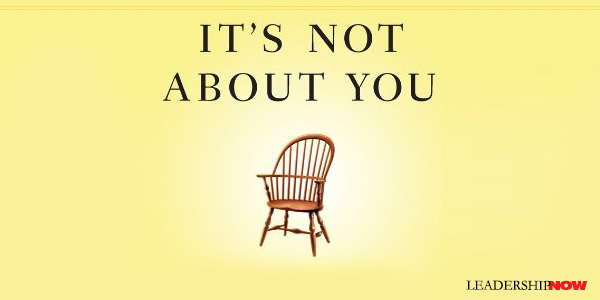
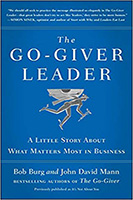
It's Not About You (Reissued as The Go-Giver Leader) by Bob Burg and John David Mann, is the story of a leader's journey. A journey any good leader has to take.
Ben begins with an agenda. His job is to convince or if necessary, to steamroll a manufacturer of high-quality chairs to accepting a merger. Ben's company believes it to be a good thing, but the target company is not so sure. Ben's mindset as he starts out is: "how do I get them to do what I want them to do."
Somewhere between getting people to understand him and slowing-down long enough to understand them, he found his answer.
Through a series of encounters with a mentor—Aunt Elle—and a lot of reflection Ben comes to understand that it is not about him. His journey causes him to reflect on five lessons:
Lesson #1: Hold the Vision. The hard part isn't coming up with the vision, it's holding on to the vision. "As a leader, your job is to hold fast to the big picture, to keep seeing it in your mind's eye, with crystal clarity, where it is you are going—that place that right at this moment exists only in your mind's eye. And to keep seeing that, even when nobody else does."
Lesson #2: Build Your People. "People have all sorts of amazing qualities and natural abilities trapped inside them. With the wood, it's knowing how to apply the heat. With people, it's applying your belief." If you give people something great to live up to, they usually will. "How influential you are, comes down to your intention. What are you focused on? Your benefit, or theirs?" The more you yield, the more power you have.
Lesson #3: Do the Work. Be humble and stay grounded. Aunt Elle said, "People who achieve great things that the world will never forget, start out by accomplishing small things the world will never see."
Lesson #4: Stand for Something. Lead from who you are. People will figure it out anyway. People need to trust your competence, but they need to trust your character more. "Competence is simply the baseline, the thing that puts you in the game. It matters, but honestly, it's a dime a dozen." The authors remind us that you can only lead as far as you grow. Aunt Elle says, "What you have to give, you offer least of all through what you say; in greater part through what you do; but in greatest part through who you are."
Lesson #5: Share the Mantle. It's not about you. "You are not their dreams, you are only the steward of those dreams. And leaders often get it backwards and start thinking they not only hold the best of others but they are the best….The moment you start thinking it's all about you, that you're the deal, is the moment you begin losing your capacity to positively influence others' lives."
Whatever great parenting looks like, it is not about the parent.
The Go-Giver Leader is a great presentation of solid life lessons. A book to be read and passed around. Unfortunately, "it's not about you," is not the kind of lesson that once learned, is always remembered. If it was, fewer great leaders would finish poorly after so many years of outstanding service. This is an issue that we face over and over again, but hopefully in ever diminishing frequency and intensity as our leadership matures. This book is a great reminder of the power of the right kind of leadership; leadership that comes from an inner strength of understanding, service and outgoing concern for others.
 | Sometimes the hardest thing to grasp about leadership is that it is not about you. It's easy to make it about us. We want to do something, so naturally we push; when actually we should be pulling by considering the needs of others first. In leadership, as with so much in life, the more we give, the more we have. |
![]()
![]() Like us on Instagram and Facebook for additional leadership and personal development ideas.
Like us on Instagram and Facebook for additional leadership and personal development ideas.

Posted by Michael McKinney at 09:29 PM
Permalink | Comments (0) | Followership , Human Resources , Leadership Development , Personal Development
10.21.11

Practical Genius is a Choice
Everyone is born a genius, but the process of living de-geniuses you.—Buckminster Fuller
Gina Rudan's Practical Genius is designed to re-genius you. Gina says we all have the capacity for what she terms, practical genius. It is the "kind of practical, street-level, everyday genius that can change the game for you, your business, and every aspect of your life." Practical genius is a choice.
So many of us are unconsciously compromising some of our greatest natural assets because of external factors, past hurts, or current fears. Or, even worse, we have sacrificed our skills, strengths, and passion to the expectations and influence of others. Or we're consciously hitting the snooze button, rolling over and going back to slept every time we're reminded how far from feeling happy and fulfilled we are in our work and personal lives.
In order to identify and leverage both the hard and soft unique personal assets we all possess, Gina has created a 5-step plan :
Step 1: Identify Your Genius. Through a series of reflective exercises you identify your hard assets—skills, strengths and expertise—and your soft assets—passions, creative abilities and values. Where these strengths intersect is your own unique practical genius lies. "Reach to the farthest edges, the fringes of your curiosities, and spend some serious time there."
Step 2: Express Your Genius. You must actively and purposefully tell your story. Without visibility, you're compromising your impact. "A person without a story is invisible."
Step 3: Surround Yourself with Genius. You are who you walk with. Relationships are choices not accidents. Identify others of your "tribe" that can help you amplify your genius. To build a tribe that feeds, supports, and roots for you, you have to feed, support, and root for them.
Step 4: Sustain Your Genius. Find what fuels you. Consider your routines and practice those that keep you healthy, productive, and prosperous. In addition to food, exercise and sleep, "do one thing every day that represents a conscious effort to expose yourself to the extraordinary instead of the ordinary, the profound instead of the pedestrian, the breathtaking instead of the mind-numbing."
Step 5: Market Your Genius. Live and work at the intersection of all your assets. Project your paradox. "Market the scholar alongside the fool. The entrepreneur alongside the philosopher. The conservationist alongside the game designer." Know your audience and build relationships with them.
| | Everyone has practical genius, but it's up to you to find it, put it to work, and watch it change your life. So much of what we do in life numbs us. Rudan's approach to life will help you turn that process around. |
Like us on Facebook for additional leadership and personal development ideas.
Posted by Michael McKinney at 05:48 PM
Permalink | Comments (0) | Personal Development
10.07.11

Work-Life Balance?
The term work-life balance is fatally flawed says Matthew Kelly in Off Balance. Meant to deal with the pressures surrounding both personal and professional life, the term has unwittingly created a false dichotomy. You can't separate the two. In fact, says Kelly, "the term itself diminishes our ability to make the case that work can be a richly rewarding part of a person's life and should in many ways be personal."
What people really want (and need) is not work-life balance, but to "live deeply satisfying lives both personally and professionally." The trick is to get in touch with your dissatisfaction and then strategically create the life you want. But it will take some work. It's not going to happen accidentally. Kelly writes, "The life you desire is there for the taking, but it comes at a cost. Life, like business, hinges on the successful allocation of scarce resources."
Kelly provides some key thinking to support this discussion:
We seem more interested in how we want to live than we are in discovering the best way to live. Likewise, we are much more interested in developing self-expression than we are in developing selves that are worth expressing. Personal preference has triumphed over the pursuit of excellence. We want what we want, and we feel entitled to get what we want.The problem with all this is that getting what we want is certainly not work-life balance, and getting what we want almost never leads to personal and professional satisfaction. The reason is that very few people have the requisite self-knowledge to want the right things. As we grow and gain this self-knowledge we begin to want what we need because we discover that the fulfillment of our legitimate needs is more likely to lead to lasting happiness in a changing world than the reckless pursuit of whimsical happiness.
So we need to begin with self-knowledge. "Satisfaction does not arise from simply having experiences and things, but rather from having the experiences and things that you deem important." Kelly has developed a system to increase the level of personal and professional satisfaction in your life that involves five steps, beginning of course with assessment:
Assessment. What brings you satisfaction? (There is an Off-Balance Assessment in the book and online at FloydConsulting.com) This process says Kelly, allows us to pinpoint an element of our dissatisfaction and create a prescription to overcome it.
Priorities. What matters most to you? (Priority Exercise Worksheet PDF) While these may change over time, it is essential that we clearly define them or we become victims of the tyranny of the urgent.
Core Habits. What are the daily habits that keep you healthy, focused and energized? For example, workout, meditation, proper diet, maintaining relationships. "What one thing, if done every day, would change your life markedly?"
Weekly Strategy Session. What is the key project that should have your attention and be your starting point for each day of the week? Our lives are destined for underachievement and dissatisfaction if we don't learn to plan and strategize personally.
Quarterly Review. Every three months review what is working well in your life, review what you said you would do in the last ninety days; outline the key objectives in your life at this time; share your plan to accomplish these objectives.
Kelly says that knowing how to balance various activities in our life to produce the maximum flow of energy is perhaps the most important skill any of us can learn and develop. "Each day has a focus, and holding to this focus plays a significant role in creating and sustaining high levels of satisfaction." He concludes, "To lay your head on your pillow at night, knowing that who you are and what you do makes sense … now, that is satisfaction."
| | Work-life balance is a myth. We can't have it all, but we can find both personal and professional satisfaction. You can stumble into a moderately satisfying life, but to sustain and increase that satisfaction requires a strategic approach and some real work. You can be the architect of a life that is both personally and professionally satisfying. |
Like us on Facebook for additional leadership and personal development ideas.
Posted by Michael McKinney at 03:00 PM
Permalink | Comments (0) | Human Resources , Personal Development
10.05.11

Are You Up, Down, or Sideways?

THERE are no guarantees in life. We can be proactive, but there are some things that are completely outside of our control. So if we can't be proactive on everything, we can, Mark Sanborn suggests, be interactive . We must learn how to interact with the forces in our life that are bigger than we are to create the outcomes we desire. No matter where we are—up, down, or sideways—there are things we can do to mitigate the downs, take advantage of the ups and maximize the sideways times in our life.

Up, Down, or Sideways by Mark Sanborn is a thoughtful book born of experience and based on sound principles. It would be a mistake to think of this as another business book. It is, in fact, a life book that will deeply impact your business.
To be interactive, you first need to define your scorecard for success. Most people don't live the life they imagined because "they are stuck using a scoring system that doesn't fit the game they want to play." Sanborn guides you in developing a scoring system that is meaningful, long-term, and personal.
Besides a clear scoring system, your success also depends on your attitude. You must develop an optimistic attitude. "The way you look at yourself and the world around you affects your success regardless of the circumstances." We can choose what we focus on.
Another important mindset is that of the lifelong learner. "The more you learn, the more prepared you are for whatever comes your way. And the more you learn, the more you develop behavioral flexibility that provides a distinct advantage over your competition."
Sanborn offer six methods to succeed when times are Up, Down, or Sideways.
- Produce Value. Value keeps you in the game. But value is a moving target, so "if you want to mitigate the downsides and increase the upsides, you need to recognize that value is the currency that gets you a seat at the table....keep your pipeline full of the things people value and the people who value them." Continue to create value in an ever-changing environment.
- Create and Keep Connections. "When we create value and deliver it with service and love, we develop connections that increase our value to others and we multiply their impact on our value." While creating connections is easier than maintaining them, take special care of the relationships that matter.
- Continuously Innovate. Best practices are not enough. Better to work on "better practices and next practices." Sanborn asserts that the "purpose of innovation is distinction." But, and this is important, "it's not enough to be different. Being different without being valued is being weird. Distinction is being different and valued."
- Build Reserves. "You protect what you value by building reserves." We need to build financial, physical, psychological, and spiritual reserves.
- Practice Gratitude. Gratitude is the antidote to negative thinking. In Sanborn's insightful way, he writes that gratitude is a gift. It is the gift of perspective, energy, guidance, and resilience. Make gratitude something you do and not just feel.
- Embrace Discipline. "Success isn't based on what we know, believe, or intend; it's a result of what we consistently do." Consistently act on your intentions until they become habits. Make time for the most important things.
Sanborn gives some final reminders: When you're Up, you need humility and perspective. So surround yourself with people who keep you grounded. When you're Sideways, you need a boost. So surround yourself with people who challenge you to keep moving in the right direction. And finally, when you're Down, you need hope. So surround yourself with people who lift your spirits.
Certainly this is an important book for these times, but this book is meant to help your thrive no matter what life throws your way. You need this book—young people need this book—to prepare for the rest of your life, whether you are Up, Down, or Sideways. Read, reread, and refer.
 | Rather than trying to predict the future, prepare for it. There are a few things you should do all the time, regardless of circumstances. These are things that set you on a course toward sustainable success—whether times are Up, Down, or Sideways. |
![]()
![]() Like us on Instagram and Facebook for additional leadership and personal development ideas.
Like us on Instagram and Facebook for additional leadership and personal development ideas.

![]()
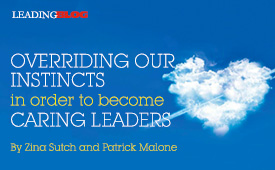
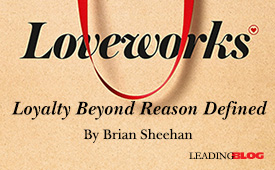
Posted by Michael McKinney at 07:08 AM
Permalink | Comments (0) | TrackBacks (1) | General Business , Personal Development
08.25.11

How Character Erodes

CHARACTER is built choice by choice, decision by decision. And it is eroded the same way. We often don't stop to think about how each choice builds on the last until it's too late. It is a worthwhile practice to think about your choices and where they are leading you on a daily basis. Ralph Waldo Emerson put it well: "The force of character is cumulative."
In a October 2002 Fast Company article—The Secret Life of the CEO: Is the Economy Just Built to Flip?—Jim Collins, explains how character erodes:
These were the people who, in the presence of an opportunity to behave differently, got drawn into it, one step after another. If you told them 10 years ahead of time, "Hey, let's cook the books and all get rich," they would never go along with it. But that's rarely how most people get drawn into activities that they later regret. When you are at step A, it feels inconceivable to jump all the way to step Z, if step Z involves something that is a total breach of your values. But if you go from step A to step B, then step B to step C, then step C to step D ... then someday, you wake up and discover that you are at step Y, and the move to step Z comes about that much easier."
![]()
![]() Like us on Instagram and Facebook for additional leadership and personal development ideas.
Like us on Instagram and Facebook for additional leadership and personal development ideas.
![]()


Posted by Michael McKinney at 10:14 PM
Permalink | Comments (0) | Personal Development
08.19.11

What to Ask the Person in the Mirror
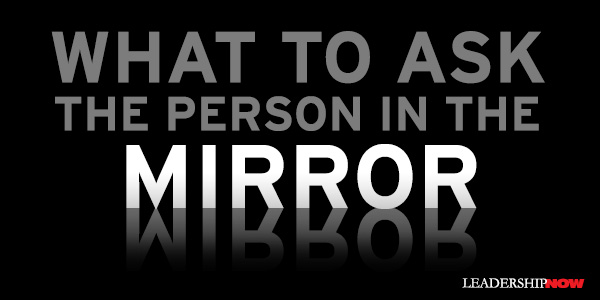
WHILE we might like to think otherwise, here is a fact about successful leaders:
Successful leaders go through significant periods of time in which they feel confused, discouraged, and unsure of themselves and their decisions. They feel as if they should be somewhere else, doing something else.
And unsuccessful leaders go through the same thing. The difference, says Harvard professor Robert Kaplan, is "how they deal with these periods of confusion and uncertainty. The trick lies not in avoiding these difficult periods; it lies in knowing how to step back, diagnose, regroup, and move forward."

This means not having all the right answers, but learning to ask the right questions. The challenge will be asking the right questions and making to the time to reflect on them. Reflecting is the key ingredient here and what many of us are short on. In his timeless book, What to Ask the Person in the Mirror, Kaplan offers seven basic types of inquiry or areas of focus—actually a system of inquiry that ties the leadership function together—that you should be looking at on a regular basis:
Vision and Priorities. In this foundational area we need to be very clear and communicate it in a way that helps others to be able to determine where to focus their own efforts. Have you developed a clear vision and have you identified three to five clear priorities to achieve that vision?
Managing Your Time. Your vision and priorities are reflected in the way you use your time. Track your time for two weeks. How does this compare to your key priorities?
Giving and Getting Feedback. Most leaders do not effectively coach their subordinates, and also fail to get the critical coaching that they themselves need in order to excel. Do you cultivate advisors who are able to confront you with criticisms that you may not want to hear?
Succession Planning and Delegation. When leaders fail to actively plan for succession, they do not delegate sufficiently and may become decision-making bottlenecks. Have you identified potential successors for your job? Why not?
Evaluation and Alignment. It is often extremely difficult as an insider to see where you and the organization have drifted out of alignment. If you had to start again, how would you do it? Would you be doing the same things? Does the design of your organization, your incentive systems, your culture, and even your approach to leading still fit the needs of the organization?
The Leader as Role Model. Many leaders fail to appreciate that their actions speak louder than their words. Self-awareness is critically important. Write down two or three key messages you believe you send with your behavior. Seek advice from key subordinates and advisors who directly observe your behavior, in order to answer this question: is there a "disconnect" between the messages you wish to send and those you are in fact sending?
Reaching Your Potential. Know and learn to manage your strengths, weaknesses, and passions, not only to bring out your best, but also to create this same environment and aspiration among your staff.
It's not uncommon to find leaders that just stick to what they know best and not address those areas where they feel uncomfortable or insecure. All of these areas need to be reflected on as they each have an impact on the other. Taking the time to reflect is not easy and "doesn't sound like fun, and may not sound as important as the fifty other things you have to fit into your day—but it works ." And be sure to take the time to reflect on these issues with your team as well.
With many down-to-earth examples, Kaplan will expand the range of questions you should be asking yourself. What to Ask the Person in the Mirror will help you to rethink unsustainable behaviors that are damaging to both you and your organization and help you to mature and grow in your leadership role.
![]()
![]() Like us on Instagram and Facebook for additional leadership and personal development ideas.
Like us on Instagram and Facebook for additional leadership and personal development ideas.

Posted by Michael McKinney at 03:57 PM
Permalink | Comments (0) | Human Resources , Leadership Development , Personal Development
07.26.11

Have a Nice Conflict!
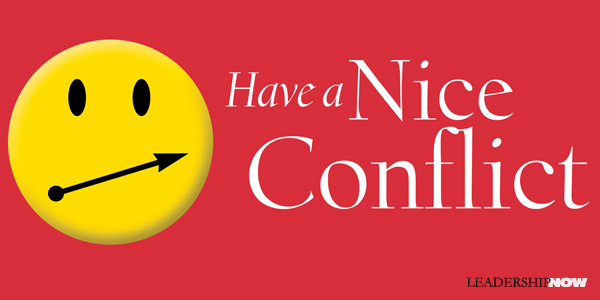
READING Have a Nice Conflict was like listening to my Dad again. He first met "Doc" Porter in the early seventies and they clicked almost immediately. Elias Porter's Relationship Awareness Theory, on which the book is based, resonated with my Dad.
Behaviors are the tools we choose and use to support our self-worth.You can look at personal strengths like behaviors. They represent the different ways a person can interact with others to achieve self-worth. When a person tries one of these strengths and has success with it, they use it more often. Other strengths might have rendered poor results, and so they might tend to use those less and less. Over time, we develop a set of "go-to" strengths. They become our modus operandi.
But it's important to remember that you have a whole tool chest of other options that may get you better results from time to time.
It is possible that some of your conflict at work happens because other people don't see your strengths the way you intend them to be seen. … So when you find another person's behavior annoying, look for the strength behind it. What are they overdoing? What are they really trying to accomplish? Most likely, their intent is not to annoy you. If you can find the strength lurking behind the perceived weakness, you've discovered insight into that person that may help you understand them better.
Conflict can happen when other people misinterpret your strengths.

Have a Nice Conflict is the story of sales manager John Doyle who has been passed over for what he believes is a well-deserved promotion. He has lost some of his top performers because he rubbed them the wrong way. When he turns up at an old friend and client's office to explain yet another change in sales reps, he puts him on to Dr. Mac to help him improve his people skills at both work and home.
Dr. Mac explains to John that there are many ways of interacting with others. We have default ways of behaving and when in conflict we often shift into other behaviors to maintain our self-worth. While we are trying to do the "right thing" to maintain our self-worth, conflict can happen when our "right thing" appears to be the "wrong thing" to another person. Conflict can be prevented by seeing contentious behavior as merely a different style instead of a direct challenge or threat aimed at annoying you or derailing you.
He introduces him to the Strengths Deployment Inventory (SDI) which is a tool to help you understand the motivations behind your own behaviors and to better discern the motivations of others. By giving you a framework it helps you to understand what you and others are feeling and then helps you be better able to respond.
Having a nice conflict is about taking personal responsibility for the interaction. To create movement toward resolution, we need to show the other person the path back to self-worth—where they feel good about themselves. That path may be different than yours. 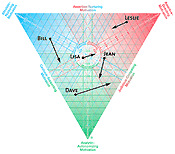 The SDI helps you understand those paths. "When we're stuck in a place of protecting our self-worth, it's much harder to help others protect or restore what's important to them. And that's the primary mission of managing conflict. Managing conflict is about creating the conditions that empower others to manage themselves out of their emotional state of conflict. To effectively manage conflict, we have to begin with ourselves. If we're pulled into conflict ourselves, we're usually not in a great position to help others."
The SDI helps you understand those paths. "When we're stuck in a place of protecting our self-worth, it's much harder to help others protect or restore what's important to them. And that's the primary mission of managing conflict. Managing conflict is about creating the conditions that empower others to manage themselves out of their emotional state of conflict. To effectively manage conflict, we have to begin with ourselves. If we're pulled into conflict ourselves, we're usually not in a great position to help others."
The concept should be taught in schools, however, the thought process is essential for leaders. The book alone offers valuable insights into the process and methodology, but coupled with the SDI you'll have greater success. The authors offer a discount on the SDI to readers of the book.
![]()
![]() Like us on Instagram and Facebook for additional leadership and personal development ideas.
Like us on Instagram and Facebook for additional leadership and personal development ideas.

![]()
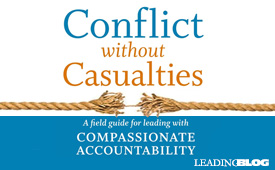
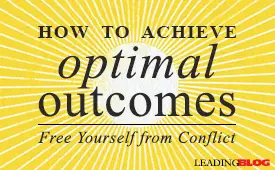
Posted by Michael McKinney at 05:08 PM
Permalink | Comments (0) | Communication , Human Resources , Management , Personal Development , Problem Solving , Teamwork
07.12.11

Learn From Your Heroes, but Believe in Yourself
It is natural to want to be like the people we look up to. We want to recreate the success they have enjoyed in our own lives. So we try to imitate them. It seems like the shortest distance between two points. Of course, we are trying to copy a result. What we often fail to see is the work it took to get them to the place where they could do what they do. And sometimes it's all flash and no substance.
And while you can try to copy a style, mannerisms, or life path, what makes it work for them isn't what is written down. It's what they can't teach you that makes it work for them. It's the things you can't easily articulate that come from the core of your being—that which makes you you—that makes the difference.
Harvard Business School Professor and former Medtronic CEO Bill George, wrote, "Any prospective leader who buys into the necessity of attempting to emulate all the characteristics of a leader is doomed to failure." It's one thing to learn from others, it's quite another to try to imitate them.
A big part of the problem is the lack of confidence we have in ourselves. Sometimes in watching the success of others, we lose faith in ourselves. "There is but one cause of failure and that is a man's lack of faith in his true self," observed William James.
Jazz saxophonist Stan Getz took a teaching position at Stanford in 1986. In an interview with a reporter about his role there, he put it this way:
I'm a strong opponent of imitation. I always tell them that they have to be themselves. That's hard, because they don't believe in themselves, they believe in their heroes. And I will tell them: that's perfectly alright, but your hero is the only one who can play that way. If you want to try and do the same thing, it will only be an imitation, however perfectly you will do it. I keep on trying to convince them that they have to play what they feel themselves. But that's not easy.
Your hero is the only one that can play it that way. Be yourself.
Like us on Facebook
Posted by Michael McKinney at 04:43 PM
Permalink | Comments (0) | Personal Development
07.05.11

Footwashing for Leaders
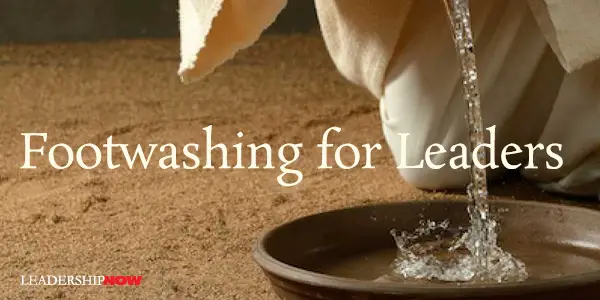
AN EASY TRAP trap for any leader to fall into is the "Look what I did!" trap. Success easily erodes humility. Humility isn't about the lack of ambition but acknowledging the luck, the good fortune, and the contributions of others to your success. It is the humility that comes with a habit of respect for others. Stephen Hall calls it the "gift of perspective." It is indeed. Humility is all about perspective.
Fast Company co-founder Bill Taylor argues in Are You "Humbitious" Enough to Lead? in the Summer 2011 Leader to Leader journal, that "the best way to deliver on an ambitious agenda for your organization is to embrace a sense of "humbition" in your personal style and as part of your leadership repertoire."
Taylor reports that "in a manifesto of sorts that urged up-and-coming IBMers to embrace a new leadership mind-set, Jane Harper, a 30-year veteran of IBM and a group of her colleagues offered a compelling description of what it takes to succeed in a complex, fast-moving, hard-to-figure-out world. Their strongly worded advice to aspiring leaders inside IBM should be read as words of wisdom for leaders at every level of all kinds of organizations:"
"Humbition is one part humility and one part ambition. We notice that by far the lion's share of world-changing luminaries are humble people. They focus on the work, not themselves. They seek success—they are ambitious—but they are humbled when it arrives. They know that much of that success was luck, timing, and a thousand factors out of their personal control. They feel lucky, not all-powerful. Oddly, the ones operating under a delusion that they are all-powerful are the ones who have yet to reach their potential. . . . [So] be ambitious. Be a leader. But do not belittle others in your pursuit of your ambitions. Raise them up instead. The biggest leader is the one washing the feet of the others.
Success most often doesn't come from our efforts alone but in our ability to include and organize the contributions of others; to coax the fragments of a good idea from the hearts and minds of others; from a practiced watchfulness that comes from knowing that a good idea can come from anyone or anywhere. The result, when it comes together—the execution of a great idea—should be humbling to any leader.
It is humility coupled with ambition that correlates with results.
![]()
![]() Like us on Instagram and Facebook for additional leadership and personal development ideas.
Like us on Instagram and Facebook for additional leadership and personal development ideas.
![]()
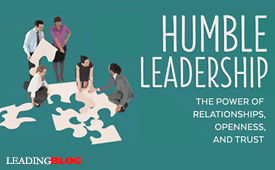
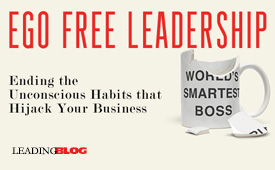
Posted by Michael McKinney at 11:04 PM
Permalink | Comments (0) | Personal Development
06.24.11

Does Your Wellbeing Need a Boost?

GALLUP scientists have determined that there are five universal and interdependent elements of wellbeing that differentiate a thriving life from one spent suffering:
- Career: liking what you do every day (Tip: Every day, use your strengths.)
- Social: having strong relationships (Tip: Spend six hours a day socializing—face-to-face, phone, e-mail.)
- Financial: a well managed economic life (Tip: Spend on others instead of solely on material possessions.)
- Physical: having good health and the energy to get things done on a daily basis (Tip: Get at least 20 minutes of activity each day and 7 to 8 hours of sleep each night.)
- Community: a sense of engagement with the area where you live (Tip: Identify how you can contribute in your community based on your own values.)
Statistically, while 66% are doing well in at least one area, only 7% are thriving in all five. If we are struggling in any one of these areas, as most of us are, it damages our wellbeing and wears on our daily life.
Ways to measure and improve in each of these areas is provided in Wellbeing by Tom Rath and Jim Harter. (The Wellbeing Finder can be taken online by using the code provided in the book.)
Our wellbeing will not improve if we don't make a conscious decision to do so. Small changes can have a huge impact. To get started they recommend setting positive defaults.
One of the best ways to create more good days is by setting positive defaults. Any time you help your-short-term self work with your long-term self, you have an opportunity.You can intentionally choose to spend more time with the people you enjoy most and engage your strengths as much as possible.
You can structure your finances to minimize the worry caused by debt.
You can make exercise a standard part of your routine. You can make healthier decisions in the supermarket so you don't have to trust yourself when you have a craving a few days later.
And you can make commitments to community, religious, or volunteer groups, knowing that you will follow through once you've signed up in advance.
Through these daily choices, you create stronger friendships, families, workplaces, and communities.
![]()
![]() Like us on Instagram and Facebook for additional leadership and personal development ideas.
Like us on Instagram and Facebook for additional leadership and personal development ideas.

![]()


Posted by Michael McKinney at 06:12 PM
Permalink | Comments (0) | Personal Development
05.24.11

Got Drama?

YOU can't stop The Drama . There will always be drama.
But that's not the problem says Marlene Chism, author of Stop Workplace Drama. "The amount of time you stay in the drama—and the effort you put toward it— is the problem. Complaints, excuses, and regrets only serve to keep the drama alive." Your drama—what you add to The Drama—is the problem.
Chism defines drama as "any obstacle to your peace and prosperity." Drama is the result of not recognizing or taking care of the little signs of bigger problems when they first presented themselves. At the core of drama, you will find one of three common elements (if not all three): a lack of clarity, a relationship issue, and/or resistance. So, says Chism, when you experience drama you need to ask yourself three questions:
1. Where am I unclear?
2. What is my relationship issue?
3. What am I resisting?
Chism presents eight principles for dealing with drama, but "lack of clarity" struck me as the most common and excuse-laden trap there is. Too often this is where we get stuck.
When we first set a goal we're clear. In her terms, "we see the island." But between here and there the process becomes difficult and someone on your team becomes unhappy, and, "instead of focusing on the island we are trying to reach, we're now concentrating on pleasing the one person who is upset. Our focus has shifted because we became confused about our number one priority." And the fog rolls in.
"Any type of discord, abuse, confusion, or game-playing always boils down to a lack of clarity." A loss of focus.
Sometimes we create drama because we want something on our terms. We imagine that we can't do something because we can't do it the way we think it should be done—our way. Chism relates a clarifying example of this with the recently divorced Joe who is having visitation issues with his ex-wife Patty. She's not letting him do what he wants in the way that he wants.
Many people get stuck in the drama of what should or shouldn't be. Yes, you can fight that battle, if winning a battle is what you want. But again, in order to clear the fog and help Joe get clarity, I asked, "If there are two islands you can go to, and one means winning a battle with your wife and the other island is getting to see your kids and be a father to them—then which island would you choose?"He said, "Seeing my kids, but…"
I said, "No buts. Are you willing to drive to Illinois several times a year and spend quality time with your kids, even if Patty does nothing more than cooperate?"
Joe said, "Yes."
It's never as difficult as we make it when we get clear on what we can control and what we are committed to.. The point here is that clarity may or not change Joe's ex-wife. Joe will struggle if that is his motive or intention. However, Joe's clarity will give him the essence of what he really wants. If he is able to let go of distractions and not get stuck on the rocks that lie between him and his final goal.
Do you see that while this kind of clarity may not change all the drama, it will give you peace and free up your energy for more productive endeavors?
This kind of dynamic plays out every day in our business and personal lives. When we are not clear about what we want, what our values are, what we are committed to, it is easy to lose our focus, to drift off course
Solution: Clear the fog.
Chism has written a good-natured and practical book that will change your thinking and in the process help you to control the drama in both your personal and professional life. As leaders, we have the responsibility to be very clear with ourselves and our team so that we don't get pulled into negativity, gossip, power plays, resistance and … drama. Chism suggests asking the following questions:
What are my top 10 principle-based values?
What areas of my life or business are in the fog?
What are some of the distractions that take me off course?
Where do I get stuck?
Where can I improve as a leader?
What drama do I see on a daily basis in the workplace?
What drama do I see in my personal life?
Where am I avoiding or procrastinating?
![]()
![]() Like us on Instagram and Facebook for additional leadership and personal development ideas.
Like us on Instagram and Facebook for additional leadership and personal development ideas.

Posted by Michael McKinney at 10:00 PM
Permalink | Comments (0) | TrackBacks (1) | Change , Communication , General Business , Human Resources , Management , Personal Development , Teamwork , Vision
05.06.11

3 Attributes that Will Help You be Better Under Pressure

JUSTIN MENKES says that there are no longer periods of calm seas for leaders in any industry. So it's not a matter of gritting your teeth and riding out the crisis. Leaders must get comfortable in an environment of ongoing stress. They must be Better Under Pressure.
To do this a leader must possess a "highly unusual set of attributes that often run counter to natural human behavior." This means leaders must "foster specific attributes to achieve maximum success in themselves and their people. No longer can leaders think of leadership as unidirectional. Instead, leadership "becomes a fluid, virtuous cycle of exchange and growth between leaders and the people they lead."
Menkes writes, "Almost every human being alive today has an underutilized thirst for bettering himself or herself. It is up to leaders to discover how to trigger this thirst—in fact, it is a leader's most critical responsibility." Recognizing and developing that thirst is something that must be and can be learned.
He identifies three catalysts that will help a leader to realize his or her own potential and the potential of others:
Realistic Optimism. Striking a balance between the known and unknown. Kevin Sharer, CEO of Amgen, said, "With all the things that are going on in today's workplace, if you're not a little bit self-reflective and self-aware, you're not going to make it." And you won't get the best from your team.
Awareness requires humility. Humility allows you to see yourself as you are. It also allows you to see your role in any problem.
Realistic optimism creates a sense of agency—the degree to which you believe your circumstances are within your control. "People must recognize how—and that—their own approach to the problem can either exacerbate these obstacles or bridge the space between two parties."
You must learn says Menkes, "to minimize the ways your mind distorts reality."
Subservience to Purpose. While realistic optimism allows leaders to see and address deficiencies in themselves and the world around them, subservience to purpose gives them the drive to do so. In this framework, "people's level of dedication toward the mission of the enterprise is paramount, rather than their dedication to each other….Hierarchical distinctions are secondary to the overarching value system that considers the company's noble missions its most important function."
Subservience to purpose means developing affect tolerance or "the ability to channel intense reactions to recurring setbacks in a way that not only avoids hampering you, but also constructively keeps you and your organization moving forward toward maximum potential."
It is vital that a leader understand the outsized effect that their emotional behaviors have on their people. Not managing your emotions and reactions—especially in a stressful environment—will hinder other people's progress. You must temper the intensity of your responses "with the awareness of the unequal power dynamics you share with your team." This also means keeping in check your sense of self-importance. Menkes writes:
Grandiosity is particularly costly to you as a leader, because its expression unintelligently telegraphs to your subordinates that you believe the group's accomplishments are largely due to your involvement. This why expressing humility is so important because when you are humble, you clearly communicate to others that you recognize the critical role each team member plays in contributing to the organization's progress.
Fred Smith, founder, chairman, and CEO of FedEx told Menkes:
As a founder, you must be able to resist any temptation to let the organization become a cult of personality built around you. FedEx isn't about me. When I walk out the door here, this organization won't miss a beat."
How many can (want to) say that?
Finding Order in Chaos. This attribute is about maintaining clarity of thought and a drive to solve the puzzle. Maintaining clarity of thought is developed by learning how to manage your stress in such a way that it fuels your focus and increases your clarity. To do this, one must seek out experiences that support your sense of competence under duress—"managing adrenaline without panic and gaining confidence that the sensations that stress induces will not lead to collapse."
The drive to solve the puzzle "manifests itself as an intense intellectual curiosity…and a pleasure in finding solutions to them." Menkes adds, "The positive feedback we get from maintaining clarity under pressure gives us a thirst for more situations that involve pressure, and we are thus driven to solve the puzzle."
 All of these attributes work to develop the other. Understanding things as they are gives you the confidence to face the issues with the mission in mind. Success in this area drives you to remain calm and find solutions to the problems with those around you. "Once you experience the gratification of triumph in the pursuit of meaningful goals, the virtuous cycle of realizing potential becomes a regenerating flywheel that is transmitted to others."
All of these attributes work to develop the other. Understanding things as they are gives you the confidence to face the issues with the mission in mind. Success in this area drives you to remain calm and find solutions to the problems with those around you. "Once you experience the gratification of triumph in the pursuit of meaningful goals, the virtuous cycle of realizing potential becomes a regenerating flywheel that is transmitted to others."
Importantly, Menkes reminds us, "people do not act as isolated entities, but are reflections of an essential interaction between themselves and the context in which they are placed….A person's potential can only emerge as an active process, consciously cultivated through a fluid, ongoing exchange between leaders and their people." It serves to remind us of the privilege and huge responsibility leadership truly is. To see leadership primarily as a function of authority, is to totally miss the mark.
I've only offered an overview of the ideas Menkes presents here. There are so many more insights in this book than can be provided here. But reading the examples of those who exemplify theses attributes and those who haven't, coupled with the interviews of 25 leaders, you will come away with a sense of where you stand and a confidence that you can improve in any area you identify.
![]()
![]() Like us on Instagram and Facebook for additional leadership and personal development ideas.
Like us on Instagram and Facebook for additional leadership and personal development ideas.

![]()


Posted by Michael McKinney at 05:13 PM
Permalink | Comments (0) | Personal Development
04.12.11

From Values to Action
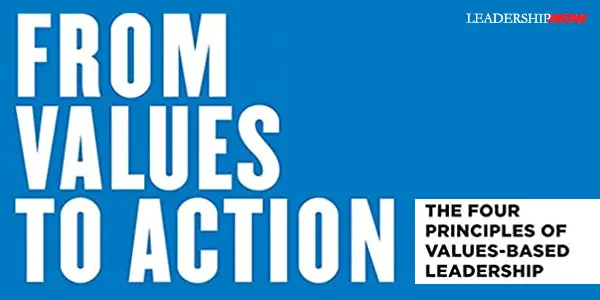
FORMER chairman and chief executive officer of Baxter International, Harry Kraemer, has written a genuine, back-to-basics book on value-based leadership: From Values to Action. He presents four interconnected principles that build on and contribute to each other:
Self-Reflection is the most important and is central to your leadership. "If you are not self-reflective, how can you truly know yourself?" writes Kraemer. "If you do not know yourself, how can you lead yourself? If you cannot lead yourself, how can you possibly lead others?"
Self-reflection allows you to transform activity into productivity for all the right reasons. It means "you are surprised less frequently." It is essential in setting priorities. You can't do everything. So reflection makes it possible to answer key questions like What is most important? and What should we be doing? in a way that is in line with your strengths and values and organizational goals.
Engaging in self-reflection on a regular, ongoing basis (preferably daily) keeps you from becoming so caught up in the momentum of the situation that you get carried away and consider actions and decisions that are not aligned with who you are and what you want to do with your life.
Balance and Perspective is the ability to understand all sides of an issue. Pursuing balance means you will have to grasp the fact that leaders don't have all the answers. Kraemer says, "My task was to recognize when a particular perspective offered by one of my team members was the best answer….Leadership is not a democracy. My job as the leader is to seek input, not consensus."
Because he believes we are more effective if we balance all areas of our life, he prefers the term "life balance" over "work-life balance." It's not an either-or proposition. "When you identify too closely with your work, you can easily lose perspective and become unable to look at all angles in a situation." He recommends implementing a "life-grid" to keep track of where you are spending your time and to hold yourself accountable.
True Self-Confidence is know what you know and you don't know; to be comfortable with who you are while acknowledging that you still need to develop in certain areas. (Comfortable not complacent.) Why TRUE self-confidence?
There are people who adopt a persona that might make others think that they have self-confidence, but they are not the real deal. Instead, they possess false self-confidence, which is really just an act without any substance. These individuals are full of bravado and are dominating. They believe they have all the answers and are quick to cut off any discussion that veers in a direction that runs contrary to their opinions. They dismiss debate as being a complete waste of time. They always need to be right—which means proving everyone else wrong.
Genuine Humility is born of self-knowledge. Never forget where you started. "Genuine humility helps you recognize that you are neither better nor worse than anyone else, that you ought to respect everyone equally and not treat anyone differently just because of a job title."
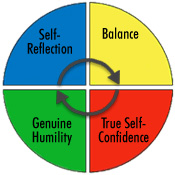 After describing each of these principles, Kraemer explains how these four elements play in everyday situations such as talent management and leadership development ("The values based leader is looking for people who exhibit the values that are most important to her."), setting a clear direction (You've been tasked with creating a quick strategy, the first step is to listen. "This is precisely the time that you need to draw upon the capabilities of the excellent team you've put together."), communication ("Never assume you have communicated enough."), motivation ("What you must do is relate to others by letting them know who you are and the values you stand for."), and execution ("As you become a leader, you will shift from knowing the right answers to asking the right questions.").
After describing each of these principles, Kraemer explains how these four elements play in everyday situations such as talent management and leadership development ("The values based leader is looking for people who exhibit the values that are most important to her."), setting a clear direction (You've been tasked with creating a quick strategy, the first step is to listen. "This is precisely the time that you need to draw upon the capabilities of the excellent team you've put together."), communication ("Never assume you have communicated enough."), motivation ("What you must do is relate to others by letting them know who you are and the values you stand for."), and execution ("As you become a leader, you will shift from knowing the right answers to asking the right questions.").
Kraemer describes a values-based leader well: "Self-reflection increases his self-awareness. Balance encourages him to seek out different perspectives from all team members and to change his mind when appropriate in order to make the best possible decisions. With true self-confidence, he does not have to be right, and he easily shares credit with his team. Genuine humility allows him to connect with everyone because no one is more important than anyone else."
From Values to Action is an outstanding book and filled with important concepts that any would-be leader would benefit from.
![]()
![]() Like us on Instagram and Facebook for additional leadership and personal development ideas.
Like us on Instagram and Facebook for additional leadership and personal development ideas.

![]()


Posted by Michael McKinney at 04:13 PM
Permalink | Comments (0) | Communication , Human Resources , Leaders , Leadership Development , Management , Personal Development , Positive Leadership
04.05.11

Enchantment: The Art of Changing Hearts, Minds, and Actions
Guy Kawasaki has made a career out of enchanting people. He has summarized what he has learned so far in Enchantment. (Think How to Win Friends and Influence People 2011.) Reading his book you will clearly see that enchantment doesn't happen by accident. It is a state of mind that can be developed and perfected.
In a perfect world, if you had a better mousetrap, the world would beat a path to your door. Unfortunately it doesn't work that way anymore. In our social media driven world you need to enchant them.
You need enchantment when you are trying to change the world because you need to convince people to dream the same dream you do, you need to overcome inertia and the fear of big changes, the process of getting people to diverge from a crowd is similar to getting them to join one, and you need people to engage for the long term.
The process of delighting (enchanting) people with a product, service, organization, or idea begins with three steps:
Likeability. Guy knows likeability. (330,000+ Twitter followers can't be wrong.) You need people to like you. The way to do that says Kawasaki is to accept others and find something to like in them.
Trust. Like likeability, you go first. You trust others first and they will trust you. Kawasaki says there are two types of people in the world: bakers and eaters. Eaters think zero-sum. They want the biggest slice of any pie. The bakers don't see the world as zero-sum game. They want to make more and bigger pies. Bakers are more enchanting than eaters.
Get Ready. Make your offering great. It should be DICEE—Deep (many features), Intelligent (clever/innovative), Complete (all aspects of the offering is a great experience), Empowering (makes possible what you couldn't do before), and Elegant (works with you not against you).
As a part of getting ready he suggests you do a pre -mortem. Before the launch, assume you failed and ask, "What might have gone wrong?" Come up with reasons why the failure occurred in order to prevent problems and increase the likelihood of success.
In two very practical chapters, Kawasaki talks about push and pull technology. "Push technology brings your story to people. Pull technology brings people to your story." Push technologies are presentations, e-mail and Twitter. Pull technologies are web sites, blogs, YouTube and Facebook.
Enchantment is about becoming the kind of person people want to follow and it begins with approaching people thinking how you help them rather than wondering what they can do for you.
How enchanting are you? Take Guy's Realistic Enchantment Aptitude Test online.
Posted by Michael McKinney at 11:32 AM
Permalink | Comments (0) | Personal Development
03.07.11

This Might Not Work! Start anyway. Poke the Box.
Building on the ideas he first presented in Linchpin, Seth Godin is back encouraging us to start things—start a project, make a ruckus, take what feels like a risk. Poke the Box is about seeing what happens.
"The box," writes Godin, "might be a computer or it might be a market or it might be a customer or it might be your boss. It's a puzzle, one that can be solved in only one way—by poking. When you do this, what happens? When you do that, what happens? The box reveals itself through your poking."
Godin says the opportunity is in creating unique learning experiences that are worth sharing. He advises that we start and keep staring until the project is finished. Failure is a part of starting anything worthwhile. "If you can't fail, it doesn't count."
Here are a few more bits of Godin wisdom:
Look for the fear. That's almost always the source of your doubt.Reject the tyranny of picked. Pick yourself.
Sooner or later, many idealists transform themselves into disheartened realists who mistakenly believe that giving up is the same thing as being realistic.
Poking doesn't mean right. It means action. Once we learn how to take initiative we see opportunities all around us.
Godin notes, "I've had a lot of practice in poking the box, figuring out which ideas resonate, and then shipping them. The more you do it, the more it gets done and the less crazy you feel." He also cautions, "Poke. But be smart about it." Poke the Box is an effective and convincing book, but more importantly, if applied, is transformational.
As you might expect from Godin, Poke the Box: The Workbook is available as a free download on the Domino Project web site.
Posted by Michael McKinney at 12:30 AM
Permalink | Comments (0) | Personal Development

Don't Wait for the Clouds to Part. Get Going.
Creating and producing is mostly a matter of getting out of the rut, allowing the process to guide you, letting go of perfection, and showing up. Consistently. Daily.
Chuck Close, renown American photorealist painter and photographer, says that in his work, so much is embedded in the process of following the path wherever it leads. The important thing is to get going. He said:
"If you wait for clouds to part and be struck in the head with a bolt of lightning, you're likely to be waiting the rest of your life. But if you simply get going something will occur to you."
Posted by Michael McKinney at 12:24 AM
Permalink | Comments (0) | Personal Development
02.11.11

Taking Another Look: Leading Minds on Reflection Part 4
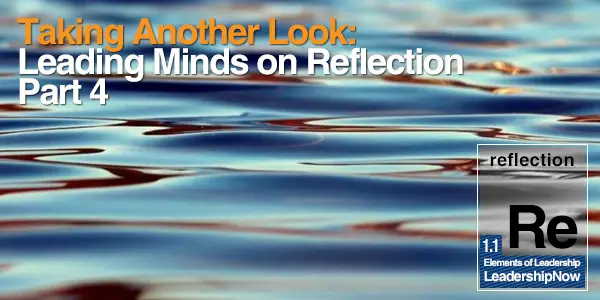
In the final part of this series, Marshall Goldsmith explains the relevancy of reflection in today's world. It has always been a vital ingredient to success, but it becomes critical in the age of the knowledge worker. Jeremy Hunter teaches courses on The Practice of Self-Management at The Peter F. Drucker and Masatoshi Ito Graduate School of Management. He emphasizes a focus on reflecting in real-time—in the present—in order to align both our intentions and behaviors so that we might bring about the results we seek.
![]() Marshall Goldsmith, executive educator and coach:
Marshall Goldsmith, executive educator and coach:
I believe that the process of reflection is more important today than ever before. I also believe that it is more challenging.
We live in the age of the knowledge worker. Peter Drucker defined knowledge workers as 'people who know more about what they are doing than their boss'. Knowledge workers need to think and reflect. They have to listen and learn. They cannot just 'do what they are told', since their managers know less than they do about what they are doing.
On the other hand, we live in a world of constant stimulus. Our minds are barraged by media of all forms. Cell phones, emails, text messages, and personal computers have reduced our already-limited attention spans.
One of the great challenges for the knowledge worker of the future is finding the time to think - in a world that is screaming at you to act.
![]() Jeremy Hunter, Adjunct Professor, The Peter F. Drucker and Masatoshi Ito Graduate School of Management:
Jeremy Hunter, Adjunct Professor, The Peter F. Drucker and Masatoshi Ito Graduate School of Management:
When we think of "reflection" it tends to be retrospective. Where I think my work is a bit different is that I focus on what a leader is doing right now as it is happening––reflection and awareness in the moment. Most people's immediate action will very likely be an automatic non-conscious process that they're not aware of. Throw in a little stress and emotional reactivity and people find themselves doing and saying things that are destructive to themselves, others, and their goals without understanding why nor knowing what to do about it.
The big issue is that the retrospective analysis alone can't necessarily change a person's immediate habits. Science tells us that 90% or more of the brain's activity is automatic and non-conscious. However, we have a worldview that focuses largely on conscious processing, we think that having the answer makes change automatically happen. A friend might say, "You know, Ruth, when you're confronted with a challenge from a superior, you react too strongly." OK, now Ruth knows that. We assume that just because Ruth knows what she does, she will change it. But there's a whole other process that has to happen to change the wired-in, non-conscious, automatic pattern. Ruth may be 100% aware of what she does but then the trigger happens and it plays out in the same way. And then it's, "Oh no, I did it again."
Change happens in the choices we make right now. So my interest is in, how you actually retrain the brain by interrupting that automatic habit and doing something differently. You may have to do it over and over again but at some point, the rewiring function will happen. And that's a function of interrupting that immediate non-conscious habit and doing something different.
I give people a model of this process from the triggering moment of contact to the final result. All along there are intervention points. Of course, the earlier you can intervene, the better. Not everyone can interrupt the process early on, but what I emphasize is that you just need to interrupt it somewhere. And the more practiced one gets at it, the earlier you can see what is happening. It's really about becoming more conscious about what you are doing, why you are doing it, what result do you want and do these behaviors get you there, and if they don't, what do you need to be doing instead?
You always start with the repeated unwanted result. What's the thing that keeps happening that you don't want? For example, Ruth might say, "I notice that whenever I'm confronted, I fight back too aggressively or I get too hostile." So now she knows that about herself and that's the reflective piece. Now, let's tie that reflection to action.
The next step is to build awareness of when and how that habit plays out. For example, "I have this meeting with my boss and I know he's upset about something. What is it I do that might push back too hard, that gets me in trouble?" And so in that moment, she's bringing attention to all the things that happen automatically--what is she doing? What is she feeling in the body? Tension? Pressure? What emotions are arising? What are the stories in her head? Directing her attention to her internal experience creates the awareness of the non-conscious habit. She now has the opportunity to step outside all those automatic reactions and make a different, more conscious choice. We're tying the process of reflection to immediate behavior. Again, change happens in the choices we make right now.
As people are increasingly "burned out" from the stress and uncertainty of the economic reset, it's too simplistic to just return to basic vacation policies, doing little to introduce meaningful distinctions between home and work. When the workday rarely ends, given technology's ability to engage employees any time and anywhere, sabbaticals offer a refreshing moment to simply pause. Sabbaticals lead to people stepping back to see their work and creativity through a different lens.
—Daniel Patrick Forrester, Consider
More in this Series:
![]() Taking Another Look: Leading Minds on Reflection Part 3
Taking Another Look: Leading Minds on Reflection Part 3
![]() Taking Another Look: Leading Minds on Reflection Part 2
Taking Another Look: Leading Minds on Reflection Part 2
![]() Taking Another Look: Leading Minds on Reflection Part 1
Taking Another Look: Leading Minds on Reflection Part 1
![]() Consider: Harnessing the Power of Reflective Thinking in Your Organization
Consider: Harnessing the Power of Reflective Thinking in Your Organization
![]()
![]() Like us on Instagram and Facebook for additional leadership and personal development ideas.
Like us on Instagram and Facebook for additional leadership and personal development ideas.
Posted by Michael McKinney at 11:14 AM
Permalink | Comments (0) | TrackBacks (2) | Elements of Leadership , Human Resources , Personal Development
02.10.11

Taking Another Look: Leading Minds on Reflection Part 3
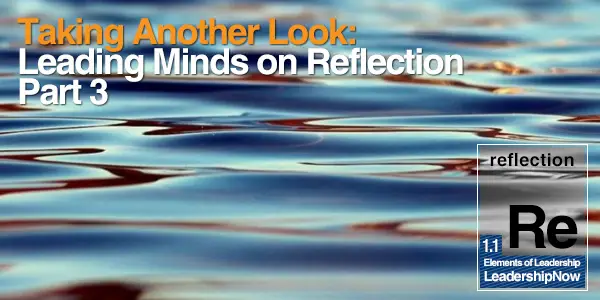
In part three of this series, James Strock talks about the importance of taking time "off" from one's customary activities. He also gives insight into gaining perspective through reflection.
Mark Sanborn talks about the essential nature of making time to think so that we might learn and gain insight from our experiences. He lists some areas we should be thinking about so that we might get the most out of our time reflecting.
![]() James Strock, speaker, consultant and entrepreneur:
James Strock, speaker, consultant and entrepreneur:
There is nothing more important—or more easily overlooked—than making time for disciplined reflection. Indeed, it should be scheduled—and protected and enforced—with the utmost seriousness.
Religious traditions include notions of a Sabbath, a day of rest and reflection. It's a recognition that taking time "off" from one's customary activities is necessary to fulfill one's obligations, to perform effectively over time. It's also an act of humility, pulling people away from a prideful presumption of the significance of their personal contribution and control when it tends toward isolating, habitual overwork.
It's surely not a coincidence that so many of the greatest leaders have been noted for multiple interests. Winston Churchill was active as a painter, speaker, historian, and commentator on current events. Theodore Roosevelt was, in the memorable description of Brander Matthews, "polygonal." George Washington and Abraham Lincoln maintained perspective through theatre. Though it would be an error to say that effective leaders have "balanced" lives at any given moment, they tend to bring a number of interests to bear—thereby increasing their capacity to see things from various perspectives and to discern and appreciate the contributions of others.
In business, one thinks of Bill Gates' semi-annual, week-long sabbaticals for study and reflection. Many enterprises—from Google and GE to sports teams—encourage regular meditation or related mental exercises. To the extent each day can be seen as a sort of lifetime in itself, meditation or prayer can also be viewed as a sabbatical of sorts.
In my personal experience, travel can be invaluable. Simply being pulled out of one's daily routines and habits, and being inspired by new surroundings, can be mentally and spiritually invigorating. You may see familiar notions with new eyes.
Though disciplined reflection has always been important for leadership, it's arguably more important now than ever before. In the 21st century, information and data are often ubiquitous. The value added by leaders—either in high positions or not—increasingly arises from those invaluable intangibles: judgment and insight. Both of those are more likely to be found with disciplined reflection. And there's no better place to start than from history and the observations and experiences of others, such as is offered so notably by LeadershipNow.
![]() Mark Sanborn, author and speaker:
Mark Sanborn, author and speaker:
Someone once said if we don't slow down occasionally nothing good can ever catch us. I think that sentiment applies to the good that can come out of reflection.
One of the reasons we don't learn—truly internalize lessons—and keep making similar mistakes is that we don't pause long enough to gain any insights.
Most of the busy and successful professionals I work with—and myself included—can go for long periods of time without actively thinking. We reactively think—response to questions, problems, opportunities, etc.—but don't make time to proactively think.
I frequently say that nobody has time for anything; we make time for what is important. So often we live life by default and let circumstance and the demands of others determine how we spend our time. I believe we need to make time for reflection. We make time when we priorities, eliminate and adjust our schedules.
Specifically, I think leaders should reflect on:
- What they are accomplishing versus how busy they are.
- What they have learned. Leaders need to extract lessons from both the positive and negative things that happen.
- How they are feeling. Leaders can't divorce their intellect from their emotions and succeed over the long run.
- Relationships that need attention.
- Their vision of the future, for their organizations, those they lead and themselves.
- And for leaders who believe in the spiritual realm, as I do, that is a critical area for reflection (prayer and meditation in the Christian tradition I follow).
Reflection usually requires "getting away" whether that requires a physical relocation to a peaceful thinking spot or simply blocking time to avoid interruptions.
And finally, I think those leaders who value reflection and benefit most from it make it a regular part of their schedules.
There is a hierarchy of communication we all practice, in which electronic and immediate data responses reign far above in-person and more time-intensive, dialogue-driven interaction. The trade-off is easy to make: we gain speed, immediate connection, and reactions while giving up richer contexts that emerge only when we take time to think. There are times when the arrival of each new electronic message or data-driven distraction has become a digital proxy for the sound of a bell once used by a doctor named Pavlov.
—Daniel Patrick Forrester, Consider
More in this Series:
![]() Taking Another Look: Leading Minds on Reflection Part 4
Taking Another Look: Leading Minds on Reflection Part 4
![]() Taking Another Look: Leading Minds on Reflection Part 2
Taking Another Look: Leading Minds on Reflection Part 2
![]() Taking Another Look: Leading Minds on Reflection Part 1
Taking Another Look: Leading Minds on Reflection Part 1
![]() Consider: Harnessing the Power of Reflective Thinking in Your Organization
Consider: Harnessing the Power of Reflective Thinking in Your Organization
![]()
![]() Like us on Instagram and Facebook for additional leadership and personal development ideas.
Like us on Instagram and Facebook for additional leadership and personal development ideas.
Posted by Michael McKinney at 10:58 AM
Permalink | Comments (0) | TrackBacks (3) | Elements of Leadership , Human Resources , Personal Development
02.09.11

Taking Another Look: Leading Minds on Reflection Part 2
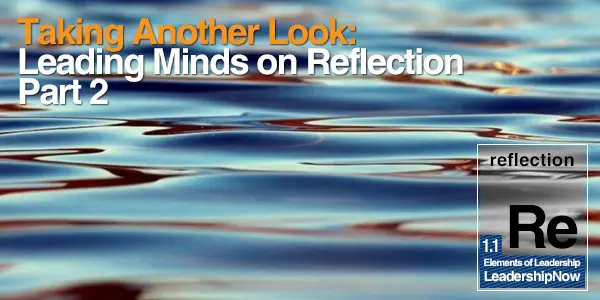
In part two of this series, Tom Asacker philosophizes about the nature of reflection. His insights help us to understand that until we start to see our connection to reality, core changes rarely happen. Have we given the proper consideration to the impact of what we do? Then, Brian Orchard emphasizes the need to slow down enough to absorb what we are experiencing. He talks about the need to take a second look to gain understanding and the importance of getting counsel in decision making.
![]() Tom Asacker, author, speaker and professional catalyst:
Tom Asacker, author, speaker and professional catalyst:
I've noticed something interesting of late. I've been spending more time reflecting on my work than passionately involved in the doing of it. To an outsider, it may look like idleness. In fact, history informs me that it's a necessary prelude to meaningful change, to boldness and growth.
Our work should be designed to move us forward, toward a worthy ideal, meaning, and a better life. But in order to get there, we must occasionally pause from its narcotic effect and critically evaluate its impact on our happiness and well-being, and its resulting influence on our community and environment. We must sit quietly and reflect.
Reflection is not daydreaming. Reflection is imaginative inquiry; it's an internal dialogue that asks, Am I making a difference? Is this the best that I can do? Will people be advanced by my efforts? Will my children be proud of my actions? Yes, there is boldness in action. But we must follow action with quiet reflection for that boldness to remain relevant and vibrant.
Elbert Hubbard wrote, "The reason men oppose progress is not that they hate progress, but that they love inertia." Reflection is the path to progress. Imaginative reflection breaks the powerful grasp of inertia—the desire to stay the course regardless of the impact on our lives—and moves us courageously towards our higher potential.
![]() Brian Orchard, pastor:
Brian Orchard, pastor:
This quote from the Guardian summarizes for me, where we are at: "Although, because of the Internet, we have become very good at collecting a wide range of factual tidbits, we are also gradually forgetting how to sit back, contemplate, and relate all these facts to each other." And so, as Carr writes, "we're losing our ability to strike a balance between those two very different states of mind. Mentally, we're in perpetual locomotion."
From my experience as a minister, I have found that an issue is rarely understood well by the first exposure to it. Our first response is usually weighted by whoever presented the issue. It takes time and thought to slowly come to a more complete understanding. The value of reflection in this case allows for a deeper understanding to be obtained by thinking about the issue and allowing it to be seen from a number of angles.
There are two biblical principles that to me, support reflection. First, Proverbs 18:17 states, "The one who states his case first seems right, until the other comes and examines him." We all have the tendency to accept the first version of what we hear, but the concept of "searching" carries the idea of talking and asking questions, but also thinking about the situation and the reconsidering of fundamental assumptions.
The second is simply the whole idea of seeking counsel. This must mean a certain amount of reflection and counsel has a strong bearing on decision making.
Devaluing reflection while expecting constant growth and innovation is nonsensical. It's only when we step away from the onslaught of the day that a new direction arises (good or bad). By never stepping away and, instead, insisting on constant connectivity, you can't be sure if what you are working on will prove you to be relevant in the future.
—Daniel Patrick Forrester, Consider
More in this Series:
![]() Taking Another Look: Leading Minds on Reflection Part 4
Taking Another Look: Leading Minds on Reflection Part 4
![]() Taking Another Look: Leading Minds on Reflection Part 3
Taking Another Look: Leading Minds on Reflection Part 3
![]() Taking Another Look: Leading Minds on Reflection Part 1
Taking Another Look: Leading Minds on Reflection Part 1
![]() Consider: Harnessing the Power of Reflective Thinking in Your Organization
Consider: Harnessing the Power of Reflective Thinking in Your Organization
![]()
![]() Like us on Instagram and Facebook for additional leadership and personal development ideas.
Like us on Instagram and Facebook for additional leadership and personal development ideas.
Posted by Michael McKinney at 10:43 AM
Permalink | Comments (0) | TrackBacks (3) | Elements of Leadership , Human Resources , Interviews , Personal Development
02.08.11

Taking Another Look: Leading Minds on Reflection Part 1
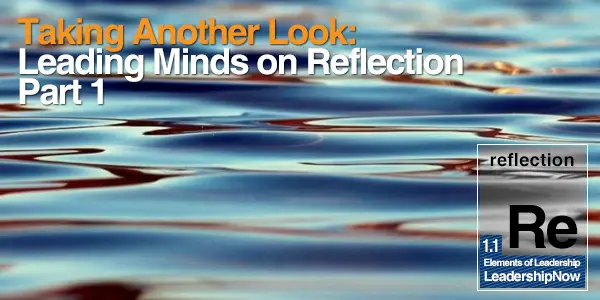
John Kotter begins this series on reflection by talking about the need to develop a reflective habit and why we don't. Are we spending our time on the right issues? Are we delegating issues we should not be working on that could be better dealt with more locally in the organization? Kotter also stresses its importance as a continual learning tool. John Baldoni urges us to make the time to reflect to gain perspective. He reframes reflection as an action step, not a passive process.
![]() John Kotter, Harvard professor, author and consultant:
John Kotter, Harvard professor, author and consultant:
In a world that is moving faster and faster, and changing more and in larger leaps, learning becomes a gigantic issue. Doing what you know is not enough. And learning cannot come in a classroom once every 2 years. That's too little too late. Learning has to be an ongoing process, literally all the time.
People learn in many ways. Reading really good books can help. Talking to really good people can help. Nothing wrong with going to a Harvard executive education program, but there is no better teacher than reflection on the world, and especially one's own actions. I did X. It produced Z. But is Z what we really need? And why did X create Z? And what were the other alternatives? And can I find others (in books, discussions, HBS) that tried those other alternatives?
Obviously, self awareness makes this easier. If I pay no attention to what I am really doing, what it is really producing, it's hard to reflect on that.
One can be both action oriented and reflective. Action oriented means when you know what to do and you do it. Now. Not next quarter. Let's go. Reflection means using the time on airplanes, when you're not on the slopes or with family at the ski lodge, Zenning-out on the beach—whatever—to think.
People don't reflect because they have no time, but usually because they don't delegate enough, let others delegate up to them, or don't have the staff they can delegate to—all correctable problems. People don't reflect because they haven't—so they have no reflective habit, so to speak. Correctable too.
Since the end game is life, not one's job, all this is not only applicable to life in general but is arguably more important for life in general.
And since leaders have the capacity to help or hurt us all a great deal, everything I have said here is very important in their case.
![]() John Baldoni, leadership consultant, coach, author and speaker:
John Baldoni, leadership consultant, coach, author and speaker:
Reflection is a powerful tool for leaders, and one that is much underused. The chief reason is perceived lack of time. I remember asking the late Skip LeFauvre, the man who ran Saturn, how he found time for it. He said, "Put it on your schedule."
Reflection is a means of gaining perspective. It challenges you to think where you are now and where you might want to go. How to get there is a good thing to consider during reflection.
Reflection may be perceived as a passive process, i.e. sit and ponder. In reality, reflection is an action step. You are thinking. That can be rigorous in its methodology. Reflection can also come through the writing process, i.e. organizing and expressing thoughts on a problem and its solution. Thinking of reflection as an active process makes it more palatable to leaders who by nature are doers; they like to be engaged in activities. Reflection can be one of them.
Constant change doesn't lend itself to instantaneous insights through simple phrases like "too big to fail," and "liquidity crisis." The question we must ask ourselves is this: In the midst of dramatic and extreme change, has decision making devolved into merely informed chaos, or can we imbed reflection and think time into our habits and routines to arrive at better outcomes and understanding?
—Daniel Patrick Forrester, Consider
More in this Series:
![]() Taking Another Look: Leading Minds on Reflection Part 4
Taking Another Look: Leading Minds on Reflection Part 4
![]() Taking Another Look: Leading Minds on Reflection Part 3
Taking Another Look: Leading Minds on Reflection Part 3
![]() Taking Another Look: Leading Minds on Reflection Part 2
Taking Another Look: Leading Minds on Reflection Part 2
![]() Consider: Harnessing the Power of Reflective Thinking in Your Organization
Consider: Harnessing the Power of Reflective Thinking in Your Organization
![]()
![]() Like us on Instagram and Facebook for additional leadership and personal development ideas.
Like us on Instagram and Facebook for additional leadership and personal development ideas.
Posted by Michael McKinney at 01:47 PM
Permalink | Comments (0) | TrackBacks (3) | Elements of Leadership , Human Resources , Interviews , Personal Development
02.07.11

Consider: Harnessing the Power of Reflective Thinking in Your Organization
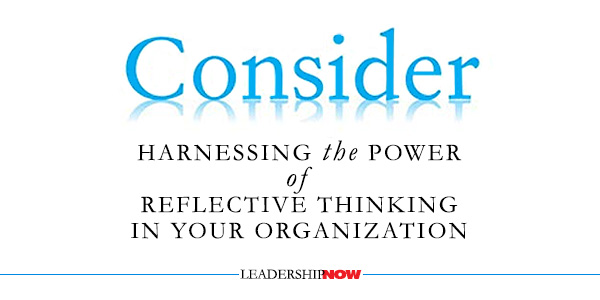
PETER SENGE, founder of the Society of Organizational Learning and senior lecturer at the MIT Sloan School of Management, once observed, "Most managers do not reflect carefully on their actions." Most managers are too busy "running" to reflect.
While reflection seems to have no place in a competitive business environment, it is where meaning is created, behaviors are regulated, values are refined, assumptions are challenged, intuition is accessed, and where we learn about who we are.
Some of the greatest barriers to getting the results we want lie within us. Growth happens when we stop repeating our habitual patterns and behaviors and begin to see things in a new way and in the process, discover the power to create the results we want. That makes Consider: Harnessing the Power of Reflective Thinking in Your Organization, one of the most important books you'll read this year.

Author Daniel Patrick Forrester states, "Stepping away from the problem—and structuring time to think and reflect—just may prove the most powerful differentiator that allows your organization to remain relevant and survive…. The best decisions, insights, ideas, and outcomes result when we take sufficient time to think and reflect….Only by carving out think time and reflection can we actually understand, in an entirely different context, the actions we take."
He defines think time as "the purposeful elevation of chunks of our work time, forged within densely packed schedules. It forces the consideration of core significant and pending decisions, outside of cursory overviews and immediate response…. Reflection is the deliberate act of stepping back from daily habits and routines (without looming and immediate deadline pressures), either alone or within small and sequestered groups. It's where meaning is derived through reconsideration of fundamental assumptions, the efficacy of past decisions and the consequences including the downside of future actions. It's where space is given for the 'totally unexpected' to emerge."
Even if we can agree on the value of think time, we still regard it as a luxury. There's just no time. But what emerges from Forrester's research is the fact that we can't afford not to. It is at the core of what allows a business to thrive. It's what we don't know that has a disproportionate impact on us personally and organizationally. We don't really see the reality we face. Reflection in effect expands our perspectives and thus reveals to us more options and that gets to the heart of what leadership is all about. The point is to make the unseen seen so we can act on it.
Forrester interviewed Sarah Sewall who worked with General Petraeus and others to rewrite the military's counterinsurgency doctrine. Sewall noted, "We are now in a world of increasing specialization, where people get narrower and narrower in their viewpoints in order to become more expert and 'useful.' My view is that people become more myopic in how they can think about problems and solutions. We wind up shuttered in our ability to think about possibilities." This tendency is best counteracted by think time and reflection; being able to back away and incorporate more and varied thinking.
Forrester asks, "What is the last document or strategy you can point to as a 'product of reflection' built with all parts of the organization and senior-level involvement? If you can't cite one, it may indicate a culture that values immediacy and the short term over reflection and scalable problem-solving."
Recognizing the need for reflection and actually doing it are two different things. Reflection is a discipline. General Petraeus told Forrester that "he forces bursts of reflection into his day, where he pauses to read, think, and then moves to the next iteration—recognizing that thoughtful insights are not born through real-time analysis."
Forrester suggests that we set time aside for a meeting with oneself. "It isn't hard to book a meeting with yourself, when you are off-limits to everything but your thoughts." He notes too, "The power of reflection lies not in how much time we allocate to it. The power of reflection lies in how we choose to use that time and what structure we bring to the fleeting disjointed moments we are afforded."
While some situations required his immediate action, Forrester describes how Lincoln "developed ways to force time to think (if even only for a few minutes) before acting. Even Lincoln had to resist the "instantaneous nature of the telegraph."
Some organizations he has studied have adopted a no internal e-mail Friday policy and other ways to temporarily disconnect from technology. Although these ideas may not work for you, the point is made so that you might consider the impact these technologies are having on the productivity and well-being of your staff. There is always one more e-mail and it will control you if you let it.
"When overworked people declare that they 'just don't have time to think,' leaders have a choice: They settle for the status quo and declare that it's the best way the world works today, or they can insist that reflection is a strategic business enabler," says Forrester. As an organization, you can either educate for it, make it an expectation—a cultural norm—or treat it as a "do it on your own time" activity and pay the price. Leaders need to understand and demonstrate by example that reflection—taking time to consider—is not wasted time.
Reflection is the first step in coming to understand how we are connected to our outcomes. Until we see the relationship between the two, we cannot make deep, lasting change and bring thoughtful behaviors to bear on the situations we find ourselves in. Our thinking creates our reality. If we do not reflect on our thinking we stand to miss our connection to the whole.
Consider offers a way to break the pattern of continuous partial attention that seems to be our default position in this technological age. It helps to disrupt the habitual thinking that drowns out the reflective, critical thinking we need to become fully present and effective. Consider isn't a fad. It is the bedrock of successful leadership and living.
Upcoming: I asked some leading minds about the discipline of reflection. So, for the rest of the week, I'll share their thoughts on this important topic. Look for valuable insights from John Kotter, Mark Sanborn, Brian Orchard, Marshall Goldsmith, John Baldoni, Tom Asacker, James Strock, and Jeremy Hunter.

More in this Series:
![]() Taking Another Look: Leading Minds on Reflection Part 4
Taking Another Look: Leading Minds on Reflection Part 4
![]() Taking Another Look: Leading Minds on Reflection Part 3
Taking Another Look: Leading Minds on Reflection Part 3
![]() Taking Another Look: Leading Minds on Reflection Part 2
Taking Another Look: Leading Minds on Reflection Part 2
![]() Taking Another Look: Leading Minds on Reflection Part 1
Taking Another Look: Leading Minds on Reflection Part 1
![]()
![]() Like us on Instagram and Facebook for additional leadership and personal development ideas.
Like us on Instagram and Facebook for additional leadership and personal development ideas.
Posted by Michael McKinney at 01:57 PM
Permalink | Comments (0) | TrackBacks (6) | Human Resources , Leadership , Learning , Personal Development , Thinking
02.03.11

4 Building Blocks of Courage
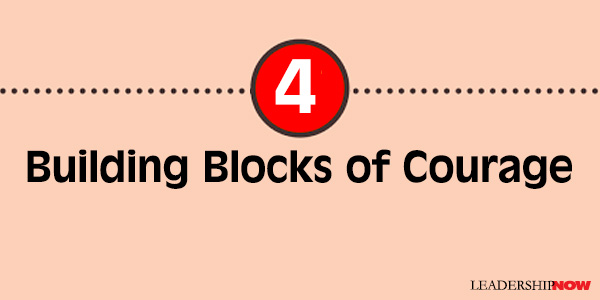
AS THE GLOBE begins to shake faster and faster, the answer is not to hunker down and erect barriers, but to take action. "Our world needs leaders capable of collaborating with other cultures sand taking prudent risks to create a new range of opportunities," says Blythe McGarvie author of Shaking the Globe. That kind of leadership requires courage.
McGarvie describes courage as "a firmness of mind and will in the face of danger or extreme difficulty." A courageous leader understands "that it takes personal risk or sacrifice to make a difference." McGarvie offers four building blocks of courage to encourage you to boost your courageousness:
- Competence. Do you set the bar for your accomplishments high and find ways to tackle them realistically? The key to building a reputation for competence is to do what you say you're going to do—while building new capabilities for your organization in the process.
- Curiosity. Amar Bose once said, "I never went into business to make money. I went into business so that I could do interesting things that hadn't been done before." What drives the kinds of projects or responsibilities for which you strive? Are you receptive to new ideas, both your own and those originating from your colleagues? As you develop your listening and analytical skills and pursue your curiosity, you will be amazed at the new opportunities to be tapped.
- Caring. Starbucks founder Howard Schultz said he "wanted to build the kind of company that my father never got the chance to work for, in which people were respected." Schultz wants to have his employees care as much about the business as he does. He willingly takes the blame for bad ideas to create a safe environment for his employees to be creative.
- Perseverance. Sometimes courage means having the drive to take on even the most daunting of tasks: admitting that we are wrong once in a while. But, courage also means not giving up in the face of high hurdles. Next time you're faced with an obstacle—whether that might be a sand trap or an unhappy board—square up and be prepared to give it your best shot.
![]()
![]() Like us on Instagram and Facebook for additional leadership and personal development ideas.
Like us on Instagram and Facebook for additional leadership and personal development ideas.

![]()

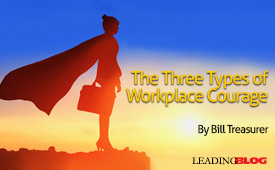
Posted by Michael McKinney at 11:24 AM
Permalink | Comments (0) | Personal Development
01.17.11

6 Keys to Becoming SuperCompetent
Considering the pressure on us today, Laura Stack says it's not enough to be only competent, we need to be super-competent. By that she means that SuperCompetent people "possess a consistent, all-encompassing ability to be good at everything they do, no matter how general or specific." While that definition may sound super-human (wouldn't it be nice to be perfect), the thinking behind it is solid and attainable.
You have to decide to be good at what you do. Once you have made the decision to do so, SuperCompetent by productivity expert Laura Stack, provides the method. She has isolated six interconnected traits or mindsets that make up the SuperCompetent person:
Key 1: Activity. They are driven by intense focus on priorities and have a clear sense of direction.
Action: You need to determine what you should be working on.
Key 2: Availability. They control their schedules.
Action: You need to make time for it.
Key 3: Attention. They develop the ability to pay attention to the task at hand.
Action: You need to focus on those tasks.
Key 4: Accessibility. They are organized and can locate the information they need to support their activities.
Action: You need to organize the information you need to complete your tasks.
Key 5: Accountability. They are self-disciplined and don't blame others.
Action: You need to be responsible for your results.
Key 6: Attitude. They do what needs to be done to make things happen. They are proactive decisive and fast.
Action: You never give up.
"Each key requires close attention to and a profound understanding of your own strengths, weaknesses, and capabilities in all areas to truly excel." Stack begins with a short SuperCompetent Assessment to give you an idea of the areas you need to focus on. From there, she provides so much content that even the most competent among us would find something to think about. She provides simple approaches to help you improve in each of the six areas. Some are so simple that you may ask yourself, "Why am I not doing that?" (See the section on accountability.)
A friend told her, "Oh, it didn't bother me. I had a mission, not an agenda." "So often when launching a new endeavor," writes Stack, "we get caught up in the agenda of the day—or worse—someone else's agenda for us. We lose sight of our purpose." Don't get distracted by the details.
Then there is the problem of the ever-growing To-Do List. She list ten issues at the heart of the problem like: You haven't made the necessary decisions. Your list should be full of clear, actionable ideas. "If you set a vague goal—like 'Have a sale'—then you've still got a lot of thinking to do before you can hit the ground running and make progress." If it isn't actionable, it shouldn't be on the list.
SuperCompetent provides the motivation to rethink your habits and your approach to anything you do; to live and work more responsibly. An sometimes all we need is a little push. Stack writes, "To be consistently successful, you need to be consistently productive." I find that productivity ultimately comes down to self-discipline. And when you are successful at it, it serves to reinforce the behavior. Better performance promotes our feelings of competence and the enjoyment of our tasks. Productivity equals morale.
Posted by Michael McKinney at 06:18 PM
Permalink | Comments (0) | Government , Personal Development
12.23.10

Managing Yourself First Checklist
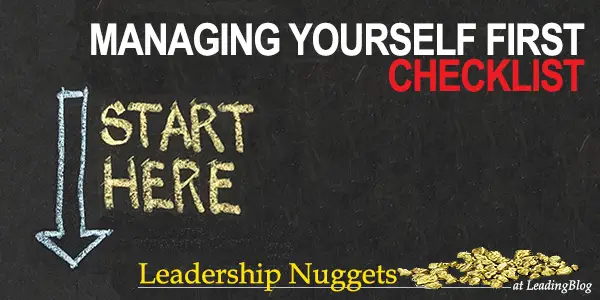
MAKE sure that the first person you are managing every day is yourself. Take good care of yourself outside of work so that you can bring your best self to work every day. Arrive a little early to work and stay a little late. Focus on playing the role assigned to you before trying to reach beyond that role. Focus on doing your tasks, responsibilities, and projects very well, very fast, all day long. If you want to carry weight with your boss, that should be your primary focus. Be a problem-solver, not a complainer. Commit to continuous improvement through rigorous self-evaluation.
Think about context and figure out where you fit in every situation. Continually ask yourself, "Where do I fit in this picture? Why am I here? What is at stake for me? What is my appropriate role in relation to the other people in the group? What is my appropriate role in relation to the mission?" Concentrate on playing these roles 110 percent. Contribute your very best thoughts, words, and actions. No matter how lowly or mundane or repetitive or minor your tasks and responsibilities might seem in relation to the overall mission, play your role to the max. Attitude matters—a lot. Effort matters—a lot.
Start mastering the art of human relations. Approach every relationship by focusing on what you have to offer the other person rather than on what you might want or need. Be a model of trust. Remove your ego. Listen carefully. Empathize. Exhibit respect and kindness. Speak up and make yourself understood. Be a motivator. Celebrate the success of others.
Make yourself a great workplace citizen. Under-promise and over-deliver. Don't bad mouth others, and try not to speak about others unless they are present. Keep your word. Keep your confidences. Be an accurate source of information. Don't keep other people waiting. Instead of under-dressing, overdress. Practice old-fashioned good manners.
Adapted from It's Okay to Manage Your Boss by Bruce Tulgan.
![]()
![]() Like us on Instagram and Facebook for additional leadership and personal development ideas.
Like us on Instagram and Facebook for additional leadership and personal development ideas.

![]()
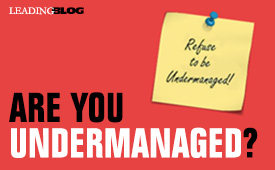
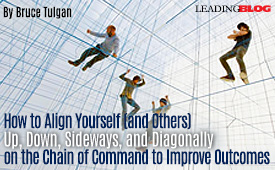
Posted by Michael McKinney at 08:13 AM
Permalink | Comments (0) | Leadership Development , Personal Development
12.09.10

7 Important Personal Qualities that Build Power
In Power, Jeffrey Pfeffer states that you can "compete and even triumph in organizations of all types, large and small, public or private sector, if you understand the principles of power and are willing to use them."
For some, power is a bad word. But, without a doubt, power does open doors and provides opportunity. Powerlessness creates its own problems—pettiness, blame, irresponsibility, hopelessness and depression.
Pfeffer takes a candid look at power. He has found that those that have obtained power possess not only the will —the drive to take on big challenges—but also the skill —the capabilities required to turn ambition into accomplishment. As part of these two fundamental personal attributes, they also possess seven essential personal qualities that help them amass organizational power and influence:
Will: The drive to take on big challenges
1. Ambition "Organizational life can be irritating and frustrating and can divert people's effort and attention. Ambition—a focus on achieving influence—can help people overcome the temptation to give up or to give in to the organization."2. Energy Energy does three things: inspires more effort on the part of others, the long hours it permits provide an advantage in getting things accomplished, and people with energy often get promoted because hard work equates with organizational commitment and loyalty.
3. Focus "Focus turns out to be surprisingly rare. People are often unwilling or unable to commit themselves to a specific company, industry, or job function. Particularly talented people often have many interests and many opportunities and can't choose among them."
Skill: The capabilities required to turn ambition into accomplishment
4. Self-Knowledge When he asked one executive what leadership habits made him effective, he answered, "Making notes about decisions, meetings, and other interactions and reflecting on what he had done well or poorly so that he could improve his skills."5. Confidence "Observers will associate confident behavior with actually having power. Coming across as confident and knowledgeable helps you build confidence."
6. Empathy with Others "Putting yourself in the other's place is one of the best ways to advance your own agenda."
7. Capacity to Tolerate Conflict "Because most people are conflict-adverse, they avoid difficult situations and difficult people, frequently acceding to requests or changing their positions rather than paying the emotional price of standing up for themselves and their views. If you handle difficult conflict- and stress-filled situations effectively, you have an advantage over most people."
Power has a right use and a wrong use. The time to think about power is before you get it. Seneca's caution that those with great power should use it lightly goes in one ear and out the other if you haven't first established your personal view of and relationship with power.
Nearly everything Pfeffer writes in Power can be taken the wrong way and applied in ways that will eventually cost you power or even derail you. Then, too, it can be applied in constructive and other-focused ways as well. If you execute these power strategies at the expense of others, you're sowing the seeds of your own destruction. If wisdom isn't part of your agenda, you will end up where you never intended. Unfortunately, there is very little in modern life that will serve to guide you in meaningful ways.
History is littered with lessons from those who have used power to advance selfish agendas. However, if you use it with humility, if you use it to free others to lead, you can build a lasting legacy. Humility resolves the problems posed by power. How you build it is as important as why you are building it.
Posted by Michael McKinney at 11:25 PM
Permalink | Comments (0) | Personal Development
11.25.10

Our Contribution to the Human Spirit: Thanks-Giving
I am certain that after the dust of centuries has passed over our cities, we, too, will be remembered not for victories or defeats in battle or politics, but for our contribution to the human spirit.—John F. Kennedy
Thanks-giving contributes to the human spirit and it can be shown in many unique ways. Ideas for thanks-giving in the workplace, the classroom and at home:
Demonstrate your thankfulness by how you treat everyone you meet.
Don't let others feel small or stupid around you. Let them be smarter.
Be generous with your praise and stingy with your criticism.
Don't give the answer. Show them how to find it.
Help others find the strength in their weakness.
Be civil. It shows others you appreciate them.
Encourage others and applaud their efforts.
Give others the room to grow.
Complement the competition.
Give your best self to others.
Help others triumph.
Share the good stuff.
Walk your talk.
Laugh.
Listen.
Say Thanks.
Posted by Michael McKinney at 12:07 AM
Permalink | Comments (0) | Personal Development
11.24.10

The Laws of Charisma
Even though charisma is thought of as something intrinsic to the individual, a person cannot reveal this quality in isolation. It is only evident in interaction with those who are affected by it. Charisma is, above all, a relationship, a mutual mingling of the inner selves of leader and follower.—Charles Lindholm, Charisma
Charisma is often thought to be something in your DNA. You either have it or you don't. But as Kurt Mortensen makes clear in The Laws of Charisma, it "is a trait that can be taught and mastered."
Charisma is about connecting with others. Mortensen defines it as "the ability to easily build rapport, effectively influence others to your way of thinking, inspire them to achieve more, and in the process make an ally for life." Like leadership, it can be used positively or negatively. It depends on where the emphasis is: self or others. For example he lists some of the differences between ethical and unethical uses of charisma:
| | |
| Serves others | Uses others |
| Creates win-win | Uses for selfish interests |
| Has high morals | Has low morals |
| Empowers people | Forces people |
| Open up communications | Closes down communication |
| Follows the heart | Follows the money, power, or greed |
| Defines a vision and purpose | Makes it up along the way |
| Helps people grow | Bank account or ego grows |
| Works for the good of others | Works for own good |
| Helps society | Helps themselves |
Ultimately, charisma will only take you so far. Without character and competence, it is fleeting.
Our greatest roadblock to developing charisma, Mortensen points out, is that we lie to ourselves. We think we are better than we are. We think our weaknesses aren't that noticeable and it gives us a false sense of security and no starting place from which to begin to make the improvements we need to make.
Mortensen has created a self-assessment for 30 attributes that define a charismatic individual. Chapter by chapter, he takes you through each of these describing them, showing how they are applied with real world examples and what the counterfeit version of each looks like. For instance, passion is not hype or bouncing off the walls. It's more like conviction that radiates from within. You may think you're coming across as confident, but you could be perceived as either arrogant, cocky, or condescending. Arrogance is about self and confidence is about others. Control is not power. It creates short-term compliance even as it drains the life out of people and creates long-term resentment.
The attributes are organized into four areas:
The elements of presence—how to radiate charisma through passion, confidence, congruence, optimism, positive power, energy and balance, and humor and happiness.
Tapping into and developing the core inner qualities of charisma: self-discipline, competence, intuition, purpose, integrity, courage, creativity, and focus.
Delivery and communication—how to use presentation skills, people skills, influence, storytelling, eye contact, listening, and rapport to speak with conviction and get heard.
Empowering others through inspiration, esteem, credibility, motivation, goodwill, vision, empathy, and respect—the components of contagious cooperation.
Other things to consider are how you communicate (both verbally and non-verbally), how you look, and your feelings and moods.
Each chapter is well thought out as he looks at each attribute from different angles. Each attribute is just a piece of the total charisma picture. The more you develop, the better you will be able to connect with others. While some of these attributes will come naturally to you, some will take a concerted effort. Taken as a whole, these thirty attributes are overwhelming. Take them one at a time. It's a lifelong process.
Posted by Michael McKinney at 12:31 AM
Permalink | Comments (0) | Communication , Personal Development

Seven Charisma Killers
In The Laws of Charisma, Kurt Mortensen lists a number of things we do that repel people. He writes, "These mistakes are silent charisma killers. Most people will never say anything to you that will alert you to the fact that they are being repelled. They are more comfortable lying to you so that they don't hurt your feelings. They walk away and simply never deal with you again." Here are seven of the most common charisma killers adapted from Mortensen's list that you may not even know you are doing:
- Talking Too Much. How can you influence others if you are always talking?
- Showing How Much You Know. You can come across as forceful, aggressive, and obnoxious.
- Getting To Friendly Too Fast. Research tells us that the majority of people do not appreciate unsolicited small talk, and many find it offensive.
- Getting Too Comfortable (Too Fast). Respect their things and they will respect you.
- Proxemics. You must respect personal space, or you will make others feel uncomfortable.
- Being One-Sided With Your Facts. There are facts and there is the truth. Are you genuine and transparent?
- Arguing or Trying to Prove You Are Right. Having to be right demonstrates an arrogance that is masking insecurity.
Are you guilty of any of these?
Posted by Michael McKinney at 12:24 AM
Permalink | Comments (0) | Communication , Personal Development
11.18.10

Do You Have Leadership Lock-in?
As individuals, familiarity breeds cognitive lock-in. We experience cognitive lock-in whenever we choose to do something out of habit even when objectively better alternatives exist. We behave automatically rather than intentionally.
This impacts us as leaders too. It develops a kind of leadership lock-in . We get so locked-in to the values, beliefs, behavioral norms, habits and routines that it is hard to lead intentionally—the way we know we should—the way we want to. We just go through the motions of leadership without really thinking about what we are doing or the long-term consequences of our actions. Instead of adapting and learning, we plow ahead with behaviors that we are comfortable with.
The more we behave or think in a certain way, the less likely it is that we will do anything to change it, even when we can see that it is not serving us well. Instead of "learning" from experience, we really only "see" from experience the effects of our behavior. Learning is an action step. But leadership lock-in contributes to our desire to avoid the effort needed to change our behavior in a way that would get us the results we truly seek. To escape the old, locked-in behaviors, we must consciously practice what we have learned until it reaches a critical mass—until feedback reinforces/rewards that new behavior—and it becomes self-sustaining.
The comforting feel of immediate gratification plays into much of the problem presented by leadership lock-in. For example, self-serving behaviors, emotional outbursts, expediency, unrealistic pacing, and control issues, all give us immediate—momentary—gratification, but in the end, masks the long-term consequences of such behavior and thinking. And we get locked-in to what we think is working or more likely, is only working for us.
Leadership lock-in is at odds with sustainable leadership. That's why it has been estimated that well over half of leaders don't finish well. They get tripped up by their own thinking. The cumulative impact of their behavior derails them and eventually neutralizes their influence.
Escaping leadership lock-in begins with asking yourself, "Do I believe in this approach? Is this how I would want to be treated? Is what I am saying or doing expressing the values I believe in?"
Posted by Michael McKinney at 11:14 PM
Permalink | Comments (0) | Personal Development
11.11.10

Train Yourself to Succeed
Polar explorer Roald Amundsen wrote, in his 1927 work, My Life as a Explorer , "The explorer … is looking, not for thrills, but for facts about the unknown… . To him, an adventure is merely a bit of bad planning, brought to light by the test of a trial… . Serious work in exploration calls for as definite and rigorous professional preparation as does success in any other serious work in life."
Adventure or drama, as it is used here, indicates a lack of "definite and rigorous professional preparation." You manage uncertain times with preparation. Survival in uncertain times is made more likely by developing oneself. Grow both the breadth and depth of your thinking. Build your portfolio of experience. Build your knowledge for adaptability. Build your connections for exposure and to reveal possibilities.
Tom Hopkins states the idea well in Selling in Tough Times , "During challenging times, it's more important than ever to dedicate yourself to training, practicing, and improving everything you do. Being well trained will help you be one of those people who thrives not just now but when things turn back around, as they always do. Don't rely on your company to train you, either."
Tom Peters wrote today on Twitter, "I think there is an incredible and widespread failure to take responsibility for oneself." How well you learn, how well you prepare to respond to what comes your way, will determine your "luck." In the end, it's all up to you.
Posted by Michael McKinney at 10:36 PM
Permalink | Comments (0) | Personal Development
11.08.10

Congratulations, You've Reached the Next Level
You've moved up to the next level. You've been promoted to the executive ranks. "You should be uncomfortable," says Scott Eblin in The Next Level. "If you're not, you are probably underestimating what's ahead of you." Statistically, many do. As high as 40% of new executives fail within the first eighteen months of being named to their positions.
New positions carry with them greater expectations even if those expectations are not clearly stated. You are left to navigate uncharted territory. The single most important thing to remember is that what got you there may not serve you well in your new position. Going to the next level says Eblin, is "about developing consciousness around what is and isn't serving you as you take those steps. It's about retaining what is working, staying open to picking up new skills and mind-sets, and having the courage to let go of the behaviors and beliefs that brought you this far when they no longer serve you on your journey."
Eblin has developed an Executive Presence model that focuses on nine behaviors in three areas that a successful executive should develop on the one hand and drop on the other:
| | | |
| Personal Presence | Confidence in your presence | Doubt in how you contribute |
| Regular renewal of your energy and perspective | Running flat out until you crash | |
| Custom-fit communications | One-size-fits-all communications | |
| Team Presence | Team Reliance | Self-reliance |
| Defining what to do | Telling how to do it | |
| Accountability for many results | Responsibility for a few results | |
| Organizational Presence | Looking left, right, and diagonally as you lead | Primarily looking up and down as you lead |
| An outside-in view of the entire organization | An inside-out view of your function | |
| A big-footprint view of your role | A small-footprint view of you role |
Eblin covers each of these behaviors in detail with insights, interviews, coaching tips and research. But in an important foundational chapter, he talks about grounded confidence . That is, add value but know what you are talking about. "It is critical for your success that you not dwell on thoughts and self-assessments that cause you to doubt your capacity to contribute.
There is a certain amount of insecurity that comes with any new position, but "insecure people make lousy leaders." Insecurity causes us to behave in a lot of counterproductive ways: indecisiveness, micromanaging and control, taking undeserved credit and passing blame, lack of teachability.
Eblin says that developing strong relationships with your peers is essential to your success. "Your success in managing relationships will stem from the confidence you have in yourself and your ability to work well with others to make things happen." This is an area where you need to move quickly.
Your new role brings with it an expectation of your involvement in a wider range of issues. This means projecting confidence in your judgment that "extends beyond functional or technical knowledge." This means also, more listening and less talking. Being teachable. Getting feedback.
Of course, there is a lot of confidence to be gained by being prepared—being intentional. Eblin's approach is to begin with the end in mind. You need to consistently ask yourself two questions: "What do I want to accomplish?" "How do I need to show up to accomplish that?"
Practicing new and unfamiliar behaviors can be uncomfortable and seem artificial, but executed repeatedly these behaviors will become ingrained into your character and make them your own. As Aristotle said, "We are what we repeatedly do. Excellence, then, is not an act but a habit."
Feedback Tip: Ask your colleagues this question—What's your best advice for anyone who is working on team reliance versus self-reliance (or whatever your working on)? Experience shows that it's useful to ask the question in this format instead of asking, for example—What should I do to be better at team reliance? Asking the question in a less personal way makes it easier for your colleagues to be candid in their feedback.
The Next Level is an excellent coaching reference book that makes it an indispensable companion guide to any change in responsibility. Keep it handy and bookmark the Situations Solutions Guide that contains practical solutions to scores of situations that predictably occur in most executive careers.
Posted by Michael McKinney at 07:40 AM
Permalink | Comments (0) | Human Resources , Leadership Development , Personal Development
10.21.10

Harvey Mackay on Managing Your Career
You can't control the change swirling around you but you can control how you experience it. Harvey Mackay offers this advice on getting the job you want:
• Be prepared
Regardless of the economy, there is nowhere you can hide that's guaranteed earthquake-proof against your own personal recession. The day can come when you step into your boss's or banker's office some Friday afternoon and hear, "I'm sorry to have to tell you this, but..." It's not going to be easy, no matter how well prepared you are. But it's going to be a lot harder if you're like the 90 percent of us who aren't prepared when the bomb falls. And it can happen to anyone, anytime.
• If you reach for the stars, at least you'll get off the ground
Most important of all, you will survive. Trends have occurred that make some aspects of the economic situation better, not worse for employees and job seekers. Here are a few:
- There used to be a little piece of folk wisdom: "The good people are all working." It's not true anymore. There have been just too many layoffs of too many good people in recent years. There's no longer any stigma attached to being laid off. It's a fact of business life today.
- Age is not the disadvantage it once was to employment. The era of the linear career... school, work, retire at sixty-five, die at sixty-eight...is over. As corporations rush to shed their high-salaried employees, you're probably going to be out of work much sooner than sixty-five. Yet paradoxically, past sixty-five, you're also much more likely to find work in some form for as long as you want it.
- Changing values and expectations can erase the pain. In other societies, professions like the clergy, teaching, and social work are valued far more highly than in America. Yet, for a lot of us living in the most materialistic society on earth, success in material terms hasn't produced personal satisfaction. Who says you have to live by any values other than your own? If the personal freedom America affords has taught us anything, it's that you have only yourself to answer to for doing what you believe in and picking the life you choose.
(Adapted from Sharkproof : Get the Job You Want, Keep the Job You Love...in Today's Frenzied Job Market by Harvey Mackay)
Other Books of Interest:
Your Job Survival Guide: A Manual for Thriving in Change
Where the Jobs Are Now: The Fastest-Growing Industries and How to Break Into Them
New Job, New You: A Guide to Reinventing Yourself in a Bright New Career
Rebound: A Proven Plan for Starting Over After Job Loss
In an environment filled with noise, actions speak louder than words, Instead of staking out a fixed position on the organizational chart, you need skills in designing and participating on ad hoc teams. And you need a certain kind of leadership and followership, to succeed. You live and work in a different world. You need new thinking and skills to succeed.—Gregory Shea and Robert Gunther, Your Job Survival Guide
Posted by Michael McKinney at 11:41 PM
Permalink | Comments (0) | General Business , Personal Development
10.13.10

Every Leader's Six Mental Mistakes
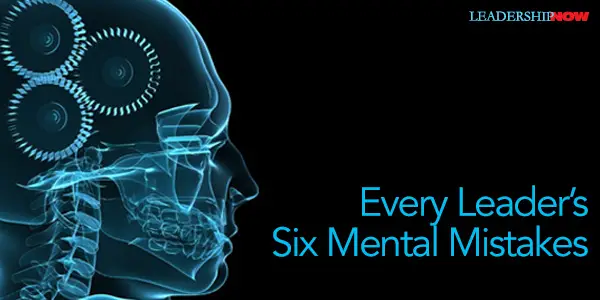

MANAGING OURSELVES is our biggest task as a leader. How well we manage ourselves determines the kind of leader we will be and the impact we will have.
Adapting Jonathan Haidt's metaphor of the rider and the elephant, Richard Daft presents the executive (the voice of reason) and the elephant (impulsive and emotional) metaphor to help us to learn how to help our inner executive manage our inner elephant as needed to behave according to our best intentions—to better manage oneself.
One of the biggest problems we face as a result of our inner elephant's tendency to distort reality. It's one of the reasons we are so surprised when someone disagrees with us. Our internal elephant judges (our self and others), creates illusions (self-justification) and acts as our attorney (defends us and making us immune to reality).
In The Executive and the Elephant, Daft points out that our inner judge "sees things from a selfish point of view and has little empathy and consideration toward others. It is hard to be optimistic and motivate people when your mind is critical of them." The judge will also become our own worst critic—"the automatic voice of blame and criticism inside your head that points out how inadequate you are." Daft poignantly asks: "Can you be an effective leader when your mind is constantly finding fault with you?"
Daft illuminates some perceptual habits of the inner elephant that can get in the way of seeing the world accurately. Without a conscious effort to do otherwise, it is easy to fall prey to any or all of these six mental mistakes:
Reacting Too Quickly. As quickly as things are thrown at us, it's a lot easier being reactive than being proactive. It's easy to instantly judge, conclude and react based on small scraps of data rather than slowing down and remaining calm says Daft. Serious intention is required to slow things down. How we see things always appears so clear to us and it seems we can't act on it soon enough. It's what the elephant does. We have to engage our inner executive to avoid acting on wrong-headed conclusions.
Inflexible Thinking. The inner elephant doesn't like to change its mind. After all, we believe what we think for obvious (to us) reasons. We don't intentionally think the wrong thing. And we interpret the world around us according to our beliefs. "It is very hard to let go of your own gut feelings and mental preferences" says Daft. "It's all you know. The mind-set, habits, and skills that made you successful tell you to stick to your guns. However, things change, and if the mind does not accept the current reality, it can create problems for everyone."
Wanting Control. Your inner elephant is more comfortable when you're in control. Of course, we only take control because if we didn't things wouldn't get done the way we think they should be done. But our satisfaction is at their expense. The desire for control can lead us to illusions—attempts to gain control (and think we have it) over the uncontrollable. A leader's inner executive needs to learn to give control to others. Our job is to "engage a bigger picture of mission and purpose (inner executive) and let people be in control of their own work."
Emotional Avoidance and Attraction. Even when we know we need to do something, our inner elephant can find reasons to avoid it. We procrastinate. We delay an intended course of action despite expecting to be worse off for the delay. Our inner elephant feels anxiety and creates an invisible barrier in our mind that prevents us from moving forward. Attraction can cause us problems by enslaving us to our desires. Desire for acceptance can cause to make decisions we wouldn't otherwise make under the influence of our inner executive. About the desire for perfection, Daft writes:
A few of my MBA students are perfectionists who can't restrain their desire to redo a group project to make it look the way they want, even after I explain that this behavior is fatal for leaders who have to accomplish work through others. Managers may also feel the need to act on their unthinking desire to be right rather than let other people shine, to perpetually find fault with other people's ideas, to win every disagreement, to blame others when something goes wrong despite being culpable, or to speak harshly when upset.
Exaggerating the Future. Related to the emotional avoidance and attraction issues is our tendency to exaggerate outcomes. When our inner elephant wants to do something we tend to be overly optimistic about the future and underestimate the potential difficulties. When we don't, we tend to overstate the potential problems. The problems are obvious. Objectivity is needed if we are to anticipate the future realistically. "The inner elephant tends toward positive or negative exaggerations about the future depending on its emotional orientation toward an object or event."
Chasing the Wrong Gratification. The inner elephant is child-like and selfish. "Finding happiness is a challenge because the inner elephant often seeks things that do not provide lasting satisfaction." We can be easily seduced into chasing after the wrongs things—things that don't bring us lasting satisfaction.
Daft offers sensible techniques to get some mastery over your inner elephant. He writes, "Let's face it: Your inner elephant has been running your life. For better or worse, everyone is on automatic pilot more than they realize." Your best defense is to get to know your inner elephant. Slow down and reflect. While there are negatives, there are strengths that can be harnessed.
![]()
![]() Like us on Instagram and Facebook for additional leadership and personal development ideas.
Like us on Instagram and Facebook for additional leadership and personal development ideas.

![]()


Posted by Michael McKinney at 11:33 PM
Permalink | Comments (0) | TrackBacks (1) | Personal Development , Thinking
09.24.10

It's All About You???
In another fine offering from Bob Sutton—Good Boss, Bad Boss—he makes this attention grabbing statement: "To be a great boss you've got to think and act as if it is all about you. Your success depends on being fixated on yourself." What?
Ironically, great leaders know that it's all about them because it isn't. Great leaders focus on developing themselves so they can develop others. They know themselves first so they can understand others better. They check their own ego so they can build others. They take responsibility for their own actions before they consider looking at others. They have taken an inventory of their strengths and weaknesses so that they know where they need to check themselves and where they need to partner with others. They understand their own failings so that they are more understanding of others. They are appreciative of the room they have been given to grow and make certain they create this space for others.
It's about self-awareness. A self-aware leader is in a better position to lead others with authenticity and benevolent concern. Self-aware leaders know how they are coming across to those they lead. Sutton writes, "If you are a boss, your success depends on staying in tune with how others think, feel, and react to you."
Sutton offers two acid tests for bosses:
- Do people want to work for you and would they do so again?
- Do people feel like you are in tune with what it feels like to work for you?
It's all about you because it is all about them.
Posted by Michael McKinney at 05:25 PM
Permalink | Comments (0) | Leadership Development , Personal Development
09.20.10

Do You Argue With Reality?
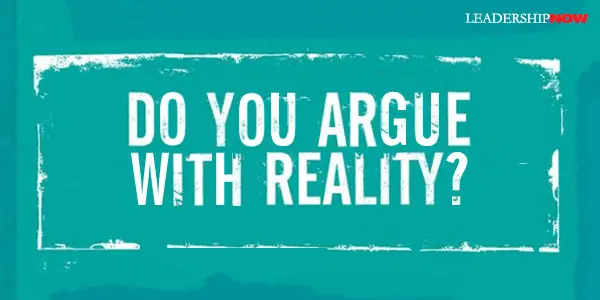
CHRIS THURMAN wrote in The Lies We Believe, "The number one cause of our unhappiness are the lies we believe in life." Too often, we operate apart from reality. Given a choice between reality and our version of it, we are inclined to choose the latter. It is a central tendency of human beings. The result is drama, not peace.
"Instead of getting the results we want," says Cy Wakeman, "we end up with reasons, stories, and excuses for why things didn't work out—leading to more drama, disengagement, judgment, and ineffective leadership."

In Reality-Based Leadership, Wakeman presents a much-needed wake-up call. We can ditch the drama by getting in touch with what is . Quit making up stories. Quit arguing with reality. Ditching the stories that are causing us stress. "We all tell ourselves stories and live with the resulting drama." It sounds like:
"I shouldn't have to do this—it's not part of my job description.
"Our department is always having to clean up after others' mistakes."
"The boss just doesn't get it."
"Management only care about the bottom line."
"You are arguing with reality whenever you judge your situation in terms of right and wrong instead of fearlessly confronting what is." You need to respond to the facts, not the story you create about the facts. This is easier said than done. Interwoven in our stories are our egos, insecurities, and identities. (At one point Wakeman suggests we ask, "Who am I as a manager or as an employee when I believe this story?") We like our stories. They make us look better. They place the blame somewhere south of us. If other people are always coming up short in our stories, then it's all about us. But letting go of our stories is not always easy as we have a lot invested in them.
Too often our criticism is about setting us apart from others and not about helping them. It says a lot more about us than it does those it is directed towards.
Wakeman says, "When you are judging you are not leading." In her analysis of the case study about Steve and a team he dreaded working with, she concludes, "his biggest obstacle is his belief that they are a negative group. What if he just dropped that whole story and simply responded to reality directly? The phone rings? Answer it. The team ask a question? Answer it, or teach them where to find the answer. The team share what worked in the past? Listen and lead them into the future. The team requests some time with the leader? Engage with them—lead! When Steve began to lead the team rather than judge and criticize, the team began to change for the better." She adds, "When you focus your energy on what you are able to give And create rather than what you receive, you are truly serving."
Do you see any applications in what you and involved in? Wakeman insightfully writes: "What is missing from a situation is that which you are not giving."
Operating out of a judging mindset of "I know" or "I am right" effectively shuts down the potential to learn or accomplish anything. Moving on based in reality requires setting the story aside and asking, "If I set the story aside, what would I do to help?"
The minute you start judging is the very minute you quit leading, serving and adding value. When you're in judgment, you are dealing with your story—not with reality. Wakeman suggests that when you get off-track:
- Do a reality check. Get back to the facts of the situation by editing out anything that you can't absolutely know to be true. "What is the next right action I can take that would add the most value to the situation?" Direct your energy on that action.
- Get clear about motives. Seek to be successful rather than right. Is it about you?
- Be the change. Practice those virtues that you have determined to be lacking in others.
- See others through a lens of love and respect—not anger and fear. When faced with those whose personalities are different from ours, or whose behaviors have reached a stress-induced inappropriateness, work to see through those behaviors and identify their needs or goals. Ask yourself, "What are they striving for?" Then ask, "How can I help them achieve it?"
- Invoke a clearer, higher perspective. When you sense that conflict is getting personal, be prepared to return to a professional perspective by asking your team to clarify the overreaching goal of their work together. "Given our goal, what do you think is the best way to move forward?"
What stories are you telling yourself that cause you to operate in your own world? While it may be cognitively economical, it is costing you far more in every other area.
![]()
![]() Like us on Instagram and Facebook for additional leadership and personal development ideas.
Like us on Instagram and Facebook for additional leadership and personal development ideas.

![]()

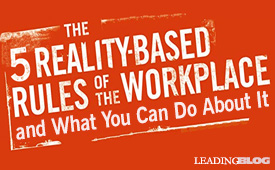
Posted by Michael McKinney at 03:54 PM
Permalink | Comments (0) | Human Resources , Leadership , Learning , Management , Personal Development
09.15.10

Timeless Advice from a Father to a Daughter
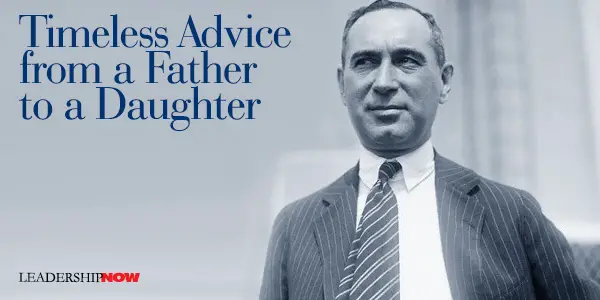

The Man Who Sold America by Jeffrey Cruikshank and Arthur Schiltz was for me, hard to put down. It is the retelling of the inspiring and remarkable life of Albert Lasker (1880-1952). Lasker has been called the "father of modern advertising." He had an eye for talent and worked with them to transform the advertising agency from mere brokers to a creative force to build businesses. He developed "reason why" advertising—salesmanship in print.
He made Palmolive and Pepsodent household names and invented the "Sun-Maid" and "Sunkist" brands. He made millions for Quaker Oats, Goodyear, Frigidaire, Lucky Strike and Kimberly-Clark and in the process made millions for himself. He advanced millions to friends during the Depression (most of the loans were never repaid) and when prudent, loaned money to clients to finance their advertising campaigns.
Lasker was a major investor in the Chicago Cubs. He persuaded William Wrigley to join him in investing in the team. To help the chewing-gum magnate sell more product he pushed to change the name of Cubs Park to Wrigley Field.
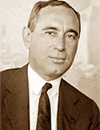
Masterminding the "idea side" of political campaigning, he brought together politics and advertising to help Warren G. Harding win the presidency in 1920. The Hardings and Laskers became good friends dining together at the White House three or four times a week.
Aided by his personal relationship with many leading businesspeople he "applied the insights he gained in one context to give advice in others." The legendary David Sarnoff of RCA said of him, "Give him an equal knowledge of the facts and I'd rather have his judgment than anybody else I know."
On October 29, 1935, his daughter Mary came to work for him at Lord & Thomas. He left a note on her desk on her first day of work:
My darling Mary,Welcome to Lord & Thomas. I hope we have a long business association together—if we do, we will both get much joy from it.
Both as father and employer I give you this advice—try to learn from everyone (high and low), try to be of service to everyone (high and low). He finally leads who first learns to serve. And remember—we spend our lives learning. Above all, be yourself—your best self. Always think of the other fellow's viewpoint and try to get him to think of yours. Learn to walk before you run. Believe in yourself—and believing, strive to learn every day and grow creatively every minute so that you will justify your belief.
All my love,
Father
Just One More: In 1938, Lord & Thomas hired the obscure comedian Bob Hope to pitch Pepsodent on the radio.
Although Lasker enjoyed making and consorting with the stars—and in one case, marrying them—he remained largely unimpressed with them. One day, the head of Lord & Thomas' broadcast department reported to Lasker that Hope was grumbling about his contract with the agency. "Mr. Lasker," the subordinate said, "Bob is very unhappy. He says he just can't put the show together for $4000 a week. He must have $6,000." "Just between us," Lasker replied dryly, "I'd rather have Mr. Hope unhappy at $4000 than unhappy at $6,000."
![]()
![]() Like us on Instagram and Facebook for additional leadership and personal development ideas.
Like us on Instagram and Facebook for additional leadership and personal development ideas.

![]()

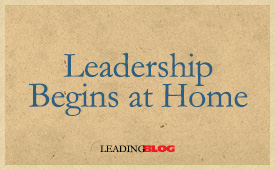
Posted by Michael McKinney at 09:16 AM
Permalink | Comments (0) | Human Resources , Learning , Personal Development
09.13.10

It's Not Just Who You Know—It's Who You Are
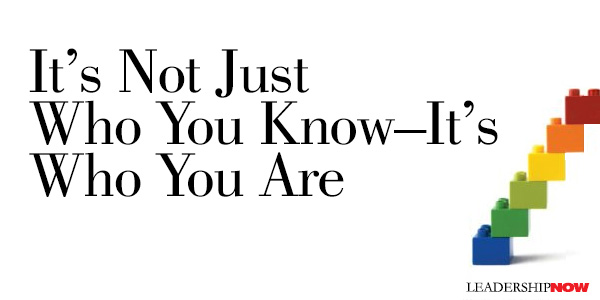
BUILDING relationships is about others. It's more than networking says Tommy Spaulding. "When a heart centered on others drives your actions, networking is replaced by something far, far more powerful—Netgiving . Networking is all about you. Netgiving is all about others." It's from this sound perspective that Tommy Spaulding writes It's Not Just Who You Know.

It's Not Just Who You Know is both an inspiring biography and a lesson in initiative and building genuine relationships. Quite often we meet people and build relationships by chance; Spaulding doesn't believe we should leave them to chance. He has seen over and over again that "an investment in a short-lived and seemingly random encounter can produce unforeseeable yet significant benefits." So we need to "develop an attitude of openness" and approach "every person we encounter with an awareness of the hidden potential to develop a relationship."
Spaulding thinks of relationships in terms of a five story building. Level 1 is purely transactional—meet and greet. Level 2 you share basic personal information. Level 3 relationships, while superficial, relationships have developed an emotional comfort level that goes beyond sharing facts, news weather and sports and involves sharing opinions and feelings with others.
Level 4 relationships are marked openness and candidness. We respond in ways that show that we value the relationship for its own sake. The relationship reflects an ability to work through and a willingness to at times, put others interests above your own.
Level 5 relationships are our closest and most intimate relationships. They are based more on giving than on getting. "They are relationships based on a shared empathy—an intuitive understanding of each other's needs, even those that aren't necessarily expressed…. In Fifth Floor relationships, we become confidants, advisers, and partners in helping the other person achieve their greatest potential."
Spaulding says the goal is to be able to develop the ability to build relationships at all five levels and he offers practical advice for expanding our relationships. It's not done though through manipulation. Motives matter. Relationships built on getting what you can from others have no lasting value and will more than likely collapse when you need them the most. You can judge your motives by filtering them through the following traits: authenticity, humility, empathy, confidentiality, vulnerability, generosity, humor and gratitude. In building genuine relationships, says Spaulding, who you are is far more important than what you do.
Some of his advice:
- When you think of the people you are getting to know, take out a piece of paper and write down the back-of-the-business-card information.
- Take your time to get to know the other person. Don't push for things you might want; figure out what they need. Don't be a chirping bird—out for your own self-interest.
- Don't ask for autographs of influential people and don't ask to have your picture taken with them. They'll look at you differently. You want them to look at you as a professional, not as a tourist.
- If you're building a relationship with someone, you're also building a relationship with the people who are important to that person.
- Find out what the other person thinks rather than telling them what you want.
- Act on your awareness. Acting out of generosity heightens our awareness about the needs of others (empathy) and builds trust with those around us. If we want our co-workers and customers and vendors to trust us, we have to show them we care about them. But we also have to show them that we care about other people—people who offer us nothing but a heartfelt thank-you (and sometimes not even that).
- Develop a Fifth Floor all-star team not so much for what that team can do for you, but for what you and that team can do together.
As important, Spaulding offers five relationship warnings such as choose wisely and the relationship cancer you must avoid at all costs. He says that Dale Carnegie's How to Win Friends and Influence People taught him how to get people to fall in love with him. But there is more. We can fall in love with others if we remember it's not about us. It's not just who you know—it's who you are.
![]()
![]() Like us on Instagram and Facebook for additional leadership and personal development ideas.
Like us on Instagram and Facebook for additional leadership and personal development ideas.

![]()
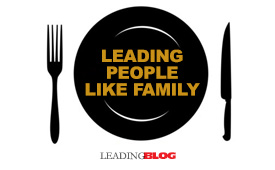

Posted by Michael McKinney at 01:08 AM
Permalink | Comments (0) | Human Resources , Personal Development
08.25.10

Dispute Catastrophic Thoughts
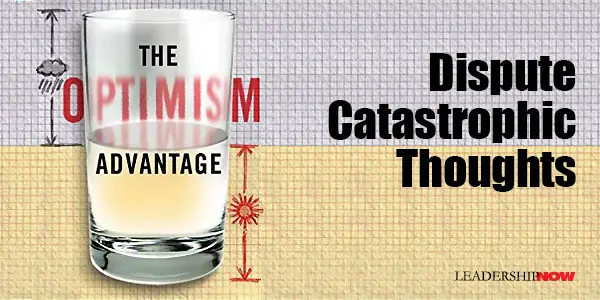
WARREN BENNIS wrote in Leader to Leader that "every exemplary leader that I have met has what seems to be an unwarranted degree of optimism—and that helps generate the energy and commitment necessary to achieve results."
Optimism says Bennis, "the sense that things generally work out well, creates tremendous confidence in oneself and in those around one." Optimism helps leaders to be more resilient as they tend to believe in their capacity for self-control and the ability to overcome obstacles that come their way. In short, I would say, optimism is finding perspective.

In The Optimism Advantage, Terry Paulson offers fifty truths for cultivating optimism beginning with "Life is Difficult." (Perhaps not what you would expect from a book on optimism.) He writes, "If you want to be a true optimist, start by being a realist. Accept that life is difficult, and then get busy learning as much as you can about the challenges you face. Why? Because you've overcome problems in the past, you have every reason to believe that you've got what it takes to overcome whatever problems life deals you."
One important place to begin is with our negative thoughts and feelings. Optimists dispute catastrophic thoughts, those "feelings that everything is wrong and that nothing is going to change." Paulson says that "means you have to be ready to argue with some of your negative beliefs." Optimism is "about facing and taking advantage of reality—even unsettling reality. Expecting unrealistic results may actually increase your dissatisfaction….To an optimist, it's all about resilience and maximizing your results."
Start with understanding what it is you're saying to yourself that is causing a bigger problem in your thinking. Clarify it and then take a critical look at your beliefs and dispute them. Are they valid? Is there another way to look at this? Seek alternate explanations. Optimists ask, "Is there any less destructive way to look at this or explain what happened?" Look for causes that you can overcome and focus on what can be changed and then take action.
![]()
![]() Like us on Instagram and Facebook for additional leadership and personal development ideas.
Like us on Instagram and Facebook for additional leadership and personal development ideas.

![]()
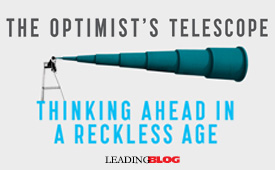

Posted by Michael McKinney at 12:36 AM
Permalink | Comments (0) | Personal Development , Positive Leadership , Thinking
07.23.10

The Five Accountabilities You Need to Implement Now
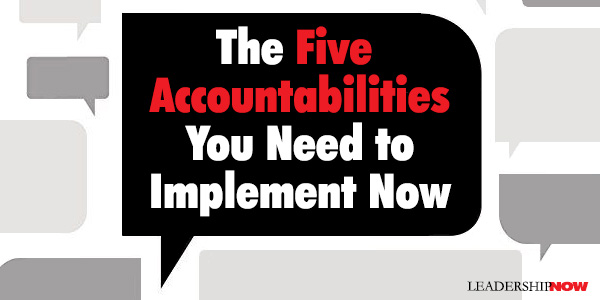

No More Excuses by Sam Silverstein is about expanding your accountability zone. To do that it means "reaching the point in your life where you can say, 'No More Excuses! I'm not going to make excuses, and I'm not going to buy excuses.'" Excuses only legitimize the past, ignore the present, and eliminate the future.
Silverstein's book is built around The Five Accountabilities he has developed to help you—in a practical way—to move beyond the excuse; to make accountability a way of life for you personally and part of your organization's culture. The five accountabilities are:
Doing the Right Things. Begin by identifying your strategic intent. What are you trying to accomplish and by when? We are accountable for understanding and identifying our strategic intent—and the activities that support it.
Mt. Everest climber Ronnie Muhl, told Sam: "You get into the habit of asking yourself, 'If my life depended on the next action I took, how differently would I perform that action?' —because doing the wrong thing can have massive consequences."
Managing Your Space. We are accountable to create the new space we need to grow and innovate in our own lives, which sometimes means taking space from something else that we're doing. "Force of habit prevents us from giving ourselves the physical, mental, financial, or emotional space necessary to shake things up a little bit and put something new in our lives—something that could provide growth and improvement."
David Silverstein, CEO of the Breakthrough Management Group International, told Sam, "You have to be willing to cannibalize your own business in order to grow."
Managing the Process. We are accountable for creatively making progress toward whatever it is we are trying to make happen even when we hit an obstacle. It means not throwing up our hands and saying, "If it's not meant to be, it's not meant to be."
Kenneth Evans, Dean of Price College of Business at the University of Oklahoma told Sam, "The real problem with the way that some people look at accountability is that oftentimes it's layered into a notion of a rigid set of expectations and performance parameters, and frankly, you can get into very deep trouble if that's your mantra. How you react to changing events is important as well."
Establishing the Right Expectations. We are accountable for establishing the right expectations, that reflect our values, that are properly benchmarked, and are a bit of a stretch.
Clothier Elim Chew, spoke to Sam about the leading from where you are at his company 77th Street, "The people who accept responsibility for, say, 10 things that are part of their job description and then accept personal accountability for five more things all on their own are the ones who are more likely to get the bigger bonuses and bigger raises in this company. They're the ones who may end up running a business of their own someday."
Contributing to Your Relationships. The success or failure of our relationships depends entirely on the contributions we make. We are accountable for giving to our relationships—without keeping track. "In fact, the quickest way to kill a relationship is to start keeping track of all the reasons it's not your turn to give to it and support it." Sam adds, "We should constantly be looking for ways to invest in the relationship and enhance the value of the relationship over time."
Sam says, "Building relationships is about choices, and the choices should always be based on your values. To get a fix on your values, ask yourself: How can I best serve this relationship in the short term and the long term?"
Brian Martin, CEO and founder of Brand Connections, talked to Sam about managing emotions. He said, "I have asked every single person I've hired two questions: 'First, what is most important for you to feel professionally, every day? And second, what's most important for you to avoid feeling? What would you really rather not go through, not have to replay with your spouse at the end of the day, when that person asks how your day went?' I keep the answers on file, and I look at those answers every week when I do my own planning."
More information can be found at SamSilverstein.com to help you implement the Five Accountabilities. "If you want to build an organization that achieves its goals and beats the competition, it's time for No More Excuses."
![]()
![]() Like us on Instagram and Facebook for additional leadership and personal development ideas.
Like us on Instagram and Facebook for additional leadership and personal development ideas.

Posted by Michael McKinney at 06:56 PM
Permalink | Comments (0) | TrackBacks (1) | Change , Ethics , Personal Development
07.22.10

No Excuses!
"I don't know anyone who could get through the day without two or three juicy rationalizations."—Michael Gold (played by Jeff Goldblum) in The Big Chill (1983)
We like (need) to rationalize. We often feel compelled to create acceptable reasons for otherwise unacceptable behavior. You know … excuses. We all have made excuses and can easily get into the habit of making excuses.
Excuses are insidious things that get in the way of moving forward. Eliminate them.
Brian Tracy, a man who needs no introduction, says the way out of the morass created by excuses is self-discipline . Elbert Hubbard defines self-discipline as the ability to do what you should do, when you should do it, whether you feel like it or not.
No Excuses! is a primer on self-discipline and full of those kinds of things that will make you reconsider the habits you have gotten into. Tracy cites Kop Kopmeyer: "There are 999 other success principles that I have found in my reading and experience, but without self-discipline, none of them work. With self-discipline they all work."
Tracy examines how the practice of self-discipline impacts twenty-one areas of your personal, business, sales and financial life such as character development, goal setting, leadership, health and family. The pull to take the path of least resistance and to do what is expedient, says Tracy is our worst enemy. Looking only to the short-term "most people do what is expedient , what is fun and easy rather than what is necessary for success."
In a personal example, Tracy recalls at age 21 that it dawned on him that "this is my life. This was not a rehearsal for something else. The game was on, and I was the main character, as in a play." That realization changed his life and he resolved to take more responsibility for his life and take a "no excuses" approach to every aspect of his life.
"In its simplest form," says Tracy, "the role of the leader is to take responsibility for results." This involves developing a vision for yourself and for your areas of responsibility.
[As an aside to the vision thing, on Twitter today, Tom Peters said that maybe it's just semantics but, "Don't especially like vision. Prefer portrait. E.g.: ' Leaders paint portraits of Excellence. '" Phil Gerbyshak filled in some of the details of Tom's thought by stating that he thinks "leaders provide the outline for excellence and allow others to fill in the colors and add details/meaning." Good food for thought. Does portrait put a face on it—responsibility?]
Continuing on, Tracy says that leaders must take the responsibility to be role models and set the example. "There is a direct relationship between your ability to discipline yourself and your behaviors and your readiness to lead."
The bottom-line of self-discipline is peace of mind. Peace of mind because you consistently do what needs to be done and have developed the self-discipline needed to let go of the negative events that happen to you—forgive and forget—and focus your energy instead on taking responsibility and moving forward. "Discipline yourself to stop justifying your negative emotions by continually rehashing what happened and what the other person did or didn't do." Tracy adds, "Your ability to achieve your own peace of mind is the true measure of your success and the key determinant of your happiness."
There are a thousand excuses for failure but never a good reason.—Mark Twain
Hold yourself responsible for a higher standard than anyone else expects of you. Never excuse yourself. Never pity yourself. Be a hard master to yourself and be lenient to everyone else.—Henry Ward Beecher
Of Related Interest:
Never Complain. Never Explain.
Crunch Point: Test Your Excuses
Posted by Michael McKinney at 01:46 PM
Permalink | Comments (0) | Personal Development
05.24.10

Otheresteem: Building Relationships by Valuing Others
Monica Diaz has written a short but key book on developing productive and sustainable relationships. Otheresteem is about how valuing others can enhance your work, your family, your business and yourself.
Otheresteem is a word to describe the value you have of another person and the feeling that that view brings out in you. It's begins by taking responsibility for the quality of the relationships you have with others. Diaz says that otheresteem is a practice that involves four behaviors:
Acceptance: Valuing others for who they are now. Not trying to change them, but to understand them.
Appreciation: Valuing others means that you can—and make an effort to—see things that you value in them. "If we can learn to appreciate something in the other person, we can build a relationship different from competitiveness, from hatred, from alienation."
Expectation: Valuing others not just for what they are, but for what you know they can be.
Gratitude: Feeling and demonstrating gratitude for the relationship you have with another is a natural result of acceptance, appreciation and expectation. "As with appreciation, being grateful for my relationship with you does not mean I approve of your every move…. It means I have become wise enough to find some small jewel in this exchange."
In building your otheresteem remember, "You are working on yourself, not them. The primary intention is to change the way you perceive and treat them, to build on the value you place on them as collaborators."
Understand that you are only to change yourself, and that is exactly what you are setting off to do: change the way you value this person, regardless of your past experiences together and without a set agenda of how you expect them to contribute to the cause. The more you let go of preconceived notions of what the other must do, the more effective your quest for collaboration and mutual learning.
Through examples and the lessons learned from them, Diaz demonstrates how otheresteem is possible in not only the workplace, but anywhere you find people in your life. It is not unusual for people to wonder, "Yeah, but if it am busy valuing others—especially in the workplace—then what about me? Don't I get left behind?" As odd as it seems, otheresteem—esteeming others—is the antidote to the question, "What about me?" By esteeming others you are building your self-esteem—and we greatly improve the world we live in.
Why Otheresteem? Because of the kind of person it makes you.
Of Related Interest:
Take the Greater Than Yourself Challenge
Posted by Michael McKinney at 10:31 PM
Permalink | Comments (0) | Personal Development
05.17.10

Serve to Lead: Make Your Life a Masterpiece of Service
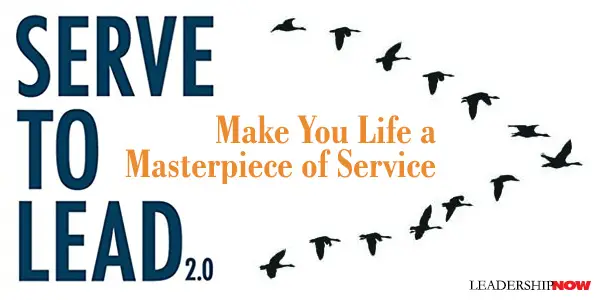
Everyone can be great because everyone can serve. You don't have to have a college degree to serve. You don't have to make your subject and your verb agree to serve…. You only need a heart full of grace, a soul generated by love.–Martin Luther King. Jr.

"Everyone can lead because everyone can serve," says James Strock. "When service is the basis of leadership, everyone can be a leader." What's more, "We're in a new era, with new rules, new ways to serve—and much greater accountability."
In a new edition, Serve to Lead 2.0 puts the focus of leadership where it should be. Too often, people think of leadership as being about the leader. A leader who serves has greater influence. Service—not control—leads to trust and increased influence.
In an excellent chapter on management, Strock helps to place management and leadership in perspective and explains some of the nuances of tough love and accountability. "Management is encompassed within leadership." As leaders, we must develop management skills.
"Ultimately, management is a key to extraordinary service. Individual performance has the limitations of an individual. You may be a virtuoso. Yet, if you are determined to express your individuality in a more expansive way, you must develop management skills and engage others in a larger enterprise.To achieve ever deeper relationships with greater numbers of customers and other stakeholders, you must master management. Day in and day out, that means you must serve those with whom you work, enabling them to serve ever more effectively.
Filled with examples and quotes, Serve to Lead 2.0 is well thought out and one of the best books you'll read on how to think about service and how to get your leadership to be one of service.
Strock urges us to make our life a masterpiece of service. It begins by asking the question—who am I serving—throughout our life, minute by minute, hour by hour, day by day. Importantly, it is not a question that we should apply to only one area of our life. It should be an approach we take in all areas of our life—our time, our money, our relationships, and thoughts.
As an ongoing practice, he suggests we continually ask ourselves four questions:
Who am I serving?
How can I best serve?
Am I making my unique contribution?
Am I getting better every day?
Service isn't easy. It doesn't always get noticed, but it is what leading is all about. If that is hard to swallow, you need to ask yourself, why do I want to lead?
How many people are trapped in their everyday habits: part numb, part frightened, part indifferent? To have a better life we must keep choosing how we're living.–Albert Einstein
![]()
![]() Like us on Instagram and Facebook for additional leadership and personal development ideas.
Like us on Instagram and Facebook for additional leadership and personal development ideas.

![]()
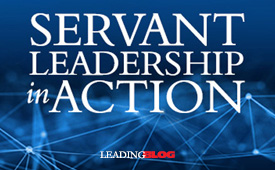
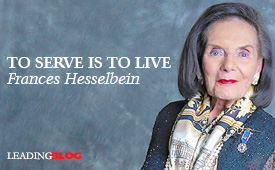
Posted by Michael McKinney at 01:42 PM
Permalink | Comments (0) | TrackBacks (1) | Leadership , Leadership Development , Management , Personal Development
04.21.10

Mark Twain on Leadership
Mark Twain (Samuel Langhorne Clemens) died of a heart attack one-hundred years ago today, at his home in Redding, Connecticut. He left behind a wide range of comments regarding leadership ideas and principles.
It could be said that he believed in Management By Wandering Around. In his autobiography he wrote, "In religion and politics people's beliefs and convictions are in almost every case gotten at second-hand, and without examination, from authorities who have not themselves examined the questions at issue but have taken them at second-hand from other non-examiners, whose opinions about them were not worth a brass farthing." Firsthand knowledge is a competitive advantage.
- A statesman gains little by the arbitrary exercise of ironclad authority upon all occasions that offer, for this wounds the just pride of his subordinates, and thus tends to undermine his strength. A little concession, now and then, where it can do no harm is the wiser policy. (From A Connecticut Yankee in King Arthur's Court)
- The man who does not read good books has no advantage over the man who cannot read them.
- The miracle, or the power, that elevates the few is to be found in their perseverance under the promptings of a brave, determined spirit.
On Encouragement:
- I can live for two months on a good compliment.
On Success:
- Keep away from people who try to belittle your ambitions. Small people always do that, but the really great make you feel that you, too, can become great.
- Success is a journey, not a destination. It requires constant effort, vigilance and re-evaluation.
- The secret of success is making your vocation your vacation.
- Work and play are words used to describe the same thing under differing conditions.
On Courage:
- Courage is resistance to fear, mastery of fear - not absence of fear. Except a creature be part coward it is not a compliment to say it is brave. (From The Tragedy of Pudd'nhead Wilson)
- It is curious that physical courage should be so common in the world and moral courage so rare.
On Vision:
- You cannot depend on your eyes when your imagination is out of focus.
- Don't part with your illusions. When they are gone, you may still exist, but you have ceased to live.
On Execution:
- The secret of getting ahead is getting started. The secret of getting started is breaking your complex, overwhelming tasks into small manageable tasks, and then starting on the first one.
- Twenty years from now you will be more disappointed by the things that you didn't do than by the ones you did do. So throw off the bowlines. Sail away from the safe harbor. Catch the trade winds in your sails. Explore. Dream. Discover.
On Ethics:
- Always do right. This will gratify some people and astonish the rest.
- I am different from [George] Washington; I have a higher, grander standard of principle. Washington could not lie. I can lie, but I won't.
On Communication:
- The difference between the right word and the almost right word is the difference between lightning and the lightning bug.
- It is better to keep your mouth closed and let people think you are a fool than to open it and remove all doubt.
- If you have nothing to say, say nothing.
Twain was not a successful businessman. After emerging from bankruptcy in 1901, Twain advised, "To succeed in business, avoid my example." He was however, a witty and shrewd moralist and critic of human nature. A century after he wrote his last words, Twain still remains relevant.
Posted by Michael McKinney at 07:07 AM
Permalink | Comments (0) | Leaders , Leadership , Personal Development

Twain on Self-Improvement: The Progress of a Moral Purpose
Twain created a series of photographs that humorously point out what often goes through the minds of man when considering any kind of self-improvement. How often have we toyed with the idea only to conclude as Twain did, "Why bother? I'm good enough as I am." See the series here.
Posted by Michael McKinney at 07:03 AM
Permalink | Comments (0) | Personal Development
04.14.10

The Little BIG Things
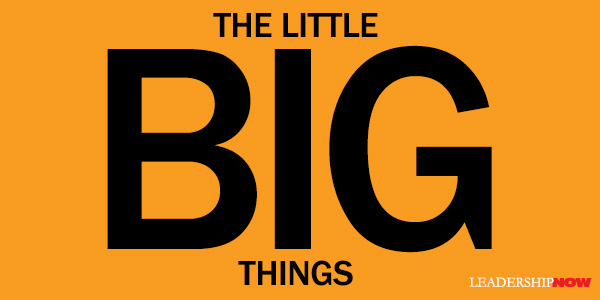
IN many ways leadership is about taking an oath of excellence. To a leader, excellence matters. Excellence requires "re-imagining" (to borrow a Peters' term) your world done excellent. Leaders see things differently and this difference can be taught. Teaching excellence—one behavior at a time—is what The Little Big Things by Tom Peters, is all about.
Some of what you will read in TLBT has been presented on the Tom Peters blog over the years. But for this book, the posts have been edited, revised, organized and conveniently packaged. It's a compilation of 163 behaviors you can put into practice to achieve excellence in any endeavor. As such, it is not meant to be read straight through. Jump in anywhere it looks interesting. The process here is: read—consider—implement—repeat.
Tom, as we've said here before, is good at boiling things down to basics. You'll find opportunities to pursue excellence in basic insights that produce big results.
Courtesies of a small and trivial character are the ones which strike deepest in the grateful and appreciating heart.—Henry Clay, American statesman (1777-1852)
Sometimes the little-big-things can seem too "soft" or beneath the demands of business. Tom explains: "Ideas like conscientiously showing appreciation are matchless signs of humanity—and the practice thereof, in my opinion, doubtless makes you a better person, a person behaving decently in a hurried and harried world….Acts of appreciation, to stick with my theme of the moment, are masterful, even peerless, ways of enthusing staff and partner and client alike, and, hence, greasing the way to rapid implementation of damn near anything. That is, 'Soft is hard' is wholly pragmatic—and more often than not, effectively implemented, makes the bottom line blossom!"
Excellence has to be challenged into existence. The Little Big Things does just that.
![]()
![]() Like us on Instagram and Facebook for additional leadership and personal development ideas.
Like us on Instagram and Facebook for additional leadership and personal development ideas.

Posted by Michael McKinney at 08:00 AM
Permalink | Comments (0) | General Business , Leadership Development , Management , Personal Development
04.12.10

What's Killing Your Mojo?
Mojo is that positive spirit toward what we are doing now that starts from the inside and radiates to the outside, writes Marshall Goldsmith. It's that sense others get about us that comes from the harmony between what we feel about what we are doing and what we show on the outside. It's about two simple goals: loving what you do and showing it.
The kind of positive impression you make profoundly affects your ability to influence. Mojo can make or break your leadership effectiveness. The greater your Mojo, the more times you'll ring the bell.
Goldsmith says that four ingredients need to be combined in order for you to have great Mojo:
Identity: Who you think you are? Or how do you perceive yourself? Our identity is created in a number of ways: remembered (life experience), reflected (what others think of us), programmed (what others think we should be) and created (what we consciously choose to be). "To change your Mojo, you may need to either create a new identity for yourself or rediscover an identity that you have lost."
Achievement: What have you done lately? There is a difference between what we think we achieve and what others think we achieve. When these get out of sync we can have a Mojo crisis. Understand what "achievement" means to you. "Try not to go through life deluding yourself by pretending that when the world cares, you do—or pretending that when the world does not care, you do not care."
Reputation: What do other people think you are? Your reputation is a scoreboard kept by others. You can't control it, but if it's killing your Mojo, there's a lot you can do to improve it. You can choose the reputation you want if you are disciplined enough to live out your objectives in daily, consistent behaviors.
Acceptance: What can you change, and what is beyond your control? Acceptance means you dispense with what Goldsmith calls the Great Western Disease—the "I'll be happy when…" statement. You know how it goes: "I will be happy when I have a million dollars in the bank, when my house is bigger, or when I look the way I want." There's nothing wrong with wanting those things but we often fixate on the future at the expense of enjoying the life we're living now. Worse still we whine, complain and lay blame for things that happen to us instead of taking it all in stride. "By carrying around anger and negative baggage, we weigh ourselves down. We limit our opportunities to find meaning and happiness. We kill our Mojo."
We kill our Mojo by committing mistakes like these:
Over-committing. When you're bursting with Mojo, everybody wants you be a part of what your doing. This can lead to over-commitment. It is "one of the sweet but risky blowbacks from having Mojo." Understandably we don't want to look weak, naturally we loved to be included, or perhaps we think we're superhuman, but whatever the case it can kill our Mojo.
Waiting For the Facts to Change. This is wishful thinking. It is a common response to a setback. It's the opposite of over-committing because while you're waiting for a more comfortable set of facts to appear, you do nothing. Goldsmith helpfully advises: "When the facts are not to your liking, ask yourself, 'What path would I take if I knew that the situation would not get better?' Then get ready to do that."
Looking For Logic in All the Wrong Places. Humans are not always logical, yet we persist in trying to find logic where no logic exists or try to prove others wrong with our superior logic. Again Goldsmith nails it: "The next time you pride yourself on your superior 'logic' and damage relationships with people you need at work—or the people you love at home—ask yourself, 'How logical was that?'"
Bashing the Boss. This should speak for itself. See acceptance.
Refusing to Change Because of "Sunk Costs." "We persist in error," says Goldsmith, "because we cannot admit error." If your decisions are based on what you have to lose instead of what you have to gain, your "sunk costs" may be costing you more than you know.
Confusing the Mode You're In. There is our professional mode and our relaxed mode. And we shift between the two without even thinking about it. "The executives you most admire tend to be those who, with constant discipline, never drift out of professional mode….They have chosen a role for themselves, and they rarely go off script. They are professionals. That's why they have Mojo."
In the final chapters of the book, you will find 14 tools to help you build, rebuild or redefine your Mojo. Goldsmith pours his understanding of people and situations, gained from years of experience, into this book. Acting on his wisdom will save you the unnecessary detours so common to the human condition.
Of Related Interest:
Goldsmith's Gold: You Are Under the Microscope
Goldsmith's Gold: Stop Trying to Help People Who Don't Want to Change
Goldsmith's Gold: Feedforward
Goldsmith's Gold: "You asked for my opinion and now you're arguing with me?"
Posted by Michael McKinney at 07:59 AM
Permalink | Comments (0) | Personal Development
03.05.10

Becoming A Linchpin
Linchpin is about personal leadership and is the most leadership oriented book Godin has written to date. He makes a good case for developing yourself to reach your potential against the backdrop of the changing workplace. Changing workplace or not, it is the thing to do.
In the industrial workplace it was easier, even expected that you could hide behind your job in exchange for job security. "You weren't born to be cog in the giant industrial machine. You were trained to become cog." (His assessment of our educational system is spot on.) Today successful companies are looking for people who make a difference—linchpins.
"Linchpins are the essential building blocks of tomorrow's high-value organizations. They don't bring capital or expensive machinery, nor do they blindly follow instructions and merely contribute labor." Linchpins don't worry about what's in it for them, but instead focus on giving gifts that change people. They can see the reality of today and describe a better tomorrow. That is, if they can ignore that voice inside that tells them to keep their head down, don't make waves, don't stand out. Godin identifies that voice as your lizard brain.
Overcoming the lizard brain takes training. "In the face of greed or fear from the amygdala [a-MIG-da-la or lizard brain], an untrained person surrenders." "The goal," says Godin, "is to quit the tasks you're doing because you're hiding on behalf of the lizard brain and to push through the very tasks the lizard fears." He notes, "Ironically, it's those who seek out discomfort that are able to make a difference and find their footing."
The good news is that this doesn't necessarily mean you need to change your job, your boss or your co-workers. That wouldn't solve your problem anyway. The problem rests with you—your attitude. The difference between a cog and a linchpin really comes down to attitude. It requires a change of attitude. It means choosing to do your old job in a new way.
A choice to not hide your best work. A choice to find your opportunities to make something happen. A choice to overcome the resistance you face in doing your work because what you have to offer is important enough to make the effort.
The subtitle of the book asks, "Are you indispensable?" When talking about being indispensable, we need to distinguish between your value and your attitude. By developing your unique gifts—becoming more of who you are—you are increasing your value, exposing your gifts, and making yourself indispensable in a "there is no one like you" sense. That's different than thinking you are indispensable. That's an attitude that will lead you to self-destruction. (Mike Myatt expresses well the pitfalls of that kind of thinking.) I don't think Godin is advocating arrogance or parading a "you can't do without me" attitude. Instead, he is advocating that we make the choice to develop our unique combination of gifts and give them to the world in a way that makes a difference—to change people's lives with what is the indispensable contribution that every human being can make if they will but choose to overcome the resistance to play it safe and aim for average.
Posted by Michael McKinney at 01:30 AM
Permalink | Comments (0) | Personal Development
01.27.10

Four Steps to Building Loyalty
Loyalty is a critical subject for leaders. As builders of community, we can't function without it. Successful organizations are built on relationships. Leadership is all about relationships. But how important is modeling loyalty in everything you do?
It is hard to talk about sustainability, community, personal responsibility and relationships without talking about loyalty. Yet we do.
Loyalty has become a commodity that we hold or withhold—a tool to vote with—a means to express our discontent on a whim. Abiding commitments are seen as old-fashioned. Impatience, irritability and selfishness all drive the need to look for greener pastures. "In a strange way," said Jack Valenti, "loyalty is now seen as some kind of character flaw." In Why Loyalty Matters, authors Timothy Keiningham and Lerzan Aksoy write:
The possibility of leaving applies to some degree to our relationships with everyone. Weak friendships, dysfunctional families, bad marriages, intolerant religious institutions, and inept governments all face the prospect of abandonment. And there are indeed times when leaving is the best option.But society cannot function and relationships cannot last if leaving is the readily selected, probable outcome to every perceived grievance. And while few would admit to cutting and running when times get tough, many, if not most of us, have a general sense that leaving has become too easy for many.
Loyalty is about making commitments to causes, people and ideas through thick and thin, for better or for worse. It is about service to something greater than ourselves.
Keiningham and Aksoy define loyalty as "accepting the bonds that our relationships with others entail, and acting in a way that defends and reinforces the attachment inherent in those relationships." Loyalty is implicit in all relationships and the lack of it is eroding our sense of well-being and happiness. Our priorities are often misplaced. They write, "The problem isn't that we are exchanging our time for commodities, but instead we are exchanging our family's time, our friends' time, our ideals' time to get something."
Of course, we like to see ourselves as more loyal than we are and everyone else as less loyal than they really are. But, "it is our unwillingness to see our own role in the general decline of loyalty that is a major cause of relationship disintegration. And this disintegration ultimately leads to our unhappiness."
Long-term thinking helps to develop loyalty. Professor Richard Sennett observed, "'No long term' is a principle which corrodes trust, loyalty, and mutual commitment … social bonds take time to develop, slowly rooting into the cracks and crevices of institutions." Leaders are hard pressed to function without it.
We develop and model loyalty in the seemingly small choices we make every day. "If loyalty is to be an important part of our lives, then we must become aware of the ramifications of our decisions. Living a loyal life requires that we recognize the formal and implicit commitments we have made to others. We must then make deliberate choices to strengthen our bonds by honoring our commitments." The authors suggest a process they call P2R2 . It stands for:
Pinpoint Where You Are: Where do you stand? We believe we are far more loyal than the recipients of our loyalty believe us to be. They offer the online LoyaltyAdvisior assessment to aid you in determining where you are.
Prioritize Those Things That Matter: If we want to make loyalty a meaningful part of our everyday existence, then we need to understand where we are actually spending our time and then prioritize.
Reinforce Your Connections: Actively schedule time to connect with those to whom we owe loyalty. "It will mean that there will be times we must sacrifice doing things that would be more fun to help a friend in need."
Reach Out To Others: Engage beyond your friends and family. "It says, this relationship, this institution, this cause is mine, and I will not abandon it."
Why Loyalty Matters delves deeply into the issue of loyalty. They discuss the economics of loyalty, the problem of misplaced loyalty, faith and loyalty, and an important chapter on teaching loyalty. President Theodore Roosevelt warned, "To educate a man in mind and not in morals is to educate a menace to society."
Oprah Winfrey sums up the need well: "Lots of people want to ride with you in the limo, but what you want is someone who will take the bus with you when the limo breaks down."
Posted by Michael McKinney at 03:12 PM
Permalink | Comments (0) | Personal Development
01.22.10

Can You Pass the Fitzgerald Test?

IN HIS CLASSIC self-analysis, The Crack-Up, F. Scott Fitzgerald wrote, "The test of a first-rate intelligence is the ability to hold two opposed ideas in the mind at the same time, and still retain the ability to function." For example, he added, one should "be able to see that things are hopeless and yet be determined to make them otherwise."
More and more we are called upon to function in a world full of paradoxes; not only function but possess an ability to take action in the face of conflicting ideas and norms. Bruce Piasecki writes in The Surprising Solution, that paradox "almost seems too mild a word to describe the challenges facing the social leaders of today." He adds, the best leaders "thrive on differences and ambiguity, and find solutions amid this large tolerance for social complexity."
In his innovation playbook for uncertain times, The Silver Lining, Scott Anthony writes, "Existing systems, structures, and development programs that were sufficient for leaders to thrive in an era of ordered capitalism are proving to be inadequate in today's increasingly turbulent times. Most leaders just aren't ready to grapple with the paradoxes that will increasingly characterize their day-to-day lives." He lists, for example, these seemingly paradoxical requirements facing leaders:
- I have to focus on running operations with laserlike precision without stifling creativity.
- I exist because of my big business, but "small saplings" are critical for long-term success.
- Data drives my decisions, but I have to trust intuition and judgment when data doesn't exist or is vague.
- Attention to detail and focus on numbers has allowed me to progress in my career, but too much focus on details or numbers can crowd out innovation.
- The people I trust the most are people who deliver short-term results and never surprise me, but innovation almost always involves some kind of surprise.
- I have to leverage my capabilities to win today's battles while walking away from many of these capabilities to win tomorrow's battles.
To this we might add the ability to look at solutions to problems that have more than one solution or seemingly opposing goals—serving shareholders and our communities, to grow and be good stewards. If you have a low tolerance for opposing thoughts you are less likely to look for other alternatives. This greatly limits your ability to adapt to changing circumstances.
Anthony reports that it has been estimated that no more than 5 percent of the manager population can truly grapple with paradox. Why? He says that "Michael Putz from Cisco has studied this problem for the past decade. His perspective is that the problem isn't a lack of basic intelligence, desire, or capacity. Rather, managers haven't developed the ability to grapple with paradox because they haven't needed to."
But the capacity to deal with paradox, to work with opposable ideas, is learnable. Again, self-awareness is key. Understand how you view the world. Then, creating a specific developmental program to help you take a broader view, to integrate multiple perspectives, to view solutions as both/and instead of either/or, will help you pass the Fitzgerald Test.
![]()
![]() Like us on Instagram and Facebook for additional leadership and personal development ideas.
Like us on Instagram and Facebook for additional leadership and personal development ideas.
![]()

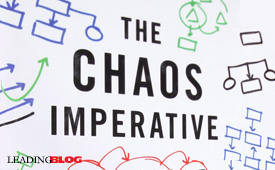
Posted by Michael McKinney at 12:12 AM
Permalink | Comments (0) | Personal Development , Thinking
12.28.09

Avoiding the Unforced Error
We all make them. Ethics breaches, sex scandals and performance-related turnover are increasingly found in today's headlines. As in tennis, the unforced error is made by someone with the ability to keep the ball in play but who makes a mistake, resulting in the loss of a point. To improve your game you need to develop the habits that will help you keep the ball in play. It is your performance over time—a steady game—that will get you where you want to go. That's what The Unforced Error by Jeffrey Krames aims to help you do.
The most dangerous errors—and the one discussed in this book—are "the ones we don't recognize, so we can't fix them before the damage is done." Krames divides unforced errors into two groups: the unforced operating error (the ones we all make in the course of doing our job; a bad call) and the unforced nonoperating error (errors not directly related to the conducting of business, but can shatter a career nonetheless; sexual affairs and errors of character). Krames writes, "There are seldom excuses for unforced nonoperating errors. You have to have the awareness, self-control, and maturity to avoid them." The focus of this book is the former kind, the unforced operating error.
There is a key to avoiding unforced errors. Not surprisingly, the key is humility. "That's because humility—one of the most underrated of all leadership qualities—is essential to developing the strength and consistency to avoid unforced errors." It's the kind of humility that comes from having the self-confidence to admit mistakes, blind spots and then move on to correct the mistake. Rarely would you be told that you were fired due to a lack of humility, but it is the trigger for so many unforced errors. Krames successfully helps you to recognize an unforced error when you see it. In each chapter that covers a specific unforced error, he offers sensible and pragmatic advice on how to avoid these "career killers." His advice includes:
- Never say the ball was out by a mile. Face reality at all times.
- Nothing is as important as people decisions. Get the right people.
- When you do make a people mistake, fix it as quickly as possible.
- Don't overlook the wild card. Develop the next generation of leaders.
- Keep your game inbounds. Living and leading by the rules.
- Step up to the net. Take ownership of your part of the court.
- Watch the whole court. Find out who the real line judge is in your game and make sure they know how you're doing.
Krames is very readable as always. The tennis metaphor works well to demonstrate the importance of these ideas. If you take the time to study the advice Kramer has gathered together, you could save yourself from committing these errors. In the words of Billie Jean King, "Self-awareness is probably the most important thing towards being a champion."
Of related Interest:
Derailed: Five Lessons Learned from Catastrophic Failures of Leadership
Posted by Michael McKinney at 08:13 AM
Permalink | Comments (0) | Ethics , Personal Development
12.14.09

Lift: How to Be a Positive Force in Any Situation

TO OVERCOME the force of gravity—that which pulls us down—we have to generate an opposing force greater than gravity. That force is lift. Any opposition to lift is called drag.
In the same way that we use the laws of physical science to lift a plane off the ground, we can use social science to lift "ourselves and others up to greater heights of achievement, integrity, learning, and love," thereby becoming a positive force in any situation. It's the pressures of daily living that drag us down. Instead of experiencing lift we fall back into our comfort zones, become reactive, self-centered and fatalistic.
To intentionally experience lift and to be a positive influence for others, we have to make a conscious choice.
In Lift: Becoming a Positive Force in Any Situation, authors Ryan and Robert Quinn present this fitting metaphor, to explain how we can intentionally experience lift, to rise above the constraints of everyday life and lift the people around us. "All of us have a choice: we can choose to be the kind of people who drag others down or to be the kind of people who lift…. We are relational beings. Who we are at any time depends on who the people around us are, and who they are depends on who we are." That last sentence can't be overemphasized. It carries with it a great deal of responsibility, especially for us as leaders.
The authors describe lift as "a psychological state in which a person is purpose-centered, internally directed, other-focused, and externally open." What exactly are these four characteristics of lift? In a very relatable and revealing example—the parenting of a young son, Mason—the authors show how this plays out in real life. I can't reproduce the example here, but I think from the inferences you will get the idea the authors are trying to convey. The following is paraphrased from their work:
Purpose-centered is the opposite of being comfort-centered. The desire to stay comfortable is a characteristic of a normal psychological state. My son Mason's behaviors were comfortable for me. In my desire for comfort, what had not occurred to me was the possibility that perhaps Mason was behaving differently because of the changes that had happened recently in his life. We need to ask, "Are the results I am trying to create about me and what I am comfortable with or are they about what is best for the other person?"
Internally directed is when people experience the dignity and integrity that comes with exercising the self-control necessary to live up to the values that they expect of others. External direction, on the other hand, is a characteristic of a normal psychological state.
If Mason was building with his Legos or playing a game when I asked him to do something, I expected him to put those things aside and do it. Yet, if I was involved in an activity and Mason interrupted me, I would expect him to wait until I was done with my activity before I did what he asked. I expected him to show respect to me, but I was not doing the same for him...When people are externally directed, they let circumstances (such as the need to get Mason to clean up or go to bed) drive their behavior instead of their values (such as respect for others' time and activities).
Other-focused is to be open to other people's feelings and needs. We then empathize with them and feel impulses to be compassionate. When we are self-focused, we are concerned only with our own needs, feelings, and wants. We see other people as objects that either helps us or impede us in our goals. In my case, Mason was an object that was preventing me from my goal of showing that I was a good father.
Externally open is openness to external cues. When we are open we learn, grow and adapt ourselves to the situation unfolding before us. When we are internally closed, we ignore and deny feedback. We ignore or deny feedback out of fear that the feedback says something about our worth as human beings. So as a result, we tend to get angry. Again with Mason, I was not showing him the respect that I wanted him to show me. As I opened myself to the possibility that I might be wrong, I also opened myself up to what Mason was feeling, and to what his needs might be and became other-focused.
Using scientific research to provide "insight into why lift is important, what the characteristics of lift are, and how our psychological states influence others," they formulated four questions that capture the nuances required to intentionally move ourselves from a normal state into lift.
- What results do I want to create? (When people answer this question they become less comfort-centered and more purpose-centered.)
- What would my story be if I were living the values I expect of others? (When people answer this question they become less externally directed and more internally directed.)
- How do others feel about this situation? (When people answer this question they become less self-focused and more other-focused.)
- What are three (or four or five) strategies I could use to accomplish my purpose for this situation? (When people answer this question they become less internally closed and more externally open.)
This post is getting long, but I would like to share several more thoughts for you to contemplate:
When a new situation disrupts our previous expectations, though, it is more productive to change our expectations than to try to make the world conform to our old expectations.A purpose-centered state involves more than having a goal. When people are purpose-centered, they envision and pursue extraordinary results that are not constrained by previous expectations or by the expectations they receive from others.
Self-regulation is the process of using one's conscious mind to inhibit one's automatic response to the situation and to replace it with a controlled response.
Since he was not focused on himself, he was not worried about people taking advantage of him.
The book is full of great examples and scientific evidence to back their perspective. The scientific evidence is really just icing on the cake. The relational principles at work here are sound, but they require much thought and self-examination. This is a book that needs to be read and re-read. Inertia is our biggest enemy. Inertia will keep us from benefiting from this book and becoming a positive force; the kind of leaders that provide lift in our own lives and those we influence.
![]()
![]() Like us on Instagram and Facebook for additional leadership and personal development ideas.
Like us on Instagram and Facebook for additional leadership and personal development ideas.

Posted by Michael McKinney at 11:10 PM
Permalink | Comments (0) | Communication , Leadership Development , Personal Development , Positive Leadership
12.07.09

Got Wingmen? Never Fly Solo

AIR FORCE fighter pilot Rob "Waldo" Waldman learned how to overcome fear, anxiety, and self-doubt to fly combat missions that pushed him to his limits by disciplined training and the help of his wingmen. Wingmen are people with different backgrounds, skills, and experiences unified under one agreement—to never think or act alone.
A wingman watches your back. In Never Fly Solo, Waldo threads real-world experiences to encourage the development of a check-six culture . Check-six refers to the six o'clock position where the jet is most vulnerable—the pilot's blind spot.
Waldo says, "There is a limit to how much you can learn on your own. A good wingman will give you mission-critical feedback, catch your errors, ask questions, and propose challenging scenarios to push you to grow in your skills and mental discipline." Encouraging others to look out for our blind spots requires a great deal of mutual trust. "These trusted partners, male or female, are your wingmen."
Of course, this means first, not being afraid to acknowledge that you need help and then being able to ask for it. This is all the more difficult if you haven't built trust in yourself and invested the time to build trusting relationships with others. You've got to "walk the flight line." Get out and build relationships with those people you work with—treating each other as people first and coworkers second. "It's the relationships we build and the people whom we trust that give us the courage to take risks and make ourselves better."

By being willing to say, "I don't know," or "I messed up," we create a transparency that will attract others to us and "create the type of environment where people won't be afraid to make mistakes. They will also be more likely to check your six as well."
Additionally, we have to keep our "radar sweeping for a wingman, coworker, or peer who may be experiencing a challenging time in her life. Don't let her get isolated." Be supportive and find her some help if necessary." It is the worker that keeps to themselves—trying to fly solo—that check out, become unmotivated, complacent and careless. "Never feeling invested in the company's mission, they do the minimum, and everyone suffers."
In today's environment, communication, feedback, and mutual support are critical Waldo says because:
- Human beings make mistakes.
- We each have a limited perspective.
- We operate in stressful environments that lead to tunnel vision and task saturation.
- Most professionals undervalue communication and teamwork.
- Faulty communication can kill a mission as well as a relationship.
- Errors increase when there is no definable set of teamwork standards and skills.
"An effective check-six environment frees up communication and removes barriers to growth so that all members of the team feel empowered to speak up and ask questions." It also builds team confidence.
We all need wingmen and the best way to find a wingman is to be one!
![]()
![]() Like us on Instagram and Facebook for additional leadership and personal development ideas.
Like us on Instagram and Facebook for additional leadership and personal development ideas.

![]()


Posted by Michael McKinney at 07:29 AM
Permalink | Comments (0) | Personal Development , Teamwork
11.26.09

Gratitude: The Habit of Noticing

GRATITUDE is a way of investing ourselves in others. A particularly overlooked aspect of the art of gratitude is the habit of noticing. When we notice others and show our appreciation, it pays huge dividends. Additionally, by noticing others we become more attuned to life's vitality, intensity, and diversity.
I related the following story from the book Growing the Distance, a few years ago, but it bears repeating:
Arden Barker had planted a 50-acre field of wheat that was now golden-brown, very full, and ready for harvest. It was a sight to touch the heart of any farmer. When his Uncle Harry came to visit, Arden proudly took him out to look at the field of wheat. Harry looked around, put his hand over his eyes to peer into the distance, and fixed his gaze on a boulder that had been too large to move in the middle of the field. "Is that a stone on the hill?" he asked. He said nothing about the field of wheat. Arden was crushed by his lack of enthusiasm.The Uncle Harry incident became the subject of discussion at many Barker family dinners thereafter. A few years later, their daughter, Brenda, had just finished cutting and trimming the family's huge lawn. Arden came home and surveyed her work from the kitchen window. "You missed a patch under the trees," he pointed out. Brenda came over to him, put one arm around his waist, and her other hand over her eyes to peer off into the distance and asked, "Is that a stone on the hill?"
Too often, leaders, managers, and parents think that it is crucial to their role to point out where people could improve—to be critical. Certainly, there is a time for that, but it happens all too often. Effective leaders will look for the positive and show gratitude and appreciation for it. People often look to others for direction and support and if it is not forthcoming it can kill the spirit and impede growth.
![]()
![]() Like us on Instagram and Facebook for additional leadership and personal development ideas.
Like us on Instagram and Facebook for additional leadership and personal development ideas.
![]()


Posted by Michael McKinney at 12:19 AM
Permalink | Comments (0) | TrackBacks (1) | Communication , Personal Development
11.17.09

Derailed: Five Lessons Learned from Catastrophic Failures of Leadership
Derailed is about the traps you and I can fall into. Sometimes they are the result of the sense of entitlement that leaders can fall prey to. Sometimes they are the result of thinking and behavior that has worked (we think) in the past, so why change it now. Sometimes they are the overuse of a strength that we have yet to discipline. Sometimes we don't even have a clue and so we get derailed and go around blaming others and asking "Why me?"
It can happen to anyone. And it is something we have to constantly be sensitive to because these traps are character issues that can disqualify us from leadership. Author Tim Irwin writes, "No matter how brilliant, charming, strategic, or commanding in presence a leader is, the consequences of a failed character are extraordinarily disabling and will bring down even the strongest among us. Similarly, if our character is inadequate, eventually we will miss the warning signals and slam into a parked freight train."
To illuminate the impact and nature of derailment, Irwin profiles six leaders that either through arrogance, lack of self-awareness, a sense of entitlement, greed, self-discipline, or a combination of any or all, derailed. Derailment is a process. Irwin suggests that there are five stages: a failure of self-/other-awareness, hubris, missed early warning signals, rationalizing and finally derailment. A lack of self-awareness is the foundation of all derailments.
These are all issues of character. And stressful times only make us more of who we already are. Authenticity, self-management, humility and courage are dimensions of character that when properly developed, help us to avoid derailment. We can only be as good a leader as the character we possess.
Derailment is not inevitable, but without attention to development, it is probable. He writes, "Derailment is especially rooted in the failure to prepare, to grow personally and professionally, and to develop the qualities needed to stay on track…. Attention to our development means we must be constantly alert and self-aware and have a lifelong commitment to learn, to grow, and to prepare."
To combat derailment you need to adapt five habits says Irwin. First, you need to develop a habit of openness. "Openness to feedback reflects our interest in being a learning, growing person."
Second is the habit of self-/other-awareness. "It is critical that we regularly tune into how others see us." When we find a big difference, we have a blind spot that needs to be addressed.
~Anthony Hopkins, The Edge
The third habit is to cultivate personal early warning systems that can tell us when we are at risk of derailment. "The key is to monitor ourselves and to pay attention to our own signals or feedback from others. Exerting control over stress means that we do whatever is necessary to lower the stress level to one at which our performance is not compromised."
We also need to develop a habit of accountability. "The leaders most susceptible to derailment refuse to have their opinions, decision, and actions questioned…. Accountability means that, even when we are not required to answer to others because of our position or corporate policy or law, we intentionally place ourselves in a relationship with someone who tests our motives and our actions."
Finally, is to develop the habit of resiliency. "Resiliency is the ability not only to bounce back from adversity but also to grow from it." A clear sense of purpose widens our perspective and helps us to become more resilient.
Sometimes we need a wake-up call to finally deal with our own issues. But we can learn vicariously. And that's the best way to learn if we have the discipline. Tim Irwin's book is a great place to begin. A guide for asking the hard questions.
Of Related Interest:
Free Online Assessment: Tim Irwin has developed an online assessment This exercise will help you to identify your risk for derailment in four key areas. There are 48 questions within this assessment. It should take you 5-10 minutes to complete.
12 Keys to Greater Self-Awareness
Note : This title is part of the publisher's Nelsonfree program. By purchasing this book, you can also download both the e-book and the audio versions for free. Three for the price of one!
Posted by Michael McKinney at 12:30 PM
Permalink | Comments (0) | Leaders , Personal Development
08.21.09

12 Keys to Greater Self-Awareness
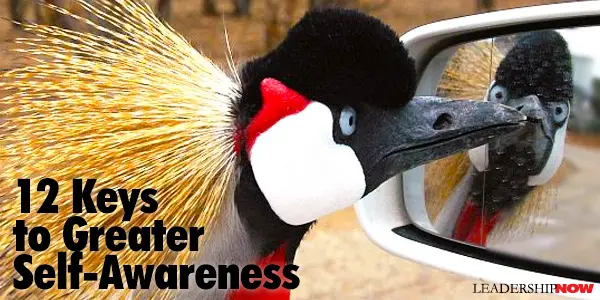
THERE IS NO evidence to suggest that any species of animals other than humans come pre-packaged with a set of mechanisms for any kind of meaningful self-awareness—to ask what and why. The degree to which we develop and use that capacity, in a constructive way, will largely determine our success in life.
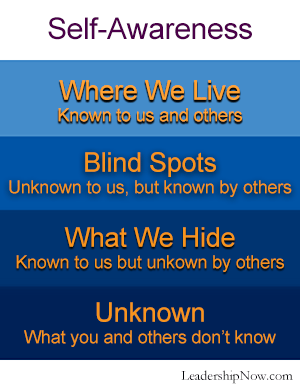
Self-awareness is where leadership development begins. Self-management and authenticity flow from self-awareness. Self-awareness can be divided into four parts: what is known to us and others, what is known to others but not by us, what we know and others don't and what we don't know and others don't either. Plumbing the depths of self-awareness takes time and more intensive tactics. However, our biggest gain in self-improvement can be had by finding out what others know that we don't. And they know more than we think.
Here are twelve keys to greater self-awareness:
- Stop blaming others for your choices. It's you.
- Take a personality assessment to help you gain some perspective.
- Get feedback from as many significant people in your life as you can. This can be uncomfortable for both you and them, but it is the fastest method for gaining a better picture of yourself. (Make them feel safe. It's a big, unknown risk for them!)
- Get a coach or mentor. They don't have to know more than you. They just have to see you in action and help you to be a better you. You're not as hard to figure out (complicated) as you would like to think.
- Understand that your biggest irritations look a lot like you.
- Look beneath your behavior to reveal your assumptions and filters. They dictate how you see yourself and others and impact how you relate to them.
- Look at your roadblocks. Learn to separate facts from your interpretations of them.
- Analyze your interactions. A lot of negative interactions signal a selfish approach to life.
- Reflect daily on your behavior. Ask questions like: How do I handle difficulties? What do I think or do when I don't get my own way? How adaptive am I? Can I control my emotions? Do I tend to say what I'm thinking when I'm thinking it? Do I judge other people and create conflict? How do others relate to me?
- Organize your thoughts in a journal. It is one of the best ways to capture what is going on around you and inside you. Make a note of the causal remarks people make about you.
- Read books and go to seminars that help you rethink your assumptions and address your problem areas and blind spots.
- Be careful what you say. Words mean a lot. Your language reflects your thinking and attitudes.
Your thinking and the behavior that flows from that has brought you to where you are now. You are in control of developing the thinking and behavior that will take you where you want to go. Self–awareness is difficult. We don't always like to admit things about ourselves because we don't like the guilt associated with not doing what we know we should. But admit we must if we are to grow. Ask yourself, "In light of where I come from, what do I need to know about myself?"
Warren Bennis wrote, "It is one of the paradoxes of life that good leaders rise to the top in spite of their weaknesses, while bad leaders rise because of their weakness….We are our own raw material. Only when we know what we are made of and what we want to make of it can we begin our lives—and we must do it despite an unwitting conspiracy of people and events against us." It is a lifelong and rewarding journey.
![]()
![]() Like us on Instagram and Facebook for additional leadership and personal development ideas.
Like us on Instagram and Facebook for additional leadership and personal development ideas.
![]()


Posted by Michael McKinney at 12:09 AM
Permalink | Comments (0) | Personal Development
08.13.09

Where Do You Go to Revitalize Your Standards?
The Parthenon, completed in 432 BC, is one of the world's greatest cultural monuments. The Doric temple was famously designed to counteract the optical illusions created by looking at something so large. To the observer, the columns look perfectly straight and perpendicular, and the steps appear to be horizontally level. This illusion is only possible by exacting architectural corrections.
To account for what the eye sees, every column, instead of being a straight line from base to neck, are actually curved on a slight arc having a gentle swell in the middle or entasis. In addition, the corner columns are slightly larger in diameter than the others and are placed closer to the adjacent column than the distance between each of the other columns. This is due to the fact that the more well-lighted an object is, the smaller it will appear and thus a little further apart than the columns set against the darker background of the building wall.
As the columns rise they are angled towards the center of the temple. Remarkably, the base upon which they rest is curved upwards towards the center so as to make it look horizontally level from a distance. To offset the curvature of the base, the lower drums of the columns are made higher on one side than on the other. Without this correction the columns would lean in opposite directions.
All of the deviations from the vertical and the horizontal made to enhance building's appearance required exacting mathematical calculations. The lines and angles of this geometric structure have been softened into curves so perfectly that they are imperceptible to the observer's eye and harmoniously create the builders vision. Excellence.
Dan Meyer relates the story of an elderly man who returned every few years to the city of Athens for most of his adult life. Each time he would climb to the top of the Acropolis, take a seat on one of its ancient stones and spend an hour or two letting his eyes wander over the massive plateau, reflecting on the soaring columns, and the perfect proportions of the Parthenon. When asked to explain the reason for his habitual behavior, the elderly gentleman's eyes crinkled as he smiled: "I do this because it keeps my standards high."
Where do you go for inspiration? Where do your values come from? Where do you go to revitalize your standards?
Posted by Michael McKinney at 10:40 PM
Permalink | Comments (0) | Personal Development
07.30.09

Emotional Intelligence: Self-Awareness
Without self-awareness leadership becomes just another exercise in ego gratification. Self-awareness allows for self-discipline and control of the ego. Without it the ego runs amok looking after itself and only incidentally in the service of others if the needs of both happen to align.
Self-awareness is the ability to see when an emotion or a perception is influencing your thinking and behavior and, if necessary, do something about it. Gaining control over the state of your mind will pay big dividends in terms of your leadership effectiveness. It is the blind spot of leadership. Being able to step back and see both the positive and negative aspects about yourself, to see how you affect others, and to see how you are behaving in real-time, is critical to your success as a leader.
Emotional Intelligence 2.0 offers some good strategies to develop your self-awareness as part of an overall EQ skill development program. Self-awareness is a bigger problem than one might think. The book reports that "only 36 percent of the people tested were able to accurately identify their emotions as they happen. This means that two thirds of us are typically controlled by our emotions and are not yet skilled at spotting them and using them to our benefit."
A proper and healthy self-awareness facilitates an essential other-awareness that is vital to good leadership. You can not manage the behaviors of others without first getting a handle on your own.
Posted by Michael McKinney at 11:33 PM
Permalink | Comments (0) | Leadership Development , Personal Development
07.20.09

That's One Small Step for Man, One Giant Leap for Mankind: An Apollo 11 Lesson
On July 20, 1969, Neil Armstrong and then "Buzz" Aldrin first stepped on to the surface of the moon. Most of the population in the U.S. alive today have no recollection of that event. Yet it is an event that continues to shape the world we live in today. Like many of the great achievements of the past, we don't and probably can't fully grasp the effort – problems, ingenuity, perseverance and sense of humor – that went into making the landing on the moon a reality.
The Apollo 11 mission was a success in large part because it was supported by everyone. Not just NASA, but congress and the American people. It was truly a national project. It taught us to work through our unknowns and have faith in our ability to learn and grow.
President John F. Kennedy told an audience at Rice University on September 12, 1962:
We choose to go to the moon in this decade and do the other things, not because they are easy, but because they are hard, because that goal will serve to organize and measure the best of our energies and skills, because that challenge is one that we are willing to accept, one we are unwilling to postpone, and one which we intend to win, and the others, too.
True accomplishments come from doing the hard thing and not resting on the easy things. Raise your expectations. Don't rob yourself of your potential future. Strive to do the hard things.
Posted by Michael McKinney at 12:59 PM
Permalink | Comments (0) | Personal Development

Maxims for Life: You Don't Have to Learn the Hard Way
Entrepreneur J. R. Parrish has distilled some real world lessons from his own life experience and from the teachings he gained from his mentor at an early age. You Don't Have to Learn the Hard Way is designed as a guide book for young people. In a world haunted by the relative, finding anchors for your life is not as readily available as it should be. Beginning life with a relative mindset is a recipe for disaster. When good advice comes along it is important to take notice of it and see how it fits in with your values and the outcomes you want for yourself.
If you are fortunate enough to find a good mentor to aid you, it's important to take them seriously if you want to get the full benefit.
Once you find a mentor, it's essential that you show respect and never become a "Yeah, but." If your mentor tells you your hair is too long and needs to be cut, do it. Don't ever say, "Yeah, but I had it short and that didn't help." Whatever your mentor suggests, do it and do it immediately if you want him or her to continue to help you. It's one thing to do what your mentor suggests and report back how it went and quite another to question the advice without trying it. You won't last long if you resist suggestions.
A mentor or a book like this can help you to gain vicariously what many people end up learning the hard way. Here are several maxims found in Parrish's book that are good to think on:
Generally speaking, if you're contradicting, you're losing.
Your success or failure will be determined first and foremost by how effectively you deal with others.
When you lose, don't lose the lesson.
Don't ask a no question if you want a yes answer.
Most anger distills to blame. When you eliminate blame, you eliminate anger.
Men and women differ in numerous ways and sometimes make the mistake of treating the other the way they want to be treated.
If you always do what you say you are going to do, I can build an empire around you; if you sometimes do what you say you're going to do, you're just another headache for me.
What we aren't taught early in life is the pain and agony that follow selfishness.
Never say anything about yourself that you don't want to be true.
Every facet of life is determined by our thinking, yet we're not taught how to think.
The book also contains some self-discovery quizzes that are also found on the accompanying web site. Get this book for any young adult you know … and read over their shoulder .
Posted by Michael McKinney at 10:32 AM
Permalink | Comments (0) | Personal Development
07.16.09

Will You Survive After Getting to the Next Level?
In The Next Level, Scott Eblin cites research that finds that 40 percent of new executives fail within eighteen months of their promotion. In addition, researchers at Development Dimensions International, conducted a poll of 785 business leaders and found that 40% of managers get little or no support as they enter their new jobs. What begins as one of the best moments in your career can turn out to be one of the most stressful events of your life.
"If success at the next level comes down to just one thing, it may be the art of strategic choice," writes Eblin. "Making the choice to pick up a new behavior or belief or to let go of one that is no longer serving you requires the capacity to step back and ask yourself, 'Given what I am trying to do or accomplish, is this serving me?'"
A great question but easier said than done. With a new role comes a new set of expectations requiring a new set of competencies. In other words, what got you here won't get you there.
Part of the problem faced by newly promoted executives is that while the expectations are high, they are not clearly stated. Considering the inevitable uncertainty and doubt that comes with the territory, it's not surprising that newly promoted executives easily fall back on practices that no longer serve their interests. Eblin has defined nine set of key behaviors and beliefs that new executives need to pick up and let go of to succeed. "This process of picking up and letting go, I've learned, is central to succeeding at the executive level."
Asking "Given what I am trying to do, is this serving me?" is good advice at any level.
Posted by Michael McKinney at 11:01 PM
Permalink | Comments (0) | Personal Development
07.13.09

The Rest of What You Need to Know About Strengths-Based Development
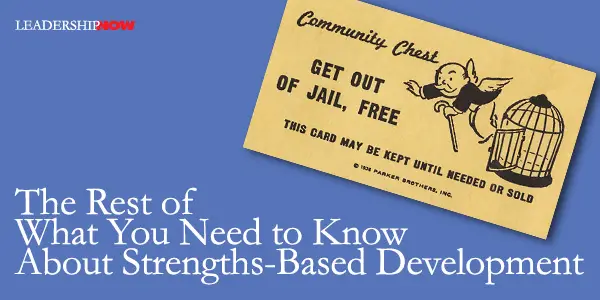
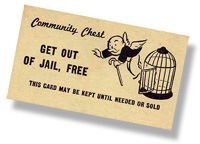 WHILE I DON'T BELIEVE the core of the strengths-based movement ever intended as its agenda the idea that you only need to "focus on your strengths and ignore your weaknesses," it doesn't change the fact that that is all most people seem to hear and those that have jumped on the bandwagon, promote. All too often the mantra, "focus on your strengths and ignore your weaknesses" sounds like a Get-Out-of-Jail-Free card. An extreme focus on your strengths (do what you like doing) and delegate your weaknesses (stop doing what you don't like) plays well, but in reality, it can get to be a bit self-indulgent. While there is some truth to it, it's more nuanced than that.
WHILE I DON'T BELIEVE the core of the strengths-based movement ever intended as its agenda the idea that you only need to "focus on your strengths and ignore your weaknesses," it doesn't change the fact that that is all most people seem to hear and those that have jumped on the bandwagon, promote. All too often the mantra, "focus on your strengths and ignore your weaknesses" sounds like a Get-Out-of-Jail-Free card. An extreme focus on your strengths (do what you like doing) and delegate your weaknesses (stop doing what you don't like) plays well, but in reality, it can get to be a bit self-indulgent. While there is some truth to it, it's more nuanced than that.
There is no arguing the fact that we all have various combinations of strengths in varying degrees. Maximizing the use of those strengths as we can, in the context we find ourselves in is advantageous to all involved. If you can carve out a place in the world that leverages your strengths that's great, but the reality is that the world keeps changing and what is required of you to stay relevant – valuable – keeps changing too. You may need to develop a new strength and turn some of your weaknesses around. Then there is the question of whether or not your particular brand of strength is marketable. I may derive pleasure, feel actualized, and be in my zone by utilizing one of my strengths, but if it isn't competitive with what others are doing with that same strength, well then, I'll be out of work. Great hobby, but not a career (at least not at my current level of competence).
Robert Kaiser has assembled fifteen authors in The Perils of Accentuating the Positive to help you get some perspective on the strengths movement. Kaiser writes that the point of the book "is not to dismiss strengths-based development." It's really a guide to make you a "savvier user of the strengths-based approach" and based on an understanding that "recognizes that both strengths and weaknesses have an appropriate place in learning and development."
In an interesting analysis by Korn/Ferry of 360 assessments of almost 2000 individuals, they found that most managers don't have the leadership strengths that their companies need for them to have in order to be effective. The reality is, most people need to develop strengths that don't come naturally to them. That means if you want to stay competitive – stand out from the crowd – you need to begin now to develop the strengths you don't have now that are required for your long-term success.
They bring out four ways to look at strengths:
Your Personal Best: What comes naturally to you
Competitive Strengths: Skills that are stronger than most of your competitors
Distinctively Competitive Strengths: Strengths that distinguish you from others
Competitive and Aligned Strengths: Strengths you need for long-term career success
If you plan to succeed by focusing on your strengths, make sure you do more than just discover and build on your strengths (your personal best). You will also need your strengths to stand out compared to your peers (competitive strengths). If you want to stand out among your peers and have a better chance for promotions, make sure your strengths set you apart from other also competitive peers (distinctively competitive strengths). Finally, you better hope that your five distinctive and competitive strengths include the ones that make a difference when it comes to long-term career success (competitive and aligned strengths).We regularly tell the up-and-coming youngies to first discover their strengths, then gauge how those strengths compare to those of the people they are and will be, competing with, and finally, find out which strengths they need to fulfill their career dreams and to start working on the ones that are not up to par.
As we have stated here before, the overuse of a strength can be a weakness. In addition, USC professor Morgan McCall writes, "Strengths that have led to success, the very ones that advocates claim should be played to, can become weaknesses over time or in a new situation." As our reality changes, we must also change. When we rely too much on our strengths we usually end up emphasizing them to the point where they become weaknesses and derail our career and relationships.

I will say that Marcus Buckingham's excellent film Trombone Player Wanted does speak eloquently to the tendency to obsess on the negative and systems designed to stifle the development of our strengths and create people that fit a predetermined mold. At the same time, as leaders, we do need to be working at placing people in positions where they can play to their strengths as much as possible. All too often people end up in positions that they never wanted or imagined for themselves and really have no business being in. Their effort can only be mediocre at best. We need to utilize our strengths and be proactive in our career and life decisions in an intelligent way. The tempering given to an obsessive strengths-only approach offered in The Perils of Accentuating the Positive helps you do just that.
The bottom line is self awareness and adaptability. There are no shortcuts. Play to your strengths as you can but don't be over-reliant on them. Develop new strengths as required. Manage your liabilities.
Of Related Interest:
![]() You Can Change
You Can Change
![]() Changing Your Nature
Changing Your Nature
![]() I Don't Like My Strengths. Now What?
I Don't Like My Strengths. Now What?
![]()
![]() Like us on Instagram and Facebook for additional leadership and personal development ideas.
Like us on Instagram and Facebook for additional leadership and personal development ideas.
![]()


Posted by Michael McKinney at 01:35 PM
Permalink | Comments (0) | Personal Development
06.08.09

Lead, Sell, or Get Out of the Way
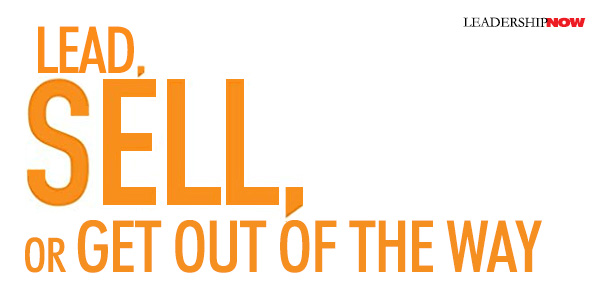

Lead, Sell, or Get Out of the Way by Ron Karr provides more evidence that leadership isn't just about a few titled people at the top. It is a choice to think differently. Leadership is a choice to think differently about anything you do. Selling is no exception and is closely linked to the functions of a leader. Leadership is not always about people we "lead" in the conventional sense, but is frequently about people we must influence. Karr writes, "Whether you sell a product, a service, or an idea, you must be able to influence other people as leaders do."
It begins with being able to and understanding the need to engage others in continuous strategic conversations as part of the normal way of doing things—a process Karr has termed Integrated Dialogue. Integrated dialogue is a conversation of shared purpose that draws people out "to create a powerful relationship, one that identifies whole new zones of mutual opportunity, addresses far-ranging issues, and positions you as an invaluable resource: a leader."
As with all leaders, salespeople too will succeed when they fully appreciate the many relationships inherent in their success. Sales leaders lead a whole cast of people in their own organizations from the customer service, tech people to accounting and senior management. In addition, they lead not only their customer or end-user but also many points of contact in their customer's organization that are likely to have some input on the buying decision like operations, accounting, purchasing, and senior management. Gone are the days where everything filters through the salesperson. "Your success as a salesperson depends on your ability to build and sustain coalitions both inside and outside your organization. You must create and lead the coalition, no matter what you are selling." This will resonate with any leader:
Your job is to manage multiple constituencies and alliances and to use those alliances to identify new and better ways of generating the desired results. Your job is to do what most salespeople don't do: lead the conversation with your prospects and customers about the results they need, the problems they have, and the obstacles they face.
To make this happen you must possess and develop the belief that you have everything you need and can build on that, the belief that you can improve any area of your life, everything is possible, preparation maximizes your potential, and your customers—the people you need to influence—come first.
After laying the groundwork, Karr defines and explains the seven traits that great sales leaders share:
- Visualize: Begin with the end in mind
- Position: First impressions lay the foundation for the entire relationship
- Build Alliances: They reach out; sales leaders leverage their influence
- Ask Good Questions: Sales leaders ask powerful questions that uncover opportunities to enhance customer outcomes and results
- Create Powerful Value Propositions: They create and deliver a powerful value proposition based on a simple formula that is based on both tangible and intangible incentives that motivate buyers to take action
- Communicate Persuasively: They inspire action in others by delivering messages that are congruent with the larger purpose
- Hold Themselves Accountable: Personal accountability matters. People are accountable to other people—not organizations
Karr demonstrates how to move from task-oriented selling (which is what most salespeople do) to purpose-oriented selling. These principles are worth bearing in mind on a personal development level as well. Karr encourages, "The bottom line is that you have the ability to increase your sphere of influence and sales just by the way you act toward those you are trying to influence." Change your conversations, change your outcomes. Leaders in any field will find much here to assimilate into their daily activities. Read it and grow.
![]()
![]() Like us on Instagram and Facebook for additional leadership and personal development ideas.
Like us on Instagram and Facebook for additional leadership and personal development ideas.

![]()

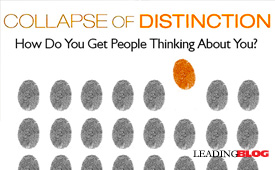
Posted by Michael McKinney at 11:15 AM
Permalink | Comments (0) | Communication , General Business , Marketing , Personal Development , Teamwork
06.04.09

Are You Dealing With Insecurity?
We all harbor some insecurity; even if it's just trying to hide the fact that we do. But it is not something we can ignore. Too much insecurity can cripple our leadership and anyone we lead.
In Building Your Leadership Resume, president of the Southern Baptist Convention and pastor Johnny Hunt outlines nine characteristics of an insecure leader:
• An insecure leader has a hard time giving credit to others. "Why should praise seem like an unrecoverable cost? It is a gift that gives back to everyone."
• An insecure leader keeps information from his staff. "When you release information, you convey trust and confidence to others. When you conceal it, you convey just the opposite: no trust, no confidence."
• An insecure leader doesn't want his staff exposed to other leaders—people who may possess qualities you don't, people who may have skills your staff wishes you had. "When one person grows the whole team grows….Give your people the best—even better than you are."
• An insecure leader is often a micromanager. "He's a control freak." Nothing can happen that they are not fully aware of. They fear things will fall apart without them. This kind of oppressive control can wring the life out of your team.
• Insecure leaders are too needy of praise. "For this reason, more than perhaps any other, they can't really be leaders. When someone needs his followers to always be telling him how wonderful he is, he works in direct opposition to the heartbeat of leadership, which is: building into other's lives."
• Insecure leaders don't provide security for those they lead. "If the mood and environment in the office is one of fear, second-guessing, and self-doubt, you can be sure an insecure leader is in charge."
• Insecure leaders take more than they give. Instead of validating and encouraging others, they are focused on receiving it.
• Insecure leaders limit their best leaders. "Insecure leaders cannot genuinely celebrate the victories won by others."
• Insecure leaders limit their organization. "Not only does insecurity throttle down the horsepower of individual team members; it results in putting restraints on the whole church or organization."
Posted by Michael McKinney at 09:37 AM
Permalink | Comments (0) | Personal Development , Teamwork
05.15.09

Confusing Principles and Approaches
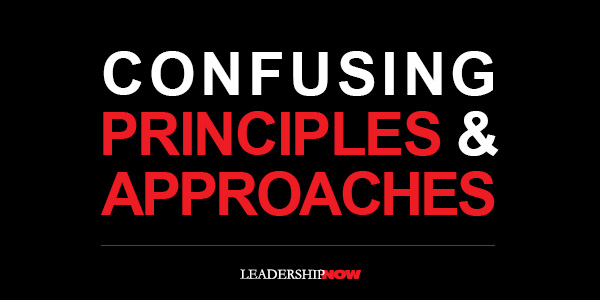
IN How the Mighty Fall, Jim Collins makes a case for why the fall of previously great companies does not negate prior research:
The principles in Good to Great were derived primarily from studying specific periods in history when the good-to-great companies showed a substantial transformation into an era of superior performance that lasted fifteen years. The research did not attempt to predict which companies would remain great after their fifteen-year run. Indeed, as this work shows, even the mightiest of companies can self-destruct.
Of course, the same is true of the classic by Tom Peters and Bob Waterman, In Search of Excellence. The failure or declining performance of some people and organizations does not negate the basic message. It is part of being human to get ourselves off-course—even when we know better. The failure of the exemplary companies to maintain their hold on greatness or excellence does, however, hold an important lesson for us. It's all too easy to move away from our core values. They are always under fire and it takes courage to hold the course. Everything we do has to be continually reviewed and realigned to our core values.
As you know, knowing the right thing to do and doing it are two different issues. More to the point, doing the right thing once and doing it consistently over time in the face of circumstances that would derail us, is a matter of character.
We depart from our core values over time for all kinds of reasons. Doing the right thing doesn't always give us an immediate payoff in the way we typically gauge success. Doing the right thing is often its own reward. In time, life happens to us and changes our thinking and encourages compromise. Comparing ourselves to others creates doubt. Cynicism is always at the door demanding a hearing and makes sense in a world that rarely works according to plan; a world that is seemingly more irrational than rational. Life changes our friends and they influence us too. All of these circumstances conspire to make us grow or self-destruct. It's a choice we make every day.
This leads us to a cautionary note. In the search for timeless and universal principles that can be applied in any organization, you will frequently find confusion between principles and approaches. Principles are timeless and universal, but approaches are not. Humility is a timeless and universal principle. The Hedgehog Concept is an approach and therefore is not timeless or universal. The approach has been around since recorded time, but is contextual. It will work in some situations and not in others. Approaches change. Principles do not. Principles speak to matters of thinking and behavior that go beyond the moment and to a higher purpose. Approaches are tools. Principles give us meaning. It's best not to confuse the two.
![]()
![]() Like us on Instagram and Facebook for additional leadership and personal development ideas.
Like us on Instagram and Facebook for additional leadership and personal development ideas.
![]()


Posted by Michael McKinney at 09:02 AM
Permalink | Comments (0) | TrackBacks (3) | Personal Development , Thinking
05.05.09

The Four Roles of Mentors
In The Element: How Finding Your Passion Changes Everything, Ken Robinson writes that mentors serve us in one or all of the following ways:
Recognition. "I don't know of any test or software program that can make the kinds of subtle, personal distinctions that differentiate an interest from a burning passion. A mentor who has already found the Element in a particular discipline can do precisely that. Mentors recognize the spark of interest or delight and can help an individual drill down to the specific components of the discipline that match that individual's capacity and passion."
Encouragement. "Mentors lead us to believe that we can achieve something that seemed improbable or impossible to us before we meant them."
Facilitating. "Mentors can help lead us toward our Element by offering us advice and techniques, paving the way for us, and even allowing us to falter a bit while standing by to help us recover and learn from our mistakes."
Stretching. "Effective mentors push us past what we see as our limits. Much as they don't allow us to succumb to self-doubt, the also prevent us from doing less with our lives than we can."
Posted by Michael McKinney at 09:49 AM
Permalink | Comments (0) | Personal Development
05.04.09

Find Your Tribe. Find Your Passion.
Ken Robinson calls the place where the things we love to do and the things we are good at come together, the Element. Illustrated by stories, many based on exclusive interviews, of celebrities, entrepreneurs, scientists, and other highly accomplished people who have found the Element, Robinson's book The Element: How Finding Your Passion Changes Everything is an engaging and motivating resource.
Connecting with people who share our same passions and commitment helps in developing our Element. This is our tribe. "Often we need other people to help us recognize our real talents. Often we can help other people to discover theirs."
Robinson says that for many people, finding your tribe is essential in helping you to find your Element. "Finding your tribe can have transformative effects on your sense of identity and purpose. This is because of three powerful tribal dynamics: validation, inspiration, and what we'll call here the 'alchemy of synergy.'"
Validation: It's not just me. Although you may be most in your element when you are working alone, "there's a tacit awareness of a field – the other writers, other painters, other mathematicians, other players, who enrich the domain and challenge their sense of possibility." Physicist John wheeler said, "If you don't kick things around with people, you are out of it. Nobody, I always say, can be anybody without somebody being around."
Inspiration: How do they do that? "Members of a passionate community tend to drive each other to explore the real extent of their talents…. Tribes are circles of influence, and they can take many forms…. When tribes gather in the same place, the opportunities for mutual inspiration can become intense."
Alchemy of synergy: The power of tribes is exemplified in the synergy created when groups of people with similar interests come together and create something much greater than any one of them could create individually. Robinson attributes this to the fact that creative teams are diverse, dynamic and distinct or purposeful.
Robinson says that tribe membership "helps people become more themselves, leading them toward a greater sense of personal identity."
Finding your Element is not always easy. Fear is the most common obstacle standing between you and your passion. "These fears include the fear of failure, the fear of not being good enough, the fear of being found wanting, the fear of disapproval, the fear of poverty, and the fear of the unknown. You may also find that your background has never given you the opportunity to discover or explore your Element in the first place. You also have to face the impact of the image and expectations that other have of you have of you that put pressure on you to pursue a different path.
If you are looking to find or develop your passion – your Element – Robinson's book is a carefully reasoned and practical guide to help you find the best in you. At the very least, it will make you think differently about yourself.
Posted by Michael McKinney at 11:26 PM
Permalink | Comments (0) | Personal Development
04.28.09

Three Good Habits For Life and Investing From Jim Rogers
Investor Jim Rogers has collected his advice for success in life in A Gift to My Children: A Fathers' Lesson for Life and Investing. Using examples from his life, this inspiring book makes a good quick read for anyone. Here is a good example from a chapter that offers three good habits for life and investing:
Be a Self-Starter. When Rogers was young he got a job with Mr. Booker, a local home builder. "At first, I couldn't even hammer a nail straight, and the men on the job weren't shy about pointing this out. But when we were awaiting deliveries of building materials or had nothing to do, I'd gather up the scrap lumber or sweep up the sawdust or whatever else I could find. 'Say what you want,' the contractor told them, 'but this kid never stops. He has the right attitude, he has the proper approach, and I want him working for me.' Eventually I did learn to drive nails as quickly as anyone, dig foundations, install roofs, and all the other skills necessary to do the job. If it weren't for my work ethic, I might never have gotten the chance."
Attention To Details Is What Separates Success From Failure. "In investing, as in life, the small details often spell the difference between success and failure. So you must be attentive! However trivial it may seem, you must research and check each and every piece of information you need to make a decision. Leave no questions or nagging feelings of uncertainty uninvestigated. The most common reason why people do not succeed is that their research is faulty or limited to the confines of what is immediately available. Only through meticulous research will you obtain the knowledge necessary for success. It requires abundant work and diligence, but the effort will give you a distinct advantage over your competitors."
Live Your Life With a Dream. "When you begin something, you may not always have a concrete picture or vision of he future. But if you continue to be passionate and work hard at what you truly love to do, then you will eventually find that dream. Which may morph into yet another dream. And another."
Posted by Michael McKinney at 04:03 PM
Permalink | Comments (0) | Personal Development
04.07.09

Are You a Perfectionist or an Optimalist?
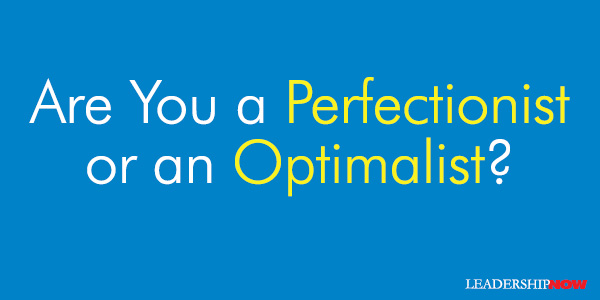
BEING happy or being perfect. You can have one, but you can't have the other. The happy life is attainable, but the perfect life isn't. In fact, trying to be perfect gets in the way of being happy (and productive). Imperfection is a by-product of being human.
Perfectionism – the maladaptive and neurotic belief that you and/or your environment must be perfect and that work or output that is anything less than perfect is unacceptable – is not something that you are born with. It is developed. Contrary to the goal they seek, perfectionists are focused on failure.

There's a difference between setting high standards that spur us on and seeking perfection that demoralizes us. In The Pursuit of Perfect, author Tal Ben-Shahar refers to the two approaches as perfectionism and optimalism . Most of us are a little of both. "We may be Optimalists in some areas of our lives and Perfectionists in others. For example, we may be quite forgiving of mistakes we or others make on the job but be thrown into despair when our expectations are not fully met in our relationships." Consider these statements:
The key difference between the Perfectionist and the Optimalist is that the former essentially rejects reality while the latter accepts it.While the Perfectionist rejects failure , the Optimalist accepts it as a natural part of life and as an experience that is inextricably linked to success.
The Perfectionist believes that a happy life comprises an uninterrupted stream of positive emotions. And because he, of course, aspires to be happy, he rejects painful emotions …. The Optimalist, on the other hand, accepts that painful emotions are an inevitable part of being alive.
The perfectionist is never satisfied. She consistently sets goals and standards that are for all intents and purposes impossible to meet, thereby from the outset rejecting the possibility of success …. The Optimalist also sets extremely high standards, but her standards are attainable because they are grounded in reality. When she meets her goals, she appreciates her successes and takes time to experience gratitude for her accomplishments.
Perfectionist reject reality and replace it with a fantasy world – a world in which there is no failure and no painful emotions and in which their standards for success, no matter how unrealistic, can actually be met. Optimalists accept reality – they accept that in the real world some failure and sorrow is inevitable and that success has to be measured against standards that are actually attainable.

Ben-Shahar discusses these ideas in detail and then shows how they apply to and play out in education, the workplace, and in relationships. He offers exercise and meditation to help you reorient your thinking and move from perfectionist thinking to optimalist thinking.
It's easy to see from his approach and the advice given in this book, why his Harvard course in "Positive Psychology," is the most popular class in the university's history. Read it. I'm certain you'll benefit.
![]() How do you know if you're a perfectionist? Psychology Today offers a self-test on their web site.
How do you know if you're a perfectionist? Psychology Today offers a self-test on their web site.
![]()
![]() Like us on Instagram and Facebook for additional leadership and personal development ideas.
Like us on Instagram and Facebook for additional leadership and personal development ideas.

![]()
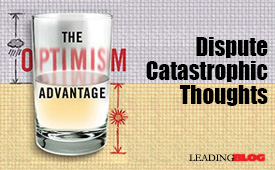

Posted by Michael McKinney at 09:33 AM
Permalink | Comments (0) | Personal Development , Positive Leadership
04.02.09

10 Survival Tips from Donald Trump
What's happened to the economy has been likened to a tsunami as well as an implosion. When the undersea earthquake and subsequent tsunami hit in Indonesia in 2004, the world was stunned by the devastation that took place. It triggered earthquakes around the globe as far away as Alaska. It happened in a very short amount of time. This kind of event takes shape over a period of time and then erupts with incredible force. What happened this past year is similar in that respect -- it'd been brewing for some time. When it hit, it was like a tsunami which caused other economies to start crumbling as well. We are all familiar with that scenario. What we need to do now is deal with it.
The aftermath of a tsunami requires surveying the damage, picking up the pieces and moving on. Some people have bigger losses than others, but everyone has to keep going.
When it comes to implosion, it's more of a cave-in than a wipe-out, but equally potent. We saw the effects of an implosion watching the towers fall on 9/11. It's a domino effect. We won't sink because we can swim, but let's not go the way of dominos. Let's be smart and learn to think for ourselves in positioning ourselves for what comes next. Here are a few survival tips:
- Pay attention to national and international news and finance coverage at least several times a day, preferably hourly. In volatile times, vigilance is necessary.
- Absorb, assess, and then act. Knowledge without action is impotence.
- When a tsunami hits, there's no time for procrastination. Keep your momentum in tune with the times.
- Avoid your comfort zone -- it's probably outdated anyway.
- If you're honest, you should know the questions that should be asked, as well as the answers. That's probably why there's so much confusion out there today.
- Remember The Blitz. That can put things into perspective. Things may be tough and getting tougher, but we're not being bombed day in and day out either. If you don't know what The Blitz is, use your time wisely to study WWII to find out.
- Is your life half empty or half full? Half is better than zip. Count your blessings.
- Realize that fear is the exact opposite of faith.
- Resolve to be bigger than your problems. Who's the boss?
- Don't negate your own power. Whatever you've been dealt, know you can deal with it.
Posted by Michael McKinney at 01:12 AM
Permalink | Comments (0) | General Business , Personal Development , Problem Solving

Think Like a Champion: Lessons From Donald Trump
Donald Trump enjoys teaching. He sees it as another side of his nature and is devoting more time to it as evidenced by his many books and Trump University.
Think Like a Champion : An Informal Education In Business and Life is a collection of short essays that illuminate Trump's thinking and approach to business and life. He is reflective and as usual, candid.
What keeps Trump relevant is his passion for learning. He writes, "It's important to remain open to new ideas and new information. Being a know-it-all is like shutting the door to great discoveries and opportunities. Keep your door open every day to something new and energizing." It's a theme he weaves throughout this book. Here are several lessons from Trump's Think Like a Champion:
We don't really create, but we assemble what has been created for us. Be a great assembler—no matter what your interests may be—and you'll be on your way to inventiveness.Considering the availability of news, blind spots can't really be rationalized anymore, no matter where you might be living. Information is available to everyone, and if you aren't plugging into it, it will eventually work against you—maybe on your first interview. Don't learn this the hard way.
Do not allow fear to settle into place in any part of your life. It is a defeating attitude and a negative emotion. Recognize and zap it immediately. Replace it with a problem-solving attitude, faith in yourself, and hard work.
Momentum is something you have to work at to maintain. Find your own current and then go with it! Don't allow for distractions. Do everything you can to maintain your energy flow. Watch out for streaks of momentum that you can't sustain—keep your equilibrium in all things, even in your energy output.
I always ask myself, "Is this a blip, or a catastrophe?"—it gives me a point of reason in the midst of bad news. Your problems can be temporary if you keep your momentum moving forward. We all experience difficulties, but they can be blips if you remain positive and move on.
Posted by Michael McKinney at 01:03 AM
Permalink | Comments (0) | General Business , Personal Development
03.30.09

Emotional Intelligence – How To Get It
Corporate psychologist Martyn Newman says that "being intelligent about your emotions is critical to your success as a leader. If leadership is ultimately the art of accomplishing extraordinary things through ordinary people, then building emotional capital is how you achieve it."
Competence will only get you so far. You need emotional intelligence to implement your ideas. In his book Emotional Capitalists, he writes that today's leaders must focus on emotional capital. That is, "the energy, the enthusiasm and commitment in the hearts of everyone connected with the business."
The idea of emotional intelligence was popularized by Daniel Goleman and it is given form in this EI toolkit. Newman offers practical guidance to how it is developed and applied.
He categorizes the emotional intelligence of effective leaders into five broad components: Self-awareness, Self-management, Social awareness, Social skills and Adaptability. These are skills that can be developed by anyone motivated to do so. There are ten competencies associated with these components, but there are seven that he has isolated that he has found to absolutely essential for leaders to focus on. They are:
Self-Reliance: "Being self-reliant does not mean that you just go out and do your own thing. It means being secure enough in yourself to turn to others and take into account different points of view while regarding yourself as finally responsible for working out what has to be said or done."
Assertiveness: It's not about being aggressive or passive but it's about "being able to communicate your message honestly and directly, while respecting the fact that others may hold a different opinion or expectation." It requires clear communications and self-control.
Optimism: "Individuals and organizations who view their setbacks in the context of progress are much more likely to continue in their efforts towards success."
Self-Actualization: This is the power behind sustained high performance. Passion. "Passion is an emotional competency you can develop by focusing your attention on your discontent – what you are unhappy with or what you'd like to do better – and then cultivating a vision of how things could be different."
Self-Confidence: "Solid self-confidence is important because it is the platform that supports your ability to respond actively and positively to value-creating opportunities." Building self-confidence is the starting point for unlocking the potential of yourself and others.
Relationship Skills: "Why would you want to perform at your best when you don't feel leadership is genuinely interested in you as a person?"
Empathy: It is about "demonstrating that you can see the world from another person's point of view."
Newman shows how you can develop each of these competencies and how you can deal with some of the toxic behaviors and thinking that you may have acquired over the years. It is a very helpful book that also offers readers an opportunity to take the Emotional Capital Inventory to measure your personal level of emotional capital. Check it out!
While we are on the topic, Jossey-Bass released in paperback two essential volumes on social skills and common sense: Social Intelligence: The New Science of Success and Practical Intelligence: The Art and Science of Common Sense. Management consultant Karl Albrecht deftly illuminates these topics with such great stories, examples and humor that you will find them not just a great read but you will quickly identify with the ideas he is presenting with your own experiences. The insights contained in these books are immediately applicable in your relationships on and off the playing field.
Posted by Michael McKinney at 11:30 PM
Permalink | Comments (0) | Personal Development
03.09.09

Strategic Presence: The Power that Fuels Leadership
Tony Jeary, author of Strategic Acceleration: Succeed at the Speed of Life, is a coach to some of the world's top CEOs. In his book he brings together practical ideas to help you get out of your own way. A critical aspect of getting things done through others is presence – your presence. To influence others you need to know how they perceive you and adjust your communication with them accordingly. Here, Tony discusses what he calls strategic presence:
The goal of leadership is to produce superior results on purpose and that makes leadership a results contest. The challenge of leadership is to persuade and motivate those they lead to produce the results they want. When people voluntarily and enthusiastically do what their leaders ask them to do and the desired results are achieved, leaders are considered to be effective and successful! The question is how do leaders really get others to voluntarily and enthusiastically produce the desired results? There are many parts to this puzzle, but there is none greater than a condition I describe as Strategic Presence.
Here is a great story that illustrates Strategic Presence and also illuminates its effect. A student from a foreign country was enrolled in the middle of a school year. During the first day of class, the other kids in the class were doing what kids do. There was a lot of giggling and staring and posturing for the new arrival. The new student was dressed in a way that did not meet the expectations of a few of the other children and eventually one of them (the class clown) began to make jokes about the new student's appearance.
As the scene was progressing toward chaos, the teacher was about to intervene when a girl stood up and told everyone to stop picking on their new classmate. The girl reminded them that it was scary to be new in a school and they needed to be kind to the student and make them feel welcome She reminded them they should treat this new person as they would want to be treated if they were in a new country and a new school. After class, the teacher called the girl aside and said, "That was a very brave thing you did. Why did you do that?" The girl replied, "Because that is what my Mom and Dad would expect me to do!"
This story powerfully illustrates the essence and the effect of what I call Strategic Presence . The girl had merely done what she knew her parents would want her to do. Her parents had succeeded in creating a positive presence in her mind, which gave her the willingness and courage to do what she did. Most importantly, the presence of her parents was so authentic that they did not have to be physically present to inspire their daughter's good behavior.
Leaders create impressions that exist in the mind of every person they lead. It is a presence that defines the perceptions people have of their leaders and what they believe about them. It is this overall persona that I am referring to when I use the term Strategic Presence and there are two types: Positive and Negative. Leaders are constantly creating and presenting images of influence that produce both.
The most important fact about Strategic Presence is that it produces two possible reactions in others. It either produces voluntary cooperation or it produces various forms of resistance. If leaders generate positive Strategic Presence, people will be more likely to support what they want, most of the time. However, if perceptions of leadership are negative people will substitute resistance for cooperation. The possibilities of how people will respond to Strategic Presence are limited to cooperation or resistance. There is not much middle ground between them. As someone once said, "you are either for us against us!" It is easy to see why creating an authentic, positive strategic presence is critical for the execution of a vision.
Creating positive Strategic Presence is not a strategy of manipulation. The positive strategic presence leaders project must be authentic. Failing the test of authenticity means the very image leadership hopes to establish will be perceived as deceptive and disingenuous, or worse. People are very perceptive and they will see through efforts to project a phony persona for the purposes of manipulating their behavior. So, why shouldn't a leader's strategic presence just be allowed to be what it is?" That is a great question and the answer is simple. Many leaders are misunderstood and create perceptions that really don't match their intent. So, understanding how Strategic Presence is created will minimize the possibility of being misunderstood.
So, how is strategic presence is created? What are the things about leadership that speaks the loudest about it? What creates the perceptions that combine to produce Strategic Presence? There are two components that contribute to strategic presence: values and behavior.
Our values are established by what we believe to be right, wrong, true, false, acceptable, unacceptable, appropriate and inappropriate. Let's face it, we have all developed deep, strong opinions about many things as we live our lives. Our opinions spring forth from your values and your values influence what we actually do.
Our values and beliefs impact 5 categories of that drive our behavior, and it is our behavior that creates Strategic Presence. The five categories that drive behavior are:
- Work ethic
- Integrity
- Judgment
- Courage
- Willingness to help others
So, if you want to be a great leader, you need to have great values and your values must be demonstrated in the action you take. This is the essence of Strategic Presence and it is truly the power that fuels leadership.
Posted by Michael McKinney at 05:54 PM
Permalink | Comments (0) | Communication , Leadership , Motivation , Personal Development
03.04.09

Take the Greater Than Yourself Challenge

You've heard "invest yourself in others" and "pay it forward." Steve Farber has his own unique twist on these ideas and he calls it Greater Than Yourself.
The Greater Than Yourself (GTY) concept is based on the premise that great leaders become great because they cause others to be greater than they are. GTY is a one-on-one development process where you choose to help someone become more capable, competent, and accomplished than you are. It has three parts to it: Expand Yourself , Give Yourself and Replicate Yourself .
The life-long process begins with you. "You have to expand yourself before you can help make others greater." That means that you have to make sure that everything that is you is constantly expanding. No matter how much you think you know or are, "you can always learn more, you can always experience more, you can always connect more and love more." The point of which is to give it all away.
Giving it all away always brings out the cynics. But Farber deals with that too. Giving it all away seems to imply subtraction – like a zero-sum-game – to many people. But it's not. Giving it all away really adds to who you are. Parents get it, but when we get outside that relationship, an improper self-interest kicks in and we miss the bigger picture.
In this business fable set along the California coast, Faber skillfully explains the true nature of giving it all away to become a creator of masters . GTY has life-changing possibilities if you commit to it. Expanding yourself "is a practice that should become part of your life. Integrate it into your thought process and into the way you make decisions. Will X add to your inventory? Will it expand an item that is already there? If so, do it; if not, don't."
When you think of giving of yourself, money may not be part of it. You have other resources like "your talent, your knowledge, your connections, your confidence, your trust" and last but not least, "your time."
In the end, you want to replicate yourself. That is, you want to make sure that the people you elevate are doing the same for others.
In an organizational context, it might look like this: "Everyone on my team and in our company should become significantly greater as a result of working with one another." But, "I'm not trying to hire people who are more talented than me, I'm trying to hire people with heart, desire, drive, and mad potential, and then encourage all of them to bring out the best in one another by giving fully to one another. See the difference?"
Farber admits that this isn't easy to do initially. In response, he challenges us to pick just one person to make a GTY project. "Raise that person; boost him or her above yourself. Start there and see what happens."
He has created a web site with examples and resources to get you going. In particular, there is a four minute video of a GTY project conducted by the Up With People organization, that is a good overview of what this is all about and the impact it can have. The participants in this GTY project don't rule out that great things can come in small packages. The tendency is to pick someone who is already doing well and then working to make them greater; jump on their bandwagon so to speak. There's certainly nothing wrong in that, but perhaps the most impact can come from taking someone who really needs a leg up and connecting them to what they need.
Take the Greater Than Yourself Challenge . Pick one person and give of yourself to make their life better—than yours!
u > i
![]()
![]() Like us on Instagram and Facebook for additional leadership and personal development ideas.
Like us on Instagram and Facebook for additional leadership and personal development ideas.

Posted by Michael McKinney at 04:23 PM
Permalink | Comments (0) | TrackBacks (1) | Human Resources , Personal Development , Positive Leadership
02.23.09

Procrastination: THE Results Killer!
Tony Jeary is a coach to the world's top CEOs and high achievers and is the author of a very practical book, Strategic Acceleration: Succeed at the Speed of Life. When we look at the work before us, it's easy to procrastinate. Jeary suggest we are focusing on the wrong thing. "To avoid procrastination and get faster results," he writes, "focus on starting instead of finishing, then adjust as you go." He offers this helpful outlook on procrastination:
Anyone interested in getting better results, becoming more productive and ultimately more successful should probably take an honest look at the problem of procrastination. Most people think procrastination is just an issue that involves putting things off that can be done later without much of a penalty. That idea just scratches the surface of the procrastination issue and is indicative of the denial people have about it. Truthfully, procrastination is like an addiction because it is the symptom of a thinking problem and like any other addiction, its difficult to break! The reality is this: Nothing marginalizes results more than procrastination because being productive and getting superior results is about completing tasks and projects in reduced time frames.
Obviously, if you can get more work done in less time, you will see results much faster. We are all guilty of procrastination to some extent, and there are two kinds:
- Positive Procrastination. This is when you legitimately need some "mental percolation" time to gather your thoughts and get clear on what you need to do.
- Negative Procrastination. This is based on some pretty flimsy excuses to avoid doing something, which will ultimately affect your results in negative ways.
Whereas Positive Procrastination can be beneficial, Negative Procrastination is something you need to overcome in order to be more effective and finish things faster. You can't produce results until you start doing something. If you do nothing, that is exactly what you will get -- nothing!
If you want to accelerate results, there is no room in your life or your business for Negative Procrastination. Show me a person who consistently gets less than stellar results, and I'll show you a person who procrastinates. However, they probably won't think of themselves as procrastinators because they have lots of seemingly good reasons for not doing things TODAY.
You may find some of the following statements familiar. You have probably either heard them from other people, or you may have even believed one or more of them yourself. If you feel a personal kinship with these statements, I suggest that you give serious thought to the possibility that there might be a touch of procrastination in your own life. Consider the following statements:
- "I can do it tomorrow." This may be the most popular and frequently used justification for procrastination. The reason it's so popular is because tomorrow sounds so close to today. Waiting until tomorrow just doesn't seem like that big a deal. Just waiting one more day won't upset too many people, and there are surely many good reasons that can be created to justify the delay.
- "I don't have everything I need, so I'll wait." This is a very popular statement used to justify inaction and waiting. It is most often an excuse that salespeople use to avoid making telephone calls to prospects. The truth is that you can always take some kind of action, regardless of the list of the things you think you need before you can start. All you have to do is be honest about it and look for what is possible to do today. Do not wait until you have everything you think you need before you start doing things.
- "I can't do it perfectly, so I'll wait." This excuse doesn't make much sense if you ask yourself the question: Can we ever do anything perfectly? I think not. How do you feel about this statement? Do you feel as though you have to be able to perform perfectly before you can be willing to act? If you do have this attitude, you are in serious trouble, because you will NEVER be able to do anything perfectly.
- "I don't have time right now." Why and how do we get the idea that we have to be able to finish something before we can work on it? Let me use a book-writing example to show you what I mean by this. A non-fiction book is a collection of chapters. Each chapter is a collection of ideas about a specific topic. Each idea may have many sub-points. When I begin a book project, how many books would I complete if I believed I had to finish the entire book in one, continuous work session? The answer is that I would never complete any book project if I believed this was necessary. The correct approach is to do what you can, when you can!
- "Someone else can do it better." This excuse is a silent one that people make to themselves privately. Some authors and psychologists say that procrastination is rooted in the fear of success. I'm not a psychologist, but I think it's more likely people fear failure more than they fear success. Let's face it -- people don't want to look bad, and they are hesitant to put themselves in position where they might fail. Procrastination is a tool that many people use because they falsely believe it will save them from failure. The truth is that procrastination usually guarantees failure.
Procrastination may be many things, but mostly it's a bad habit. Someone once said, "Repetition strengthens and confirms." Simply put, this means that the more you do something, the easier it gets! I believe people learn how to procrastinate over a long period of time, and the more they do it, the easier it becomes. So, if you want better results and greater success, take a look at the issue of procrastination in your life. Sit down today and make a list of all the things you need to do that you have not completed. How many are the result of procrastination? You might be surprised.
Posted by Michael McKinney at 09:34 AM
Permalink | Comments (0) | TrackBacks (1) | Personal Development
01.08.09

One More Time: Resilience is Key
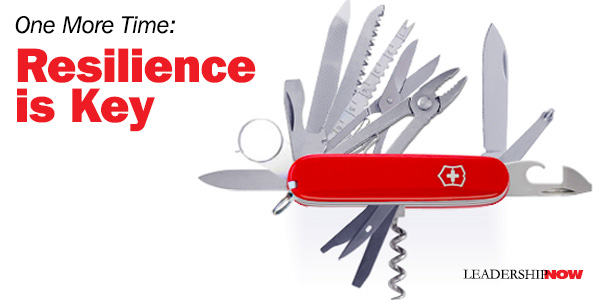
IN The Knack, a book for entrepreneurs, Norm Broadsky and Bo Burlingham respond to the question, "What does it take to be a successful entrepreneur?" The most important quality is resilience. "I'm talking about the ability to bounce back from failure, to turn around a bad situation, to profit from your mistakes. They continue:
That's because everybody makes mistakes, plenty of them. What's more, we keep making them as long as we're in business. Sure, we like to think we'll eventually get so smart we won't make mistakes anymore. Forget about it. You'll never stop making mistakes. Hopefully, the new ones won't be the same as the old ones, but they'll be equally painful. They'll bug you just as much. They'll make you just as mad. As upset as you get, however, it's important to bear in mind that failure is still the best teacher around. You'll do fine as long as you're open to the lessons it's trying to teach you.
And a concluding thought from an article in the New York Times, Innovation Should Mean More Jobs, Not Less. Geoffrey A. Moore, author of Dealing with Darwin, comments:
"America is probably the best culture in the world at failing," he said. "We're willing to navigate in a fog and keep moving forward. Our competitive advantage tends to be at the fuzzy front end of things when you're still finding your way. Once the way has been found, we're back at a disadvantage."
![]()
![]() Like us on Instagram and Facebook for additional leadership and personal development ideas.
Like us on Instagram and Facebook for additional leadership and personal development ideas.

![]()
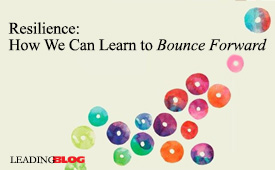
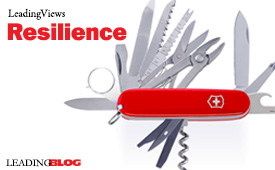
Posted by Michael McKinney at 12:29 AM
Permalink | Comments (0) | Entrepreneurship , Personal Development
01.06.09

Strengths Based Leadership
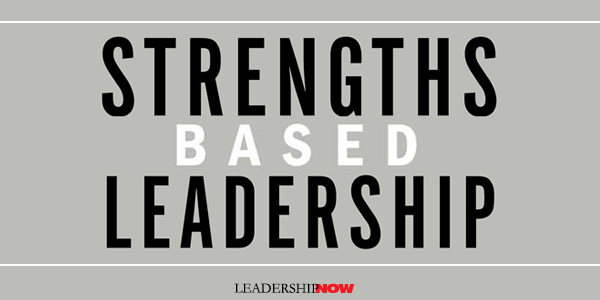
THE FACT IS, many leaders do not really know their strengths. Not only does this lack of self-awareness bring about unintended consequences to one's behavior, but also it can lead to disengaged employees and undue stress in the workplace and beyond. Donald Clifton remarked:
What great leaders have in common is that each truly knows his or her strengths – and can call on the right strength at the right time. This explains why there is no definitive list of characteristics that describes all leaders.

In Strengths Based Leadership, authors Tom Rath and Barry Conchie present a new leadership version of Gallup's StrengthsFinder assessment. (An access code is included with the book so you can take the new assessment online.) The assessment is design to help you see how your top five strengths fit into their newly identified four domains of leadership strengths: Executing strengths, Influencing Strengths, Relationship Building strengths, and Strategic Thinking strengths. You will find that this knowledge is useful in creating well-rounded teams. As they note, "Although individuals need not be well-rounded, teams should be."
Unique to this book is a study of 10,000 followers. When they asked them why they followed, four basic wants and needs emerged: trust, compassion, stability and hope. Once you have identified your strengths, they will give you specific suggestions for meeting those needs.
The idea of strengths-based leadership is not to ignore your weaknesses as some have mistakenly misunderstood. But the emphasis for any leader should be a deep understanding of what they bring to the table and not trying to be something they are not. Rath and Conchie write:
The most effective leaders know better than to try to be someone they are not. Whenever they spot an opportunity, they reinvest in their strengths…. Leaders stay true to who they are – and then make sure they have the right people around them. Those who surround themselves with similar personalities will always be at a disadvantage in the long run to those who are secure enough in themselves to enlist partners with complementary strengths.
![]()
![]() Like us on Instagram and Facebook for additional leadership and personal development ideas.
Like us on Instagram and Facebook for additional leadership and personal development ideas.

![]()

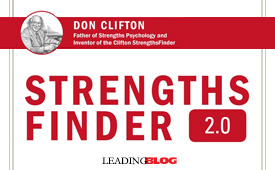
Posted by Michael McKinney at 11:46 PM
Permalink | Comments (0) | Personal Development , Teamwork
12.29.08

When Rooted In Hard Work and Experience, Resilience Is Better Than Any Crystal Ball
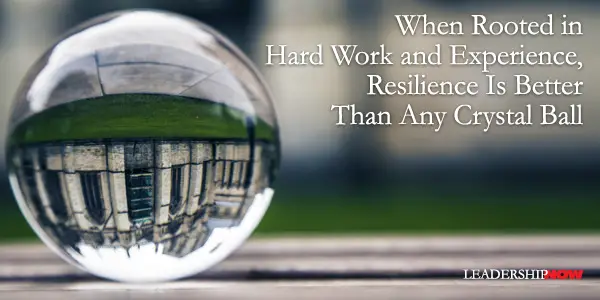
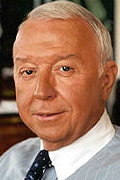
IN separating Booz Allen Hamilton into two companies this year, Chairman & Chief Executive Officer Ralph W. Shrader gained a valuable lesson and has presented us with an interesting perspective in a speech he delivered earlier this year. He states, "I'm absolutely convinced that separating our firm was inevitable—and that it was the right thing for our institution, our clients, and our people. But, I certainly never envisioned this path when I became Chairman & CEO in 1999 or when I joined Booz Allen 35 years ago." The following remarks are edited from this speech.
There's a well-worn saying that "I wish I knew then, what I know now." But, I beg to differ. I'm glad I didn't know then that we would end up taking this path. That's a key lesson that this experience crystallized for me.The lesson is this: Don't tell me the future. I've learned, unquestionably, that resilience—not prophecy—is the greatest gift. Now, that idea runs counter to human nature and desire. Seeking to know the future has been man's eternal quest—from ancient mythology to the 21st century (and into the 24th century if judged by Star Trek episodes).
Astrology aside, modern forecasting techniques are widely employed in science and business. Clearly, it can save lives and fortunes to be able to predict weather patterns, epidemics, and financial markets. (No question, we have a long way to go in telling the future of financial markets!) But, it's important to recognize the limits of even the most sophisticated models and forecasting methods—and to rely on them as tools, not oracles.
I'm convinced that prophecy would be a curse, not a gift, in our most important human endeavors, from corporate strategy to national destiny to personal relationships.
I firmly believe knowing the future could severely limit our vision, passion, and potential. It could cause us to take things for granted… or to give up hope. Much more than prophecy, resilience—the ability to rise to the occasion and opportunity, whatever the future may bring—is the far greater gift. And, it's also a gift we can reasonably attain.
Resilience is optimistic opportunism. Its power can be seen in the prescient observation that "Things turn out the best for those who make the best of the way things turn out." Think about that: "Things turn out the best for those who make the best of the way things turn out."
When rooted in hard work and experience, resilience is better than any crystal ball. I think—I hope—we're coming to understand that we don't need to know the future. We can be confident that our performance and resilience will enable us to succeed and control our destiny.
And, that's the thought I'd like to leave you with: While we can't know our destiny (and I've come to believe we shouldn't want to), we do have a large measure of control over our destiny, as individuals and as institutions. What gives us this control? Hard work, experience, and resilience.
There's no question that hard work, focused on a goal, is never wasted—even if the destination changes. The experience, expertise, and discipline we gain is invaluable and will lead to success, as long as we have the resilience—the optimistic opportunism—to sense the winds of change and go with them.
There's a Japanese proverb that says, "Even the fortune-tellers do not know their own destiny." I'm convinced we have more control over our destiny by not knowing it—as long as we strive for excellence and have the resilience to make the best of the way things turn out.
![]()
![]() Like us on Instagram and Facebook for additional leadership and personal development ideas.
Like us on Instagram and Facebook for additional leadership and personal development ideas.
![]()
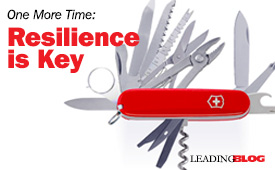

Posted by Michael McKinney at 11:57 AM
Permalink | Comments (0) | Personal Development
12.08.08

John Bogle on What is Enough
We are about to begin a new year that is bursting with faith in hope. Whether that faith is justified remains to be seen. Yet you would be handicapping yourself if you did not read and reflect on John Bogle's tour de force, Enough: True Measures of Money, Business and Life.
The book is a result of a fair amount of reflection by Bogle himself. He offers a critique of American society today and asks what is or should be "enough" in money, in business, and in life. It is a book about character. He writes that "not knowing what enough is subverts our professional values" and leads us astray in life in general. "We too often bow down at the altar of the transitory and finally meaningless and fail to cherish what is beyond calculation, indeed eternal." Not having grasped the concept of enough, we have seen the "subversion of our character and values."
We live in a time that values achievement over character. When the two collide, character often takes a back seat and relationships of all kinds are shattered. Bogle observes that while the financial represents the worst of it, what we see today is not just a financial sector problem, but a societal problem. There is really just too much greed everywhere.
He laments that we rely on numbers to give us facts that are really not facts:
As I have earlier noted, the most important things in life and in business can't be measured. The trite bromide "If you can measure it, you can manage it" has been a hindrance in the building a great real-world organization, just as it has been a hindrance in evaluating the real-world economy. It is character, not numbers, that make the world go 'round. How can we possibly measure the qualities of human existence that give our lives and careers meaning? How about grace, kindness, and integrity? What value do we put on passion, devotion, and trust? How much do cheerfulness, the lilt of a human voice, and a touch of pride add to our lives? Tell me, please, if you can, how to value friendship, cooperation, dedication, and spirit. Categorically, the firm that ignores the intangible qualities that the human beings who are our colleagues bring to their careers will never build a great workforce or a great organization.
Enough is really about discovering what is really important in our lives. While Bogel is optimistic, he says that he has "developed a profound concern that our society is moving in the wrong direction." The only way to work our way through today's deep-seated problems is to return to values that "stem from principle, virtue and character." It's a call to redefine success in our own lives.
We have more than enough of the fool's gold of marketing and salesmanship and not enough of the real gold of trusteeship and stewardship….We focus too much on things and not enough on the intangibles that make things worthwhile; too much on success (a word I've never liked) and not enough on character, without which success is meaningless….Our society cannot and should not tolerate the substitution of moral relativism for a certain form of moral absolutism, and its debasement in the ethical standards of commerce.
Related Interest:
Fixing the Financial Crisis Once and For All
Posted by Michael McKinney at 09:57 PM
Permalink | Comments (0) | Ethics , Personal Development
12.04.08

What is the Secret of Great Performers?
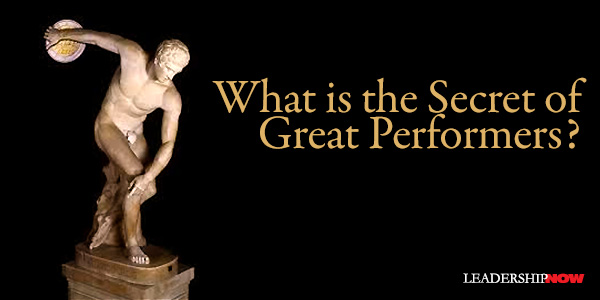
MALCOLM GLADWELL tells us in Outliers that when it comes to success, context is everything. Only by asking where a person comes from can we understand who succeeds and who doesn't. Geoff Colvin would agree but there's more. In Talent is Overrated, Colvin rightly asserts that "great performance is in our hands far more than most of us ever suspected."

When many people never become outstandingly good at what they do, no matter how many years they spend doing it, why do some people become excellent at what they do? Colvin convincingly argues that in general, it's not innate gifts or intelligence, but what researchers call deliberate practice that creates world-class performers. A study by Anders Ericsson and his associates concluded that "the differences between expert performers and normal adults reflect a life-long period of deliberate effort to improve performance in a specific domain."
Deliberate practice is not your normal practice. It contains several important elements: it's designed specifically to improve performance (usually with a teacher or coach), it can be repeated ad nauseam, feedback on results are continuously available, it's highly demanding mentally (focus and concentration), and it isn't much fun. Add passion and the good news is that great performance is not reserved for a preordained few. It is available to everyone.
Colvin's homework makes a great case for the idea that leaders are developed. What is alarming is Colvin's observation that "At most companies—as well as most educational institutions and many nonprofit organizations—the fundamentals of great performance are mainly unrecognized or ignored." He writes that organizations that apply the principles of great performance follow several major rules:
- Understand that each person in the organization is not just doing a job, but is also being stretched and grown. The best organizations assign people to jobs to push them just beyond their current capabilities and build the skills that are most important. Organizations tend to assign people based on what they're already good at, not what they need to work on.
- Find ways to develop leaders within their jobs. One technique: short-term work assignments. Managers don't leave their jobs, but they take on an additional assignment outside their field of expertise.
- Encourage their leaders to be active in their communities. Community leadership roles are opportunities for employees to practice skills that will be valuable at work.
- Understand the critical roles of teachers and of feedback. At most organizations, nobody is in the role of teacher or coach. Employees aren't told which skills will be most helpful to them and certainly aren't told how to best develop them.
- Identify promising performers early. A telling indicator is how interns get others to work with them when they have absolutely no authority.
- Understand that people development works best through inspiration not authority.
- Invest significant time, money, and energy in developing people. You don't develop people on the cheap, and you don't just bolt a development program onto existing HR procedures.
- Make leadership development part of the culture. Developing leaders isn't a program, it's a way of living.
Talent is Overrated is the most readable and pragmatic book on the topic. The examples and relevant research cited are compelling and his application of great performance principles to self-development, business development, and innovation are thought-provoking.
Related Interest:
![]() Outliers: Understanding the Context of Success
Outliers: Understanding the Context of Success
![]()
![]() Like us on Instagram and Facebook for additional leadership and personal development ideas.
Like us on Instagram and Facebook for additional leadership and personal development ideas.

![]()
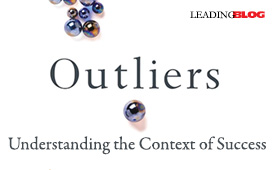
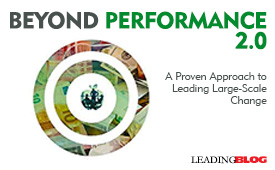
Posted by Michael McKinney at 02:29 AM
Permalink | Comments (0) | TrackBacks (1) | Education , Leadership Development , Learning , Personal Development
11.07.08

Outliers: Understanding the Context of Success
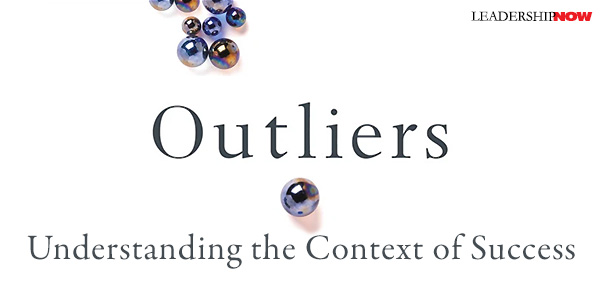
A LOT has been written of late about superior performance that often sets conventional thinking on its head. We often assume genius and success is the result of natural gifts and if you don't have it, then you don't have it. But research is demonstrating that great performance is more about what we do after we are born than we ever thought. People don't rise from nothing.

In his new book Outliers (men and women who do things out of the ordinary), Malcolm Gladwell writes:
We pretend that success is exclusively a matter of individual merit. But there's nothing in any of the histories we've looked at so far to suggest things are that simple. These are stories, instead, about people who were given a special opportunity to work really hard and seized it, and who happened to come of age at a time when that extraordinary effort was rewarded by the rest of society. Their success was not just of their own making. It was a product of the world in which they grew up.
Gladwell provides countless stories and examples of successful people—Bill Joy, Bill Gates, the Beatles, Chris Langan and others—and draws interesting connections about their success. Successful people must be considered within the context of their culture and the people that surrounded them. "The values of the world we inhabit and the people we surround ourselves with have a profound effect on who we are."
The people who stand before kings may look like they did it all by themselves. But in fact they are invariably the beneficiaries of hidden advantages and extraordinary opportunities and cultural legacies that allow them to learn and work hard and make sense of the world in ways others cannot.
If you look hard enough, there is a pattern of achievement. It's a fascinating read.
Related Interest:
![]() What is the Secret of Great Performers?
What is the Secret of Great Performers?
![]()
![]() Like us on Instagram and Facebook for additional leadership and personal development ideas.
Like us on Instagram and Facebook for additional leadership and personal development ideas.

![]()


Posted by Michael McKinney at 06:14 PM
Permalink | Comments (0) | Education , Learning , Personal Development
11.04.08

Lead By Example
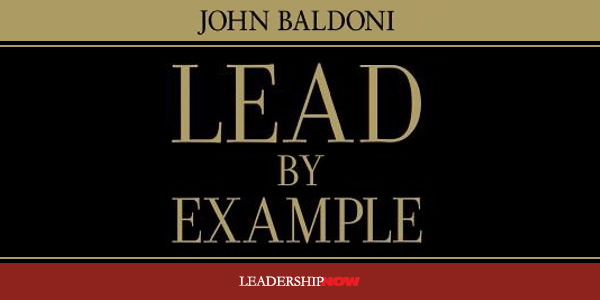
LEADING BY EXAMPLE is one of those things we know and remember to do on our way to do something else. The problem is that it requires a lot more inner work than we are willing to put in, but it leverages our leadership more than any other thing we can do.

Unfortunately, it is the norm that leaders don't know themselves well enough to set an example. Tolstoy once remarked, "Everyone dreams of changing humanity but no one dreams of changing himself." Yet that's what it takes to lead by example.
John Baldoni has written an excellent and practical book that addresses areas that leaders need to look at in order to be the kind of person that people will want to follow. Lead by Example contains 50 short chapters that pinpoint an area of concern and how to tackle it. It "demonstrates how leaders leverage their best attributes to overcome their shortcomings in order to build trust and drive results."
Baldoni breaks up the 50 chapters into four sections that he describes this way:
Set the Right Example
Before you can lead others, you must lead yourself. You need to know what you are made of. Character and conviction matter….Your example is your character in action. Ask yourself:
- How often do I take the time to reflect on my own performance and how it affects my team?
- What am I doing to make myself a better leader?
Act the Part
You need to know who you are leading and the culture in which you intend to lead. Most often, there will be no roadmaps, but there will be plenty of roadblocks. It's the leader's job to identify them and put the team in place to remove them….[L]eaders need to set direction, but then step back and let people discover for themselves how to get things done. Ask yourself:
- What am I doing to be sure that people understand their mission?
- How well am I winning over the "fence sitters," those waiting for things to happen?
- How well am I overcoming obstacles that stand in the way?
- What should I be doing to spread the confidence?
Handle the Tough Stuff
Life comes at you in different directions. Sometimes it will come so hard it will knock you down. There is no shame in falling; what matters is getting up to fight again. When your people see you doing that, they will be encouraged to follow your example. Sometimes you have to collaborate with people who have no interest in you or your ideas. You have to learn to lead when you have no authority to do so. You must prove that you know your stuff. You must use your wits and your influence to succeed. By doing so, you create opportunities for people to listen to what you have to say and give yourself a chance to prove your case. Ask yourself:
- How well am I encouraging alternative points of view?
- What do I do when a member of our team suffers a setback?
- How well do I seek solutions rather than seeking to pin blame?
Put the Team First
No leader lives in a vacuum. It is incumbent that you show people what you think of them, honestly and positively. This means you coach your people for success. Ask yourself:
- How well are we dealing with tension in our team? Is it positive or negative?
- What can I do to make certain we have the right people in the right jobs to do the job right?
- What can I do to demonstrate my appreciation for my team?
The way this book is organized makes it a great reference tool that you can refer to when you are faced with leadership—people—issues. It's also a good book to put in the hands of those who are seeking to lead in your organization. The thinking and behaviors addressed in this book will pay dividends.
![]()
![]() Like us on Instagram and Facebook for additional leadership and personal development ideas.
Like us on Instagram and Facebook for additional leadership and personal development ideas.

![]()
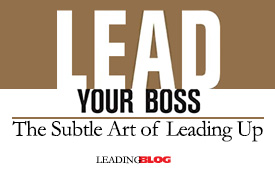

Posted by Michael McKinney at 10:23 AM
Permalink | Comments (0) | TrackBacks (1) | Leadership Development , Personal Development
10.29.08

Richard Branson on Success
When we place too high a value on achievement and fulfillment, we often overlook the important parts of life like character, relationships and service. Richard Branson made a profound statement on success in his book, Business Stripped Bare. The last sentence may take a few reads for its implications to soak in.
Successful people aren't in possession of secrets known only to themselves. Don't obsess over people who appear to you to be "winners", but listen instead to the wisdom of people who've led enriching lives—people, for instance, who've found time for friends and family. Be generous in your interpretation of what success looks like. The best and most meaningful lives don't always end happily.
Posted by Michael McKinney at 01:11 PM
Permalink | Comments (0) | Personal Development
10.10.08

Push Yourself Within Your Comfort Zone
Push yourself beyond your comfort zone. This sounds right because, of course, you should keep learning and growing and experimenting through your career. But it's not true. It leads people such as Michael Jordan to try their hand at professional baseball.
Instead, you should push yourself within your comfort zone.
Your strengths are your comfort zone. Your strengths are not only activities that strengthen you, but they are also activities where you have the greatest capacity to learn and grow. So if you are going to push yourself—and you should—then push yourself to get better and better at expressing your strengths.
Adapted from The Truth About You by Marcus Buckingham
Posted by Michael McKinney at 12:04 AM
Permalink | Comments (0) | Personal Development
10.06.08

Marcus Buckingham and The Truth About You
Marcus Buckingham has done much to advance the understanding of strengths management. He has now turned his attention to crafting a program more specifically oriented to Generation Y, college students and young professionals.
If you ask young people in America ages 18 to 25, which do you think will help you win in life most, they overwhelmingly (70%) respond by saying, "fixing my weaknesses." There's a whole generation of kids coming into the workplace who may understand they are distinct and different, but don't really know how to think about it or make use of that knowledge not only in the workplace, but in life in general.
Buckingham keeps driving the point (and rightly so), that we need to focus on our strengths, not our weaknesses. Build on your strengths and neutralize your weaknesses. In conjunction with his new book, The Truth About You, he has launched a U.S. tour of universities around the nation to talk to young professionals about to embark on their career paths.
The Truth About You focuses on how you set your career up right—how do you start in such a way that you can push the world toward the best of you; learning to express the best of who you are. It incorporates a candid 20-minute enhanced DVD (a reworking of the effective Trombone Player Wanted film); an interactive book, which takes up where the film leaves off; and a reMemo Pad, a way of using the raw material of your week to clearly identify your strengths and weaknesses. The DVD alone is worth the price of the book.
Counter-intuitively, he writes, "Your strengths aren't what you're good at and your weaknesses aren't what you're bad at." There are things that you are good at, but they drain you, even bore you. Strengths are not activities you're necessarily good at, they're activities that strengthen you. A strength is an activity that before you're doing it you look forward to doing it; while you're doing it, time goes by quickly and you can concentrate; after you've done it; it feels good to do it. A weakness is an activity that drains you or weakens you, even if you're good at it.
Buckingham writes that you'll never find the perfect job. You'll need to build it—little by little—gradually.
Buckingham's pragmatic application of these concepts is important. And the earlier in life you understand them and build on them the better. Hopefully Buckingham will now turn his attention to an educational system that overwhelmingly focuses on weaknesses and is not designed to encourage the development of student's real strengths. All children have amazing talents and we squander them. We need to convert parents and teachers if we are to begin to abandon some of our counterproductive beliefs.
Posted by Michael McKinney at 12:01 AM
Permalink | Comments (0) | Personal Development
09.28.08

Fixing the Financial Crisis Once and For All
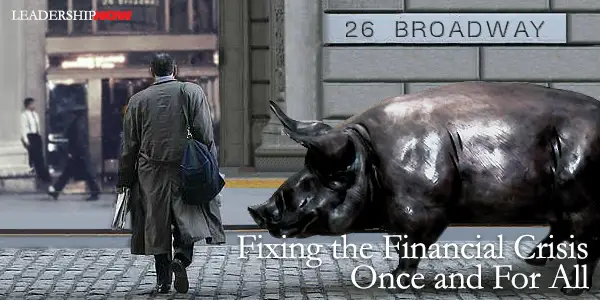
HOPING TO SOUND to sound like leaders, Washington lawmakers want to get to the bottom of this financial crisis and create regulations to keep it from ever happening again. I don't think it comes as any surprise to anyone that greed—on the part of both borrowers and lenders—is at the bottom of it. You can't regulate greed out of existence. Regulation just improves creativity. Greed is regulated by character. Character is built at home, in our schools, in our churches, and yes, in our businesses.
No one likes to talk about character because it isn't a quick fix, it often goes against our inclinations, it's not immediately measurable, you can't take credit for it, and it's a time consuming, never-ending process. George Eliot wrote in Middlemarch: "Character is not cut in marble; it is not something solid and unalterable. It is something living and changing." It's built-in individuals day by day in little, almost imperceptible ways over the course of a lifetime. The problem is that we have only given a patronizing nod to character and politely moved on with the business at hand. How will I get mine if I don't play it like everyone else? We learn too late, without character, no one gets anything.
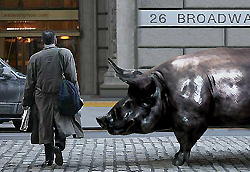
Character needs to be part of the very fiber of the organization. It must be a part of its philosophy and vision. I don't mean a statement of values we hang on the wall, but a statement of behavior beginning with the CEO on down. Tom Peters wrote in Thriving on Chaos that "effective visions are beacons and controls when all else are up for grabs….To turn the vision into a beacon, leaders at all levels must model behavior consistent with the vision at all times."
In July, Hugo Dixon opined in the Wall Street Journal, "Greed for higher returns entices investors to take risks; fear causes them to avoid excess. When markets are healthy, the two are finely balanced. Problems emerge when that balance is lost." You will find character behind this balancing act. Character stabilizes both people and markets. Character is inseparable from the culture in which it is formed.
Nothing will fix the financial crisis once and for all, but character will regulate it. Greed is a human issue and it will always be with us. It will always be something we need to train ourselves, our children, and our employees to regulate from within. The consequences can be devastating.
Apparently, Mr. Gekko, greed is not good. Lou Mannheim was right, "The main thing about money, Bud, is that it makes you do things you don't want to do." Or shouldn't do.
![]()
![]() Like us on Instagram and Facebook for additional leadership and personal development ideas.
Like us on Instagram and Facebook for additional leadership and personal development ideas.


Posted by Michael McKinney at 11:04 AM
Permalink | Comments (0) | General Business , Government , Leaders , Personal Development
09.24.08

Managing Brand You: It's No Accident
"Whatever your brand stands for, you have to deliver on the promise," writes Richard Branson in Business Stripped Bare. "Don't' promise what you can't deliver, and deliver everything you promise. That's the only way you'll ever control your brand. And beware: brands always mean something. If you don't define what the brand means, a competitor will." It's no different on a personal level.
We all have the opportunity to determine how others see us. We are in charge of our own brand. The space between how you are viewed by other people and how you want to be viewed by other people is the place where you begin to build your brand. "Brand YOU," writes Jerry Wilson and Ira Blumenthal in Managing Brand You, "is about making choices regarding how you want to live your life and how to build the positive and favorable impressions you desire with your target audience."
Begin by asking your closest friends for a candid list of twenty-five words that best describe you and what you represent. Make your own list as well. How does it look? How does it compare to your brand identity? How you want to be perceived? Wilson and Blumenthal ask:
Are you hoping one of your brand promises is reliability? Then why are you always late? Are you working to make sure those around you believe you are a team player? Then why do you never volunteer for a committee or activity? Is you perception of your personal brand that of a person who is logical, thoughtful, and contemplative? Then why do you make seat-of-the-pants, spur-of-the-moment decisions?
Managing Brand You takes you through a valuable seven step process for defining, creating and implementing your personal brand. It is as much about reinvention and integrating your values, principles and beliefs with your actions—you brand essence. It's about not letting your past control your future. Your brand should be built on your strengths with a grasp of areas where you need to improve in order to support your strengths.
Simply put, to place yourself in the satisfying and successful life that you imagine, you need to find your inner drive and to discover the skills you have that can help you find your best space. Having a brand identity that is right for you is no accident. It begins by looking deep inside yourself to find out what motivates you and to discover the principles that guide your life. And it is equally important to recognize where you do not want to be, as it is to visualize where you want to be.
Emphasis is placed on the importance of a consistent message over the long haul. They liken it to running a marathon race. It's easy to get distracted from your goals by the inertia and pressures of your current brand. A brand is not a quickie makeover, but a long-term commitment to personal improvement.
Posted by Michael McKinney at 10:14 AM
Permalink | Comments (0) | Personal Development
09.19.08

Do You Suffer From Any of These Energy Drains?
In our fast-paced, twenty-four hour society we are constantly distracted and diverted from working on what we should be working on. It creates lives of almost habitual scatteredness . Focus is the sine qua non of reaching our potential. This scatteredness is largely responsible for draining us of the energy we need to accomplish our goals. Additionally, in Success 101, John Maxwell outlines three difficult situations that we need to be aware of and learn to manage around:
Activity Without Direction – doing things that don't seem to matter
Burden Without Action – not being able to do things that really matter
Conflict Without Resolution – not being able to deal with what's the matter
These sap our energy because they chip away at our dignity and needlessly undermine our ability to focus. If we find ourselves faced with any of these difficult circumstances, we need to work extra hard to manage around them. The first step to accomplishing this is seeing the big picture and knowing our part in it. Knowing our purpose can insulate us from many of the external distractions we face on a daily basis.
Maxwell writes, "The better you are at making sure you're doing what you should be doing, the better chance you have for making an impact on others and being successful." At the same time, not all stress is bad. We need to look for opportunities within our circumstances to expand our capacity. Loehr and Schwartz write in The Power of Full Engagement, that "Any form of stress that prompts discomfort has the potential to expand our capacity—physically, mentally, emotionally or spiritually—so long as it is followed by adequate recovery." It's part of learning to manage yourself exceptionally well.
Posted by Michael McKinney at 09:46 AM
Permalink | Comments (0) | Personal Development
09.17.08

Nice Guys Can Get the Corner Office
Apparently, Nice Guys Can Get the Corner Office. The problem isn't being a nice guy (or gal), the problem is in finding the right balance. It's having the emotional intelligence to know how to interact with others without "giving away the store." This book is about finding that balance.
According to the authors – Russ Edeloman, Timothy Hiltabiddle and Charles Manz - Nice Guy Syndrome is a big problem in today's workplace. 61% of people they surveyed said that they struggle with being too nice at work, and that they feel it has a negative impact on their success.
Most of us like to be considered "nice." We want to be liked. We equate it with traits like cooperativeness and agreeableness, but it often ends up being manifested in unproductive behaviors that come across as weak, passive and docile. This can create a whole new set of (passive-aggressive) issues as we try to cope with being marginalized. What is "niceness?" How should it look? The authors define it as:
- Attempting to optimize outcomes for both others and ourselves
- Striving to balance assertiveness with cooperation to achieve a spirit of collaboration
- Honoring the value and strength pf others and ourselves
- Seeking optimal outcomes for everyone involved by emphasizing truthfulness and authenticity
- Openly confronting challenges and disagreements and embracing the innovation-promoting benefits of constructive idea conflict.
They offer a Nice Guys Bill of Rights and their corresponding strategies to help you find the balance between being a pushover and being a jerk. If you are overly nice, understanding and recognizing these rights will help you to change your behaviors and how you are perceived. In the book they present strategies for practicing these rights in you life without jumping into the other ditch by overcompensating. If you happen to find yourself already in the other ditch, these strategies will help you to rein yourself in before you're forced to.
- You have the right to SELF-AWARENESS – Know your strengths & weaknesses. Before you can set a course for where you want to go, first you must be completely honest about where you are. A thorough knowledge of your strengths and weaknesses is extremely valuable.
- You have the right to SPEAK UP – Let your opinions be heard. The ability and willingness to speak up is essential if you want your ideas to be heard. Learn to have an opinion, but understand that you don't always need to express it.
- You have the right to SET BOUNDARIES – Set and respect them. "No" seems to be the hardest word for nice guys. Nice guys must set good boundaries and consistently reinforce them as needed.
- You have the right to CONFRONT – Address issues directly and without fear. Since nice guys instinctively want to get along with everyone , conflict is especially difficult to face. It is very important to learn to address issues directly and overcome the fear associated with confrontation.
- You have the right to CHOICE – Make choices without guilt. Nice guys often feel powerless, as if they have no choice in a given situation. The truth is that they frequently give away their power to choose. The key? To own your choices and, without guilt, to make the right decision for you and your organization - even if it means people will be angry or disappointed with you.
- You have the right to EXPECT RESULTS – Be accountable to others and yourself. Maintaining accountability sometimes makes you unpopular. Regardless, to be effective nice guys must be willing to hold others (and themselves) accountable for results and to follow through on their commitments.
- You have the right to BE BOLD – Push the envelope. Taking risks is extremely challenging for nice guys. If they want to succeed at a high level, however, they must be willing to go beyond their comfort zone and place a high value their goals and priorities.
- You have the right to WIN – Finish first. The business world is highly competitive. Nice guys, however, sometimes shy away from competition because they aren't comfortable with "winning" (and other people "losing".) While a win/win scenario is ideal, it is not always possible. Everyone is ultimately best served when the best ideas and solutions win, not when nice guys "play small." Nice guys owe it to themselves and their organizations to do their absolute best at all times and embrace winning.
Posted by Michael McKinney at 10:59 AM
Permalink | Comments (0) | Personal Development
09.08.08

Our Performances Matter: The Encore Effect
What is the encore effect? It is delivering what you do so well that you are asked to do it again and again. It's people wanting more of what you do best. No matter what we do, we are showcasing who we are and what we care about. As we go through our day we can either deliver an average performance or a remarkable one. A remarkable performance keeps them coming back for more.
Mark Sanborn, author of The Encore Effect, believes "Our performances matter. They can have a powerful impact on those around us. As parents, our performance shapes and influences our children. As employees and managers, our performance can make our company better, move a project forward, spark ideas among colleagues, and influence customers."
Of course, a remarkable performance can only come from someone who knows what they do best, and is passionate enough about it to have invested the time to develop expertise in it and to live it authentically. It's who they are and it's infectious.
How can each of us make our own performance bigger, better, and bolder? How can we make what we do consistently remarkable and thereby make a difference in our sphere of influence?
Mark Sanborn offers five steps for making your performance remarkable; for bring your best self to whatever you are doing:
Passion: Passion is the fuel that drives our life's purpose. Our passion for what we do pulls others along. "Nobody likes to be driven by someone else; it feels like being pushed. But when someone can show us how to be bigger on the inside—in our attitude and mind-set—that can help attract or pull us toward what we can become.
Prepare: How remarkable performance begins. "Each of us is creating our future right now. Whether the future is five minutes from now or five years, it is determined by our preparation—or lack of it." Be a remarkable performance waiting to happen.
Practice: "There are no perfect violinists—or salespeople, executives, teachers, or parents for that matter. But deliberate practice is what distinguishes those who excel from those who get by."
Perform: Be the performance. "One hallmark of a remarkable performance is authenticity." Be yourself. Engage your audience by giving them your attention. "To create the Encore Effect, you shouldn't be focused on your own happiness or success, but on the happiness and success of others."
Polish: The difference is in the details. "There are lots of details that matter when it comes to creating a remarkable performance." Keep polishing what you do.
Sanborn is no stranger to remarkable performances and he continues to polish his life's work. He also highlights some pitfalls that we need to avoid along the way like arrogance, fear and impatience.
Most importantly, Sanborn points to the real goal of remarkable performances—helping others to achieve their own remarkable performances. "Remarkable performers see in others what they have discovered in themselves—the ability to reach unexplored and unanticipated levels of performance. They inspire others through their own performances, instruct others through their teaching, and help others improve through their encouragement."
Pass this title along to others—young and old. It contains a simple idea that taken to heart, can make a big difference.
Posted by Michael McKinney at 02:33 PM
Permalink | Comments (0) | Books , Personal Development
08.12.08

Are You Having a No-Good, Very-Bad Day?

IF YOU are like most of us, anything going on but what you want, warrants a complaint. Not an action-oriented, let's get this solved kind of complaint, but your everyday run-of-the-mill mindless kind of complaining that leads nowhere (except to more negative thinking).
Jon Gordon, author of The No Complaining Rule, says there are two main reasons why we complain: (1) because we are fearful and feel helpless and two, because it has become a habit. He urges us to outgrow the complaining habit. He cites a Gallup poll that finds that negativity costs companies nearly $300 billion each year.
"In life," Gordon writes, "you have a choice between two roads. The positive road and the negative road. The positive road will lead to enhanced health, happiness, and success and the negative road will lead to misery, anger, and failure. Since your bus can't be on two roads at the same time, you must decide which road you want to be on. And when you complain you travel down the negative road."
"In life," Gordon writes, "you have a choice between two roads. The positive road and the negative road. The positive road will lead to enhanced health, happiness, and success and the negative road will lead to misery, anger, and failure. Since your bus can't be on two roads at the same time, you must decide which road you want to be on. And when you complain you travel down the negative road."
As former chronic complainer, Gordon effectively delivers his message through a story. The No Complaining Rule doesn't rule out complaining – it requires that it be constructive.
Employees are not allowed to mindlessly complain to their coworkers. If they have a problem or complaint about their job, their company, their customer, or anything else, they are encouraged to bring the issue to their manager or someone who is in a position to address the complaint. However, the employees must share one or two possible solutions to their complaint as well.

Gordon explains how do develop a positive culture by creating a culture where negativity can't breed, grow, and survive. A crucial key is to all this is to focus on gratitude. "Research shows that when we count three blessings a day, we get a measurable boost in happiness that uplifts and energizes us. It's also physiologically impossible to be stressed and thankful at the same time. Two thoughts cannot occupy our minds at the same time. If you are focusing on gratitude, you can't be negative. You can also energize and engage your coworkers by letting them know you are grateful for them and their work."
Start a revolution in your own life, at work, and at home. Download free No Complaining Rule posters and other tools from Jon Gordon's web site. Have no complaining day!
![]()
![]() Like us on Instagram and Facebook for additional leadership and personal development ideas.
Like us on Instagram and Facebook for additional leadership and personal development ideas.

![]()


Posted by Michael McKinney at 09:22 PM
Permalink | Comments (0) | Management , Personal Development , Problem Solving
08.04.08

Are You a PITA?
I first heard the term PITA (Pain In The Ass) when referring to clients or coworkers from friend and international consultant to accountancy firms, Chris Frederiksen (The 2020 Group), in his seminar, How To Build A Million Dollar Practice in the early 80s. It resonated with everyone there as Robert Orndorff's and Dulin Clark's new book, The PITA Principle: How to Work With (and Avoid Becoming) a Pain in the Ass, will resonate today with anyone that has had experience working with groups of people anywhere. Mention PITA and no doubt someone's name or face will pop into your head.
They define PITAs as those "folks who arouse our emotions, challenge our patience, and make us labor for our money on a daily basis." Their goal in mentioning this is two-fold. First they want to give you some coping strategies to help you deal more effectively with those people. Secondly, they want you to avoid being on someone else's PITA list. We can all be PITAs from time to time, but by promoting a little self-awareness they hope to help you to either avoid or emerge from being a PITA. This second goal is not an easy task.
Heightened self-awareness, or lack of, appears to mystify some of society's most prominent figures, from the corporate executive who unknowingly yet chronically berates his employees through abuses of power, to the physician who patronizes her patients thought her intellectual arrogance, to the politician who cannot and will not admit mistakes in judgment out of ego-preserving stubbornness.
The authors note that those people who refuse to take the time to gain a little self-awareness and learn to soften or manage their PITA tendencies, "don't get the importance of developing the other side of themselves because they are either too self-absorbed, too unaware, or too defensive to let other information enter into their consciousness." This is a prescription for self-destruction.
They describe eight types of PITAs in detail and offer some coping strategies for each and advice to help you get some perspective on their behavior. You'll also find a selection of ten more PITA types that get honorable mention.
Posted by Michael McKinney at 07:58 AM
Permalink | Comments (0) | Personal Development

What Are Your PITA Tendencies?
To get you started in your own PITA self-discovery we offer this assesment from Robert Orndorff's and Dulin Clark's book The PITA Principle They write, "Just as some PITA types are tougher to work with than others, you'll have greater potential or tendencies to behave like certain PITA types more so than others.
To take this quiz you will need to print this page from this post's permalink page or simply write your answers on a separate piece of paper. Use the following scale to enter the number that most closely reflects your feelings. After answering all of the questions, score the total sum for each PITA type according to the instructions given below.
| Strongly Disagree | Disagree | Slightly Agree | Agree | Strongly Agree |
Quiz Questions
| 1. | _____ | Being organized is not one of my greatest strengths. |
| 2. | _____ | I primarily respect people of power and status. |
| 3. | _____ | I like to plan everything out in advance and I'm frustrated by changes to the plans. |
| 4. | _____ | People would describe me more as a cynic than a Pollyanna. |
| 5. | _____ | I expect to get what I want when I go after it. |
| 6. | _____ | I'd rather work with people who are accommodating and friendly versus tough and competitive. |
| 7. | _____ | I get defensive when a co-worker disagrees with me. |
| 8. | _____ | It's important to me that my co-workers acknowledge my accomplishments. |
| 9. | _____ | I tend to see the glass as half empty. |
| 10. | _____ | It's a challenge for me to be on time. |
| 11. | _____ | I believe that the needs of the worker are as important as the needs of the company. |
| 12. | _____ | It's difficult to work on a committee and try to accommodate everybody's ideas. |
| 13. | _____ | It's important for me to have a boss who compliments me when I'm doing my job well. |
| 14. | _____ | I have difficulty owning up to my mistakes. |
| 15. | _____ | I have difficulty saying what I mean in a concise manner. |
| 16. | _____ | I enjoy being the talker rather than the listener. |
| 17. | _____ | I don't like to tap-dance around people's feelings; I tell it like it is. |
| 18. | _____ | I believe in the saying, "If you want it done right, do it yourself." |
| 19. | _____ | I prefer to put myself first. |
| 20. | _____ | I am very guarded against negative feedback. |
| 21. | _____ | I am most comfortable working in a supportive and nurturing environment. |
| 22. | _____ | I get annoyed when other people achieve more than me or acquire more than me. |
| 23. | _____ | I have to force myself to attend to details. |
| 24. | _____ | I get annoyed with co-workers who can't see my point of view. |
| 25. | _____ | I am impatient when it comes to my career; I want more challenges, creativity, and responsibility. |
| 26. | _____ | I believe that social gatherings and "feel-good" activities are a waste of time. |
| 27. | _____ | I have trouble identifying my weaknesses when completing performance evaluations. |
| 28. | _____ | It's important for me to get regular feedback from my co-workers. |
| 29. | _____ | I prefer projects in which I get to make the final decision. |
| 30. | _____ | I deserve a job that is challenging, but also allows me plenty of personal time. |
| 31. | _____ | I prefer a highly flexible work environment over a highly structured one. |
| 32. | _____ | I believe that I have more skills and abilities than the great majority of my co-workers. |
| 33. | _____ | It's much more important to be respected than liked. |
| 34. | _____ | I have a tendency to take minor criticisms and blow them out of proportion. |
| 35. | _____ | I value co-workers who address issues and concernts with me in a sensitive and caring way. |
PITA Quiz Score Sheet
Scoring Your Responses
For each PITA type below, add the scores from the survey for the question numbers listed next to each PITA type. Place the total on the line in front of each type. High scores indicate that you might have potential for behaving like that type of PITA in various work situations.
| Total Your Scores | Learn More About Your PITA Type |
|---|---|
| ____ TOTAL The Sealed PITA | A Sealed PITA is someone who is closed off and defensive about receiving feedback. He or she is generally on guard when it comes to receiving constructive criticism. |
| Add #'s 4, 9, 17, 26, aand 33 ____ TOTAL The Crusty PITA | A Crusty PITA is someone who is negative, cynical mean-spirited, grouchy, and pessimistic. These types of people see the glass as half-empty. |
| Add #'s 2, 8, 16, 22, and 32 ____TOTAL | An Overstuffed PITA is someone who is self-absorbed, attention hungry, and aggressively self-promoting. |
| Add #'s 6, 13, 21, 28, and 35 ____TOTAL The Soggy PITA | A Soggy PITA is someone who tends to be whiny, high-maintenance, needy, and afraid of addressing issues head on. |
| Add #'s 1, 10, 15, 23, and 31 ____TOTAL The Sloppy PITA | A Sloppy PITA is someone who tends to be disorganized, inattentive to detail, imprecise in tasks, and generally "all over the place." |
| Add #'s 3, 12, 18, 24, and 29 ____TOTAL The Rigid PITA | A Rigid PITA is someone who tends to be picky, particular, stubborn, inflexible, and incompromising. |
| Add #'s 5, 11, 19, 25, and 30 ____TOTAL The Royal PITA | A Royal PITA is someone who tends to be self-centered and spoiled and who has a sense of entitlement, expecting to get everything that he or she wants and being somewhat oblivious to how others receive him or her. |
After determining your PITA tendencies, you will want to refer to the corresponding chapter in the book that describes your PITA type in more detail. The authors maintain a PITA blog.
Categories: Leadership Development
Posted by Michael McKinney at 07:56 AM
Permalink | Comments (0) | Personal Development
07.28.08

What Is Your Plan For Personal Growth?

YOU WON'T GROW to your potential without a plan. You'll get older, but not better. Experience guarantees nothing. Growth is intentional. If you are not growing you're just putting in time. Waiting.
Crucibles of Leadership by Robert Thomas, is an important book that asks, "What is your personal learning strategy?" A PLS is "a highly individualized plan for leveraging hard-won insights about learning from adversity and using practice to improve performance."

We all have crucibles, but it's what we do with them that is important. Thomas writes that crucibles "are like trials or tests that corner individuals and force them to answer questions about who they are and what is really important to them." Crucibles become valuable when we intentionally mine them for lessons that make us more effective, aware and integrated. Warren Bennis points out in the foreword that the self-awareness we should gain is "the kind of deeper understanding of self that then turns outward rather than inward and results in better understanding of others and the organizations that matter to us."
Thomas says that we have to change our approach to learning. We shouldn't wait for just the right moment to arrive, but learn in the moment—in real time—to, as he writes, "learn while doing."
Preparation is essential to learning. In order to take advantage of our crucibles, we must develop a Personal Learning Strategy (PLS). Thomas introduces a framework for crafting a PLS complete with exercises to help you properly move through each step. It begins with a little introspection—understanding why you want to lead, what motivates you to do so and understanding how you learn. Then you need to access your capability in three core areas: adaptive capacity, engaging others through shared meaning, and integrity. From here you can see areas where you need to improve and strengthen in order to reach your leadership goals. Now you can assign behaviors to each of these areas that you can consciously practice at work and at home. He suggests that you "scan your landscape at work and at home, and identify those instances and roles out of your comfort zone that will allow you to stretch into new behaviors, perspectives, and leadership capabilities."
Organizations too, can tap into the power of a PLS by adopting an experience-based approach to their leadership development program. Organizations need to recognize the importance of crucible experiences and provide the resources people need to extract insight from them in addition to the regular technical and skills training people should be receiving. Most often those resources involve creating a process that links the two learning opportunities together.
One important note on a trap that people and organizations sometimes fall into in their zeal to develop character and leadership, Thomas writes, "We create enough pressures to perform that we don't need to invent new ones just so that we can accelerate leader development. The trick is to harness the crucibles that life sets in motion so the opportunity for learning is not squandered." Life gives us enough opportunities to learn, but often, we just need help getting the lesson we should be getting from it.
Accomplished leaders say that experience is their best teacher. They learned their most meaningful and important leadership lessons—lessons that they've integrated into their own leadership style—through crucibles. These were critical events and experiences, times of testing and trial, failure more often than grand success, that grabbed them by the lapels and demanded to know "What do you stand for?" and "What are you going to do?" A situation arose that did not respect age, gender, generation, nationality, talent, or charisma; all it asked was that the person step up and be someone or do something they'd never been or done before.
Having a Personal Learning Strategy is a way of thinking about and looking at life that allows you to proactively grow from what life throws at you, rather than being knocked out by it. You need a Personal Learning Strategy.
![]()
![]() Like us on Instagram and Facebook for additional leadership and personal development ideas.
Like us on Instagram and Facebook for additional leadership and personal development ideas.

![]()


Posted by Michael McKinney at 02:06 PM
Permalink | Comments (0) | Books , Leadership Development , Personal Development
07.09.08

Focus Like a Laser Beam
We all know that when we focus on something we leverage our efforts. Success Magazine founder Orison Swett Marden, wrote, "Every great man has become great, every successful man has succeeded, in proportion as he has confined his powers to one particular channel." But focusing, determining exactly what to focus on, and focusing on our strengths to make a tangible contribution, isn't as easy as it sounds. Simplifying your life by eliminating as many of those things that take an inordinate amount of time and don't contribute substantially to your goals is sometimes a very difficult thing to do. Yet it is important to keep in mind that habits drive most of what we do, the ways we react and respond and so we need to constantly review what we are spending our time doing.
In her very practical book, Focus Like a Laser Beam, Lisa Haneberg writes, "Leaders need to know what laser focus looks and feels like. The first and most obvious sign of focus is that everyone knows what's important." To do this, people need to know what's relevant. "When you define success, you define relevance." She offers four questions to apply when trying to define relevance:
- Relative to all the things I could be doing, is this something that will have the greatest impact on the most important goals?
- Will this task improve results or effectiveness beyond what we are doing today?
- Will anyone notice if this doesn't get done?
- If I ran into a contingency today and could only do two other tasks, what would I do? Would this task still be important?
Too often we "agree to do too much and then we are unable to execute well. To improve focus, leaders must change how they define what's relevant and say no much more often….It's better to do a few things well than many things poorly." She encourages us to complete one great thing each day. "Great things facilitate and enable forward progress."
Lisa maintains a blog about the craft of management and leadership called Management Craft.
Posted by Michael McKinney at 10:32 AM
Permalink | Comments (0) | Management , Personal Development
06.18.08

Bringing Your Emotions Under Control
Our emotions can derail us. Keeping them under control is a huge part of our success as a leader. Of course, self-awareness is the key to making this happen.
Before your emotions are get the best of you, Dondi Scumaci, author of Designed For Success, recommends that we learn to ask a new set of questions:
How am I feeling?
Why am I feeling that way?
What do I need?
What am I afraid will happen?
How do I want this to turn out?
What can I do to achieve the result I need?
She writes, "The moment you begin this self-inquiry, a switch flips in your brain. You are moving from a purely emotional response to an objective-based response."
Update:
Stephen Baum, author of What Made jack welch JACK WELCH, has a good post on his blog about "grabs." These are instinctive responses to events by which we are emotionally hijacked by deep-seated fears embedded in us years ago. Check it out.
Posted by Michael McKinney at 07:14 AM
Permalink | Comments (0) | Personal Development
06.09.08

5 Leadership Lessons: How the Best Get Better and Stay That Way
Sports psychologist and executive coach Graham Jones believes that the real key to excellence in both sports and business is mental toughness. In the current Harvard Business Review he writes that the most successful people do five things to get better and stay that way.
Learn to Love the Pressure. To do that you must dedicate yourself to constant self-improvement. That is made a lot easier if you learn to compete with yourself and block out the drama of those around you. It's a choice. "Greg Searle, who won an Olympic gold medal in rowing, is often asked whether success was worth the price. He always gives the same reply: 'I never made any sacrifices; I made choices.'"
Fixate on the Long Term. Map out short-term goals in every area that affects your performance to make sure you meet your long-term goal. Long term success is paved with small achievements.
Iron Sharpens Iron. "Train" with the people who will push you the hardest. "Smart companies consciously create situations in which their elite performers push one another to levels they would never reach if they were working with less-accomplished colleagues."
Reinvent Yourself. Once you become the benchmark, you need to keep reinventing yourself. To do this you need to develop an insatiable appetite for feedback; you need to be "hungry for advice on how to develop and progress. One word of caution, however: While it's good to feel challenged, you need to make sure that any feedback you get is constructive. If criticism doesn't seem helpful at first, probe to see if you can get useful insights about what's behind the negative feedback. Get more specifics. You should be able to see concrete improvements in your performance after getting detailed coaching advice."
Celebrate the Victories. Think of it as constructive celebration. Otherwise it can lead to complacency. "Celebration is more than an emotional release. Done effectively, it involves a deep level of analysis and enhanced awareness. The very best performers do not move on before they have scrutinized and understood thoroughly the factors underpinning their success."
In the end, the keyword is resilience. Jones concludes, "Most of those participating in the Olympics this summer will walk away from the games without grabbing a single medal. Those with real mettle will get back into training again. That's what truly separates elite performers from ordinary high achievers. It takes supreme, almost unimaginable grit and courage to get back into the ring and fight to the bitter end. That's what the Olympic athlete does. If you want to be an elite performer in business, that's what you need to do, too."
Posted by Michael McKinney at 12:11 AM
Permalink | Comments (0) | Five Lessons , Personal Development
05.29.08

Change the Way You See Yourself
The authors that brought you Change the Way You See Everything have taken the principles of asset-based thinking and applied them more specifically to you – the individual – in Change the Way You See Yourself. Like its predecessor, this book too is a feast for the eyes. I enjoy the graphics, but the message they convey is vital to your personal development.
Asset-based thinking is a way of looking at yourself that emphasizes what is working in your life and the strengths you possess. It is a way of freeing yourself from negative and unproductive thinking. It allows you to focus on what you can do and not what you can't do (as often seems to be our default mode of thinking). They write that with asset-based thinking, "you use surprise, serendipity, and even setbacks to make the journey more interesting and more worthwhile. You are more confident in who you are, where you are going, and how to get there."
In the section on power they invite us to look at it in a new way. Authors Kathryn Cramer and Hank Wasiak write:
When it comes to power, most people think of accumulating material wealth, status, authority, knowledge, and expertise. These are potent external sources of power. AS such, they provide you with control over a vast array of resources – from money, to land, to market share, to intellectual property. While building large reservoirs of external power may be useful, it is not enough for getting results. There is another source of power equally important and often more vital to your leadership and success.Instead of relying primarily on external power sources to fuel your progress, look deeply inside for what can move you forward. You have a huge reservoir of internally generated power just waiting to be tapped. Internal sources of power derive from who you are – not what you have. Your internal power is defined by your Signature Presence – your unique combination of passions, capabilities, qualities, values, and beliefs. Signature Presence power gives you what it takes to get results when externally derived power is not enough.
Leadership sage Warren Bennis once said, "A point of view is worth 50 IQ points." He knew That when you live by the power of your convictions you stand taller, sit straighter, and speak more confidently. You raise the level of your game. Others know you as a "force of nature" – someone who will not be deterred and who doesn't give up.People crave clarity … your voice rings clear when you stand for something.
People want wisdom … your mind creates meaning when you stand for something.
People gravitate toward hope … your ideas and promises hold sway when you stand for something.
Related Reading:
Asset-Based Thinking
Posted by Michael McKinney at 10:40 AM
Permalink | Comments (0) | Books , Leadership , Personal Development
05.16.08

A Navigation System for Women in the Workplace
Dondi Scumaci has written a book – Designed For Success – to help women navigate their careers. She says, "I am passionate about helping people release their potential so they can have real impact, leverage their God-given talents and maximize opportunities in life and in business."
Many of the principles presented here, of course, apply to both men and women. But she has tailored it to address the unique obstacles women face in the workplace including how to overcome the natural aversion to negotiation, how to send the right message with your wardrobe, overcoming female stereotypes
and the importance of fostering a network of mentorship relationships with other female professionals.
Women bring a unique set of traits to the workplace that are not as valued as they should be. Their strength lies in developing and applying them to whatever they are involved in and not trying to emulate male traits. In the book she offers Ten Commandments for Women in the Workplace. Here are some takeaways on developing your leadership capabilities:
You have to be something before you can get something. Maybe we don't actually say it, but there are times when we hold back the best of who we are because "that's not our job"? Admit it. Haven't you ever thought, "That's not my problem," or "I don't get paid enough to put up with this!"? OK, I'll go first. I have. When it comes to personal leadership, we can't wait for the position to demonstrate it. We can't wait for the promotion to make the difference, because the difference is what makes the promotion.
Knowing how you fit – how your work fits – into the bigger picture, is really important. When you understand the flow of work and the broader objectives of the organization, you work in context.
Check for alignment between what you are doing and what matters most to your organization. The more aligned you are with the goals and priorities of the organization, the more valuable and relevant you become.
Instead of trying to increase compliance with your processes, view them from your customer's perspective and find ways to make them more user friendly. You become more valuable to the organization when you search for and deliver solutions. At this level you are not waiting for an assignment. You are actively engaged in the process of continuous improvement.
The most valuable, vital employees are rivers, not reservoirs of information. They do not collect and store knowledge. They allow knowledge to flow through them by coaching and mentoring others, They give information away.
Posted by Michael McKinney at 01:05 PM
Permalink | Comments (0) | Five Lessons , Personal Development
05.09.08

Is Your Problem Self-Correcting?
From the Pick Your Battles Department comes some well-phrased, good advice from Bryan Hurlbut from his book Making It Count. I've adapted a few excerpts to give you the main idea:
With so many battles raging around us, it's important to realize our limitations. We deal with other's emotions and our emotions; we deal with coworkers' inadequacies and our own inadequacies; we deal with abused authority and our own frustrations with abused authority. There are so many opportunities to become frustrated, disheartened, exasperated, angry and dejected that we really don't need to go looking for things to add to our emotional and professional plates.Because these stressors are so prevalent, we can't carry all of them or we'll break. So, how do you keep the stressors down to a minimum, increase your productivity and keep yourself out of trouble with your boss all at the same time? Evaluate the situation and ask yourself this question, "Is this self-correcting?" If the answer is "yes," ten you have discovered one more key to unlocking yourself from a heavy burden.
How many times have you run across experiences that were so extremely frustrating that you wanted to retaliate but felt the prison term wasn't worth the effort? You can see the problem, you can see the proposed solution won't work, and yet, no one will listen to you. Then, to add insult to injury, the problem that will arise by following this so-called solution directly affects your area of concern. That means you will be the one having to clean up the mess in the end. As frustrating as this my be, you must realize that no matter how hard you try to fight the process, you are destined to lose because the political waters you are skiing in are shark-infested, and the only people who have the shark repellant are too busy steering the boat into the most beautiful sunset they have ever imagined. So now you are faced with a dilemma. You ask yourself, "Do I continue to fight and possibly sacrifice my position and future with my employer? Or, do I calmly vocalize my concerns, go along for the ride (knowing that it's going to be inconvenient) and just do as I'm told, hoping that sooner or later management will se that this solution is as futile as I had suggested?" To answer this question, first ask yourself, "Is this self-correcting?" It is it self-correcting, you're done. Consider it job security.
Keep in mind too, that from time to time you will be the one with the "brilliant" solution that proves to be defective or your assessment of someone else's solution is wrong and it may just be the thing that works. So don't sabotage the situation. He cautions, "Don't walk through the situation constantly trying to prove that you are right and others are wrong. When the decision is made, try with all your might to make it work, and if it fails, you will have no regrets. Equally as important, you have proven yourself to be a team player who is not a spoiled child and who can continue to bring great value to an organization even when you don't get your way." Well put.
Most problems do correct themselves. If the damaged caused by the solution isn't irreparable, give it time and move on.
He has written up a lot of good advice in this little book that will help you leave a situation better than you found it and here is one more to keep in mind: You are not responsible for what you say; you're responsible for what people hear. Good material.
Related Posts:
Focus on the War, Not the Battle
A Pyrrhic Victory
Posted by Michael McKinney at 10:52 AM
Permalink | Comments (0) | Personal Development
05.06.08

Fortune: The Best Advice I Ever Got
Fortune magazine asked 19 people for the best advice that most influenced their lives. Here are several excepts from that feature:
General David Petraeus: Commanding general, multinational force – Iraq
The bottom line is that seriously bright folks thought very differently about important issues, and the debates on various topics were wonderful. All in all, in fact, the experience was invaluable. It may sound trite, but experiencing that not everyone saw the world at all remotely the same was good preparation for many of the experiences I've had since then.
Indra Nooyi: Chairman and CEO, Pepsico
Whatever anybody says or does, assume positive intent. You will be amazed at how your whole approach to a person or problem becomes very different. When you assume negative intent, you're angry. If you take away that anger and assume positive intent, you will be amazed. Your emotional quotient goes up because you are no longer almost random in your response. You don't get defensive. You don't scream. You are trying to understand and listen because at your basic core you are saying, "Maybe they are saying something to me that I'm not hearing." So "assume positive intent" has been a huge piece of advice for me.
Sam Palmisano: Chairman and CEO, IBM
I've noticed that some of the most effective leaders don't make themselves the center of attention. They are respectful. They listen. This is an appealing personal quality, but it's also an effective leadership attribute. Their selflessness makes the people around them comfortable. People open up, speak up, contribute. They give those leaders their very best.
Tony Robbins: Performance coach
Jim Rohn, a personal-development speaker, said, 'Tony, think about it this way. If your worst enemy drops sugar in your coffee, what's going to happen to you? Nothing. But what if your best friend drops strychnine in your coffee? You're dead. You have to stand guard at the door of your mind."
What's the best advice you ever got?
Posted by Michael McKinney at 12:23 AM
Permalink | Comments (0) | Personal Development
04.23.08

How To Have Just Enough Anxiety
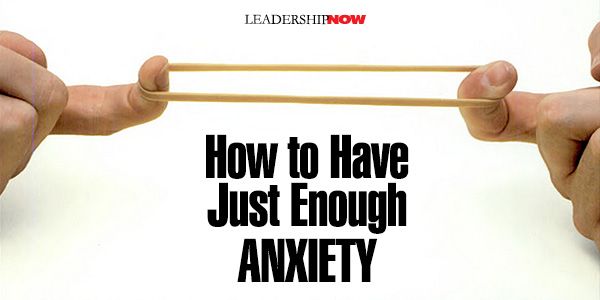
Robert Rosen has written an excellent book on an issue we all deal with—anxiety. It's not a bad thing, but "if you let it overwhelm you, it will turn to panic. If you deny or run from it, you will become complacent." Rosen believes that our problem in dealing with anxiety stems from faulty thinking. In Just Enough Anxiety, he writes, "It goes something like this: Change and uncertainty make me anxious. Anxiety is bad, a sign of weakness. Therefore, I have to avoid change and uncertainty. I have to do whatever I can to avoid anxiety."
Balance comes from a right attitude and a proper perspective. Dealing with anxiety is no different.
The success of great leaders is all about creating the right level of anxiety for growth and performance. It is their uncommon ability to create just enough tension—within themselves and their organizations—that unleashes the human energy that drives powerful leadership, accelerated growth, and winning companies.
What's wrong with having too much or too little anxiety?
RR: Too much anxiety comes from negative thinking. When we feel too much anxiety, we attack change. We become combative or controlling as we try to ease the pain we feel. Too little anxiety is grounded in contentment. When we feel too little anxiety, we avoid change. We value the status quo and believe everything will be okay as long as everything stays the same. If your company is going through tough times like a bad economy or a merger, you definitely don't want too little anxiety.
What exactly is "just enough anxiety"?
RR: The right level of anxiety gives individuals and organizations an emotional charge that helps us thrive in an uncertain world. As we allow ourselves to experience anxiety as our natural response to change, and learn to modulate it, we're able to live in the world as it is instead of struggling to make it what we want it to be. And as we get better at living with just enough anxiety, it becomes the energy that drives us forward, stretches us, and challenges us to be better tomorrow than we are today.
How can leaders manage anxiety instead of letting it manage them?
RR: It starts with self awareness. Leaders who understand what makes them anxious are better able to increase or decrease their anxiety, as needed to create just enough. But, more than that, it has to do with how they relate to change and uncertainty. By admitting what they can and can't control, they're able to take charge of their lives while remaining open to the unexpected. They're at home in uncharted territory. Instead of seeing anxiety as the enemy, they recognize it as their natural companion on the path of change.
![]()
![]() Like us on Instagram and Facebook for additional leadership and personal development ideas.
Like us on Instagram and Facebook for additional leadership and personal development ideas.

![]()


Posted by Michael McKinney at 10:30 AM
Permalink | Comments (0) | Books , Change , Personal Development , Thinking
03.26.08

Making the Impossible Possible
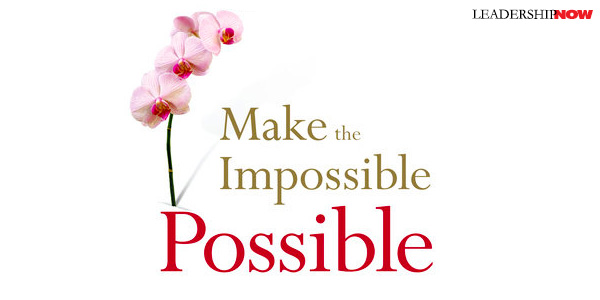
SAMUEL JOHNSON once wrote, "The natural flights of the human mind are not from pleasure to pleasure, but from hope to hope." This statement seems to define Bill Strickland's life. Make the Impossible Possible is an engaging, inspirational book written with humility and passion.
Bill Strickland's life changed when as a boy in a Pittsburgh ghetto, a teacher took the time to show him that he mattered and allowed him to see himself in a new way. (An integral part of any leader's job.) As a result, he became open to opportunities and created at 19 what became the Manchester-Bidwell Center, the now famous arts-education and job-training center for disadvantaged kids and adults. This extraordinary school was built on Strickland's belief that "all of us have the potential to make our dreams come true, and that one of the greatest obstacles blocking us from realizing that potential is that we believe, or are told, that things we want most passionately are impractical, unrealistic, or somehow beyond our reach." He convincingly demonstrates his belief that:
Each one of us, no matter who our parents are, where we live, how much education we have, or what kinds of connections, abilities, and opportunities life may have offered us, has the potential to shape our lives in ways that will bring us the meaning, purpose, and success we long for….I want everyone who comes to this book, no matter what their age or accomplishments or the circumstances of their lives, to rethink their assumptions about what is and isn't possible in their lives, and to convince themselves that they have not only the right but also the responsibility, and the capacity, to dream big and to make those dreams come true.
Strickland narrates his successes and failures, obstacles and opportunities, his thinking and rethinking, as he went about to create the success he has achieved. It's a fascinating story. While he has dedicated his life to helping other people, he denies the do-gooder label. He writes, "I didn't do any of it out of selflessness. I did it to be myself. I did it to enrich my own life, to deepen the quality and meaning of my own experience. I did it because it was a part of what I had to do if I genuinely wanted to be me."
How often have we been burdened by self-defeating assumptions? Strickland writes that "once we accept the idea that poverty is, essentially, the acceptance of meager possibility, we can't deny that all of us are in some fashion poor. We all suffer some form of poverty—poverty of imagination, or courage, or vision, or will. We allow ourselves to be limited by our fears—fear of failure, fear of change, fear of being criticized or of looking like a fool."
This isn't another see-what-I-did self-help book. It's a book that invites introspection. Read it and learn from his experience and thinking.
![]()
![]() Like us on Instagram and Facebook for additional leadership and personal development ideas.
Like us on Instagram and Facebook for additional leadership and personal development ideas.

![]()


Posted by Michael McKinney at 02:41 PM
Permalink | Comments (0) | Books , Personal Development
03.21.08

Changing Your Nature

 PPERSONALITY AND TEMPERAMENT are a group of traits that are only partly genetic. They are affected by social factors but remain stable throughout one's life. But, while our basic personalities don't change significantly after childhood, our behavior can. Psychology Today reports that most traits – like optimism, passion, and joy – can be changed. In Second Nature, author Kathleen McGowan, writes:
PPERSONALITY AND TEMPERAMENT are a group of traits that are only partly genetic. They are affected by social factors but remain stable throughout one's life. But, while our basic personalities don't change significantly after childhood, our behavior can. Psychology Today reports that most traits – like optimism, passion, and joy – can be changed. In Second Nature, author Kathleen McGowan, writes:
Tweaking the way you interpret and react to the world can be a transformative experience, freeing you up to act in new ways. At first, it feels awkward, even bizarre. But with new behaviors come new experiences, creating a feedback loop that, over time, reinforces the transition.Some sought-after qualities are easier to develop than others. Courage, joy, passion, and optimism are among the more amenable to cultivation, but each requires mastering a different—and sometimes surprising—set of skills. To bring more joy and passion into your life, you must paradoxically be more open to experiencing sadness, anxiety, and fear. Learning to think like an optimist, it turns out, is less important than acting like one. And being courageous has nothing to do with how afraid you are: It's a matter of how strongly you feel about your goals. Cultivating these characteristics puts you on the road to that blend of happiness, satisfaction, and purpose that is the height of human functioning, what positive psychologists call "the good life."
British psychologist Daniel Nettle, author of Personality: What Makes You the Way You Are, writing for the BBC, states that when we watch how people respond differently to different circumstances, "something about the way the person is 'wired up' seems to be at work, determining how people react to situations, and, more than that, the kind of situations they get themselves into in the first place. This is why personality seems to become stronger as we get older; when we are young, our situation reflects external factors such as the social and family environment we were born into. As we grow older, we are more and more reaping the consequences of our own choices (living in places we ourselves have chosen, doing jobs that we were drawn to, surrounded by people like us whom we have sought out). Thus, personality differences that might have been very slight at birth become dramatic in later adulthood."
While there is no one best personality to have, each has their advantages and disadvantages, we could do better by getting out of our programmed reactions and try to cover some new ground. Nettle recommends, "If you are an extreme introvert, you might want to challenge yourself to experience the rewards of greater spontaneity and exchange; if you are an extreme extravert, you might want to teach yourself to undertake a long and lonely project that will ultimately be very rewarding. As human beings, we have the unique ability to look in at our personality from the outside and decide what we want to do with it."
![]()
![]() Like us on Instagram and Facebook for additional leadership and personal development ideas.
Like us on Instagram and Facebook for additional leadership and personal development ideas.
![]()


Posted by Michael McKinney at 11:20 AM
Permalink | Comments (0) | Personal Development
02.18.08

Quarrel Not At All: The Stuff of Command
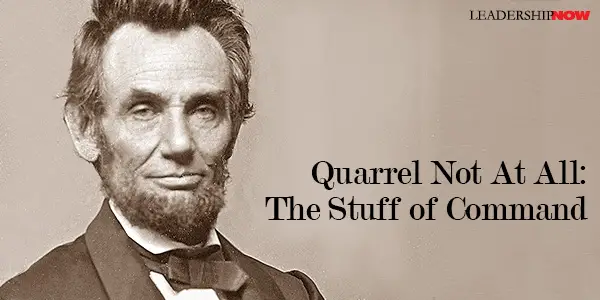

IN President Lincoln: The Duty of a Statesman, the follow-up to Lincoln's Virtues, William Lee Miller, writes that if you knew Lincoln before he became president, you knew that it was part of Lincoln's character to be capable of overlooking slights to himself, but you might question whether he could, at the same time, "command armies and make the demanding decisions of a nation at war."
The stuff of command, especially in a giant deadly conflict, would not seem ordinarily to combine well with the stuff of forbearance and generosity. Executive skill and vigor, like a surgeon's skill, would appear to require a certain withdrawal of empathy. The resolution necessary to great statesmanship would appear to invite, if not even to require, a certain ruthlessness with those whose wills and complex humanity complicate, impede, and even defy one's vigorously pursued purpose.
In a letter to Captain James M. Cutts who had been found guilty in a court-martial of conduct unbecoming of an officer of a gentleman, Lincoln offered this advice:
Quarrel not at all. No man resolved to make the most of himself, can spare time for personal contention. Still less can he afford to take all the consequences, including the vitiating of his temper and the loss of self-control.Yield larger things to which you can show no more than equal right; and yield lesser ones, though clearly your own.
Miller writes:
Interpreting Lincoln, we might say: We overestimate our own interest, and we underestimate our adversary's, so that the advice to yield on all small matters, and on all matters than even to our distorting eyes seem equally balanced, is a moral corrective. Here is a lawyer, and a politician, and a war leader in the midst of tremendous battles giving this surprising advice: quarrel not at all.
Lincoln was a man possessed magnanimity and discriminating judgment, who was able to rise above vindictiveness to win the battles that mattered most. Miller's book on Lincoln holds many lessons for leaders of today. He shows how Lincoln learned to balance his strengths and weaknesses in a way that made him one of the greatest and most respected leaders in modern times.
![]()
![]() Like us on Instagram and Facebook for additional leadership and personal development ideas.
Like us on Instagram and Facebook for additional leadership and personal development ideas.

![]()
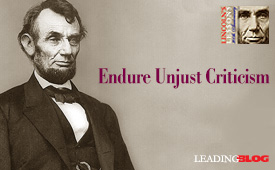
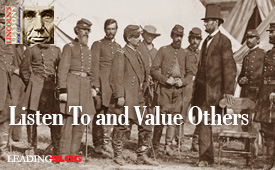
Posted by Michael McKinney at 09:37 AM
Permalink | Comments (0) | TrackBacks (1) | Leaders , Personal Development
02.08.08

What to Do When Things Go Wrong

WHEN THINGS GO WRONG, we often begin by asking ourselves the wrong questions like "Why is this happening to me?" In QBQ, John Miller writes that "our first reactions are often negative, bringing to mind incorrect questions. But if in each moment of decision we can instead discipline our thoughts to look behind those initial questions and ask better ones (QBQ's – the Questions Behind the Questions), the questions themselves will lead us to better results….The answers are in the questions."
When a problem (or a challenge is you prefer) arises, we start looking for some control of the situation. The problem is, we quite naturally begin by looking at those around us and ask the wrong types of questions like "why?" and "who?" The wrong questions take away any control of the situation we might otherwise gain.
In LeaderShock, Greg Hicks suggests that we look for meaning in the situation first. Ask self-revealing questions like:
- What does it say about me that I have this problem—about my practices, my departmental policies, my relationship with customers and staff?
- What can I learn from this?
- How can I make this situation useful to me and my employees?
He adds, "You're on shaky ground if you attempt to fix a problem without first understanding what it means to you and your organization. By looking for inherent meaning, you open a rich treasure chest of valuable gems that lead to new information, insight, and opportunities."
John Miller stresses that the right questions contain an "I" and not "you," "they," and "them." "I" questions lead to action. "Questions that contain an "I" turn our focus away from other people and circumstances and put it back on ourselves, where it can do the most good. We can't change other people. We can't control circumstances and events. The only things we have any real control over are our own thoughts and actions. Asking questions that focus our efforts and energy on what we can do makes us significantly more effective, not to mention happier and less frustrated."
![]()
![]() Like us on Instagram and Facebook for additional leadership and personal development ideas.
Like us on Instagram and Facebook for additional leadership and personal development ideas.
![]()

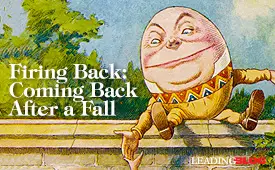
Posted by Michael McKinney at 10:28 AM
Permalink | Comments (0) | Personal Development , Problem Solving
01.11.08

Are You Mature?
Tim Elmore of GrowingLeaders.com wrote an interesting article for his monthly Leadership Link newsletter, about maturity. He noted that for the most part, "this generation of kids is advanced intellectually, but behind emotionally." Intellectually they are exposed to much more sooner than we ever were growing up. But their emotional development is stunted by well-intention parents that hover over their kids—sometimes referred to as helicopter parents—and deny them the necessary pain of maturation.
He also cited another reason. Scientists have found that from ages 11-14, kids lose some of the connections between cells in the part of their brain that enables them to think clearly and make good decisions. The brain is pruning itself. It's ridding itself of ineffective and weak brain connections. This creates a situation where the brain is between the child brain and the not fully developed adult brain which forms around age 20.
Elmore asks, "What does this mean?" "Students today are consuming information they aren't completely ready to handle. The adult part of their brain is still forming and isn't ready to apply all that our society throws at it. Their mind takes it in and files it, but their will and emotions are not prepared to act on it in a healthy way. They can become paralyzed by all the content they consume. They want so much to be able to experience the world they've seen on websites or heard on podcasts, but don't realize they are unprepared for that experience emotionally. They are truly in between a child and an adult."
Elmore lists the qualities that we should begin developing in our own kids (and we might look for in ourselves).
- They are able to keep long-term commitments.
One key signal of maturity is the ability to delay gratification. They can commit to continue doing what is right even when they don't feel like it. - They are unshaken by flattery or criticism.
As people mature, they sooner or later understand that nothing is as good as it seems and nothing is as bad as it seems. Mature people can receive compliments or criticism without letting it ruin them or sway them into a distorted view of themselves. They are secure in their identity. - They possess a spirit of humility.
Humility parallels maturity. Humility isn't thinking less of yourself. It is thinking of yourself less. Mature people aren't consumed with drawing attention to themselves. - Their decisions are based on character not feelings.
Mature people--students or adults--live by values. They have principles that guide their decisions. Their character is master over their emotions. - They express gratitude consistently.
I have found the more I mature, the more grateful I am, for both big and little things. - They prioritize others before themselves.
A pathway out of childishness is getting past your own desires and beginning to live to meet the needs of others less fortunate. - They seek wisdom before acting.
Finally, a mature person is teachable. They don't presume they have all the answers. The wiser they get the more they realize they need more wisdom.
Posted by Michael McKinney at 07:30 AM
Permalink | Comments (0) | TrackBacks (1) | Personal Development
01.09.08

Correct Choices Are the Key to Success
As with Tracy's Flight Plan, we are once again told that there are no shortcuts on the road to success. In Monday Morning Choices, David Cottrell reasonably claims that success is realized by making more good choices than bad ones and recovering quickly from bad choices when you do make them. Making good choices is the trick.
He divides success enhancing choices into 3 areas: Personal Choices (choices people make that will mold their character), Action Choices (choices that move you beyond just talking about what you want to do) and Investment Choices (those choices about investing in people who will make your life better). To help you to develop your skills for making good choices, he has designed a weekly Ben-Franklin-type program that addresses four key choices in each of the three categories. As Monday sets the tone for the rest of the week, he suggests starting each Monday morning with one of the areas and make a commitment to do something different as a result. In brief, the 12 key choices we all need to address are:
- The No-Victim Choice: Don't let your past eat your future.
- The Commitment Choice: Be Passionate Enough to Succeed. Be willing to pay the price.
- The Values Choice: Success often brings enemies. Choose your enemies and your friends carefully.
- The Integrity Choice: Do the right thing.
- The Do-Something Choice: Choose to do something that will make a difference.
- The Persistence Choice: Learn from your mistakes.
- The Attitude Choice: Take the Enthusiastic approach.
- The Adversity Choice: Conquer difficult times. Explore workable alternatives.
- The Relationship Choice: Connect with success and be a mentor for others.
- The Criticism Choice: Embrace tough learning.
- The Reality Choice: Face the truth.
- The Legacy Choice: Be willing to share what you know.
Cottrell has a well thought out chapter devoted to each of the above choices. Each chapter has discussion questions that you can use with your own team each Monday morning.
Posted by Michael McKinney at 09:44 AM
Permalink | Comments (0) | Personal Development
01.07.08

The Real Secret of Success
Brian Tracy has produced another level-headed book with Flight Plan. He correctly asserts that "Every year or two, someone comes along with a book like The Secret, suggesting that there is a quick and easy way to be happy and make a lot of money. According to The Secret, all you have to do is to think and visualize positive thoughts and you will attract into your life all the good things you want. This idea appeals to people who are unwilling to do the hard work that is necessary to achieve anything worthwhile."
Success happens for a reason and it's not wishful thinking. We are all subject to the Law of Cause and Effect: For every effect, there is a cause or causes. You get what you put in. It's as simple as that. It's not luck or mysterious forces. Actually, that should provide some comfort. It means that it is up to you. You're in the driver's seat. Tracy applies the principle well: "If you do what other successful people do, over and over again, nothing can stop you from eventually getting the same results that they do. Conversely, if you don't do what other successful people do, nothing can help you." That's pretty straightforward.
Tracy lays out twelve steps to follow to help you determining and responding correctly to the many hundreds of choices in your journey through life that will help to create the results you're looking for.
- Choose Your Destination: What contribution will you make?
- Review Your Flight Plan Options: You are only as free as your well-developed options. Continually develop options. Hope is not a strategy.
- Write Your Flight Plan: Write down your goals and then resolve to do something every day, without exception, until your goal is achieved.
- Prepare for Your Journey: Leave nothing to chance; plan for every eventuality.
- Take Off at Full Throttle: This is the turning point. Your get out what you put in.
- Plan for Turbulence: Don't be surprised if you run into problems—everyone does.
- Make Continual Course Corrections: You will have to make changes to deal with problems and opportunities that come up. It's okay to change your mind.
- Accelerate Your Learning and Progress: Never stop learning and upgrading your knowledge. Learning new skills that can increase your contribution is like stepping on the accelerator of your own potential.
- Activate Your Superconscious Mind: When you relax completely and let your mind go blank, very often a superconscious idea emerges.
- Avoid Shortcuts and Other Mirages: Be prepared to pay the full price for success.
- Master Your Fears: The mastery of fear and the development of courage are essential prerequisites for a happy successful life.
- Persist Until You Succeed: Persistence is the hallmark of success.
Tracy's ideas are well worth putting into practice as you begin the new year. He writes, "Character is the ability to follow through on a resolution after the enthusiasm with which the resolution was made has passed."
Posted by Michael McKinney at 08:56 AM
Permalink | Comments (0) | Personal Development
01.03.08

Konrad Lorenz on Reflection
In his book, Civilized Man's Eight Deadly Sins, Austrian zoologist and Nobel Prize winner Konrad Lorenz, wrote of what is lost in man's race against himself.
Anxious haste and hasty fear help rob man of his most essential properties. One of these is reflection. . . . A being unaware of the existence of its own self cannot possibly develop conceptual thought, word language, conscience, and responsible morality. A being that ceases to reflect is in danger of losing all these specifically human attributes.One of the worst effects of haste, or the fear engendered by it, is the apparent inability of modern man to spend even the shortest time alone. He anxiously avoids every possibility of self-communion or meditation, as though he feared that reflection might present him with a ghastly self-portrait, such as that of Dorian Gray. The only explanation for the widespread addition to noise—paradoxical considering how neurasthenic people are today—is that something has to be suppressed. . . . I think he [is] only afraid of meeting himself.
Posted by Michael McKinney at 09:50 AM
Permalink | Comments (0) | Personal Development
12.31.07

New Year's Resolution: Get Better

WHILE IT IS TRUE that some people just can't be lead, more often than not, the situation calls for us to get better. Here's a Taoist story retold in the leadership classic, Leaders: The Strategies for Taking Charge by Warren Bennis and Burt Nanus:
When Yen Ho was about to take up his duties as tutor to the heir of Ling, Duke of Wei, he went to Ch'u Po Yu for advice. "I have to deal," he said, "with a man of depraved and murderous disposition. . . . How is one to deal with a man of this sort?""I am glad," said Ch'u Po Yu, "that you asked this question. . . . The first thing you must do is not to improve him, but to improve yourself."
Let's all resolve to get better.
![]()
![]() Like us on Instagram and Facebook for additional leadership and personal development ideas.
Like us on Instagram and Facebook for additional leadership and personal development ideas.
![]()


Posted by Michael McKinney at 12:36 PM
Permalink | Comments (0) | Personal Development
12.17.07

Applied Awareness
In one of this year's outstanding leadership books, Apples Are Square, authors Susan and Thomas Kuczmarski interviewed Lambert & Associates vice-president of Client Affairs Brian Sorge about seeing what isn't there.
"Understanding others involves not only paying attention to what they say, but also when they don't say anything at all," Sorge believes. "I have always been very emotionally intuitive and that is not easy. I think what happens is that you tend to take on people's fear and struggles. It allows for tremendous empathy, but also tremendous stress. I remember during speech class in seventh grade, some of the kids would go up there and be so nervous, and I would get tears in my eyes because I could feel their nervousness. I loved getting up and talking to people and giving a speech and I had no problem with it, but I would feel their pain profoundly."
The authors write, "Good leaders take on the problems of the team. They sense difficulties and out themselves not only in the minds, but also the hearts of those around them. This empathy allows them to develop meaningful solutions that impact people on a personal level."
Sorge adds the most important component to all of this:
"So many people lack what I call applied awareness. You can give me all the awareness in the world, but you also have to be able to translate that into behavior. In corporate America, it is okay to talk about behavior, but difficult to get beyond talking. That level is not deep enough to make an impact. It allows people to feel like they are changing when they really are not. It is very superficial."
Posted by Michael McKinney at 10:16 AM
Permalink | Comments (0) | Management , Personal Development
10.22.07

Never Complain. Never Explain.
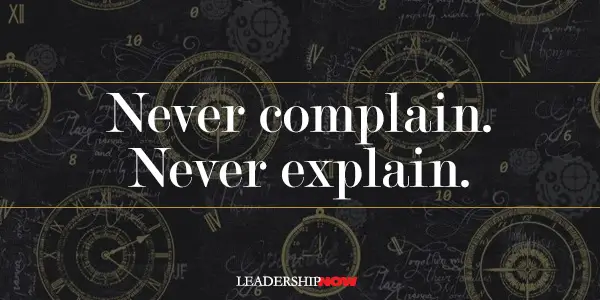
Christine Comaford-Lynch relates the following story in her book Rules for Renegades:
There was once a monk who lived in a tiny hut on a hill overlooking a village. He kept to himself, only coming down to the village for food. In that village, a young woman had become visibly pregnant, and when her screaming father insisted on knowing who her lover was, she named the monk. An angry mob marched up the hill and stormed the monk's hut."You are a disgrace to Buddhism!" they shouted. "All these years we've given you alms and now you impregnate one of our women! You should be ashamed! How dare you call yourself a holy man!"
"Is that so?" the monk said, and returned to his meditation.
Time passed, and the child was born. The young woman's father again marched up the hill and handed the baby to the monk. "Here. You take care of your bastard child. You caused this problem, you live with the consequences."
"Is that so?" The monk said. He accepted the child and returned to his meditation.
After a few weeks, the young woman was overcome with remorse for falsely fingering the monk. She told her father that the monk was not her lover after all, that her true love had left, and she wanted to raise the child on her own. Again her father marched up the hill, this time with townspeople in tow.
"Please forgive our mistake. We are so sorry. What a truly holy man you are for tolerating our cruel words and caring for this child. We will relieve you now of this burden. The Buddha himself is singing your praises in the higher worlds, all the higher beings are smiling down upon you, no greater monk has ever lived."
"Is that so?" The monk said, and return to his meditation.
Whether people are praising you or trashing you, neither changes your intrinsic value. Don't be easily swayed. It reminds me of a statement originally offered by prime minister Benjamin Disraeli, that Henry Ford II once famously said, "Never complain. Never explain." It's good advice. (Although, he probably meant it more as a corollary to the Fifth Amendment than good advice for leaders.) It speaks to accountability—personal accountability.
"Never explain—your friends do not need it, and your enemies will not believe you anyway."–Elbert Hubbard
Although it gives your power to others, there are times to explain to obtain a positive resolution in a relationship. Explaining often draws you into conversations that are a complete waste of time. Silence is often your best friend. The Proverbs tell us, "When words abound, transgression is inevitable, but the one who restrains his words is wise."
Complaining is the outward expression of inner frustration. A complaint acknowledges that something is not as we think it should be. (And that may or may not be true. Quite often we lack all of the pertinent information.) The problem is that we often begin to complain as if that will lead to a solution. It rarely does. Complaining is outward focused and is a form of blaming. The issue is internal. If you can fix the problem, then you should quietly fix it. If you can't, you should change your perspective on it and move on.
Complainers generally have a lot to complain about because they are in fact, complainers. Complaining, explaining and excuse-making extend the time you are embroiled in the issue. It amplifies frustration—your own and others—spreads discontent and discord and generally makes you unpleasant. Jane Austin observed that "those who do not complain are never pitied." Pity, however, is not the goal of a well-adjusted person let alone a leader. Of more value is novelist Cesare Pavese comment that "one stops being a child when one realizes that telling one's troubles does not make things better." Recognize your part, take responsibility and move on.
![]()
![]() Like us on Instagram and Facebook for additional leadership and personal development ideas.
Like us on Instagram and Facebook for additional leadership and personal development ideas.
Posted by Michael McKinney at 10:47 AM
Permalink | Comments (0) | Personal Development
09.26.07

Lord Sharman on Helping People Grow
Leading By Example is a concise little book of interviews with top leaders from various fields. Each interview in this new Harvard Business School series is followed by a list of takeaways. Here is an excerpt by Lord Sharman, chairman of the Aegis Group, on investing in people by understanding their strengths and nurturing them like a gardener with prized plants.
I'm very fond of gardening myself, and I'm fond of gardening examples. To some degree, developing people in an organization is impossible. You can't develop them; they develop themselves, and so your job is like that of a head gardener. You figure out what the various microclimates are around the place, and then you figure out the qualities of the plants that you need to go into those microclimates. Similarly, you select the people based on their strengths and place them in those jobs. I've seen notes of appraisal interviews, which say that two-thirds of the interview is spent talking about what the guy's not good at. Now, that's great—I can't imagine anybody coming out of an interview like that feeling anything other than very depressed.What you want to do is spend time talking about what the person is good at and how he's going to develop that. Sure, see whether you can do something about the weaknesses, but to my way of thinking, appraisal interviews should be two-thirds about what the person is good at and how those great assets can be used within the organization. If you look at good coaches in the sports field—and I've always been fascinated about how good coaches work—they don't actually coach technique very often. The really good coaches are the ones that coach the mind and the attitude.
You'll always have people that find it much easier to be critical than to be encouraging. The tome at the top has to be right. If you start criticizing your colleagues about what they're bad at all the time rather than encouraging them, that's sure as hell going to get down through the organization very quickly.
Posted by Michael McKinney at 09:15 PM
Permalink | Comments (0) | Leadership , Personal Development
09.19.07

Make it Great!

Phil Gerbyshak truly is a relationship geek. That is to say, he is someone who is passionate about creating and building relationships. And he does. From my own experience with him, he does practice what he preaches. He has produced a short little book titled, 10 Ways to Make it Great! He has included 10+ lessons he has learned in his choice to make a life that is great. It is a choice we all have. Phil writes:
Make It Great! means it's my choice, which means it's your choice too. Whether you actually have a good day is not the important thing; what's important is how you choose to deal with the things that each day brings. Each encounter presents you with an opportunity to either let it pass by, or tackle it head on and truly Make It Great!
Phil makes an important point. It's relatively easy to have a great day when things are going your way. The discipline comes in when things aren't going our way. It's easy to use circumstances as an excuse as to why you couldn't do what you know is right—"Don't make me mad!" "I would have but they …." The ball is always in your court. You can find Phil over at Make It Great!
![]()
![]() Like us on Instagram and Facebook for additional leadership and personal development ideas.
Like us on Instagram and Facebook for additional leadership and personal development ideas.

Posted by Michael McKinney at 07:06 AM
Permalink | Comments (0) | Personal Development
09.14.07

Taking It Personally
"Foolish is the person that takes offense when none was intended. More foolish is the person that takes offense when it was intended."
The above statement rings true, because either way we lose. In egonomics, David Marcum and Steven Smith describe the difficulties that arise when we get our identity confused with the topic being debated—when we take things personally. When we get into a vigorous debate, it's quite common to find that we respond to a perceived attack with behavior that indicates our ego is in trouble.
When we respond to a statement or question by comparing ourselves, seeking acceptance, showcasing or getting defensive, it often means that we think our identity is under attack. In other words, we forget about the debate of ideas and respond as though who we are is being threatened and we take it personally. It's not unusual that we have a tough time separating our ideas from our identity? Trial attorney Gerry Spence explains, "We all have a personal image that he must protect. For example, I do not want to be seen by others, and particularly my myself, as weak, as ill advised, as less than worthy, as stupid, as someone who cannot be respected. I will do whatever is necessary to preserve my personal image of myself. The more fragile my self image, the harder I will struggle to preserve it."
Marcum and Smith explain it this way: "If we can't distinguish who we are from what we do, what we have, or who we do it with, we won't see past our titles or tenure in a discussion. If we say to ourselves or others, 'I'm the Vice President,' 'I'm the CEO,' 'I'm the Director of Public Relations,' or even 'I'm the creative one' or 'I'm the advocate for diversity here,' then we're parading our identity, and take it personally."
In egonomics, Marcum and Smith examine an exchange between Fred Rogers and Senator John Pastore at a Congressional hearing to effectively explain this point. It clearly showcases the benefits of maintaining a separation between identity and ideas and keeping your ego in check with humility. They explain, "In the intensity of debate, humility is like a two-way surge protector; it keeps us from making it personal or taking it personally."
Of course, the trick is to avoid this negative response cycle in the first place. The authors borrowed an idea from Carl Rogers to give form to an essential attitude to take when faced with a vigorous debate (or when dealing with people in general). The idea is to treat people with unconditional positive regard. That is to say that "everyone is worthy of respect and capable of contribution, even when they don't particularly act that way or even feel that way about themselves." We want to assure others that we aren't trying to change who they are, but we are interested in presenting another viewpoint.
If you find yourself in a situation where things have gotten beyond productive, then the author's suggest using one of the following opening statements before we begin asking questions:
"You might be right…"
"Even though that's hard to hear, I'm glad you're saying something…"
"Okay. Let's talk that one through."
"Say a little more about that."
It doesn't signal agreement, it expresses a mind open to understanding. Debate needs to follow understanding or people often begin to defend themselves and not their ideas.
Finally, in the spirit of vigorous debate and deepened understanding, humility prompts us to ask, "Who cares if I'm right at this instant if we get it right eventually?" If we're devoted to progress, it doesn't matter who has the answer, but that the answers are found.
In the balance of the book, Marcum and Smith show that shifting conversations from statements and judgments to exploration requires not just humility, but the relentless application of two more principles—curiosity and veracity. They maintain a good blog that is worth checking out also.
Posted by Michael McKinney at 12:33 AM
Permalink | Comments (0) | Communication , Leadership Development , Personal Development
09.12.07

My Life Feels Like a Three-Ring Circus

HERE'S a book for organizations and individuals that struggle with "getting it all done." That is to say, nearly all of us.
Authors Jones Loflin and Todd Musig have put together a memorable and fast-paced story in Juggling Elephants. By bringing out principles designed to help you juggle the acts in your life, and demonstrating through examples, practical tools being applied in the life of the main character, Mark, this book delivers. Here are several of the principles in brief:
![]() The result of trying to juggle elephants is that no one, including you, is thrilled with your performance.
The result of trying to juggle elephants is that no one, including you, is thrilled with your performance.
![]() The ringmaster cannot be in all three rings at once. "I have to give my full attention to the ring I am in an, when it's time, I must move to the other ring as quickly as possible" said the ringmaster.
The ringmaster cannot be in all three rings at once. "I have to give my full attention to the ring I am in an, when it's time, I must move to the other ring as quickly as possible" said the ringmaster.
![]() The key to the success of the circus is having quality acts in all three rings. What ring should you be focusing in on right now—work, relationships or self?
The key to the success of the circus is having quality acts in all three rings. What ring should you be focusing in on right now—work, relationships or self?
![]()
 There is no shortage of acts for the circus. Every act must serve a purpose. "Choosing acts based on your purpose works best when it becomes a habit. It's easy to make a wrong choice based solely on emotion, laziness, convenience, or pressure from others who don't have a good understanding of your purpose. No matter who we are, we can't do it all. That is why it is essential that every act must serve a purpose." Tip: Leave room for interruptions.
There is no shortage of acts for the circus. Every act must serve a purpose. "Choosing acts based on your purpose works best when it becomes a habit. It's easy to make a wrong choice based solely on emotion, laziness, convenience, or pressure from others who don't have a good understanding of your purpose. No matter who we are, we can't do it all. That is why it is essential that every act must serve a purpose." Tip: Leave room for interruptions.
![]() The relationship between the ringmaster and the performers affects the quality of the circus. People have needs that extend way beyond the obvious ones. "An effective animal trainer recognizes that discipline is a small part of the training process. Getting to know the animal is much more important. Once he understands the animal, he can work with the animal's personality instead of always trying to force the desired behavior. It's the same with people. Once you get to know an individual, you can better understand how to fully engage their energies to accomplish a specific goal of task."
The relationship between the ringmaster and the performers affects the quality of the circus. People have needs that extend way beyond the obvious ones. "An effective animal trainer recognizes that discipline is a small part of the training process. Getting to know the animal is much more important. Once he understands the animal, he can work with the animal's personality instead of always trying to force the desired behavior. It's the same with people. Once you get to know an individual, you can better understand how to fully engage their energies to accomplish a specific goal of task."
![]() Intermission is an essential part of creating a better circus performance. "Intermission is a time for the audience to mentally relax, physically stretch, and be better prepared for the second half." We all need to regroup, renew and prepare.
Intermission is an essential part of creating a better circus performance. "Intermission is a time for the audience to mentally relax, physically stretch, and be better prepared for the second half." We all need to regroup, renew and prepare.
![]() Your circus is only as good as your next performance. Get feedback and actively pursue learning experiences. Take the time to get your act together.
Your circus is only as good as your next performance. Get feedback and actively pursue learning experiences. Take the time to get your act together.
![]()
![]() Like us on Instagram and Facebook for additional leadership and personal development ideas.
Like us on Instagram and Facebook for additional leadership and personal development ideas.

![]()


Posted by Michael McKinney at 08:47 AM
Permalink | Comments (0) | Personal Development
09.10.07

Four Warning Signs That Our Ego is Getting the Best Of Us
A managed ego is an important trait of the effective person. Authors David Marcum and Steven Smith state in their compelling book egonomics: What Makes Ego Our Greatest Asset (or Most Expensive Liability), that "surprising as it may sound, many people don't have enough ego, and that leads to insecurity and apathy that paralyze cultures and leaders." This is an important addition to our thinking about ego and worth examining in more depth. It does sound odd as no doubt, most of us have been told that ego is a bad thing. But an unbalanced ego—either overconfident or lacking in confidence—can trap people in bad thinking resulting in poor or damaging interactions with others.
egonomics offers four warning signs that our ego is getting the best of us:
- Being Comparative "When we're comparative, we tend to either pit our strengths against another's weaknesses, which may lead us to an exaggerated sense of confidence, or we compare our weaknesses to their strengths, which can cause negative self pressure.
- Being Defensive "When we can't 'lose,' we defend our positions as if we're defending who we are, and the debate shifts from a we-centered battle of ideas to a me-centered war of wills."
- Showcasing Brilliance "The more we want or expect people to recognize, appreciate or be dazzled by how smart we are, the less they listen, even if we do have better ideas."
- Seeking Acceptance "When we equate acceptance or rejection of our ideas with acceptance or rejection of who we are, we 'play it safe.' We tend to swim with the current and find a slightly different way of saying what's already been said as long as acceptance is the outcome. That nor only makes us a bland follower, but an uninspiring leader."
I believe that these four warning signs crop up in our lives and in the lives of those around us, due more to a lack of a proper ego than an oversized ego. More often than not, a person that appears egotistical is covering for insecurities than they are expressing a genuine belief in their superiority.
Humility isn't the opposite of ego, but it plays a vital role in keeping it in balance. Marcum and Smith created the following diagram to help us to understand the equilibrium concept of humility.
The diagram graphically illustrates the two poles of ego and the grounding effect that humility plays to pull us back into a proper perspective. The authors define humility as the "intelligent self respect which keeps us from thinking too highly or too little of ourselves. It reminds us how far we have come while at the same time helping us see how far short we are of what we can be."
Ego doesn't suddenly pull us to the extremes and twist us overnight into egomaniacs, or lead us to believe we're above the law. But once we're in the habit of being off-center, we do slowly start to believe we're above other things: reproach, being wrong, being questioned, the need to prove we're right, having a bad idea, following the lead of others, and so on. Being consistently off-center leads us gradually toward the extremes.
When we lose control of ego, we lose "trust, respect, relationships, influence, talent, careers, clients, and market share. Each of us has occasionally, perhaps unknowingly, let ego weaken our talents despite our qualifications, expertise, charisma, track record, or remarkable ability."
This is an important book that will be helpful to anyone trying to get a handle on their ego and understand it manifestations in themselves and others. egonomics is a book that every leader should read and one that we will return to again on this blog.
Posted by Michael McKinney at 12:32 AM
Permalink | Comments (0) | Books , Leadership Development , Personal Development
09.07.07

Be Not a Scholar Confused By Your Own Learning
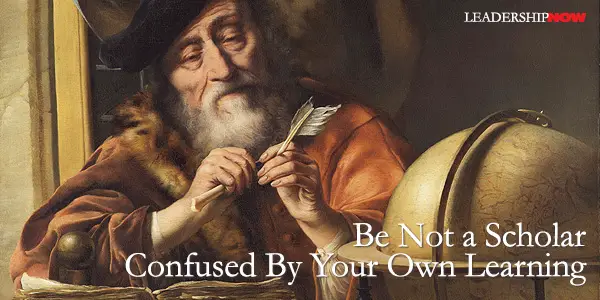
AS ONE studies leadership, I am reminded of Louis Nizer's words to be "a scholar who is not confused by his own learning." It's easy to get caught up in some of the theory, jargon and formulas and find the whole thing inaccessible but to the best minds. Don't get me wrong, I believe that the books, training, and mentoring are essential to opening our minds to think in new ways. But ultimately, leadership development begins with self-knowledge and the development of a disciplined mind and character. It is specific to our varied own backgrounds and situations. There are hundreds of great tools to help you get there, but the only one that can begin the journey, is you.
The late great diplomat, Abba Eban once wrote, "An 'expert' is a man who understands everything—but nothing else. He sometimes becomes immune to the intangible but powerful human impulses that lie beneath the surface of his discipline." Yet, it is in the "intangible but powerful human impulses that lie beneath the surface" where you will find leadership. Fortunately, that is accessible to everyone who makes the effort.
![]()
![]() Like us on Instagram and Facebook for additional leadership and personal development ideas.
Like us on Instagram and Facebook for additional leadership and personal development ideas.

![]()


Posted by Michael McKinney at 11:07 AM
Permalink | Comments (0) | Leadership Development , Personal Development
08.31.07

You Can Change!

WHEN we take personality tests we need to understand that they are snapshots not indictments. They are a point to grow from. It's easy to confuse behavior and personality. Personality is reflected in behavior. But, behavior can be changed. One may be especially competitive. However, one need not be boorish or rude.
In a recent TeleForum presented by LeadingNews, Marshall Goldsmith, author of What Got You Here Won't Get You There, stated that personality testing can lead to stereotyping. To say my personality type is this and is unchangeable is wrong thinking. Executive coaches that believe that people can change are much more effective than executive coaches that do not believe people can change. This may seem like a "Duh!" moment, but it is surprising how many people talk about personality testing as though people cannot change. If you don't believe people can change, coaching is the wrong business for you to be in.
Goldsmith commented on a common misconception surrounding the new emphasis we now see being placed in the build-on-your-strengths movement. The idea of building on your strengths is an effective life strategy but not an excuse. He stated:
The build-on-your-strengths idea makes total sense when it's at the level of the occupation. For example, Tiger Woods should be a golfer, not a stand-up comedian. He's building on his strengths becoming a golfer and he shouldn't be a stand-up comedian. On the other hand, I think what happens on the build-on-your-strengths stuff, is people misinterpret it. So they would say, "Well, Tiger Woods is a great driver, so he doesn't have to worry about putting. He can ignore his putting." He really cannot ignore his putting. It's part of his job. If you're a leader and you're great at strategy but terrible with people, you can't just sit there; if your CEO, and say, "It doesn't matter." It does matter. It all matters. You can't sit there an ignore part of your job and say "I'm not good at that, therefore, I have an excuse to ignore it." All that does is reinforce a useless stereotype.
While most advocates of build-on-your-strengths do not encourage that, Goldsmith is right. The idea is often misinterpreted. We must build on our strengths and minimize activities that call upon our weaknesses, but our weaknesses have to be dealt with. And that requires some behavior modification. Too often it can be taken an excuse to do-your-own-thing and not a position to grow and learn from. We can't let ourselves fall into the trap of saying, "That's just the way I am" because it's hard to change. It may be the way you are, but you can be better. You can grow if you decide to. As a leader, you have an obligation to.
Mark Sanborn said in a recent interview that he thinks most of us "sell ourselves short in terms of the impact that we can have in the world or in the marketplace, or in our homes and communities. We all have the opportunity, and maybe to a degree, an obligation, to take whatever talents we've been given and develop them to the fullest, so that we can more positively benefit and contribute to others."
![]()
![]() Like us on Instagram and Facebook for additional leadership and personal development ideas.
Like us on Instagram and Facebook for additional leadership and personal development ideas.
![]()


Posted by Michael McKinney at 09:20 AM
Permalink | Comments (0) | Change , Personal Development
08.29.07

Max DePree on the Good Work of Leadership
Max DePree reminds us in Leadership Jazz that developing one's leadership just in terms of corporate or institutional needs is not enough. Leaders need to be developing the whole person; polishing all of their gifts. He writes, "Leaders deal in substance and the quality of life, deaf to the calls to pursue quantity and appearances."
Polishing our gifts isn't something we should try to do on our own. Nor is it just about us. It's also about the people around us.
The process first requires that we have an accurate view of ourselves to know who we are and what we believe in. One question DePree asks himself is "What do my family and I need to cultivate to reach our potential?" It becomes a process of broadening and deepening ourselves and through us, those close to us. "Good leadership includes teaching and learning, building relationships and influencing people, as opposed to exercising one's power." He suggests the following activities:
- Make a parallel track for responsible work in your life
- Practice leadership without power — serving on a school board or coaching tee-ball
- Learn your language and use it with respect
- Learn to communicate in public
- Participate regularly in an intellectual pursuit
- Learn who and what gives you health
- Begin to ponder seriously ideas for a second—or third—career
- Ask yourself frequently, "What truly gives meaning to my life?"
He writes, "A rising level of din threatens to drown out the voices urging us to do the good work of leadership, part of which is polishing gifts. This din takes the form of distractions, addictions, and institutional politics. . . . By moving personally and organizationally toward restraint and simplicity, we give ourselves a chance. It really comes down to setting priorities, as banal as that phrase has become."
Posted by Michael McKinney at 08:55 AM
Permalink | Comments (0) | Personal Development
08.22.07

Fast versus Busy in the Age of Speed
Speed aficionado Vince Poscente says we are looking at speed from the wrong perspective. While living in a more-faster-now culture can be a little daunting, it also has the power to enrich our lives by making room for more significant things. In The Age of Speed he writes, "When we harness the power of speed, we not only get more and get it faster, but our lives and work become less stressful, less busy, and more balanced." Crazy idea you say?
We like speed when we're demanding it. We are not so fond of it when it is being demanded of us. You can't have it both ways. If we want speed, we also have to deliver it. Poscente says though, that it doesn't necessarily mean that we have to be buried under more work, more responsibilities and more demands.
We actually can do more in a given time than we could even five years ago. Therefore, the expectations we face to produce faster are often valid. But we don't have to work harder or work longer hours to accomplish more.
"So," Poscente asks, "why do people become irritated and rail against the expectation to speed up?" Here's the key:
Perhaps it's because we don't often use the extra time for more rewarding experiences. Frequently, when we reduce the time it takes to do something insignificant, we end up using the saved time on yet another insignificant activity. If you figure out a way to save time at the bank and the grocery store, for example, do you earmark that time for something more rewarding, or do you just fill that time passively with other responsibilities that pop up? The latter scenario would leave anyone feeling exhausted, burnt out.
I think we have all been guilty of that. He explains:
Speed is a great solution for increasing income and productivity, but those benefits are only one piece of the picture. The bigger reason we should speed up is to make time for meaningful experiences. Speed is not just the way to get more work done—speed is the secret to having time to do what we want.
Poscente say we can speed up and still have the time to smell the roses. We need to know when speed will and will not benefit us. Are there ways you can approach what you do in a different way that would allow you to spend more time with your priorities, strengths, talents, and passions?
Posted by Michael McKinney at 10:46 AM
Permalink | Comments (0) | Books , Personal Development
08.20.07

The Power of Thinking Twice
Human freedom involves our capacity to pause, to choose the one response toward which we wish to throw our weight.—Rollo May
Les Parrott claims that "three seconds separate those who 'give it their all' from those who 'don't give it a thought' — literally. Three seconds. This brief buffer is all that stands between those who settle for 'whatever' and those who settle for nothing less than 'whatever it takes.'"
In his book, 3 Seconds: The Power of Thinking Twice, he presents six impulses that never pay off. The impulse to …
Give up before trying . . . because we feel helpless.
Shun a challenge . . . because it seems daunting.
Settle for the status quo . . . because we lack vision.
Shirk responsibility . . . because it's easier to shift blame.
Do the mere minimum . . . because that's all that's expected.
Avoid taking action . . . because we fear failure.
If we routinely don't give any one of these a second thought, they can lead us to lives of mediocrity. From Parrott's perspective, it comes down to taking a moment to leverage the three seconds it takes to decide whether to behave in a manner consistent with what you really want or to give in to one of these self-sabotaging impulses.
Fundamental to all of this is taking personal responsibility. "And many times, you have to shoulder the blame, not because you personally did anything wrong, but on behalf of the company. The best way to do this us to focus not on who's wrong, but on what's wrong."
Taking ownership for something often involves an apology. But a simple "I'm sorry" will sound hollow unless you've taken the three elements of an apology into account. First, you've got to understand what's wrong. Get what's wrong right. Second, you then have to admit to it. "Don't make anyone drag an admission of what's wrong out of you." Finally, you need to rectify the situation. You need to do something to try to make the situation better. I would add that not all wrongs can be righted. Nor should we expect them to be. It is a very inward-directed individual that always demands their pound-of-flesh.
Posted by Michael McKinney at 09:08 AM
Permalink | Comments (0) | Books , Personal Development
08.15.07

It's Not About Me?!?
In The Ring in the Rubble, Gary Brandt brings up something that can hold us back from defining our problem, immobilize us, and block us from finding solutions.
It's an attitude that is easy to slip into and the last thing we want mentioned when we are in trouble. But if we can deal with it now, we can have a better chance of avoiding it when we are in trouble. He writes:
We tend to think that what we see is reality, and to forget that there is a much bigger world out there that, if we considered it, would put our situation into perspective. When we forget this, we tend to take our own perspective a little too seriously, and in the process, we take ourselves too seriously as well.
Brandt suggests that a well-developed sense of humor makes a good antidote.
Posted by Michael McKinney at 08:25 AM
Permalink | Comments (0) | Books , Personal Development , Problem Solving
08.13.07

Dilenschneider: Power and Influence
Public relations guru Robert Dilenschneider's excellent new book, Power and Influence: The Rules Have Changed, is worth your time because it is filled with a lifetime of wisdom about how to get along with others—a skill that is at the heart of leadership. He presents ten rules to think about and apply variously to your own situation. I think the most important ideas coming from these rules revolve around how to adapt to your changing world and situation, the importance of knowing how to be relentless and the need for civility and humility.
Rule Four is Seize the Opportunity in Every Crisis. All of us experience some crisis of one form or another, at any given moment in our lives. The big question is how we handle it. Dilenschneider writes, "The ability to survive in an uncertain time is critical…. [A] big part of power lies in knowing the moment to move. It's not being all over he place all the time; it's knowing that one critical instant to move, taking action, and getting the result." He asked his friend, power player Alan Goodman how he viewed power players and their ability to respond to a crisis:
They are not impressed with power, and they are not concerned with power. They are concerned with ideas and impact. To me, that's the biggest lesson I've learned from the people I've met. Their focus, and the focus of any of us that are lucky enough to lead an institution, has got to be what you do with it. How you make the world less dangerous, how you make your community a better place, how you energize people to get their ideas, because you don't have all the ideas yourself. The best leaders focus on getting the best ideas and then doing something with them.
Here's a few other lessons from Dilenschneider:
LESSON: For a power player, it's important to reach out to the shoeshine boy as well as the CEO. In fact, sometimes it's more important to reach out to the shoeshine boy so that the CEO sees that you're a person of the people, a person who's generous, who's humble, who's willing to do outreach.
LESSON: What is it like to be with these men and women of power? With the best of them, it is terrific because they are essentially humble people who understand their own shortcomings.
LESSON: Keep your friendships, nurture them, and don't expect anything in return. At the same time, when someone else has a problem, help that person instead of shying away from him or her. Most people tend to look at people with problems and say, "I want to avoid those people." The time to go to people is when they're down and out. They are unlikely ever to forget your goodwill.
Like us on Facebook for additional leadership and personal development ideas.
Posted by Michael McKinney at 10:58 AM
Permalink | Comments (0) | Books , Personal Development
08.10.07

What Should I Be Thinking About?
Mark Sanborn (author of, among other things, You Don't Need a Title to be a Leader) wrote a good post on his blog about digging a little deeper to find those things to think about that will really make a change in our lives. We often don't give attention to those things that have become familiar to us. Familiarity breeds contempt and so we tend to gloss over those things in search of the big thing. In actuality, it is the little everyday life issues, that when acted upon, will have the greatest long-term effect on our life.
Sanborn challenges us with an important question: "What in my life, that I can influence or control, should I be giving serious thought to today? That would include things like relationships, family issues, financial planning, career choices, health and exercise, and one of my favorites, the difference between activity and accomplishment."
He adds, "The agenda set by print and broadcast media don't always focus us on what we need to be thinking about. The only person who can determine the appropriate thinking agenda for your life is you."
Posted by Michael McKinney at 04:12 PM
Permalink | Comments (0) | Personal Development

Letting Go of Worry About the Future and Resentment From the Past
Gary Brant asks us in his book The Ring in the Rubble, to look at how we are perceiving change in our life. He writes that "change is the great equalizer; it affects all of us. Organizations that view change as an opportunity and aggressively seek to find and capitalize on it, win. Those who don't fall behind and are doomed to forever play catch-up.
"This applies to your personal life as well. Whether you're facing a new marriage, divorce, birth, death, or illness, it's not the change itself that dictates the results we get, it's how we perceive and handle that change that makes all the difference."
For his metaphor, "the ring represents the valuable opportunities that change always creates. The rubble symbolizes the disruption, fear, and uncertainty that change almost always stirs up. My goal is to help you find the rings in the rubble of whatever changes you face, both at work and at home."
Our perceptions of events in our life are based on how we view our world – our attitude. Sometimes our attitude is based in reality, but you would be surprised how often it is not. Often these false assumptions block us – and our organizations - from seeing things as they are and advancing to our full potential. Brant asks a series of questions to help us get at the emotional issues of regret and worry that are holding us back from taking positive action that is worth reviewing from time to time:
- What are you holding on to that in reality is holding you down or holding you back?
- What are you worrying about incessantly that hasn't happened yet?
- What do you gain by holding on to the past or worrying about the future?
- Are you willing to feel vulnerable by setting down your sacks of regret ("Only if") and worry ("What if?")? Ultimately, who is hurt if you refuse to surrender them?
- What is one thing that you can do in the next 24 hours that will lighten your load? Write it down and/or tell someone about it to help hold yourself accountable for carrying it out.
Posted by Michael McKinney at 09:03 AM
Permalink | Comments (0) | Personal Development
07.13.07

Seeking Balance
I wanted to share some of the commencement remarks by Columbia University president Lee Bollinger as I found them valuable to life and leadership.
He is speaking of the importance of seeking balance in our life. He says, "Life is always a matter of seeking a balance, a balance that's right for the world and a balance that's right in our personal lives. Life is almost never perfect, only in balance or out of balance."
Bollinger stresses the role imagination plays in finding and maintaining that balance. Here are some edited excerpts to provide a little food for thought:
[Imagination] is something different from knowing things and being able to reason. It's the part of the mind that creates stories, that feels what it's like to be someone else (and so much so that for a moment you become that other person), that grasps the essence of a human dilemma, that eagerly absorbs the complexities of complex matters, that can see how people change in different circumstances, that is always trying to improve on things, that can conceive of a world different from the one we are living in.We hear it from our Nobel Prize-winning economist Edmund Phelps, who teaches us that mental stimulation, problem-solving, and personal growth are the sine qua non of a thriving economy.
This is the key point: Our imaginations have trouble seeing their potential, and can do so only when we try ourselves and then compare our achievement against a greater achievement, and then repeat the process again and again.
Our New Age is so very much in need of imagination. The potential, as we have said, is so high now at the beginning, yet the problems ahead are already so massive, too. When the Arctic sea loses a chunk of ice the size of Texas, we have a sense things are not in balance.
When a billion people still have none of the benefits of modernity and face premature death and a life of squalor, we know things are not yet in balance.
When millions of people have stagnant incomes or face the dislocations of loss of employment, because of the shifting patterns of trade, we know there is still much too much imbalance.
When we barely understand the history, religious and cultural beliefs, and aspirations of other major societies around the globe, we know we have an imbalance of trade in knowledge.
And if the world — or our own lives — seem out of balance, it may be because the temptation to see things in a simple binary form — up or down, good or evil, right or wrong — is stoked every day by a culture that wants us to do anything but think too hard about the issues that matter so much.
Seeking balance too, requires keeping a long term view and personal integrity with our values and beliefs. Even in thinking about today's big issues, it's all too easy to jump on the band wagon of the latest speech, the newest study, or an organization's well-rehearsed agenda. These issues are complex and need to be thought through in a well-ordered manner.
Leader's need to encourage balance in those they lead too. Lack of balance in the workplace leads to many of the hidden costs organizations face—sick days, mistakes and burnout. On a personal level, it's important to step back and ask yourself if in your drive for personal "success," if you are paying too big a price in your relationships with those around you, your family, friends, your health and your own personal development.
Posted by Michael McKinney at 01:04 PM
Permalink | Comments (0) | Personal Development
06.27.07

Career Planning: Do it Directionally
Norman R. Augustine, retired chairman and CEO of Lockheed Martin Corporation, advises you not to plan your career too carefully or in too much detail because you might miss the opportunities right in front of you. The best you can do is to know generally where you are going and be prepared for anything. He writes in Augustine's Travels, "It's just not useful in my experience, to try to plan an entire career in detail. There are just too many changes ahead, too many things that are going to happen that you can't anticipate."
He shares a story told to him by Don Fisher, founder of the Gap:
Some Years ago, Fisher, who was in the real estate business, went to a store and bout a pair of Levis. In too much of a hurry to try them on, when he got home he discovered they were an inch too short. He took them back, but the store where he'd bought them had such a small selection that they couldn't accommodate him. Knowing that the ubiquitous Levis had to be stockpiled somewhere, he became so frustrated that it gave him an idea.He called the company at its headquarters in San Francisco and offered them a deal: If they would agree to supply him, he would open a store that had the largest selection of their products ever offered for sale in one spot. Fine, said the company, and thus the Gap was born. Don later told me, "If my pants had been an inch longer. I'd still be in real estate instead of owning The Gap!"
Posted by Michael McKinney at 12:13 AM
Permalink | Comments (0) | Personal Development
05.29.07

The New Golden Rule
Do we need a new Golden Rule? It's not uncommon to find in modern literature, the call for a new golden rule. Is the Golden Rule adequate in today's world?
The Golden Rule says, "Do unto others as you would have them do unto you." Some would say that this just isn't enough: in our global village, we need to consider cultural differences and the desires of others. This thinking suggests that we humans have never found ourselves in a multicultural setting before now.
The new Golden Rule goes something like this: Do unto others as they would have you do unto them. The need for a change really reflects a narrow view or understanding of the original intent of the Golden Rule.  In fairness, calls for a new rule points to the very real need to explain the intent of the original. That it should and would need to be explained properly to each succeeding generation is a fact of life.
In fairness, calls for a new rule points to the very real need to explain the intent of the original. That it should and would need to be explained properly to each succeeding generation is a fact of life.
It should be noted that the term "Golden Rule" does not come from the Bible. However, the Bible does say that whatever you want men to do to you, do also to them. The rule has been stated in many ways for millennia. Almost 4000 years ago, written on papyrus, we have from the Egyptian story, The Tale of the Eloquent Peasant, "Do for one who may do for you, that you may cause him thus to do." Similarly, the Roman statesman and philosopher Seneca instructed leaders to "Treat your inferiors as you would be treated by your superiors." (Epistulae morales ad Lucilium 47:11) Clearly, human nature hasn't changed much.
Rules are tools designed to get our thinking and behavior to a place that we might not naturally go to on our own. As a rule, the Golden Rule is no different. It is an attempt to guide us to the thinking behind the rule so that it is manifested in our behavior.
The Golden Rule is an introduction to a lesson on responsibility, awareness, ethics and outgoing concern for others. The principle the rule is trying to get at is one of selfless service to others. We naturally look at things from our own vantage point. So it's not surprising that we look at the rule selfishly as well—from our own viewpoint.
The rule has within it the implicit instruction to treat others thoughtfully—in the same manner of outgoing concern—as you would like them to treat you. Certainly none of us would want others to treat us in a way that shows disregard for our personal needs and feelings. The principle of the Golden Rule is selflessness. It is not meant to imply that you should do for others exactly what you want them to do for you. It's not about you.
This rule is about how to treat others. It's not a manipulative behavior to get others to do something for you. It's an approach to how you should be treating others regardless of how they treat you. It's not a training behavior to get others to do a specific act for you. "I did this for you, so now you should do this for me." We are to treat others—in the same manner—as we would like to be treated by anyone we come into contact with.
The Golden Rule is a lesson that can hardly be introduced to children soon enough. It's a prescript that should be followed throughout life. This is a tall order, but something every leader should strive to develop. It is the essence of service and servant leadership. Properly understood, the Golden Rule encompasses cultural and personal differences.
Certainly, the intent of modern literature on this issue is to jog our thinking from a self orientation to an other orientation in our dealings with others. As is, the Golden Rule, if practiced, would go a long way to improving our relationships.
Posted by Michael McKinney at 09:05 AM
Permalink | Comments (0) | Ethics , Leadership , Personal Development
05.25.07

Developing a Respectful Mind
Howard Gardner writes in Five Minds for the Future, "Adolescents have potentials for leadership, or for enterprise, that can be marshaled for diverse ends; it is up to their elders—parents, educators, community leaders, slightly older and more mature peers—to influence how these potentials are mobilized." This is a significant thought worthy of repeated reflection. It describes the process of character development throughout our lives. We might consider what functions we occupy and the influence we are having on others.
In any event, Gardner believes that the mobilization of these potentials should progress in five directions that can be manifested in five minds. They are: the disciplined mind (a mind trained on a specific scholarly discipline, craft or profession), the synthesizing mind (a mind that can create value from information), the creating mind (a mind that can break new ground), the ethical mind (a mind that contemplates meaning in work and life and then acts on it) and the respectful mind (a mind that welcomes differences between group and individuals).
Looking specifically at the respectful mind, he writes that "rather than ignoring differences, being inflamed by them, or seeking to annihilate them through love or hate, [he] would call on human beings to accept the differences, learn to live with them, and value those who belong to other cohorts."
The respectful mind, like the other four qualities of mind, Gardner believes is a kind of thinking or attitude we will need to have to thrive during the eras to come. He says "eras to come" because while we have always needed this quality of mind, it has been a kind of option. Meaning I assume, that the repercussions of not having it were better contained in times past. However, today we are so interconnected that our very survival depends on it. In a global sense he is right.
While all of these minds interact with each other, the respectful mind, I believe, would seem to be the cornerstone. Without it we limit our input—distance ourselves from reality—and virtually assure that we are not effective with others. Consequently, the respectful mind is the first mind we should seek to develop in children and demand from ourselves.
Posted by Michael McKinney at 12:22 AM
Permalink | Comments (0) | Books , Leadership Development , Personal Development
05.22.07

Do You Have All the Answers?
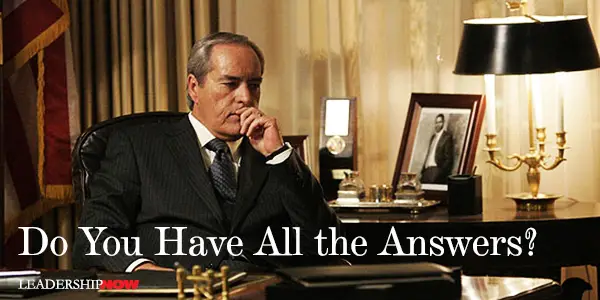
THE President of the United States, on the Fox TV show 24, made a comment regarding leaders and followers that we all—celebrity or not—should consider before trying to weigh-in on the decisions that any of our leaders make.
We all too often offer opinions on what should have been done in hindsight based on such limited information. This doesn't mean that we should be blind followers, but that any criticisms we have should be tempered with humility and an understanding that the information we have at our disposal is most often simplistic at best. We should judge the way we would want to be judged.
On the show, President Noah Daniels reflected, "You know Tom, it's easy to think you've got all the answers when none of the ultimate responsibility lies with you. But sittin' in this chair.… Until you sit in this chair, you don't know anything."
How true and how easily we forget.
John F. Kennedy once said, "No one has the right to grade a President—not even poor James Buchanan—who has not sat in his chair, examined the mail and information that came across his desk, and learned why he made his decisions."
Michael Watkins wrote on the Harvard Business Review site about a circular prison design whereby the inmates could be observed by a centrally-located warden. "The prisoners were unable to tell at any given moment whether or not they were being observed. The goal was to create what Bentham described as a debilitating 'sentiment of an invisible omniscience' and 'a new mode of obtaining power of mind.'"
As a society, are we moving to such an Orwellian approach to others? He observes:
But we are hurtling toward something that could be far worse, the multitudes observing every act of the powerful, waiting (even hoping) for the fatal flaw to emerge, and then inciting the web-based mob to cry for blood.When do we cross the line from appropriate safeguards to paralyzing surveillance?
![]()
![]() Like us on Instagram and Facebook for additional leadership and personal development ideas.
Like us on Instagram and Facebook for additional leadership and personal development ideas.
![]()
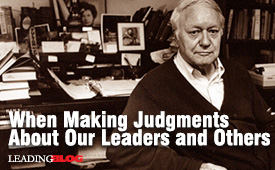

Posted by Michael McKinney at 08:49 AM
Permalink | Comments (0) | TrackBacks (1) | Personal Development
05.10.07

Embracing The Dip
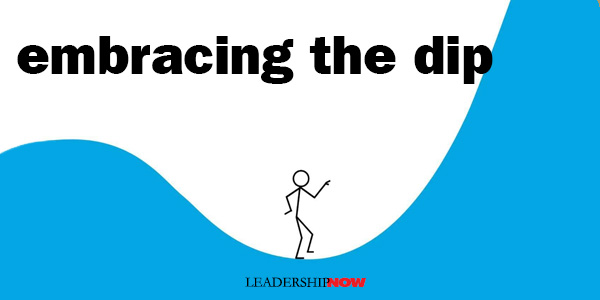
Seth Godin is a perennial favorite because he is among other things, what Saul Bellow called, a first class noticer. He gathers information and makes valuable and practical meaning from it. He doesn't skip the hard questions. His book The Dip: A Little Book That Teaches You When to Quit (and When to Stick) is no exception.
What is The Dip you ask? Seth defines it as "the long slog between starting and mastery. It's any rough patch you have to get through before achieving your big goal . . . if in fact you're chasing the right goal." This short read – 86 pages – is really about understanding what needs to be done to make the move from mediocrity to greatness. It's about quitting what gets in the way of you being the best. As Seth points out, it takes a lot more than saying, "I want to be the best." It also means letting go of those things that for you are dead-ends. Quitting those things where you are wasting your time and energy and refocusing your resources in The Dip – that place where you can achieve the greatest accomplishment. This isn't a new idea, but it is the best, most memorable presentation I have ever seen of it.
Strategic quitting is the secret of successful organizations. Reactive quitting and serial quitting are the bane of those that strive (and fail) to get what they want. And most people do just that. They quit when it's painful and stick when they can't be bothered to quit.
Finding and successfully moving through your Dip is really a matter of counting the cost. Consider first, if you have the resources to carry on and then, if you succeed, is it worth the effort?
The Dip is why everyone is not doing what you're doing. It is also why you are not the "best in the world" at what it is you do. It's where most people get stuck. Anything worth doing has a Dip. The Dip is actually a good place to be Seth says because if you can get through it, you can win where most others quit. So, you want to find your Dip.
It's the incredibly difficult challenges (the Dips) that give you the opportunity to pull ahead.
If you're looking for some inspiration you might try reading New Ideas from Dead CEOs by Todd Buchholz. He writes: "Each of these CEOs failed at some point. Faced with bankruptcy and defections, they could have succumbed to psychological depression or the siren call of politicians offering class warfare. He each heard nos, the tsk-tsks of friends, and a schadenfreude chorus scoffing at their failure. But they pushed on, energized by passion, ego, money, and the promise of glory. You cannot build a successful business or economy on the kindness of strangers. These CEOs relied on more dependable, more human drives. Drives that took them on fascinating rides." In short, they embraced the Dip.
Here's a tip. If you can't measure your progress, if you feel like you are working harder and harder to get nowhere, then you're probably putting your efforts into a dead-end initiative. You have the wrong strategy. You need to let go and find your Dip. With a little introspection, this has the potential to be a life changing book. Take the time to read it and apply it. You can read it in one sitting but you'll think about it for days.
A few people will choose to do the brave thing and end up the best in the world. Informed people will probably choose to do the mature thing and save their resources for a project they're truly passionate about. Both are fine choices. It's the last choice, the common choice, the choice to give it a shot and then quit that you must avoid if you want to succeed.
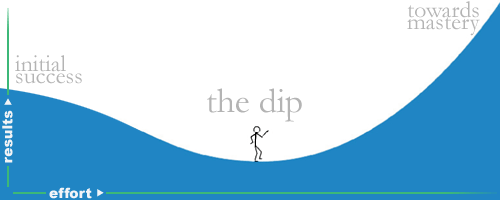
![]()
![]() Like us on Instagram and Facebook for additional leadership and personal development ideas.
Like us on Instagram and Facebook for additional leadership and personal development ideas.

![]()
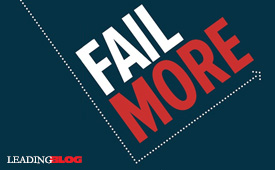

Posted by Michael McKinney at 12:15 AM
Permalink | Comments (0) | Books , Personal Development
04.17.07

First, Take a Look at Yourself
When things aren't going right we tend to look around for the cause of the problem and blame others. What we should be doing is looking at ourselves.
One skunk's Ah-Ha experience:
"I always thought they didn't want me around because I was a skunk, well...you know it turns out they didn't want me around because I was a jerk."
Posted by Michael McKinney at 12:06 AM
Permalink | Comments (0) | Personal Development
04.13.07

The Courage to Initiate
Relying on a single person to lead the charge reflects a dysfunctional concept of leadership. It sets up expectations that can't be met. No one person can do everything. No wise leader would. Leadership is a group activity. There is an implied interdependency.
Everyone has the capacity for leadership. Often what most people lack is the courage—the courage to initiate. Initiative means moving outside your comfort zone. It means seeking out opportunities and being willing to act.
Nearly everyone can see a need or see where changes need to be made. What is uncommon though, are people who are willing to take the initiative; to do something about it. Leadership is not always seen in the brightest or the most talented, but it is always found in the courageous.
You may not be able to be the CEO but you should think as the CEO. The CEO mindset involves taking the time to think about the forces that are shaping the future of both you and your organization. Managing yourself in this way is important not only to the organization but also to your own personal development.
Posted by Michael McKinney at 08:35 AM
Permalink | Comments (0) | Leadership Development , Personal Development
04.04.07

Tyranny of the Urgent
It is easy to succumb to the tyranny of the urgent. There is always something competing for our attention. Worse still we might find we have to deal with what Michael Watkins calls pyromaniacs—those people like to create fires for you to put out. The only way out is to get some perspective. In White Hat Leadership, author Ty Warren writes about the importance of making time to disengage:
Part of preparing to lead is recognizing when to step away to recharge. Most of us have experienced the benefits of taking time away from the office (or family) for a few days, then returning with new energy and a better perspective.Stepping away allows us to work through issues and problems without the stress induced by a sense of urgency. It is usually in these moments of relaxation that we generate objective solutions. We must go away to return with clarity.
Those who feel task saturated are the very people who need to step away most.
Leaders must have time to think or they will likely forfeit their ability to lead. Task saturation causes us to react rather than respond. Reaction is a mechanical, almost involuntary reflex to events. It comes from the primal areas of the brain and does not involve real thought. Response is initiated from the cognitive regions of the brain. Reaction is normal for the task-saturated person; response comes from the leader who makes certain to allocate time for cognitive consideration.
The urgent will always be with us. How we handle it will determine how effective we are. Michael Watkins offers five strategies to help you deal with the urgent on his blog.
Once we begin to let the urgent take over the important we loose perspective and get sucked into a cycle that perpetuates the problem and drains us. Without direction, we mistakenly find ourselves trying to compensate by going twice as fast. We must take time out to think. The perspective you gain will help you to handle everything you do better.
Are you part of the problem? Do you create fires for others to put out? Take the "Are you a pyromaniac?" quiz.
Posted by Michael McKinney at 04:51 PM
Permalink | Comments (0) | Leadership , Personal Development
04.02.07

Talent is Never Enough
"Talent is cheaper than table salt. What separates the talented individual from the successful one is a lot of hard work."—Stephen King
In John Maxwell's valuable new book, Talent is Never Enough, he cites Peter Drucker on effectiveness, "There seems to be little correlation between a man's effectiveness and his intelligence, his imagination, or his knowledge...Intelligence, imagination, and knowledge are essential resources, but only effectiveness converts them into results. By themselves, they only set limits to what can be contained." "If talent were enough," Maxwell writes, "then the most effective and influential people would always be the most talented ones. But that is often not the case."
Talent might get you noticed but it won't keep you there. Success requires hard work. To achieve the effectiveness that Drucker is talking about and to turn talent into results is matter of choice. Maxwell writes, "The key choices you make—apart from the natural talent you already have—will set you apart from others who have talent alone." He has identified 13 choices you can make to maximize your talent. These choices form the framework of his book:
• Belief lifts your talent: Lack of belief in yourself can act as a ceiling on talent.
• Passion energizes your talent: A passionate person with limited talent will outperform a passive person who possesses greater talent.
• Initiative activates your talent: Socrates said, "To move the world we must first move ourselves."
• Focus directs your talent: Attempting everything, like attempting nothing will suck the life out of you.
• Preparation positions your talent: Becoming more intentional. You can claim to be surprised once; after that, you're unprepared.
• Practice sharpens your talent: Practice demands discipline and embracing change.
• Perseverance sustains your talent: People who display perseverance keep a larger vision in mind as they toil away at their craft or profession.
• Courage tests your talent: As we develop our talent and grow to our potential we will be tested continually. Courage is an everyday virtue.
• Teachability expands your talent: Teachability is not so much about competence and mental capacity as it is about attitude. It is the desire to listen, learn, and apply. Talented people can be the toughest to teach because they often think they know it all. It's a problem of pride.
• Character protects your talent: People cannot climb beyond the limitations of their character. Talented people are sometimes tempted to take shortcuts. Character prevents that.
• Relationships influence your talent: Life is too short to spend it with people who pull you in the wrong direction. And it's too short not to invest in others. Your relationships will define you.
• Responsibility strengthens your talent: Responsibility not only improves your life, but also will improve the life of those around you.
• Teamwork multiplies your talent: Teamwork divides the effort and multiples the effect.
"Make these choices," Maxwell encourages, "and you can become a talent-plus person. If you have talent, you stand alone. If you have talent plus, you stand out."
Posted by Michael McKinney at 09:54 AM
Permalink | Comments (0) | Books , Personal Development
03.28.07

Blind Spots: The Strategies for Clear Sight
What are blind spots? Claudia Shelton, author of Blind Spots: Achieve Success by Seeing What You Can't See, explains that they "are patterns of thinking, feeling and behaving we often do unconsciously that can negatively influence our relationships with other people. They often show up when we are under stress and overuse our greatest strengths. So why are blind spots a big deal? Blind Spots can become possible problems in our working processes and relationship and if left unchecked, they can become serious obstacles to our progress.
Shelton has developed a plan to help us develop what she terms Clear Sight by first recognizing our blind spots and then turning them into strengths. This book is an excellent tool to help you to see yourself differently and thereby increase your self-awareness. What you don't see is holding you back. She presents five strategies for turning each of the five most common blind spots into strengths. Here is an overview:
Identify Your Strengths
Not being clear about your strengths is a major blind spot. It can undercut your confidence and reduce your energy and vitality. Your strengths are the anchor of your self-confidence.
Check Old Habits
Old habit blind spots are often developed in adolescence when they prove successful in helping us reach our adolescent goals. Blind spots may keep us from realizing that these old habits are not part of who we are; they are just habits that do not serve today's goal. They block us from developing a clear sense of who we are. Old habits are hard to recognize because they are so familiar to us and so comfortable.
Address Stress
We may be experiencing stress that we believe others can't see. They do see it and it interferes with our goals and relationships. Importantly she cautions, "Constant unchecked stress can make us inflexible, overusing our strengths, increasing our blind spots, and undercutting our relationship every day." We most often negatively express the stress we feel by criticism, anger and mood swings.
Tune Your Radar
We need to be aware of the nonverbal cues we send out, as well as recognize the non-verbal cues others are sending. When we communicate conflicting non-verbal signals, we lose influence. "When our radar is tuned, we synchronize what we say with how we say it in a way that has positive impact."
Connect With Others
Our integrity and trustworthiness are often perceived by our ability to connect with other people effectively. "Connection is more than just information sharing….To connect, we need to be able to bring ourselves into the present moment."
Shelton provides techniques to help you with the principles outlined here. She suggests however, that you focus on only one or two at a time as more than that can become a bit overwhelming.
A Blind Spots Profile and a Blind Spots 360° questionnaire and Workbook are available for purchase on the WhatsMyBlindSpot web site. The tool helps individuals to recognize their strengths—and the potential blind spots that can appear when those strengths are overused. in advance so they can stay working from their strengths. It can be done free (short version) or for $34.99 (long version with early warning signs for blind spots and plans of attack to turn them into strengths) by going to the WhatsMyBlindSpot web site.
Posted by Michael McKinney at 12:58 AM
Permalink | Comments (0) | Books , Personal Development
03.09.07

Our Strengths Are Not to Be Indulged, But Managed
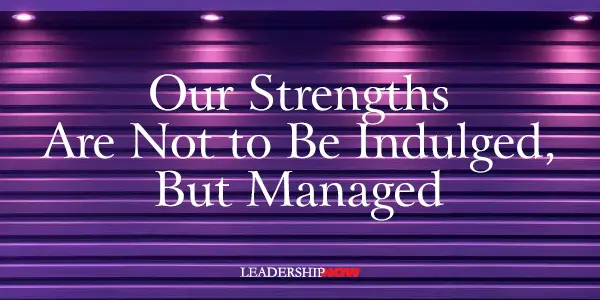
IN Marcus Buckingham's book, Go Put Your Strengths to Work, he presents three myths that we need to deal with in order to make the most of our strengths. The first myth is, "As you grow, your personality changes." The truth Buckingham says is, "As you grow, you become more of who you already are." As it is presented, there could be some confusion. There are a few issues that need to be considered.


There is personality, there is behavior and there are attitudes. Although they are dependent on each other and intertwined, they are not all the same thing. In any discussion about any one of them, we have to be careful about what we are talking about.
We all have traits that become more apparent as we grow and develop. These traits and talents—strengths—do not change over our lifetime. On the other hand, our behavior and attitudes can be altered, overhauled, modified, transformed or ignored. A scrooge can become generous. An approach that says, "Hey, that's just the way I am" is a recipe for self-destruction.
Buckingham contends that "as you grow, you don't change into somebody else .... Personality tests confirm this. Much as we would like to believe that we change as we grow, if we take a personality test twice separated by many years, the results from the two tests are almost exactly the same." This is true. However, what we are, how we are perceived, how we relate to others, is determined by and large by how we see ourselves and our world, how we see or filter our experiences—our attitude—and how we act based on what we think—our behavior.
We may be competitive by nature—our personality—but we need not behave in such as way as to be obnoxious, rude, inconsiderate or demanding. We need not see everything as an opportunity to conquer. We can develop that trait or strength into an asset or we can let it rule our lives by letting it run amok to the point where we become the jerk that Bob Sutton describes in his book, The No Asshole Rule. If we allow it, our strength sabotages us and ends up holding us back from achieving our potential and from functioning well with others. Strengths must be managed, not indulged. The character we develop functions to monitor our strengths so that they serve us and don't become a liability that holds us back.
With that in mind, Buckingham's point is well taken. It is imperative that we know ourselves—our personality, our strengths—and not try to be something we are not. If we don't, we diminish our effectiveness. Too often we head in a direction or a career path that does not compliment our innate strengths. These don't change over our lifetime, and when we work with them rather than against them we can have more effective and fulfilling lives and be of greater service in any area that we chose to make our contribution.
![]()
![]() Like us on Instagram and Facebook for additional leadership and personal development ideas.
Like us on Instagram and Facebook for additional leadership and personal development ideas.
![]()

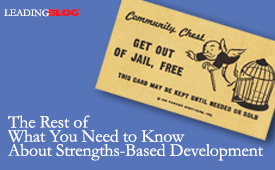
Posted by Michael McKinney at 12:31 AM
Permalink | Comments (0) | Books , Personal Development
03.07.07

I Don't Like My Strengths. Now What?
You've discovered your strengths and you don't feel like they do much for you. "Wow. I've got inclusiveness. I'll just put that on monster.com and watch the offers roll in. Right!?!" So you think, "Great. Now what do I do?" We all have similar and yet different combinations of strengths to build on. Granted some strengths may not seem as readily marketable in today's workplace as others. However, this doesn't mean that they are not of tremendous value in the right context. Finding that place is the key to your long term success.
Marcus Buckingham author of, Go Put Your Strengths to Work, responds to the question this way:
In many subtle and not-so-subtle ways, society tells us what's valuable and what's not—for example, that being strategic and future focused are tickets to the executive suite, whereas being a good wooer and craving significance for yourself get you not much of anything.To make your greatest possible contribution, however, you're going to have to look beyond society's judgments.
All any of us can do is know ourselves well enough to identify where our greatest possible contributions lie, and then do our utmost to make those contributions real.
Posted by Michael McKinney at 07:11 AM
Permalink | Comments (0) | Personal Development
03.05.07

Go Put Your Strengths to Work: 6 Powerful Steps to Achieve Outstanding Performance

Marcus Buckingham's latest work, Go Put Your Strengths to Work begins by speculating on the source of the strengths movement. He speculates that perhaps for many it may have begun with Peters Drucker's 1966 comment in The Effective Executive: "The effective executive builds on strengths—their own strengths, the strengths of superiors, colleagues, subordinates; and on the strengths of the situation."
For me, it began in the early seventies when Jack McKinney—my Dad—began presenting his Know Yourself seminars in English-speaking countries around the world. A big part of his seminar was identifying and building on strengths and learning to manage them as the excessive use of strength becomes a weakness.
Whatever your introduction was to the strengths movement, Go Put Your Strengths to Work is an attempt build on the shoulders of giants to advance the current strengths movement from just identifying and labeling our strengths to learning how to actually put our strengths to work. This is the real point of the whole process. His practical system is very useful in helping you to do just that. The system is based on 6 steps:
1: Bust the Myths—So, What's stopping you?
2: Get Clear—Do You Know What Your Strengths Are?
3: Free Your Strengths—How Do You Make the Most of What Strengthens You?
4: Stop Your Weaknesses—How Can You Cut Out What Weakens You?
5: Speak Up—How Do You Create Strong Teams?
6: Build Strong Habits—How Can You Make This Last Forever?
The process involves the careful observation of your work habits—using a guided questioning procedure—to turn the best of your job into the most of your job. Simply put, Buckingham defines your strengths as "those activities that make you feel strong." Conversely, the best definition of weakness is any "activity that makes you feel weak."
Of course, the system is backed by a web site—SimplyStrengths.com—accessed by using the now familiar code given with the purchase of the book. The release of the book is also backed by a nationwide tour by Marcus Buckingham beginning today. This event will also include a private showing of his short feature film entitled Trombone Player Wanted.
Related Interest:
StrengthsFinder 2.0: A New and Upgraded Edition of the Online Test
![]()
![]() Like us on Instagram and Facebook for additional leadership and personal development ideas.
Like us on Instagram and Facebook for additional leadership and personal development ideas.

![]()


Posted by Michael McKinney at 10:02 AM
Permalink | Comments (0) | Books , Personal Development

Career Match: Discover Your Ideal Career
AMACOM recently published a book—Career Match: Connecting Who You Are With What You'll Love to Do—that helps people discover their ideal work using a quick and easy to use system developed by Shoya Zichy based on the Myers-Briggs methodology. The self-assessment quiz is very simple yet quite accurate and highly revealing. After identifying your personality style, the book then walks you through the range of career choices best for you. It is a valuable tool not only for career and job changers, but to countless others seeking to choose a college major, find a first job, or even find new pursuits during retirement.
Posted by Michael McKinney at 09:57 AM
Permalink | Comments (0) | Personal Development
03.02.07

Ego Check: Self Check

THERE'S A FINE LINE between being confident and having an out-of-control ego and it has to be managed carefully. No of us is immune to overconfidence and that line is all too easy to cross. Here are four questions Mathew Hayward recommends to ask yourself as a sort of self ego check:
Why am I doing this? We need to understand where our pride is coming from. Our pride needs to be based on real achievements and emotions. "We all receive pleasure and pain from how others perceive and respond to us. When taken too far, however, that tendency gives others control over our pride. Playing to others' aspirations and expectations make us characters in their play. Before long we become inauthentic, rudderless, and self-destructive."
Am I getting the right input into this decision? "Finding and working effectively with the right foils is a critical way of managing one's pride and, therefore, of curbing false confidence and hubris. The right foils know when to tell us when we are wrong, and they enable us to step back, step in, and step aside." He adds, "…the key to real and lasting success is to have the right relationships with a number of trusted managers."
Am I seeing, seeking, using, and sharing material feedback? Are we kidding ourselves about our situation? The key here is to get and use the best available feedback.
Have I clarified the conditions in which I could be wrong? It is wise to face the potential consequences of our decisions and actions today before they have occurred. By managing what could go wrong, we can factor in the possibility that our actions are driven by false confidence, even if we don't know it at the time.
This is probably a lot like preaching to the choir. If your ego is out of control, you're no doubt certain that you're already doing these things.
![]()
![]() Like us on Instagram and Facebook for additional leadership and personal development ideas.
Like us on Instagram and Facebook for additional leadership and personal development ideas.

![]()


Posted by Michael McKinney at 12:05 AM
Permalink | Comments (0) | Books , Personal Development
02.21.07

Keeping Your Ego in Check
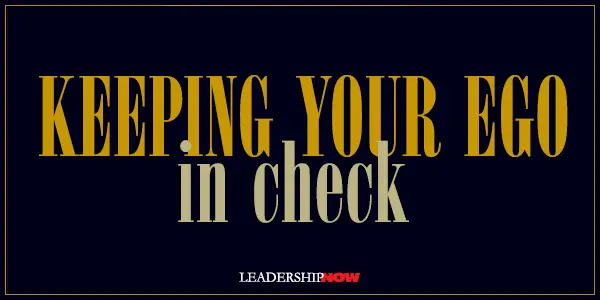
IF A LITTLE EGO is a good thing, too much can be a very bad thing. Managing one's ego is the subject of Mathew Hayward's book, Ego Check. "Checking one's ego at the door is entirely the wrong way to think about managing overconfidence and hubris because it drives a wedge between who we are and how we are supposed to act. Instead, the key is to check our decisions and actions, ahead of time to determine whether they reflect authentic or false confidence."
He suggests that authentic pride is good—even necessary—as it helps us to "appreciate who we are and what we have done" without constantly seeking approval from others. He warns that "the danger is that authentic pride—based on real achievements and emotions—can quickly degenerate into excessive pride. We easily slip into becoming too full of ourselves and operate with clouded judgment. I believe it was Dirty Harry who said, "A man's got to know his limitations."
He breaks excessive pride—which arises when we develop an inflated view of ourselves based on our need for certain outcomes and approval—into three forms:
Dependent Pride: Pride based on what we hope to accomplish—future outcomes—rather than what we have done or are currently doing
Exaggerated Pride: Pride based on what we want to believe about ourselves rather than what the data or the feedback we are getting would really tell us (believing our own press releases)
Overweening Pride: Pride driven by potential outcomes or what we imagine we are doing as opposed to what we are actually doing
Authentic Pride or Grounded Pride arises when we intrinsically appreciate ourselves based on candid and factual feedback. This type of pride can be a positive force in our lives.
![]()
![]() Like us on Instagram and Facebook for additional leadership and personal development ideas.
Like us on Instagram and Facebook for additional leadership and personal development ideas.

![]()


Posted by Michael McKinney at 10:30 PM
Permalink | Comments (0) | Books , Personal Development
02.15.07

StrengthsFinder 2.0
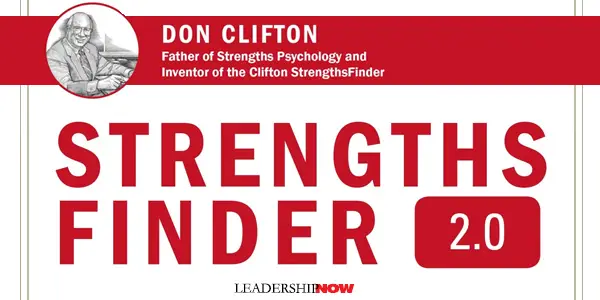
"Most people think they know what they are good at. They are usually wrong . . . . And yet, a person can perform only from strength."—Peter Drucker
GALLUP PRESS has just released StrengthsFinder 2.0. It's a handy and improved follow-up to Now, Discover Your Strengths. What's so new? Gallup has this to say:
Our research and knowledge base on the topic of human strengths have expanded dramatically over the past decade. StrengthsFinder 2.0 picks up where the first version left off, and it is designed to provide you with the latest discoveries and strategies for application. The language of 34 themes remains the same, but the assessment is faster and even more reliable. And, the results yield a much more in-depth analysis of your strengths — featuring a look at the nuances of what makes you unique, using more than 5,000 personalized Strengths Insights that we have discovered in recent years.
Going far beyond StrengthsFinder 1.0's shared theme descriptions, which can be found in Part II of StrengthsFinder 2.0, these highly customized Strengths Insights will help you understand how each of your top five themes plays out in your life on a much more personal level. For example, even though you and a friend may both have the same theme in your top five, the way this theme is manifested will not be the same. Therefore, each of you would receive entirely different, personalized descriptions of how that theme operates in your lives.
These new Strengths Insights describe what makes you stand out when compared to the millions of people we have studied. Once you have completed the online assessment, you will receive a comprehensive Strengths Discovery and Action-Planning Guide that is based on your StrengthsFinder 2.0 results. This guide includes:
- Your top five theme report, built around the new Strengths Insight descriptions
- 50 Ideas for Action (10 for each of your top five themes) based on thousands of best-practice suggestions we reviewed
- A Strengths Discovery Activity that helps you think about how your talents, investment, experience, skills, and knowledge work together to build strengths
- A Strength-Based Action Plan for setting specific goals for building and applying your strengths in the next week, month, and year
![]()
![]() Like us on Instagram and Facebook for additional leadership and personal development ideas.
Like us on Instagram and Facebook for additional leadership and personal development ideas.

![]()


Posted by Michael McKinney at 09:51 AM
Permalink | Comments (0) | Books , Personal Development
02.12.07

When Making Judgments About Our Leaders and Others
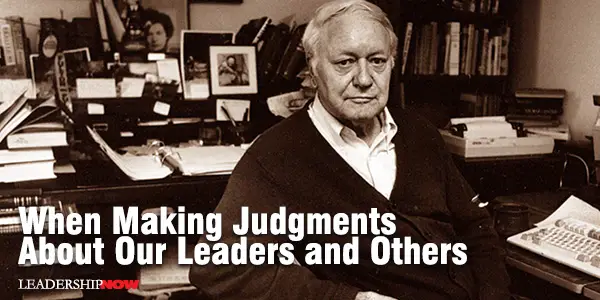
AS ONE OF the greatest journalists of all time, twice receiving the Pulitzer Prize, New York Times journalist James Reston (1909-1995) wrote in his memoirs about a trap we can fall into when judging others.
He related how his wife, Sally, helped to temper his comments and writing. It's a trap that we most easily fall into when we are overly focused on our own agenda or frustrated over simply not getting our own way. It's good advice for any of us to keep in mind when we are getting ready to air our opinion—especially on social media.
He wisely wrote:
One of the blind spots of reporters is that after a while, we are inclined to forget that officials are people. Preoccupied with issues, we come to regard them as liberals or conservatives, honest or crooked, but seldom as ordinary folk who have wives and children and cry when they're hurt. Sally was always saving me from this folly. She knew a lot of these official families and knew also when their kids were sick or flunking out of school or fiddling with drugs. Thus when some political luminary seemed to be in a slump, talking more nonsense than usual, she would say maybe he was worrying about the family, or, as I was inclined to believe, about his own wandering and wayward habits. Still, it was useful to be reminded that these headline characters have things to worry about other than the national debt—their own debts, for example.
Times have changed. Journalism today is very different from the journalism Reston practiced. He said in on the occasion of the 50-year anniversary of the Pulitzer Prizes in 1966, that "Some of the old newspaper traditions, of course, we maintain. Our self-righteousness, I can assure you, is undiminished. Our capacity to criticize everybody and our imperviousness to criticism ourselves, are still, I believe, unmatched by novelists, poets or anybody else."
In Scotty: James B. Reston and the Rise and Fall of American Journalism, author John Stacks writes:
He had access to the corridors of power because he was trusted to report and write with a sense of balance and humanity; He was often critical of policies and policy makers but rarely harsh on these judgments. He got to know the powerful as human beings, as people with strengths and weaknesses. He usually thought they were trying do their difficult jobs as well as they could and in what they saw as the best interests of the nation. There was, at the heart of Reston's style of journalism, a sense of common purpose with the government and political leaders. He felt that journalism and government were integral parts of the fabric of the country, working in different ways toward the same goal: helping the country deal with threats to its health and survival from home and abroad. The press and government, although with different interests and different priorities, were seen by Reston as collaborators in on enterprise, the preservation of the United Sattes of America.
![]()
![]() Like us on Instagram and Facebook for additional leadership and personal development ideas.
Like us on Instagram and Facebook for additional leadership and personal development ideas.

![]()


Posted by Michael McKinney at 09:30 AM
Permalink | Comments (0) | TrackBacks (2) | Personal Development
02.05.07

Take Another Look at Your Early Morning Routine
Jim Citrin of executive search firm Spencer Stuart reported in his Yahoo! column that, "the quiet of the morning is often the time when your mind is at its clearest and most well-suited to solving important problems." 
Steve Murphy, CEO of publishing company Rodale, says, "A line in a William Blake poem inspired me to think differently about my day: 'Think in the morning, act in the noon, read in the evening, and sleep at night.' This has made a huge difference in my life. Now, I take out a yellow pad every morning and write my thoughts for the day, which allows me to be much more strategic and proactive than reactive."
Citrin also confirms that a successful day usually starts early in the morning. (What was that Ben Franklin said?) He found that of the 20 executives he questioned, the latest any of them wake up is 6 am, and almost 80 percent wake up at 5:30 or earlier.
![]()
![]() Like us on Instagram and Facebook for additional leadership and personal development ideas.
Like us on Instagram and Facebook for additional leadership and personal development ideas.
Posted by Michael McKinney at 07:26 AM
Permalink | Comments (0) | Personal Development
01.29.07

Goldsmith's Gold: Stop Trying to Help People Who Don't Want to Change
You can help some of the people some of the time, but you can't help all the people all the time. Not everyone wants help. Not everyone wants to change. Some people can't or won't be lead. It's a fact of life. Marshall explains, "This may sound harsh, but some people are unsalvageable. You're only banging your head against a wall if you think you can fix them." Some flaws can't be coached away by any boss, especially if the following conditions exist:
Stop trying to change people who don't think they have a problem.
Stop trying to change people who are pursuing the wrong strategy for the organization. If they're going the wrong direction, all you do is help them get there faster.
Stop trying to change people who should not be in their job. Move them on.
Stop trying to help people who think everyone else is the problem. People like this will never give up on their near-religious belief that any failure is someone else's fault.
More importantly, we need to be sure we are not deluding ourselves into being one of these people. Always be looking to change, grow and improve. Ask. Others are sure to point the way.
This is from What Got You Here Won't Get You There by Marshall Goldsmith.
Like us on Facebook for additional leadership and personal development ideas.
Of Related Interest:
Triggers: Do You Underestimate the World You Live In?
Posted by Michael McKinney at 07:59 AM
Permalink | Comments (0) | TrackBacks (1) | Leadership , Personal Development
01.24.07

5 Leadership Lessons: Robin Sharma
The ultimate competitive advantage of your enterprise comes down to a single imperative—your ability to grow and develop leaders faster than your competition. The more quickly you can get every single person in the company demonstrating leadership behavior—regardless of their position—the more quickly you will lead the field.
Being a leader isn't about being liked. It's about doing what's right. Great leaders run their own race, making the right decisions and worrying little about public opinion. They are courage in action.
Try not to teach your fears to your kids. Introduce your children to what's possible. If you see the world as a place of limitation, so will those little people you are raising.
Every day, life will send you little windows of opportunity. Your destiny will ultimately be defined by how you respond to these windows of opportunity. Shrink from them and your life will be small. Feel the fear and run to them anyway and your life will be big.
Remember, every great leader (or visionary or brave thinker) was initially laughed at. Now they are revered. Push the envelope. Refuse to accept anything remotely close to mediocrity. Let go of the chains that have bound you to the ordinary. And definitely leave the crowd.
These five lessons are from The Greatness Guide by speaker and leadership coach, Robin Sharma.
Posted by Michael McKinney at 08:59 AM
Permalink | Comments (0) | Five Lessons , Personal Development
01.22.07

Goldsmith's Gold: Feedforward
Marshall Goldsmith introduces a concept called feedforward in his book, What Got You Here Won't Get You There. Essentially it is a refocusing of the practice of feedback. Feedback tells us what has happened or what we have done. Our history. Feedforward is future oriented. It is asking for ideas that you can put into practice in the future. It takes away much of the perceived negativity that is associated with feedback—criticism and the tendency to kill the messenger.
Instead of, "What did I do wrong?" feedforward asks, "I am trying to improve in this area. What kinds of things might I do in the future to improve in this area?"
It works because, while they don't particularly like hearing criticism, successful people love getting ideas for the future. If changing a certain type of behavior is important to them, they will gobble up any ideas that are aimed at changing that behavior.It works because we can change the future but not the past.
It works because helping people be right is more productive than proving them wrong.
On the most elemental level, it works because people do not take feedforward as personally as feedback.
We can focus on hearing without having to worry about responding.
Marshall adds, "Feedforward forces us to ask—and in doing so, we enlarge our universe of people with useful ideas. Asking, of course, gives the other person a license to answer. I cannot overestimate how valuable this license can be. I'm sure that all of us are surrounded by smart well-meaning friends who "understand" us better than we "understand" ourselves. I suspect they would love to help us; most people like to help others. But they hold back because they think it is rude or intrusive to try to help someone who has not asked for our assistance. Asking solves this.
This is from What Got You Here Won't Get You There by Marshall Goldsmith.
Posted by Michael McKinney at 12:08 AM
Permalink | Comments (0) | TrackBacks (1) | Personal Development
01.12.07

Goldsmith's Gold: "You asked for my opinion and now you're arguing with me?"
When we ask a friend, "What do you think I should do in this situation?" we are setting up the expectation that we want an answer—and that we will give the answer full consideration and quite possibly use it. We are not announcing that we're initiating an argument.
But that's exactly what we're doing when we ask for feedback from someone and then immediately express our opinion. This certainly true when our opinion is negative ("I'm not sure about that . . . ."). Whatever we say, however softly we couch it, our opinion will sound defensive. It will resemble a rationalization, a denial, a negation, or an objection.
Stop doing that. Treat every peice of advice as a gift or a compliment and simply say, "Thank you." No one expects you to act on every piece of advice. If you learn to listen—and act on the advice that makes sense—the people around you will be thrilled.
Additionally, he cautions that it is not appropriate to pass judgments on people's opinions when we specifically ask them to give it to us. Naturally we don't like to be critiqued, but "the only sure thing that comes out of passing judgment on people's efforts to help us is that they won't help us again…. No matter what you privately think of the suggestion, you must keep your thoughts to yourself, hear the person out, and say, 'Thank you.'" Solid advice.
This is from What Got You Here Won't Get You There by Marshall Goldsmith.
Posted by Michael McKinney at 09:38 AM
Permalink | Comments (0) | TrackBacks (1) | Personal Development
01.10.07

Growth: Moving to the Next Level
It's not that you don't know who you are or where you're going or what you want to achieve. Nor is it that you don't have an adequate sense of self-worth. What's wrong is that you have no idea how your behavior is coming across to the people who matter—your boss, colleagues, subordinates, customers, clients and family.
You think you have all the answers, but others see it as arrogance.
You think you're contributing to a situation with helpful comments, but others see it as butting in.
You think you're delegating effectively, but others see it as shirking responsibilities.
You think you're holding your tongue, but others see it as unresponsiveness.
You think you're letting people think for themselves, but others see it as ignoring them.
These are the kinds of things that are holding you back. Executive coach Marshall Goldsmith, pulls no punches in his new book, What Got You Here Won't Get You There. This book is for those who really want to change. It's for those who really want to see things for what they are and do something about it. There is something you'll recognize about yourself in this book.
We all hold superstitious beliefs—a mistaken belief that a specific activity followed by positive reinforcement is actually the cause of that positive reinforcement. Superstitions based on the mistaken idea that because I behave this way, I achieve results. Therefore, I must be achieving results because I behave this way. These superstitions make it hard for us to change. Goldsmith writes that this is the paradox of success: The beliefs that carried us here may be holding us back in our quest to go there .
Goldsmith looks at 21 specific habits that may be holding us back from getting to the next level. We'll look at some of these over the next several weeks. How are you coming across to other people? Really? Are you sure? How are you holding yourself back?
Posted by Michael McKinney at 07:55 AM
Permalink | Comments (0) | Personal Development
11.29.06

Humility Is a Core Quality Found In Great Leaders
We, of course, keep coming back to humility. It is, as Anthony Bell writes in Great Leadership, a core quality of a great leader.
Humility is often misunderstood. As Bell writes: It's not about self-deprecating insecurity; it's much more about honest recognition of both strengths and weaknesses, reinforced by an attractive lack of preoccupation with either one. It's the antithesis of self-absorption—the recognition that 'it's not about me.' It's not as someone put it, thinking less of yourself; rather, it's thinking less about yourself.
A selflessness is inherent in this kind of humility. It reflects a willingness to put the interests of the organization and of its people ahead of the leader's own interests.
Humility is rare in leaders, but when it's there, it's powerful. It's powerful because it's disarming.
Humility rests firmly on the foundation of self-awareness. Humility generates two qualities: a thirst for personal growth and a healthy dose of self-discipline. [A thirst for personal growth because] it requires a certain measure of humility to recognize what you don't know and an equal measure to want to keep on learning. [It also breeds a healthy dose of self-discipline because] humility recognizes that greatness requires work, and work requires self-discipline.
Posted by Michael McKinney at 12:02 AM
Permalink | Comments (0) | Leadership , Personal Development
11.24.06

Gratitude: Is That a Stone On the Hill?
Jim Clemmer in his book Growing the Distance, relates the following story:
Arden Barker had planted a 50-acre field of wheat that was now golden-brown, very full, and ready for harvest. It was a sight to touch the heart of any farmer. When his Uncle Harry came to visit, Arden proudly took him out to look at the field of wheat. Harry looked around, put his hand over his eyes to peer into the distance, and fixed his gaze on a boulder that had been too large to move in the middle of the field. "Is that a stone on the hill?" he asked. He said nothing about the field of wheat. Arden was crushed by his lack of enthusiasm.The Uncle Harry incident became the subject of discussion at many Barker family dinners thereafter. A few years later, their daughter, Brenda, had just finished cutting and trimming the family's huge lawn. Arden came home and surveyed her work from the kitchen window. "You missed a patch under the trees," he pointed out. Brenda came over to him, put one arm around his waist, and her other hand over her eyes to peer off into the distance and asked, "Is that a stone on the hill?"
Too often leaders, managers and parents think that it is crucial to their role to point out where people could improve—to be critical. Certainly, there is a time for that, but it happens all too often. Effective leaders will look for the positive and show gratitude and appreciation for it. People often look to others for direction and support and if it is not forthcoming it can kill the spirit and impede growth.
Posted by Michael McKinney at 07:52 AM
Permalink | Comments (0) | TrackBacks (1) | Personal Development
11.23.06

Denzel Washington: A Hand to Guide Me
Thankful for what others have done to guide his life, Denzel Washington put together a valuable book that underscores the lesson: "If you want to change the world, start by changing the life of a child."
A Hand to Guide Me focuses on some important concepts for and value of laying a firm foundation for children by providing examples from the lives of over 70 people like Presidents Jimmy Carter and Bill Clinton, Whoopi Goldberg, Phil Jackson, Hank Aaron, Muhammad Ali, John Antioco, Yogi Berra, Jimmy Carter, Wesley Clark, Jackie Joyner-Kersee, Fr. Monk Malloy, Joe Morgan, Toni Morrison, Colin Powell, Bonnie Raitt, Cal Ripken Jr., Bernard Shaw, George Streinbrenner, Ruben Studdard, John Wooden.
Here are a few thoughts by Denzel Washington from the book:
• "Train up a child in the way he should go, and when he is old he will not depart from it." Powerful words don't you think? It's a simple sentiment too, and yet I'm amazed how many people lose site of it these days.
• Show me a successful individual and I'll show you someone who didn't want for positive influences in his or her life. I don't care who you are or what you do for a living—if you do it well I'm betting there was someone cheering you on and showing you the way. I'll lay even odds.
• This is book is about that certain push, that helping hand we've all had to reach for in order to get where we're going. Train up a child in the way he should go, and he might get to where he's meant to be headed all along.
• I didn't always make the best choices or put myself in the best situations, and yet at they same time I have to think I made better choices because of the extra efforts of my parents and teachers and coaches, and I put myself in better situations that I might have if I'd been going about it on my own. I had a better chance to find my way because I was open to so many positive outside influences.
• The good people you've heard from here have all benefited from a guiding hand or two or three. They've been on the receiving end of some profound words of wisdom, or they've patterned their lives after men and women or principle. They've seen one good turn and helped it blossom into another. Or they've made a mistake and managed to learn from it and move on. And that's the greatest lesson we can all take with us as we set this book aside and return to our lives. Keep open—to possibility, to opportunity, to wonder—or remain forever shut off to the encouraging outcomes that await us all. Change happens. The key is to keep reaching for that guiding hand and to keep extending our own.
An early influence in Denzel Washington's life was the Boys Club. Some of the proceeds from the sale of this book are earmarked for the 100 year old Boys & Girls Clubs of America. This book is a good reminder to honor those whose shoulders you stand on and redouble your efforts with others.
Posted by Michael McKinney at 08:32 AM
Permalink | Comments (0) | Books , Personal Development
11.17.06

How To Enhance Your Potential While Working Your Current Job
Mentors, seminars, multimedia and books (and this site, of course) are great ways to learn about leadership and areas that you need to think about to round out your leadership capabilities. But nothing takes the place of application and practice. Leadership is not developed in the classroom. The problem (sorry, I meant challenge) we often run into is the opportunity to practice leadership. According to Cindy McCauley from the Center for Creative Leadership, "Seeking out new challenges while remaining in your current job is a practical, effective strategy to pursue." Taking on new or different assignments allows leaders to intentionally develop new skills, practice new behaviors and improve on weaknesses. She suggests three ways to do this in her book, Developmental Assignments: Creating Learning Experiences without Changing Jobs:
- Reshape your current job. Adding new responsibilities or reshaping your job may be more realistic than you think. Changes may be permanent or temporary. Consider moving a responsibility from someone else's plate to your own, trading tasks with another or taking on a role or task that needs to be done but that no one currently "owns." Also re-examine responsibilities that are already a legitimate part of your job, but have received little attention.
- Take on temporary assignments. Look outside your job description or department for projects, task forces, one-time events and activities that you can participate in for a short period of time.
- Seek challenges outside the workplace. Other areas of your life often provide the same challenges found in job settings. You'll find plenty of leadership responsibilities in nonprofit, religious, social and professional organizations, schools, sport teams and family life. There are many opportunities to learn lessons of leadership through personal experiences.
Not every challenge is a prime opportunity to learn, says McCauley. Research shows that certain kinds of challenges stimulate learning more than others. "To adapt and grow, leaders need to be constantly seeking out new experiences and challenges that, by their very nature, foster learning."
Ten key challenges are listed below, along with a few suggestions for ways to seek such challenges.
| | |
| Unfamiliar responsibilities: Handling responsibilities that are new or very different from previous ones you've handled. |
|
| New directions: Starting something new or making strategic changes. |
|
| Inherited problems: Fixing problems created by someone else or existing before you took the assignment. |
|
| Problems with employees: Dealing with employees who lack adequate experience, are incompetent or are resistant to change. |
|
| High stakes: Managing work with tight deadlines, pressure from above, high visibility and responsibility for critical decisions. |
|
| Scope and scale: Managing work that is broad in scope or large in size. |
|
| External pressure: Managing the interface with important groups outside the organization, such as customers, vendors, partners, unions and regulatory agencies. |
|
| Influence without authority: Influencing peers, higher management or other key people over whom you have no authority. |
|
| Work across cultures: Working with people from different cultures or with institutions in other countries. |
|
| Work group diversity: Being responsible for the work of people of both genders and different racial and ethnic backgrounds. |
|
McCauley counsels to select a challenge that will broaden your experience base. Ask yourself: Which of the challenges have I had the least exposure to? Are there some that I haven't experienced in a number of years? Are there any that my current job never provides? Then choose a specific activity or assignment from the list or make up your own.
You can find many more specific ideas in Developmental Assignments: Creating Learning Experiences without Changing Jobs.
Posted by Michael McKinney at 05:13 AM
Permalink | Comments (0) | Personal Development
11.13.06

Before You Accuse, Ask

LEADERS not only ask smart questions, but are smart about asking questions. And listening. A good question can change everything. Gordon MacDonald maintains that a key to effective leadership is the ability to ask the right questions at the appropriate time that will elicit insight and clarity. Of course, that's not always an easy thing to do. It takes thoughtful practice. He writes in the Fall 2006 issue of the Leadership Journal, "That's the power of the interrogative sentence. A good one, a real good one, alters things. It ignites thought; it can demand commitment, reveal depth or shallowness in a person's soul, disclose hidden agendas."
He writes about all kinds of questions, but there was a section that was especially helpful. He referred to times when we should be asking questions when we desperately want to be talking—like when we feel we have been wronged or run into conflict with another person or organization. The temptation is to launch an attack, lay down the law, or simply explain our point of view and let the pieces fall where they may. MacDonald wisely advises that instead, this is the time to proceed first with a few questions. He writes:
Over and over this principle—ask before accusing—has rescued me from making a fool of myself. So in conflicting moments I've learned to use questions like these:
I need to tell you about an impression I have and ask you if it's accurate.
I want to play back to you what I thought you said the other day and ask if my perception is correct.
What message were you hoping I'd get when you…
Would you be open to some thoughts from someone who really cares about you?
Have you reflected at all how you're coming across in this situation?
What if the choices you've been making are not only going to hurt you but some other people you say you care about?
The ability to ask smart questions requires that you take the time to think beyond the issue on the table and see often times what are the real underlying issues.
![]()
![]() Like us on Instagram and Facebook for additional leadership and personal development ideas.
Like us on Instagram and Facebook for additional leadership and personal development ideas.
Posted by Michael McKinney at 07:20 AM
Permalink | Comments (0) | Personal Development
11.08.06

Crunch Point: Test Your Excuses
Brian Tracy explains in his new book that when you are at a crunch point —that point where problems, difficulties, unexpected reversals,
and crises knock you off balance—it is important that you identify your constraints. You need to identify those things that are restricting your progress. To do this you must be (absolutely) clear of your goals. If you aren't you won't know what is standing between you and where you want to be. At this point you must avoid the tendency to start making excuses. Most of them are not valid. How can you know? He writes:
There is a way that you can test your excuses to see if they are valid. It is simply to ask yourself, "Is there anyone else who has my same excuse but who is moving ahead and succeeding nonetheless?"If you are honest with yourself, you will immediately realize that there are hundreds of thousands, if not millions, of people who have it worse than you could ever imagine and are succeeding anyway. If this is the case, your excuse is invalid. Don't let it hold you back anymore.
He suggests once you have identified your main constraint, focus on it until it is eliminated. Don't let minor issues sidetrack you from alleviating that one constraint.
Always bear in mind that your own resolution to succeed is more important than any other one thing. —Abraham Lincoln
Related Post: Challenge Assumed Constraints
Posted by Michael McKinney at 12:17 AM
Permalink | Comments (0) | Books , Personal Development
10.26.06

Assertiveness: The Meekest and Mightiest Make the Worst Leaders
Balance. Easy to understand, tough to practice.
The overuse of strength creates a weakness. Every strength has a point where it becomes a liability. Maturity and self-control help to rein in the excesses of our personality.
Not surprisingly, recent research by Stanford professor Frank Flynn has found that the greatest identifiable trait that can hold someone back from becoming a great leader is being too assertive—or not assertive enough. In other words, assertiveness that is out of balance.
In the Stanford Graduate School of Business News, Marguerite Rigoglioso reports:
Analyzing three years' worth of written and survey data on students, as well as students' assessments of their own former bosses, Flynn and Ames found that excessive or inadequate assertiveness was the No. 1 issue listed in the weakness column when it came to evaluating individuals' leadership potential. "It was mentioned twice as frequently as any other issue. It appeared as a clear factor in weakness comments more than lack of intelligence, conscientiousness, and charisma combined," Flynn says. Specifically, what the researchers found was essentially an "inverted U" between the ratings of a person's assertiveness and his or her leadership ability: Up to a certain point it was positively associated, but then it went back down.
"The analogy we use is that assertiveness is like salt in a sauce: Too much spoils the dish, but too little is equally distracting," Flynn says. Interestingly, at the "just right" point, assertiveness disappears as a leadership quality, either positive or negative. "While getting assertiveness wrong in one direction or the other dominates perceptions of weakness, getting it right is not a major theme in perceptions of strengths," Flynn says. "In other words, nobody ever compliments the chef on a perfectly salted dish."What Flynn and Ames discovered was that when people were determined to be extremely assertive, the social costs of their behavior—others' hurt feelings and damaged relationships—were seen to override the positive aspects of their ability to get the job done. Conversely, when they were deemed too passive, their inability to move projects along and achieve goals was what stuck in people's minds, not their ability to preserve social harmony. "People pay more attention to what's bad about assertive or non-assertive behavior than what's good about it," Flynn explains.
Posted by Michael McKinney at 12:32 AM
Permalink | Comments (0) | Leadership , Personal Development
10.23.06

The Nature of Leadership
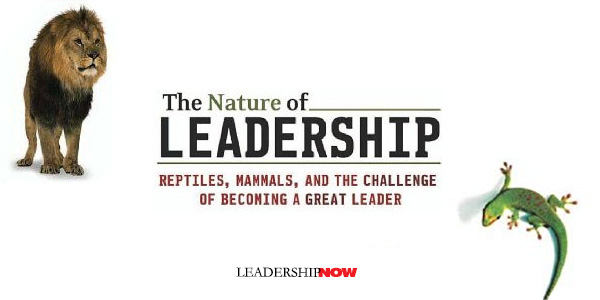
A SURPRISE in this month's crop of books is The Nature of Leadership by B. Joseph White. Essentially, it is a blueprint for leadership development. He has created a leadership pyramid founded on basics such as a desire to be in charge, and the corresponding ability, strength, and character that all leaders—especially the great ones—must possess.
 From there he divides leadership characteristics between analytical reptilian leadership characteristics and those of the nurturing, engaged mammal. While we generally have a tendency to lean one way or the other, we must develop a capacity to deal effectively with both the reptilian economic and performance issues and the mammalian soft or people issues.
From there he divides leadership characteristics between analytical reptilian leadership characteristics and those of the nurturing, engaged mammal. While we generally have a tendency to lean one way or the other, we must develop a capacity to deal effectively with both the reptilian economic and performance issues and the mammalian soft or people issues.
White cautions, "I make no judgment about the inherent value of Reptiles and Mammals in the workplace. Both are vital and most people are, of course a complex mix of the two. We need task-oriented, no-nonsense Reptiles to ensure the work gets done and done well. We need people-oriented, nurturing Mammals to maintain the human community through which work gets done." He adds, "I believe organizations falter, fail, or don't reach their potential both because of leadership that is inadequately Reptilian and because of leadership that is inadequately Mammalian."
 Finally, all these skills and qualities will coalesce into something bigger than the sum of their parts, an intangible but very real "sparkle factor" that separates the great leaders from the merely good.
Finally, all these skills and qualities will coalesce into something bigger than the sum of their parts, an intangible but very real "sparkle factor" that separates the great leaders from the merely good.
You can read Chapter 1 online: Become a Leader, a Better Leader, a Great Leader
![]()
![]() Like us on Instagram and Facebook for additional leadership and personal development ideas.
Like us on Instagram and Facebook for additional leadership and personal development ideas.

Posted by Michael McKinney at 05:51 AM
Permalink | Comments (0) | Books , Leadership Development , Personal Development
10.20.06

Focus on the War, Not the Battle

Early Christian philosopher, Augustine of Hippo (354-430), proposed that to drive out the bad—those habits or qualities we don't want—we need to focus on the good—those habit, qualities or strengths we do want. At home, this was always referred to as focus on the war, not the battle. The implication is that when we have a problem we want to change, we need to focus on the new habit we want to form and not the bad habit we want to replace. In relationships, we need to focus on the good that we want to develop and strengthen and not the bad we would like to drive out. Focus on the strengths and they will drive out or minimize the weaknesses.
There seems to be some support for this in current studies of neuroplasticity. Our brain physically changes—makes new connections—based on what we pay attention to; it moves in the direction of our most dominant thoughts. Jeffrey Schwartz and Sharon Begley write in The Mind and the Brain, "Physical changes in the brain depend for their creation on a mental state in the mind—the state called attention. Introspection, willed attention, subjective state—pick your favorite description of an internal mental state—can redraw the contours of the mind, and in so doing can rewire the circuits of the brain, for it's attention that makes neuroplasticity possible." We literally change our brain consistent with that which we send our time thinking about. Shouldn't we then be thinking about where we want to go and not the miles we have to go to get there?
In terms of leadership, David Rock writes in Quiet Leadership, "[W]e need to help people focus on solutions instead of problems. We need to give up our desire to find behaviors to fix and become fascinated with identifying and growing people's strengths." Focus on the war—the desired end—and not the battle—the obstacles we face in getting there.
![]()
![]() Like us on Instagram and Facebook for additional leadership and personal development ideas.
Like us on Instagram and Facebook for additional leadership and personal development ideas.
Posted by Michael McKinney at 08:32 AM
Permalink | Comments (0) | Personal Development
10.13.06

How To Fine Tune Your Listening Skills
"Why do most of us like to talk so much? Because we want to be noticed. We get a charge out of being the center of the universe. But when you yap on, you use up all of the oxygen and energy in the room, which is debilitating for everyone else" say authors Linda Kaplan Thaler and Robin Koval in The Power of Nice. Often times, more communication is less communication.
They suggest five ways to fine tune your listening skills:
Let the Other Guy Be Smarter. When you let the other guy's brilliance shine through, you not only gain new information, you also earn their goodwill. Everyone likes to be around people who make them feel intelligent.
Keep It Simple. Sometimes the simplest answer is the best one. By listening rather than pontificating you will often hear the simple connection that makes the difference.
Ask, Don't Tell. When you ask questions, you tell people that you care about them, that you're interested in what they have to say. You also send an oh-so-subtle message that you're a bright, inquisitive individual who would like to know more. That's why even the smallest question can have a huge impact.
Don't Argue So Much. Whenever problems or conflicts arise, there is a natural tendency to try and "talk your way out of it." But sometimes you win your case by shutting up and listening your way out of it.
Everyone Is Worth a Listen. Jay Leno says, "We live in a society of exclusion. There is this idea that you should try to keep people out—'Oh, you can't come into this club, you have to be a member, you don't have enough money, you're not handsome enough.' But if you go through life with the opposite attitude and try to include everybody, it opens up doors."
Remember Dale Carnegie's quote: "You can make more friends in two months by becoming interested in other people than you can in two years by trying to get other people interested in you."
Posted by Michael McKinney at 08:59 AM
Permalink | Comments (0) | Communication , Personal Development
10.11.06

What is Trust?

David Abshire, President of the Center for the Study of the Presidency, in a speech delivered this summer had this to say about trust:
Trust is a word with which we are truly familiar. Yet, it is difficult to define in a truly comprehensive way. You may not know that it is a word of Scandinavian origin. It connects "agreement," "pact," and "faith"—all wrapped into one. Webster notes two definitions: first, "a confident dependence on the character, ability, strength, or truth of someone or something"; second, "something committed or entrusted to one to be used or cared for in the interest of another." The first definition is commonplace and correlates with our grade-school interpretation. But, the latter definition embraces the transcendent qualities of the word.
Trust, in its fullest sense, extends beyond simply having great confidence in a person or faith that a task will be performed. What I will call interactive trust manifests itself when one becomes committed to the protection and care of someone else—he is entrusted to that person, who holds his faith in trust.
![]()
![]() Like us on Instagram and Facebook for additional leadership and personal development ideas.
Like us on Instagram and Facebook for additional leadership and personal development ideas.
![]()
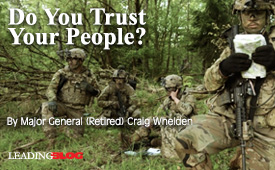
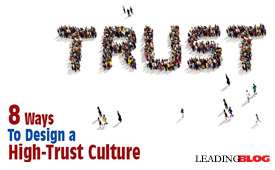
Posted by Michael McKinney at 08:59 AM
Permalink | Comments (0) | Personal Development
09.27.06

Challenge Assumed Constraints
Between us and where we want to be is something standing in our way. What do you believe is restricting you? Ken Blanchard states the first skill of a self-leader is to challenge assumed constraints. He defines an assumed constraint as, "a belief, based on past experience, that limits current and future experiences." He explains in his new book, Leading at a Higher Level:
Indicators that an assumed constraint may be holding you hostage are negative internal dialogue, excuses, and blaming statements. At one time or another, most of us have assumed that because we did not have direct authority or position power, we could not be leaders or influence outcomes. This is one of the most common constraints in the workplace.This is not to say that all of us aren't constrained by outside forces, whether it's a lack of time, money, or position of authority. Yet self leadership teaches that the constraints are not the problem; the problem is that we think these things are the only sources of power that are available to us. Every successful person can almost name the time and date when they decided to let go of an assumed constraint.
Chris Barez Brown put it well in How to Have Kick-Ass Ideas, "Stuck is a feeling—never a reality."
Posted by Michael McKinney at 12:17 AM
Permalink | Comments (0) | Books , Personal Development
09.22.06

Rayfield Wright: The Road Less Traveled
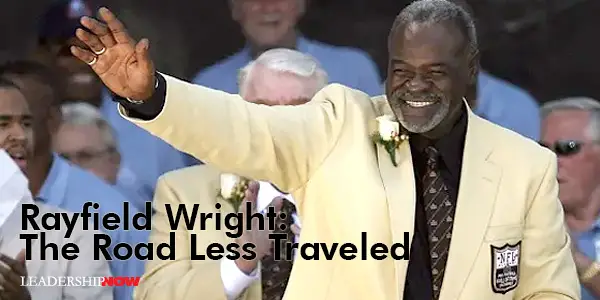
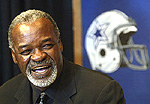
Rayfield Wright, former NFL player with the 1967-1979 Dallas Cowboys, was inducted into the NFL Hall of Fame August 5, 2006. In his enshrinement speech he had these thoughtful words to say:
And to my mother, Mrs. Opel Wright, from the day I was born, you watched me take the road less traveled. Mom, you are my rose garden, you watered each day with your love, with your faith, and with your prayers. Your roots are deeply instilled in me, and your soul is so beautiful, in spite of all the painful thorns that life has put in your way.Now, parents, teach your children well. Encourage them with your faith and leadership. Remember that you are the windows through which your children see this world. Take notice of yourself and the things that you do in hopes that your example will stir their hearts and souls.
To every young athlete within the sound of my voice, it takes courage to dream your dream. Don't let them sit in the locker room. Take a leap of faith. Listen to your parents and respect your elders. Learn from your successes and your losses. Defeat is possible and as a challenge to do better next time. Be satisfied you gave the game everything that you had and remember this: Don't be afraid to travel the road less traveled because Larry Rayfield Wright did, and you can, too.
![]()
![]() Like us on Instagram and Facebook for additional leadership and personal development ideas.
Like us on Instagram and Facebook for additional leadership and personal development ideas.
![]()
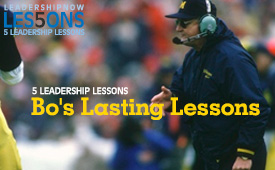

Posted by Michael McKinney at 06:23 AM
Permalink | Comments (0) | Personal Development
09.14.06

Case Dismissed
A reoccurring distraction that often haunts people is forgiveness. When we have been wronged we want it made right. We want absolution, resolution, restitution or at least an adequate apology. Unfortunately in life this almost never happens. Life isn't fair. Dwelling on this takes our mind off of the goal. Fundamentally, it is an issue of pride. In the new book Success Built to Last the authors provide a good commentary on this issue. "Successful people do not try to rewrite history or to wipe the slate clean. They don't pretend it didn't happen. They simply decide to dismiss the case and move on. Obsessing on grudges keeps them alive; letting them go forces them to die as you get back to business." They continue:
The root of the word "forgive" is actually to send away—to dismiss."Dismiss" is a very strong word," said Reverend Deborah Johnson. "When something is dismissed, it's over. When it's dismissed, you don't keep going back over it." That's what successful people do. They don't necessarily call it forgiveness, but they do abandon blame as a way of life.
"Now there's a funny thing about this notion of dismissing the case. When you're in a court of law and, at some point, the judge says 'case dismissed,' that doesn't mean case erased.
There will still be a record of the case in the books. But what isn't going to happen is we're not going to keep going through the particulars of this case. Dismissed doesn't mean that all parties in it experience resolution. It doesn't mean that a crime didn't take place." When the judge dismisses the case, it's because there will be no more presentation at this point. "It's over," she insisted.

My mother used to say, "You don't forgive to let the other person off the hook, you forgive to let yourself off the hook." Good advice.
Posted by Michael McKinney at 12:53 AM
Permalink | Comments (0) | Books , Personal Development
08.28.06

Problems Are Everywhere and Everyone Has Some
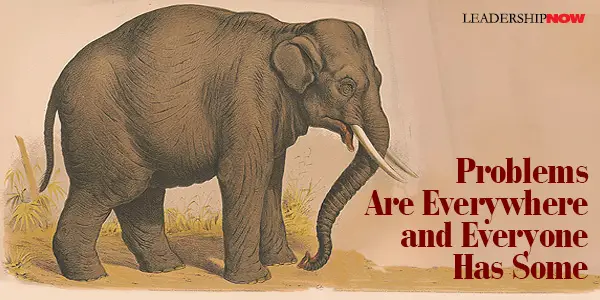

WE ALL go through bad patches, but a successful person is able to not only extract the lessons but is also able to form a perspective on it that will keep a positive outlook and a forward momentum. You can't change the facts. Things are what they are. And you may need at times, someone close to you to help you step back from the situation, but you can keep your sense of humor—shift your focus—and change your perspective. And here's the thing. When you lose your sense of humor and a broader perspective, you're more likely to make things worse.
When we respond to troubles and problems in a positive way, we can more easily maintain our creativity and resourcefulness that will come in handy in resolving the issue. A positive response can keep us in problem-solving mode.
A good example of reframing a situation for an overall positive outlook comes from one of my favorite opening lines. It is from a good piece of writing by George Orwell (Eric Blair) entitled Shooting an Elephant.
In Moulmein, in Lower Burma, I was hated by large numbers of people—the only time in my life that I have been important enough for this to happen.
![]()
![]() Like us on Instagram and Facebook for additional leadership and personal development ideas.
Like us on Instagram and Facebook for additional leadership and personal development ideas.
![]()
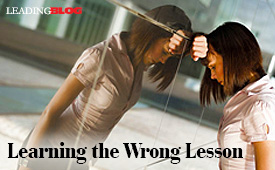
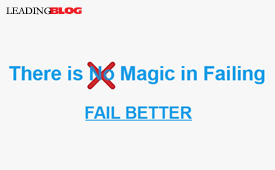
Posted by Michael McKinney at 12:45 AM
Permalink | Comments (0) | Personal Development
08.25.06

Vital Friends: Who Expects You to Be Somebody?


TOM RATH provides an excellent book with Vital Friends. His analysis of the problem is good and the need to focus more on developing the right kind of relationships between people is right on. He rightly states that "friendships are among the most fundamental of human needs. The energy between two people is what creates great marriages, families, teams, and organizations."
I liked his question, "Who expects you to be somebody?" If you can't think of anyone, there is something—or perhaps someone—seriously lacking in your life.
Rath gets a little tangled up in trying to understand how, with all of the personal development programs available to us, we fail in our relationships. He at times seems to blame self-improvement programs and throws the baby out with the bathwater. Improving yourself is the key to better relationships. But the key to good self-improvement is the focus—the what, why and how of it. Certainly, the I-gotta-be-me self-indulgent inner journey to self-understanding is worthless. I-gotta-be-me is what got us where we are in the first place. The point of personal development is to change me from what I am to a more principled and presentable me. An inward focus on personal development will only have a marginal effect on your relationships. Personal development needs to have an other-directed focus to it for it to be meaningful. Self-understanding helps you to understand others. And that understanding should give you a basis for creating relationships built on outgoing concern for and patience with other people. Improving yourself just to be improving yourself is selfish and of little value. In the end, it will give you little satisfaction and few friends. Selfishness kills relationships.
Rath suggests that maybe we need to take a course on friendship. He asks, "Could a second-grade student, a high-school junior, a college freshman, your boss, or even you benefit from time dedicated to this pursuit?" Resoundingly yes! To this end, Jeffrey Gitomer's Little Black Book of Connections is full of sound principles that can be applied here. I know you're thinking that this is "another sales tomb," but this is much more and applies to all relationships.
Rath also provides ample evidence that friendships at work should be encouraged. Although most companies don't encourage, and some outright forbid, Gallup research shows that close relationships between workers boosts employee satisfaction by almost 50%. Even though spending time with the boss was rated as the least pleasurable time of the day, they found that when employees do have close friendships with their boss, they are more than twice as likely to be satisfied with their jobs.
Do the people you influence know you expect them to be somebody?
With the purchase of Vital Friends you get access to the web site where you can not only take the Vital Friends Assessment, you can begin to catalog your vital friendships and employ tools to develop stronger relationships with those people.
![]()
![]() Like us on Instagram and Facebook for additional leadership and personal development ideas.
Like us on Instagram and Facebook for additional leadership and personal development ideas.

![]()
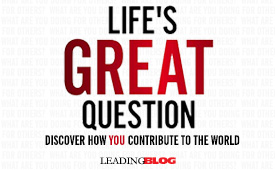

Posted by Michael McKinney at 08:45 AM
Permalink | Comments (0) | Books , Personal Development
08.18.06

What You Bring to the Table is You
Raymond L. Kotcher—CEO of Ketchum, a global public relations agency—spoke recently about a global conversation, powered by new technologies, that is integrating people as never before. He offered an piece of advice for joining in that conversation that caught my attention.
Never forget your integrity and credibility. Character takes a lifetime to build—it represents the sum of all of your actions. And now, more than ever, it can be destroyed in a moment. So please define your individual values and decide where the line is that you will not cross. Always communicate within the boudaries of those values.
Posted by Michael McKinney at 09:00 AM
Permalink | Comments (0) | Personal Development
08.16.06

Thoughts from Lou Holtz
Here are a few quotes from Lou Holtz's new autobiography. The application of the principles to your own situation or personal development is self-evident.
Choices Count: "When you accept the fact that you are in your present condition, good or bad, because of the choices you have made, you will then find yourself capable of changing your situation by making better choices."
Respect: "What I didn't realize was that authority comes with the job: respect was what I needed to earn, and you earn respect only by proving yourself as a leader."
Faith: "Before joining the Notre Dame family, I heard a lot about the spirit of Notre Dame, but I wasn't sure what that meant. The people were spiritual, and the leaders of the university were driven by the Holy Spirit, of that I had no doubt. But I wasn't convinced the campus itself held anything spiritual.
Then, in my first year, I made an interesting observation. I realized that if you don't believe in the omnipresent spirit of Notre Dame, you never feel it. I made up my mind that I was going to believe in this spirit. The moment I started believing, I started feeling it. And the feeling never left."
Staffing: "I expected us to recruit attitude over athleticism, and an aptitude for hard work over natural ability."
Personal Responsibility: "Before you start blaming others, look at yourself. You will find you must look no further for the cause of the problem."
Posted by Michael McKinney at 08:34 AM
Permalink | Comments (0) | Books , Personal Development
07.20.06

Avoiding Brain Drain
In an excellent book written generally for leaders in Christian organizations—but with applications anywhere—Reggie McNeal stresses the importance of self-management and particularly the need to manage your mental heath. In Practicing Greatness, he lists three "brain killers" that can sap an otherwise effective leader of their mental energy:
• Negative People. Leaders need to be aware that when the allow themselves to be consumed by negative people (who seem inclined to seek them out), they allow precious mental, emotional, and spiritual energy to be drained off from other leadership pursuits. He suggests, "creating a mental boundary" and adopting "a strategy of surrounding yourself with positive people."
• Disorganization. Disorganization is a major brain drain. Not only does it consume time ("it's right here—somewhere") but it also raises anxiety ("what am I forgetting?"), which is another major cause of brain drain. The idea here is not to get your desk completely clean or that you match the organizational skills of someone who has a great propensity for this. You just want to defend against having a level of disorganization that creates a brain drain.
• Tendency to second-guess decisions. Depending on personality and cognitive style, leaders need differing amounts of information and lead times in order to make decisions. But once decisions are made, the best leaders practice little second guessing. "Would I have made the same decision with the same information I had at the time?" is a good question for leaders to ask themselves when tempted to second-guess. If the answer is yes, then the leader can move on. If the answer is no, then the issue is to find a better way to make decisions.
Posted by Michael McKinney at 09:25 AM
Permalink | Comments (0) | Books , Personal Development
06.19.06

Knowing People Better than We Know Hogs
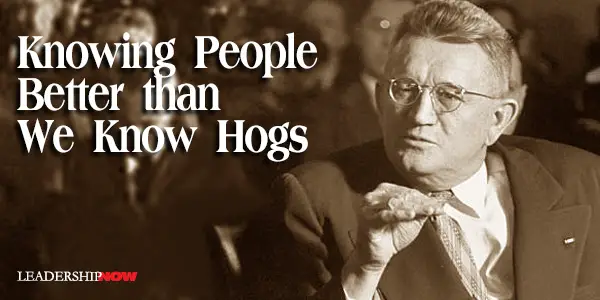
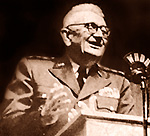
Major General Lewis B. Hershey famously remarked on June 18th 50 years ago, "When we know as much about people as hog specialists know about hogs, we'll be better off." Well said.
On July 31, 1941, Franklin Roosevelt named Hershey the director of the Selective Service System a position he held for almost 30 years. Needless to say, this was a difficult assignment. He had to get congress what they needed in the framework of what Americans would accept. His leadership style, humility, and sense of humor helped him to walk this tightrope. As a nationally renowned speaker, he used his Hoosier wit and philosophy to charm his audience.
Another great Hershey statement: "A boy becomes an adult three years before his parents think he does, and about two years after he thinks he does."
![]()
![]() Like us on Instagram and Facebook for additional leadership and personal development ideas.
Like us on Instagram and Facebook for additional leadership and personal development ideas.
Posted by Michael McKinney at 12:13 PM
Permalink | Comments (0) | Personal Development
05.08.06

Integrity is the Key to Success
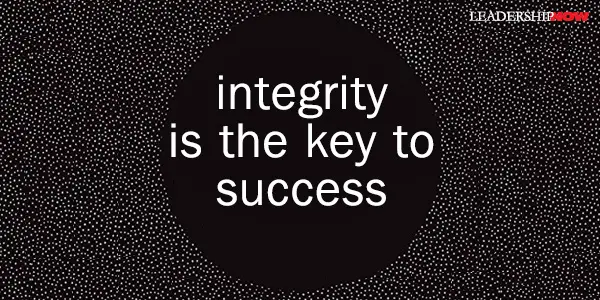
FOR THOSE WHO WISH to increase their performance or to help others to do so, Dr. Henry Cloud believes integrity is the key. By integrity, he means being a whole, integrated person. It's about wholeness. It means a person who is "running on all cylinders." It's more than simple honesty and ethics.
In his book, >Integrity: The Courage to Meet the Demands of Reality, he focuses on the essential need for the character development necessary to make a person or an organization successful. The concept is built upon six traits of integrity:
1. Establishing Trust. This is the ability for someone to get outside their reality, agendas and concerns and connect with, understand, and work with the realities and concerns of the other person or people.
2. Orientation Toward Truth. This gets at the ability to operate in reality and deal with it.
3. Getting Results. Beyond a work ethic and working hard this trait is about how a person is put together that actually causes hard work and effort to end up in real results.
4. Embracing the Negative. Those who succeed are those that understand that life is about solving problems. They seek out the problems and develop the ability to solve them. The ability to move something forward when something bad happens.
5. Orientation Toward Growth. Not the desire to maintain but a real desire to grow and increase.
6. Orientation Toward Transcendence. The ability to see the big picture and to serve something larger than yourself.
Any of these areas can be developed, but growth won't happen because you feel you ought to do this. "Ought " is not a good motivator. So how do you change? Cloud suggests:
People change when they play the "movie," which is to take a hard reality look at your life and work, then play that reality forward to see if you like the way the future movie of your life and career plays out. In that way, people begin to experience the future losses, rewards, and consequences right now and get with reality. When you look, for example, at your present performance, and the things that you are not getting, and then you realize that if you continue to do the same things expecting different results, you will never get what you want, you will change.
![]()
![]() Like us on Instagram and Facebook for additional leadership and personal development ideas.
Like us on Instagram and Facebook for additional leadership and personal development ideas.

![]()
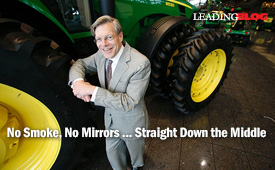

Posted by Michael McKinney at 04:00 AM
Permalink | Comments (0) | Books , Personal Development
05.03.06

How to Craft a Winning Speech

PROFESSIONAL speechwriter Andrew Wilson offers some tips for crafting a winning speech. First, three cardinal rules:
1.Speak from the heart. Talk about the things you really know and care about.
2. Don't shy away from conflict. Conflict, and the resolution of conflict are the central elements in storytelling and all forms of dramatic expression—including speeches.
3. Get inside the minds of the audience. Speak to their needs and concerns or their shortcomings or failings. People will accept criticism but they don't want to be finessed.
Next are some techniques that are useful in thinking through a speech from start to finish:
1. Open with a bang. Don't waste time with niceties. Aim to capture your audience with your first words.
2. Tell stories and look for ways to build suspense. You build suspense by creating a potential disaster and delaying the moment of truth.
3. Write for the eye, the ear, the nose, and all the senses. In other words, be as vivid as you can.
4. Create a plot just as you would if you were writing a short story. Most plots have a protagonist and an antagonist—or a good guy and a bad guy.
5. Show first, then tell, using examples and stories that lead (through various twists and turns) to a few easily stated and readily understood conclusions.
6. In ending a speech, it is usually a good idea to hark back to the beginning—giving the audience a satisfying sense of coming full circle.
![]()
![]() Like us on Instagram and Facebook for additional leadership and personal development ideas.
Like us on Instagram and Facebook for additional leadership and personal development ideas.
![]()
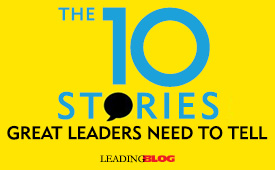
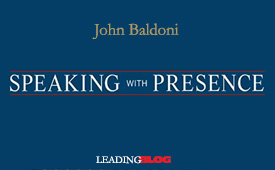
Posted by Michael McKinney at 07:22 AM
Permalink | Comments (0) | Personal Development
04.14.06

5 Tips to Boost Your Power

THE April/May issue of Worthwhile Magazine features a section on how people are redefining power in our organizations and in our culture. Claiming that power today has much more to do with power over yourself than others—I don't believe that this is a new phenomenon, but nevertheless—they bring us five tips to boost our power:
1. Be true to yourself, even (especially) if you're a little weird. High School is the last time conformity and power share a seat at the same table. Power comes from knowing what sets you apart from the crowd—and why the rest of the world should care. Which brings us to...
2. Know how to express yourself. If you want your ideas heard, you have to know how to command the right kind of attention. Witty (Jon Stewart) is powerful; constant quipping (name any sitcom actor) isn't. Don't qualify your opinions ("I may be the only person who thinks this, but..."). And never, ever ramble. Indeed...
3. Less is usually more. Great cooks and entertainers know to leave audiences wanting more. They aren't the only ones. Abraham Lincoln got it right. One of the most powerful speeches in history—the Gettysburg Address—was less than 300 words and lasted only two minutes.
4. Except when it isn't. Sometimes over-the-top works. This goes back to the know-thyself thing. Some people really are larger than life. Everything they do, say, wear, write or think is in bold letters. But there is nothing more exhausting than a larger-than-life wannabe.
5. Force isn't power. Unless you're a drill sergeant, a prison warden (or a parent), it's pretty hard to force anyone to do your bidding. Instead, people yearn to connect with purpose and passion or something bigger than themselves. Think inspiration. It's the new power.
![]()
![]() Like us on Instagram and Facebook for additional leadership and personal development ideas.
Like us on Instagram and Facebook for additional leadership and personal development ideas.
Posted by Michael McKinney at 08:39 AM
Permalink | Comments (0) | Personal Development
04.07.06

Three Levels of Thinking: Moving Toward Maturity
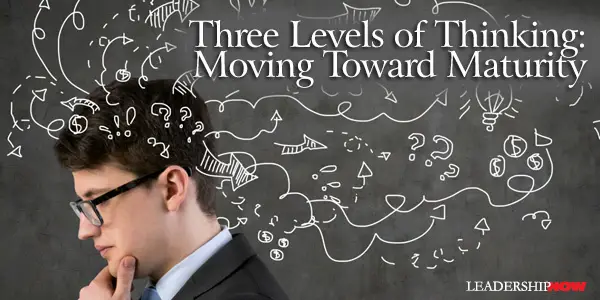
IN The Power of Purpose, Peter Temes defines three levels of thinking:
Level One: The most important question for understanding the world and taking action is How do I feel? Or How do I look to myself? Who am I?
Level Two: You progress to How do others feel about me? Or How do I look to others? Who do others think I am?
Level Three: At this level, the central question is not about how I feel, or how others feel about me, but about how they feel about themselves. The basis of this level is not about what matters to me, but what matters to others. How can I help others?
He suggests,
"Develop the habit of asking level-three questions. Look hard at he clues other people give you about their personal goals and the ways they see themselves. Look for opportunities to help others feel stronger and more successful and you'll see that you will gain as much as or more than others do. When you get past the zero-sum-game model of how the world works—the idea that for me to win someone else must lose—you begin to see the enormous power that comes from sharing your strength with others. That insight, and the moral strength that comes from helping others, are the greatest gifts you can give yourself, and they mark the clearest path to success."
![]()
![]() Like us on Instagram and Facebook for additional leadership and personal development ideas.
Like us on Instagram and Facebook for additional leadership and personal development ideas.

![]()
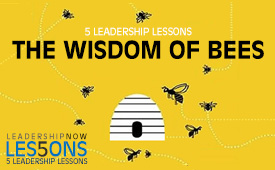

Posted by Michael McKinney at 09:12 AM
Permalink | Comments (0) | TrackBacks (1) | Personal Development , Thinking
04.05.06

Stuffing the Dog

ACTOR ALAN ALDA wrote about a dog he had when he was eight years old. In his book, Never Have Your Dog Stuffed, he describes how he was so upset about burying his dog that his Dad suggested that they have it stuffed. In a Newsweek interview, he said:
It turned out to be a really terrible idea because the dog came back from the taxidermist with a hideous expression on its face that frightened everybody. After a while, I started to think of that as an image of something that went a lot deeper than the dead dog, which is you can't bring back anything to life.It's really clear to me that you can't hang onto something longer than its time. Ideas lose certain freshness, ideas have a shelf life, and sometimes they have to be replaced by other ideas. Hanging onto things the way you wish they were, I've come to see isn't a good idea."
Alda continued that there are a lot of ways we stuff the dog, trying to avoid change or hanging on to a moment that's passed.
We all of course, like to hang on to the familiar. What things are you hanging on to that once abandoned would allow you to move to the next level? Joseph Schumpeter (1942) coined the phrase "creative destruction" to describe the process by which people and organizations determine what they should stop doing.
So much of building a good life or organization is a process of elimination. A process where we replace the outdated with the new more productive behaviors or products. Start by creating a not-to-do list.
Have you stuffed the dog lately?
![]()
![]() Like us on Instagram and Facebook for additional leadership and personal development ideas.
Like us on Instagram and Facebook for additional leadership and personal development ideas.
![]()


Posted by Michael McKinney at 09:56 AM
Permalink | Comments (0) | Management , Personal Development
BUILD YOUR KNOWLEDGE
![]()
![]()

STRAIGHT TALK FOR START-UPS
![]()

Grow Your Leadership Skills
NEW AND UPCOMING LEADERSHIP BOOKS

BITE-SIZE CONCEPTS YOU CAN CHEW ON

BOOKS TO READ BEFORE YOU LEAD

Things Come Along in Life to Knock You Down but the Goal to Stand Back Back
Source: https://www.leadershipnow.com/leadingblog/personal_development/

Belum ada Komentar untuk "Things Come Along in Life to Knock You Down but the Goal to Stand Back Back"
Posting Komentar